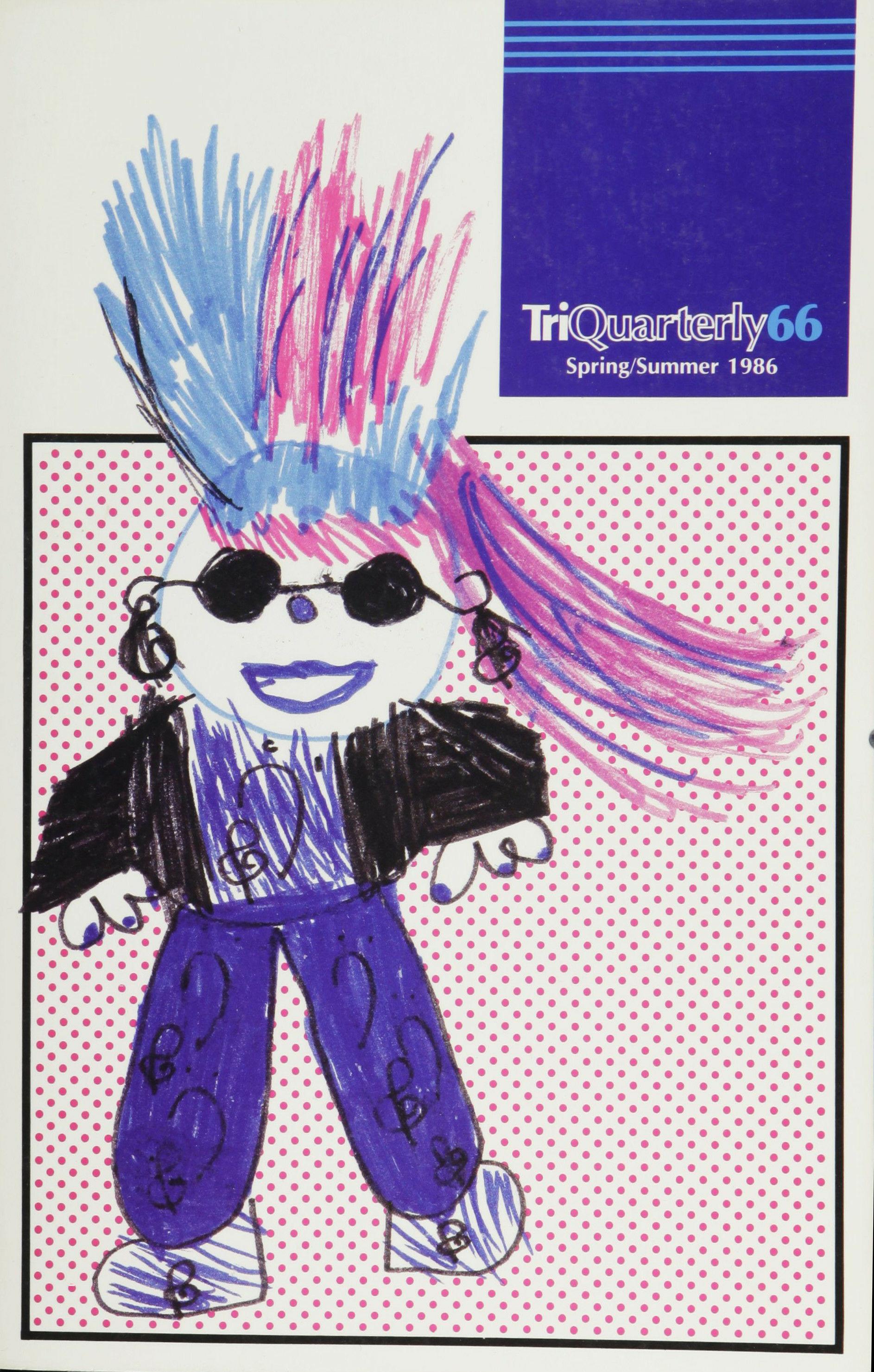
• • • • • • • • • • • • • • • • • • • • • • • • • r • • • • • • • • • ••• �""r.-_ • • • • • • • • • • • • • • • • • • • • • • • • • • • • • • • • '1P::;:�a-.:.•..Jt • • ��,��. • • • • • • • • • • • • • • • • • • • • • • • • • • • • • • • • • • • • • • • • • • • • • • • • • • • • • • • • • • • • • • • • • • • • • • • • • • • • • • • • • • • • • • • • • • • • • • • • • • • • • • • • • • • • • • • • • • • • • • • • • • • • • • • • • • • • • • • • • • • • • • • • • • • • • • • • • • • • • • • • • • • • • • • • • • • • • • • • • • • • • • • • • • • • • • • • • • • • • • • • • • • • • • • • • • • • • • • • • • • • • • • • • • • • • • • • • 111111�::::;��(· ••••••••••••• • • • • • • • • • • • • • • • • • • • • • • • • • • • • • • • • • • • • • • It • • • • • • • • • • • • • • • • • • • • • • • • • • • • • • • • • • • • • • • • • • • • • •

Associate Editor Susan Hahn
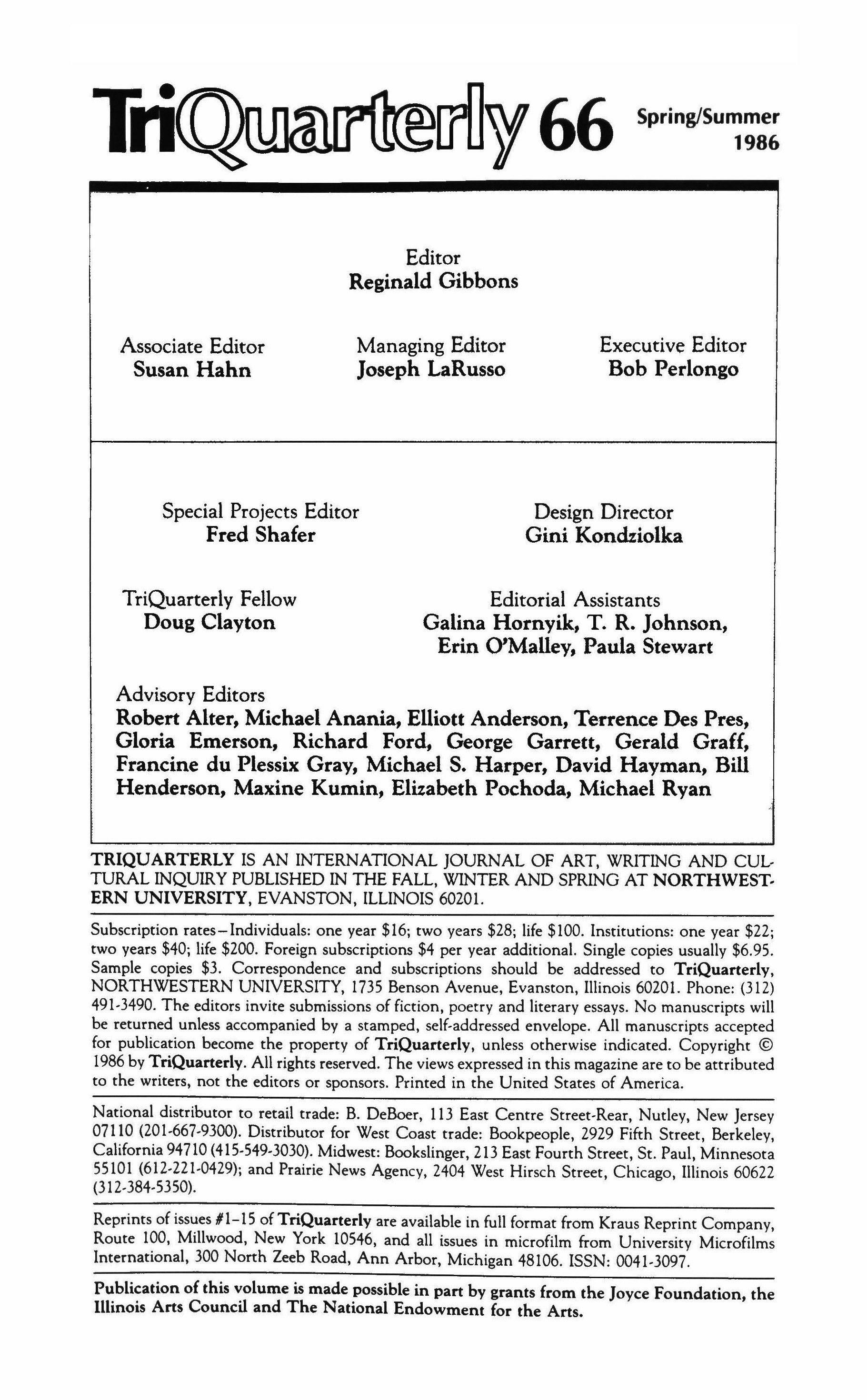
Editor
Reginald Gibbons
Managing Editor Joseph LaRusso
Special Projects Editor Fred Shafer
TriQuarterly Fellow
Doug Clayton
Advisory Editors
Executive Editor Bob Perlongo
Design Director Gini Kondsiolka
Editorial Assistants Galina Hornyik, T. R. Johnson, Erin O'Malley, Paula Stewart
Robert Alter, Michael Anania, Elliott Anderson, Terrence Des Pres, Gloria Emerson, Richard Ford, George Garrett, Gerald Graff, Francine du Plessix Gray, Michael S. Harper, David Hayman, Bill Henderson, Maxine Kumin, Elizabeth Pochoda, Michael Ryan
TRIQUARTERLY IS AN INTERNATIONAL JOURNAL OF ART, WRITING AND CUL· TURAL INQUIRY PUBLISHED IN THE FALL, WINTER AND SPRING AT NORTHWEST. ERN UNIVERSITY, EVANSTON, ILLINOIS 60201.
Subscription rates-Individuals: one year $16; two years $28; life $100. Institutions: one year $22; two years $40; life $200. Foreign subscriptions $4 per year additional. Single copies usually $6.95. Sample copies $3. Correspondence and subscriptions should be addressed to TriQuarterly, NORTHWESTERN UNIVERSITY, 1735 Benson Avenue, Evanston, lIlinois 60201. Phone: (312) 491·3490. The editors invite submissions of fiction, poetry and literary essays. No manuscripts will be returned unless accompanied by a stamped, self-addressed envelope. All manuscripts accepted for publication become the property of TriQuarterIy, unless otherwise indicated. Copyright © 1986 by TriQuarterly. All rights reserved. The views expressed in this magazine are to be attributed to the writers, not the editors or sponsors. Printed in the United States of America.
National distributor to retail trade: B. DeBoer, 113 East Centre Street-Rear, Nutley, New Jersey 07110 (201·667·9300). Distributor for West Coast trade: Bookpeople, 2929 Fifth Street, Berkeley, California 94710 (415·549·3030). Midwest: Bookslinger, 213 East Fourth Street, St. Paul, Minnesota 55101 (612·221·0429); and Prairie News Agency, 2404 West Hirsch Street, Chicago, lIlinois 60622 (312·384·5350).
Reprints of issues #1-15 of TriQuarterly are available in full format from Kraus Reprint Company, Route 100, Millwood, New York 10546, and all issues in microfilm from University Microfilms International, 300 North Zeeb Road, Ann Arbor, Michigan 48106. ISSN: 0041.3097.
Publication of this volume is made possible in part by grants from the Joyce Foundation, the Illinois Arts Council and The National Endowment for the Arts.
Spring/Summer 1986
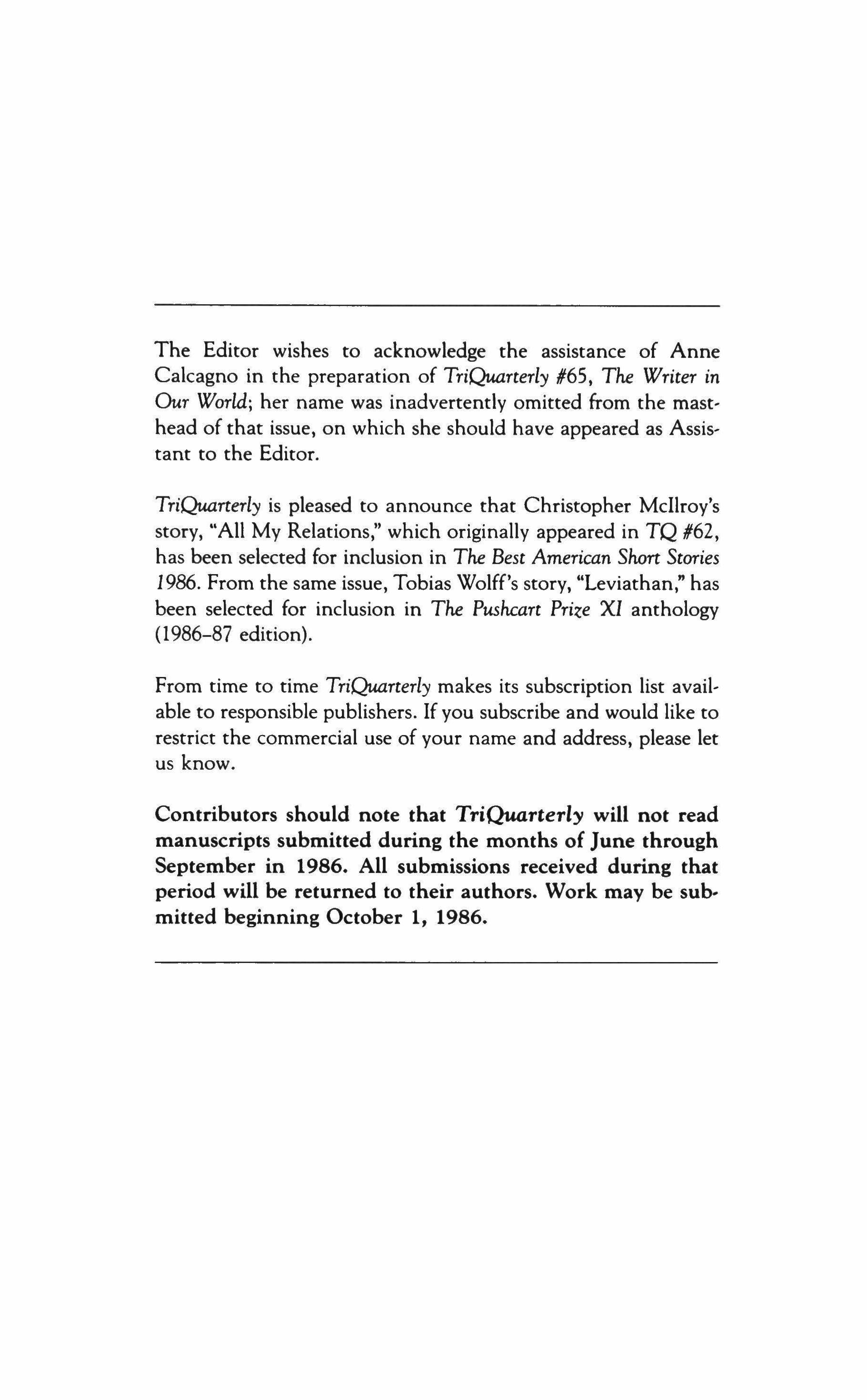
The Editor wishes to acknowledge the assistance of Anne Calcagno in the preparation of TriQuarterly #65, The Writer in Our World; her name was inadvertently omitted from the masthead of that issue, on which she should have appeared as Assistant to the Editor.
TriQuarterly is pleased to announce that Christopher Mcilroy's story, "All My Relations," which originally appeared in TQ #62, has been selected for inclusion in The Best American Short Stories 1986. From the same issue, Tobias Wolff's story, "Leviathan," has been selected for inclusion in The Pushcart Prize Xl anthology (1986-87 edition).
From time to time TriQuarterly makes its subscription list available to responsible publishers. If you subscribe and would like to restrict the commercial use of your name and address, please let us know.
Contributors should note that TriQuarterly will not read manuscripts submitted during the months of June through September in 1986. All submissions received during that period will be returned to their authors. Work may be submitted beginning October 1, 1986.
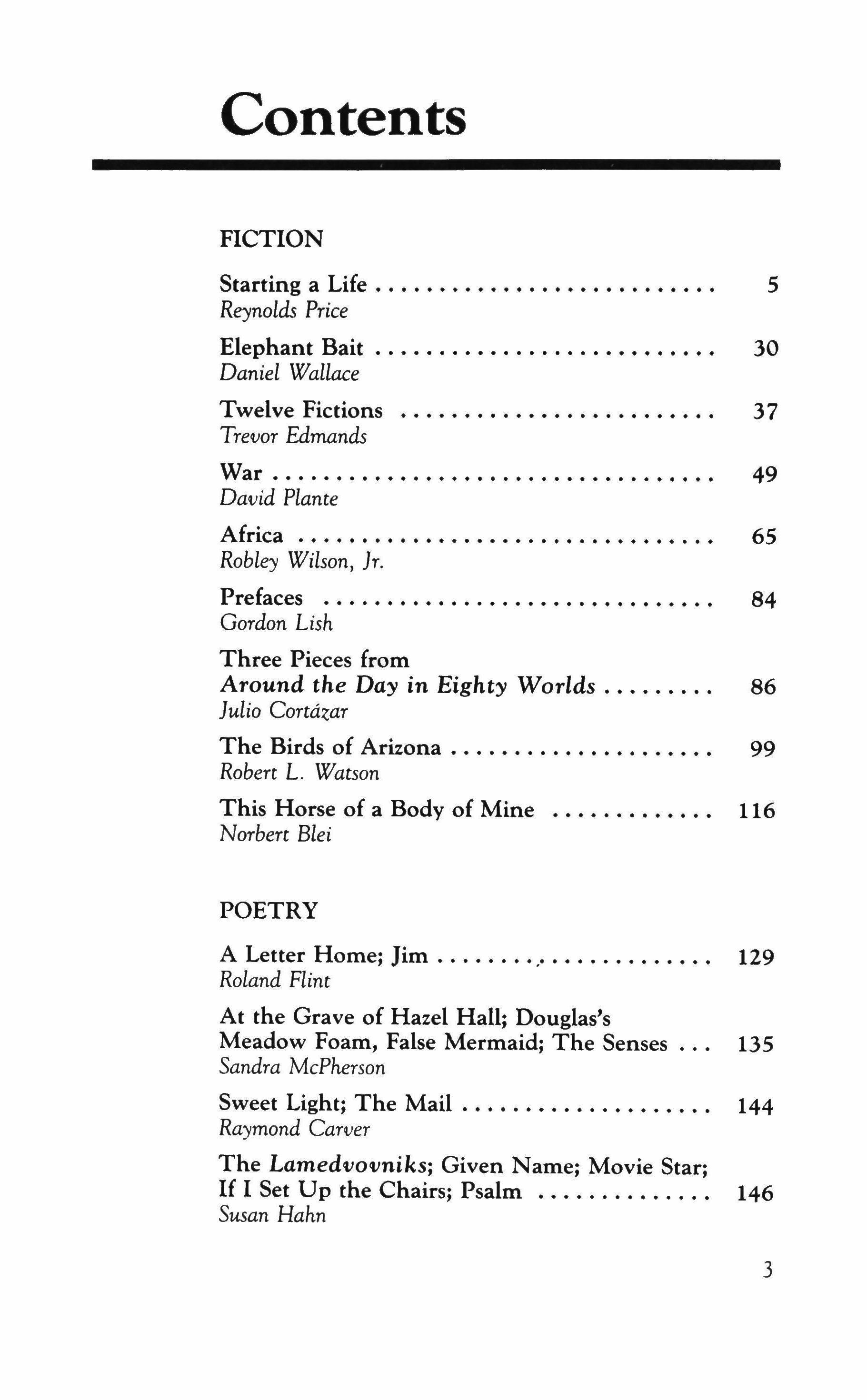
Contents FICTION Starting a Life 5 Reynolds Price Elephant Bait •. 30 Daniel Wallace Twelve Fictions •.•............•..•...... 37 Trevor Edmands War 49 David Plante Africa ••.......•••.......••........•..• 65 Robley Wilson, Jr. Prefaces .••.....•...........•.••......• 84 Gordon Lish Three Pieces from Around the Day in Eighty Worlds. 86 Julio Cortazar The Birds of Arizona 99 Robert L. Watson This Horse of a Body of Mine 116 Norbert Blei POETRY A Letter Home; Jim '.' 129 Roland Flint At the Grave of Hazel Hall; Douglas's Meadow Foam, False Mermaid; The Senses. 135 Sandra McPherson Sweet Light; The Mail 144 Raymond Carver The Lamedvovniks; Given Name; Movie Star; If I Set Up the Chairs; Psalm 146 Susan Hahn 3
Quayside, Ibiza, August; The Shadow
Hilda Morley
Mask.
Enrique Zaragoza

The History and Significance of the Bowler Hat: Chaplin, Laurel and Hardy, Beckett, Magritte and Kundera
Fred Miller Robinson
REVIEWS: Children in Exile: Poems 1968-1984, James Fenton; The Monkey Wars, Bruce Weigl; and Station Island, Seamus Heaney (reviewed by Reginald Gibbons); The Body in Pain: The Making and Unmaking of the World, Elaine Scarry (reviewed by Martin Mueller) 201
Cover design by Gini Kondziolka
Front-cover illustration by Kate Chaltain
Prison Poems and Drawings 152
Inscription;
Portrait;
158
Irina Ratushinskaya
Family
Angel Triptych
Hugo Achugar
163
The
167
The
Approaching Coppie Green 168 The Big One 170 William
Father Visits;
Zaranka NONFICTION
173
226
CONTRIBUTORS
Starting a Life
Reynolds Price
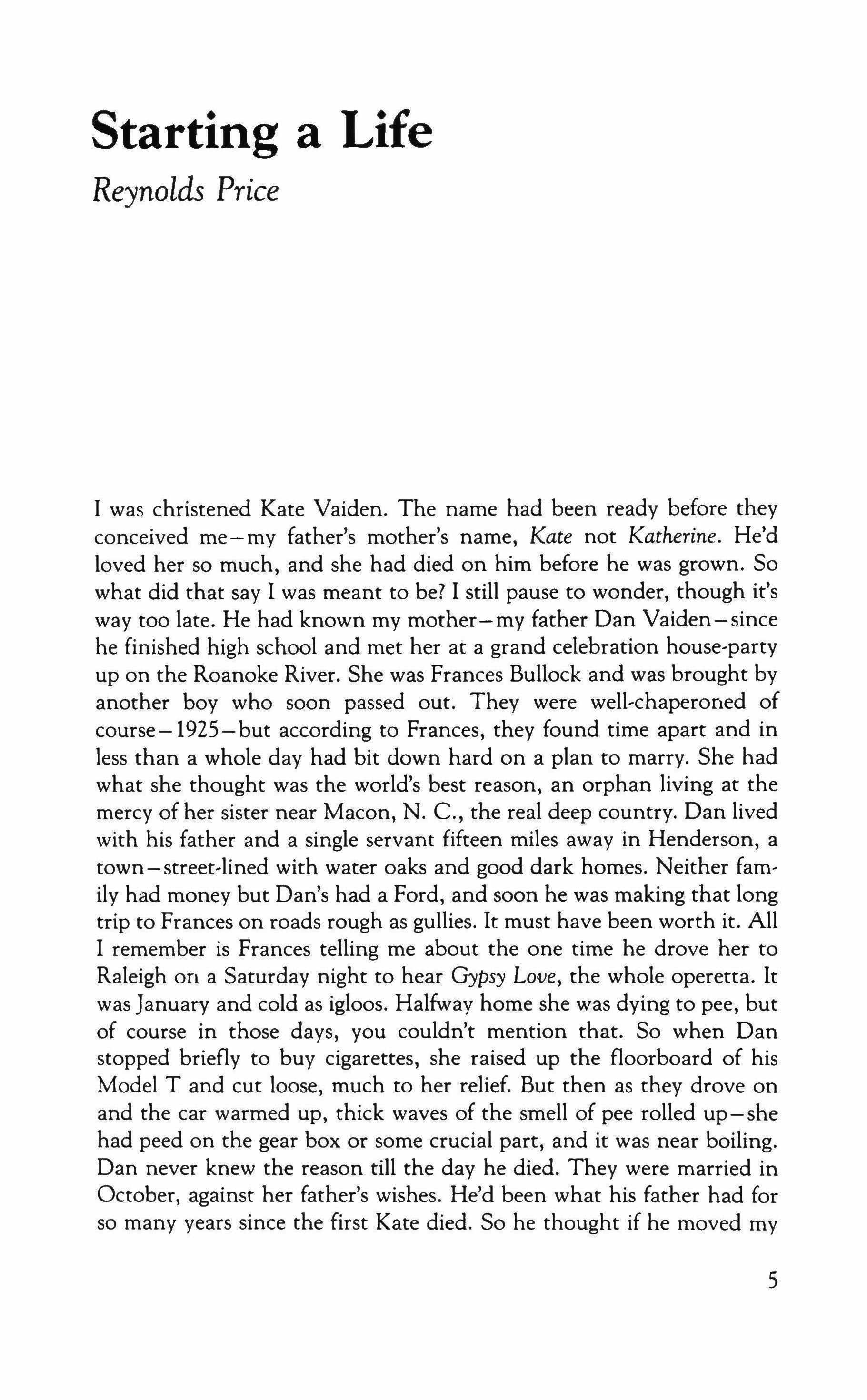
I was christened Kate Vaiden. The name had been ready before they conceived me-my father's mother's name, Kate not Katherine. He'd loved her so much, and she had died on him before he was grown. So what did that say I was meant to be? I still pause to wonder, though it's way too late. He had known my mother-my father Dan Vaiden-since he finished high school and met her at a grand celebration house-party up on the Roanoke River. She was Frances Bullock and was brought by another boy who soon passed out. They were well-chaperoned of course-I92S-but according to Frances, they found time apart and in less than a whole day had bit down hard on a plan to marry. She had what she thought was the world's best reason, an orphan living at the mercy of her sister near Macon, N. C., the real deep country. Dan lived with his father and a single servant fifteen miles away in Henderson, a town - street-lined with water oaks and good dark homes. Neither family had money but Dan's had a Ford, and soon he was making that long trip to Frances on roads rough as gullies. It must have been worth it. All I remember is Frances telling me about the one time he drove her to Raleigh on a Saturday night to hear Gypsy Love, the whole operetta. It was January and cold as igloos. Halfway home she was dying to pee, but of course in those days, you couldn't mention that. So when Dan stopped briefly to buy cigarettes, she raised up the floorboard of his Model T and cut loose, much to her relief. But then as they drove on and the car warmed up, thick waves of the smell of pee rolled up-she had peed on the gear box or some crucial part, and it was near boiling. Dan never knew the reason till the day he died. They were married in October, against her father's wishes. He'd been what his father had for so many years since the first Kate died. So he thought if he moved my S
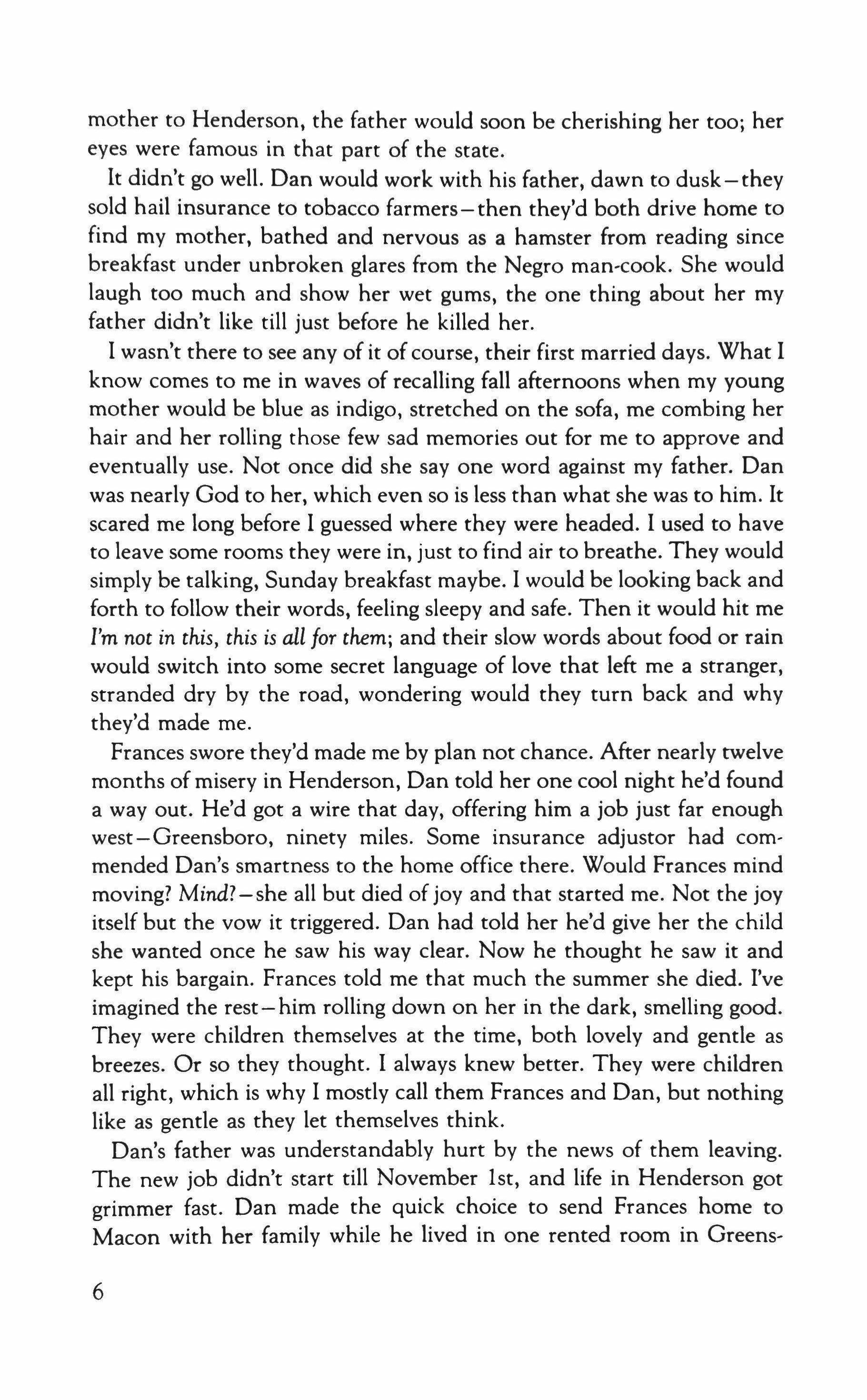
mother to Henderson, the father would soon be cherishing her too; her eyes were famous in that part of the state.
It didn't go well. Dan would work with his father, dawn to dusk-they sold hail insurance to tobacco farmers-then they'd both drive home to find my mother, bathed and nervous as a hamster from reading since breakfast under unbroken glares from the Negro man-cook. She would laugh too much and show her wet gums, the one thing about her my father didn't like till just before he killed her.
I wasn't there to see any of it of course, their first married days. What I know comes to me in waves of recalling fall afternoons when my young mother would be blue as indigo, stretched on the sofa, me combing her hair and her rolling those few sad memories out for me to approve and eventually use. Not once did she say one word against my father. Dan was nearly God to her, which even so is less than what she was to him. It scared me long before I guessed where they were headed. I used to have to leave some rooms they were in, just to find air to breathe. They would simply be talking, Sunday breakfast maybe. I would be looking back and forth to follow their words, feeling sleepy and safe. Then it would hit me I'm not in this, this is all for them; and their slow words about food or rain would switch into some secret language of love that left me a stranger, stranded dry by the road, wondering would they turn back and why they'd made me.
Frances swore they'd made me by plan not chance. After nearly twelve months of misery in Henderson, Dan told her one cool night he'd found a way out. He'd got a wire that day, offering him a job just far enough west-Greensboro, ninety miles. Some insurance adjustor had commended Dan's smartness to the home office there. Would Frances mind moving? Minci? - she all but died of joy and that started me. Not the joy itself but the vow it triggered. Dan had told her he'd give her the child she wanted once he saw his way clear. Now he thought he saw it and kept his bargain. Frances told me that much the summer she died. I've imagined the rest - him rolling down on her in the dark, smelling good. They were children themselves at the time, both lovely and gentle as breezes. Or so they thought. I always knew better. They were children all right, which is why I mostly call them Frances and Dan, but nothing like as gentle as they let themselves think.
Dan's father was understandably hurt by the news of them leaving. The new job didn't start till November lst, and life in Henderson got grimmer fast. Dan made the quick choice to send Frances home to Macon with her family while he lived in one rented room in Greens-
6
bora, learning his job and hunting a house. They were parted eight weeks, and it may have ruined them both or started the process.
This year for the first time I came into possession of the letters they wrote every day in those weeks. Since finally I was hoping to under, stand, I made myself read them, a terrible effort. Took nearly three months-l couldn't bear more than one or two a night, and then I'd need gaps. No harsh revelations, just two people holding themselves toward each other at absolute white heat, bound to fade or shatter. Frances may not have known she was pregnant when Dan left, but she's bound to have had proof by Thanksgiving week. It's not in the letters, not even in their little private hints and jokes. She must have kept it from him till he came at last to get her-Christmas week; they meant to start their new life on Christmas.
These are the last two letters they wrote before reuniting. To the best of my knowledge they're the last to survive from the rest of their lives. They lived more than ten years longer, strong and talking; but they never agreed to part long enough to make letters useful.
December 18, 1926
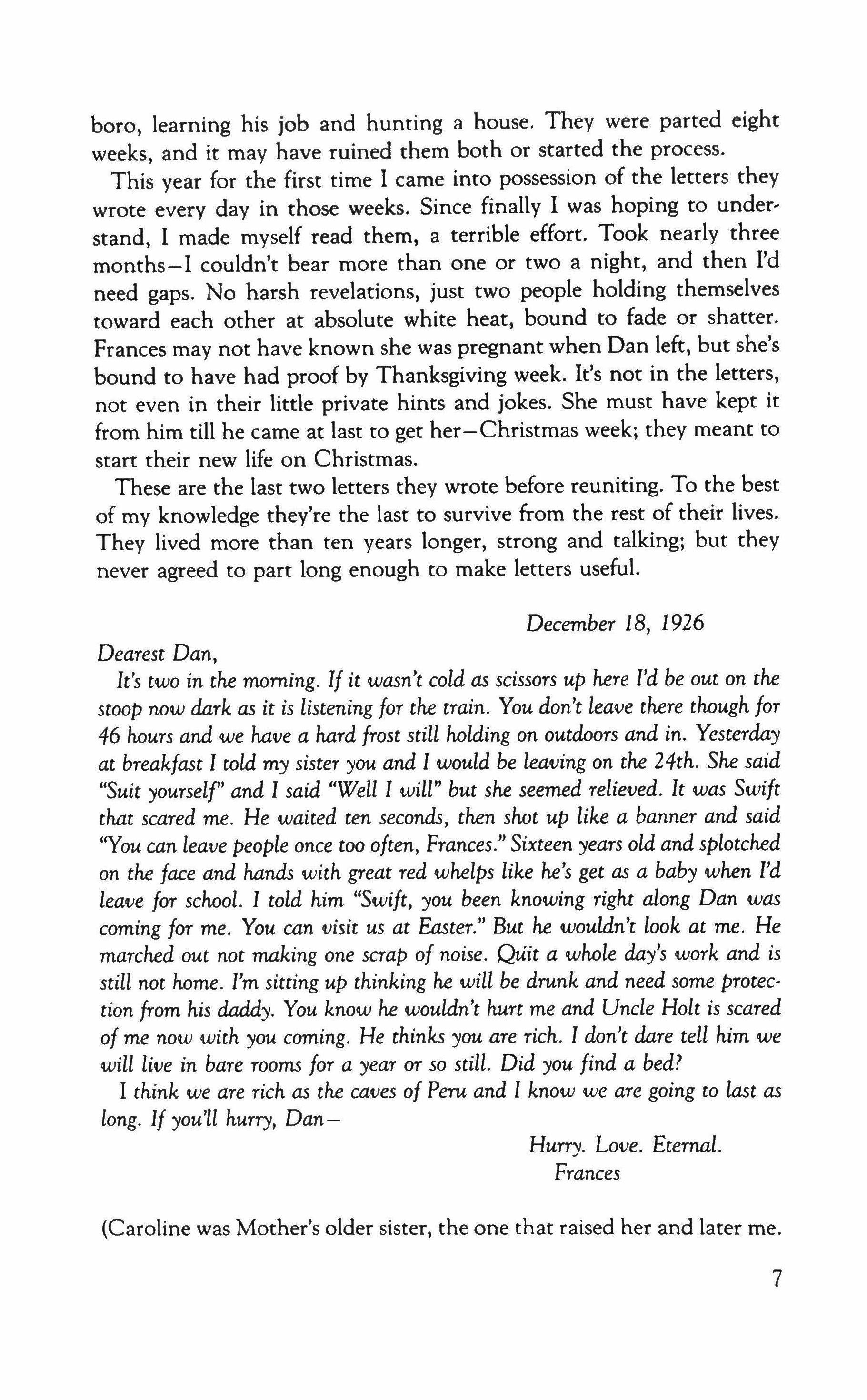
Dearest Dan,
It's two in the morning. If it wasn't cold as scissors up here I'd be out on the stoop now dark as it is listening for the train. You don't leave there though for 46 hours and we have a hard frost still holding on outdoors and in. Yesterday at breakfast I told my sister you and I would be leaving on the 24th. She said "Suit yourself' and I said "Well I will" but she seemed relieved. It was Swift that scared me. He waited ten seconds, then shot up like a banner and said ''You can leave people once too often, Frances." Sixteen years old and splotched on the face and hands with great red whelps like he's get as a baby when I'd leave for school. I told him "Swift, you been knowing right along Dan was coming for me. You can visit us at Easter." But he wouldn't look at me. He marched out not making one scrap of noise. Quit a whole day's work and is still not home. I'm sitting up thinking he will be drunk and need some protection from his daddy. You know he wouldn't hurt me and Uncle Holt is scared of me now with you coming. He thinks you are rich. I don't dare tell him we will live in bare rooms for a year or so still. Did you find a bed?
I think we are rich as the caves of Peru and I know we are going to last as long. If you'll hurry, Dan-
Hurry. Love. Eternal.
Frances
(Caroline was Mother's older sister, the one that raised her and later me.
7
Holt was Caroline's husband and mean. Swift was Caroline's youngest boy, two years younger than my mother but her nephew. He's still alive and badly stove-in, no danger now.)
December 18, 1926
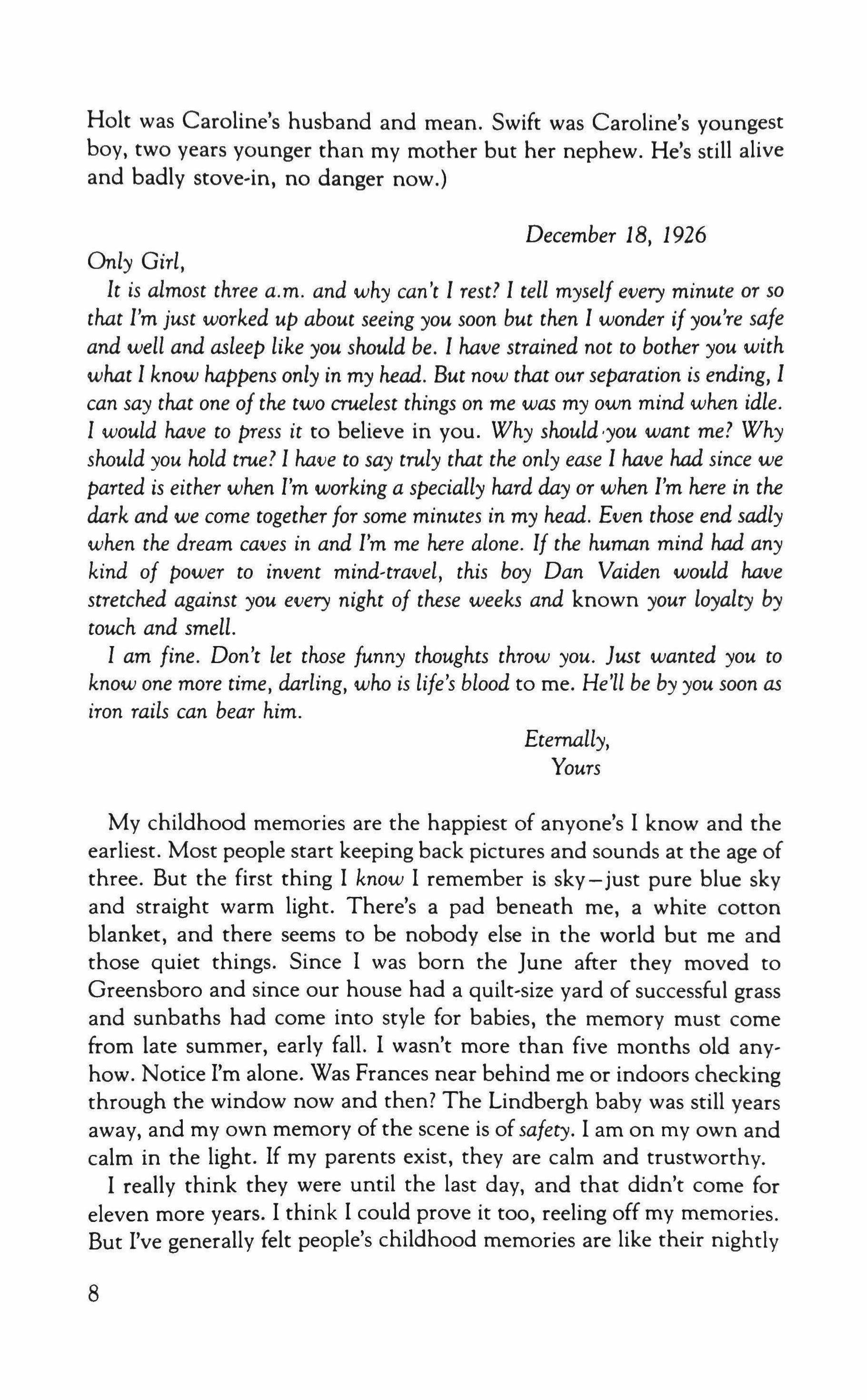
Only Girl,
It is almost three a.m. and why can't I rest? I tell myself every minute or so that I'm just worked up about seeing you soon but then I wonder ifyou're safe and well and asleep like you should be. I have strained not to bother you with what I know happens only in my head. But now that our separation is ending, I can say that one of the two cruelest things on me was my own mind when idle. I would have to press it to believe in you. Why should -you want me? Why should you hold true? I have to say truly that the only ease I have had since we parted is either when I'm working a specially hard day or when I'm here in the dark and we come together for some minutes in my head. Even those end sadly when the dream caves in and I'm me here alone. If the human mind had any kind of power to invent mind-travel, this boy Dan Vaiden would have stretched against you every night of these weeks and known your loyalty by touch and smell.
I am fine. Don't let those funny thoughts throw you. lust wanted you to know one more time, darling, who is life's blood to me. He'll be by you soon as iron rails can bear him.
Eternally, Yours
My childhood memories are the happiest of anyone's I know and the earliest. Most people start keeping back pictures and sounds at the age of three. But the first thing I know I remember is sky-just pure blue sky and straight warm light. There's a pad beneath me, a white cotton blanket, and there seems to be nobody else in the world but me and those quiet things. Since I was born the June after they moved to Greensboro and since our house had a quilt-size yard of successful grass and sunbaths had come into style for babies, the memory must come from late summer, early fall. I wasn't more than five months old anyhow. Notice I'm alone. Was Frances near behind me or indoors checking through the window now and then? The Lindbergh baby was still years away, and my own memory of the scene is of safety. I am on my own and calm in the light. If my parents exist, they are calm and trustworthy. I really think they were until the last day, and that didn't come for eleven more years. I think I could prove it too, reeling off my memories. But I've generally felt people's childhood memories are like their nightly
8
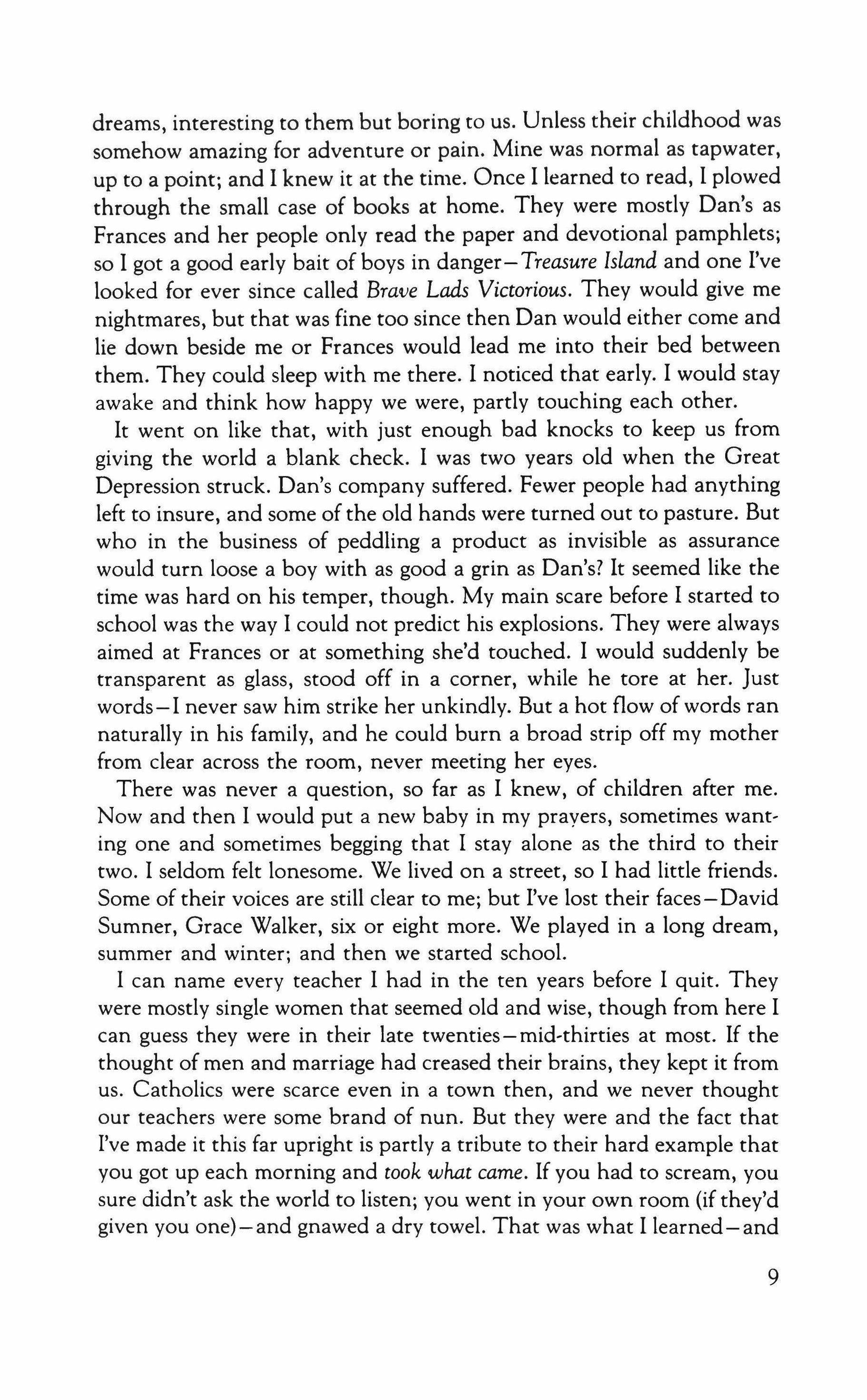
dreams, interesting to them but boring to us. Unless their childhood was somehow amazing for adventure or pain. Mine was normal as tapwater, up to a point; and I knew it at the time. Once I learned to read, I plowed through the small case of books at home. They were mostly Dan's as Frances and her people only read the paper and devotional pamphlets; so I got a good early bait of boys in danger-Treasure Island and one I've looked for ever since called Brave Lads Victorious. They would give me nightmares, but that was fine too since then Dan would either come and lie down beside me or Frances would lead me into their bed between them. They could sleep with me there. I noticed that early. I would stay awake and think how happy we were, partly touching each other.
It went on like that, with just enough bad knocks to keep us from giving the world a blank check. I was two years old when the Great Depression struck. Dan's company suffered. Fewer people had anything left to insure, and some of the old hands were turned out to pasture. But who in the business of peddling a product as invisible as assurance would turn loose a boy with as good a grin as Dan's? It seemed like the time was hard on his temper, though. My main scare before I started to school was the way I could not predict his explosions. They were always aimed at Frances or at something she'd touched. I would suddenly be transparent as glass, stood off in a corner, while he tore at her. Just words-I never saw him strike her unkindly. But a hot flow of words ran naturally in his family, and he could burn a broad strip off my mother from clear across the room, never meeting her eyes.
There was never a question, so far as I knew, of children after me. Now and then I would put a new baby in my prayers, sometimes wanting one and sometimes begging that I stay alone as the third to their two. I seldom felt lonesome. We lived on a street, so I had little friends. Some of their voices are still clear to me; but I've lost their faces - David Sumner, Grace Walker, six or eight more. We played in a long dream, summer and winter; and then we started school.
I can name every teacher I had in the ten years before I quit. They were mostly single women that seemed old and wise, though from here I can guess they were in their late twenties-mid-thirties at most. If the thought of men and marriage had creased their brains, they kept it from us. Catholics were scarce even in a town then, and we never thought our teachers were some brand of nun. But they were and the fact that I've made it this far upright is partly a tribute to their hard example that you got up each morning and took what came. If you had to scream, you sure didn't ask the world to listen; you went in your own room (ifthey'd given you one}-and gnawed a dry towel. That was what I learned-and
9
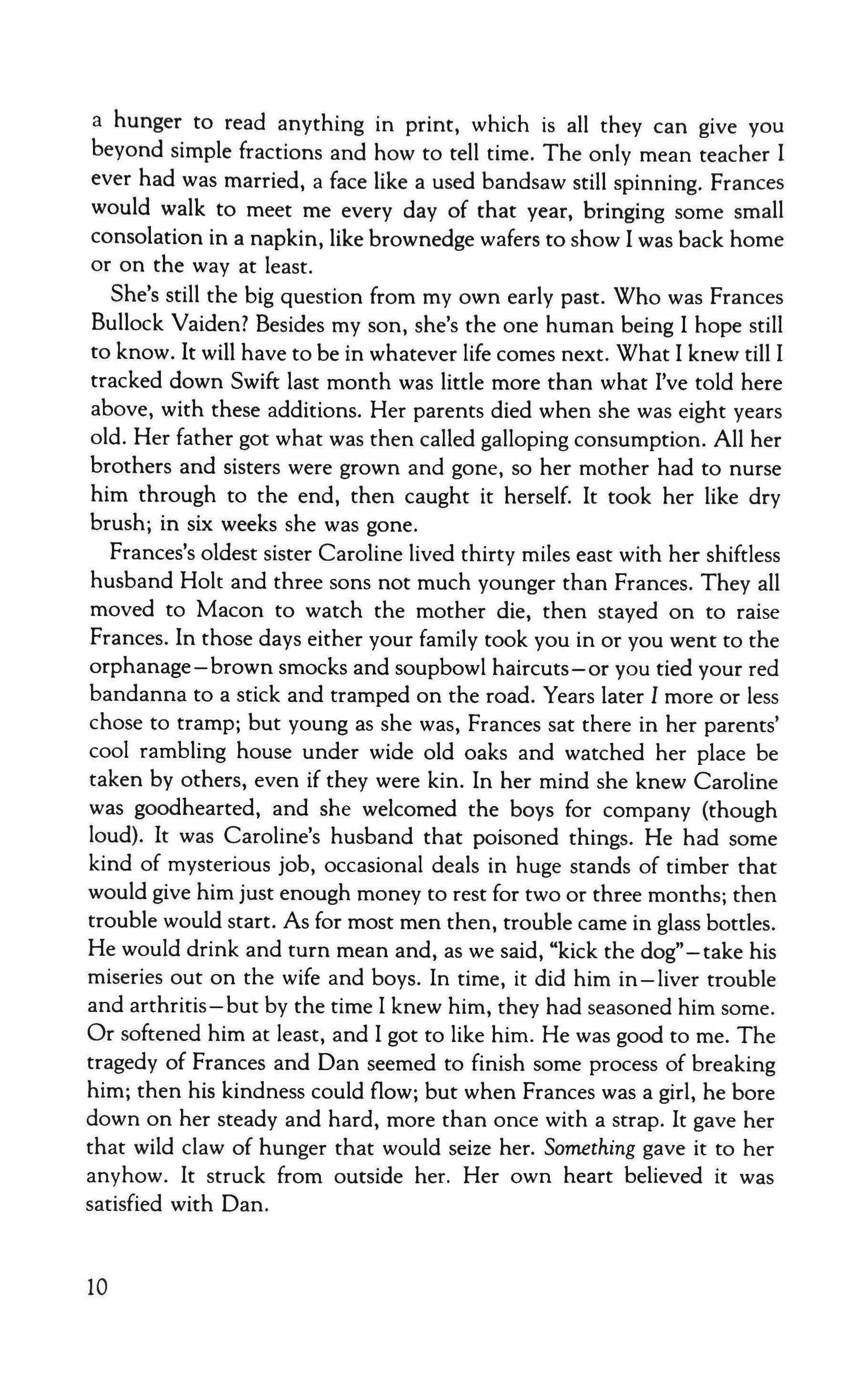
a hunger to read anything in print, which is all they can give you beyond simple fractions and how to tell time. The only mean teacher I ever had was married, a face like a used bandsaw still spinning. Frances would walk to meet me every day of that year, bringing some small consolation in a napkin, like brownedge wafers to show I was back home or on the way at least.
She's still the big question from my own early past. Who was Frances Bullock Vaiden? Besides my son, she's the one human being I hope still to know. It will have to be in whatever life comes next. What I knew till I tracked down Swift last month was little more than what I've told here above, with these additions. Her parents died when she was eight years old. Her father got what was then called galloping consumption. All her brothers and sisters were grown and gone, so her mother had to nurse him through to the end, then caught it herself. It took her like dry brush; in six weeks she was gone.
Frances's oldest sister Caroline lived thirty miles east with her shiftless husband Holt and three sons not much younger than Frances. They all moved to Macon to watch the mother die, then stayed on to raise Frances. In those days either your family took you in or you went to the orphanage-brown smocks and soupbowl haircuts-or you tied your red bandanna to a stick and tramped on the road. Years later I more or less chose to tramp; but young as she was, Frances sat there in her parents' cool rambling house under wide old oaks and watched her place be taken by others, even if they were kin. In her mind she knew Caroline was goodhearted, and she welcomed the boys for company (though loud). It was Caroline's husband that poisoned things. He had some kind of mysterious job, occasional deals in huge stands of timber that would give him just enough money to rest for two or three months; then trouble would start. As for most men then, trouble came in glass bottles. He would drink and turn mean and, as we said, "kick the dog" - take his miseries out on the wife and boys. In time, it did him in-liver trouble and arthritis-but by the time I knew him, they had seasoned him some. Or softened him at least, and I got to like him. He was good to me. The tragedy of Frances and Dan seemed to finish some process of breaking him; then his kindness could flow; but when Frances was a girl, he bore down on her steady and hard, more than once with a strap. It gave her that wild claw of hunger that would seize her. Something gave it to her anyhow. It struck from outside her. Her own heart believed it was satisfied with Dan.
10

The June I was eleven and in the fifth grade, Aunt Caroline's middle son Taswell was killed in a motorcycle wreck. He had been my favorite member of the family since I'd started going to Macon every summer and spending a month. He had tight brown curls and had already gone through a wife and two babies, still grinning white as daylight. Long, distance phonecalls were scarce as money then. That Thursday we were eating supper in the kitchen; the dining-room ceiling had fallen in the night a week before for no known cause. The phone rang and it was Uncle Holt with the sad news; the funeral would be on Saturday morn' ing. Frances had answered. I saw her go pale and just seek Dan's face in the air like a port. She only said "Holt, tell Caroline I'll be there" and "How is Swift?" Then she hung up and sat down, ate a bite of ham, and told us dryeyed.
Dan watched but never touched her hand that was near him on the table. Finally he said "I promised to work late Friday night. You and Kate drive on. I'll stay here and have waffles for you Sunday night." (Frances had learned to drive as a child, and Dan cooked hash and waffles every Sunday night.)
Frances knew he had little use for her people, the men anyhow. But this was the first death she'd faced since her parents'. She took back the hand that had stayed near Dan.
I knew what that meant, plain as any inscription. By then my eyes had filled up for Taswell.
She watched me awhile, then said "Thank you, Kate" and raked one finger deep through my eyebrows. I used to remember that as her last words, but sadly they were not. She didn't speak another word to Dan at least till I'd gone to sleep. She stood up silent and cleared the table, food still on our plates, and began to fill the sink.
Dan asked me did I want to take a walk with him?
Any other night, before or after in my life, I'd have said Yes fast. But my mother's straight back at the sink kept me home.
He went on his own, went somewhere far enough to keep him out late, though he went and came back entirely on foot.
Frances moved through the time like the air was stiff. She said just the few words to get me started packing. She packed in her room and ironed a few clothes, but she never stepped over to my room again.
When I'd shut my bag (that had been Dan's father's, a worn country satchel), I was too excited to play or sleep, much less do homework. I sat on my bed and silently named all the friends of my whole life, my age or grown; there were dozens then or so I believed. That put me to sleep, fully dressed, propped up. A hundred other nights I'd done the same
11

thing and waked up next morning undressed and carefully tucked in by Frances. But that night I woke to my own bed lamp. My hair was soaked and I heard raised voices as strange as thieves. I was terrified a way I'd never been before, in absolute earnest, sure this was real. I couldn't move to hunt my parents though.
I thought these voices had already killed them. It was maybe three minutes before I knew the words were theirs. I've said Dan would suddenly fly out furious when no one had touched him-but always at things, the car or a wheel- and that Frances was subject to blues and craving. But this was the worst discovery I'd made in a life that naturally seemed long to me. I'll be writing down other conversations later that I couldn't swear a Bible oath are word-faithful, but here I feel responsible only to what I'm reasonably sure I heard.
Dan said "I left my home for you and broke my father like a dry stick."
Frances said "I never asked that from you."
He said "You're a lie. You begged it every day. And when I gave in and Kate landed on us, you made her love your people-turned her against my few last kin."
Frances said "You hate your aunts and they well know it. But take her there tonight if you're so hot to have her love them-good luck."
Dan said "Everybody that's ever known me knows all I feel, one minute to the next. I've never been sure of you for one clear second."
Kate waited a long time. Then she told him "That's the saddest thing I ever heard."
Dan said "That is not the same as saying I'm wrong."
Beyond that, I don't remember the night. They may have said or done more that I've mislaid. Just lately I've wondered if I did see things, that night and before, that I buried too deep. I'm told that children can forget the worst-with what I recall, though, what could have been worse? What happened surely is that, young as I was, the fear eventually put me to sleep.
What I know next is, Frances woke me early and said to dress quick; we were catching the train. I asked her "Where to?" and she said I knew. I did. I saw it as the rest of my life, and I saw it as hard. But most children see that several times a month. Someone had stripped me to my underwear; so I washed my eyes, dressed, and went to the front room. No trace of Dan and the place quiet as rocks. Frances sat in the awful straight chair by the door, and a Negro taxi was waiting at the curb. I'd never been in any car but ours. The newness and the bright day-and skipping Friday school- had me half cheered-up by the time we were moving. I never asked a question and Frances looked calm.
12

She said almost nothing till we were on the train. Then she said "This is going to end very soon. Dan'll see he's wrong before the day's out." What I recall from the rest of the trip is buying a small glass bear full of candy (of which I never ate one piece) and then deciding to pretend I was a boy. My neighbor David Sumner and I had swapped clothes one day when we were five, but I knew we were playing. I hadn't ever tried to be a boy before. Dan had always told me that, if you kissed your elbow, you turned into your opposite-boy or girl. It had taken me a few tries to know he was joking, and now I didn't pull any silly contortions. I sat still as wood on the seat by Frances and slowly turned into a boy named Marcus. He was red-headed, taller than me but thin, and he had elaborate braces on his teeth (I'd always wanted braces, though my teeth were straight as walls; braces seemed like a complicated hobby you could run). He owned a gray pony, wanted no friends, but was envied by all for eyes so pale-blue they barely appeared. Nobody on earth had ever hurt his feelings, though many had tried. And he often took long thirsty hikes in the hills with only dry rations, never writing to his parents who were forced to wait and pray. My body was nearly a boy's in any case. I didn't have even the nubs of bosoms but was finished smooth and lean as the back of a good country fiddle from neck to groin. There I was split of course but also still smooth. Yet my whole body now was Marcus in the ways I'd seen boys were different. I had their bitter smell on the skin of my arms. Dan had walked past me naked hundreds of times, but I didn't think of my sexual parts. I was nearly sufficient to catch quick whiffs of my new odor in the train's loud fan and imagine my patience. Frances gave no sign of noticing, even when I spoke in a voice like Marcus to tell her we were there.
Swift met us at the depot. He was Caroline and Holt's youngest boy, two years younger than Frances but her nephew. He'd always had a face so alive you couldn't watch it long-slanted green eyes and cinnamon hair that looked warm as bricks in the August road. Any fool, any age, could see straight off he was shaking you down for all you'd give from heart, liver, lights, purse-anything you owned. Most people refused him because he was so hungry (Holt had been hard on him in his early childhood, long sessions with a strap). But my young mother was built to understand; No was a thought she'd seldom had, much less expressed. And he met us in tears. The first thing he said, once he got us in the car, was straight to Frances. "I never cried a drop till I heard your train, Fan."
13
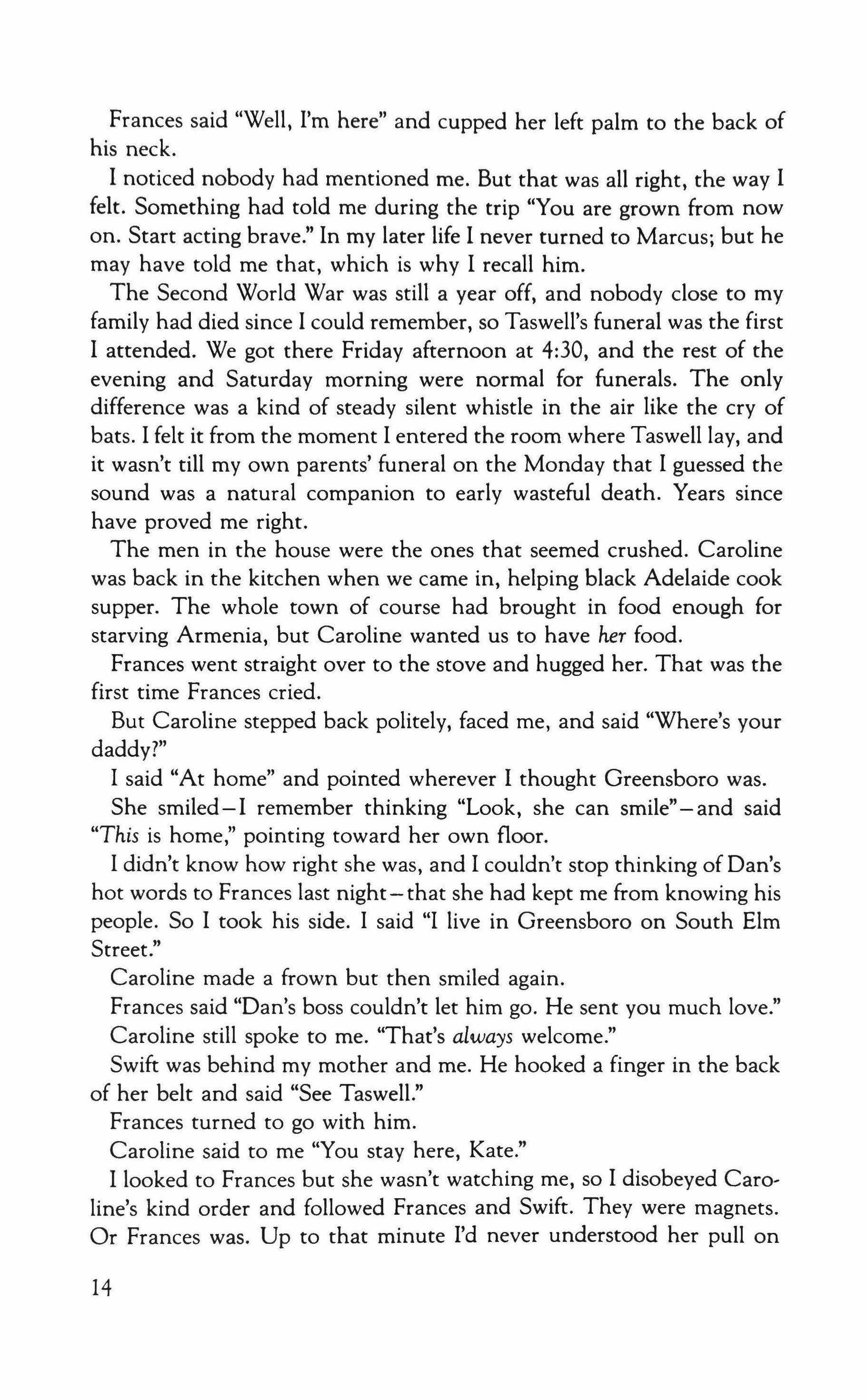
Frances said "Well, I'm here" and cupped her left palm to the back of his neck.
I noticed nobody had mentioned me. But that was all right, the way I felt. Something had told me during the trip "You are grown from now on. Start acting brave." In my later life I never turned to Marcus; but he may have told me that, which is why I recall him.
The Second World War was still a year off, and nobody close to my family had died since 1 could remember, so Taswell's funeral was the first I attended. We got there Friday afternoon at 4:30, and the rest of the evening and Saturday morning were normal for funerals. The only difference was a kind of steady silent whistle in the air like the cry of bats. 1 felt it from the moment 1 entered the room where Taswelllay, and it wasn't till my own parents' funeral on the Monday that 1 guessed the sound was a natural companion to early wasteful death. Years since have proved me right.
The men in the house were the ones that seemed crushed. Caroline was back in the kitchen when we came in, helping black Adelaide cook supper. The whole town of course had brought in food enough for starving Armenia, but Caroline wanted us to have her food.
Frances went straight over to the stove and hugged her. That was the first time Frances cried.
But Caroline stepped back politely, faced me, and said "Where's your daddy?"
1 said "At home" and pointed wherever I thought Greensboro was. She smiled - 1 remember thinking "Look, she can smile" - and said "This is home," pointing toward her own floor.
1 didn't know how right she was, and 1 couldn't stop thinking of Dan's hot words to Frances last night - that she had kept me from knowing his people. So 1 took his side. 1 said "I live in Greensboro on South Elm Street."
Caroline made a frown but then smiled again.
Frances said "Dan's boss couldn't let him go. He sent you much love."
Caroline still spoke to me. "That's always welcome."
Swift was behind my mother and me. He hooked a finger in the back of her belt and said "See Taswell."
Frances turned to go with him.
Caroline said to me "You stay here, Kate."
I looked to Frances but she wasn't watching me, so I disobeyed Caroline's kind order and followed Frances and Swift. They were magnets. Or Frances was. Up to that minute I'd never understood her pull on
14
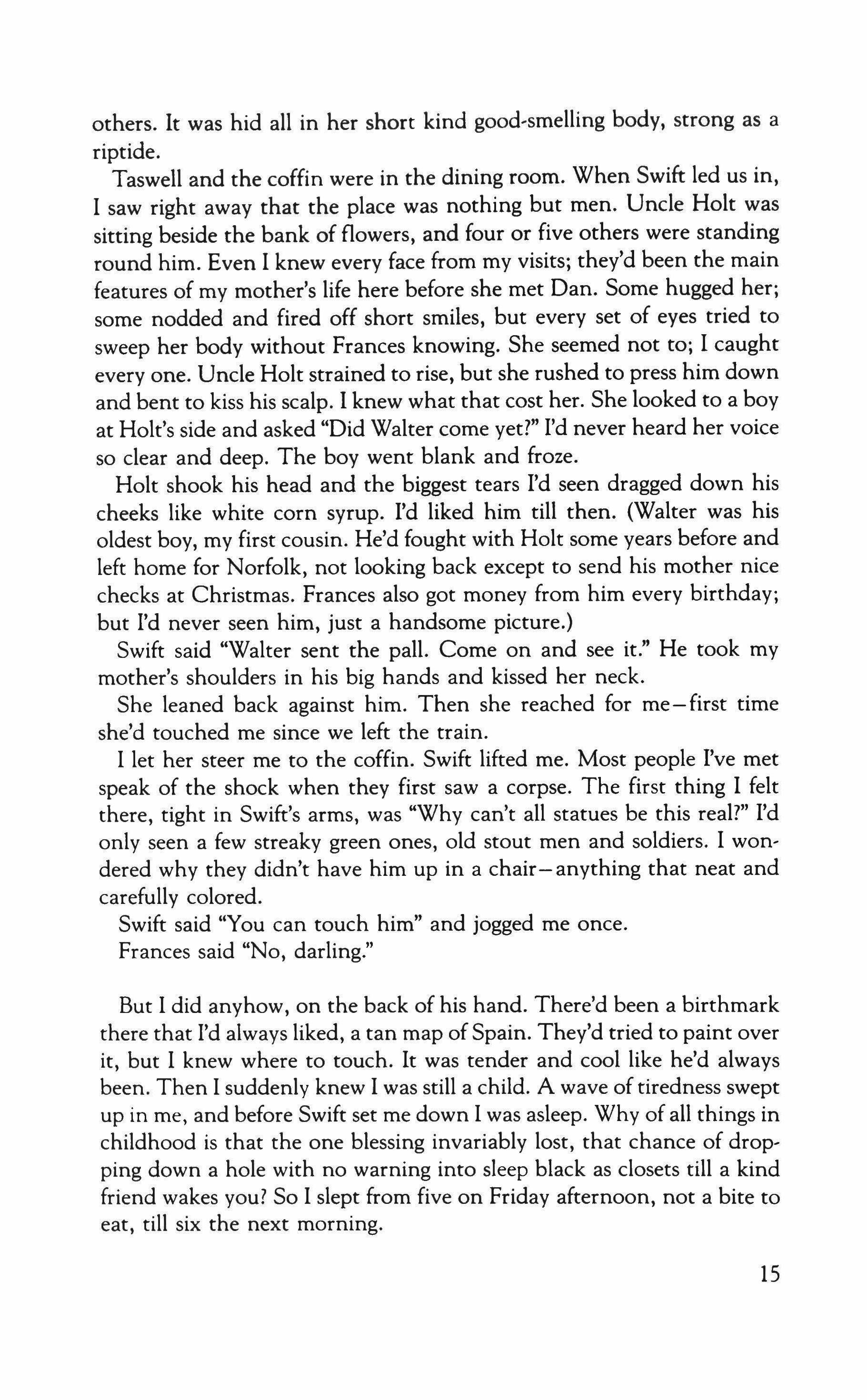
others. It was hid all in her short kind good-smelling body, strong as a riptide.
Taswell and the coffin were in the dining room. When Swift led us in, I saw right away that the place was nothing but men. Uncle Holt was sitting beside the bank of flowers, and four or five others were standing round him. Even I knew every face from my visits; they'd been the main features of my mother's life here before she met Dan. Some hugged her; some nodded and fired off short smiles, but every set of eyes tried to sweep her body without Frances knowing. She seemed not to; I caught everyone. Uncle Holt strained to rise, but she rushed to press him down and bent to kiss his scalp. I knew what that cost her. She looked to a boy at Holt's side and asked "Did Walter corne yet?" I'd never heard her voice so clear and deep. The boy went blank and froze.
Holt shook his head and the biggest tears I'd seen dragged down his cheeks like white corn syrup. I'd liked him till then. (Walter was his oldest boy, my first cousin. He'd fought with Holt some years before and left horne for Norfolk, not looking back except to send his mother nice checks at Christmas. Frances also got money from him every birthday; but I'd never seen him, just a handsome picture.)
Swift said "Walter sent the pall. Corne on and see it." He took my mother's shoulders in his big hands and kissed her neck.
She leaned back against him. Then she reached for me-first time she'd touched me since we left the train.
I let her steer me to the coffin. Swift lifted me. Most people I've met speak of the shock when they first saw a corpse. The first thing I felt there, tight in Swift's arms, was "Why can't all statues be this real?" I'd only seen a few streaky green ones, old stout men and soldiers. I wondered why they didn't have him up in a chair- anything that neat and carefully colored.
Swift said "You can touch him" and jogged me once.
Frances said "No, darling."
But I did anyhow, on the back of his hand. There'd been a birthmark there that I'd always liked, a tan map of Spain. They'd tried to paint over it, but I knew where to touch. It was tender and cool like he'd always been. Then I suddenly knew I was still a child. A wave of tiredness swept up in me, and before Swift set me down I was asleep. Why of all things in childhood is that the one blessing invariably lost, that chance of dropping down a hole with no warning into sleep black as closets till a kind friend wakes you? So I slept from five on Friday afternoon, not a bite to eat, till six the next morning.
15

Caroline woke me. She was sitting by me on the bed 1 shared with Frances, and she held a small bowl. The other hand was gripping my ankle through the sheet. When I finally looked she held up a finger-let Frances sleep - and then she spooned baked apple to me, smiling. 1 thought "She must not have really loved Tas," but I swallowed gladly and followed her out. Frances slept on like a child herselftill nearly nine. Then Caroline told me to wake her and Swift; they had gone for a ride to the river last night. Swift's room was right off the kitchen, easy reach. But waking him was always like rousing a tree.
Frances came to, the instant I touched her chin. She thrust it up against my finger and said "I'm sorry."
I thought she meant her laziness. I'd never known her to sleep past me before. I told her she needed it. That seemed to relieve her, and I helped her dress.
All my life I had loved to watch her dress. I'd hang around her half a day on the chance she might get a sudden mood to bathe and change. I think at first I was fascinated simply by the complicated strangenesshooks-and-eyes, frail straps, green garter-rolls, her powder. Then I heard school rumors of how babies came; and I'd dread but seek any glimpse of a place I'd passed through, helpless and blind. Then just that spring I'd felt the start of a truth that's never left me-a grown woman's lovely strength and mercy. I still knew Frances wasn't much more than pretty, but now I could stare at the full undersling of her upper arm or the start of a pale blue crease just south of her big dark navel and pray 1 would one day earn such gifts and use them as gently.
This morning she said very little but sponged herself (the house didn't have running water for years yet). When she had on her black silk stockings and the black dress she'd borrowed from a Greensboro neighbor, she came and sat beside me on the bed. She looked at my eyes a good long while, then again dug a finger almost hurtfully deep through my thin brows.
I let her finish. Then I pressed her arm away. My eyes must have filled.
She said "I didn't hurt you."
1 said "Almost."
She was looking toward the yard through the low open window. Men's voices had started to mutter on the porch. Then she recollected me and kissed where she'd dug.
I bowed to her warm neck.
She said "I didn't hurt you" two more times.
I suddenly knew, after these two days, a vow I'd break before many
16
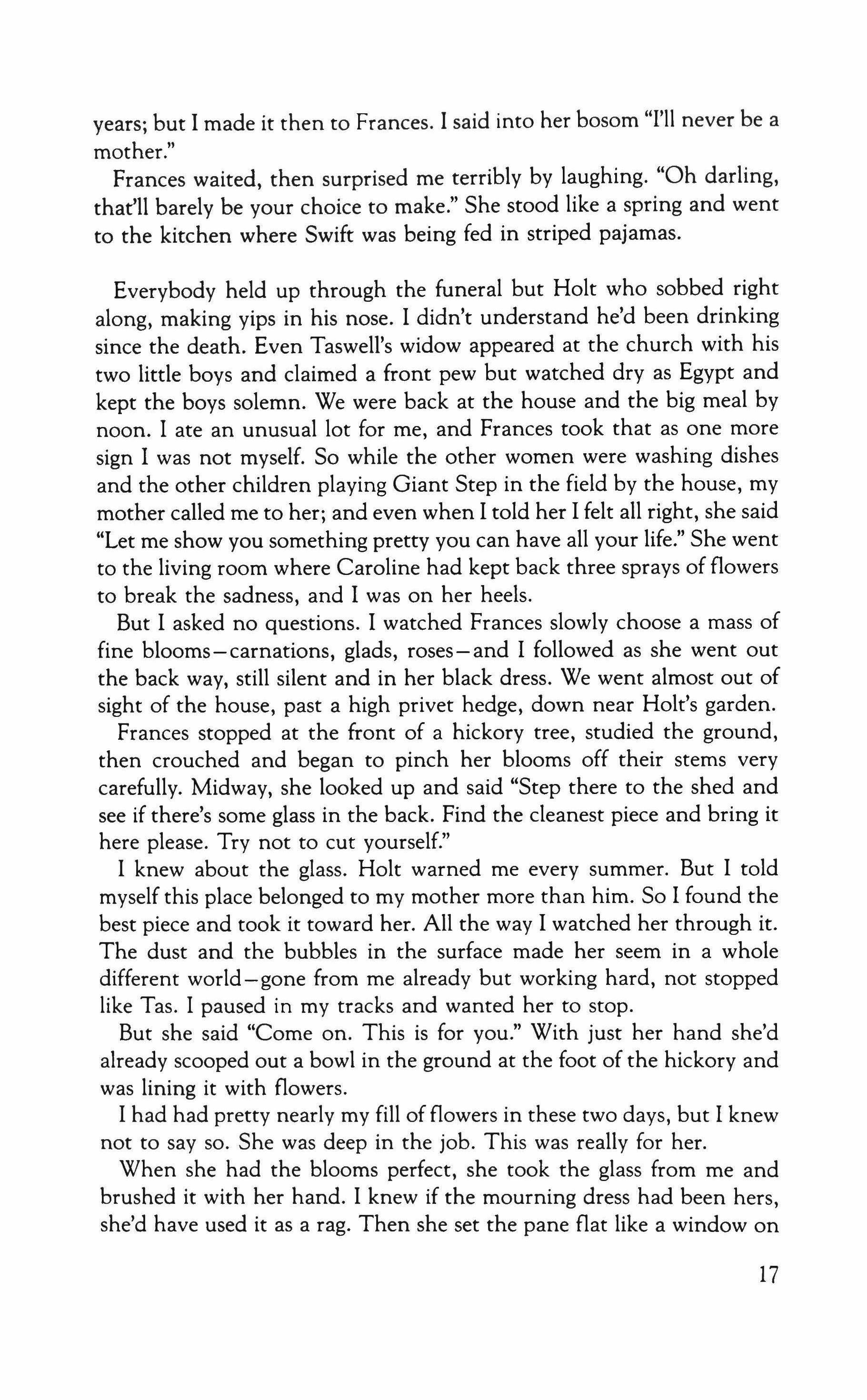
years; but I made it then to Frances. I said into her bosom "I'll never be a mother."
Frances waited, then surprised me terribly by laughing. "Oh darling, that'll barely be your choice to make." She stood like a spring and went to the kitchen where Swift was being fed in striped pajamas.
Everybody held up through the funeral but Holt who sobbed right along, making yips in his nose. I didn't understand he'd been drinking since the death. Even Taswell's widow appeared at the church with his two little boys and claimed a front pew but watched dryas Egypt and kept the boys solemn. We were back at the house and the big meal by noon. I ate an unusual lot for me, and Frances took that as one more sign I was not myself. So while the other women were washing dishes and the other children playing Giant Step in the field by the house, my mother called me to her; and even when I told her I felt all right, she said "Let me show you something pretty you can have all your life." She went to the living room where Caroline had kept back three sprays of flowers to break the sadness, and I was on her heels.
But I asked no questions. I watched Frances slowly choose a mass of fine blooms-carnations, glads, roses-and I followed as she went out the back way, still silent and in her black dress. We went almost out of sight of the house, past a high privet hedge, down near Holt's garden. Frances stopped at the front of a hickory tree, studied the ground, then crouched and began to pinch her blooms off their stems very carefully. Midway, she looked up and said "Step there to the shed and see if there's some glass in the back. Find the cleanest piece and bring it here please. Try not to cut yourself."
I knew about the glass. Holt warned me every summer. But I told myself this place belonged to my mother more than him. So I found the best piece and took it toward her. All the way I watched her through it. The dust and the bubbles in the surface made her seem in a whole different world-gone from me already but working hard, not stopped like Tas. I paused in my tracks and wanted her to stop.
But she said "Come on. This is for you." With just her hand she'd already scooped out a bowl in the ground at the foot of the hickory and was lining it with flowers.
I had had pretty nearly my fill of flowers in these two days, but I knew not to say so. She was deep in the job. This was really for her. When she had the blooms perfect, she took the glass from me and brushed it with her hand. I knew if the mourning dress had been hers, she'd have used it as a rag. Then she set the pane flat like a window on
17
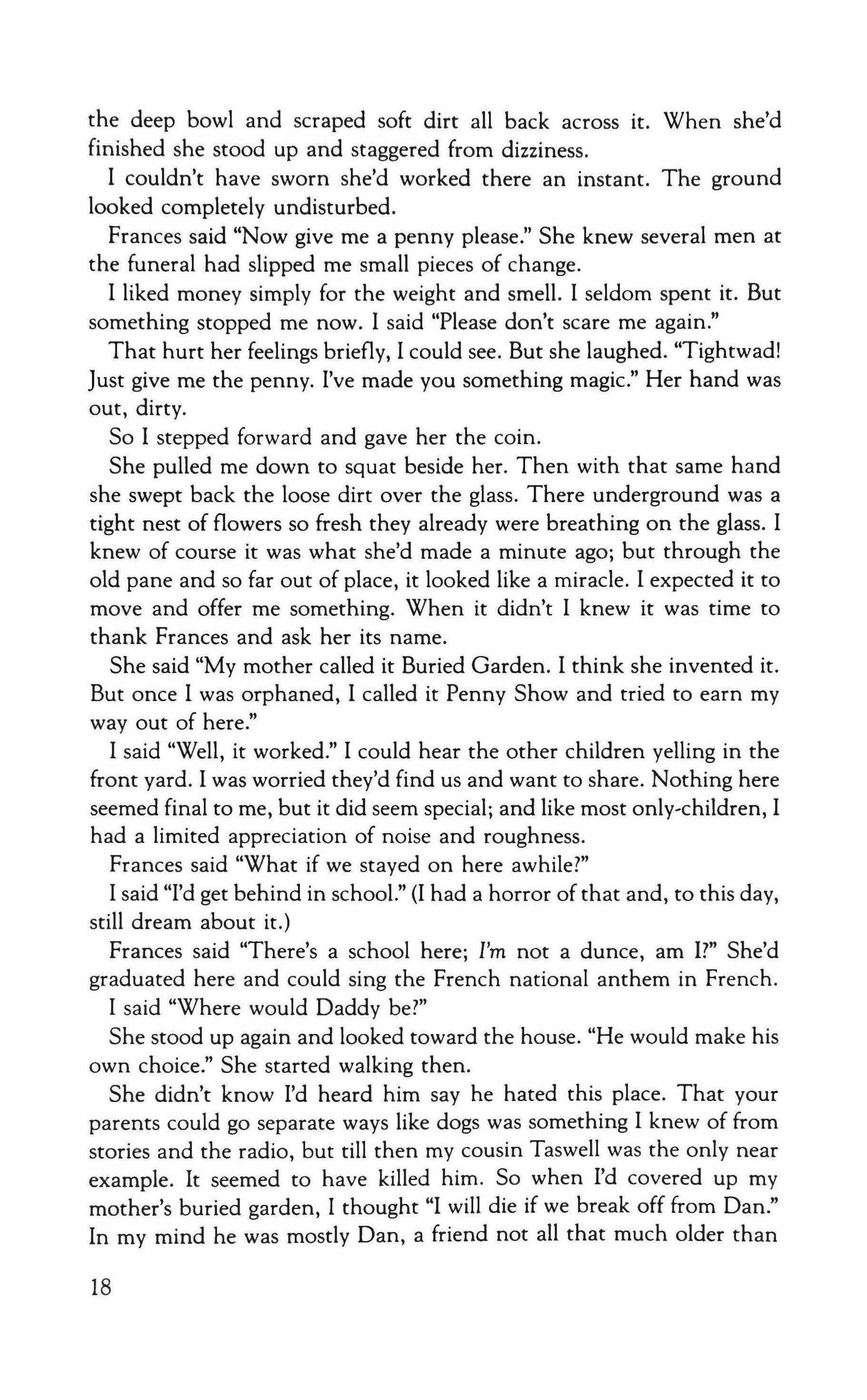
the deep bowl and scraped soft dirt all back across it. When she'd finished she stood up and staggered from dizziness.
I couldn't have sworn she'd worked there an instant. The ground looked completely undisturbed.
Frances said "Now give me a penny please." She knew several men at the funeral had slipped me small pieces of change.
I liked money simply for the weight and smell. I seldom spent it. But something stopped me now. I said "Please don't scare me again."
That hurt her feelings briefly, I could see. But she laughed. "Tightwad! Just give me the penny. I've made you something magic." Her hand was out, dirty.
So I stepped forward and gave her the coin.
She pulled me down to squat beside her. Then with that same hand she swept back the loose dirt over the glass. There underground was a tight nest of flowers so fresh they already were breathing on the glass. I knew of course it was what she'd made a minute ago; but through the old pane and so far out of place, it looked like a miracle. I expected it to move and offer me something. When it didn't I knew it was time to thank Frances and ask her its name.
She said "My mother called it Buried Garden. I think she invented it. But once I was orphaned, I called it Penny Show and tried to earn my way out of here."
I said "Well, it worked." I could hear the other children yelling in the front yard. I was worried they'd find us and want to share. Nothing here seemed final to me, but it did seem special; and like most only-children, I had a limited appreciation of noise and roughness.
Frances said "What if we stayed on here awhile?"
I said "I'd get behind in school." (I had a horror of that and, to this day, still dream about it.)
Frances said "There's a school here; J'm not a dunce, am I?" She'd graduated here and could sing the French national anthem in French. 1 said "Where would Daddy be?"
She stood up again and looked toward the house. "He would make his own choice." She started walking then.
She didn't know I'd heard him say he hated this place. That your parents could go separate ways like dogs was something 1 knew of from stories and the radio, but till then my cousin Taswell was the only near example. It seemed to have killed him. So when I'd covered up my mother's buried garden, 1 thought "I will die if we break off from Dan." In my mind he was mostly Dan, a friend not all that much older than
18

me who mattered like the world. But I followed Frances back to that house she'd been born in. Up till then I'd loved it.
By late afternoon the place was empty of all but immediate family. I'd considered picking up some more change by showing the garden, but then I decided to keep it a secret. When Frances went to our room for a nap, I went along and told her I planned to keep it private, but could she and I uncover it again just before we went home?
She said "Yes, if it's still there by then."
I knew not to press any harder now. She was down to her white slip and lying on her back. I undressed too and stretched beside her, keeping my dry body separate from hers but close enough to feel her heat through the space. In a minute she was breathing like genuine sleep but I didn't try. I was used to much more peace than I'd had in the past three days, and I saw this as a chance to think about troubles that had stacked up behind me. Despite the funeral, death really wasn't one. I've said I like Tas, but I never leaned on him. I naturally worried about my parents. The worse ache though was knowing I was grown, in my mind at least, and how little that helped me change awful things. Nothing told me my mother would be dead in four hours and my young father with her; but I felt, like an icepick thrust in my side, that safety had endedmy personal safety, guaranteed by people who made me their duty. I was now the one to protect myself. Surprise and pain and being captured were my fears. Gentle as I was, I couldn't imagine steady days of defend, ing myself. The only girl I'd read about who went on her own was Joan of Are, and they killed her horribly before she left her teens. I didn't shut an eye, but I pure forgot Frances. When the door opened silently an hour later (nobody knocked here and no lock worked), I knew it was something coming at me-my first public trial.
It was Swift. Even dim as the room was now, he didn't look that much older than boys in my grade who'd failed once or twice. He caught my eye and whispered "Is she tired?"
I nodded in the pillow.
But he came on anyhow and stood two feet from my side of the bed. I hated him suddenly. There was no present reason (except the way his hair shingled out from his neck like a stiff cheap wig), but I'd heard Dan say a lot against him through the years. He held down a job clerking men's clothes in Warrenton; but he still lived at home and used Caroline his mother like a servant-though he always had some ignorant girl slung round his neck, pretty as babyteeth. He'd ride them to Raleigh just to eat chow mein or wrap them in flowers for some summer dance and
19
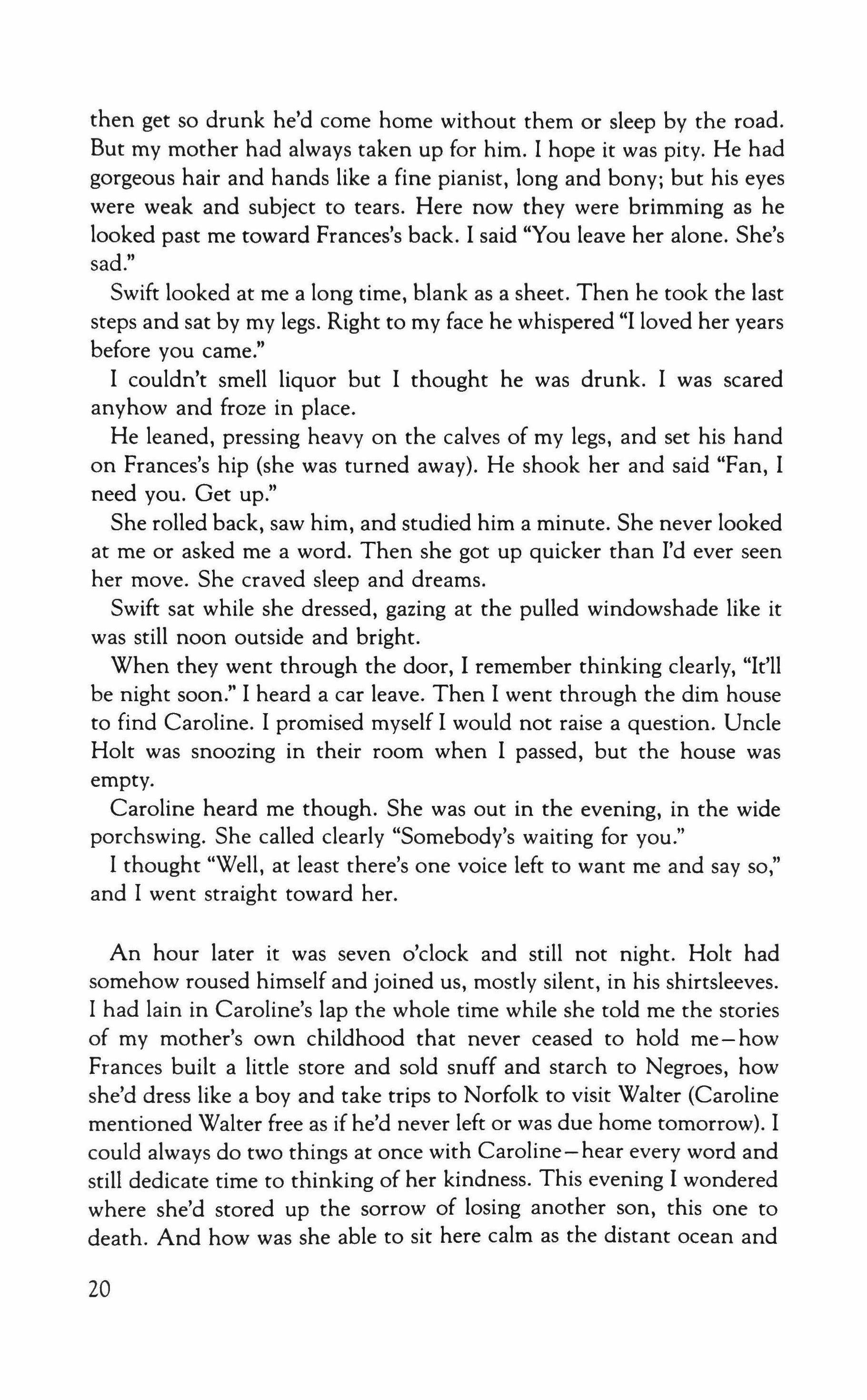
then get so drunk he'd come home without them or sleep by the road. But my mother had always taken up for him. I hope it was pity. He had gorgeous hair and hands like a fine pianist, long and bony; but his eyes were weak and subject to tears. Here now they were brimming as he looked past me toward Frances's back. I said "You leave her alone. She's sad."
Swift looked at me a long time, blank as a sheet. Then he took the last steps and sat by my legs. Right to my face he whispered "I loved her years before you came."
I couldn't smell liquor but I thought he was drunk. I was scared anyhow and froze in place.
He leaned, pressing heavy on the calves of my legs, and set his hand on Frances's hip (she was turned away). He shook her and said "Fan, I need you. Get up."
She rolled back, saw him, and studied him a minute. She never looked at me or asked me a word. Then she got up quicker than I'd ever seen her move. She craved sleep and dreams.
Swift sat while she dressed, gazing at the pulled windowshade like it was still noon outside and bright.
When they went through the door, I remember thinking clearly, "It'll be night soon." I heard a car leave. Then I went through the dim house to find Caroline. I promised myself I would not raise a question. Uncle Holt was snoozing in their room when I passed, but the house was empty.
Caroline heard me though. She was out in the evening, in the wide porchswing. She called clearly "Somebody's waiting for you."
I thought "Well, at least there's one voice left to want me and say so," and I went straight toward her.
An hour later it was seven o'clock and still not night. Holt had somehow roused himself and joined us, mostly silent, in his shirtsleeves. I had lain in Caroline's lap the whole time while she told me the stories of my mother's own childhood that never ceased to hold me-how Frances built a little store and sold snuff and starch to Negroes, how she'd dress like a boy and take trips to Norfolk to visit Walter (Caroline mentioned Walter free as if he'd never left or was due home tomorrow). I could always do two things at once with Caroline-hear every word and still dedicate time to thinking of her kindness. This evening I wondered where she'd stored up the sorrow of losing another son, this one to death. And how was she able to sit here calm as the distant ocean and
20
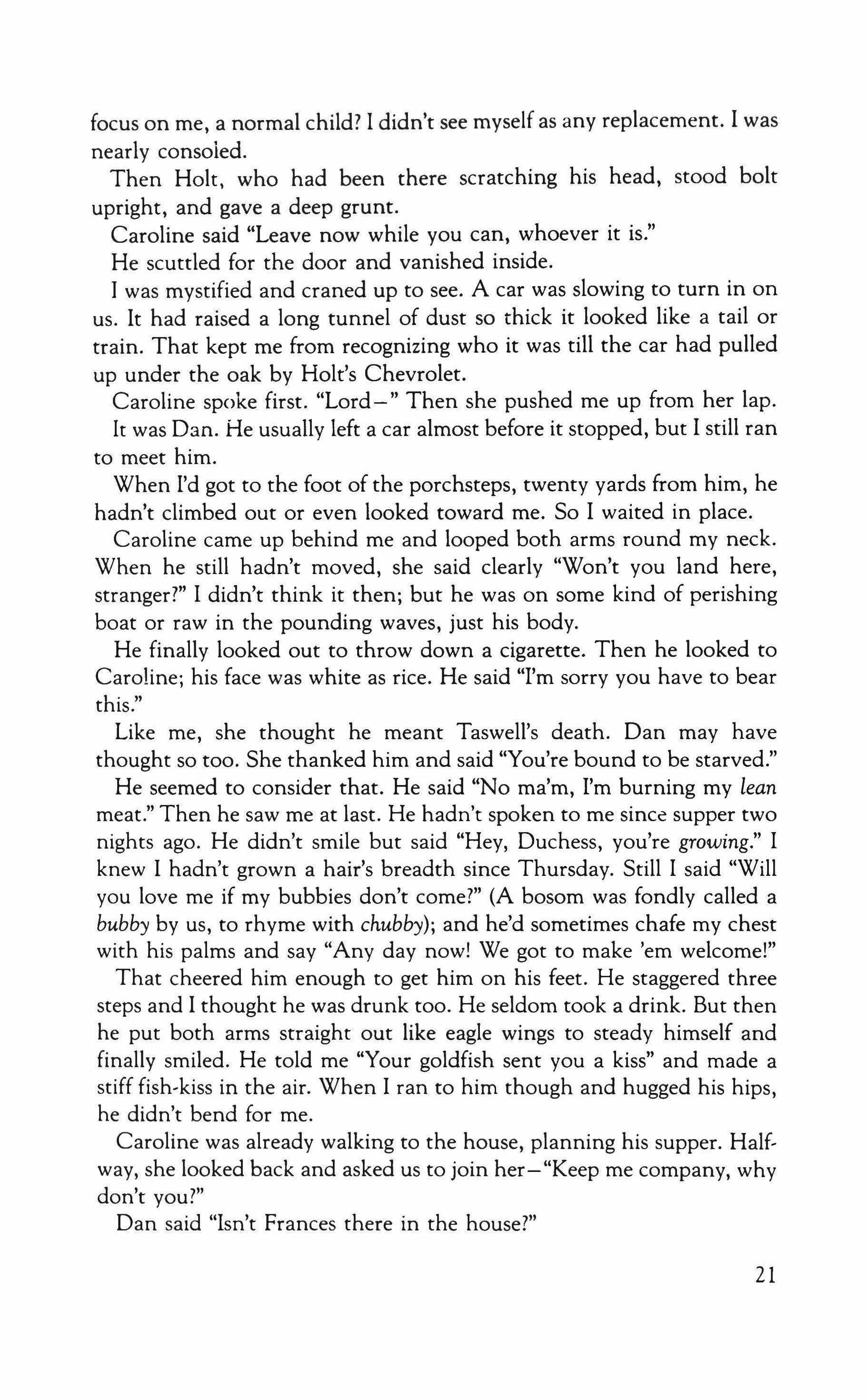
focus on me, a normal child? I didn't see myself as any replacement. I was nearly consoled.
Then Holt, who had been there scratching his head, stood bolt upright, and gave a deep grunt.
Caroline said "Leave now while you can, whoever it is."
He scuttled for the door and vanished inside. I was mystified and craned up to see. A car was slowing to turn in on us. It had raised a long tunnel of dust so thick it looked like a tail or train. That kept me from recognizing who it was till the car had pulled up under the oak by Holt's Chevrolet.
Caroline spoke first. "Lord-" Then she pushed me up from her lap. It was Dan. He usually left a car almost before it stopped, but I still ran to meet him.
When I'd got to the foot of the porchsteps, twenty yards from him, he hadn't climbed out or even looked toward me. So I waited in place.
Caroline came up behind me and looped both arms round my neck. When he still hadn't moved, she said clearly "Won't you land here, stranger?" I didn't think it then; but he was on some kind of perishing boat or raw in the pounding waves, just his body. He finally looked out to throw down a cigarette. Then he looked to Caroline; his face was white as rice. He said "I'm sorry you have to bear this."
Like me, she thought he meant Taswell's death. Dan may have thought so too. She thanked him and said "You're bound to be starved."
He seemed to consider that. He said "No ma'm, I'm burning my lean meat." Then he saw me at last. He hadn't spoken to me since supper two nights ago. He didn't smile but said "Hey, Duchess, you're growing." I knew I hadn't grown a hair's breadth since Thursday. Still I said "Will you love me if my bubbies don't come?" (A bosom was fondly called a bubby by us, to rhyme with chubby); and he'd sometimes chafe my chest with his palms and say "Any day now! We got to make 'em welcome!"
That cheered him enough to get him on his feet. He staggered three steps and I thought he was drunk too. He seldom took a drink. But then he put both arms straight out like eagle wings to steady himself and finally smiled. He told me "Your goldfish sent you a kiss" and made a stiff fish-kiss in the air. When I ran to him though and hugged his hips, he didn't bend for me.
Caroline was already walking to the house, planning his supper. Halfway, she looked back and asked us to join her-"Keep me company, why don't you?"
Dan said "Isn't Frances there in the house?"
21
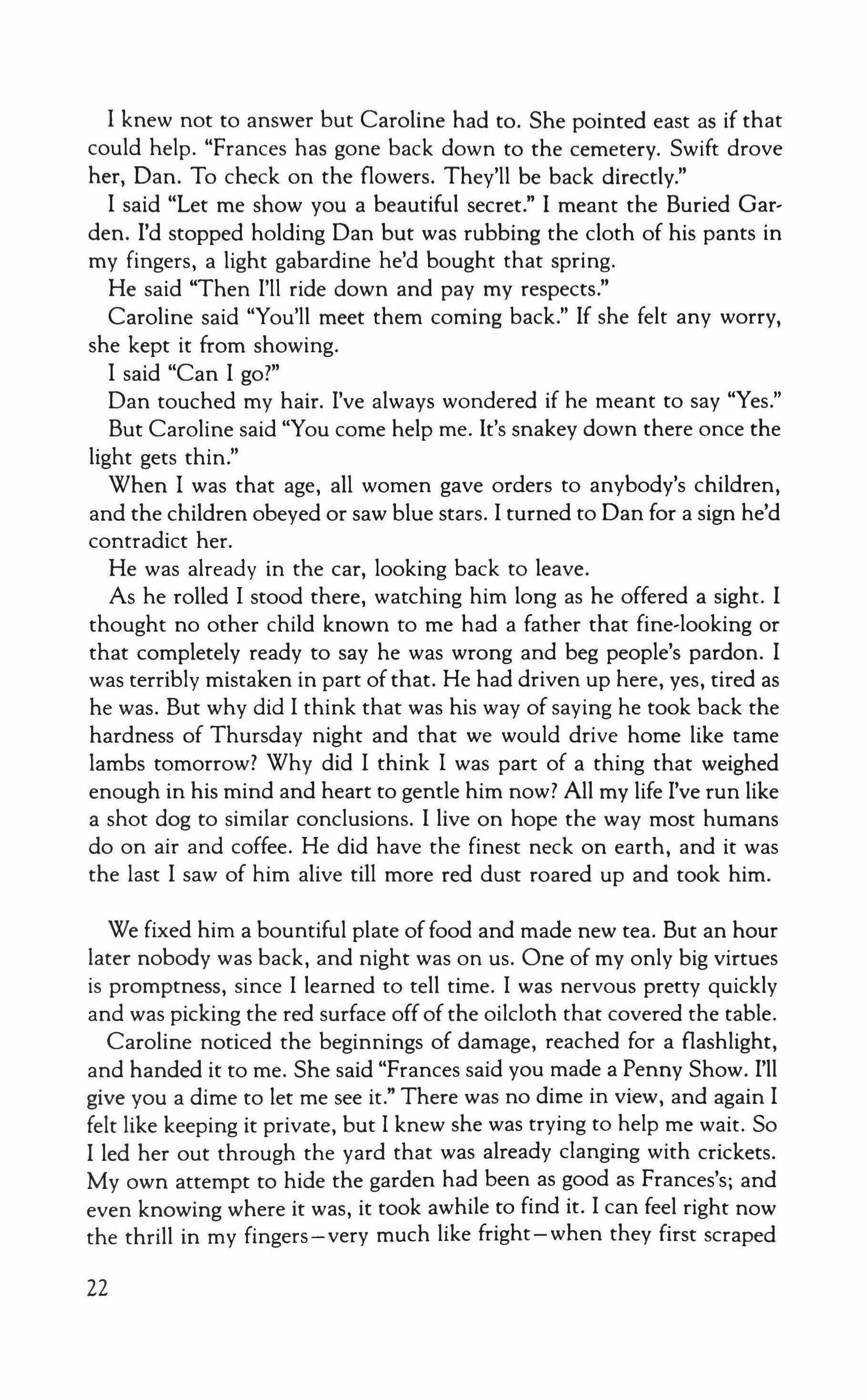
I knew not to answer but Caroline had to. She pointed east as if that could help. "Frances has gone back down to the cemetery. Swift drove her, Dan. To check on the flowers. They'll be back directly."
I said "Let me show you a beautiful secret." I meant the Buried Garden. I'd stopped holding Dan but was rubbing the cloth of his pants in my fingers, a light gabardine he'd bought that spring.
He said "Then I'll ride down and pay my respects."
Caroline said "You'll meet them coming back." If she felt any worry, she kept it from showing.
I said "Can I go?"
Dan touched my hair. I've always wondered if he meant to say "Yes."
But Caroline said "You come help me. It's snakey down there once the light gets thin."
When I was that age, all women gave orders to anvbodv's children, and the children obeyed or saw blue stars. I turned to Dan for a sign he'd contradict her.
He was already in the car, looking back to leave.
As he rolled I stood there, watching him long as he offered a sight. I thought no other child known to me had a father that fine-looking or that completely ready to say he was wrong and beg people's pardon. I was terribly mistaken in part of that. He had driven up here, yes, tired as he was. But why did I think that was his way of saying he took back the hardness of Thursday night and that we would drive home like tame lambs tomorrow? Why did I think I was part of a thing that weighed enough in his mind and heart to gentle him now? All my life I've run like a shot dog to similar conclusions. I live on hope the way most humans do on air and coffee. He did have the finest neck on earth, and it was the last I saw of him alive till more red dust roared up and took him.
We fixed him a bountiful plate of food and made new tea. But an hour later nobody was back, and night was on us. One of my only big virtues is promptness, since I learned to tell time. I was nervous pretty quickly and was picking the red surface off of the oilcloth that covered the table.
Caroline noticed the beginnings of damage, reached for a flashlight, and handed it to me. She said "Frances said you made a Penny Show. I'll give you a dime to let me see it." There was no dime in view, and again I felt like keeping it private, but I knew she was trying to help me wait. So I led her out through the yard that was already clanging with crickets. My own attempt to hide the garden had been as good as Frances's; and even knowing where it was, it took awhile to find it. I can feel right now the thrill in my fingers-very much like fright-when they first scraped
22
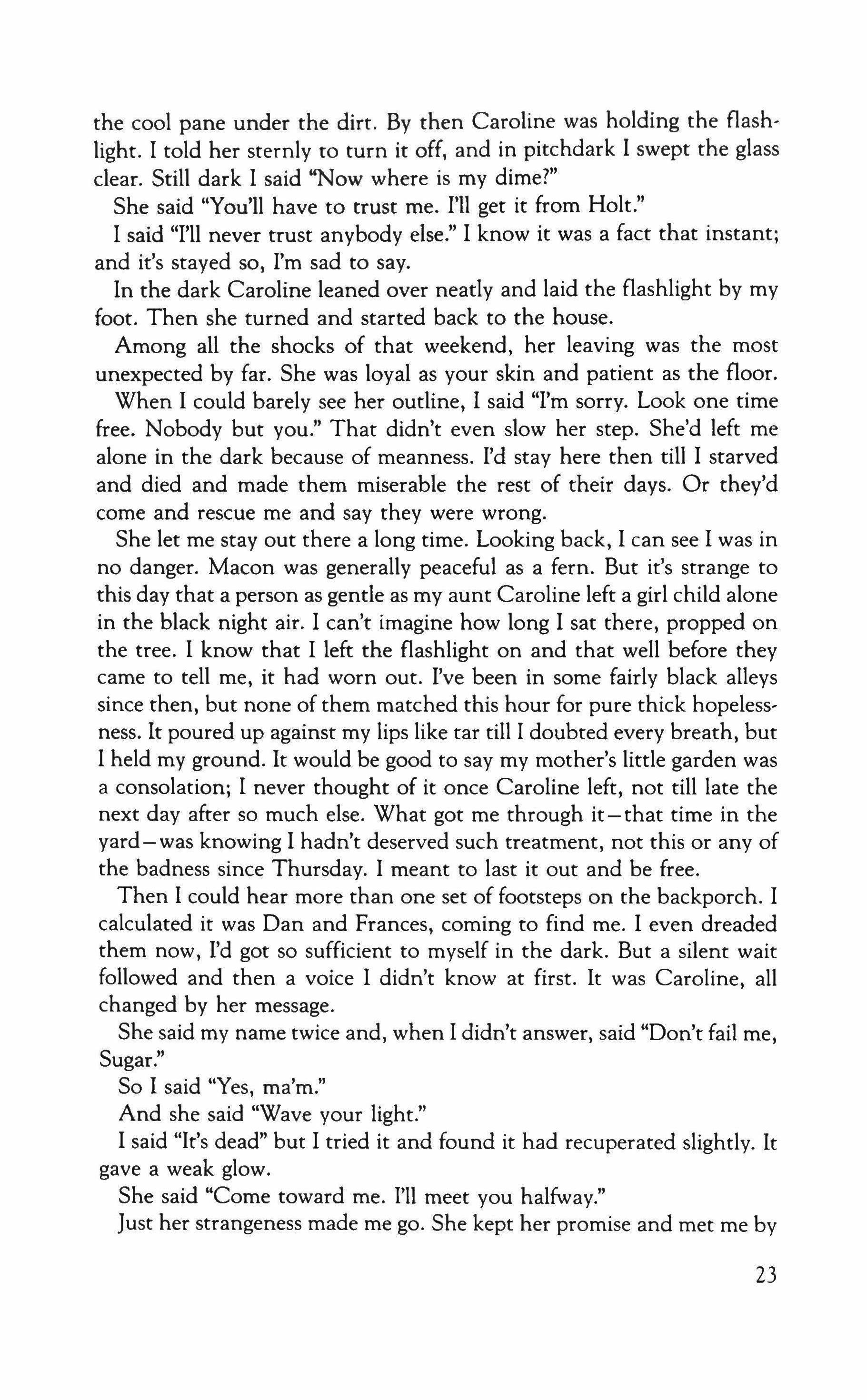
the cool pane under the dirt. By then Caroline was holding the flashlight. I told her sternly to turn it off, and in pitchdark I swept the glass clear. Still dark I said "Now where is my dime?"
She said "You'll have to trust me. I'll get it from Holt."
I said "I'll never trust anybody else." I know it was a fact that instant; and it's stayed so, I'm sad to say.
In the dark Caroline leaned over neatly and laid the flashlight by my foot. Then she turned and started back to the house.
Among all the shocks of that weekend, her leaving was the most unexpected by far. She was loyal as your skin and patient as the floor.
When I could barely see her outline, I said "I'm sorry. Look one time free. Nobody but you." That didn't even slow her step. She'd left me alone in the dark because of meanness. I'd stay here then till I starved and died and made them miserable the rest of their days. Or they'd come and rescue me and say they were wrong.
She let me stay out there a long time. Looking back, I can see I was in no danger. Macon was generally peaceful as a fern. But it's strange to this day that a person as gentle as my aunt Caroline left a girl child alone in the black night air. I can't imagine how long I sat there, propped on the tree. I know that I left the flashlight on and that well before they came to tell me, it had worn out. I've been in some fairly black alleys since then, but none of them matched this hour for pure thick hopelessness. It poured up against my lips like tar till I doubted every breath, but I held my ground. It would be good to say my mother's little garden was a consolation; I never thought of it once Caroline left, not till late the next day after so much else. What got me through it - that time in the yard - was knowing I hadn't deserved such treatment, not this or any of the badness since Thursday. I meant to last it out and be free.
Then I could hear more than one set of footsteps on the backporch. I calculated it was Dan and Frances, coming to find me. I even dreaded them now, I'd got so sufficient to myself in the dark. But a silent wait followed and then a voice I didn't know at first. It was Caroline, all changed by her message.
She said my name twice and, when I didn't answer, said "Don't fail me, Sugar."
So I said "Yes, ma'm."
And she said "Wave your light."
I said "It's dead" but I tried it and found it had recuperated slightly. It gave a weak glow.
She said "Come toward me. I'll meet you halfway."
Just her strangeness made me go. She kept her promise and met me by
23
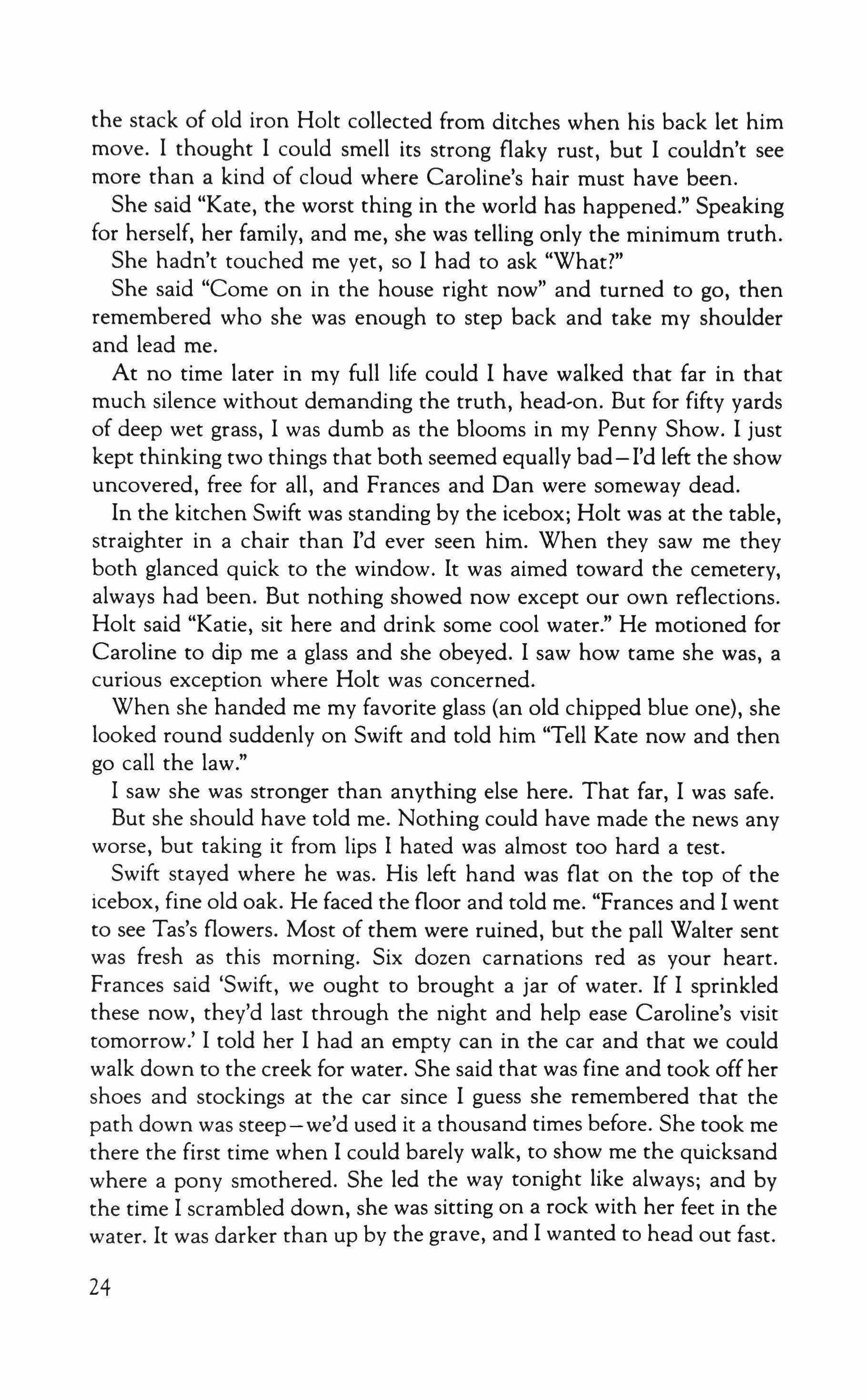
the stack of old iron Holt collected from ditches when his back let him move. I thought I could smell its strong flaky rust, but I couldn't see more than a kind of cloud where Caroline's hair must have been.
She said "Kate, the worst thing in the world has happened." Speaking for herself, her family, and me, she was telling only the minimum truth. She hadn't touched me yet, so I had to ask "What?"
She said "Come on in the house right now" and turned to go, then remembered who she was enough to step back and take my shoulder and lead me.
At no time later in my full life could I have walked that far in that much silence without demanding the truth, head-on. But for fifty yards of deep wet grass, I was dumb as the blooms in my Penny Show. I just kept thinking two things that both seemed equally bad-I'd left the show uncovered, free for all, and Frances and Dan were someway dead.
In the kitchen Swift was standing by the icebox; Holt was at the table, straighter in a chair than I'd ever seen him. When they saw me they both glanced quick to the window. It was aimed toward the cemetery, always had been. But nothing showed now except our own reflections. Holt said "Katie, sit here and drink some cool water." He motioned for Caroline to dip me a glass and she obeyed. I saw how tame she was, a curious exception where Holt was concerned.
When she handed me my favorite glass (an old chipped blue one), she looked round suddenly on Swift and told him "Tell Kate now and then go call the law."
I saw she was stronger than anything else here. That far, I was safe. But she should have told me. Nothing could have made the news any worse, but taking it from lips I hated was almost too hard a test.
Swift stayed where he was. His left hand was flat on the top of the icebox, fine old oak. He faced the floor and told me. "Frances and I went to see Tas's flowers. Most of them were ruined, but the pall Walter sent was fresh as this morning. Six dozen carnations red as your heart. Frances said 'Swift, we ought to brought a jar of water. If I sprinkled these now, they'd last through the night and help ease Caroline's visit tomorrow.' I told her I had an empty can in the car and that we could walk down to the creek for water. She said that was fine and took off her shoes and stockings at the car since I guess she remembered that the path down was steep-we'd used it a thousand times before. She took me there the first time when I could barely walk, to show me the quicksand where a pony smothered. She led the way tonight like always; and by the time I scrambled down, she was sitting on a rock with her feet in the water. It was darker than up by the grave, and I wanted to head out fast.
24
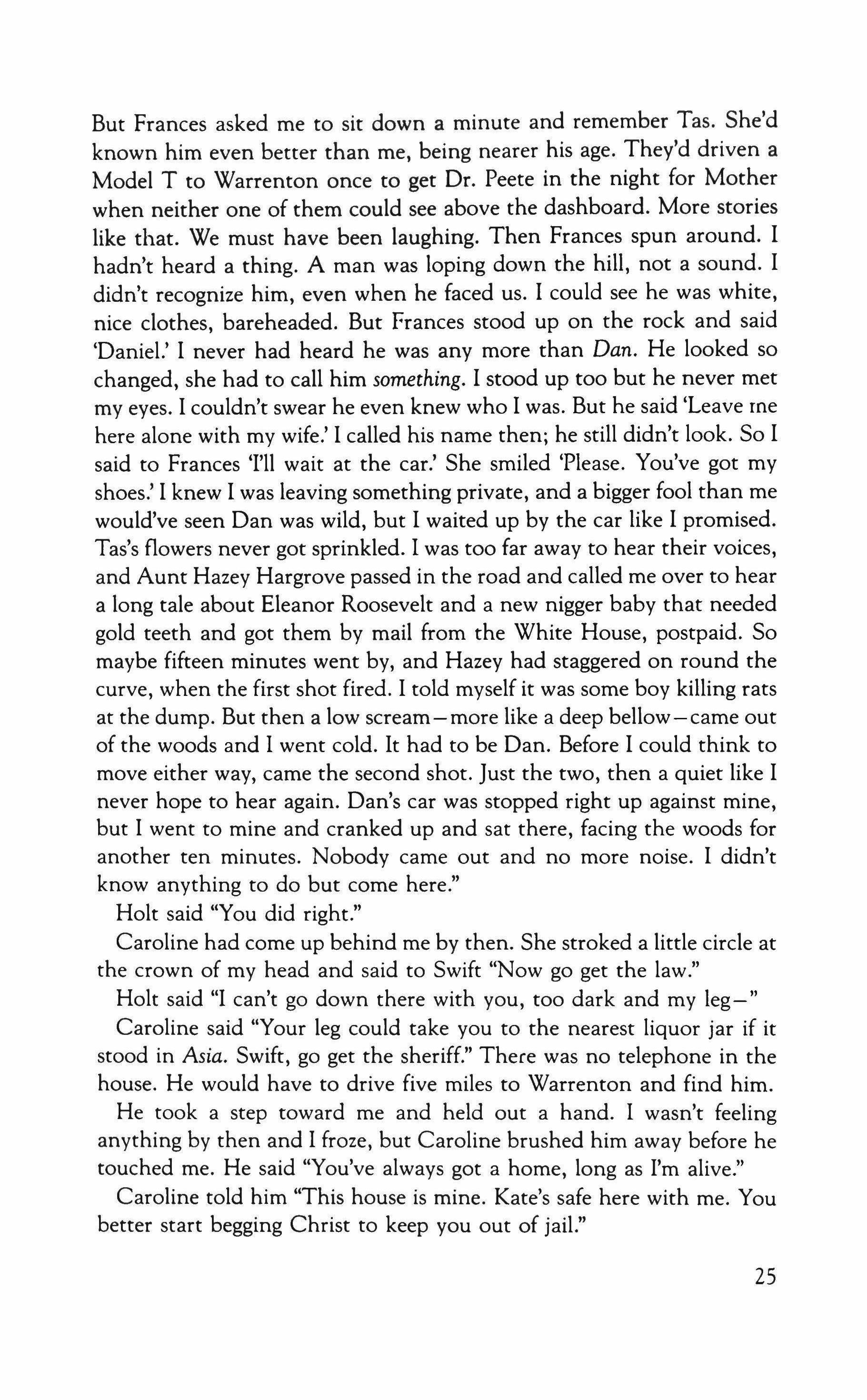
But Frances asked me to sit down a minute and remember Tas. She'd known him even better than me, being nearer his age. They'd driven a Model T to Warrenton once to get Dr. Peete in the night for Mother when neither one of them could see above the dashboard. More stories like that. We must have been laughing. Then Frances spun around. I hadn't heard a thing. A man was loping down the hill, not a sound. I didn't recognize him, even when he faced us. I could see he was white, nice clothes, bareheaded. But Frances stood up on the rock and said 'Daniel.' I never had heard he was any more than Dan. He looked so changed, she had to call him something. I stood up too but he never met my eyes. I couldn't swear he even knew who I was. But he said 'Leave me here alone with my wife.' I called his name then; he still didn't look. So I said to Frances 'I'll wait at the car.' She smiled 'Please. You've got my shoes.' I knew I was leaving something private, and a bigger fool than me would've seen Dan was wild, but I waited up by the car like I promised. Tas's flowers never got sprinkled. I was too far away to hear their voices, and Aunt Hazey Hargrove passed in the road and called me over to hear a long tale about Eleanor Roosevelt and a new nigger baby that needed gold teeth and got them by mail from the White House, postpaid. So maybe fifteen minutes went by, and Hazey had staggered on round the curve, when the first shot fired. I told myself it was some boy killing rats at the dump. But then a low scream - more like a deep bellow - came out of the woods and I went cold. It had to be Dan. Before I could think to move either way, came the second shot. Just the two, then a quiet like I never hope to hear again. Dan's car was stopped right up against mine, but 1 went to mine and cranked up and sat there, facing the woods for another ten minutes. Nobody came out and no more noise. I didn't know anything to do but come here."
Holt said "You did right."
Caroline had come up behind me by then. She stroked a little circle at the crown of my head and said to Swift "Now go get the law."
Holt said "I can't go down there with you, too dark and my leg-"
Caroline said "Your leg could take you to the nearest liquor jar if it stood in Asia. Swift, go get the sheriff." There was no telephone in the house. He would have to drive five miles to Warrenton and find him. He took a step toward me and held out a hand. 1 wasn't feeling anything by then and 1 froze, but Caroline brushed him away before he touched me. He said "You've always got a home, long as I'm alive."
Caroline told him "This house is mine. Kate's safe here with me. You better start begging Christ to keep you out of jail."
25
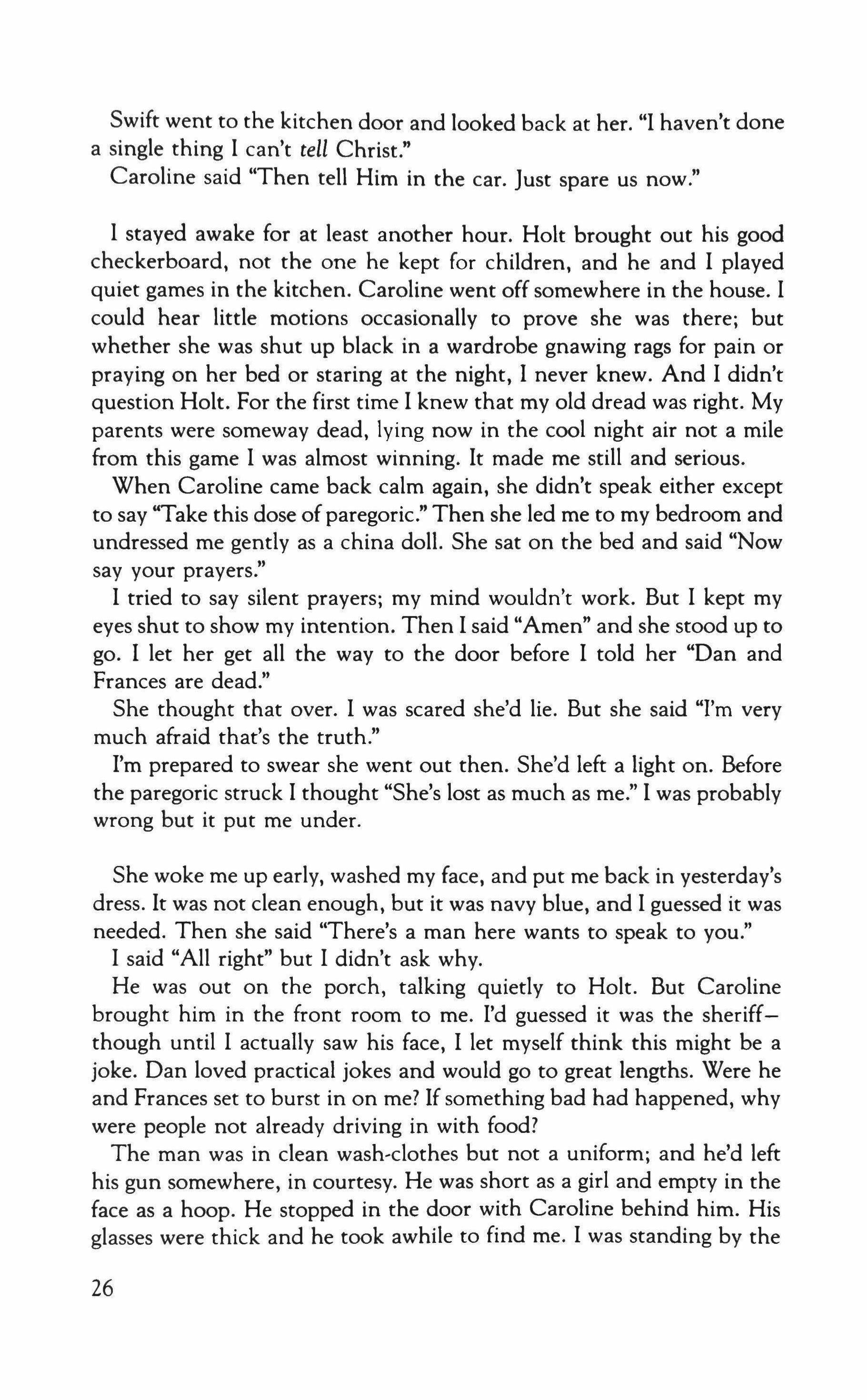
Swift went to the kitchen door and looked back at her. "I haven't done a single thing I can't tell Christ."
Caroline said "Then tell Him in the car. Just spare us now."
I stayed awake for at least another hour. Holt brought out his good checkerboard, not the one he kept for children, and he and I played quiet games in the kitchen. Caroline went off somewhere in the house. I could hear little motions occasionally to prove she was there; but whether she was shut up black in a wardrobe gnawing rags for pain or praying on her bed or staring at the night, I never knew. And I didn't question Holt. For the first time I knew that myoid dread was right. My parents were someway dead, lying now in the cool night air not a mile from this game I was almost winning. It made me still and serious. When Caroline came back calm again, she didn't speak either except to say "Take this dose ofparegoric." Then she led me to my bedroom and undressed me gently as a china doll. She sat on the bed and said "Now say your prayers."
I tried to say silent prayers; my mind wouldn't work. But I kept my eyes shut to show my intention. Then I said "Amen" and she stood up to go. I let her get all the way to the door before I told her "Dan and Frances are dead."
She thought that over. I was scared she'd lie. But she said "I'm very much afraid that's the truth."
I'm prepared to swear she went out then. She'd left a light on. Before the paregoric struck I thought "She's lost as much as me." I was probably wrong but it put me under.
She woke me up early, washed my face, and put me back in yesterday's dress. It was not clean enough, but it was navy blue, and I guessed it was needed. Then she said "There's a man here wants to speak to you."
I said "All right" but I didn't ask why.
He was out on the porch, talking quietly to Holt. But Caroline brought him in the front room to me. I'd guessed it was the sheriffthough until I actually saw his face, I let myself think this might be a joke. Dan loved practical jokes and would go to great lengths. Were he and Frances set to burst in on me? If something bad had happened, why were people not already driving in with food?
The man was in clean wash-clothes but not a uniform; and he'd left his gun somewhere, in courtesy. He was short as a girl and empty in the face as a hoop. He stopped in the door with Caroline behind him. His glasses were thick and he took awhile to find me. I was standing by the
26
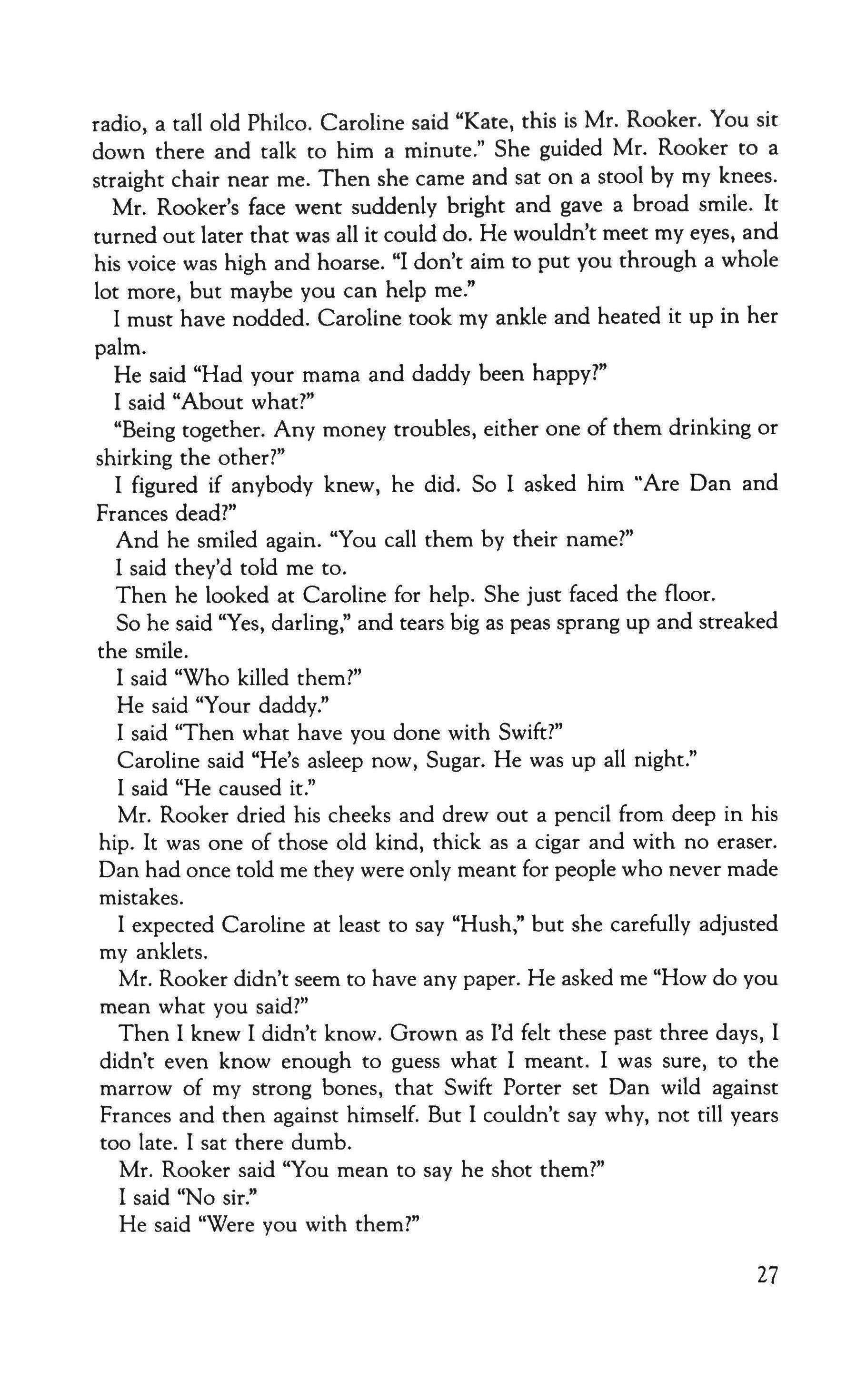
radio, a tall old Philco. Caroline said "Kate, this is Mr. Rooker. You sit down there and talk to him a minute." She guided Mr. Rooker to a straight chair near me. Then she came and sat on a stool by my knees.
Mr. Rooker's face went suddenly bright and gave a broad smile. It turned out later that was all it could do. He wouldn't meet my eyes, and his voice was high and hoarse. "I don't aim to put you through a whole lot more, but maybe you can help me."
I must have nodded. Caroline took my ankle and heated it up in her palm.
He said "Had your mama and daddy been happy?"
I said "About what?"
"Being together. Any money troubles, either one of them drinking or shirking the other?"
I figured if anybody knew, he did. So I asked him "Are Dan and Frances dead?"
And he smiled again. "You call them by their name?"
I said they'd told me to.
Then he looked at Caroline for help. She just faced the floor.
So he said "Yes, darling," and tears big as peas sprang up and streaked the smile.
I said "Who killed them?"
He said "Your daddy."
I said "Then what have you done with Swift?"
Caroline said "He's asleep now, Sugar. He was up all night."
I said "He caused it."
Mr. Rooker dried his cheeks and drew out a pencil from deep in his hip. It was one of those old kind, thick as a cigar and with no eraser. Dan had once told me they were only meant for people who never made mistakes.
I expected Caroline at least to say "Hush," but she carefully adjusted my anklets.
Mr. Rooker didn't seem to have any paper. He asked me "How do you mean what you said?"
Then I knew I didn't know. Grown as I'd felt these past three days, I didn't even know enough to guess what I meant. I was sure, to the marrow of my strong bones, that Swift Porter set Dan wild against Frances and then against himself. But I couldn't say why, not till years too late. I sat there dumb.
Mr. Rooker said "You mean to say he shot them?"
I said "No sir."
He said "Were you with them?"
27
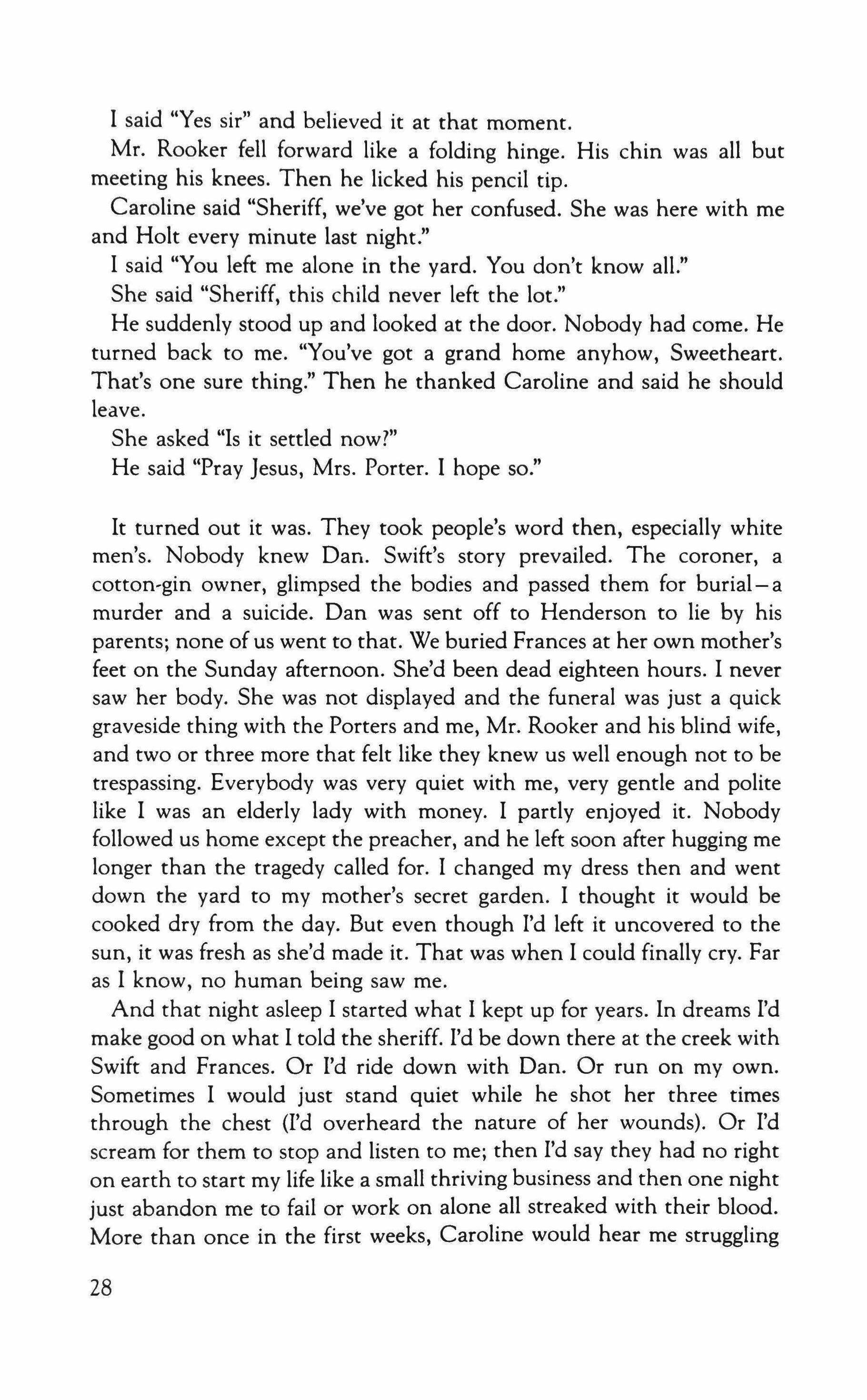
I said "Yes sir" and believed it at that moment. Mr. Rooker fell forward like a folding hinge. His chin was all but meeting his knees. Then he licked his pencil tip.
Caroline said "Sheriff, we've got her confused. She was here with me and Holt every minute last night."
I said "You left me alone in the yard. You don't know all."
She said "Sheriff, this child never left the lot."
He suddenly stood up and looked at the door. Nobody had come. He turned back to me. "You've got a grand home anyhow, Sweetheart. That's one sure thing." Then he thanked Caroline and said he should leave.
She asked "Is it settled now?"
He said "Pray Jesus, Mrs. Porter. I hope so."
It turned out it was. They took people's word then, especially white men's. Nobody knew Dan. Swift's story prevailed. The coroner, a cotton-gin owner, glimpsed the bodies and passed them for burial-a murder and a suicide. Dan was sent off to Henderson to lie by his parents; none of us went to that. We buried Frances at her own mother's feet on the Sunday afternoon. She'd been dead eighteen hours. I never saw her body. She was not displayed and the funeral was just a quick graveside thing with the Porters and me, Mr. Rooker and his blind wife, and two or three more that felt like they knew us well enough not to be trespassing. Everybody was very quiet with me, very gentle and polite like I was an elderly lady with money. I partly enjoyed it. Nobody followed us home except the preacher, and he left soon after hugging me longer than the tragedy called for. I changed my dress then and went down the yard to my mother's secret garden. I thought it would be cooked dry from the day. But even though I'd left it uncovered to the sun, it was fresh as she'd made it. That was when I could finally cry. Far as I know, no human being saw me.
And that night asleep I started what I kept up for years. In dreams I'd make good on what I told the sheriff. I'd be down there at the creek with Swift and Frances. Or I'd ride down with Dan. Or run on my own. Sometimes I would just stand quiet while he shot her three times through the chest (I'd overheard the nature of her wounds). Or I'd scream for them to stop and listen to me; then I'd say they had no right on earth to start my life like a small thriving business and then one night just abandon me to fail or work on alone all streaked with their blood. More than once in the first weeks, Caroline would hear me struggling
28
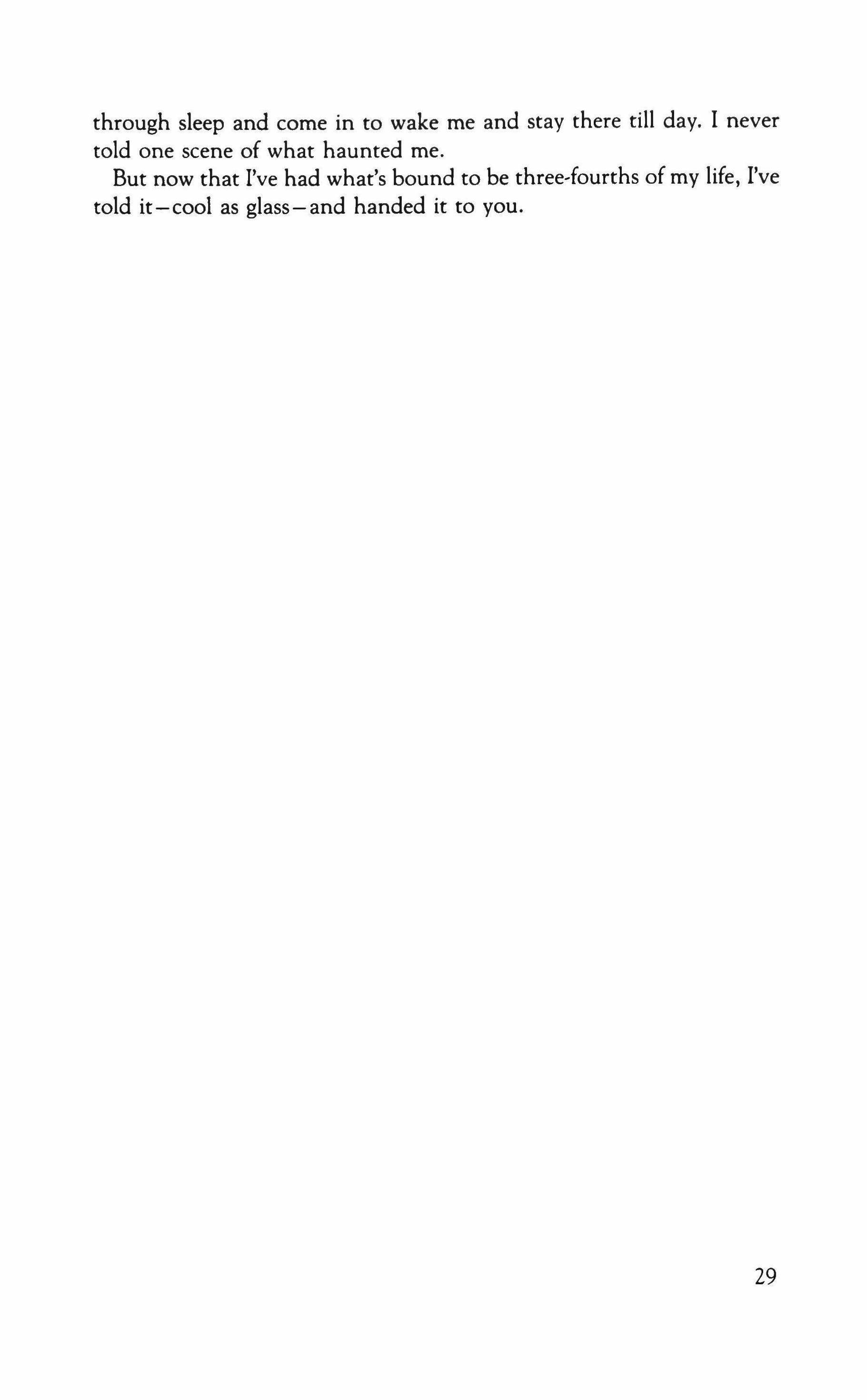
through sleep and come in to wake me and stay there till day. I never told one scene of what haunted me. But now that I've had what's bound to be three-fourths of my life, I've told it-cool as glass-and handed it to you.
29
Elephant Bait
Daniel Wallace

My dearest, lovely, sweet one, [eena,
The mailman brought me your letter today, along with my heating bill and the news that I may already be a winner.
Of course, I opened your letter first thing. And I read it. And my heart broke into one million pieces. It did. That's what you wanted and that's what's happened, words like tiny ice-picks in my heart. I can't even think about it now. I have to sit down if I accidentally think about it. The words, jeena. The phrases. What was it? What was it you called me? "The worst man in the world." That was it. And the word hate. You used that word a great deal. It did everything to me, [eena, that one word. I was nothing after I read that word. Nothing. I'm done in, jeena. I'm all through. There is just enough left in me to write this letter, so listen to me. Please. jeena? Listen: My heating bill for the month of january is $39.74 - a fair assessment, I think. As soon as I finish this letter I'm going to write a check for that amount, but give some thought to it, please, jeena, before I do: at least thirteen dollars, or one-third of this bill, was spent keeping you warm and happy, baby, and no more than a dollar thirty-four was allotted to Karen, who was also cold. See: I've worked it all out, sweetheart! That's $1.34, [eena; one dollar and thirty-four cents. Now, does that make me the worst man in the world? Does a lousy dollar thirty-four make me the worst man in the world? Especially when you think in fractions: she was one-thirteenth, sugar, of what you mean to me. We're talking the tiniest fractions when we're talking about that woman, whose name I realize now I shouldn't have mentioned, the tiniest fractions. In other words, jeena, love, what's missing from your letter is perspective. just look at the numbers! They speak for them-
30
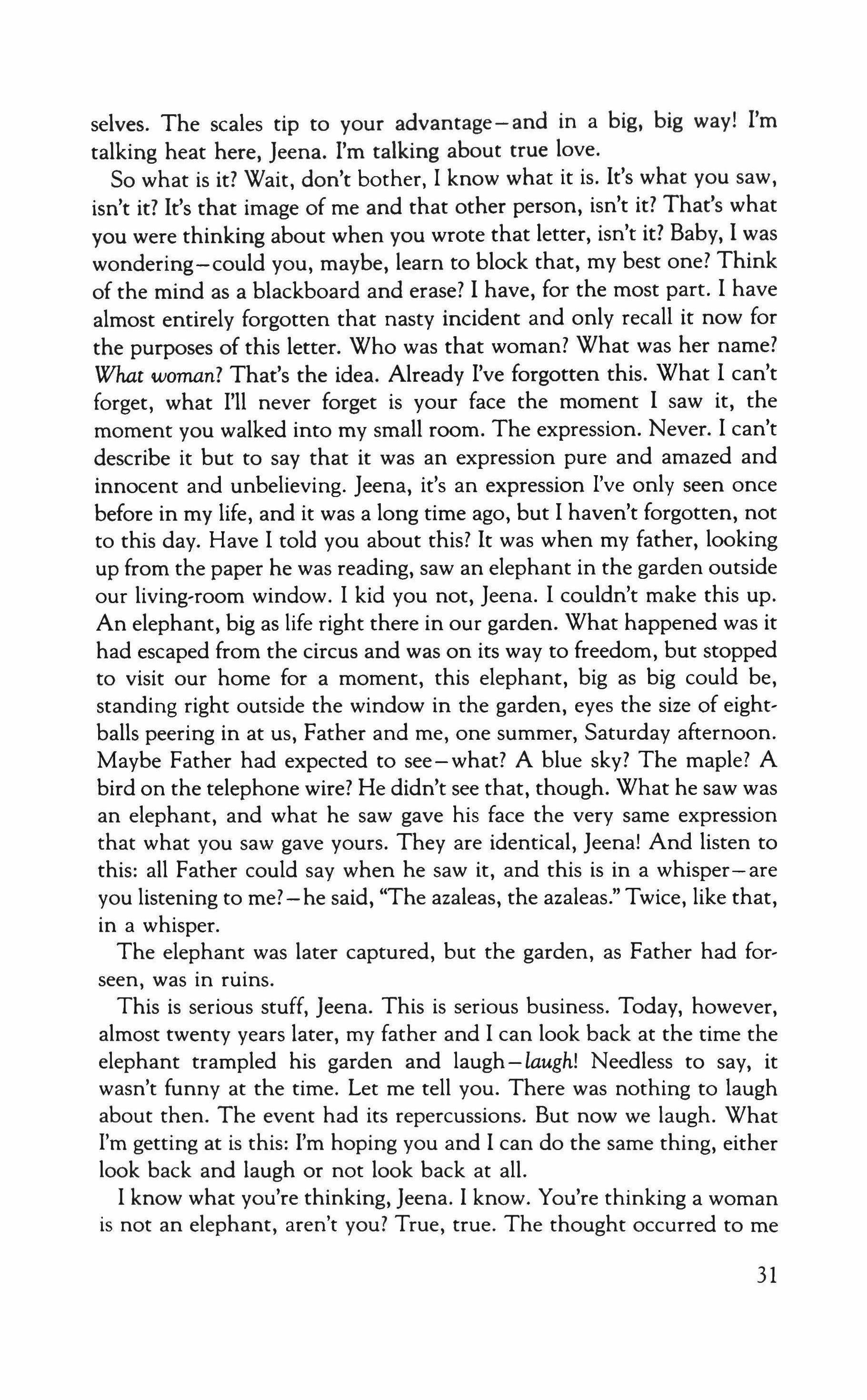
selves. The scales tip to your advantage-and in a big, big way! I'm talking heat here, Jeena. I'm talking about true love. So what is it? Wait, don't bother, I know what it is. It's what you saw, isn't it? It's that image of me and that other person, isn't it? That's what you were thinking about when you wrote that letter, isn't it? Baby, I was wondering-could you, maybe, learn to block that, my best one? Think of the mind as a blackboard and erase? I have, for the most part. I have almost entirely forgotten that nasty incident and only recall it now for the purposes of this letter. Who was that woman? What was her name? What woman? That's the idea. Already I've forgotten this. What I can't forget, what I'll never forget is your face the moment I saw it, the moment you walked into my small room. The expression. Never. I can't describe it but to say that it was an expression pure and amazed and innocent and unbelieving. jeena, it's an expression I've only seen once before in my life, and it was a long time ago, but I haven't forgotten, not to this day. Have I told you about this? It was when my father, looking up from the paper he was reading, saw an elephant in the garden outside our living-room window. I kid you not, jeena, I couldn't make this up. An elephant, big as life right there in our garden. What happened was it had escaped from the circus and was on its way to freedom, but stopped to visit our home for a moment, this elephant, big as big could be, standing right outside the window in the garden, eyes the size of eightballs peering in at us, Father and me, one summer, Saturday afternoon. Maybe Father had expected to see-what? A blue sky? The maple? A bird on the telephone wire? He didn't see that, though. What he saw was an elephant, and what he saw gave his face the very same expression that what you saw gave yours. They are identical, [eena! And listen to this: all Father could say when he saw it, and this is in a whisper- are you listening to me? - he said, "The azaleas, the azaleas." Twice, like that, in a whisper.
The elephant was later captured, but the garden, as Father had forseen, was in ruins.
This is serious stuff, jeena. This is serious business. Today, however, almost twenty years later, my father and I can look back at the time the elephant trampled his garden and laugh-laugh! Needless to say, it wasn't funny at the time. Let me tell you. There was nothing to laugh about then. The event had its repercussions. But now we laugh. What I'm getting at is this: I'm hoping you and I can do the same thing, either look back and laugh or not look back at all.
I know what you're thinking, jeena. I know. You're thinking a woman is not an elephant, aren't you? True, true. The thought occurred to me
31

as well, you see-we think alike. Things would be different indeed if you had found me in bed with an elephant, and Father had seen what you had, mostly naked, standing on his azaleas.
Or would they?
Oh please be patient with me, sweetest of all things, my dear, blueeyed [eena, all I'm trying to make here is an analogy, that's all, a simple analogy for the sake of perspective. We thought the beast was going to thrust its trunk through the window-that is, my mother thought so. She was sure of it. See, I was on the floor, about three feet away from the casement, playing with a toy car, rolling it back and forth and making car sounds. My mother reports that I always liked to hang around the floorboards near the electrical outlets, which worried her to no end, she says to this day. That day I'm wearing shorts, tiny shoes, white socks and a dirty T-shirt. I weigh no more than a few pounds, just a little guy, jeena, and cute! So cute. Father is in his barcalounger reading the newspaper, and Mother is in the kitchen, cooking. Remember: in a moment she'll walk into the living room, wiping her hands on a small towel, a dead smile on her face. But this is in a few seconds now, oh, here she comes, she's walking into the room-there! What I want you to imagine is this: the elephant easily crashes its trunk through the livingroom window. Glass shatters. He knocks over a vase of dried flowers, a table lamp-and then he sees me. Elephant bait. Ever so gently the proboscis curls around my small body, lifting me up and outward, out of the living room and my mundane childhood, safely past the jagged edge of the window and onto his back, where I sit listening to my father mutter, over and over again, "The azaleas, the azaleas," until the elephant and I are out of hearing distance, gone, gone far away, never to be seen again
This never happened, of course, my tender, temporarily-bitter jeena, but Mother, who came into the living room just in time to see that fantastic rump wobble away, thought it might have. She was not an imaginative woman, my mother, but she imagined this. Also, she heard what Father was saying, and that look on his face, she saw that, too. I'll tell you - and you'll have to take my word for this, Jeena - she became seriously, seriously upset. Upset that Father's first instinct hadn't been to jump on me, to protect me from the elephant. I am, as you know, their only child, the first having been a miscarriage and the third never arriving. Hence I was quite the precious object. Mother spoiled and adored me. I was the world to her, and when Father didn't try to save it, me, her world, she became an angry and in many ways a different woman, all in a moment.
32
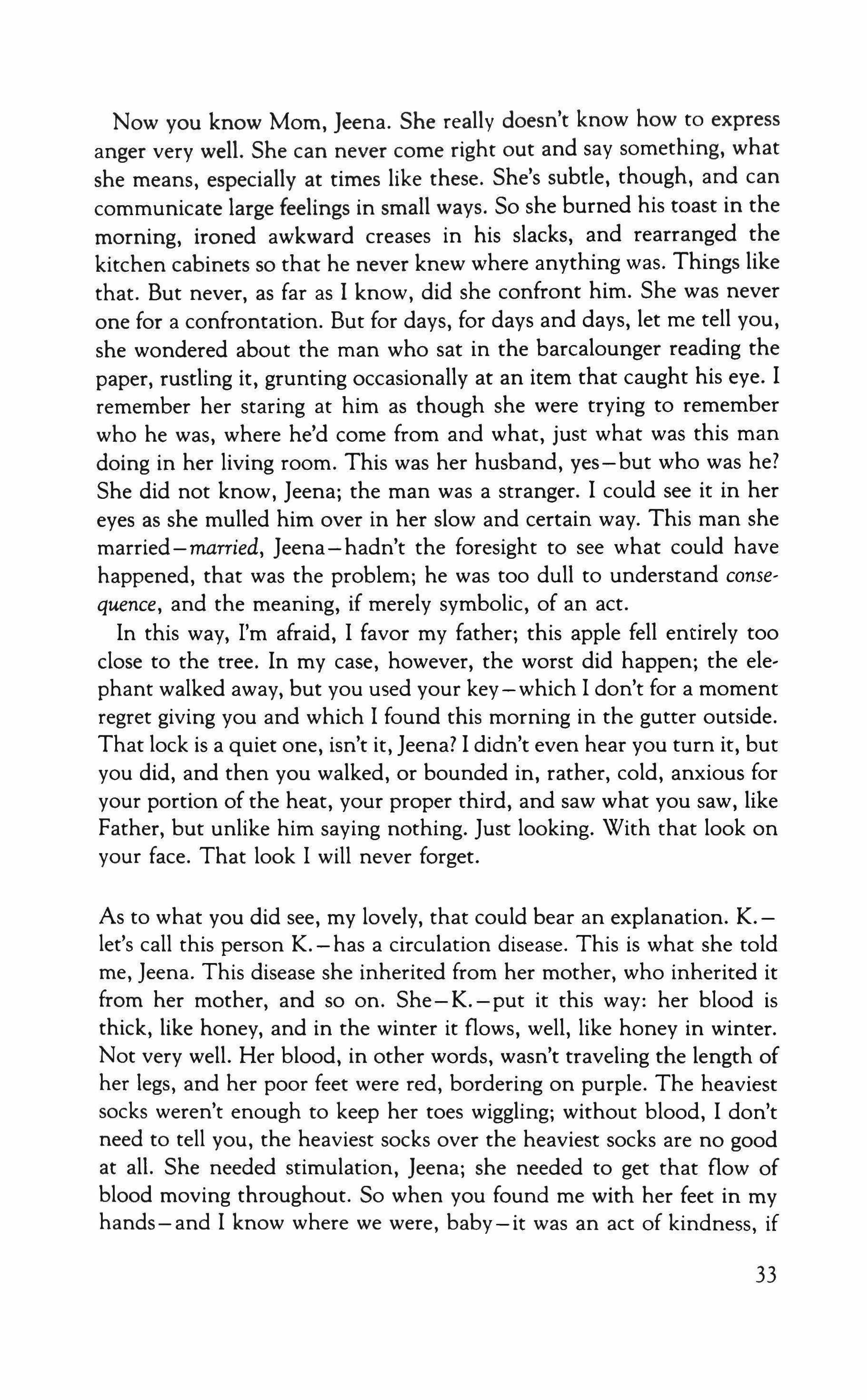
Now you know Mom, jeena. She really doesn't know how to express anger very well. She can never come right out and say something, what she means, especially at times like these. She's subtle, though, and can communicate large feelings in small ways. So she burned his toast in the morning, ironed awkward creases in his slacks, and rearranged the kitchen cabinets so that he never knew where anything was. Things like that. But never, as far as I know, did she confront him. She was never one for a confrontation. But for days, for days and days, let me tell you, she wondered about the man who sat in the barcalounger reading the paper, rustling it, grunting occasionally at an item that caught his eye. I remember her staring at him as though she were trying to remember who he was, where he'd come from and what, just what was this man doing in her living room. This was her husband, yes-but who was he? She did not know, [eena; the man was a stranger. I could see it in her eyes as she mulled him over in her slow and certain way. This man she married-married, Jeena-hadn't the foresight to see what could have happened, that was the problem; he was too dull to understand consequence, and the meaning, if merely symbolic, of an act.
In this way, I'm afraid, I favor my father; this apple fell entirely too close to the tree. In my case, however, the worst did happen; the elephant walked away, but you used your key-which I don't for a moment regret giving you and which I found this morning in the gutter outside. That lock is a quiet one, isn't it, Jeena? I didn't even hear you turn it, but you did, and then you walked, or bounded in, rather, cold, anxious for your portion of the heat, your proper third, and saw what you saw, like Father, but unlike him saying nothing. Just looking. With that look on your face. That look I will never forget.
As to what you did see, my lovely, that could bear an explanation. K.let's call this person K. - has a circulation disease. This is what she told me, Jeena. This disease she inherited from her mother, who inherited it from her mother, and so on. She-K.-put it this way: her blood is thick, like honey, and in the winter it flows, well, like honey in winter. Not very well. Her blood, in other words, wasn't traveling the length of her legs, and her poor feet were red, bordering on purple. The heaviest socks weren't enough to keep her toes wiggling; without blood, I don't need to tell you, the heaviest socks over the heaviest socks are no good at all. She needed stimulation, [eena; she needed to get that flow of blood moving throughout. So when you found me with her feet in my hands-and I know where we were, baby-it was an act of kindness, if
33

not altruism on my part, an extension, at least, of some goodwill in this wintry season.
It may have been better, if just a little, had you caught us doing something a bit more traditional, I don't know. Maybe you think we'd already gotten to that, or we're getting to it, maybe not. I don't know what good can come from nailing down this specificity. What you saw was an act of intimacy, yes. But I'd like to suggest here that you cannot leave me for holding K.'s feet in my hands, and neither does that make me the worst man in the world.
Think for a second.
Now, does it?
For the record, [eena, queen of my heart, her feet do not compare with your own. I've often thought of your feet as perfect, the way your toes slant, and your fine bones which seem to be made of ivory.
Ivory. I'm surprised I never mentioned the elephant to you before, since it caused quite a stir in our little town. Without a doubt it was the most significant event of my childhood. We later learned that this particular elephant had escaped and been captured many times before, was, in fact, a regular occurence with this circus. But it only happened once in our little town, and the next day's headlines were fairly predictable: GENERAL MOSBY [the elephant's name] RUNS AMOK!!! And there was General Mosby's picture, about one-one-hundredth the size he was in real life. And then on page 6A, where the story was continued, there was another picture, this one of my father, standing beside his trampled azaleas. It was a grainy photo, and I still have it, I think, somewhere. In it my father is just standing there with his hands on his hips staring at the devastation. On page 6A. "Your father is the kind of man," Mom said, "who will always appear on page 6A." And the reason his picture was in the paper at all, for the first time since his marriage, was this: ours was the only yard General Mosby chose to visit. The rest of his doomed flight took place on asphalt and concrete, on the sidewalks and in the street.
Why our yard, I wonder? Why my father? He lived a quiet, unspectacular life making No.2 pencils-a factory, [eena, which made him rich, by the way. Why us? I've always wondered this. That elephant changed our lives, and as you read this (not believing a word of it, probably) remember that I've had twenty years to think it over. What happened was that for a few days my father became a celebrity in Decatur. That's the name of my hometown, jeena: Decatur. All that town could talk about was the man on page 6A and General Mosby, and UPI ran the story and it was on the news-that last, thirty-second part of the news-
34
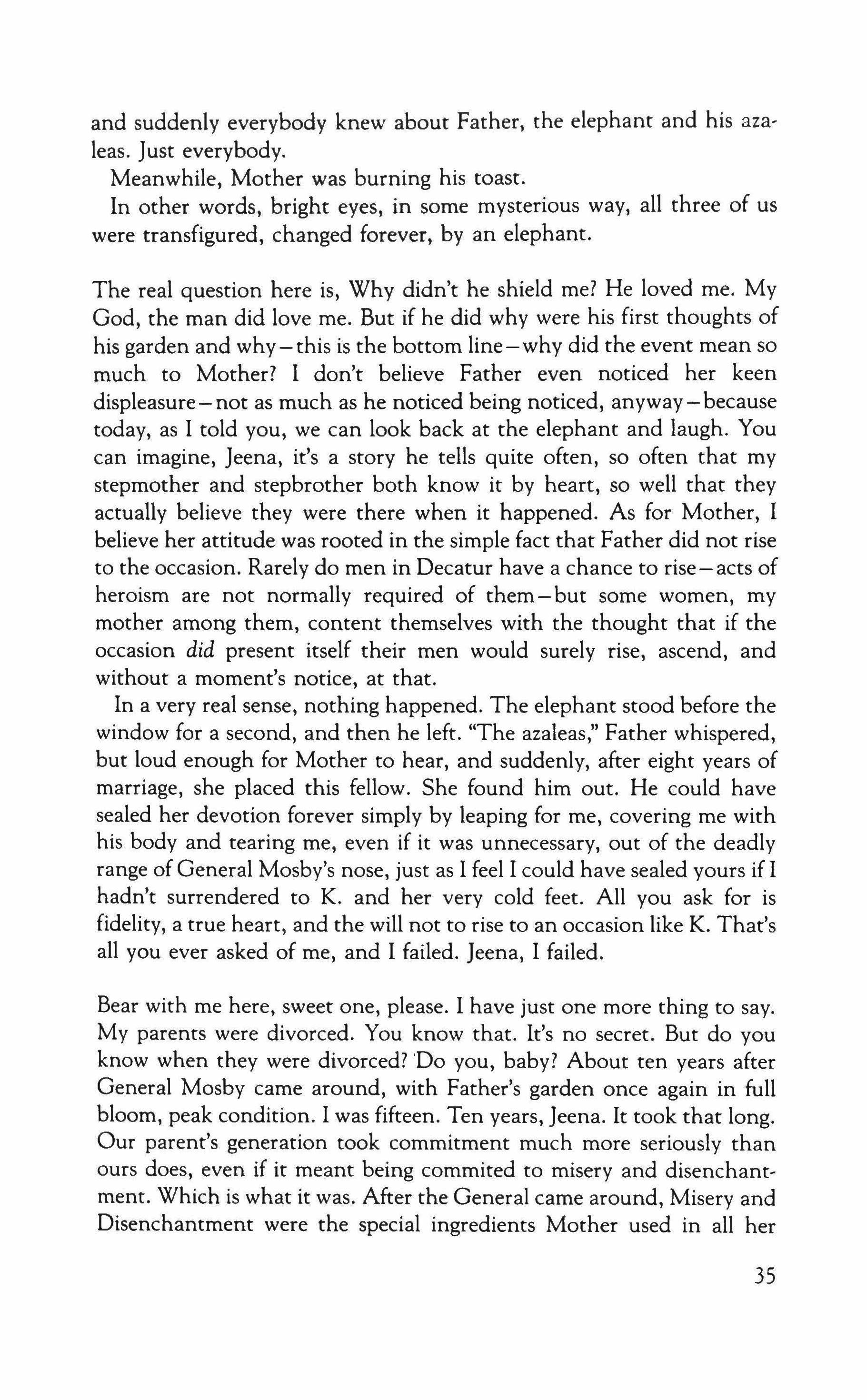
and suddenly everybody knew about Father, the elephant and his azaleas. just everybody.
Meanwhile, Mother was burning his toast.
In other words, bright eyes, in some mysterious way, all three of us were transfigured, changed forever, by an elephant.
The real question here is, Why didn't he shield me? He loved me. My God, the man did love me. But if he did why were his first thoughts of his garden and why-this is the bottom line-why did the event mean so much to Mother? I don't believe Father even noticed her keen displeasure-not as much as he noticed being noticed, anyway-because today, as I told you, we can look back at the elephant and laugh. You can imagine, [eena, it's a story he tells quite often, so often that my stepmother and stepbrother both know it by heart, so well that they actually believe they were there when it happened. As for Mother, I believe her attitude was rooted in the simple fact that Father did not rise to the occasion. Rarely do men in Decatur have a chance to rise-acts of heroism are not normally required of them-but some women, my mother among them, content themselves with the thought that if the occasion did present itself their men would surely rise, ascend, and without a moment's notice, at that.
In a very real sense, nothing happened. The elephant stood before the window for a second, and then he left. "The azaleas," Father whispered, but loud enough for Mother to hear, and suddenly, after eight years of marriage, she placed this fellow. She found him out. He could have sealed her devotion forever simply by leaping for me, covering me with his body and tearing me, even if it was unnecessary, out of the deadly range of General Mosby's nose, just as I feel I could have sealed yours if I hadn't surrendered to K. and her very cold feet. All you ask for is fidelity, a true heart, and the will not to rise to an occasion like K. That's all you ever asked of me, and I failed. jeena, I failed.
Bear with me here, sweet one, please. I have just one more thing to say. My parents were divorced. You know that. It's no secret. But do you know when they were divorced? 'Do you, baby? About ten years after General Mosby came around, with Father's garden once again in full bloom, peak condition. I was fifteen. Ten years, [eena. It took that long. Our parent's generation took commitment much more seriously than ours does, even if it meant being commited to misery and disenchantment. Which is what it was. After the General came around, Misery and Disenchantment were the special ingredients Mother used in all her
35
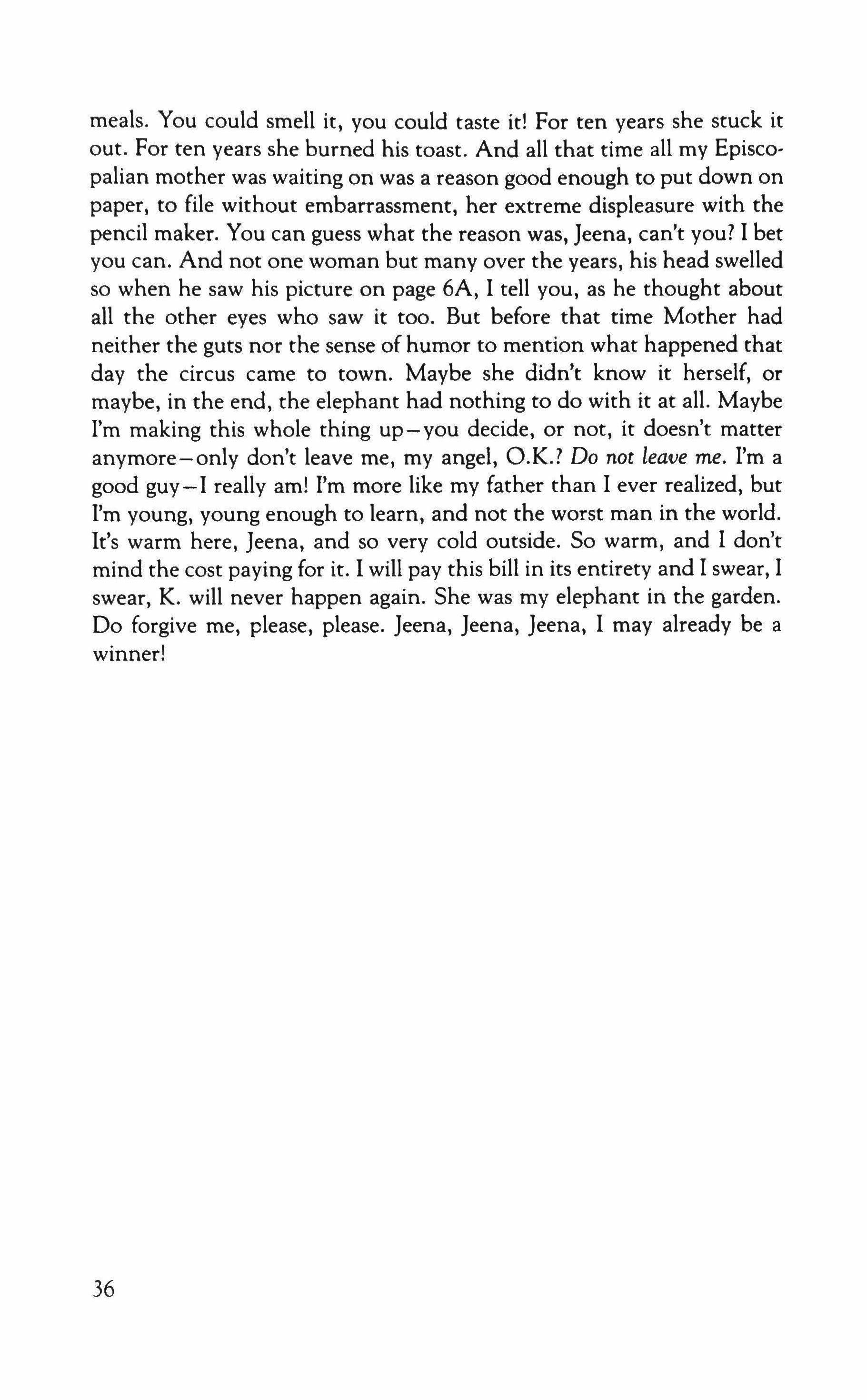
meals. You could smell it, you could taste it! For ten years she stuck it out. For ten years she burned his toast. And all that time all my Episcopalian mother was waiting on was a reason good enough to put down on paper, to file without embarrassment, her extreme displeasure with the pencil maker. You can guess what the reason was, [eena, can't you? I bet you can. And not one woman but many over the years, his head swelled so when he saw his picture on page 6A, I tell you, as he thought about all the other eyes who saw it too. But before that time Mother had neither the guts nor the sense of humor to mention what happened that day the circus came to town. Maybe she didn't know it herself, or maybe, in the end, the elephant had nothing to do with it at all. Maybe I'm making this whole thing up-you decide, or not, it doesn't matter anymore-only don't leave me, my angel, O.K.? Do not leave me. I'm a good guy - I really am! I'm more like my father than I ever realized, but I'm young, young enough to learn, and not the worst man in the world. It's warm here, [eena, and so very cold outside. So warm, and I don't mind the cost paying for it. I will pay this bill in its entirety and I swear, I swear, K. will never happen again. She was my elephant in the garden. Do forgive me, please, please. [eena, Jeena, [eena, I may already be a winner!
36
Twelve Fictions
Trevor Edmands
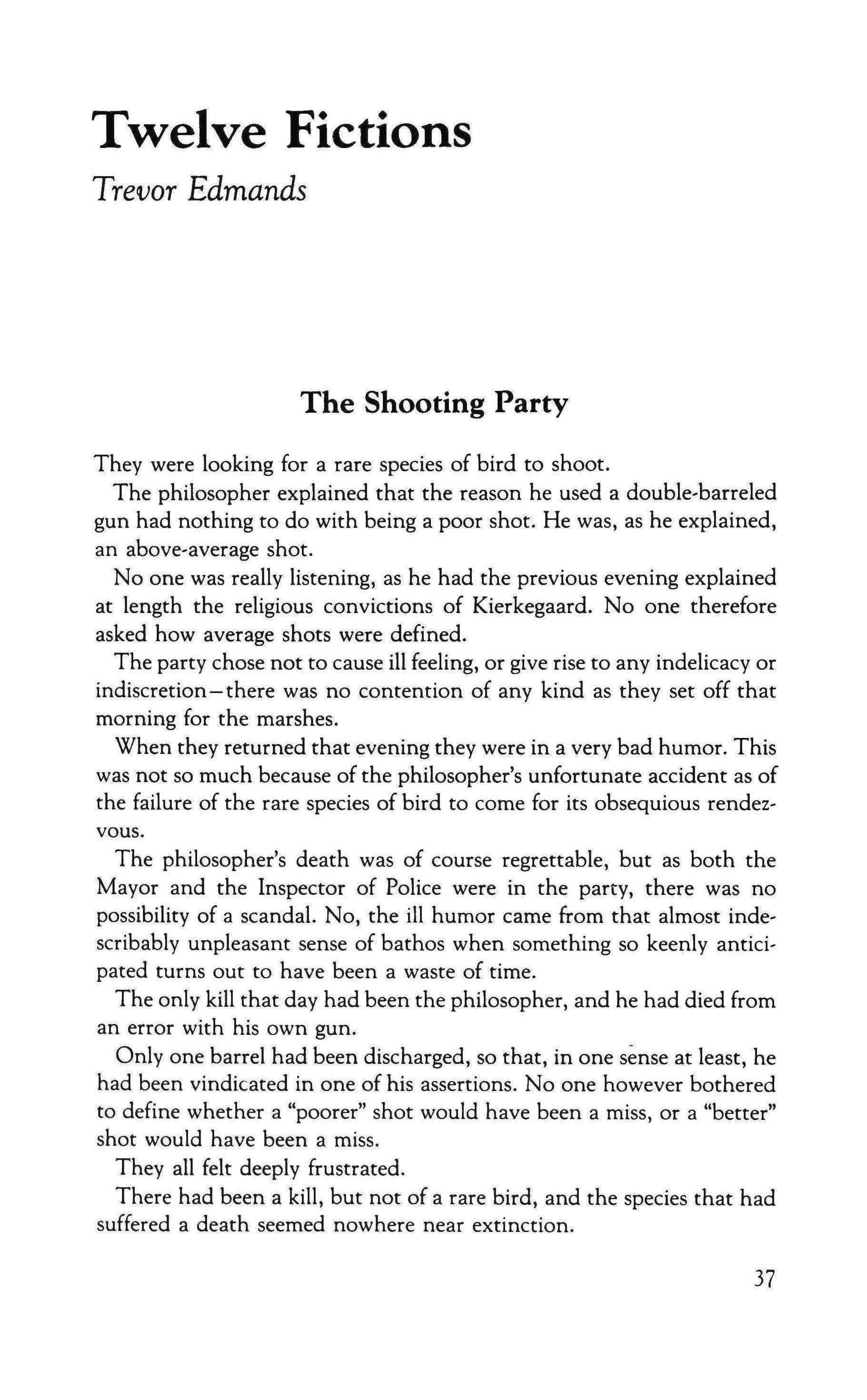
The Shooting Party
They were looking for a rare species of bird to shoot.
The philosopher explained that the reason he used a double-barreled gun had nothing to do with being a poor shot. He was, as he explained, an above-average shot.
No one was really listening, as he had the previous evening explained at length the religious convictions of Kierkegaard. No one therefore asked how average shots were defined.
The party chose not to cause ill feeling, or give rise to any indelicacy or indiscretion - there was no contention of any kind as they set off that morning for the marshes.
When they returned that evening they were in a very bad humor. This was not so much because of the philosopher's unfortunate accident as of the failure of the rare species of bird to come for its obsequious rendezvous.
The philosopher's death was of course regrettable, but as both the Mayor and the Inspector of Police were in the party, there was no possibility of a scandal. No, the ill humor came from that almost indescribably unpleasant sense of bathos when something so keenly anticipated turns out to have been a waste of time.
The only kill that day had been the philosopher, and he had died from an error with his own gun.
Only one barrel had been discharged, so that, in one sense at least, he had been vindicated in one of his assertions. No one however bothered to define whether a "poorer" shot would have been a miss, or a "better" shot would have been a miss.
They all felt deeply frustrated.
There had been a kill, but not of a rare bird, and the species that had suffered a death seemed nowhere near extinction.
37

The Tea Room
Harriet went to wash up. As she placed her hands in the basin, she watched them sink and settle slowly amongst the forks and spoons. She stood there for a short time, staring down as if puzzled at their dumb submission to drowning.
"So when does the new series begin?" a voice which would fill a bowl and go on to flood a room asked. "May fourteenth, I think," someone with a pinstriped voice answered.
The sound was fluted up to circle the ceiling. It was a voice for high church office.
A fat man resembling a bloodhound wiped away a few drops of sweat.
"The thirteenth," he said quietly. The fourteenth is a Sunday." He cleared his throat. His handkerchief wiped a second time.
A woman, turning a ring round on her finger, continued staring at something in the air too minute to see. By quarter-turns the ring was twisted round and round, always in a clockwise direction.
A small child, face bent over knees, curled her toes forward and backward, absorbed by the trick of it. Somewhere in the room a large fly buzzed. The clock was stopped, the small hand limply hanging at six, the large hand cupped in the rim beneath it.
The woman ran her hand over her knees.
"You know, when I am alone 1 dance the Firebird naked," she announced.
No one seemed to care.
The fly settled on the clockface.
Harriet removed her hands from the washbasin and took them back to the company, where she squeezed them between her knees. Very slowly they began to revive.
"I tell you I am Stravinsky," the woman insisted, "when 1 am alone."
"We are all somebody," said the bloodhound, "when we are alone."
38
The Painting Without a Title
The picture had a black singer
And a reader of poetry
It had pavements
And Italian architecture
It had a large white moon
And clouds from which snow fell
The picture had a sculpture in a fountain
And a flowering shrub
A great tree
And part of an arcade
The picture had a deep musically-conceived sky
A throne
A red field
A Greek lion
A chevron
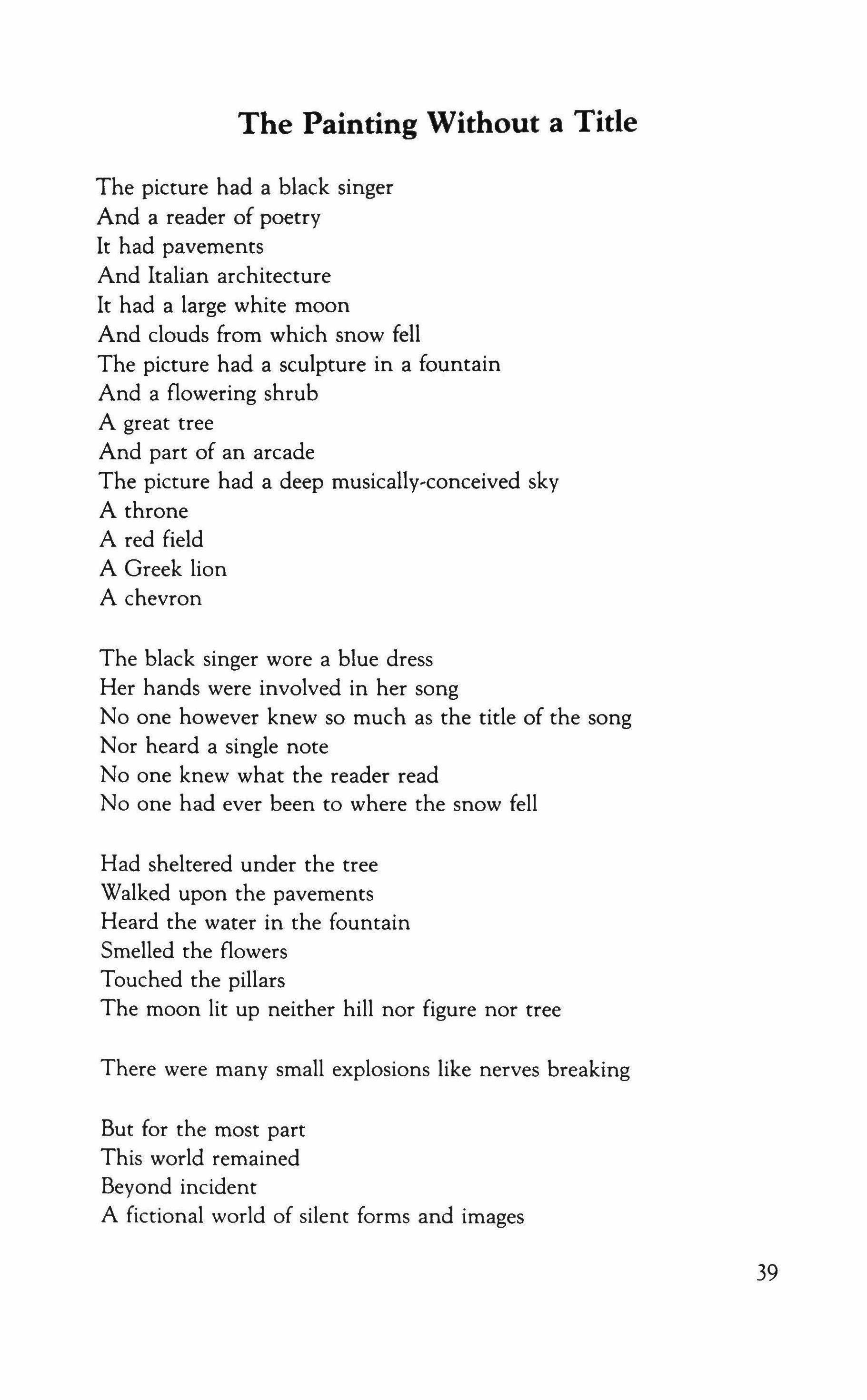
The black singer wore a blue dress
Her hands were involved in her song
No one however knew so much as the title of the song
Nor heard a single note
No one knew what the reader read
No one had ever been to where the snow fell
Had sheltered under the tree
Walked upon the pavements
Heard the water in the fountain
Smelled the flowers
Touched the pillars
The moon lit up neither hill nor figure nor tree
There were many small explosions like nerves breaking
But for the most part
This world remained
Beyond incident
A fictional world of silent forms and images
39
There was no reality to grasp and I tore all the images from Each other and from their frame and deposited them in a box I keep for waste
Another meal has been consumed; another wave has receded Nothing real has gone, and yet I feel that something tangible Has been lost.
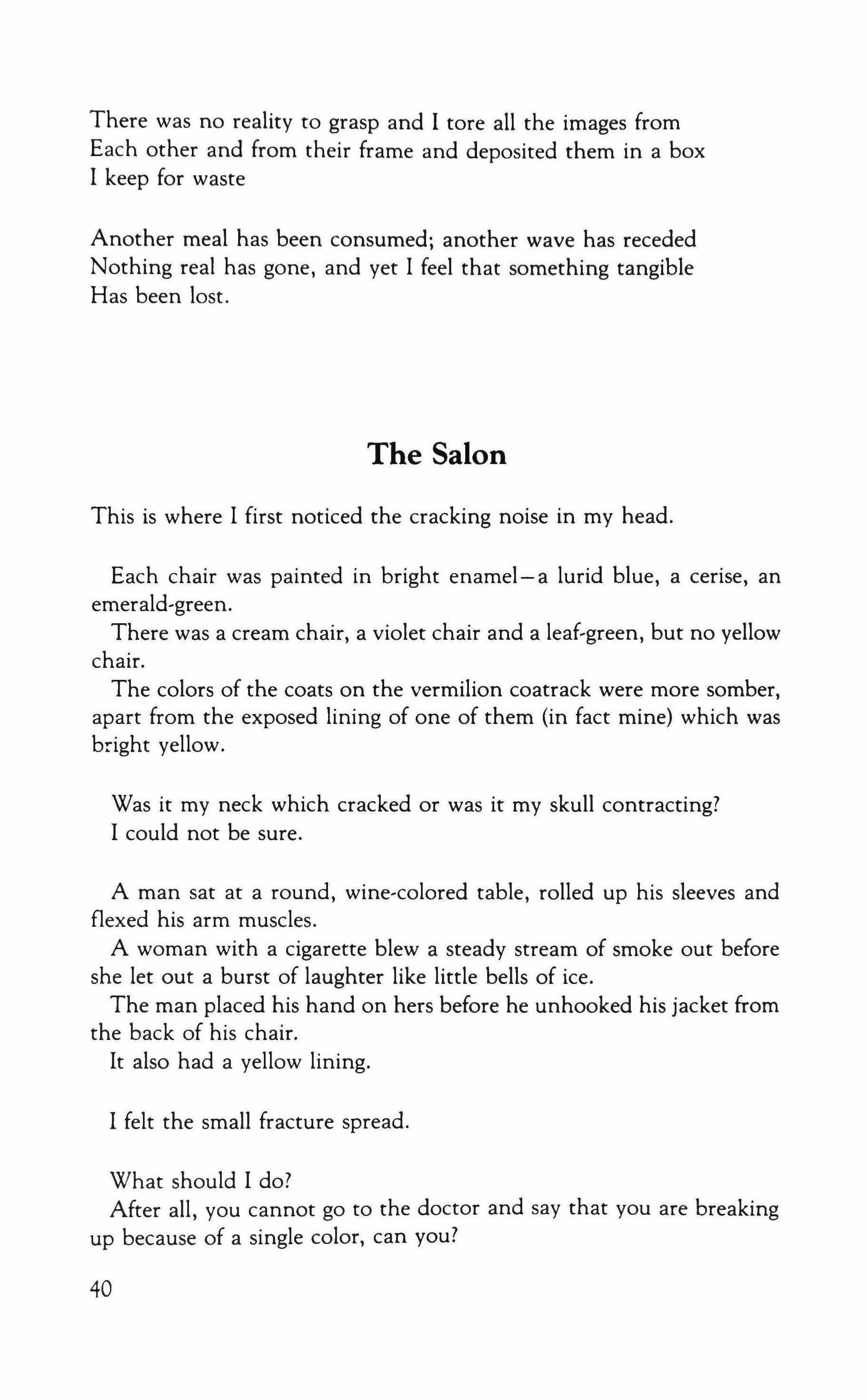
The Salon
This is where I first noticed the cracking noise in my head.
Each chair was painted in bright enamel-a lurid blue, a cerise, an emerald-green.
There was a cream chair, a violet chair and a leaf-green, but no yellow chair.
The colors of the coats on the vermilion coatrack were more somber, apart from the exposed lining of one of them (in fact mine) which was bright yellow.
Was it my neck which cracked or was it my skull contracting? I could not be sure.
A man sat at a round, wine-colored table, rolled up his sleeves and flexed his arm muscles.
A woman with a cigarette blew a steady stream of smoke out before she let out a burst of laughter like little bells of ice.
The man placed his hand on hers before he unhooked his jacket from the back of his chair.
It also had a yellow lining.
I felt the small fracture spread.
What should I do?
After all, you cannot go to the doctor and say that you are breaking up because of a single color, can you?
40
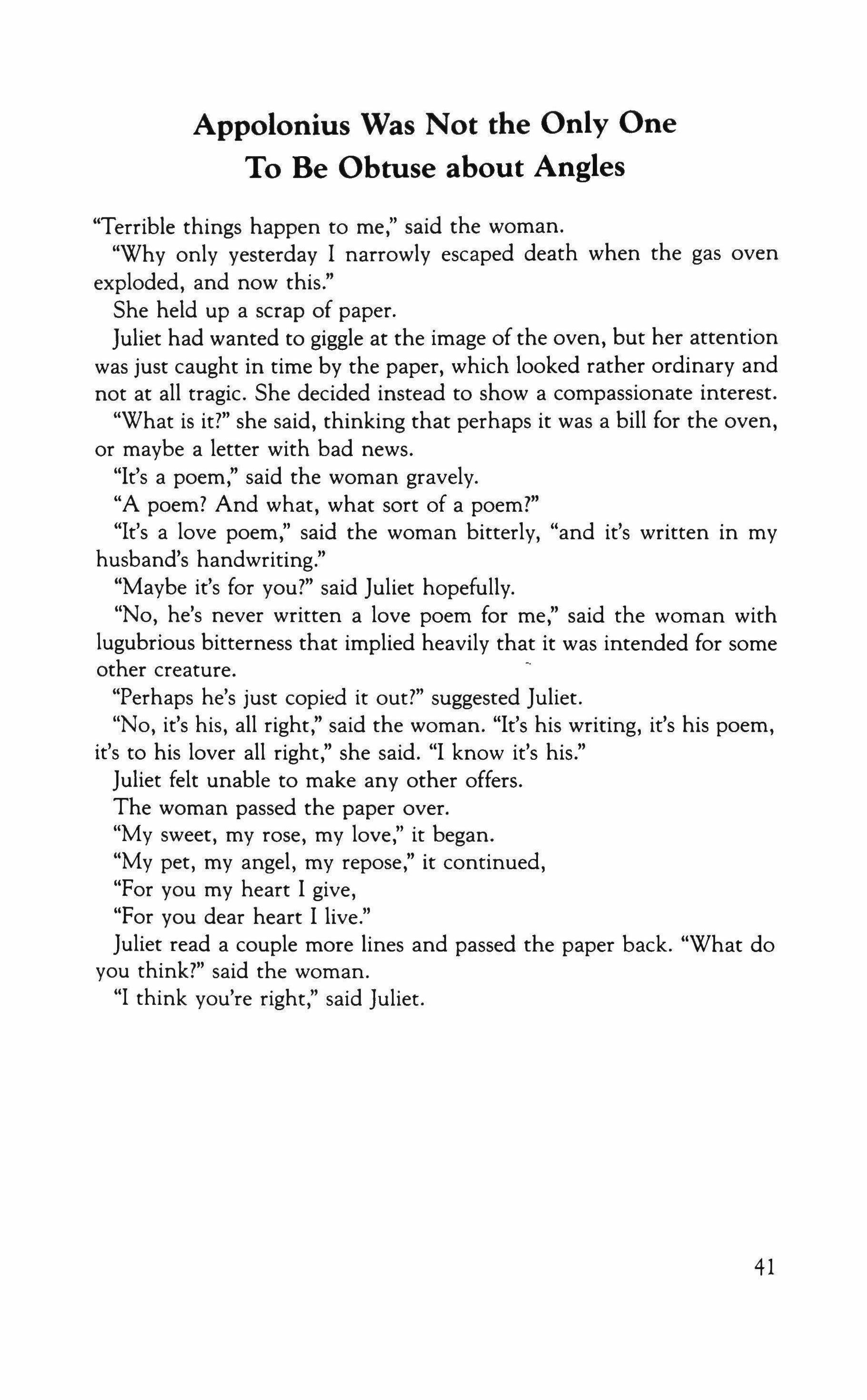
Appolonius Was Not the Only One To
Be Obtuse about Angles
"Terrible things happen to me," said the woman.
"Why only yesterday I narrowly escaped death when the gas oven exploded, and now this."
She held up a scrap of paper.
Juliet had wanted to giggle at the image of the oven, but her attention was just caught in time by the paper, which looked rather ordinary and not at all tragic. She decided instead to show a compassionate interest.
"What is it?" she said, thinking that perhaps it was a bill for the oven, or maybe a letter with bad news.
"It's a poem," said the woman gravely.
"A poem? And what, what sort of a poem?"
"It's a love poem," said the woman bitterly, "and it's written in my husband's handwriting."
"Maybe it's for you?" said Juliet hopefully.
"No, he's never written a love poem for me," said the woman with lugubrious bitterness that implied heavily that it was intended for some other creature.
"Perhaps he's just copied it out?" suggested Juliet.
"No, it's his, all right," said the woman. "It's his writing, it's his poem, it's to his lover all right," she said. "I know it's his."
Juliet felt unable to make any other offers.
The woman passed the paper over.
"My sweet, my rose, my love," it began.
"My pet, my angel, my repose," it continued,
"For you my heart I give,
"For you dear heart I live."
Juliet read a couple more lines and passed the paper back. "What do you think?" said the woman.
"I think you're right," said Juliet.
41
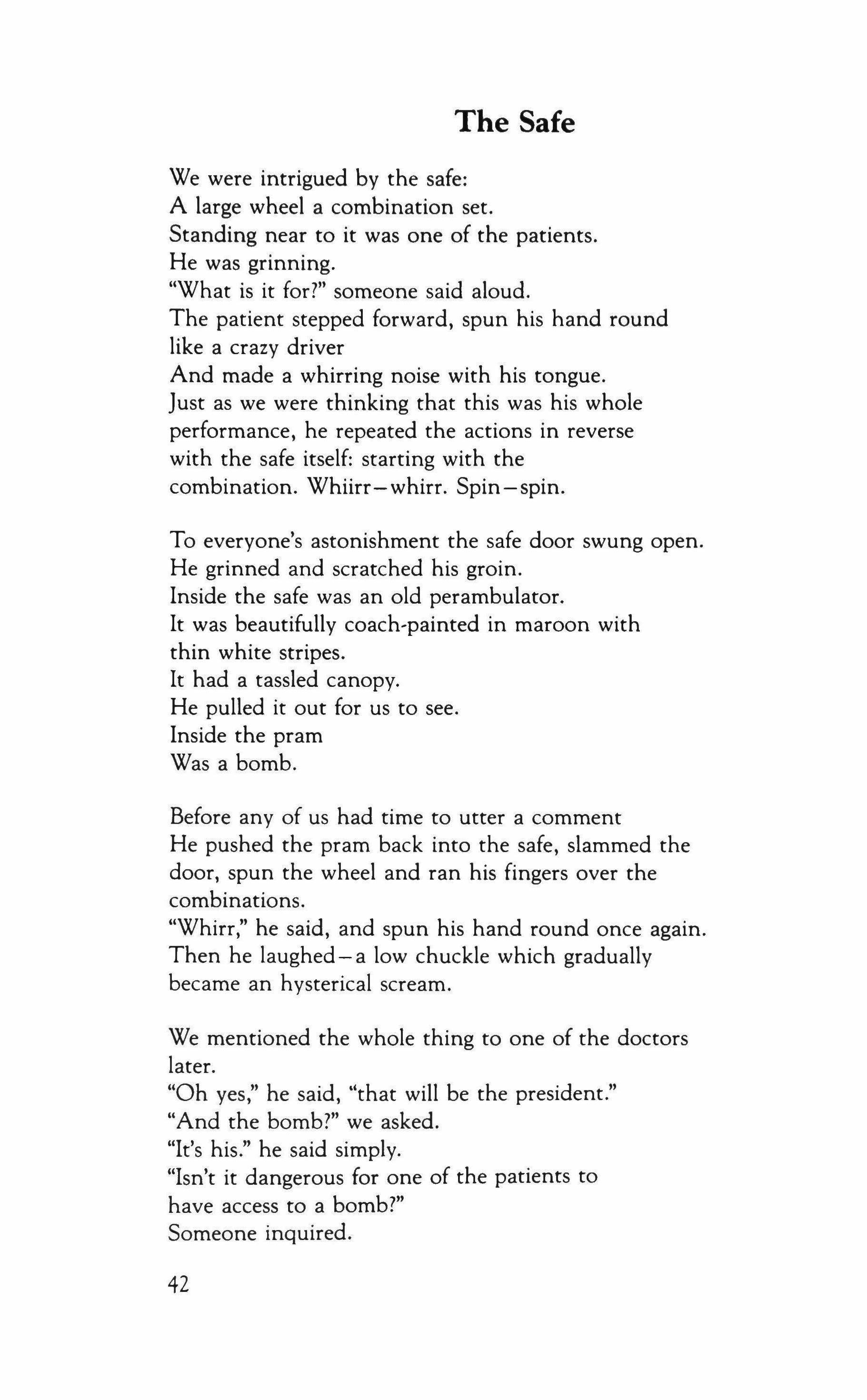
The Safe
We were intrigued by the safe: A large wheel a combination set. Standing near to it was one of the patients. He was grinning.
"What is it for?" someone said aloud. The patient stepped forward, spun his hand round like a crazy driver And made a whirring noise with his tongue.
Just as we were thinking that this was his whole performance, he repeated the actions in reverse with the safe itself: starting with the combination. Whiirr-whirr. Spin-spin.
To everyone's astonishment the safe door swung open. He grinned and scratched his groin.
Inside the safe was an old perambulator. It was beautifully coach-painted in maroon with thin white stripes. It had a tassled canopy. He pulled it out for us to see.
Inside the pram Was a bomb.
Before any of us had time to utter a comment He pushed the pram back into the safe, slammed the door, spun the wheel and ran his fingers over the combinations.
"Whirr," he said, and spun his hand round once again. Then he laughed - a low chuckle which gradually became an hysterical scream.
We mentioned the whole thing to one of the doctors later.
"Oh yes," he said, "that will be the president."
"And the bomb?" we asked.
"It's his." he said simply.
"Isn't it dangerous for one of the patients to have access to a bomb?"
Someone inquired. 42

"Good heavens no!" said the doctor. "He doesn't do anything but show it! In fact there are plenty of people here who feel that it is his bomb that keeps us secure."
I thought that I could hear a whirring noise in my head. I thought that I detected myself reaching towards my groin. I knew that I wanted to laugh. But I was afraid that if I did it would end in a piercing scream.
The Art Historian
"We can't discuss this any further," said the poet as she slid down into the bathwater.
"Bonnard," I thought "Bonnard would have responded to this quite differently."
But this is 1984-the bath is made of synthetic something and is a dark blue color.
"No really, I do want to look at you," I said, "properly, fully, as a lover, but I carry too many images around."
"Meaning?" she said as she soaped under her arms and between her legs.
Meanings have always eluded me in every part of life. I hate being asked about meanings.
I moved over and regarded myself in the mirror. "I am aging almost audibly," I thought, then I addressed her with my voice bouncing back off the glass.
"When I see you now, for instance, I think about Bonnard. Sometimes you're the mag. girl, sometimes Chabrol's victim, sometimes an icon-or Minerva. Sometimes the second woman in The Funeral at Omans. I don't think there's a position you can take up that I don't have an image for."
I turned towards her.
43
She began to wash one foot. "Garbo! Dietrich!" I said. She laughed in her peculiar bittersweet way and shoveled some water at me from the bath.
"You idiot! You idiot! You're not a man, you're an encyclopedia of reproductions!"
Some of the soapy water went into my eyes. I saw her mistily, painfully through my tears, shoveling the water at me as she raised herself from the bath.
"Heindrickje Stoffels," I said as I reached for the towel.
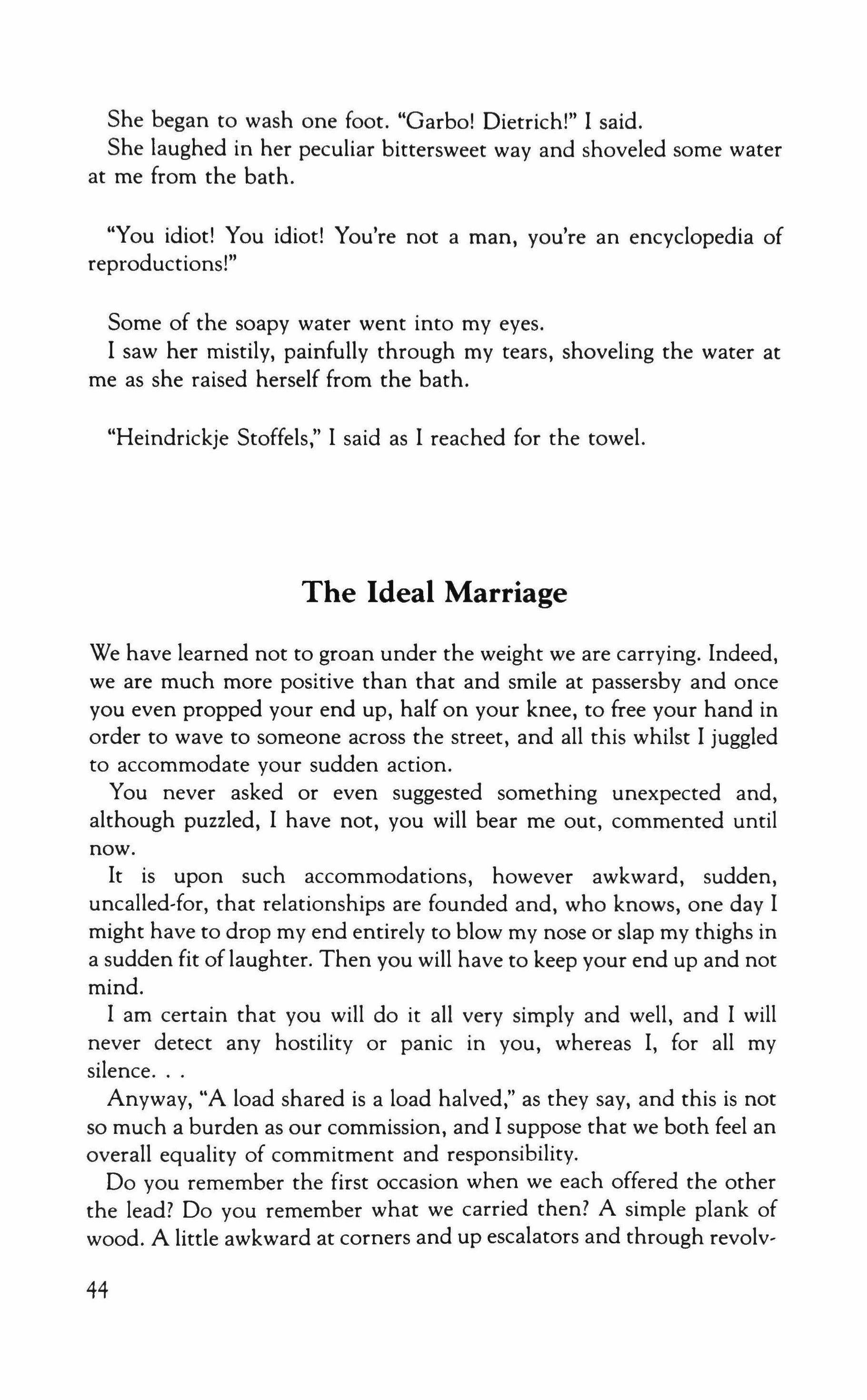
The Ideal Marriage
We have learned not to groan under the weight we are carrying. Indeed, we are much more positive than that and smile at passersby and once you even propped your end up, half on your knee, to free your hand in order to wave to someone across the street, and all this whilst I juggled to accommodate your sudden action.
You never asked or even suggested something unexpected and, although puzzled, I have not, you will bear me out, commented until now.
It is upon such accommodations, however awkward, sudden, uncalled-for, that relationships are founded and, who knows, one day I might have to drop my end entirely to blow my nose or slap my thighs in a sudden fit of laughter. Then you will have to keep your end up and not mind.
I am certain that you will do it all very simply and well, and I will never detect any hostility or panic in you, whereas I, for all my silence
Anyway, "A load shared is a load halved," as they say, and this is not so much a burden as our commission, and I suppose that we both feel an overall equality of commitment and responsibility.
Do you remember the first occasion when we each offered the other the lead? Do you remember what we carried then? A simple plank of wood. A little awkward at corners and up escalators and through revolv-
44
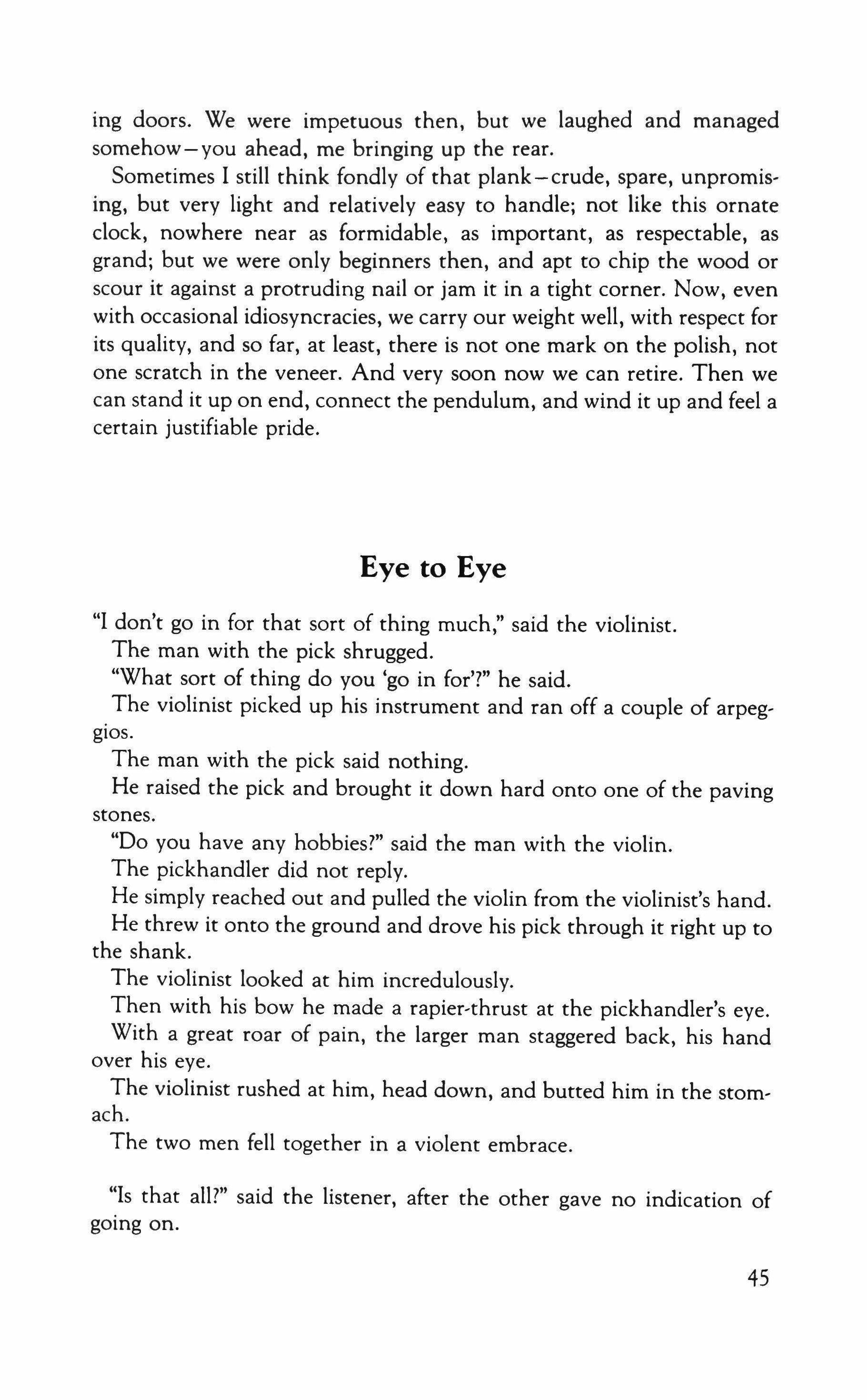
ing doors. We were impetuous then, but we laughed and managed somehow-you ahead, me bringing up the rear.
Sometimes I still think fondly of that plank - crude, spare, unpromising, but very light and relatively easy to handle; not like this ornate clock, nowhere near as formidable, as important, as respectable, as grand; but we were only beginners then, and apt to chip the wood or scour it against a protruding nail or jam it in a tight corner. Now, even with occasional idiosyncracies, we carry our weight well, with respect for its quality, and so far, at least, there is not one mark on the polish, not one scratch in the veneer. And very soon now we can retire. Then we can stand it up on end, connect the pendulum, and wind it up and feel a certain justifiable pride.
Eye to Eye
"I don't go in for that sort of thing much," said the violinist.
The man with the pick shrugged.
"What sort of thing do you 'go in for'?" he said.
The violinist picked up his instrument and ran off a couple of arpeggios.
The man with the pick said nothing.
He raised the pick and brought it down hard onto one of the paving stones.
"Do you have any hobbies?" said the man with the violin.
The pickhandler did not reply.
He simply reached out and pulled the violin from the violinist's hand. He threw it onto the ground and drove his pick through it right up to the shank.
The violinist looked at him incredulously.
Then with his bow he made a rapier-thrust at the pickhandler's eye. With a great roar of pain, the larger man staggered back, his hand over his eye.
The violinist rushed at him, head down, and butted him in the stomach.
The two men fell together in a violent embrace.
"Is that all?" said the listener, after the other gave no indication of going on.
45

"What more do you want?" said the other. "Sentiment? A moral?" "N" id h fi "b I d I 0, sal t e irst, ut sure y-some eve opment. "Very well," said the other.
"The two men got up and shook hands. The violinist makes pavements now-as a hobby. The pickhandler goes to concerts in his spare time!"
"But that is ridiculous!" said the listener. "Exactly," said the other. "So the first ending was better, you see!"
The Theater
Even before the play started, as the theater filled, you could see that rituals were being observed. People leaned across each other, talking, some even about the play or this or that actor, this or that production.
The stage was bare except for a few boxes carefully scattered to resemble the great stage of the world with its careful chaos, and a solitary something - a sort of metal prantick welded onto a triangular base in the center, slightly towards the back. The curtain or backcloth was maroon.
There were about twelve minutes to go.
A woman two rows ahead of us began to remove the pins from her hair, letting it fall back. Then, with a graceful circular motion of the hand not unlike wool-winding, she caught and wound it, slipping pins into it with considerable dexterity, pins she was obviously removing one at a time from between her teeth.
1 looked to see if she was as beautiful as her graceful movement suggested. 1 wondered if the man on her right was her husband or lover; he seemed to be reading the programme or something. The seat on her left was, as yet, unoccupied.
From where 1 was sitting it was not possible to see even the side of her face and I desired the man to speak to her so that she would turn. He failed to do so.
1 was hemmed in by several people on either side but 1 did think that in the time available 1 could devise some pretext for leaving my place to go forward without appearing ridiculous. However, this was impossible to accomplish without embarrassment to myself and my wife. The toilets were to the rear and there was only one row between the woman and
46
the front of the stage. it was all too difficult and 1 decided to wait until the interval.
The play was dreadful, despite a good press. 1 thought so, even allowing for my inattention to the first act; my wife thought so too, more so, and suggested that we should leave. I contrived a degree of interest: "Let's give it more than one act-it might improve." "Why, it's absolutely meretricious and boring-it won't improve! Surely "
All true, but I persisted, albeit to my wife's dissatisfaction. I had my way; we would stay a little longer against all sense.
During the ceremonial of our argument, the woman had left her seat, as had the man and several others from her row.
I wanted to remain where I was, but when a play is inadequate the other diversions become necessities and my wife wanted, needed, an ice cream.
Everyone knows exactly what happens in such circumstances- We will stay. I will wait, watch, keep vigil for my curiosity's sake. The woman will not return.
But this time it fell out quite differently. She came back and I saw her clearly, full face smiling as if she had just heard some good joke; or could it even be that she was enjoying the play? She was graceful and, I thought, stunningly beautiful. I was enamored of her throughout the second act and for some little time after I was enamored of the memory of her face.
But most of all and longest lasting was, of course, the memory of her hair falling over her shoulders and being scooped back and re-pinned. One is not always so entertained at the theater.
We left immediately after the second act.

The Concert Room
Theodore and Amelia Penny lay on the seashore.
We could see them from the glass room where the lace curtains billowed out of the open windows and from inside which someone was playing Grieg on the grand piano. it was all so elegant, so perfect-a gesture dedicated to Summer. Then I noticed that Theodore was stroking Amelia's thighs and that she had placed her hand upon the swollen part of his costume.
47
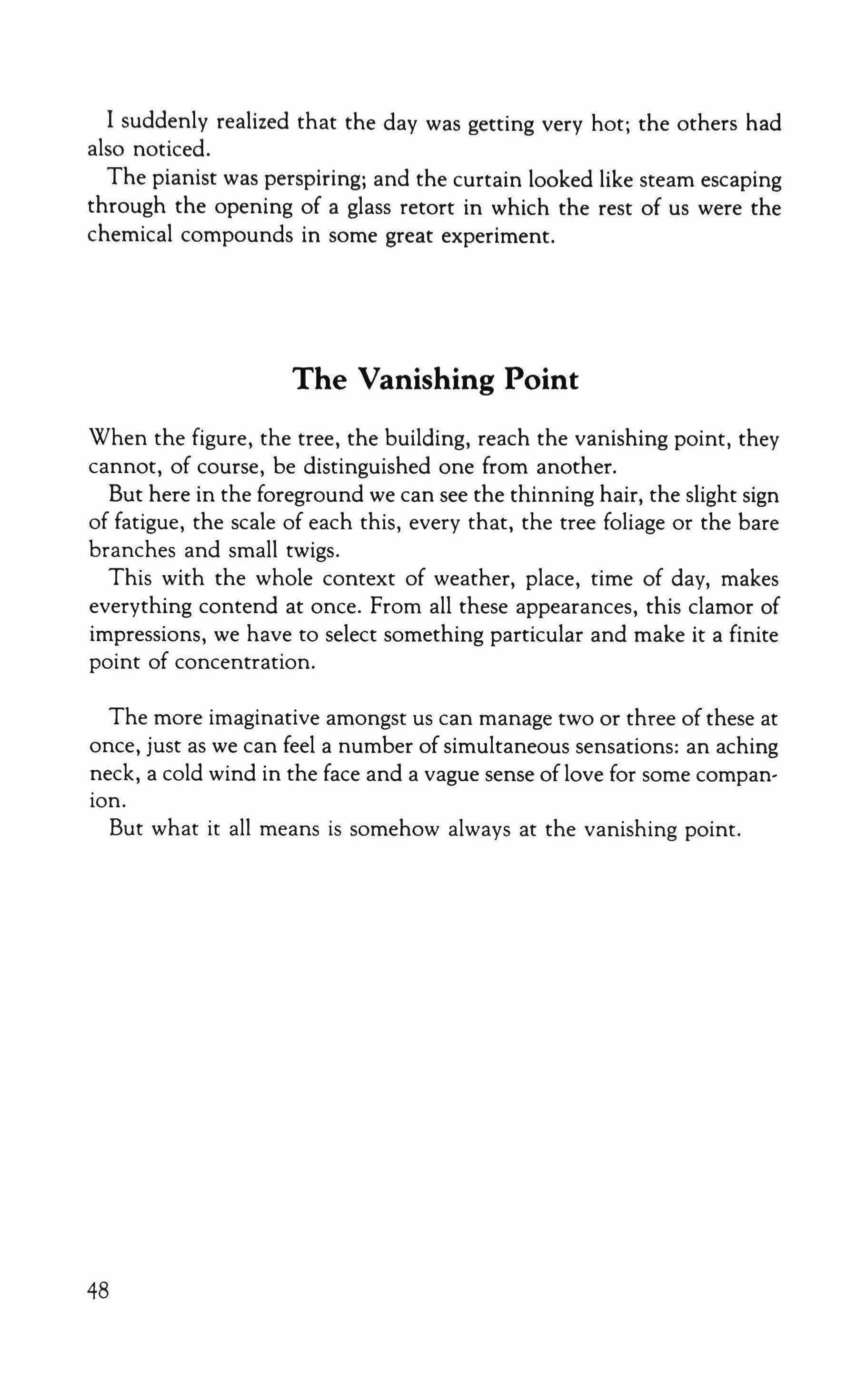
I suddenly realized that the day was getting very hot; the others had also noticed.
The pianist was perspiring; and the curtain looked like steam escaping through the opening of a glass retort in which the rest of us were the chemical compounds in some great experiment.
The Vanishing Point
When the figure, the tree, the building, reach the vanishing point, they cannot, of course, be distinguished one from another.
But here in the foreground we can see the thinning hair, the slight sign of fatigue, the scale of each this, every that, the tree foliage or the bare branches and small twigs.
This with the whole context of weather, place, time of day, makes everything contend at once. From all these appearances, this clamor of impressions, we have to select something particular and make it a finite point of concentration.
The more imaginative amongst us can manage two or three of these at once, just as we can feel a number of simultaneous sensations: an aching neck, a cold wind in the face and a vague sense of love for some companion.
But what it all means is somehow always at the vanishing point.
48
War
David Plante
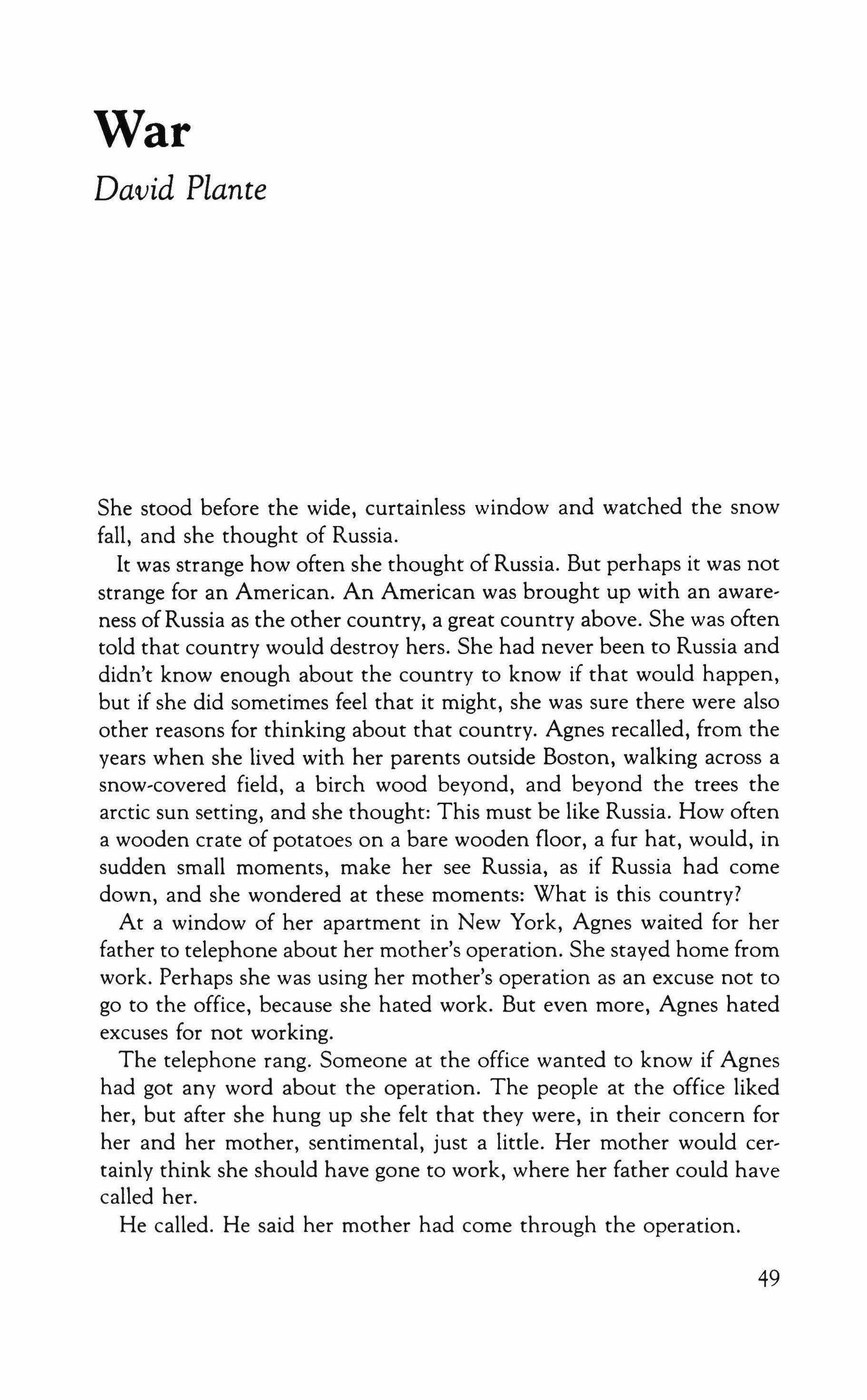
She stood before the wide, curtainless window and watched the snow fall, and she thought of Russia.
It was strange how often she thought of Russia. But perhaps it was not strange for an American. An American was brought up with an awareness ofRussia as the other country, a great country above. She was often told that country would destroy hers. She had never been to Russia and didn't know enough about the country to know if that would happen, but if she did sometimes feel that it might, she was sure there were also other reasons for thinking about that country. Agnes recalled, from the years when she lived with her parents outside Boston, walking across a snow-covered field, a birch wood beyond, and beyond the trees the arctic sun setting, and she thought: This must be like Russia. How often a wooden crate of potatoes on a bare wooden floor, a fur hat, would, in sudden small moments, make her see Russia, as if Russia had come down, and she wondered at these moments: What is this country?
At a window of her apartment in New York, Agnes waited for her father to telephone about her mother's operation. She stayed home from work. Perhaps she was using her mother's operation as an excuse not to go to the office, because she hated work. But even more, Agnes hated excuses for not working.
The telephone rang. Someone at the office wanted to know if Agnes had got any word about the operation. The people at the office liked her, but after she hung up she felt that they were, in their concern for her and her mother, sentimental, just a little. Her mother would certainly think she should have gone to work, where her father could have called her.
He called. He said her mother had come through the operation.
49
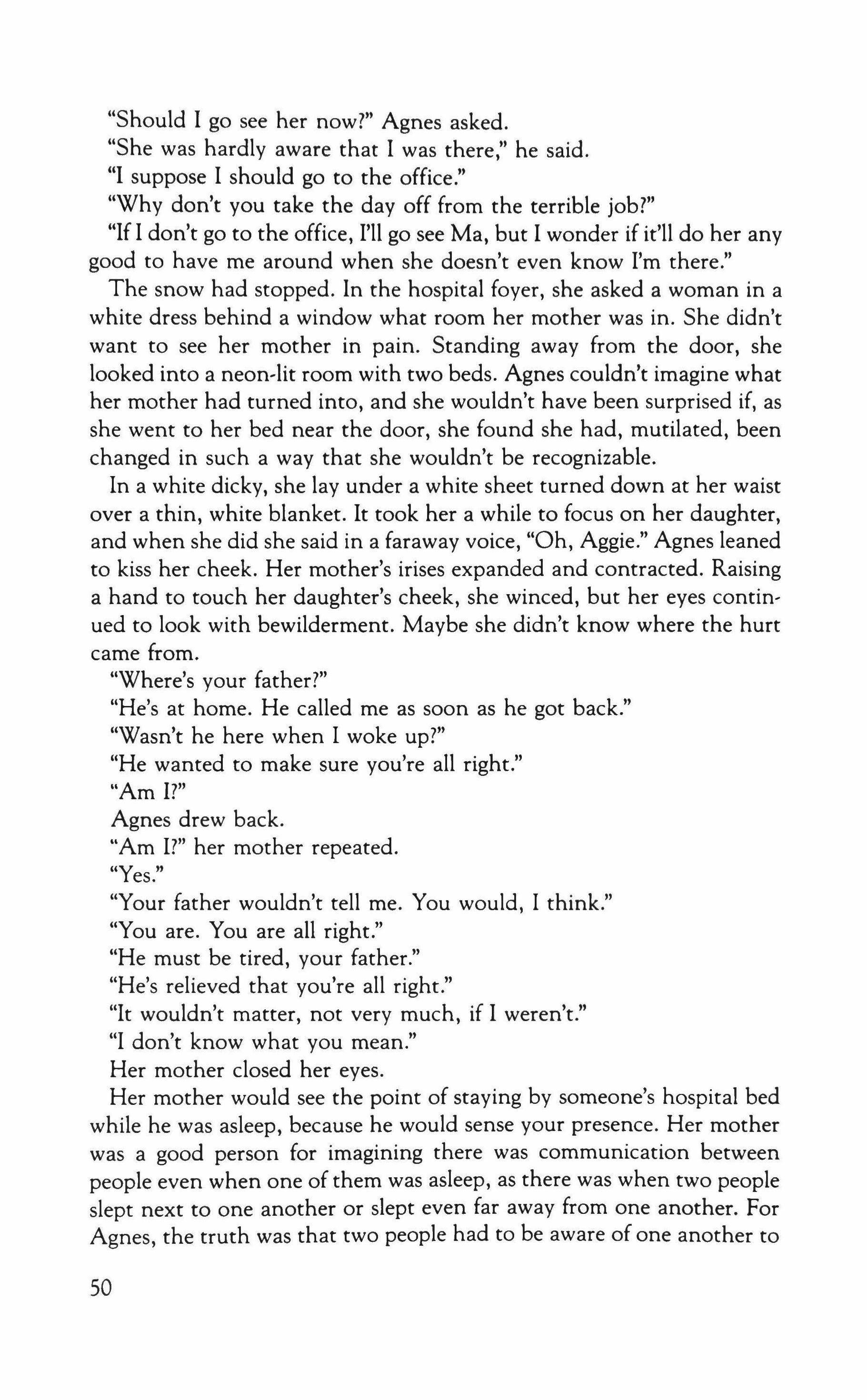
"Should I go see her now?" Agnes asked.
"She was hardly aware that I was there," he said.
"I suppose I should go to the office."
"Why don't you take the day off from the terrible job?"
"If I don't go to the office, I'll go see Ma, but I wonder if it'll do her any good to have me around when she doesn't even know I'm there."
The snow had stopped. In the hospital foyer, she asked a woman in a white dress behind a window what room her mother was in. She didn't want to see her mother in pain. Standing away from the door, she looked into a neon-lit room with two beds. Agnes couldn't imagine what her mother had turned into, and she wouldn't have been surprised if, as she went to her bed near the door, she found she had, mutilated, been changed in such a way that she wouldn't be recognizable.
In a white dicky, she lay under a white sheet turned down at her waist over a thin, white blanket. It took her a while to focus on her daughter, and when she did she said in a faraway voice, "Oh, Aggie." Agnes leaned to kiss her cheek. Her mother's irises expanded and contracted. Raising a hand to touch her daughter's cheek, she winced, but her eyes continued to look with bewilderment. Maybe she didn't know where the hurt came from.
"Where's your father?"
"He's at home. He called me as soon as he got back."
"Wasn't he here when I woke up?"
"He wanted to make sure you're all right."
"Am I?"
Agnes drew back.
"Am I?" her mother repeated.
"Yes."
"Your father wouldn't tell me. You would, I think."
"You are. You are all right."
"He must be tired, your father."
"He's relieved that you're all right."
"It wouldn't matter, not very much, if I weren't."
"I don't know what you mean."
Her mother closed her eyes.
Her mother would see the point of staying by someone's hospital bed while he was asleep, because he would sense your presence. Her mother was a good person for imagining there was communication between people even when one of them was asleep, as there was when two people slept next to one another or slept even far away from one another. For Agnes, the truth was that two people had to be aware of one another to
50
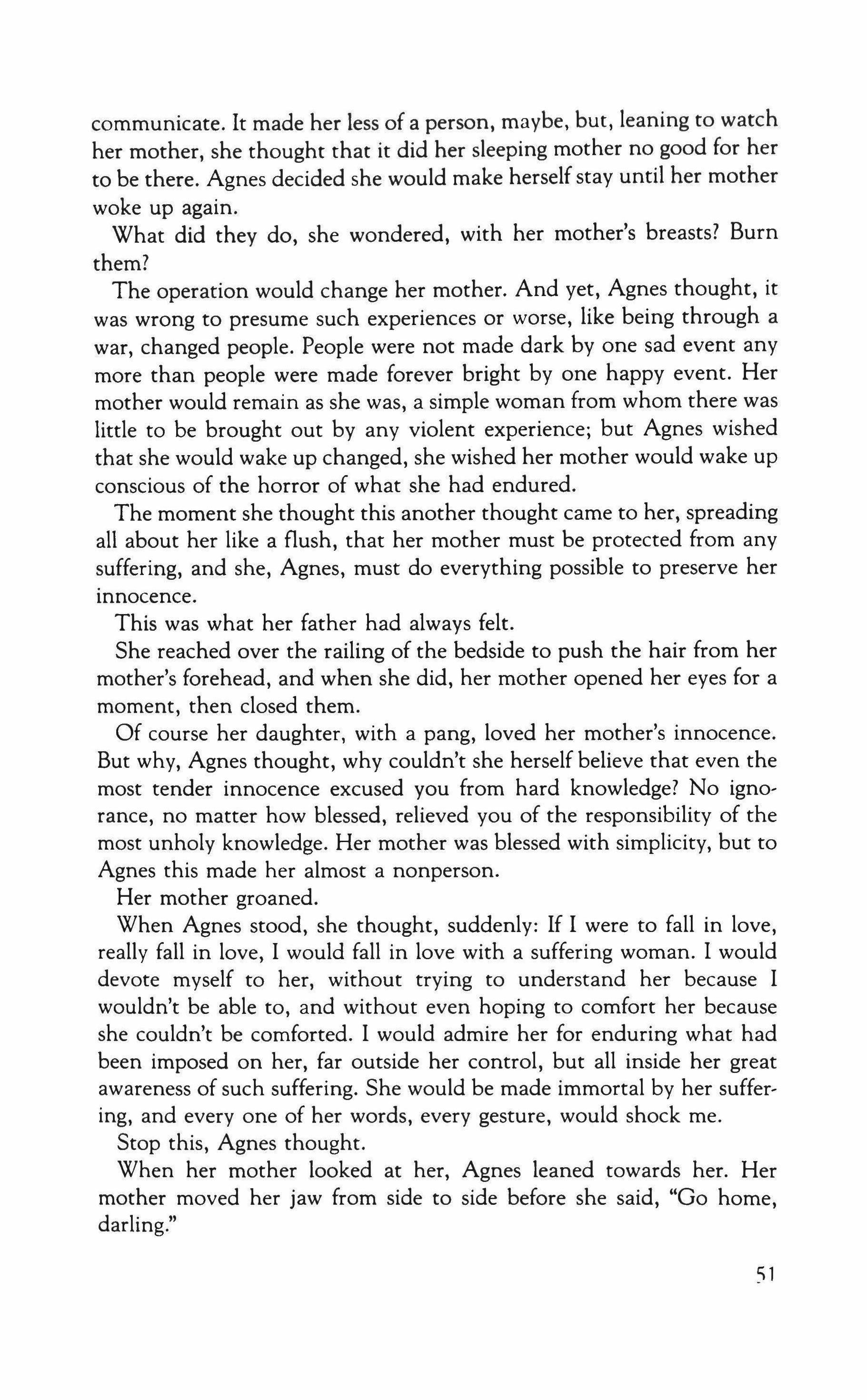
communicate. It made her less of a person, maybe, but, leaning to watch her mother, she thought that it did her sleeping mother no good for her to be there. Agnes decided she would make herself stay until her mother woke up again.
What did they do, she wondered, with her mother's breasts? Burn them?
The operation would change her mother. And yet, Agnes thought, it was wrong to presume such experiences or worse, like being through a war, changed people. People were not made dark by one sad event any more than people were made forever bright by one happy event. Her mother would remain as she was, a simple woman from whom there was little to be brought out by any violent experience; but Agnes wished that she would wake up changed, she wished her mother would wake up conscious of the horror of what she had endured.
The moment she thought this another thought came to her, spreading all about her like a flush, that her mother must be protected from any suffering, and she, Agnes, must do everything possible to preserve her innocence.
This was what her father had always felt.
She reached over the railing of the bedside to push the hair from her mother's forehead, and when she did, her mother opened her eyes for a moment, then closed them.
Of course her daughter, with a pang, loved her mother's innocence. But why, Agnes thought, why couldn't she herself believe that even the most tender innocence excused you from hard knowledge? No ignorance, no matter how blessed, relieved you of the responsibility of the most unholy knowledge. Her mother was blessed with simplicity, but to Agnes this made her almost a nonperson.
Her mother groaned.
When Agnes stood, she thought, suddenly: If I were to fall in love, really fall in love, I would fall in love with a suffering woman. I would devote myself to her, without trying to understand her because I wouldn't be able to, and without even hoping to comfort her because she couldn't be comforted. I would admire her for enduring what had been imposed on her, far outside her control, but all inside her great awareness of such suffering. She would be made immortal by her suffering, and everyone of her words, every gesture, would shock me.
Stop this, Agnes thought.
When her mother looked at her, Agnes leaned towards her. Her mother moved her jaw from side to side before she said, "Go home, darling."
51

"Don't you want me to sit by you?"
"I keep falling asleep."
"I'll sit with you until you fall asleep again."
"Go now."
"Do you want me to?"
"You can't love me when I'm suffering like this."
A little thrill went through Agnes.
What her mother had said was so strange to Agnes, when the elevator doors opened onto the lobby she wasn't sure which way to go. Even in the taxi, she had a sense of not knowing where she would end up. She put her hands to her head, then she said to the taxi driver, "I forgot something at the hospital. I've got to go back." But as the driver was about to turn, she said, "No, never mind," and she told him to take her downtown.
Entering the office, she saw herself, a tall woman with black hair, through the eyes of her colleagues. Three got up from their desks to meet her and ask how things were. She didn't want them to think she'd come now for their attention, though she admitted to herself that, on the way, she'd anticipated the little drama in the office of people around her. She said, with a frown, "My mother is fine," and she stepped back to walk around the people in front of her to go to her desk.
As she moved papers about her desk, tears filled her eyes. She put the papers down and pressed the tips of her index finger and thumb to her eyes. The tears ran down her fingers into her palm.
Her job was in a small research company. If a manufacturer of hair tonic wanted to find out what the public thought about his product, he asked the company Agnes Bisson worked for to find out, and this was usually done by multiple-choice questionnaires and free samples; you were asked to check the box indicating the degree of your satisfaction. Often, people wrote in comments: "It made all my hair fall out." Agnes had taken this job temporarily after college to earn enough money to set herself up in an apartment, and she still told herself she was going to leave soon. As much as she hated it, though, she felt she was lucky having the job; she felt she, not really good at work, wouldn't be able to find any other. She imagined she was permitted to continue here because no one wanted to hurt her by telling her she had to go. At lunch, with one of her colleagues, she'd listen in silence to their complaints, and if she was asked what she thought, she'd say, "I'm there just by somebody's goodwill," and when she was told she was nuts, she'd be thrown out on her bum if she wasn't doing a good job, she'd become silent again.
52
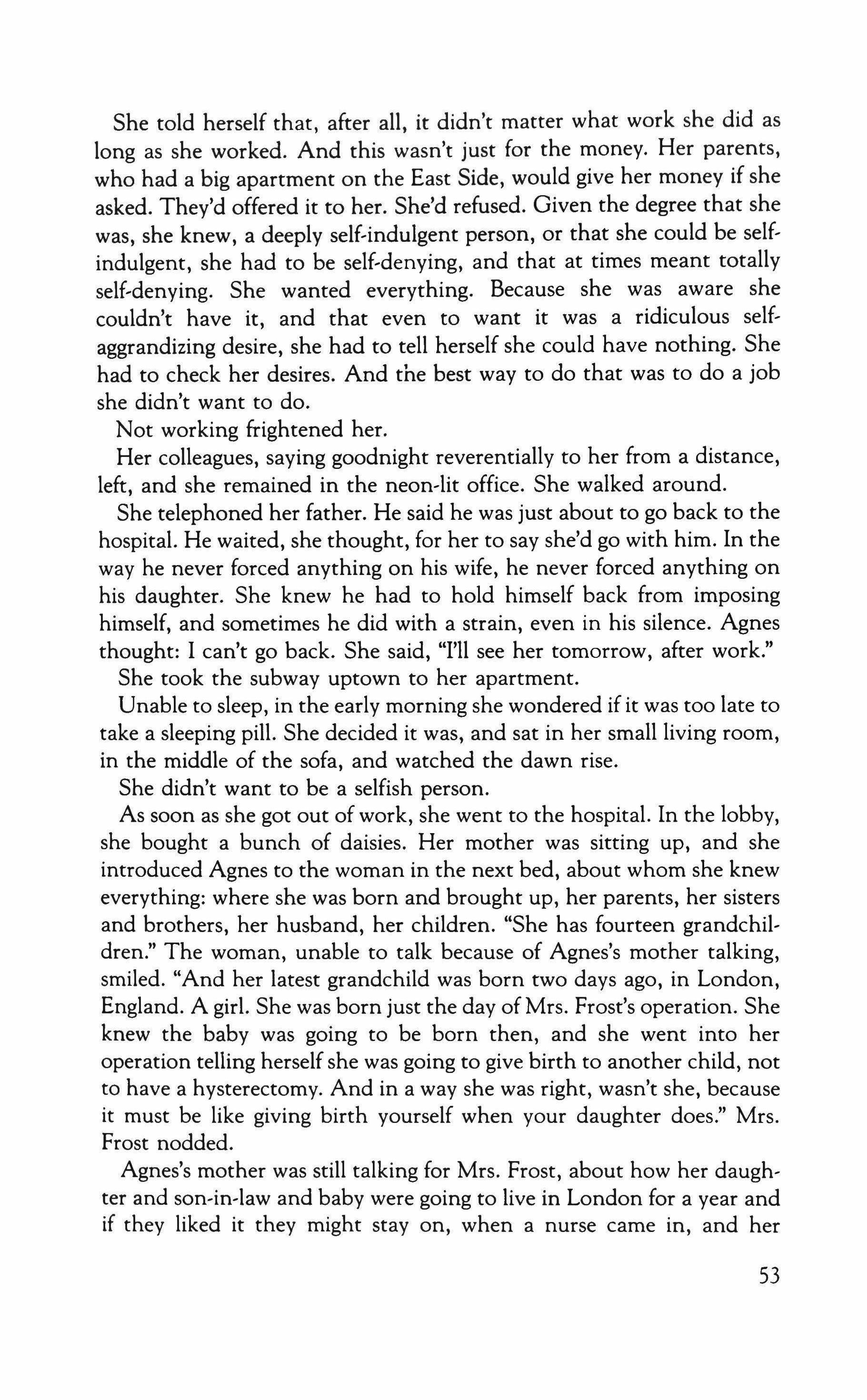
She told herself that, after all, it didn't matter what work she did as long as she worked. And this wasn't just for the money. Her parents, who had a big apartment on the East Side, would give her money if she asked. They'd offered it to her. She'd refused. Given the degree that she was, she knew, a deeply self-indulgent person, or that she could be selfindulgent, she had to be self-denying, and that at times meant totally self-denying. She wanted everything. Because she was aware she couldn't have it, and that even to want it was a ridiculous selfaggrandizing desire, she had to tell herself she could have nothing. She had to check her desires. And the best way to do that was to do a job she didn't want to do.
Not working frightened her.
Her colleagues, saying goodnight reverentially to her from a distance, left, and she remained in the neon-lit office. She walked around.
She telephoned her father. He said he was just about to go back to the hospital. He waited, she thought, for her to say she'd go with him. In the way he never forced anything on his wife, he never forced anything on his daughter. She knew he had to hold himself back from imposing himself, and sometimes he did with a strain, even in his silence. Agnes thought: I can't go back. She said, "I'll see her tomorrow, after work."
She took the subway uptown to her apartment.
Unable to sleep, in the early morning she wondered if it was too late to take a sleeping pill. She decided it was, and sat in her small living room, in the middle of the sofa, and watched the dawn rise.
She didn't want to be a selfish person.
As soon as she got out of work, she went to the hospital. In the lobby, she bought a bunch of daisies. Her mother was sitting up, and she introduced Agnes to the woman in the next bed, about whom she knew everything: where she was born and brought up, her parents, her sisters and brothers, her husband, her children. "She has fourteen grandchildren." The woman, unable to talk because of Agnes's mother talking, smiled. "And her latest grandchild was born two days ago, in London, England. A girl. She was born just the day of Mrs. Frost's operation. She knew the baby was going to be born then, and she went into her operation telling herself she was going to give birth to another child, not to have a hysterectomy. And in a way she was right, wasn't she, because it must be like giving birth yourself when your daughter does." Mrs. Frost nodded.
Agnes's mother was still talking for Mrs. Frost, about how her daughter and son-in-law and baby were going to live in London for a year and if they liked it they might stay on, when a nurse came in, and her
53

mother explained to the nurse, as if she had been listening, that so far they liked London. Agnes stood to the side as the nurse pulled a curtain, behind which her mother continued to talk: had the nurse ever been to London, and wouldn't she be pleased to go?
Mrs. Frost said, "Your mother is a charming woman."
"I know," Agnes said.
By her mother's bedside again, Agnes asked, "Does it hurt?"
"When I move, so I try not to move."
Agnes made herself stay until visiting hours were over, listening to her mother talk about the doctors, nurses, orderlies, cleaners. Her mother was interested in the simple facts of where people lived and what kind of furniture they had and what they ate; there was no apparent reason for her collecting these facts, which she seemed to appreciate for themselves. After talking to, or, rather, questioning the person by her on a bus, she never added all the facts up into a judgment to determine if she liked or didn't like the person, because she never made friends with these people, never saw them again. On the way back to her apartment on a bus, Agnes thought about this. Her mother's interest in people, intense, sometimes puzzling to them and always embarrassing to Agnes when she was present, didn't come to anything. It was as if her mother didn't understand that most people abstracted from facts to form even a mild opinion. Her mother would suddenly seem to wonder why she was asking so many questions.
Agnes imagined her mother's mental makeup was essentially different from her own, even to the way she saw and heard. There were moments when Agnes caught her listening, stopped on the sidewalk, to the whippwhipp-whipp of a police siren. Agnes would have to get her going, and would chat as they went, to start her mother talking again. If, crossing a street, Agnes told her a car was coming from the left, her mother always looked right.
She imagined her mother saying, "Why can't you know, darling, what's keeping you awake?"
Walking about her dark apartment and pausing at the windows to look out at the nighttime street, it occurred to her why she wouldn't take a sleeping pill: because she had to be awake. She must be aware of everything that was happening, and what was happening was enormous. Yet, when she tried to think it out, she ended up only thinking that unless she was able to specify what was enormous, it was an exaggeration, and there was nothing in it really to think out. Maybe that was why her deepening sense of sadness was so intolerable to her: she couldn't explain it, and if she couldn't explain it, she couldn't believe it.
54
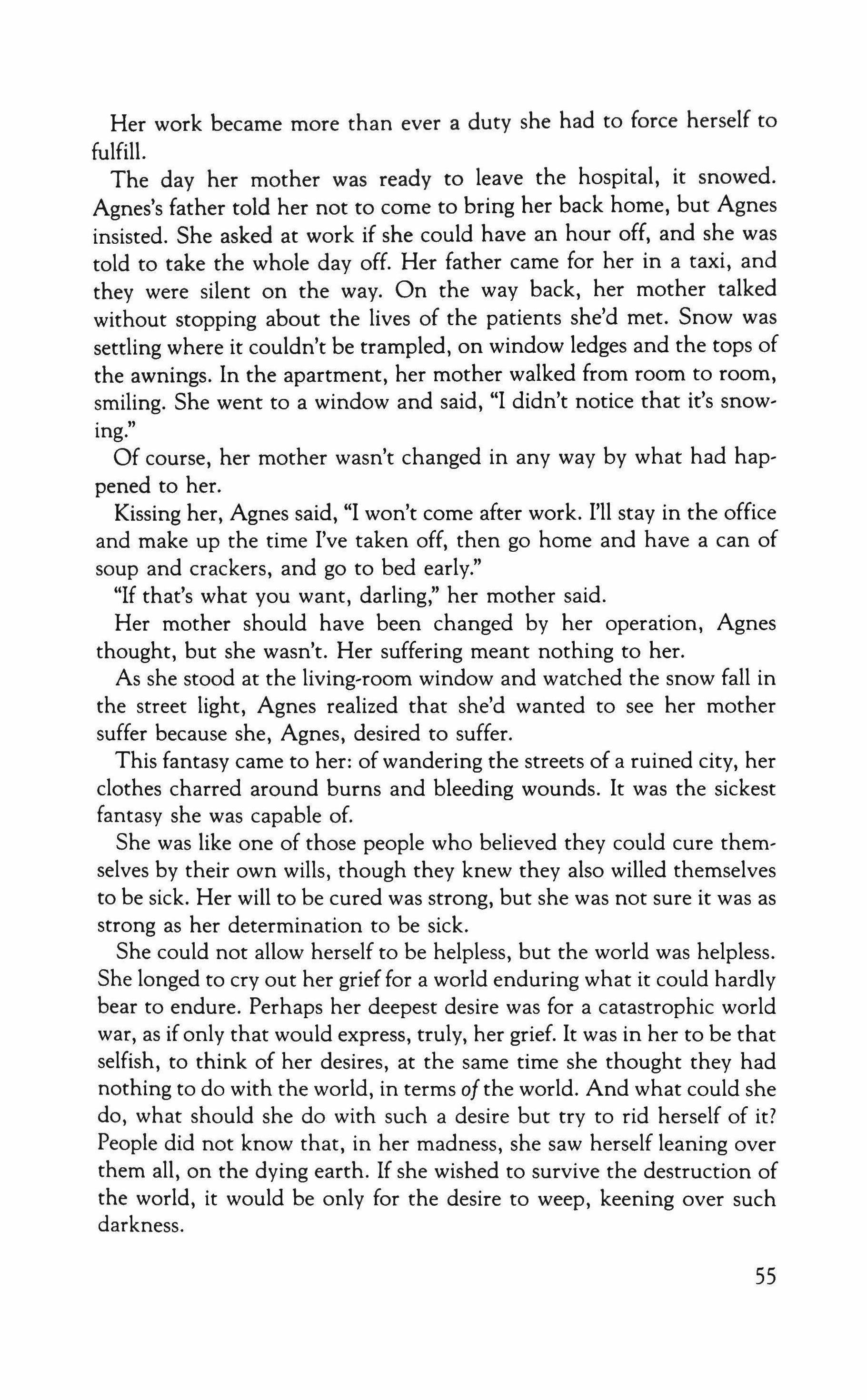
Her work became more than ever a duty she had to force herself to fulfill.
The day her mother was ready to leave the hospital, it snowed. Agnes's father told her not to come to bring her back home, but Agnes insisted. She asked at work if she could have an hour off, and she was told to take the whole day off. Her father came for her in a taxi, and they were silent on the way. On the way back, her mother talked without stopping about the lives of the patients she'd met. Snow was settling where it couldn't be trampled, on window ledges and the tops of the awnings. In the apartment, her mother walked from room to room, smiling. She went to a window and said, "I didn't notice that it's snow, ing."
Of course, her mother wasn't changed in any way by what had hap, pened to her.
Kissing her, Agnes said, "I won't come after work. I'll stay in the office and make up the time I've taken off, then go home and have a can of soup and crackers, and go to bed early."
"If that's what you want, darling," her mother said.
Her mother should have been changed by her operation, Agnes thought, but she wasn't. Her suffering meant nothing to her.
As she stood at the living-room window and watched the snow fall in the street light, Agnes realized that she'd wanted to see her mother suffer because she, Agnes, desired to suffer.
This fantasy came to her: of wandering the streets of a ruined city, her clothes charred around burns and bleeding wounds. It was the sickest fantasy she was capable of.
She was like one of those people who believed they could cure them, selves by their own wills, though they knew they also willed themselves to be sick. Her will to be cured was strong, but she was not sure it was as strong as her determination to be sick.
She could not allow herself to be helpless, but the world was helpless. She longed to cry out her grief for a world enduring what it could hardly bear to endure. Perhaps her deepest desire was for a catastrophic world war, as if only that would express, truly, her grief. It was in her to be that selfish, to think of her desires, at the same time she thought they had nothing to do with the world, in terms ofthe world. And what could she do, what should she do with such a desire but try to rid herself of it? People did not know that, in her madness, she saw herself leaning over them all, on the dying earth. If she wished to survive the destruction of the world, it would be only for the desire to weep, keening over such darkness.
55

During the four following workdays, she made excuses to her parents for not going to see them. She said she was taking work home.
Saturday, she didn't call, and they didn't call her.
She stood at the window of her living room and watched the falling snow appear to rise, and a restlessness descended on Agnes. She turned into her room and walked from wall to wall, her arms crossed. She thought she'd brought her feelings and thoughts together enough to control them.
Now, she told herself, she was just restless.
And if it wasn't restlessness, but something more, what was it, for which, at these moments of dangerous freedom, mere restlessness seemed to her as repressive an expression of what she felt as stark stillness?
But that she should give her feelings any importance-feeling which should be kept unimportant, because there was nothing else to do with them but keep them unimportant - was her biggest fault as an honest person. She hated the importance she couldn't help giving them. These dangerous moments made her long for another country where she could give her feelings all the exaggerated importance they insisted were their right.
Agnes went into her bedroom and lay on her bed.
She hated exaggeration. She hated anything that suggested other than what it was, and insisted that things could be seen in themselves. When she sat up, she stared at the bedside table on which there was a water glass, and she said to herself again that she was just restless. She hated the suggestion that there was more to her feeling than mere restlessness as she hated the sense that there was more to the water glass than what she saw; she hated the great feelings and she hated the details, and sometimes she hated the details enough to want to destroy them because the more you stared at a detail the more it suggested, and when it suggested what had nothing to do with it-that still glass expanding, in fine, gray rings of light, into great meanings-it became utterly hateful. She shut her eyes and lay back, her head on the pillow twisted to the side.
When she came out of her apartment on West Seventy-sixth Street, snow was no longer falling, and there was a strange light that appeared to rise dimly out of the snow, which rounded out car hoods and curbs. She walked towards Central Park.
On Central Park West, taxis sped through the rutted snow. She leaned against a pole, then she crossed the avenue when the taxis stopped at a red light. They swerved in the slush when they braked.
56
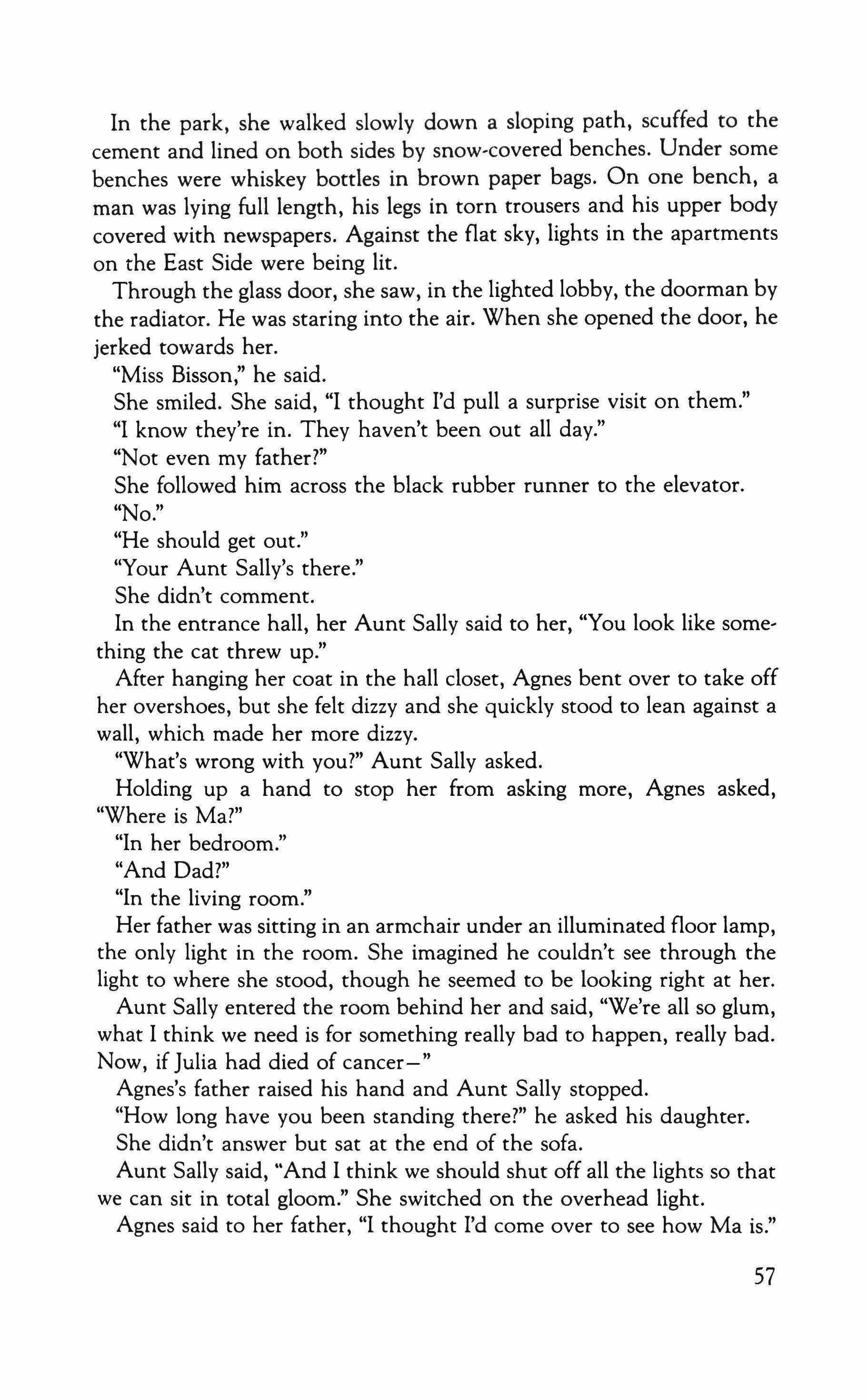
In the park, she walked slowly down a sloping path, scuffed to the cement and lined on both sides by snow-covered benches. Under some benches were whiskey bottles in brown paper bags. On one bench, a man was lying full length, his legs in torn trousers and his upper body covered with newspapers. Against the flat sky, lights in the apartments on the East Side were being lit.
Through the glass door, she saw, in the lighted lobby, the doorman by the radiator. He was staring into the air. When she opened the door, he jerked towards her.
"Miss Bisson," he said.
She smiled. She said, "I thought I'd pull a surprise visit on them."
"I know they're in. They haven't been out all day."
"Not even my father?"
She followed him across the black rubber runner to the elevator. "No."
"He should get out."
"Your Aunt Sally's there."
She didn't comment.
In the entrance hall, her Aunt Sally said to her, "You look like something the cat threw up."
After hanging her coat in the hall closet, Agnes bent over to take off her overshoes, but she felt dizzy and she quickly stood to lean against a wall, which made her more dizzy.
"What's wrong with you?" Aunt Sally asked.
Holding up a hand to stop her from asking more, Agnes asked, "Where is Ma?"
"In her bedroom."
"And Dad?"
"In the living room."
Her father was sitting in an armchair under an illuminated floor lamp, the only light in the room. She imagined he couldn't see through the light to where she stood, though he seemed to be looking right at her.
Aunt Sally entered the room behind her and said, "We're all so glum, what I think we need is for something really bad to happen, really bad. Now, if Julia had died of cancer-"
Agnes's father raised his hand and Aunt Sally stopped.
"How long have you been standing there?" he asked his daughter. She didn't answer but sat at the end of the sofa.
Aunt Sally said, "And I think we should shut off all the lights so that we can sit in total gloom." She switched on the overhead light.
Agnes said to her father, "I thought I'd come over to see how Ma is."
57
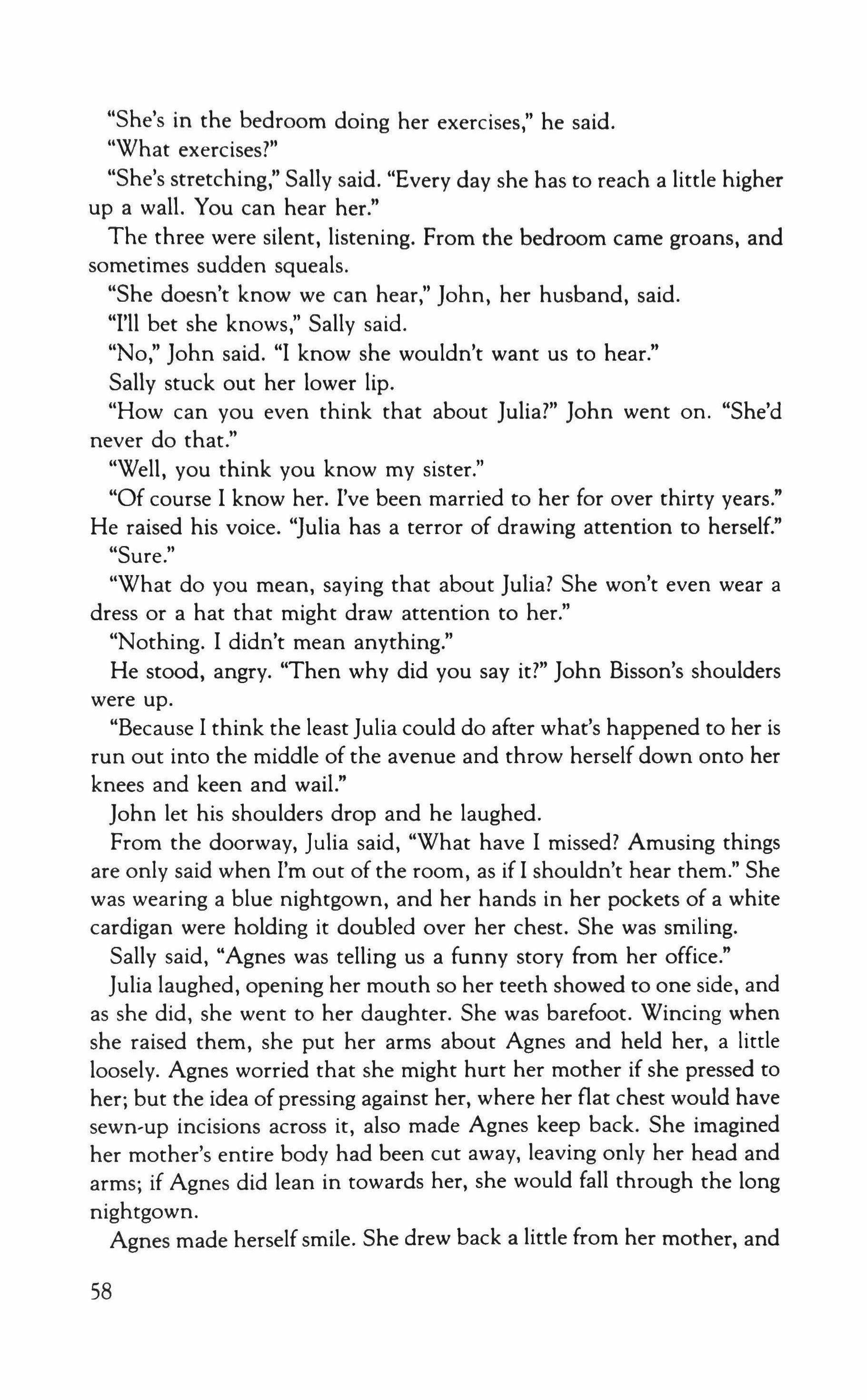
"She's in the bedroom doing her exercises," he said. "What exercises?"
"She's stretching," Sally said. "Every day she has to reach a little higher up a wall. You can hear her."
The three were silent, listening. From the bedroom came groans, and sometimes sudden squeals.
"She doesn't know we can hear," John, her husband, said.
"I'll bet she knows," Sally said.
"No," John said. "I know she wouldn't want us to hear."
Sally stuck out her lower lip.
"How can you even think that about Julia?" John went on. "She'd never do that."
"Well, you think you know my sister."
"Of course I know her. I've been married to her for over thirty years." He raised his voice. "Julia has a terror of drawing attention to herself." "Sure."
"What do you mean, saying that about Julia? She won't even wear a dress or a hat that might draw attention to her."
"Nothing. I didn't mean anything."
He stood, angry. "Then why did you say it?" John Bisson's shoulders were up.
"Because I think the least Julia could do after what's happened to her is run out into the middle of the avenue and throw herself down onto her knees and keen and wail."
John let his shoulders drop and he laughed.
From the doorway, Julia said, "What have I missed? Amusing things are only said when I'm out of the room, as if I shouldn't hear them." She was wearing a blue nightgown, and her hands in her pockets of a white cardigan were holding it doubled over her chest. She was smiling.
Sally said, "Agnes was telling us a funny story from her office."
Julia laughed, opening her mouth so her teeth showed to one side, and as she did, she went to her daughter. She was barefoot. Wincing when she raised them, she put her arms about Agnes and held her, a little loosely. Agnes worried that she might hurt her mother if she pressed to her; but the idea of pressing against her, where her flat chest would have sewn-up incisions across it, also made Agnes keep back. She imagined her mother's entire body had been cut away, leaving only her head and arms; if Agnes did lean in towards her, she would fall through the long nightgown.
Agnes made herself smile. She drew back a little from her mother, and
58
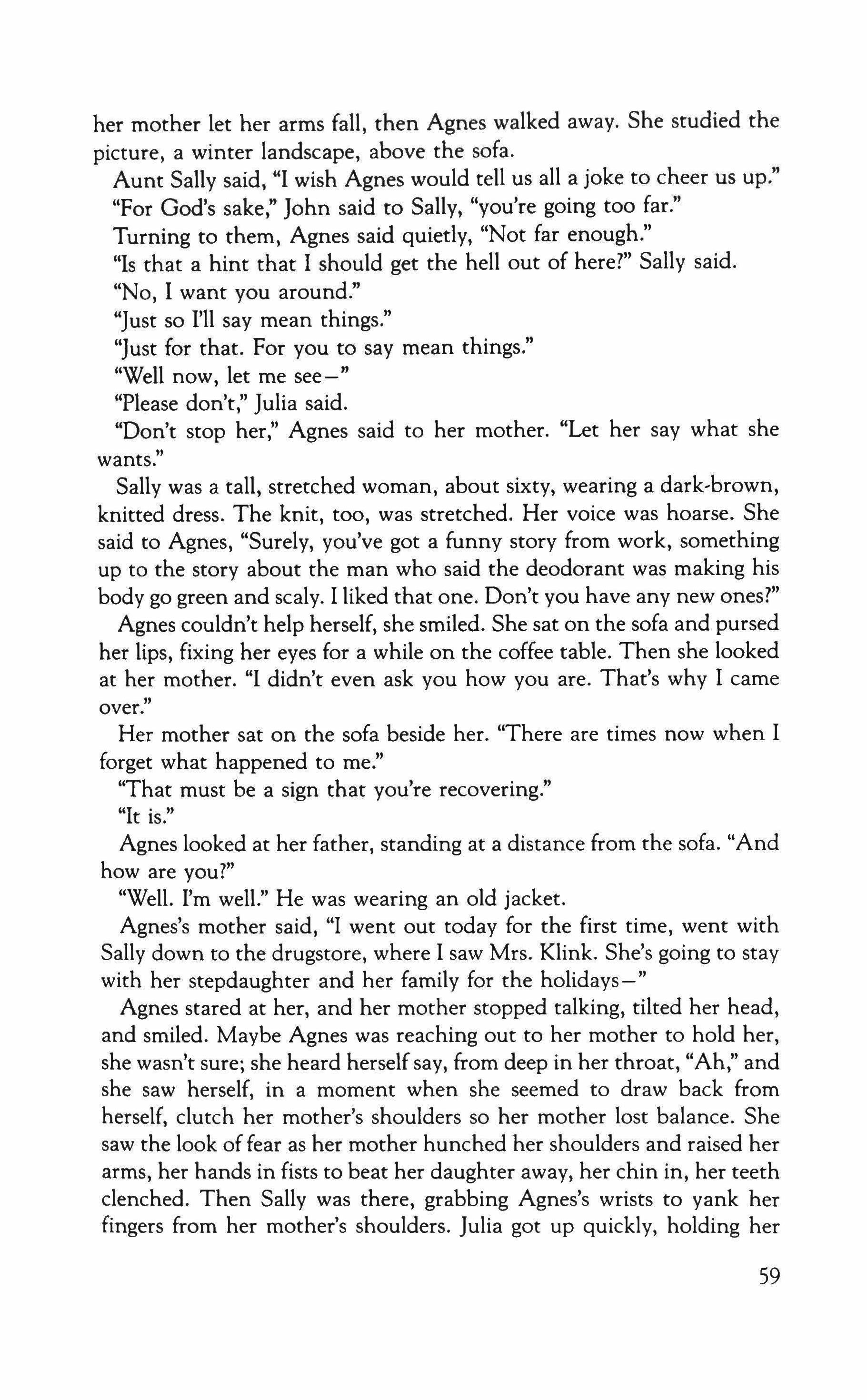
her mother let her arms fall, then Agnes walked away. She studied the picture, a winter landscape, above the sofa.
Aunt Sally said, "I wish Agnes would tell us all a joke to cheer us up."
"For God's sake," John said to Sally, "you're going too far."
Turning to them, Agnes said quietly, "Not far enough."
"Is that a hint that 1 should get the hell out of here?" Sally said.
"No, 1 want you around."
"Just so I'll say mean things."
"Just for that. For you to say mean things."
"Well now, let me see-"
"Please don't," Julia said.
"Don't stop her," Agnes said to her mother. "Let her say what she wants."
Sally was a tall, stretched woman, about sixty, wearing a dark-brown, knitted dress. The knit, too, was stretched. Her voice was hoarse. She said to Agnes, "Surely, you've got a funny story from work, something up to the story about the man who said the deodorant was making his body go green and scaly. I liked that one. Don't you have any new ones?"
Agnes couldn't help herself, she smiled. She sat on the sofa and pursed her lips, fixing her eyes for a while on the coffee table. Then she looked at her mother. "I didn't even ask you how you are. That's why I came over."
Her mother sat on the sofa beside her. "There are times now when I forget what happened to me."
"That must be a sign that you're recovering."
"It is."
Agnes looked at her father, standing at a distance from the sofa. "And how are you?"
"Well. I'm well." He was wearing an old jacket.
Agnes's mother said, "I went out today for the first time, went with Sally down to the drugstore, where I saw Mrs. Klink. She's going to stay with her stepdaughter and her family for the holidays -"
Agnes stared at her, and her mother stopped talking, tilted her head, and smiled. Maybe Agnes was reaching out to her mother to hold her, she wasn't sure; she heard herself say, from deep in her throat, "Ah," and she saw herself, in a moment when she seemed to draw back from herself, clutch her mother's shoulders so her mother lost balance. She saw the look of fear as her mother hunched her shoulders and raised her arms, her hands in fists to beat her daughter away, her chin in, her teeth clenched. Then Sally was there, grabbing Agnes's wrists to yank her fingers from her mother's shoulders. Julia got up quickly, holding her
59
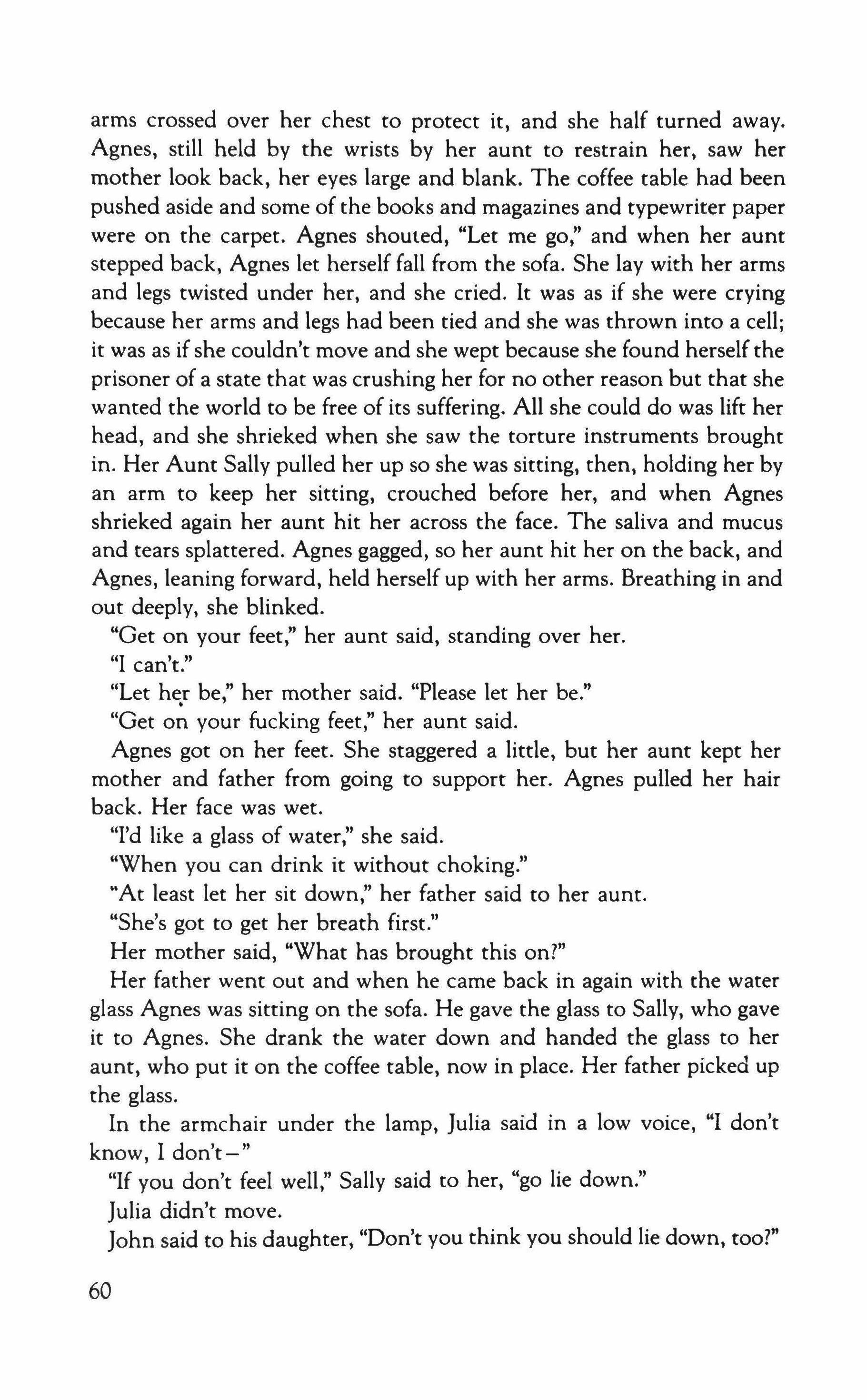
arms crossed over her chest to protect it, and she half turned away. Agnes, still held by the wrists by her aunt to restrain her, saw her mother look back, her eyes large and blank. The coffee table had been pushed aside and some of the books and magazines and typewriter paper were on the carpet. Agnes shouted, "Let me go," and when her aunt stepped back, Agnes let herself fall from the sofa. She lay with her arms and legs twisted under her, and she cried. It was as if she were crying because her arms and legs had been tied and she was thrown into a cell; it was as if she couldn't move and she wept because she found herselfthe prisoner of a state that was crushing her for no other reason but that she wanted the world to be free of its suffering. All she could do was lift her head, and she shrieked when she saw the torture instruments brought in. Her Aunt Sally pulled her up so she was sitting, then, holding her by an arm to keep her sitting, crouched before her, and when Agnes shrieked again her aunt hit her across the face. The saliva and mucus and tears splattered. Agnes gagged, so her aunt hit her on the back, and Agnes, leaning forward, held herself up with her arms. Breathing in and out deeply, she blinked.
"Get on your feet," her aunt said, standing over her.
"I can't."
"Let her be," her mother said. "Please let her be."
"Get on your fucking feet," her aunt said.
Agnes got on her feet. She staggered a little, but her aunt kept her mother and father from going to support her. Agnes pulled her hair back. Her face was wet.
"I'd like a glass of water," she said.
"When you can drink it without choking."
"At least let her sit down," her father said to her aunt.
"She's got to get her breath first."
Her mother said, "What has brought this on?"
Her father went out and when he came back in again with the water glass Agnes was sitting on the sofa. He gave the glass to Sally, who gave it to Agnes. She drank the water down and handed the glass to her aunt, who put it on the coffee table, now in place. Her father picked up the glass.
In the armchair under the lamp, Julia said in a low voice, "I don't know, I don't -"
"If you don't feel well," Sally said to her, "go lie down."
Julia didn't move.
John said to his daughter, "Don't you think you should lie down, too?"
60
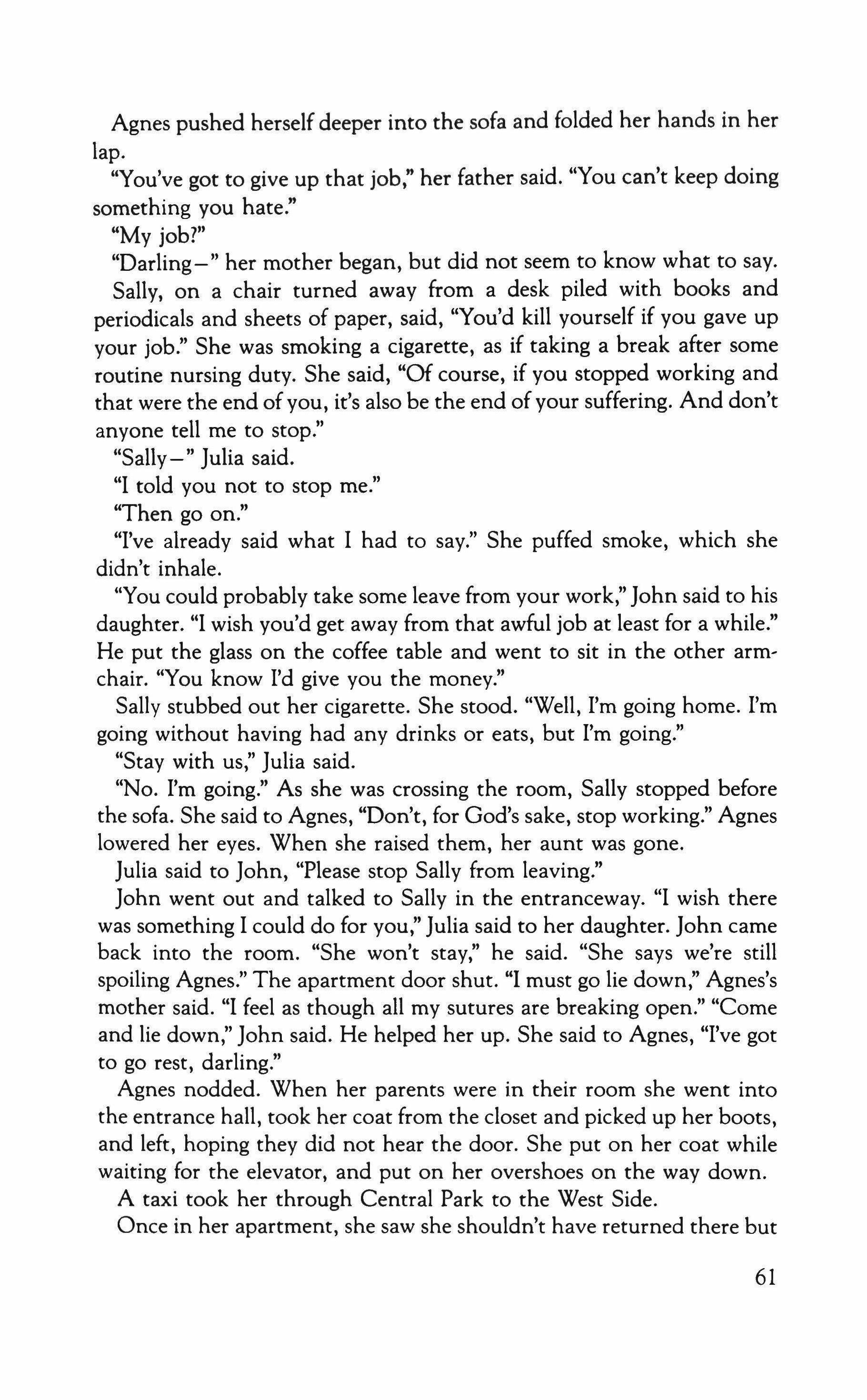
Agnes pushed herself deeper into the sofa and folded her hands in her lap.
"You've got to give up that job," her father said. "You can't keep doing something you hate."
"My job?"
"Darling-" her mother began, but did not seem to know what to say.
Sally, on a chair turned away from a desk piled with books and periodicals and sheets of paper, said, "You'd kill yourself if you gave up your job." She was smoking a cigarette, as if taking a break after some routine nursing duty. She said, "Of course, if you stopped working and that were the end of you, it's also be the end of your suffering. And don't anyone tell me to stop."
"Sally -" Julia said.
"I told you not to stop me."
"Then go on."
"I've already said what I had to say." She puffed smoke, which she didn't inhale.
"You could probably take some leave from your work," John said to his daughter. "I wish you'd get away from that awful job at least for a while." He put the glass on the coffee table and went to sit in the other armchair. "You know I'd give you the money."
Sally stubbed out her cigarette. She stood. "Well, I'm going home. I'm going without having had any drinks or eats, but I'm going."
"Stay with us," Julia said.
"No. I'm going." As she was crossing the room, Sally stopped before the sofa. She said to Agnes, "Don't, for God's sake, stop working." Agnes lowered her eyes. When she raised them, her aunt was gone.
Julia said to John, "Please stop Sally from leaving."
John went out and talked to Sally in the entranceway. "I wish there was something I could do for you," Julia said to her daughter. John came back into the room. "She won't stay," he said. "She says we're still spoiling Agnes." The apartment door shut. "I must go lie down," Agnes's mother said. "I feel as though all my sutures are breaking open." "Come and lie down," John said. He helped her up. She said to Agnes, "I've got to go rest, darling."
Agnes nodded. When her parents were in their room she went into the entrance hall, took her coat from the closet and picked up her boots, and left, hoping they did not hear the door. She put on her coat while waiting for the elevator, and put on her overshoes on the way down.
A taxi took her through Central Park to the West Side.
Once in her apartment, she saw she shouldn't have returned there but
61
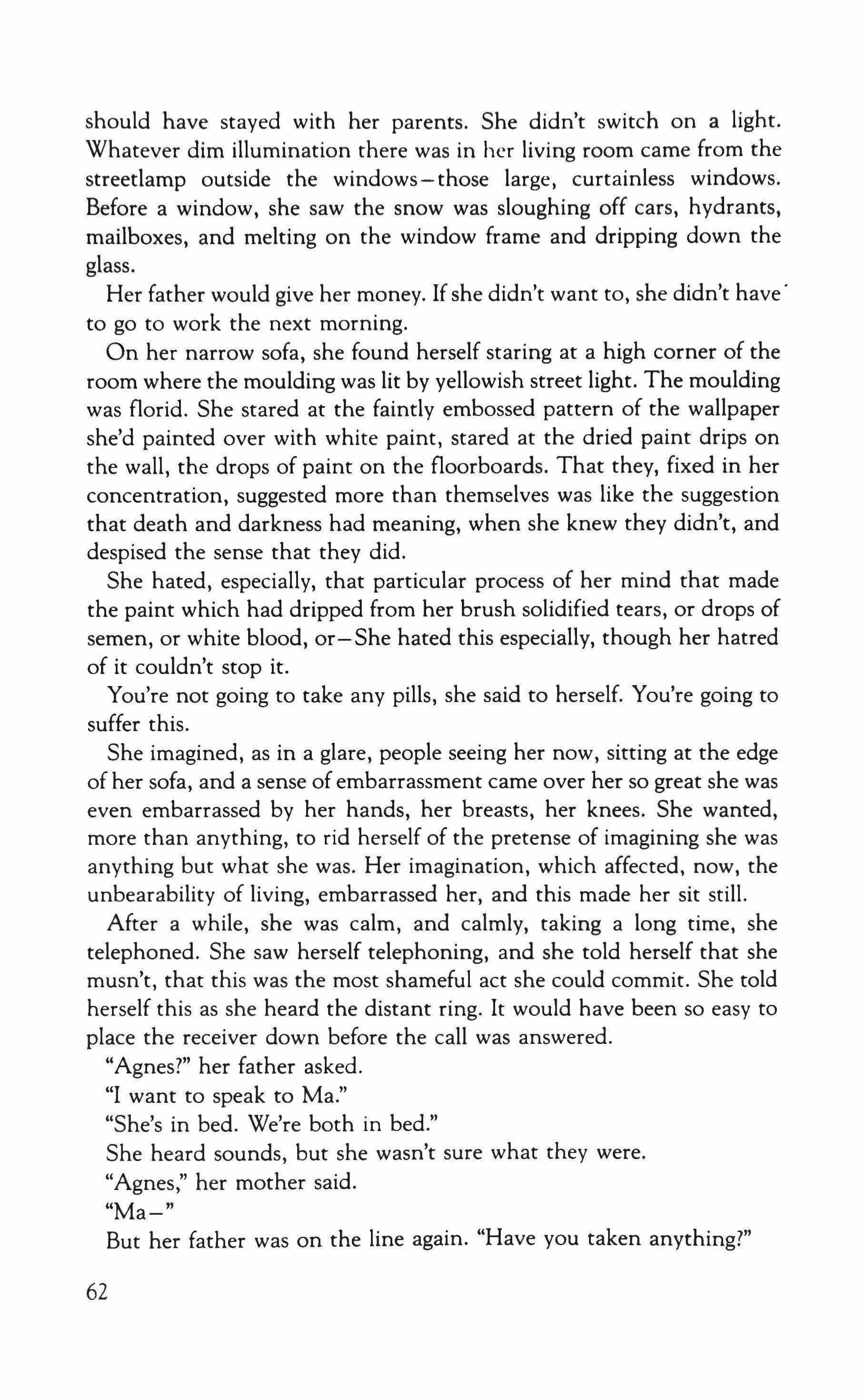
should have stayed with her parents. She didn't switch on a light. Whatever dim illumination there was in her living room came from the streetlamp outside the windows - those large, curtainless windows. Before a window, she saw the snow was sloughing off cars, hydrants, mailboxes, and melting on the window frame and dripping down the glass.
Her father would give her money. If she didn't want to, she didn't have' to go to work the next morning.
On her narrow sofa, she found herself staring at a high corner of the room where the moulding was lit by yellowish street light. The moulding was florid. She stared at the faintly embossed pattern of the wallpaper she'd painted over with white paint, stared at the dried paint drips on the wall, the drops of paint on the floorboards. That they, fixed in her concentration, suggested more than themselves was like the suggestion that death and darkness had meaning, when she knew they didn't, and despised the sense that they did.
She hated, especially, that particular process of her mind that made the paint which had dripped from her brush solidified tears, or drops of semen, or white blood, or-She hated this especially, though her hatred of it couldn't stop it.
You're not going to take any pills, she said to herself. You're going to suffer this.
She imagined, as in a glare, people seeing her now, sitting at the edge of her sofa, and a sense of embarrassment came over her so great she was even embarrassed by her hands, her breasts, her knees. She wanted, more than anything, to rid herself of the pretense of imagining she was anything but what she was. Her imagination, which affected, now, the unbearability of living, embarrassed her, and this made her sit still.
After a while, she was calm, and calmly, taking a long time, she telephoned. She saw herself telephoning, and she told herself that she musn't, that this was the most shameful act she could commit. She told herself this as she heard the distant ring. It would have been so easy to place the receiver down before the call was answered.
"Agnes?" her father asked.
"I want to speak to Ma."
"She's in bed. We're both in bed."
She heard sounds, but she wasn't sure what they were.
"Agnes," her mother said.
"Ma-"
But her father was on the line again. "Have you taken anything?"
62
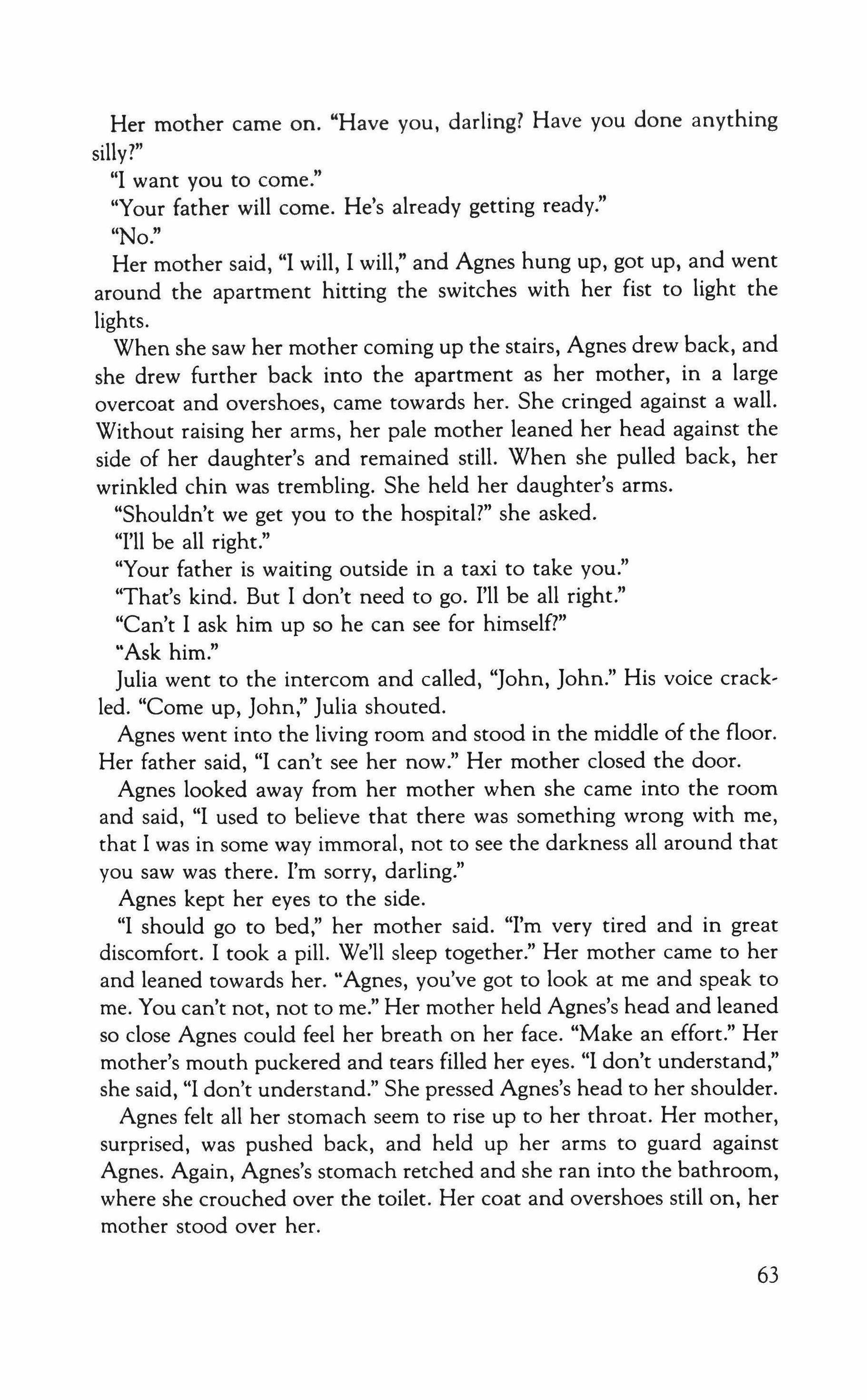
Her mother came on. "Have you, darling? Have you done anything silly?"
"I want you to come."
"Your father will come. He's already getting ready." "No."
Her mother said, "I will, I will," and Agnes hung up, got up, and went around the apartment hitting the switches with her fist to light the lights.
When she saw her mother coming up the stairs, Agnes drew back, and she drew further back into the apartment as her mother, in a large overcoat and overshoes, came towards her. She cringed against a wall. Without raising her arms, her pale mother leaned her head against the side of her daughter's and remained still. When she pulled back, her wrinkled chin was trembling. She held her daughter's arms.
"Shouldn't we get you to the hospital?" she asked.
"I'll be all right."
"Your father is waiting outside in a taxi to take you."
"That's kind. But I don't need to go. I'll be all right."
"Can't I ask him up so he can see for himself?"
"Ask him."
Julia went to the intercom and called, "John, John." His voice crackled. "Come up, John," Julia shouted.
Agnes went into the living room and stood in the middle of the floor. Her father said, "I can't see her now." Her mother closed the door.
Agnes looked away from her mother when she came into the room and said, "I used to believe that there was something wrong with me, that I was in some way immoral, not to see the darkness all around that you saw was there. I'm sorry, darling."
Agnes kept her eyes to the side.
"I should go to bed," her mother said. "I'm very tired and in great discomfort. I took a pill. We'll sleep together." Her mother came to her and leaned towards her. "Agnes, you've got to look at me and speak to me. You can't not, not to me." Her mother held Agnes's head and leaned so close Agnes could feel her breath on her face. "Make an effort." Her mother's mouth puckered and tears filled her eyes. "I don't understand," she said, "I don't understand." She pressed Agnes's head to her shoulder.
Agnes felt all her stomach seem to rise up to her throat. Her mother, surprised, was pushed back, and held up her arms to guard against Agnes. Again, Agnes's stomach retched and she ran into the bathroom, where she crouched over the toilet. Her coat and overshoes still on, her mother stood over her.
63

She said, "You want so badly for me to recognize that you suffer." In bed with her mother, Agnes slept lightly and woke when she felt her mother move. Or perhaps her mother hadn't moved, because Agnes saw her in the dim light lying so still it was as if she couldn't move. Her head was back and twisted a little to the side, and her neck was exposed. Her eyes gleamed beneath her lids. Agnes knew that what she wanted from her mother was that she should bear, and Agnes would love her for bearing, all the agonies of the world.
64
Africa
Robley Wilson, Jr.
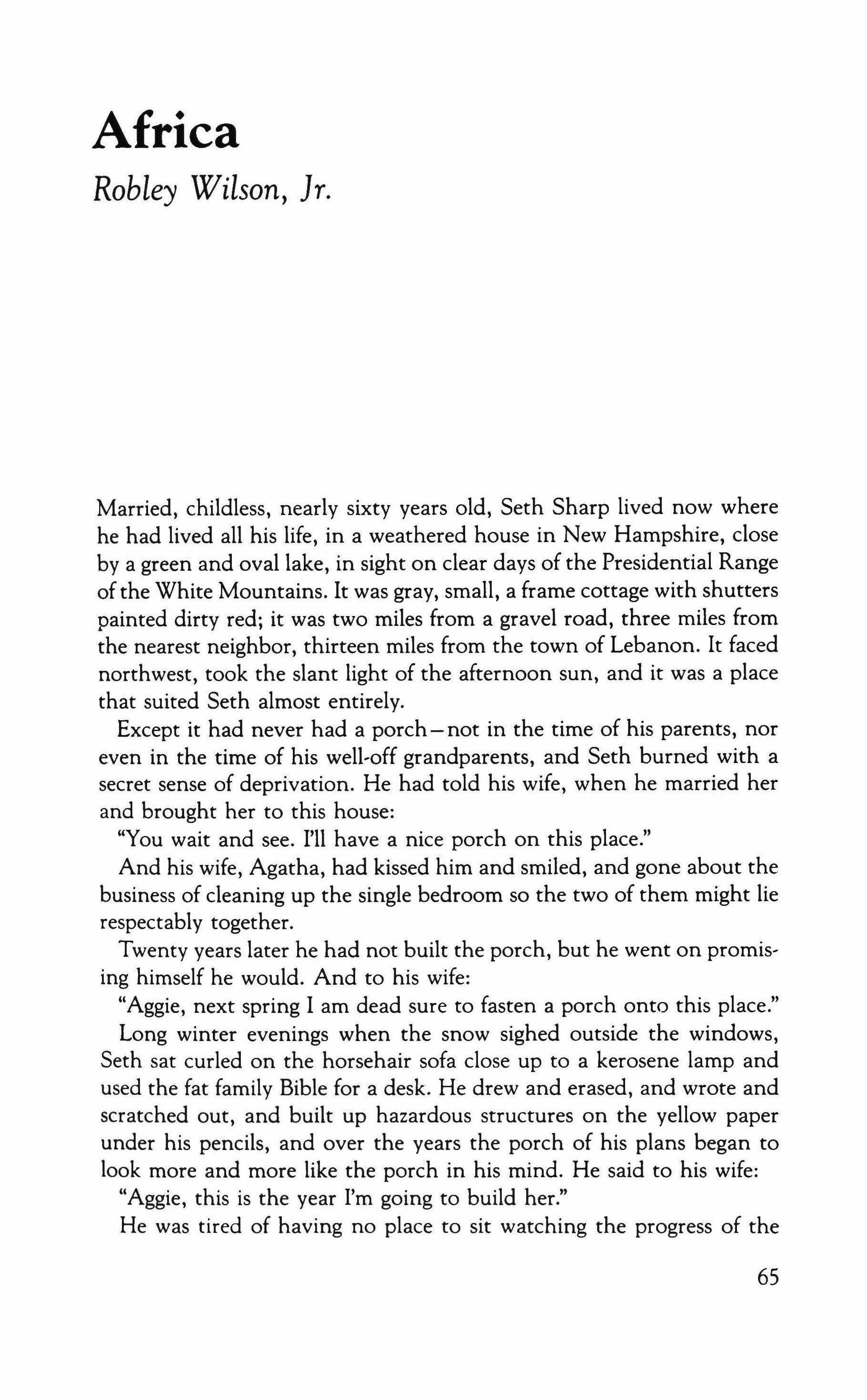
Married, childless, nearly sixty years old, Seth Sharp lived now where he had lived all his life, in a weathered house in New Hampshire, close by a green and oval lake, in sight on clear days of the Presidential Range of the White Mountains. It was gray, small, a frame cottage with shutters painted dirty red; it was two miles from a gravel road, three miles from the nearest neighbor, thirteen miles from the town of Lebanon. It faced northwest, took the slant light of the afternoon sun, and it was a place that suited Seth almost entirely.
Except it had never had a porch - not in the time of his parents, nor even in the time of his well-off grandparents, and Seth burned with a secret sense of deprivation. He had told his wife, when he married her and brought her to this house:
"You wait and see. I'll have a nice porch on this place."
And his wife, Agatha, had kissed him and smiled, and gone about the business of cleaning up the single bedroom so the two of them might lie respectably together.
Twenty years later he had not built the porch, but he went on promising himself he would. And to his wife:
"Aggie, next spring I am dead sure to fasten a porch onto this place."
Long winter evenings when the snow sighed outside the windows, Seth sat curled on the horsehair sofa close up to a kerosene lamp and used the fat family Bible for a desk. He drew and erased, and wrote and scratched out, and built up hazardous structures on the yellow paper under his pencils, and over the years the porch of his plans began to look more and more like the porch in his mind. He said to his wife:
"Aggie, this is the year I'm going to build her."
He was tired of having no place to sit watching the progress of the
65
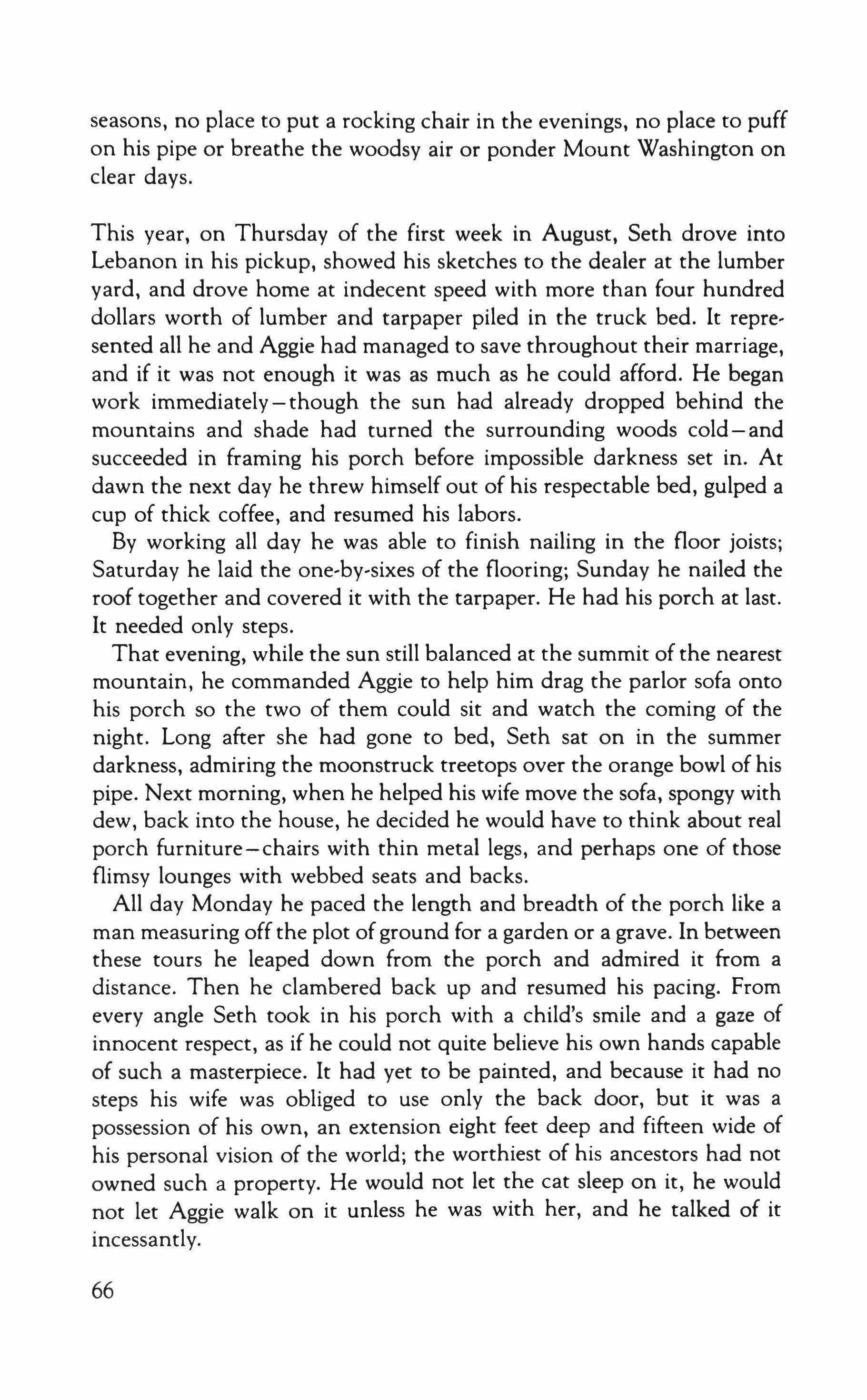
seasons, no place to put a rocking chair in the evenings, no place to puff on his pipe or breathe the woodsy air or ponder Mount Washington on clear days.
This year, on Thursday of the first week in August, Seth drove into Lebanon in his pickup, showed his sketches to the dealer at the lumber yard, and drove home at indecent speed with more than four hundred dollars worth of lumber and tarpaper piled in the truck bed. It represented all he and Aggie had managed to save throughout their marriage, and if it was not enough it was as much as he could afford. He began work immediately - though the sun had already dropped behind the mountains and shade had turned the surrounding woods cold-and succeeded in framing his porch before impossible darkness set in. At dawn the next day he threw himself out of his respectable bed, gulped a cup of thick coffee, and resumed his labors.
By working all day he was able to finish nailing in the floor joists; Saturday he laid the one-by-sixes of the flooring; Sunday he nailed the roof together and covered it with the tarpaper. He had his porch at last. It needed only steps.
That evening, while the sun still balanced at the summit of the nearest mountain, he commanded Aggie to help him drag the parlor sofa onto his porch so the two of them could sit and watch the coming of the night. Long after she had gone to bed, Seth sat on in the summer darkness, admiring the moonstruck treetops over the orange bowl of his pipe. Next morning, when he helped his wife move the sofa, spongy with dew, back into the house, he decided he would have to think about real porch furniture-chairs with thin metal legs, and perhaps one of those flimsy lounges with webbed seats and backs.
All day Monday he paced the length and breadth of the porch like a man measuring off the plot ofground for a garden or a grave. In between these tours he leaped down from the porch and admired it from a distance. Then he clambered back up and resumed his pacing. From every angle Seth took in his porch with a child's smile and a gaze of innocent respect, as if he could not quite believe his own hands capable of such a masterpiece. It had yet to be painted, and because it had no steps his wife was obliged to use only the back door, but it was a possession of his own, an extension eight feet deep and fifteen wide of his personal vision of the world; the worthiest of his ancestors had not owned such a property. He would not let the cat sleep on it, he would not let Aggie walk on it unless he was with her, and he talked of it incessantly.
66
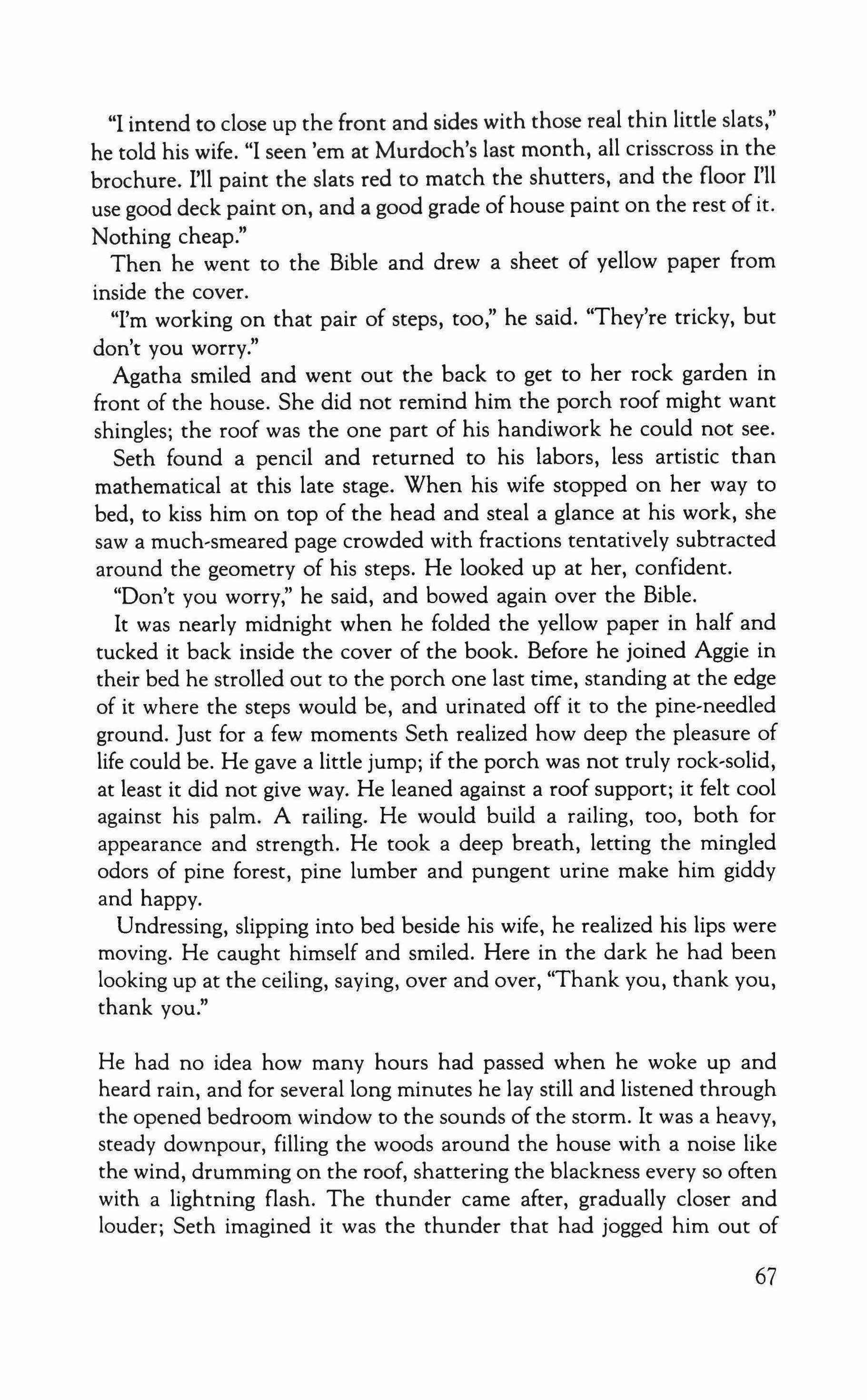
"I intend to close up the front and sides with those real thin little slats," he told his wife. "I seen 'em at Murdoch's last month, all crisscross in the brochure. I'll paint the slats red to match the shutters, and the floor I'll use good deck paint on, and a good grade ofhouse paint on the rest of it. Nothing cheap."
Then he went to the Bible and drew a sheet of yellow paper from inside the cover.
"I'm working on that pair of steps, too," he said. "They're tricky, but don't you worry."
Agatha smiled and went out the back to get to her rock garden in front of the house. She did not remind him the porch roof might want shingles; the roof was the one part of his handiwork he could not see.
Seth found a pencil and returned to his labors, less artistic than mathematical at this late stage. When his wife stopped on her way to bed, to kiss him on top of the head and steal a glance at his work, she saw a much-smeared page crowded with fractions tentatively subtracted around the geometry of his steps. He looked up at her, confident.
"Don't you worry," he said, and bowed again over the Bible. It was nearly midnight when he folded the yellow paper in half and tucked it back inside the cover of the book. Before he joined Aggie in their bed he strolled out to the porch one last time, standing at the edge of it where the steps would be, and urinated off it to the pine-needled ground. Just for a few moments Seth realized how deep the pleasure of life could be. He gave a little jump; if the porch was not truly rock-solid, at least it did not give way. He leaned against a roof support; it felt cool against his palm. A railing. He would build a railing, too, both for appearance and strength. He took a deep breath, letting the mingled odors of pine forest, pine lumber and pungent urine make him giddy and happy.
Undressing, slipping into bed beside his wife, he realized his lips were moving. He caught himself and smiled. Here in the dark he had been looking up at the ceiling, saying, over and over, "Thank you, thank you, thank you."
He had no idea how many hours had passed when he woke up and heard rain, and for several long minutes he lay still and listened through the opened bedroom window to the sounds of the storm. It was a heavy, steady downpour, filling the woods around the house with a noise like the wind, drumming on the roof, shattering the blackness every so often with a lightning flash. The thunder came after, gradually closer and louder; Seth imagined it was the thunder that had jogged him out of
67
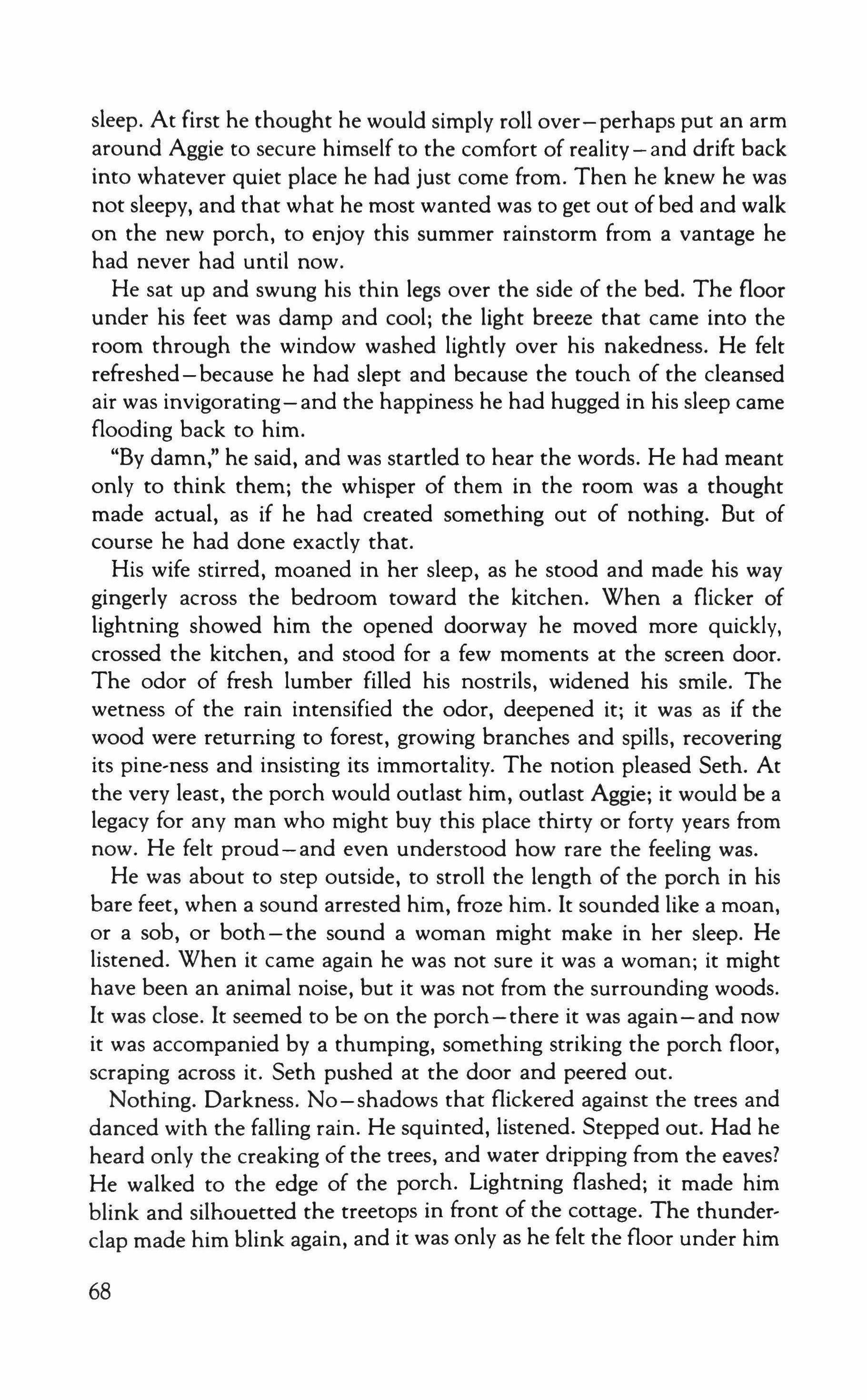
sleep. At first he thought he would simply roll over-perhaps put an arm around Aggie to secure himself to the comfort of reality - and drift back into whatever quiet place he had just come from. Then he knew he was not sleepy, and that what he most wanted was to get out of bed and walk on the new porch, to enjoy this summer rainstorm from a vantage he had never had until now.
He sat up and swung his thin legs over the side of the bed. The floor under his feet was damp and cool; the light breeze that came into the room through the window washed lightly over his nakedness. He felt refreshed - because he had slept and because the touch of the cleansed air was invigorating-and the happiness he had hugged in his sleep came flooding back to him.
"By damn," he said, and was startled to hear the words. He had meant only to think them; the whisper of them in the room was a thought made actual, as if he had created something out of nothing. But of course he had done exactly that.
His wife stirred, moaned in her sleep, as he stood and made his way gingerly across the bedroom toward the kitchen. When a flicker of lightning showed him the opened doorway he moved more quickly, crossed the kitchen, and stood for a few moments at the screen door. The odor of fresh lumber filled his nostrils, widened his smile. The wetness of the rain intensified the odor, deepened it; it was as if the wood were returning to forest, growing branches and spills, recovering its pine-ness and insisting its immortality. The notion pleased Seth. At the very least, the porch would outlast him, outlast Aggie; it would be a legacy for any man who might buy this place thirty or forty years from now. He felt proud-and even understood how rare the feeling was.
He was about to step outside, to stroll the length of the porch in his bare feet, when a sound arrested him, froze him. It sounded like a moan, or a sob, or both-the sound a woman might make in her sleep. He listened. When it came again he was not sure it was a woman; it might have been an animal noise, but it was not from the surrounding woods. It was close. It seemed to be on the porch-there it was again-and now it was accompanied by a thumping, something striking the porch floor, scraping across it. Seth pushed at the door and peered out.
Nothing. Darkness. No-shadows that flickered against the trees and danced with the falling rain. He squinted, listened. Stepped out. Had he heard only the creaking of the trees, and water dripping from the eaves? He walked to the edge of the porch. Lightning flashed; it made him blink and silhouetted the treetops in front of the cottage. The thunder, clap made him blink again, and it was only as he felt the floor under him
68
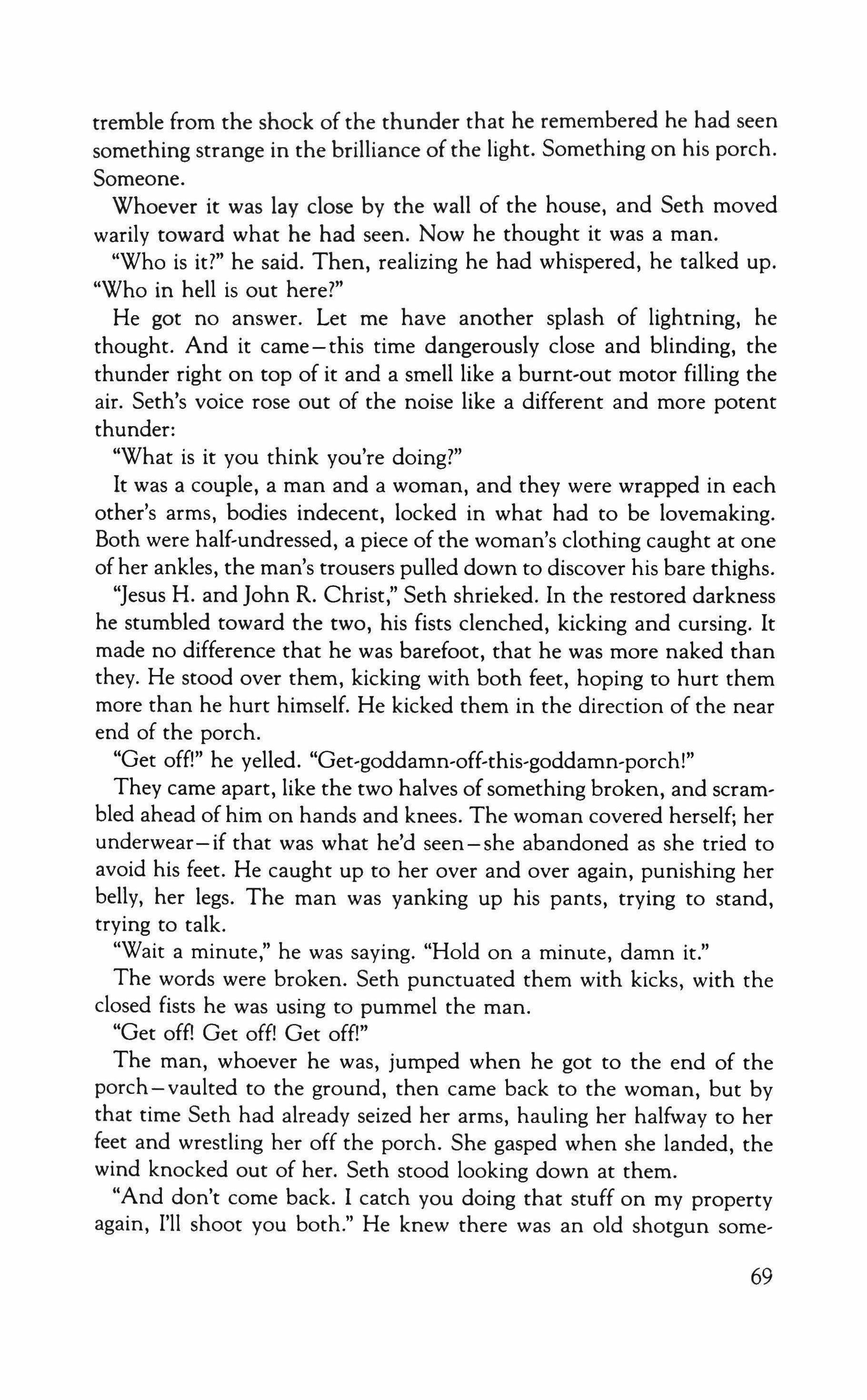
tremble from the shock of the thunder that he remembered he had seen something strange in the brilliance of the light. Something on his porch. Someone.
Whoever it was lay close by the wall of the house, and Seth moved warily toward what he had seen. Now he thought it was a man.
"Who is it?" he said. Then, realizing he had whispered, he talked up. "Who in hell is out here?"
He got no answer. Let me have another splash of lightning, he thought. And it came-this time dangerously close and blinding, the thunder right on top of it and a smell like a burnt-out motor filling the air. Seth's voice rose out of the noise like a different and more potent thunder:
"What is it you think you're doing?"
It was a couple, a man and a woman, and they were wrapped in each other's arms, bodies indecent, locked in what had to be lovemaking. Both were half-undressed, a piece of the woman's clothing caught at one of her ankles, the man's trousers pulled down to discover his bare thighs.
"Jesus H. and John R. Christ," Seth shrieked. In the restored darkness he stumbled toward the two, his fists clenched, kicking and cursing. It made no difference that he was barefoot, that he was more naked than they. He stood over them, kicking with both feet, hoping to hurt them more than he hurt himself. He kicked them in the direction of the near end of the porch.
"Get off!" he yelled. "Get-goddamn-off-this-goddamn-porch!"
They came apart, like the two halves of something broken, and scrambled ahead of him on hands and knees. The woman covered herself; her underwear- if that was what he'd seen - she abandoned as she tried to avoid his feet. He caught up to her over and over again, punishing her belly, her legs. The man was yanking up his pants, trying to stand, trying to talk.
"Wait a minute," he was saying. "Hold on a minute, damn it."
The words were broken. Seth punctuated them with kicks, with the closed fists he was using to pummel the man.
"Get off! Get off! Get off!"
The man, whoever he was, jumped when he got to the end of the porch - vaulted to the ground, then came back to the woman, but by that time Seth had already seized her arms, hauling her halfway to her feet and wrestling her off the porch. She gasped when she landed, the wind knocked out of her. Seth stood looking down at them.
"And don't come back. I catch you doing that stuff on my property again, I'll shoot you both." He knew there was an old shotgun some-
69
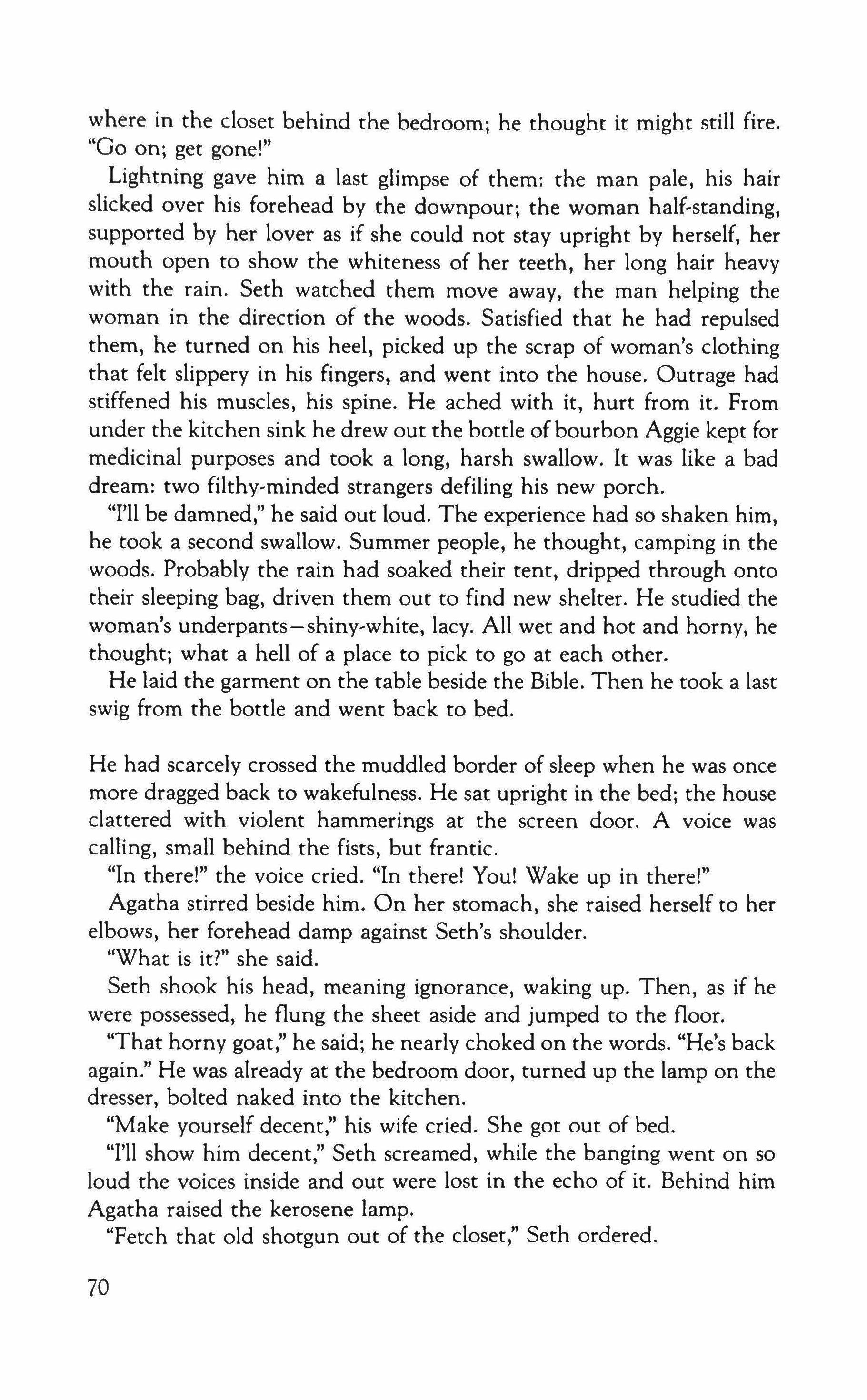
where in the closet behind the bedroom; he thought it might still fire. "Go on; get gone!"
Lightning gave him a last glimpse of them: the man pale, his hair slicked over his forehead by the downpour; the woman half-standing, supported by her lover as if she could not stay upright by herself, her mouth open to show the whiteness of her teeth, her long hair heavy with the rain. Seth watched them move away, the man helping the woman in the direction of the woods. Satisfied that he had repulsed them, he turned on his heel, picked up the scrap of woman's clothing that felt slippery in his fingers, and went into the house. Outrage had stiffened his muscles, his spine. He ached with it, hurt from it. From under the kitchen sink he drew out the bottle of bourbon Aggie kept for medicinal purposes and took a long, harsh swallow. It was like a bad dream: two filthy-minded strangers defiling his new porch.
"I'll be damned," he said out loud. The experience had so shaken him, he took a second swallow. Summer people, he thought, camping in the woods. Probably the rain had soaked their tent, dripped through onto their sleeping bag, driven them out to find new shelter. He studied the woman's underpants-shiny-white, lacy. All wet and hot and horny, he thought; what a hell of a place to pick to go at each other.
He laid the garment on the table beside the Bible. Then he took a last swig from the bottle and went back to bed.
He had scarcely crossed the muddled border of sleep when he was once more dragged back to wakefulness. He sat upright in the bed; the house clattered with violent hammerings at the screen door. A voice was calling, small behind the fists, but frantic.
"In there!" the voice cried. "In there! You! Wake up in there!"
Agatha stirred beside him. On her stomach, she raised herself to her elbows, her forehead damp against Seth's shoulder.
"What is it?" she said.
Seth shook his head, meaning ignorance, waking up. Then, as if he were possessed, he flung the sheet aside and jumped to the floor.
"That horny goat," he said; he nearly choked on the words. "He's back again." He was already at the bedroom door, turned up the lamp on the dresser, bolted naked into the kitchen.
"Make yourself decent," his wife cried. She got out of bed.
"I'll show him decent," Seth screamed, while the banging went on so loud the voices inside and out were lost in the echo of it. Behind him Agatha raised the kerosene lamp.
"Fetch that old shotgun out of the closet," Seth ordered.
70
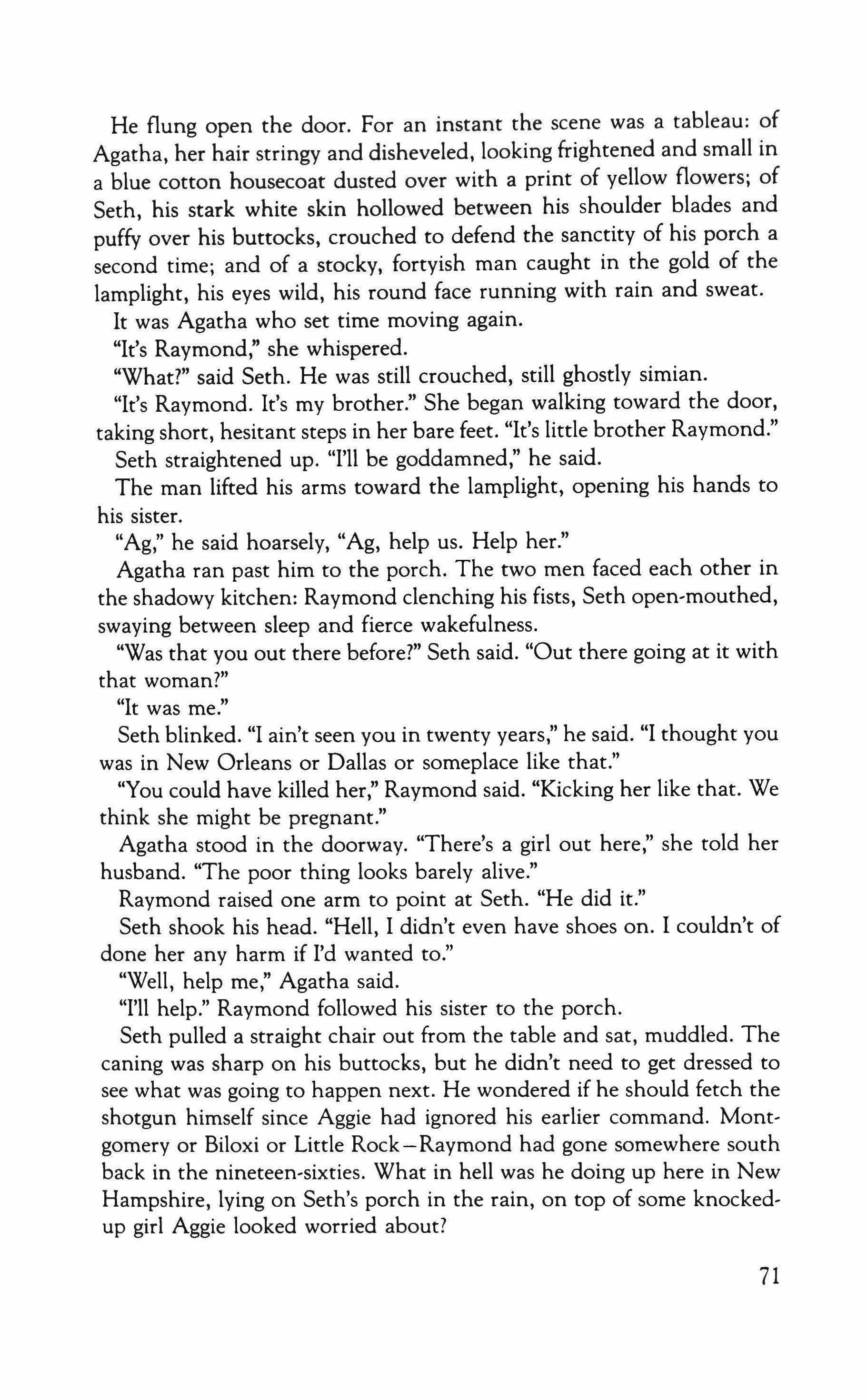
He flung open the door. For an instant the scene was a tableau: of Agatha, her hair stringy and disheveled, looking frightened and small in a blue cotton housecoat dusted over with a print of yellow flowers; of Seth, his stark white skin hollowed between his shoulder blades and puffy over his buttocks, crouched to defend the sanctity of his porch a second time; and of a stocky, fortyish man caught in the gold of the lamplight, his eyes wild, his round face running with rain and sweat.
It was Agatha who set time moving again.
"It's Raymond," she whispered.
"What?" said Seth. He was still crouched, still ghostly simian.
"It's Raymond. It's my brother." She began walking toward the door, taking short, hesitant steps in her bare feet. "It's little brother Raymond."
Seth straightened up. "I'll be goddamned," he said.
The man lifted his arms toward the lamplight, opening his hands to his sister.
"Ag," he said hoarsely, "Ag, help us. Help her."
Agatha ran past him to the porch. The two men faced each other in the shadowy kitchen: Raymond clenching his fists, Seth open-mouthed, swaying between sleep and fierce wakefulness.
"Was that you out there before?" Seth said. "Out there going at it with that woman?"
"It was me."
Seth blinked. "I ain't seen you in twenty years," he said. "I thought you was in New Orleans or Dallas or someplace like that."
"You could have killed her," Raymond said. "Kicking her like that. We think she might be pregnant."
Agatha stood in the doorway. "There's a girl out here," she told her husband. "The poor thing looks barely alive."
Raymond raised one arm to point at Seth. "He did it."
Seth shook his head. "Hell, I didn't even have shoes on. I couldn't of done her any harm if I'd wanted to."
"Well, help me," Agatha said.
"I'll help." Raymond followed his sister to the porch.
Seth pulled a straight chair out from the table and sat, muddled. The caning was sharp on his buttocks, but he didn't need to get dressed to see what was going to happen next. He wondered if he should fetch the shotgun himself since Aggie had ignored his earlier command. Montgomery or Biloxi or Little Rock - Raymond had gone somewhere south back in the nineteen-sixties. What in hell was he doing up here in New Hampshire, lying on Seth's porch in the rain, on top of some knockedup girl Aggie looked worried about?
71
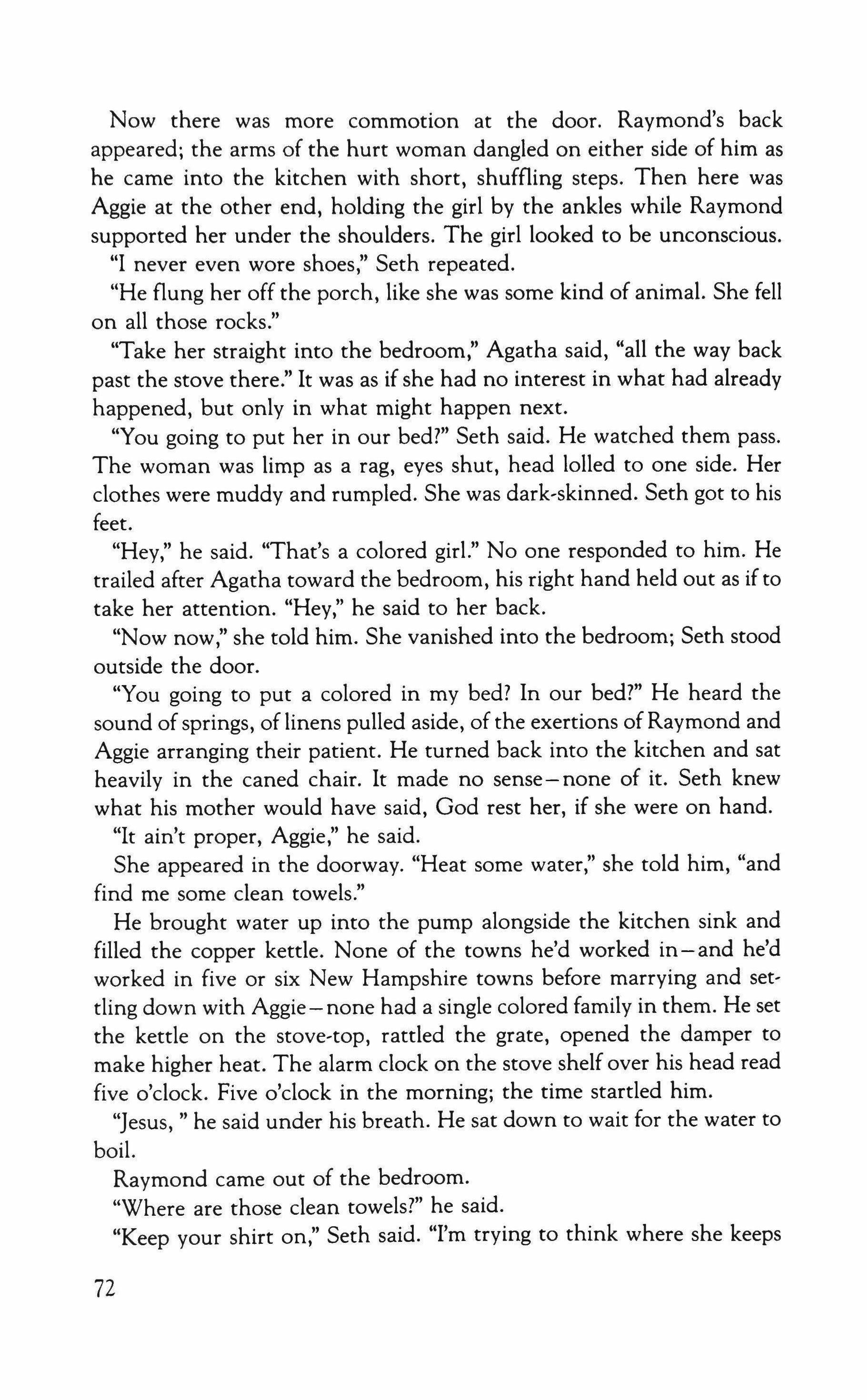
Now there was more commotion at the door. Raymond's back appeared; the arms of the hurt woman dangled on either side of him as he came into the kitchen with short, shuffling steps. Then here was Aggie at the other end, holding the girl by the ankles while Raymond supported her under the shoulders. The girl looked to be unconscious.
"I never even wore shoes," Seth repeated.
"He flung her off the porch, like she was some kind of animal. She fell on all those rocks."
"Take her straight into the bedroom," Agatha said, "all the way back past the stove there." It was as if she had no interest in what had already happened, but only in what might happen next.
"You going to put her in our bed?" Seth said. He watched them pass. The woman was limp as a rag, eyes shut, head lolled to one side. Her clothes were muddy and rumpled. She was dark-skinned. Seth got to his feet.
"Hey," he said. "That's a colored girl." No one responded to him. He trailed after Agatha toward the bedroom, his right hand held out as if to take her attention. "Hey," he said to her back.
"Now now," she told him. She vanished into the bedroom; Seth stood outside the door.
"You going to put a colored in my bed? In our bed?" He heard the sound of springs, of linens pulled aside, of the exertions of Raymond and Aggie arranging their patient. He turned back into the kitchen and sat heavily in the caned chair. It made no sense-none of it. Seth knew what his mother would have said, God rest her, if she were on hand.
"It ain't proper, Aggie," he said.
She appeared in the doorway. "Heat some water," she told him, "and find me some clean towels."
He brought water up into the pump alongside the kitchen sink and filled the copper kettle. None of the towns he'd worked in-and he'd worked in five or six New Hampshire towns before marrying and set' tling down with Aggie - none had a single colored family in them. He set the kettle on the stove-top, rattled the grate, opened the damper to make higher heat. The alarm clock on the stove shelf over his head read five o'clock. Five o'clock in the morning; the time startled him.
"Jesus, he said under his breath. He sat down to wait for the water to boil.
Raymond came out of the bedroom.
"Where are those clean towels?" he said.
"Keep your shirt on," Seth said. "I'm trying to think where she keeps
72

the damned things." He got up and padded across the kitchen to the buffet. "I don't know if she wants dish towels or hand towels."
"Hand towels." Agatha stood just inside the kitchen. "Give me a couple of those big white ones in the bottom drawer."
Seth stooped over the drawer and brought out the towels. "How corne we never use these?" he said.
"Because they're for company." She took them from him. "That's how it happens they're not worn out like everything else we own."
"That trash is no company," Seth said. He went back to sit at the kitchen table. The shiny underwear lay near his hand; he picked it up and fondled it.
"Why don't you put some clothes on," Agatha said. "And I don't mean those flimsy panties."
"I'll dress when I feel like it." He tossed the underpants aside. To Raymond, who had corne to sit down at the other side of the table, he said: "How the dickens did a smart guy like you get tied up with a nigger?"
"She's mulatto," Raymond said. "And don't use that word around me."
"What's mulatto?"
"She's not all Negro."
"There never was one of them people all Negro, to hear them tell it." He looked at his wife, who made motions with her hands for him to stop talking. "I recollect an old nigger used to pick up beer and tonic bottles out on the Rochester road. Black as under your fingernails. He was always telling folks how he was part white-one quarter or one twentieth or one ninety-ninth. Some outlandish fraction a man couldn't take a peck of to total up to the number one. They all got that story down by heart."
"That is no story," Raymond said coolly. "Lana's half white."
"What's that name?"
"Lana. Lana Turner Windham."
Seth sat back in his chair. He looked at Agatha, then at her brother. "I'll be goddamned," he said. "I'll be god-double-damned." He stood up, walked across the kitchen, and looked into the dim room where the girl was sleeping. Then he carne back to the table.
"I got to say it," he told his brother-in-law, "that you are a far sight dumber than any man who talks good ought to be, if you believe that nigger girl is any bit whiter than two ton of the Lebanon Coal Company's bituminous."
"I said she's half white. I didn't say she wasn't Negro."
"I guess you figure her name makes her half white," Seth said gleefully.
73
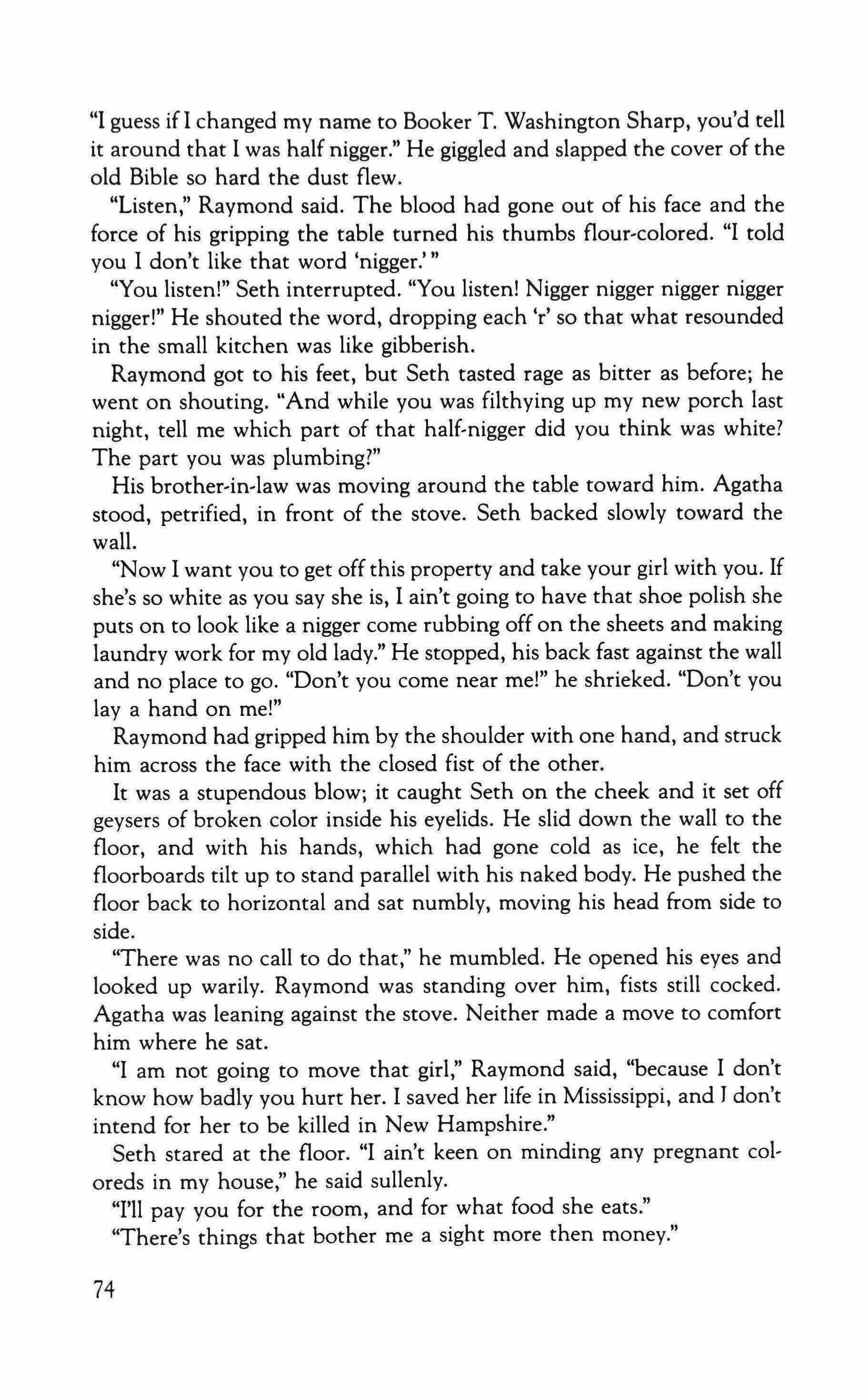
"I guess if I changed my name to Booker T. Washington Sharp, you'd tell it around that I was half nigger." He giggled and slapped the cover of the old Bible so hard the dust flew.
"Listen," Raymond said. The blood had gone out of his face and the force of his gripping the table turned his thumbs flour-colored. "I told you I don't like that word 'nigger.'''
"You listen!" Seth interrupted. "You listen! Nigger nigger nigger nigger nigger!" He shouted the word, dropping each 'r' so that what resounded in the small kitchen was like gibberish.
Raymond got to his feet, but Seth tasted rage as bitter as before; he went on shouting. "And while you was filthving up my new porch last night, tell me which part of that half-nigger did you think was white? The part you was plumbing?"
His brother-in-law was moving around the table toward him. Agatha stood, petrified, in front of the stove. Seth backed slowly toward the wall.
"Now I want you to get off this property and take your girl with you. If she's so white as you say she is, I ain't going to have that shoe polish she puts on to look like a nigger come rubbing off on the sheets and making laundry work for my old lady." He stopped, his back fast against the wall and no place to go. "Don't you come near mel" he shrieked. "Don't you lay a hand on mel"
Raymond had gripped him by the shoulder with one hand, and struck him across the face with the closed fist of the other.
It was a stupendous blow; it caught Seth on the cheek and it set off geysers of broken color inside his eyelids. He slid down the wall to the floor, and with his hands, which had gone cold as ice, he felt the floorboards tilt up to stand parallel with his naked body. He pushed the floor back to horizontal and sat numbly, moving his head from side to side.
"There was no call to do that," he mumbled. He opened his eyes and looked up warily. Raymond was standing over him, fists still cocked. Agatha was leaning against the stove. Neither made a move to comfort him where he sat.
"I am not going to move that girl," Raymond said, "because I don't know how badly you hurt her. I saved her life in Mississippi, and J don't intend for her to be killed in New Hampshire."
Seth stared at the floor. "I ain't keen on minding any pregnant coloreds in my house," he said sullenly.
"I'll pay you for the room, and for what food she eats."
"There's things that bother me a sight more then money."
74
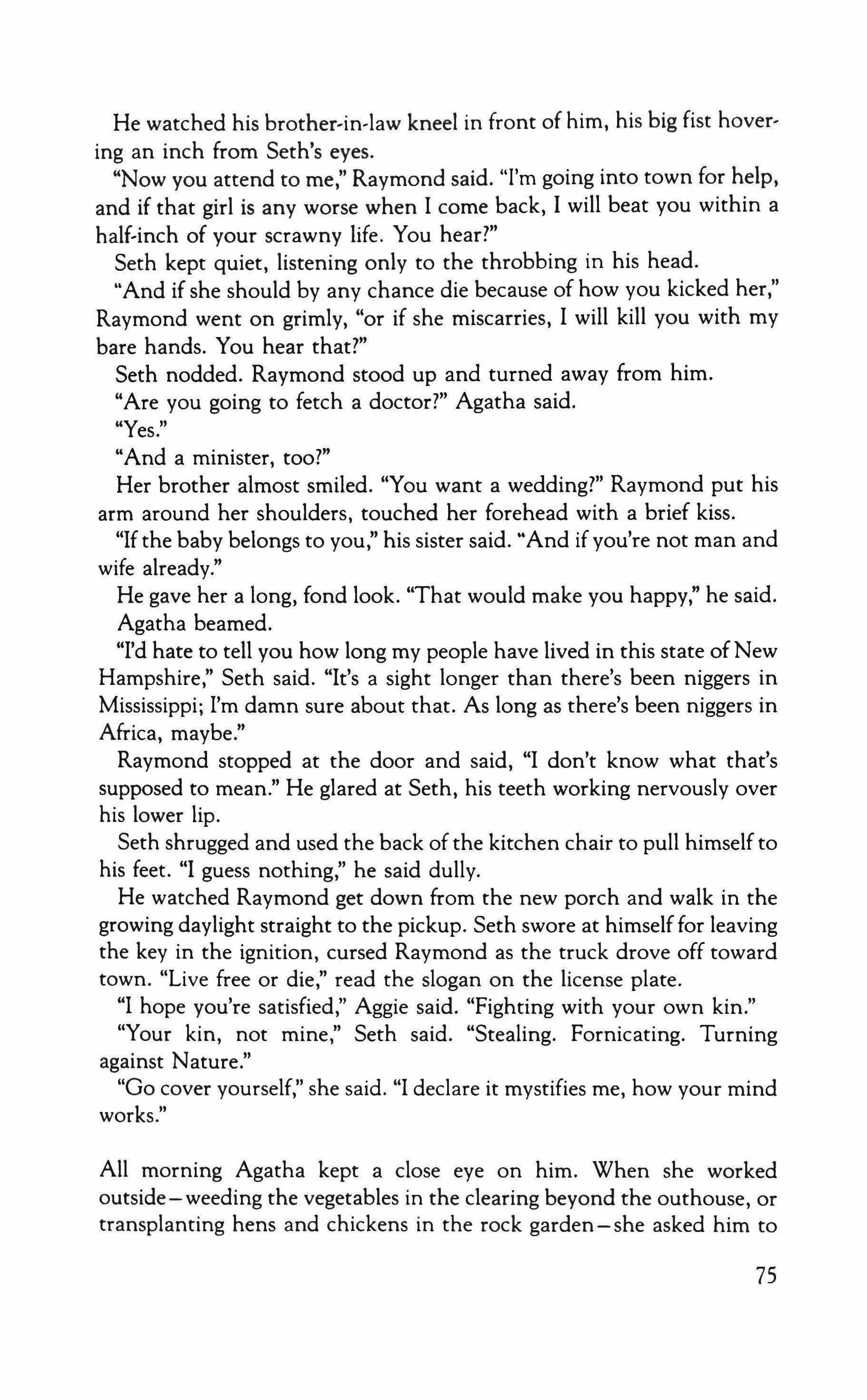
He watched his brother-in-law kneel in front of him, his big fist hovering an inch from Seth's eyes.
"Now you attend to me," Raymond said. "I'm going into town for help, and if that girl is any worse when I come back, I will beat you within a half-inch of your scrawny life. You hear?"
Seth kept quiet, listening only to the throbbing in his head.
"And if she should by any chance die because of how you kicked her," Raymond went on grimly, "or if she miscarries, I will kill you with my bare hands. You hear that?"
Seth nodded. Raymond stood up and turned away from him.
"Are you going to fetch a doctor?" Agatha said. "Yes."
"And a minister, too?"
Her brother almost smiled. "You want a wedding?" Raymond put his arm around her shoulders, touched her forehead with a brief kiss.
"If the baby belongs to you," his sister said. "And if you're not man and wife already."
He gave her a long, fond look. "That would make you happy," he said.
Agatha beamed.
"I'd hate to tell you how long my people have lived in this state of New Hampshire," Seth said. "It's a sight longer than there's been niggers in Mississippi; I'm damn sure about that. As long as there's been niggers in Africa, maybe."
Raymond stopped at the door and said, "I don't know what that's supposed to mean." He glared at Seth, his teeth working nervously over his lower lip.
Seth shrugged and used the back of the kitchen chair to pull himself to his feet. "I guess nothing," he said dully.
He watched Raymond get down from the new porch and walk in the growing daylight straight to the pickup. Seth swore at himselffor leaving the key in the ignition, cursed Raymond as the truck drove off toward town. "Live free or die," read the slogan on the license plate.
"I hope you're satisfied," Aggie said. "Fighting with your own kin."
"Your kin, not mine," Seth said. "Stealing. Fornicating. Turning against Nature."
"Go cover yourself," she said. "I declare it mystifies me, how your mind works."
All morning Agatha kept a close eye on him. When she worked outside-weeding the vegetables in the clearing beyond the outhouse, or transplanting hens and chickens in the rock garden-she asked him to
75
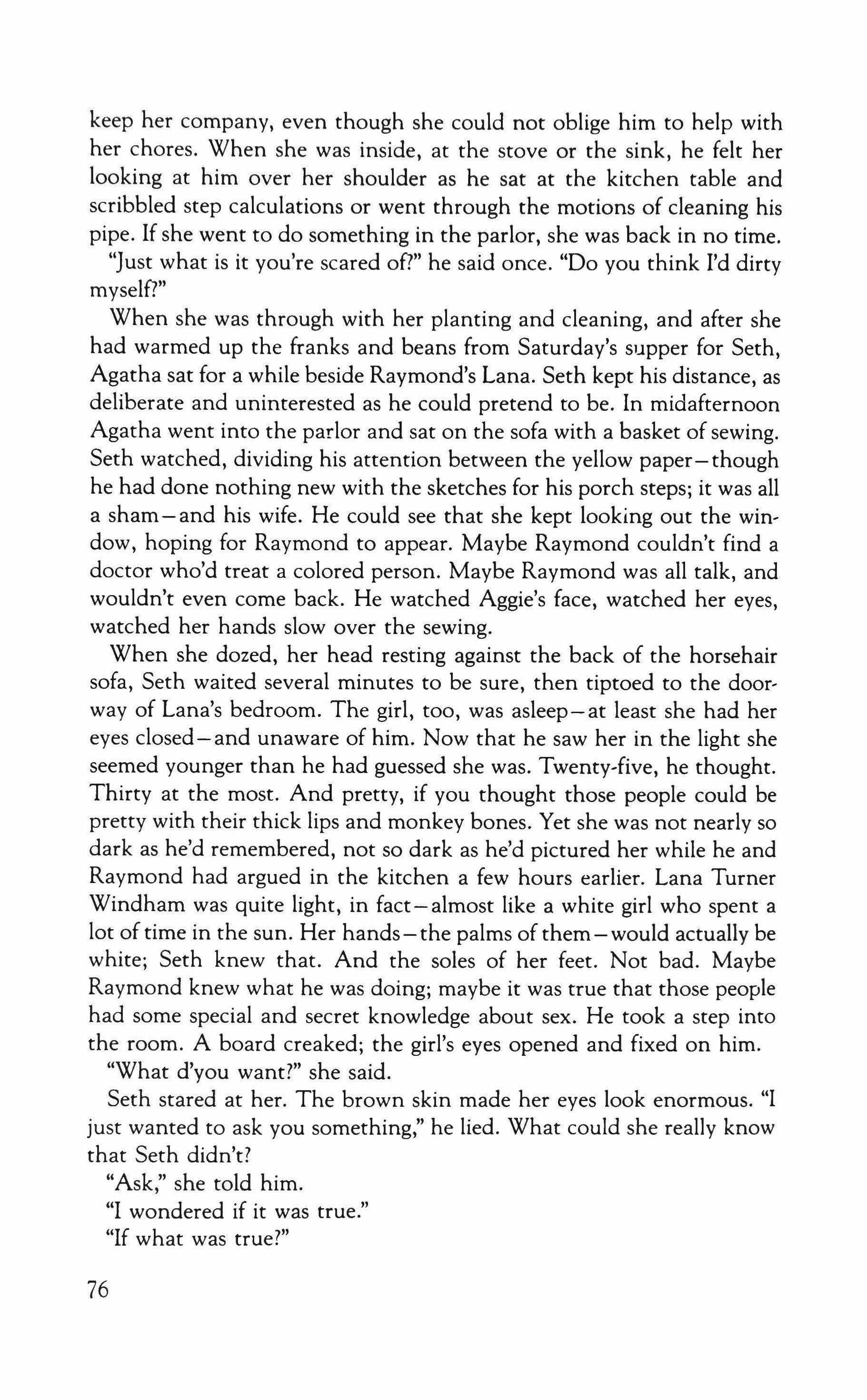
keep her company, even though she could not oblige him to help with her chores. When she was inside, at the stove or the sink, he felt her looking at him over her shoulder as he sat at the kitchen table and scribbled step calculations or went through the motions of cleaning his pipe. If she went to do something in the parlor, she was back in no time. "Just what is it you're scared of?" he said once. "Do you think I'd dirty myself?"
When she was through with her planting and cleaning, and after she had warmed up the franks and beans from Saturday's supper for Seth, Agatha sat for a while beside Raymond's Lana. Seth kept his distance, as deliberate and uninterested as he could pretend to be. In midafternoon Agatha went into the parlor and sat on the sofa with a basket of sewing. Seth watched, dividing his attention between the yellow paper-though he had done nothing new with the sketches for his porch steps; it was all a sham - and his wife. He could see that she kept looking out the window, hoping for Raymond to appear. Maybe Raymond couldn't find a doctor who'd treat a colored person. Maybe Raymond was all talk, and wouldn't even come back. He watched Aggie's face, watched her eyes, watched her hands slow over the sewing.
When she dozed, her head resting against the back of the horsehair sofa, Seth waited several minutes to be sure, then tiptoed to the doorway of Lana's bedroom. The girl, too, was asleep-at least she had her eyes closed - and unaware of him. Now that he saw her in the light she seemed younger than he had guessed she was. Twenty-five, he thought. Thirty at the most. And pretty, if you thought those people could be pretty with their thick lips and monkey bones. Yet she was not nearly so dark as he'd remembered, not so dark as he'd pictured her while he and Raymond had argued in the kitchen a few hours earlier. Lana Turner Windham was quite light, in fact-almost like a white girl who spent a lot of time in the sun. Her hands-the palms of them-would actually be white; Seth knew that. And the soles of her feet. Not bad. Maybe Raymond knew what he was doing; maybe it was true that those people had some special and secret knowledge about sex. He took a step into the room. A board creaked; the girl's eyes opened and fixed on him.
"What d'you want?" she said.
Seth stared at her. The brown skin made her eyes look enormous. "I just wanted to ask you something," he lied. What could she really know that Seth didn't?
"Ask," she told him.
"I wondered if it was true."
"If what was true?"
76
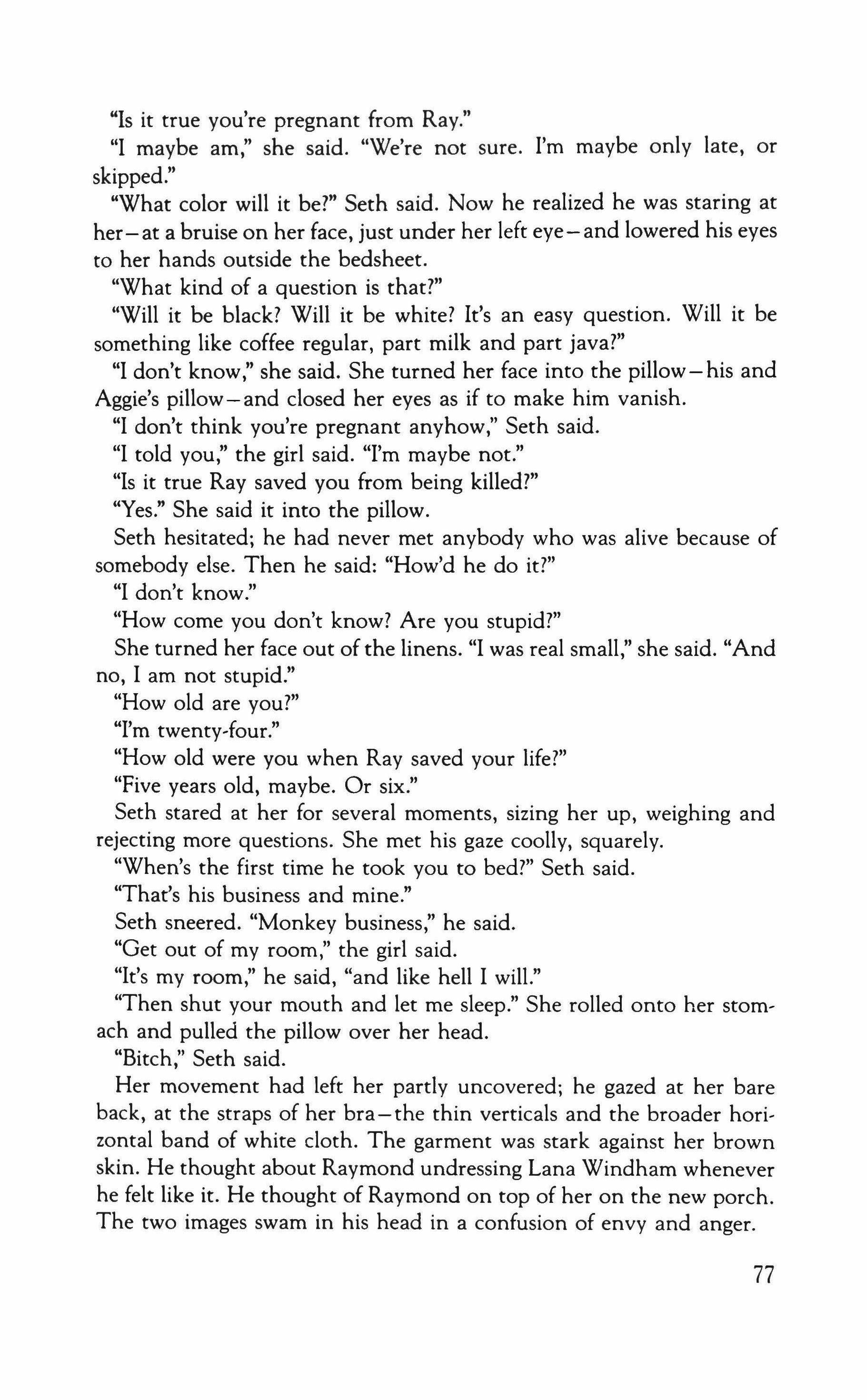
"Is it true you're pregnant from Ray."
"I maybe am," she said. "We're not sure. I'm maybe only late, or skipped."
"What color will it be?" Seth said. Now he realized he was staring at her-at a bruise on her face, just under her left eye-and lowered his eyes to her hands outside the bedsheet.
"What kind of a question is that?"
"Will it be black? Will it be white? It's an easy question. Will it be something like coffee regular, part milk and part java?"
"I don't know," she said. She turned her face into the pillow - his and Aggie's pillow-and closed her eyes as if to make him vanish.
"I don't think you're pregnant anyhow," Seth said.
"I told you," the girl said. "I'm maybe not."
"Is it true Ray saved you from being killed?"
"Yes." She said it into the pillow.
Seth hesitated; he had never met anybody who was alive because of somebody else. Then he said: "How'd he do it?"
"I don't know."
"How come you don't know? Are you stupid?"
She turned her face out of the linens. "I was real small," she said. "And no, I am not stupid."
"How old are you?"
"I'm twenty-four."
"How old were you when Ray saved your life?"
"Five years old, maybe. Or six."
Seth stared at her for several moments, sizing her up, weighing and rejecting more questions. She met his gaze coolly, squarely.
"When's the first time he took you to bed?" Seth said.
"That's his business and mine."
Seth sneered. "Monkey business," he said.
"Get out of my room," the girl said.
"It's my room," he said, "and like hell I will."
"Then shut your mouth and let me sleep." She rolled onto her stomach and pulled the pillow over her head.
"Bitch," Seth said.
Her movement had left her partly uncovered; he gazed at her bare back, at the straps of her bra - the thin verticals and the broader horizontal band of white cloth. The garment was stark against her brown skin. He thought about Raymond undressing Lana Windham whenever he felt like it. He thought of Raymond on top of her on the new porch. The two images swam in his head in a confusion of envy and anger.
77
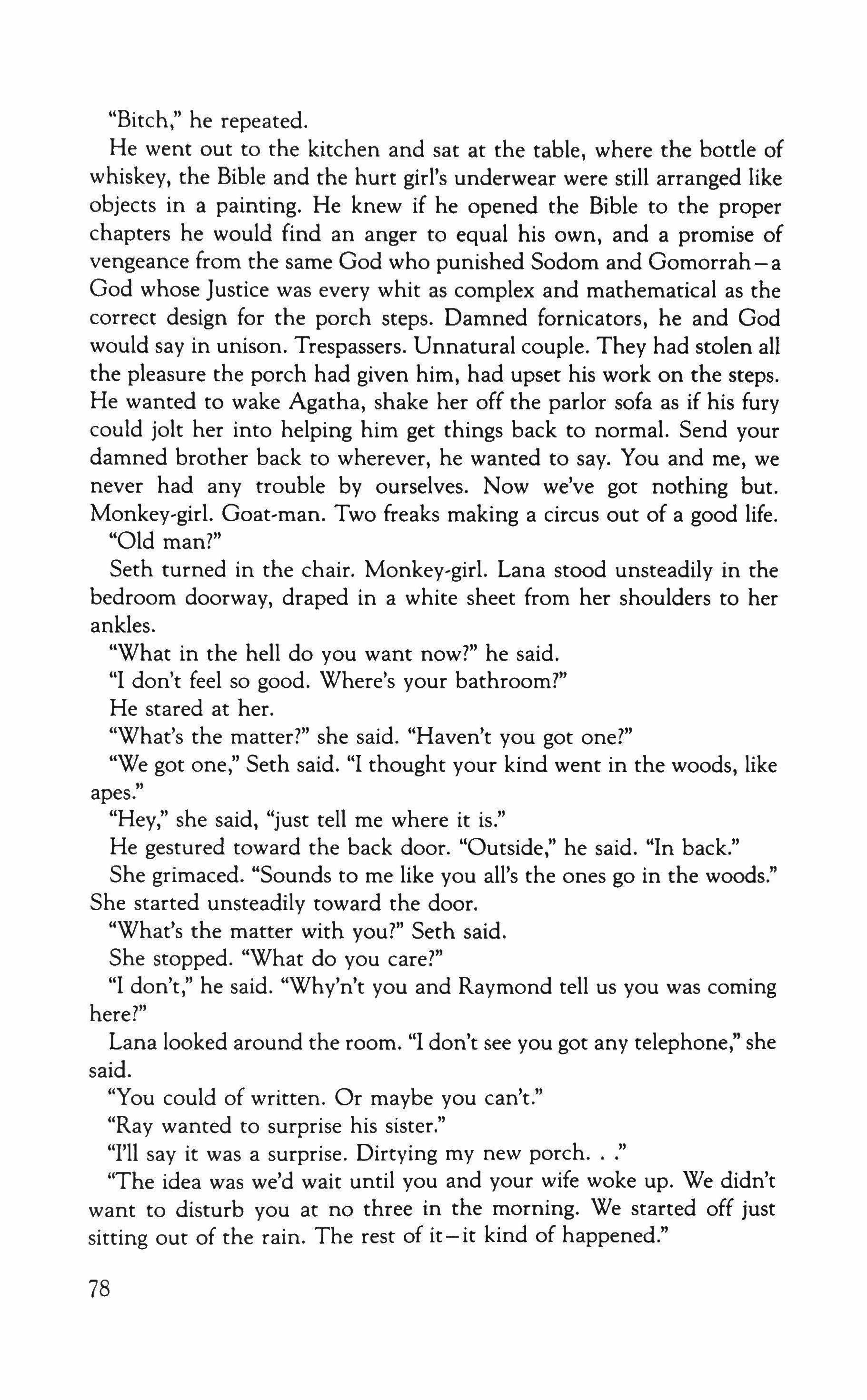
"Bitch," he repeated.
He went out to the kitchen and sat at the table, where the bottle of whiskey, the Bible and the hurt girl's underwear were still arranged like objects in a painting. He knew if he opened the Bible to the proper chapters he would find an anger to equal his own, and a promise of vengeance from the same God who punished Sodom and Gomorrah-a God whose Justice was every whit as complex and mathematical as the correct design for the porch steps. Damned fornicators, he and God would say in unison. Trespassers. Unnatural couple. They had stolen all the pleasure the porch had given him, had upset his work on the steps. He wanted to wake Agatha, shake her off the parlor sofa as if his fury could jolt her into helping him get things back to normal. Send your damned brother back to wherever, he wanted to say. You and me, we never had any trouble by ourselves. Now we've got nothing but.
Monkey-girl. Goat-man. Two freaks making a circus out of a good life.
"Old man?"
Seth turned in the chair. Monkey-girl. Lana stood unsteadily in the bedroom doorway, draped in a white sheet from her shoulders to her ankles.
"What in the hell do you want now?" he said.
"I don't feel so good. Where's your bathroom?"
He stared at her.
"What's the matter?" she said. "Haven't you got one?"
"We got one," Seth said. "I thought your kind went in the woods, like apes."
"Hey," she said, "just tell me where it is."
He gestured toward the back door. "Outside," he said. "In back."
She grimaced. "Sounds to me like you all's the ones go in the woods." She started unsteadily toward the door.
"What's the matter with you?" Seth said.
She stopped. "What do you care?"
"I don't," he said. "Why'n't you and Raymond tell us you was coming here?"
Lana looked around the room. "I don't see you got any telephone," she said.
"You could of written. Or maybe you can't."
"Ray wanted to surprise his sister."
"I'll say it was a surprise. Dirtying my new porch
"The idea was we'd wait until you and your wife woke up. We didn't want to disturb you at no three in the morning. We started off just sitting out of the rain. The rest of it - it kind of happened."
78
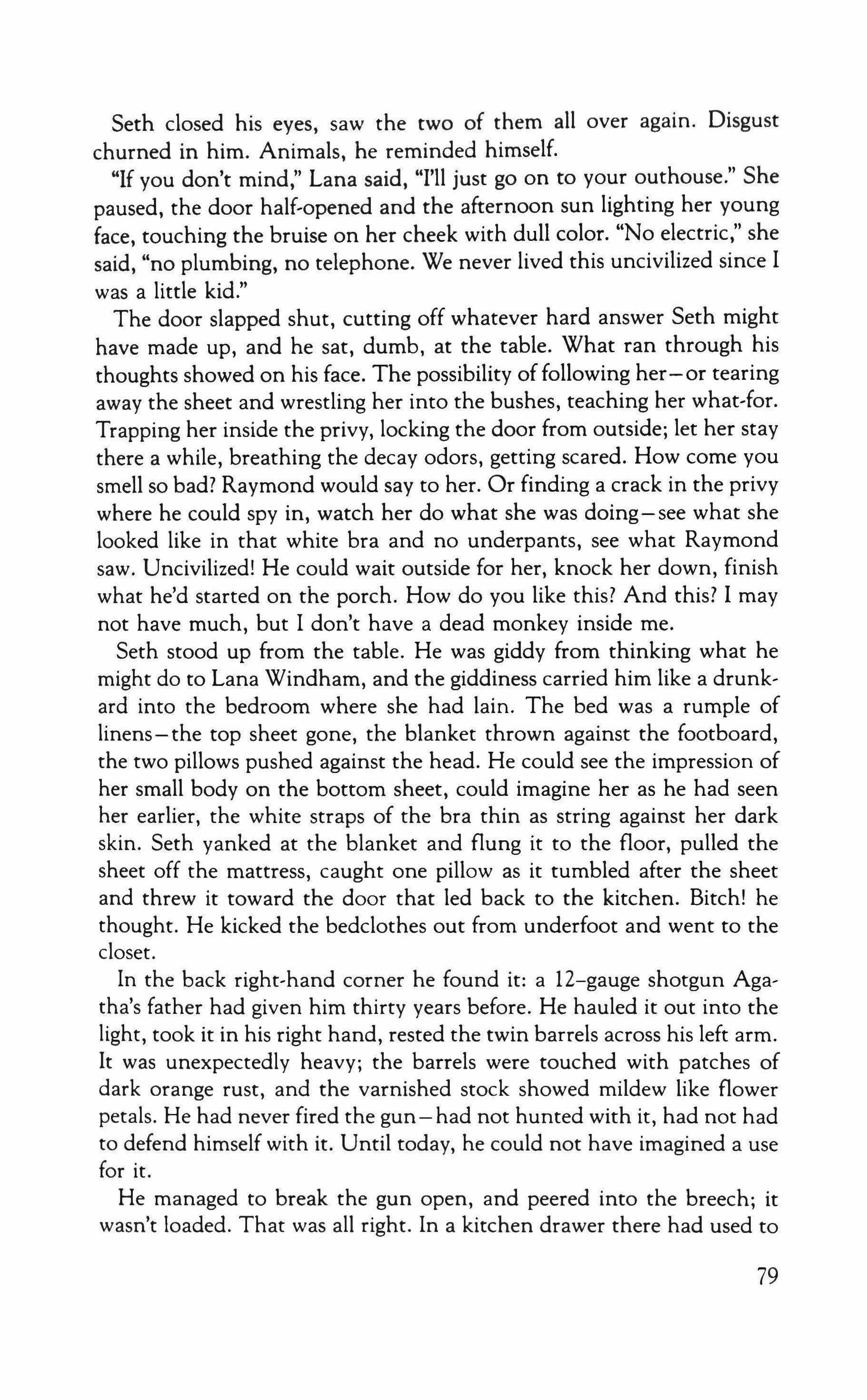
Seth closed his eyes, saw the two of them all over again. Disgust churned in him. Animals, he reminded himself.
"If you don't mind," Lana said, "I'll just go on to your outhouse." She paused, the door half-opened and the afternoon sun lighting her young face, touching the bruise on her cheek with dull color. "No electric," she said, "no plumbing, no telephone. We never lived this uncivilized since I was a little kid."
The door slapped shut, cutting off whatever hard answer Seth might have made up, and he sat, dumb, at the table. What ran through his thoughts showed on his face. The possibility offollowing her-or tearing away the sheet and wrestling her into the bushes, teaching her what-for. Trapping her inside the privy, locking the door from outside; let her stay there a while, breathing the decay odors, getting scared. How come you smell so bad? Raymond would say to her. Or finding a crack in the privy where he could spy in, watch her do what she was doing-see what she looked like in that white bra and no underpants, see what Raymond saw. Uncivilized! He could wait outside for her, knock her down, finish what he'd started on the porch. How do you like this? And this? I may not have much, but I don't have a dead monkey inside me.
Seth stood up from the table. He was giddy from thinking what he might do to Lana Windham, and the giddiness carried him like a drunkard into the bedroom where she had lain. The bed was a rumple of linens-the top sheet gone, the blanket thrown against the footboard, the two pillows pushed against the head. He could see the impression of her small body on the bottom sheet, could imagine her as he had seen her earlier, the white straps of the bra thin as string against her dark skin. Seth yanked at the blanket and flung it to the floor, pulled the sheet off the mattress, caught one pillow as it tumbled after the sheet and threw it toward the door that led back to the kitchen. Bitch! he thought. He kicked the bedclothes out from underfoot and went to the closet.
In the back right-hand corner he found it: a 12-gauge shotgun Agatha's father had given him thirty years before. He hauled it out into the light, took it in his right hand, rested the twin barrels across his left arm. It was unexpectedly heavy; the barrels were touched with patches of dark orange rust, and the varnished stock showed mildew like flower petals. He had never fired the gun - had not hunted with it, had not had to defend himself with it. Until today, he could not have imagined a use for it.
He managed to break the gun open, and peered into the breech; it wasn't loaded. That was all right. In a kitchen drawer there had used to
79
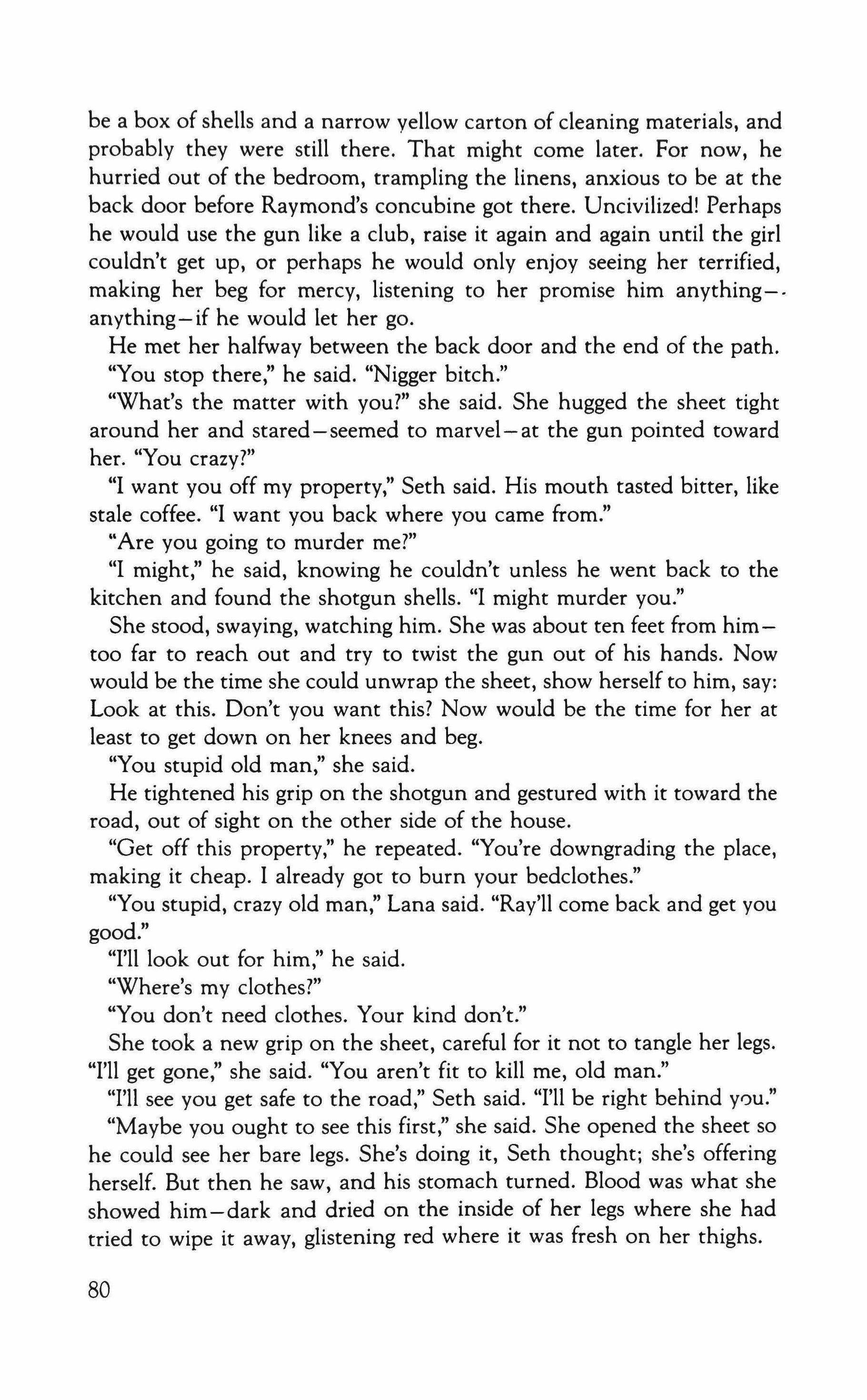
be a box of shells and a narrow yellow carton of cleaning materials, and probably they were still there. That might come later. For now, he hurried out of the bedroom, trampling the linens, anxious to be at the back door before Raymond's concubine got there. Uncivilized! Perhaps he would use the gun like a club, raise it again and again until the girl couldn't get up, or perhaps he would only enjoy seeing her terrified, making her beg for mercy, listening to her promise him anvthing->anything-if he would let her go.
He met her halfway between the back door and the end of the path.
"You stop there:' he said. "Nigger bitch."
"What's the matter with you?" she said. She hugged the sheet tight around her and stared-seemed to marvel-at the gun pointed toward her. "You crazy?"
"I want you off my property," Seth said. His mouth tasted bitter, like stale coffee. "I want you back where you came from."
"Are you going to murder me?"
"I might," he said, knowing he couldn't unless he went back to the kitchen and found the shotgun shells. "I might murder you."
She stood, swaying, watching him. She was about ten feet from himtoo far to reach out and try to twist the gun out of his hands. Now would be the time she could unwrap the sheet, show herself to him, say: Look at this. Don't you want this? Now would be the time for her at least to get down on her knees and beg.
"You stupid old man," she said.
He tightened his grip on the shotgun and gestured with it toward the road, out of sight on the other side of the house.
"Get off this property," he repeated. "You're downgrading the place, making it cheap. I already got to burn your bedclothes."
"You stupid, crazy old man," Lana said. "Ray'll come back and get you good."
"I'll look out for him," he said.
"Where's my clothes?"
"You don't need clothes. Your kind don't."
She took a new grip on the sheet, careful for it not to tangle her legs. "I'll get gone," she said. "You aren't fit to kill me, old man."
"I'll see you get safe to the road," Seth said. "I'll be right behind you,"
"Maybe you ought to see this first," she said. She opened the sheet so he could see her bare legs. She's doing it, Seth thought; she's offering herself. But then he saw, and his stomach turned. Blood was what she showed him-dark and dried on the inside of her legs where she had tried to wipe it away, glistening red where it was fresh on her thighs.
80
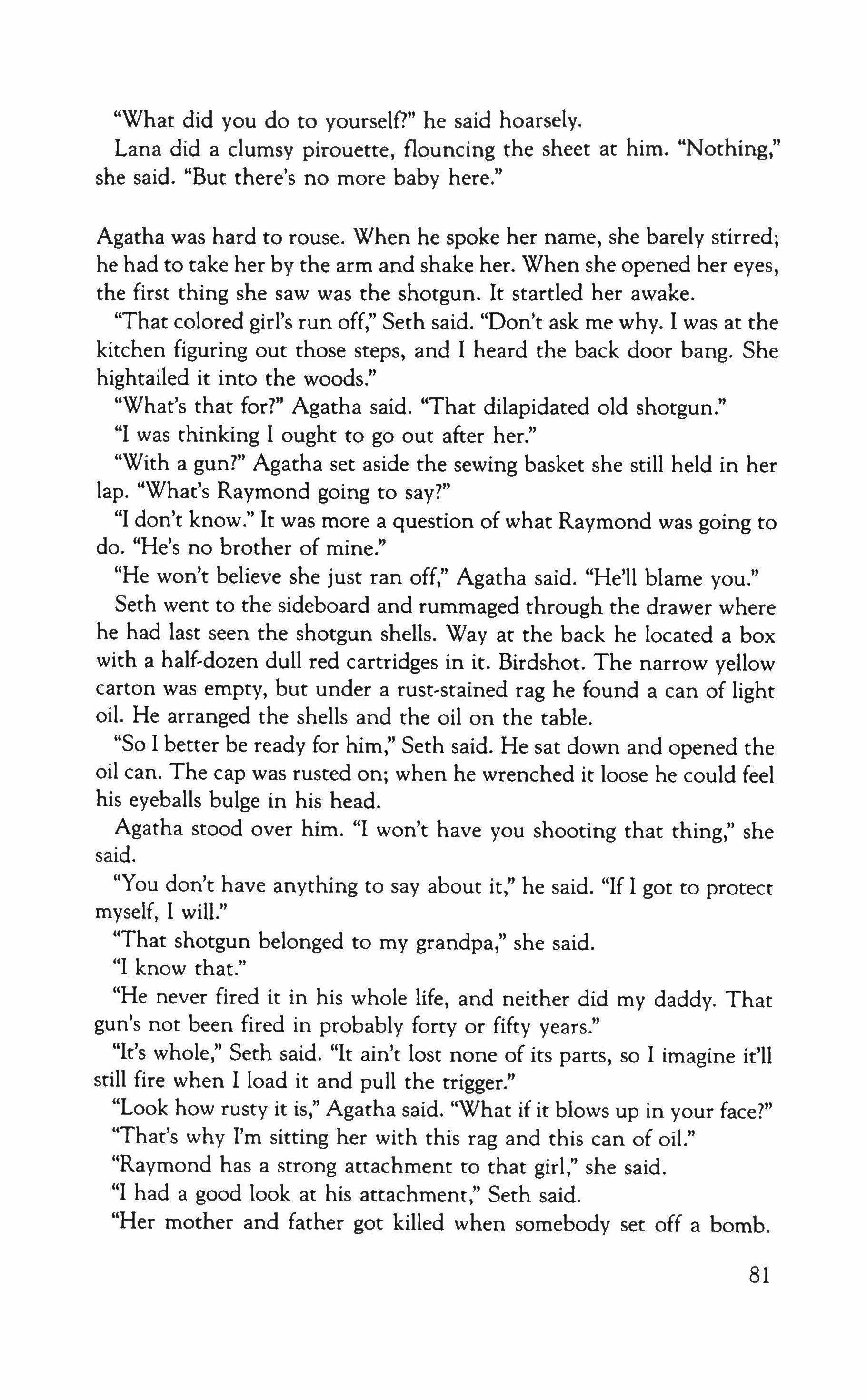
"What did you do to yourself?" he said hoarsely. Lana did a clumsy pirouette, flouncing the sheet at him. "Nothing," she said. "But there's no more baby here."
Agatha was hard to rouse. When he spoke her name, she barely stirred; he had to take her by the arm and shake her. When she opened her eyes, the first thing she saw was the shotgun. It startled her awake.
"That colored girl's run off," Seth said. "Don't ask me why. I was at the kitchen figuring out those steps, and I heard the back door bang. She hightailed it into the woods."
"What's that for?" Agatha said. "That dilapidated old shotgun."
"I was thinking I ought to go out after her."
"With a gun?" Agatha set aside the sewing basket she still held in her lap. "What's Raymond going to say?"
"I don't know." It was more a question of what Raymond was going to do. "He's no brother of mine."
"He won't believe she just ran off," Agatha said. "He'll blame you."
Seth went to the sideboard and rummaged through the drawer where he had last seen the shotgun shells. Way at the back he located a box with a half-dozen dull red cartridges in it. Birdshot. The narrow yellow carton was empty, but under a rust-stained rag he found a can of light oil. He arranged the shells and the oil on the table.
"So I better be ready for him," Seth said. He sat down and opened the oil can. The cap was rusted on; when he wrenched it loose he could feel his eyeballs bulge in his head.
Agatha stood over him. "I won't have you shooting that thing," she said.
"You don't have anything to say about it," he said. "If I got to protect myself, I will."
"That shotgun belonged to my grandpa," she said.
"I know that."
"He never fired it in his whole life, and neither did my daddy. That gun's not been fired in probably forty or fifty years."
"It's whole," Seth said. "It ain't lost none of its parts, so I imagine it'll still fire when I load it and pull the trigger."
"Look how rusty it is," Agatha said. "What if it blows up in your face?"
"That's why I'm sitting her with this rag and this can of oil."
"Raymond has a strong attachment to that girl," she said.
"I had a good look at his attachment," Seth said.
"Her mother and father got killed when somebody set off a bomb.
81
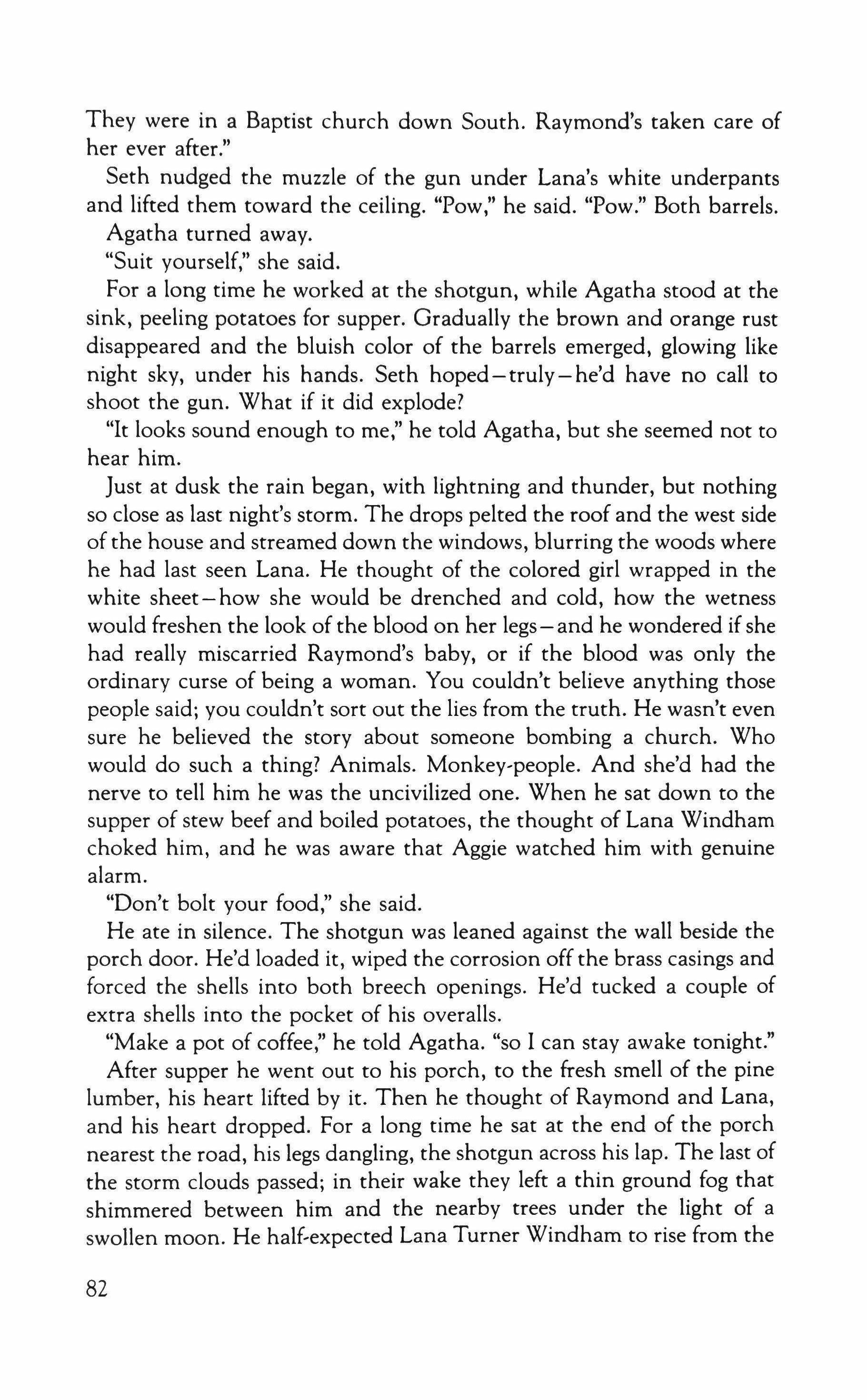
They were in a Baptist church down South. Raymond's taken care of her ever after."
Seth nudged the muzzle of the gun under Lana's white underpants and lifted them toward the ceiling. "Pow," he said. "Pow." Both barrels.
Agatha turned away.
"Suit yourself," she said.
For a long time he worked at the shotgun, while Agatha stood at the sink, peeling potatoes for supper. Gradually the brown and orange rust disappeared and the bluish color of the barrels emerged, glowing like night sky, under his hands. Seth hoped-truly-he'd have no call to shoot the gun. What if it did explode?
"It looks sound enough to me," he told Agatha, but she seemed not to hear him.
Just at dusk the rain began, with lightning and thunder, but nothing so close as last night's storm. The drops pelted the roof and the west side of the house and streamed down the windows, blurring the woods where he had last seen Lana. He thought of the colored girl wrapped in the white sheet-how she would be drenched and cold, how the wetness would freshen the look of the blood on her legs-and he wondered if she had really miscarried Raymond's baby, or if the blood was only the ordinary curse of being a woman. You couldn't believe anything those people said; you couldn't sort out the lies from the truth. He wasn't even sure he believed the story about someone bombing a church. Who would do such a thing? Animals. Monkey-people. And she'd had the nerve to tell him he was the uncivilized one. When he sat down to the supper of stew beef and boiled potatoes, the thought of Lana Windham choked him, and he was aware that Aggie watched him with genuine alarm.
"Don't bolt your food," she said.
He ate in silence. The shotgun was leaned against the wall beside the porch door. He'd loaded it, wiped the corrosion off the brass casings and forced the shells into both breech openings. He'd tucked a couple of extra shells into the pocket of his overalls.
"Make a pot of coffee," he told Agatha. "so I can stay awake tonight."
After supper he went out to his porch, to the fresh smell of the pine lumber, his heart lifted by it. Then he thought of Raymond and Lana, and his heart dropped. For a long time he sat at the end of the porch nearest the road, his legs dangling, the shotgun across his lap. The last of the storm clouds passed; in their wake they left a thin ground fog that shimmered between him and the nearby trees under the light of a swollen moon. He half-expected Lana Turner Windham to rise from the
82
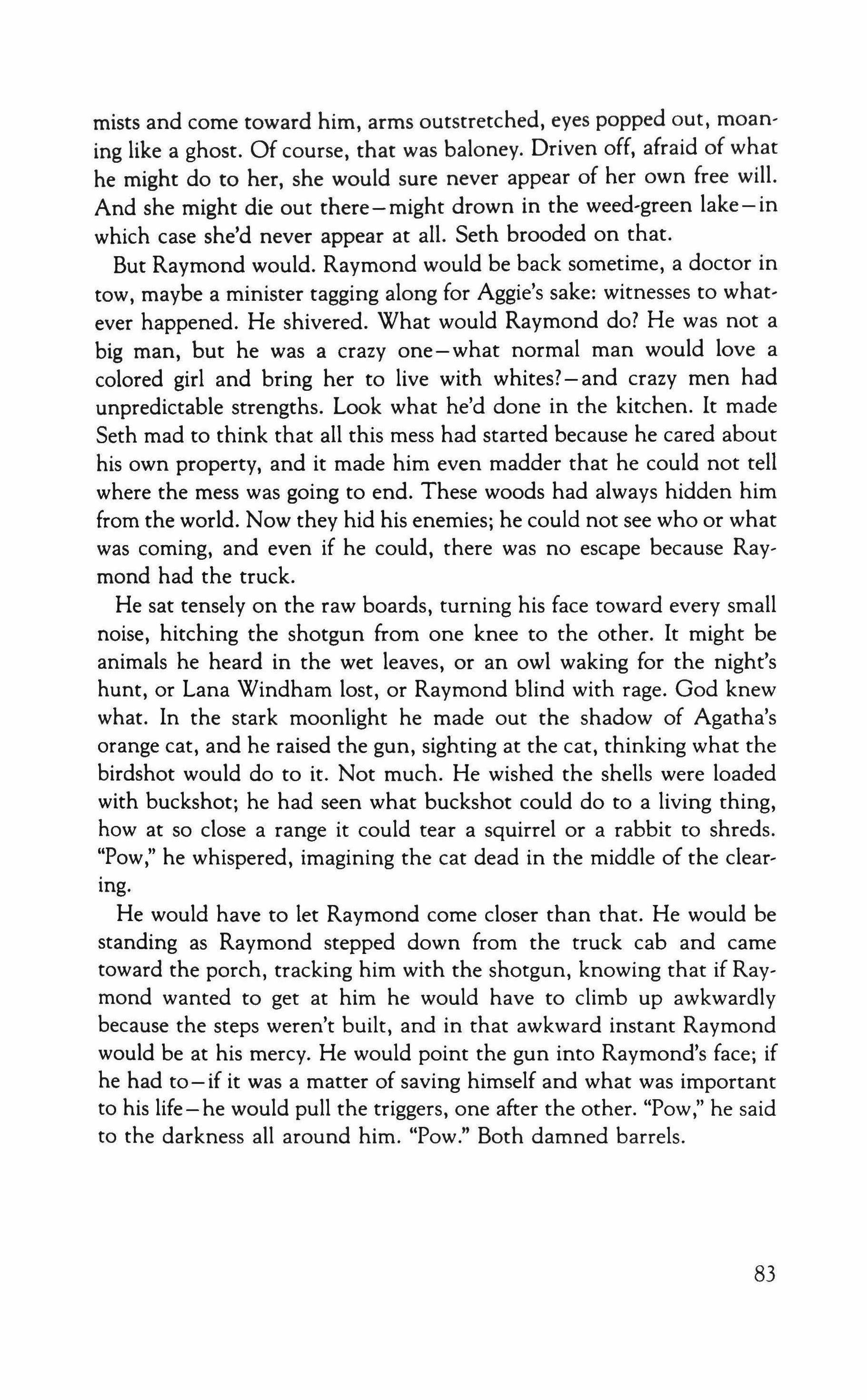
mists and come toward him, arms outstretched, eyes popped out, moaning like a ghost. Of course, that was baloney. Driven off, afraid of what he might do to her, she would sure never appear of her own free will. And she might die out there-might drown in the weed-green lake-in which case she'd never appear at all. Seth brooded on that.
But Raymond would. Raymond would be back sometime, a doctor in tow, maybe a minister tagging along for Aggie's sake: witnesses to whatever happened. He shivered. What would Raymond do? He was not a big man, but he was a crazy one-what normal man would love a colored girl and bring her to live with whites? - and crazy men had unpredictable strengths. Look what he'd done in the kitchen. It made Seth mad to think that all this mess had started because he cared about his own property, and it made him even madder that he could not tell where the mess was going to end. These woods had always hidden him from the world. Now they hid his enemies; he could not see who or what was coming, and even if he could, there was no escape because Raymond had the truck.
He sat tensely on the raw boards, turning his face toward every small noise, hitching the shotgun from one knee to the other. It might be animals he heard in the wet leaves, or an owl waking for the night's hunt, or Lana Windham lost, or Raymond blind with rage. God knew what. In the stark moonlight he made out the shadow of Agatha's orange cat, and he raised the gun, sighting at the cat, thinking what the birdshot would do to it. Not much. He wished the shells were loaded with buckshot; he had seen what buckshot could do to a living thing, how at so close a range it could tear a squirrel or a rabbit to shreds. "Pow," he whispered, imagining the cat dead in the middle of the clearing.
He would have to let Raymond come closer than that. He would be standing as Raymond stepped down from the truck cab and came toward the porch, tracking him with the shotgun, knowing that if Raymond wanted to get at him he would have to climb up awkwardly because the steps weren't built, and in that awkward instant Raymond would be at his mercy. He would point the gun into Raymond's face; if he had to-if it was a matter of saving himself and what was important to his life-he would pull the triggers, one after the other. "Pow," he said to the darkness all around him. "Pow." Both damned barrels.
83
Prefaces
Gordon Lish
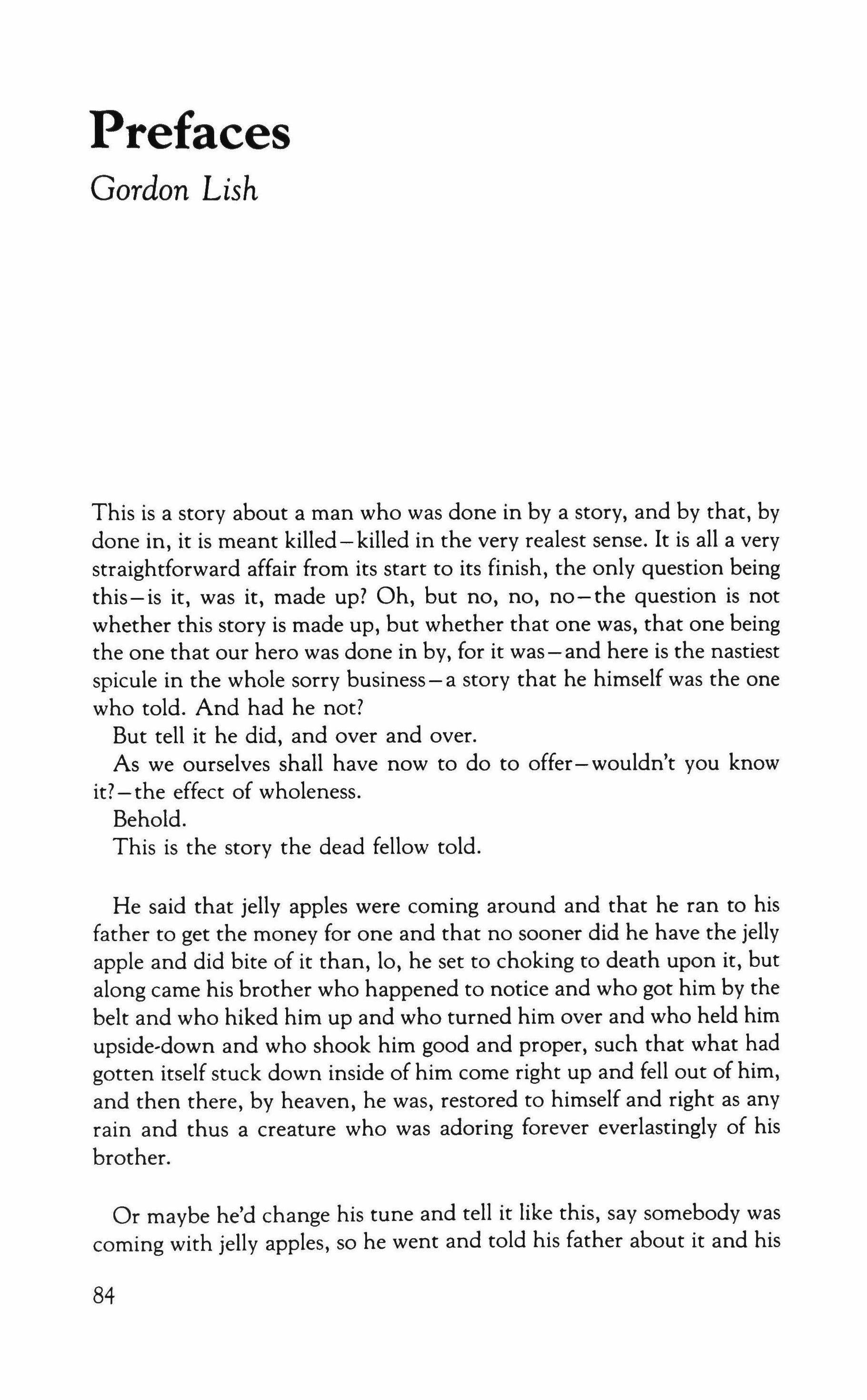
This is a story about a man who was done in by a story, and by that, by done in, it is meant killed - killed in the very realest sense. It is all a very straightforward affair from its start to its finish, the only question being this-is it, was it, made up? Oh, but no, no, no-the question is not whether this story is made up, but whether that one was, that one being the one that our hero was done in by, for it was-and here is the nastiest spicule in the whole sorry business-a story that he himself was the one who told. And had he not?
But tell it he did, and over and over.
As we ourselves shall have now to do to offer- wouldn't you know it? -the effect of wholeness.
Behold.
This is the story the dead fellow told.
He said that jelly apples were coming around and that he ran to his father to get the money for one and that no sooner did he have the jelly apple and did bite of it than, 10, he set to choking to death upon it, but along came his brother who happened to notice and who got him by the belt and who hiked him up and who turned him over and who held him upside-down and who shook him good and proper, such that what had gotten itself stuck down inside of him come right up and fell out of him, and then there, by heaven, he was, restored to himself and right as any rain and thus a creature who was adoring forever everlastingly of his brother.
Or maybe he'd change his tune and tell it like this, say somebody was coming with jelly apples, so he went and told his father about it and his
84
father said there was always going to be somebody who was going to be coming with something, that if they weren't coming with one thing, they were going to be coming with another thing, that there wasn't anything which they were ever going to be coming with which wasn't going to cost somebody some money, but that the father wasn't a father ever to deny any son something, least of all wisdom and candied nutrition.
But it all worked out to be the same story, anyway-one bite and the boy was choking to death on whatever he bit into-take your pick, jelly apple, sourball, peanut. Whereupon, here comes his brother to come happening along and thereupon to see what's been going on, so that he takes the boy by the belt and yanks him up and turns him over and holds him upside-down, et cetera, et cetera, until the piece ofwhatever it was gets knocked loose and comes back up out of him and he is breath, ing all right again and feels altogether returned to himself again just like a full-fledged brought-back-from-the-dead fellow.
This is the story the dead man told.
Or that was.
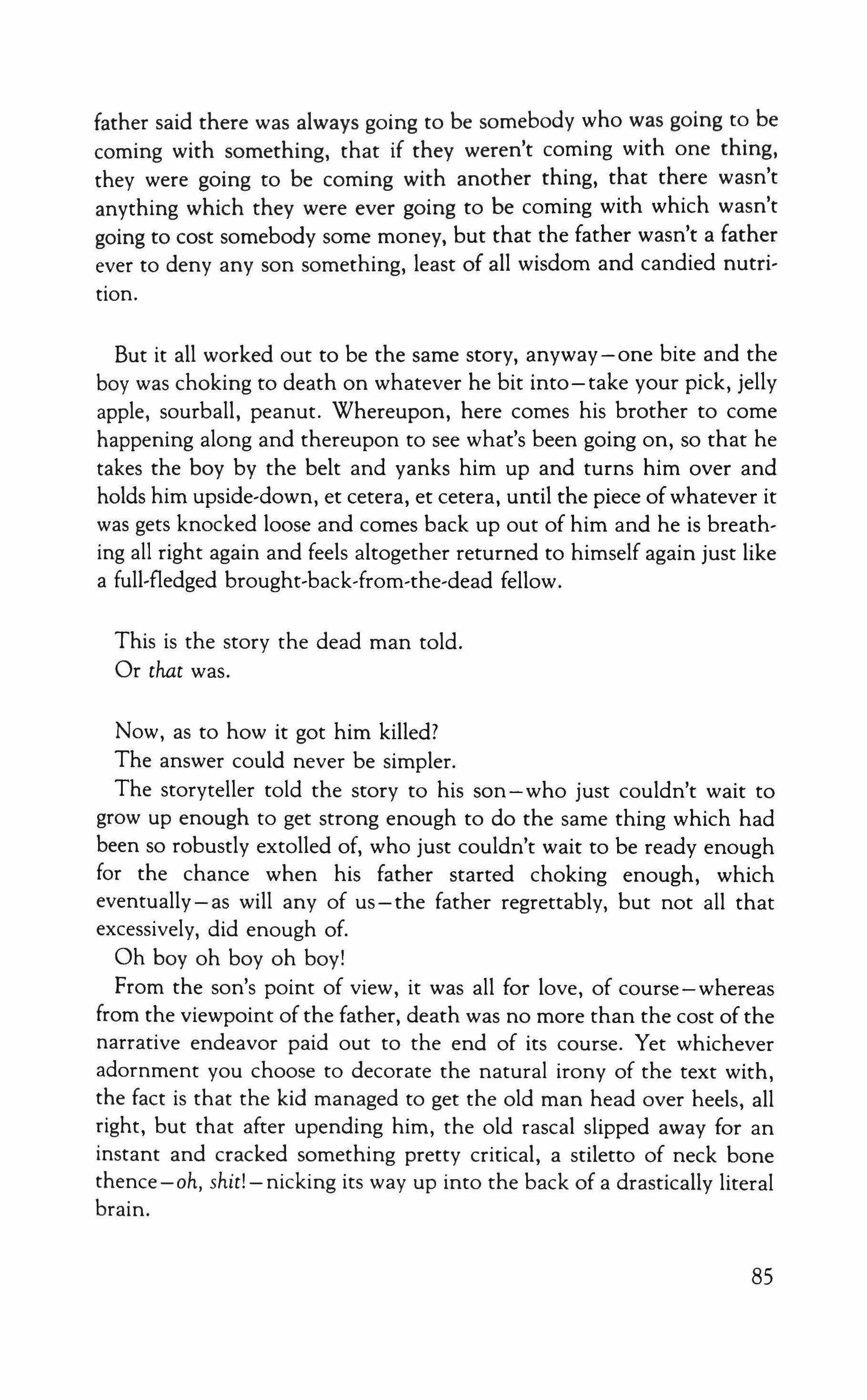
Now, as to how it got him killed?
The answer could never be simpler.
The storyteller told the story to his son-who just couldn't wait to grow up enough to get strong enough to do the same thing which had been so robustly extolled of, who just couldn't wait to be ready enough for the chance when his father started choking enough, which eventually-as will any of us-the father regrettably, but not all that excessively, did enough of.
Oh boy oh boy oh boy!
From the son's point of view, it was all for love, of course-whereas from the viewpoint of the father, death was no more than the cost of the narrative endeavor paid out to the end of its course. Yet whichever adornment you choose to decorate the natural irony of the text with, the fact is that the kid managed to get the old man head over heels, all right, but that after upending him, the old rascal slipped away for an instant and cracked something pretty critical, a stiletto of neck bone thence - oh, shit! - nicking its way up into the back of a drastically literal brain.
85
Three Pieces from Around the Day In Eighty Worlds
Julio Cortazar
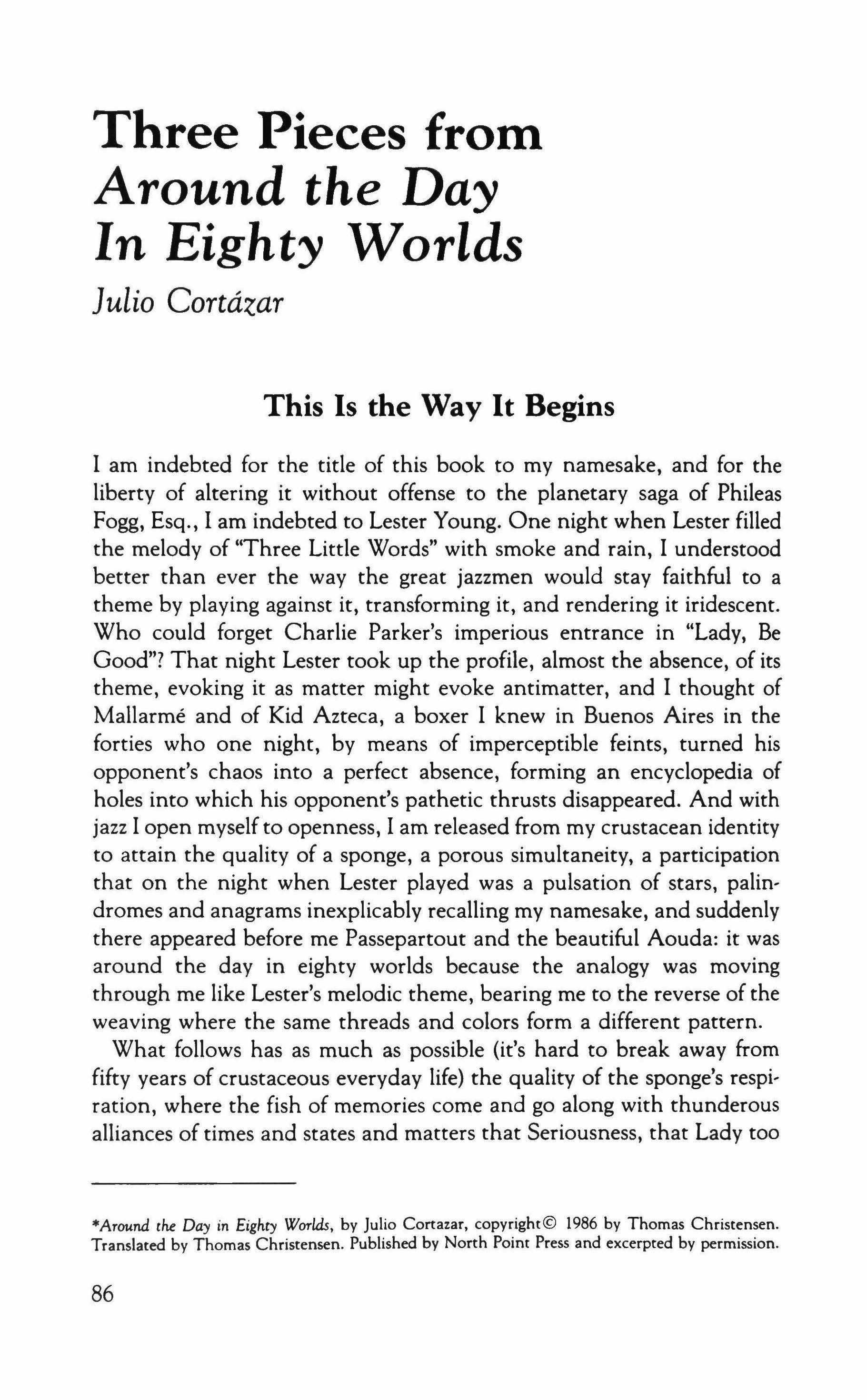
This Is the Way It Begins
I am indebted for the title of this book to my namesake, and for the liberty of altering it without offense to the planetary saga of Phileas Fogg, Esq., I am indebted to Lester Young. One night when Lester filled the melody of "Three Little Words" with smoke and rain, I understood better than ever the way the great jazzmen would stay faithful to a theme by playing against it, transforming it, and rendering it iridescent. Who could forget Charlie Parker's imperious entrance in "Lady, Be Good"? That night Lester took up the profile, almost the absence, of its theme, evoking it as matter might evoke antimatter, and I thought of Mallarrne and of Kid Azteca, a boxer I knew in Buenos Aires in the forties who one night, by means of imperceptible feints, turned his opponent's chaos into a perfect absence, forming an encyclopedia of holes into which his opponent's pathetic thrusts disappeared. And with jazz I open myself to openness, I am released from my crustacean identity to attain the quality of a sponge, a porous simultaneity, a participation that on the night when Lester played was a pulsation of stars, palindromes and anagrams inexplicably recalling my namesake, and suddenly there appeared before me Passepartout and the beautiful Aouda: it was around the day in eighty worlds because the analogy was moving through me like Lester's melodic theme, bearing me to the reverse of the weaving where the same threads and colors form a different pattern. What follows has as much as possible (it's hard to break away from fifty years of crustaceous everyday life) the quality of the sponge's respiration, where the fish of memories come and go along with thunderous alliances of times and states and matters that Seriousness, that Lady too
*Around the Day in Eighty Worlds. by Julio Cortazar, copyright© 1986 by Thomas Christensen. Translated by Thomas Christensen. Published by North Point Press and excerpted by permission.
86
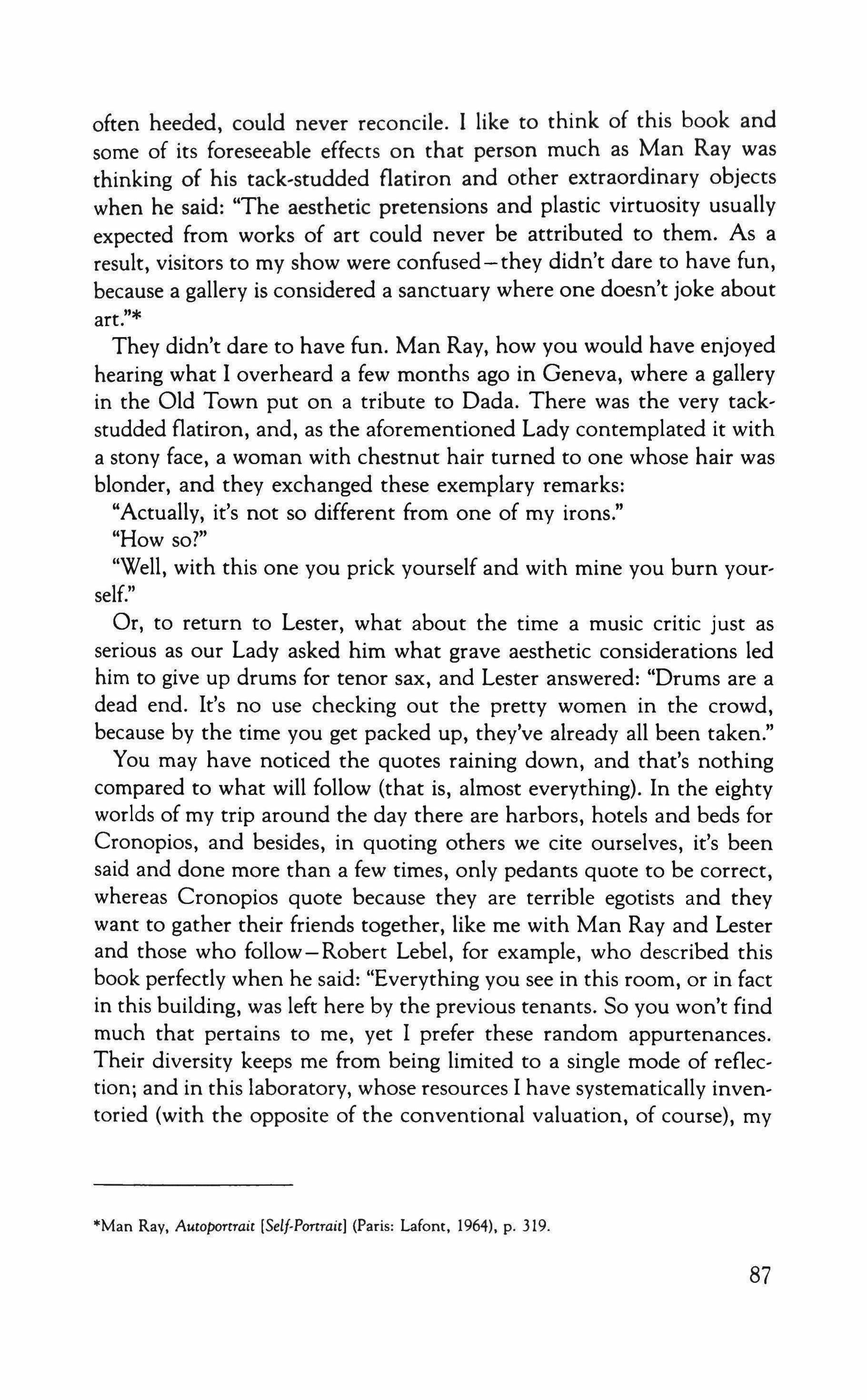
often heeded, could never reconcile. I like to think of this book and some of its foreseeable effects on that person much as Man Ray was thinking of his tack-studded flatiron and other extraordinary objects when he said: "The aesthetic pretensions and plastic virtuosity usually expected from works of art could never be attributed to them. As a result, visitors to my show were confused - they didn't dare to have fun, because a gallery is considered a sanctuary where one doesn't joke about art."*
They didn't dare to have fun. Man Ray, how you would have enjoyed hearing what I overheard a few months ago in Geneva, where a gallery in the Old Town put on a tribute to Dada. There was the very tack, studded flatiron, and, as the aforementioned Lady contemplated it with a stony face, a woman with chestnut hair turned to one whose hair was blonder, and they exchanged these exemplary remarks:
"Actually, it's not so different from one of my irons."
"How so?"
"Well, with this one you prick yourself and with mine you burn your, self."
Or, to return to Lester, what about the time a music critic just as serious as our Lady asked him what grave aesthetic considerations led him to give up drums for tenor sax, and Lester answered: "Drums are a dead end. It's no use checking out the pretty women in the crowd, because by the time you get packed up, they've already all been taken."
You may have noticed the quotes raining down, and that's nothing compared to what will follow (that is, almost everything). In the eighty worlds of my trip around the day there are harbors, hotels and beds for Cronopios, and besides, in quoting others we cite ourselves, it's been said and done more than a few times, only pedants quote to be correct, whereas Cronopios quote because they are terrible egotists and they want to gather their friends together, like me with Man Ray and Lester and those who follow-Robert Lebel, for example, who described this book perfectly when he said: "Everything you see in this room, or in fact in this building, was left here by the previous tenants. So you won't find much that pertains to me, yet I prefer these random appurtenances. Their diversity keeps me from being limited to a single mode of reflection; and in this laboratory, whose resources I have systematically inventoried (with the opposite of the conventional valuation, of course), my "Man Ray, AuwpoTtTait [Self·Panrait) (Paris: Lafont, 1964), p. 319.
87
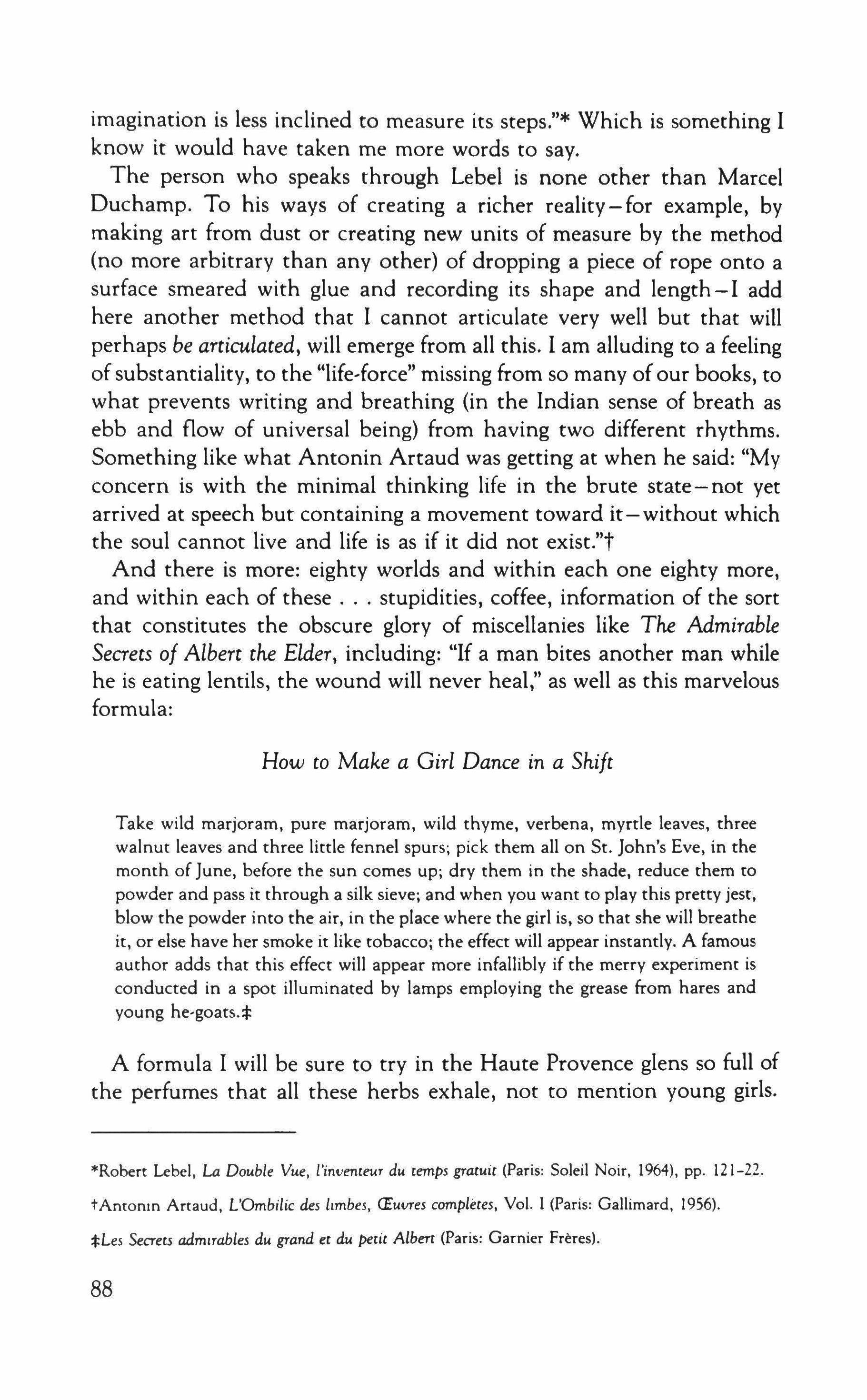
imagination is less inclined to measure its steps."* Which is something I know it would have taken me more words to say.
The person who speaks through Lebel is none other than Marcel Duchamp. To his ways of creating a richer reality-for example, by making art from dust or creating new units of measure by the method (no more arbitrary than any other) of dropping a piece of rope onto a surface smeared with glue and recording its shape and length -I add here another method that I cannot articulate very well but that will perhaps be articulated, will emerge from all this. I am alluding to a feeling of substantiality, to the "life-force" missing from so many of our books, to what prevents writing and breathing (in the Indian sense of breath as ebb and flow of universal being) from having two different rhythms. Something like what Antonin Artaud was getting at when he said: "My concern is with the minimal thinking life in the brute state-not yet arrived at speech but containing a movement toward it-without which the soul cannot live and life is as if it did not exist."t
And there is more: eighty worlds and within each one eighty more, and within each of these stupidities, coffee, information of the sort that constitutes the obscure glory of miscellanies like The Admirable Secrets of Albert the Elder, including: "If a man bites another man while he is eating lentils, the wound will never heal," as well as this marvelous formula:
How to Make a Girl Dance in a Shift
Take wild marjoram, pure marjoram, wild thyme, verbena, myrtle leaves, three walnut leaves and three little fennel spurs; pick them all on St. John's Eve, in the month of June, before the sun comes up; dry them in the shade, reduce them to powder and pass it through a silk sieve; and when you want to play this pretty jest, blow the powder into the air, in the place where the girl is, so that she will breathe it, or else have her smoke it like tobacco; the effect will appear instantly. A famous author adds that this effect will appear more infallibly if the merry experiment is conducted in a spot illuminated by lamps employing the grease from hares and young he-goars.f
A formula I will be sure to try in the Haute Provence glens so full of the perfumes that all these herbs exhale, not to mention young girls.
*Robert Lebel, La Double Vue, l'inventeur du temps gratuit (Paris: Soleil Noir, 1964), pp. 121-22. tAntomn Artaud, L'Ombilic des hmbes, CEutlTes completes, Vol. [ (Paris: Gallimard, 1956).
*Les Secrets admlrables du grand er du petit Albert (Paris: Garnier Freres).
88
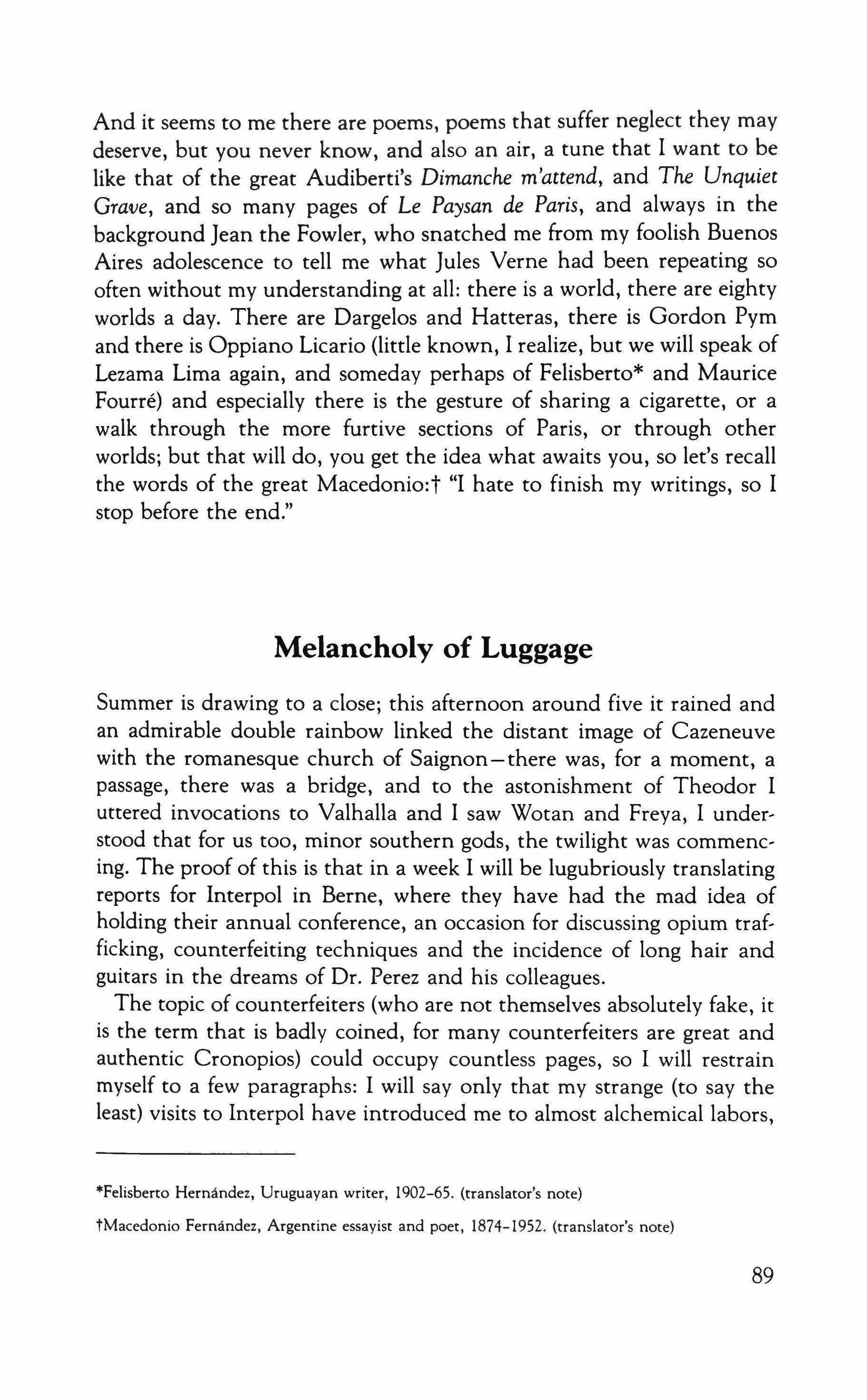
And it seems to me there are poems, poems that suffer neglect they may deserve, but you never know, and also an air, a tune that I want to be like that of the great Audiberti's Dimanche m'attend, and The Unquiet Grave, and so many pages of Le Paysan de Paris, and always in the background Jean the Fowler, who snatched me from my foolish Buenos Aires adolescence to tell me what Jules Verne had been repeating so often without my understanding at all: there is a world, there are eighty worlds a day. There are Dargelos and Hatteras, there is Gordon Pym and there is Oppiano Licario (little known, I realize, but we will speak of Lezama Lima again, and someday perhaps of Felisberto* and Maurice Fourre) and especially there is the gesture of sharing a cigarette, or a walk through the more furtive sections of Paris, or through other worlds; but that will do, you get the idea what awaits you, so let's recall the words of the great Macedonio:t "I hate to finish my writings, so I stop before the end."
Melancholy of Luggage
Summer is drawing to a close; this afternoon around five it rained and an admirable double rainbow linked the distant image of Cazeneuve with the romanesque church of Saignon-there was, for a moment, a passage, there was a bridge, and to the astonishment of Theodor I uttered invocations to Valhalla and I saw Wotan and Freya, I understood that for us too, minor southern gods, the twilight was commencing. The proof of this is that in a week I will be lugubriously translating reports for Interpol in Berne, where they have had the mad idea of holding their annual conference, an occasion for discussing opium trafficking, counterfeiting techniques and the incidence of long hair and guitars in the dreams of Dr. Perez and his colleagues. The topic of counterfeiters (who are not themselves absolutely fake, it is the term that is badly coined, for many counterfeiters are great and authentic Cronopios) could occupy countless pages, so I will restrain myself to a few paragraphs: I will say only that my strange (to say the least) visits to Interpol have introduced me to almost alchemical labors,
*Felisberto Hernandez, Uruguayan writer, 1902-65. (translator's note)
tMacedonio Fernandez, Argentine essayist and poet, 1874-1952. (translator's note)
89
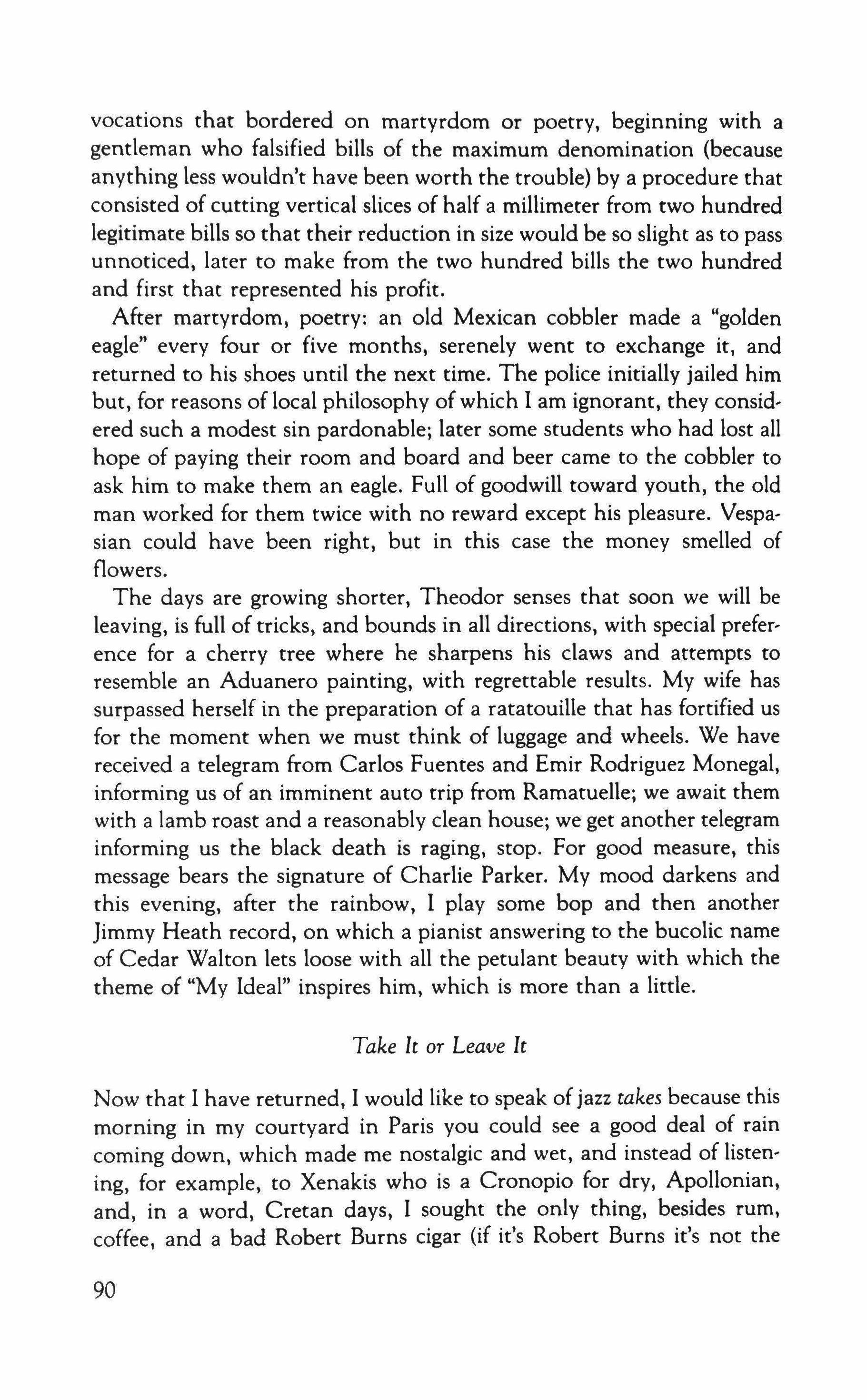
vocations that bordered on martyrdom or poetry, beginning with a gentleman who falsified bills of the maximum denomination (because anything less wouldn't have been worth the trouble) by a procedure that consisted of cutting vertical slices of half a millimeter from two hundred legitimate bills so that their reduction in size would be so slight as to pass unnoticed, later to make from the two hundred bills the two hundred and first that represented his profit.
After martyrdom, poetry: an old Mexican cobbler made a "golden eagle" every four or five months, serenely went to exchange it, and returned to his shoes until the next time. The police initially jailed him but, for reasons of local philosophy of which I am ignorant, they considered such a modest sin pardonable; later some students who had lost all hope of paying their room and board and beer came to the cobbler to ask him to make them an eagle. Full of goodwill toward youth, the old man worked for them twice with no reward except his pleasure. Vespasian could have been right, but in this case the money smelled of flowers.
The days are growing shorter, Theodor senses that soon we will be leaving, is full of tricks, and bounds in all directions, with special preference for a cherry tree where he sharpens his claws and attempts to resemble an Aduanero painting, with regrettable results. My wife has surpassed herself in the preparation of a ratatouille that has fortified us for the moment when we must think of luggage and wheels. We have received a telegram from Carlos Fuentes and Emir Rodriguez Monegal, informing us of an imminent auto trip from Ramatuelle; we await them with a lamb roast and a reasonably clean house; we get another telegram informing us the black death is raging, stop. For good measure, this message bears the signature of Charlie Parker. My mood darkens and this evening, after the rainbow, I play some bop and then another Jimmy Heath record, on which a pianist answering to the bucolic name of Cedar Walton lets loose with all the petulant beauty with which the theme of "My Ideal" inspires him, which is more than a little.
Take It or Leave It
Now that I have returned, I would like to speak ofjazz takes because this morning in my courtyard in Paris you could see a good deal of rain coming down, which made me nostalgic and wet, and instead of listening, for example, to Xenakis who is a Cronopio for dry, Apollonian, and, in a word, Cretan days, I sought the only thing, besides rum, coffee, and a bad Robert Burns cigar (if it's Robert Burns it's not the
90
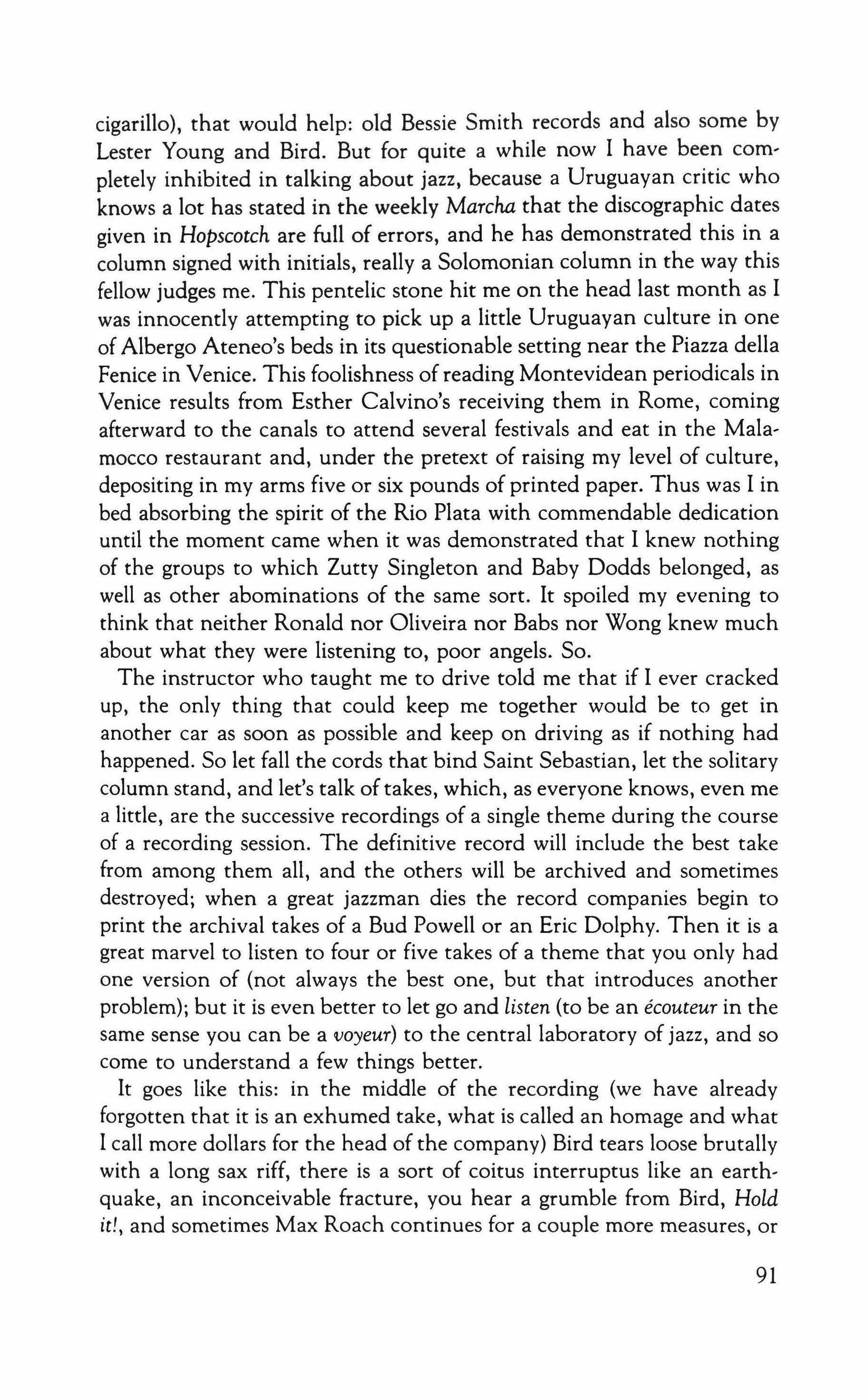
cigarillo), that would help: old Bessie Smith records and also some by Lester Young and Bird. But for quite a while now I have been com' pletely inhibited in talking about jazz, because a Uruguayan critic who knows a lot has stated in the weekly Marcha that the discographic dates given in Hopscotch are full of errors, and he has demonstrated this in a column signed with initials, really a Solomonian column in the way this fellow judges me. This pentelic stone hit me on the head last month as I was innocently attempting to pick up a little Uruguayan culture in one of Albergo Ateneo's beds in its questionable setting near the Piazza della Fenice in Venice. This foolishness ofreading Montevidean periodicals in Venice results from Esther Calvino's receiving them in Rome, coming afterward to the canals to attend several festivals and eat in the Mala, mocco restaurant and, under the pretext of raising my level of culture, depositing in my arms five or six pounds of printed paper. Thus was I in bed absorbing the spirit of the Rio Plata with commendable dedication until the moment came when it was demonstrated that I knew nothing of the groups to which Zutty Singleton and Baby Dodds belonged, as well as other abominations of the same sort. It spoiled my evening to think that neither Ronald nor Oliveira nor Babs nor Wong knew much about what they were listening to, poor angels. So.
The instructor who taught me to drive told me that if I ever cracked up, the only thing that could keep me together would be to get in another car as soon as possible and keep on driving as if nothing had happened. So let fall the cords that bind Saint Sebastian, let the solitary column stand, and let's talk oftakes, which, as everyone knows, even me a little, are the successive recordings of a single theme during the course of a recording session. The definitive record will include the best take from among them all, and the others will be archived and sometimes destroyed; when a great jazzman dies the record companies begin to print the archival takes of a Bud Powell or an Eric Dolphy. Then it is a great marvel to listen to four or five takes of a theme that you only had one version of (not always the best one, but that introduces another problem); but it is even better to let go and listen (to be an ecouteus in the same sense you can be a voyeur) to the central laboratory of jazz, and so come to understand a few things better.
It goes like this: in the middle of the recording (we have already forgotten that it is an exhumed take, what is called an homage and what I call more dollars for the head of the company) Bird tears loose brutally with a long sax riff, there is a sort of coitus interruptus like an earth, quake, an inconceivable fracture, you hear a grumble from Bird, Hold it!, and sometimes Max Roach continues for a couple more measures, or
91
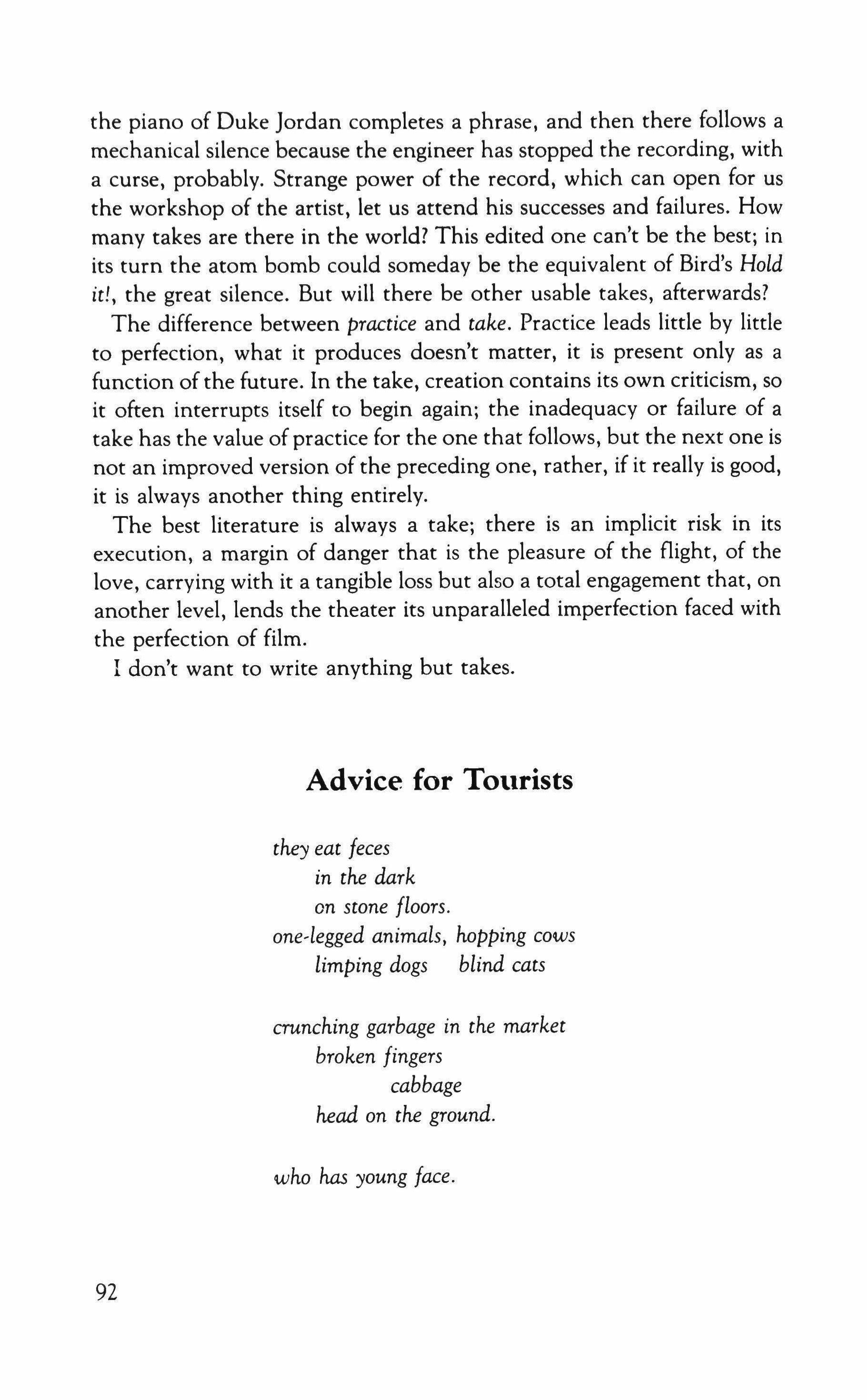
the piano of Duke Jordan completes a phrase, and then there follows a mechanical silence because the engineer has stopped the recording, with a curse, probably. Strange power of the record, which can open for us the workshop of the artist, let us attend his successes and failures. How many takes are there in the world? This edited one can't be the best; in its turn the atom bomb could someday be the equivalent of Bird's Hold it!, the great silence. But will there be other usable takes, afterwards?
The difference between practice and take. Practice leads little by little to perfection, what it produces doesn't matter, it is present only as a function of the future. In the take, creation contains its own criticism, so it often interrupts itself to begin again; the inadequacy or failure of a take has the value of practice for the one that follows, but the next one is not an improved version of the preceding one, rather, if it really is good, it is always another thing entirely.
The best literature is always a take; there is an implicit risk in its execution, a margin of danger that is the pleasure of the flight, of the love, carrying with it a tangible loss but also a total engagement that, on another level, lends the theater its unparalleled imperfection faced with the perfection of film.
I don't want to write anything but takes.
Advice for Tourists
they eat feces in the dark on stone floors. one-legged animals, hopping cows limping dogs blind cats crunching garbage in the market broken fingers cabbage head on the ground. who has young face.
92
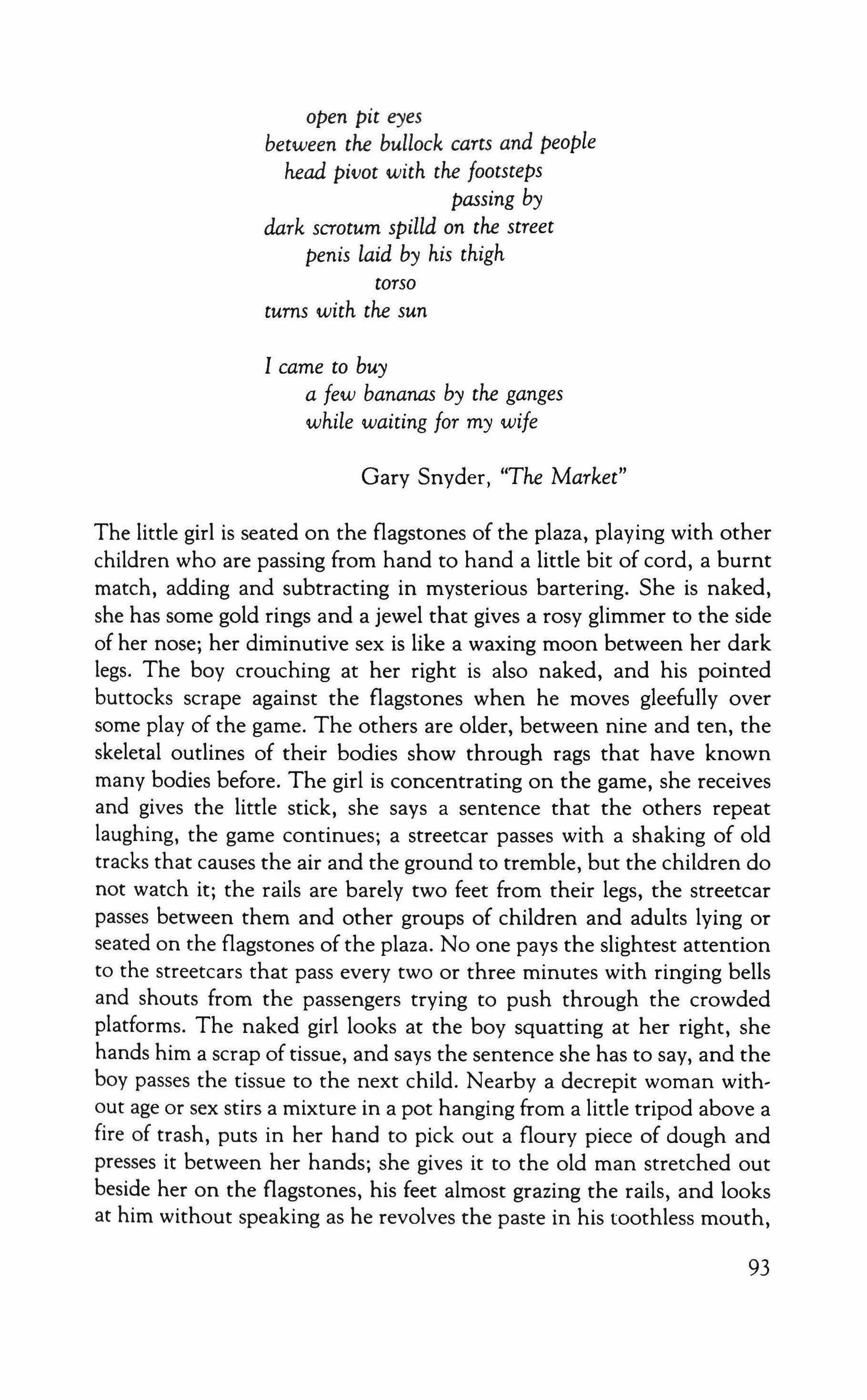
open pit eyes between the bullock carts and people head pivot with the footsteps passing by dark scrotum spilld on the street penis laid by his thigh torso
turns with the sun
I came to buy a few bananas by the ganges while waiting for my wife
Gary Snyder, "The Market"
The little girl is seated on the flagstones of the plaza, playing with other children who are passing from hand to hand a little bit of cord, a burnt match, adding and subtracting in mysterious bartering. She is naked, she has some gold rings and a jewel that gives a rosy glimmer to the side of her nose; her diminutive sex is like a waxing moon between her dark legs. The boy crouching at her right is also naked, and his pointed buttocks scrape against the flagstones when he moves gleefully over some play of the game. The others are older, between nine and ten, the skeletal outlines of their bodies show through rags that have known many bodies before. The girl is concentrating on the game, she receives and gives the little stick, she says a sentence that the others repeat laughing, the game continues; a streetcar passes with a shaking of old tracks that causes the air and the ground to tremble, but the children do not watch it; the rails are barely two feet from their legs, the streetcar passes between them and other groups of children and adults lying or seated on the flagstones of the plaza. No one pays the slightest attention to the streetcars that pass every two or three minutes with ringing bells and shouts from the passengers trying to push through the crowded platforms. The naked girl looks at the boy squatting at her right, she hands him a scrap of tissue, and says the sentence she has to say, and the boy passes the tissue to the next child. Nearby a decrepit woman without age or sex stirs a mixture in a pot hanging from a little tripod above a fire of trash, puts in her hand to pick out a floury piece of dough and presses it between her hands; she gives it to the old man stretched out beside her on the flagstones, his feet almost grazing the rails, and looks at him without speaking as he revolves the paste in his toothless mouth,
93
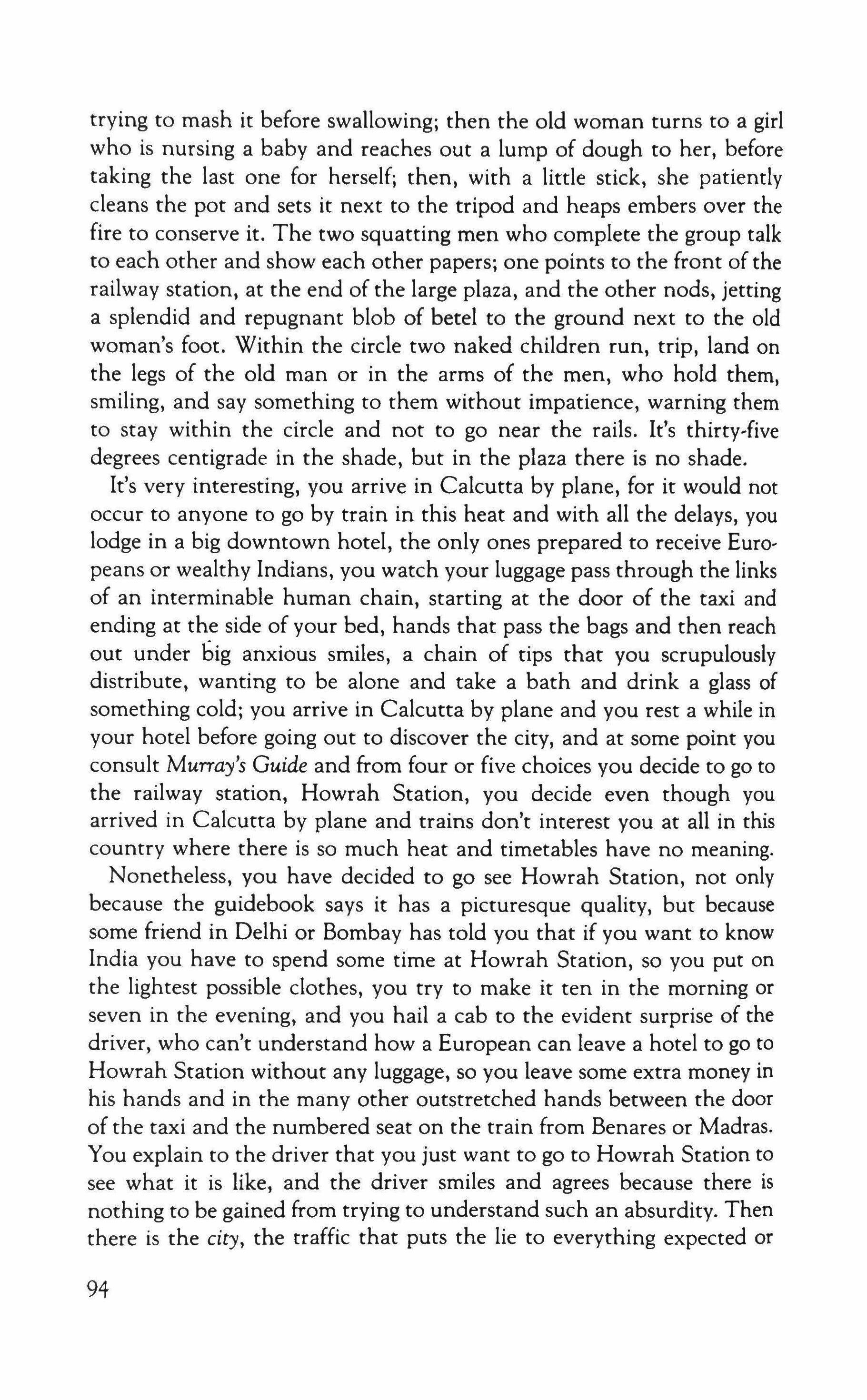
trying to mash it before swallowing; then the old woman turns to a girl who is nursing a baby and reaches out a lump of dough to her, before taking the last one for herself; then, with a little stick, she patiently cleans the pot and sets it next to the tripod and heaps embers over the fire to conserve it. The two squatting men who complete the group talk to each other and show each other papers; one points to the front of the railway station, at the end of the large plaza, and the other nods, jetting a splendid and repugnant blob of betel to the ground next to the old woman's foot. Within the circle two naked children run, trip, land on the legs of the old man or in the arms of the men, who hold them, smiling, and say something to them without impatience, warning them to stay within the circle and not to go near the rails. It's thirty-five degrees centigrade in the shade, but in the plaza there is no shade.
It's very interesting, you arrive in Calcutta by plane, for it would not occur to anyone to go by train in this heat and with all the delays, you lodge in a big downtown hotel, the only ones prepared to receive Europeans or wealthy Indians, you watch your luggage pass through the links of an interminable human chain, starting at the door of the taxi and ending at the side of your bed, hands that pass the bags and then reach out under big anxious smiles, a chain of tips that you scrupulously distribute, wanting to be alone and take a bath and drink a glass of something cold; you arrive in Calcutta by plane and you rest a while in your hotel before going out to discover the city, and at some point you consult Murray's Guide and from four or five choices you decide to go to the railway station, Howrah Station, you decide even though you arrived in Calcutta by plane and trains don't interest you at all in this country where there is so much heat and timetables have no meaning. Nonetheless, you have decided to go see Howrah Station, not only because the guidebook says it has a picturesque quality, but because some friend in Delhi or Bombay has told you that if you want to know India you have to spend some time at Howrah Station, so you put on the lightest possible clothes. you try to make it ten in the morning or seven in the evening, and you hail a cab to the evident surprise of the driver, who can't understand how a European can leave a hotel to go to Howrah Station without any luggage, so you leave some extra money in his hands and in the many other outstretched hands between the door of the taxi and the numbered seat on the train from Benares or Madras. You explain to the driver that you just want to go to Howrah Station to see what it is like, and the driver smiles and agrees because there is nothing to be gained from trying to understand such an absurdity. Then there is the city, the traffic that puts the lie to everything expected or
94
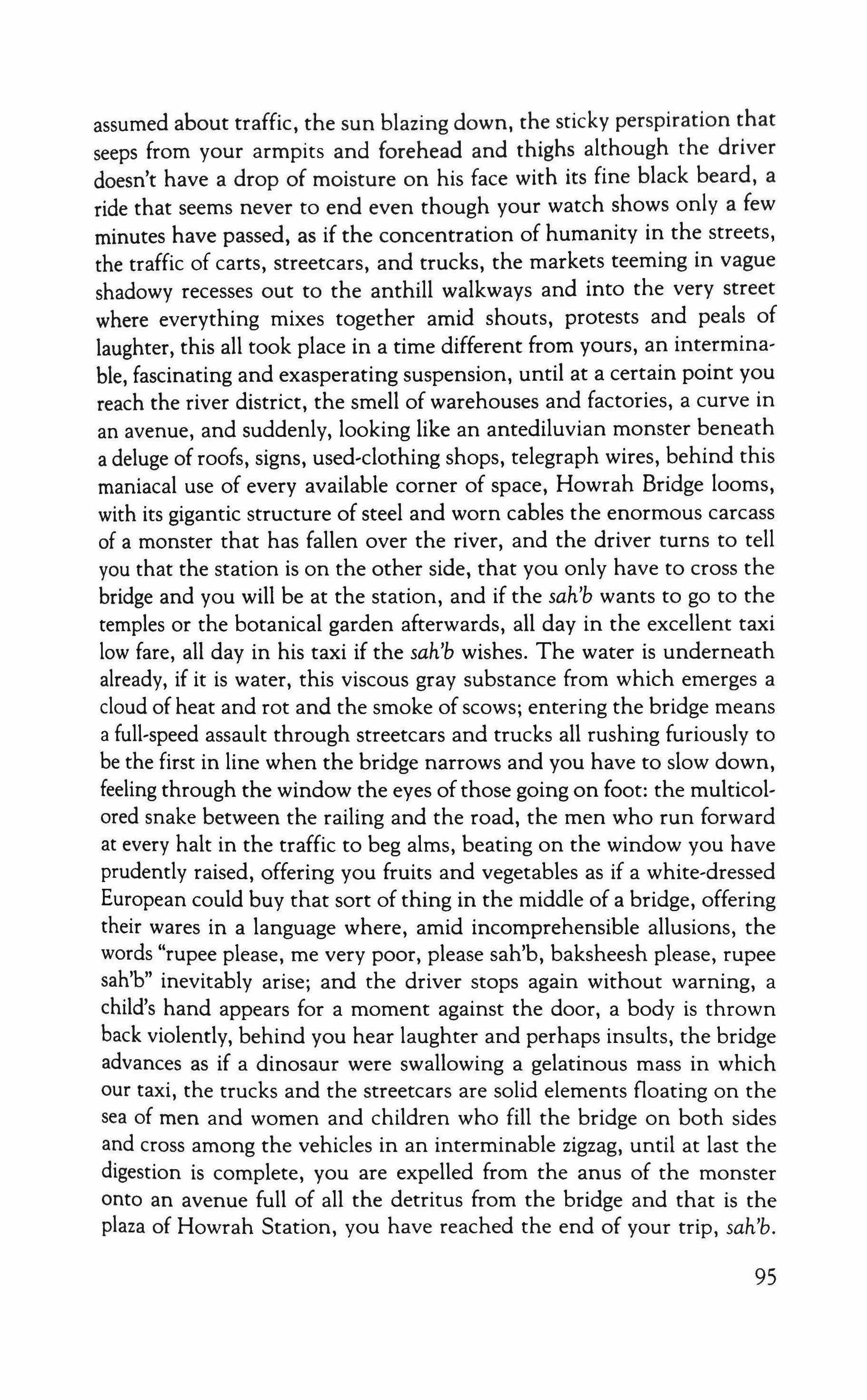
assumed about traffic, the sun blazing down, the sticky perspiration that seeps from your armpits and forehead and thighs although the driver doesn't have a drop of moisture on his face with its fine black beard, a ride that seems never to end even though your watch shows only a few minutes have passed, as if the concentration of humanity in the streets, the traffic of carts, streetcars, and trucks, the markets teeming in vague shadowy recesses out to the anthill walkways and into the very street where everything mixes together amid shouts, protests and peals of laughter, this all took place in a time different from yours, an interminable, fascinating and exasperating suspension, until at a certain point you reach the river district, the smell of warehouses and factories, a curve in an avenue, and suddenly, looking like an antediluvian monster beneath a deluge of roofs, signs, used-clothing shops, telegraph wires, behind this maniacal use of every available corner of space, Howrah Bridge looms, with its gigantic structure of steel and worn cables the enormous carcass of a monster that has fallen over the river, and the driver turns to tell you that the station is on the other side, that you only have to cross the bridge and you will be at the station, and if the sah'b wants to go to the temples or the botanical garden afterwards, all day in the excellent taxi low fare, all day in his taxi if the sah'b wishes. The water is underneath already, if it is water, this viscous gray substance from which emerges a cloud of heat and rot and the smoke of scows; entering the bridge means a full-speed assault through streetcars and trucks all rushing furiously to be the first in line when the bridge narrows and you have to slow down, feeling through the window the eyes ofthose going on foot: the multicolored snake between the railing and the road, the men who run forward at every halt in the traffic to beg alms, beating on the window you have prudently raised, offering you fruits and vegetables as if a white-dressed European could buy that sort of thing in the middle of a bridge, offering their wares in a language where, amid incomprehensible allusions, the words "rupee please, me very poor, please sah'b, baksheesh please, rupee sah'b" inevitably arise; and the driver stops again without warning, a child's hand appears for a moment against the door, a body is thrown back violently, behind you hear laughter and perhaps insults, the bridge advances as if a dinosaur were swallowing a gelatinous mass in which our taxi, the trucks and the streetcars are solid elements floating on the sea of men and women and children who fill the bridge on both sides and cross among the vehicles in an interminable zigzag, until at last the digestion is complete, you are expelled from the anus of the monster onto an avenue full of all the detritus from the bridge and that is the plaza of Howrah Station, you have reached the end of your trip, sah'b.
95
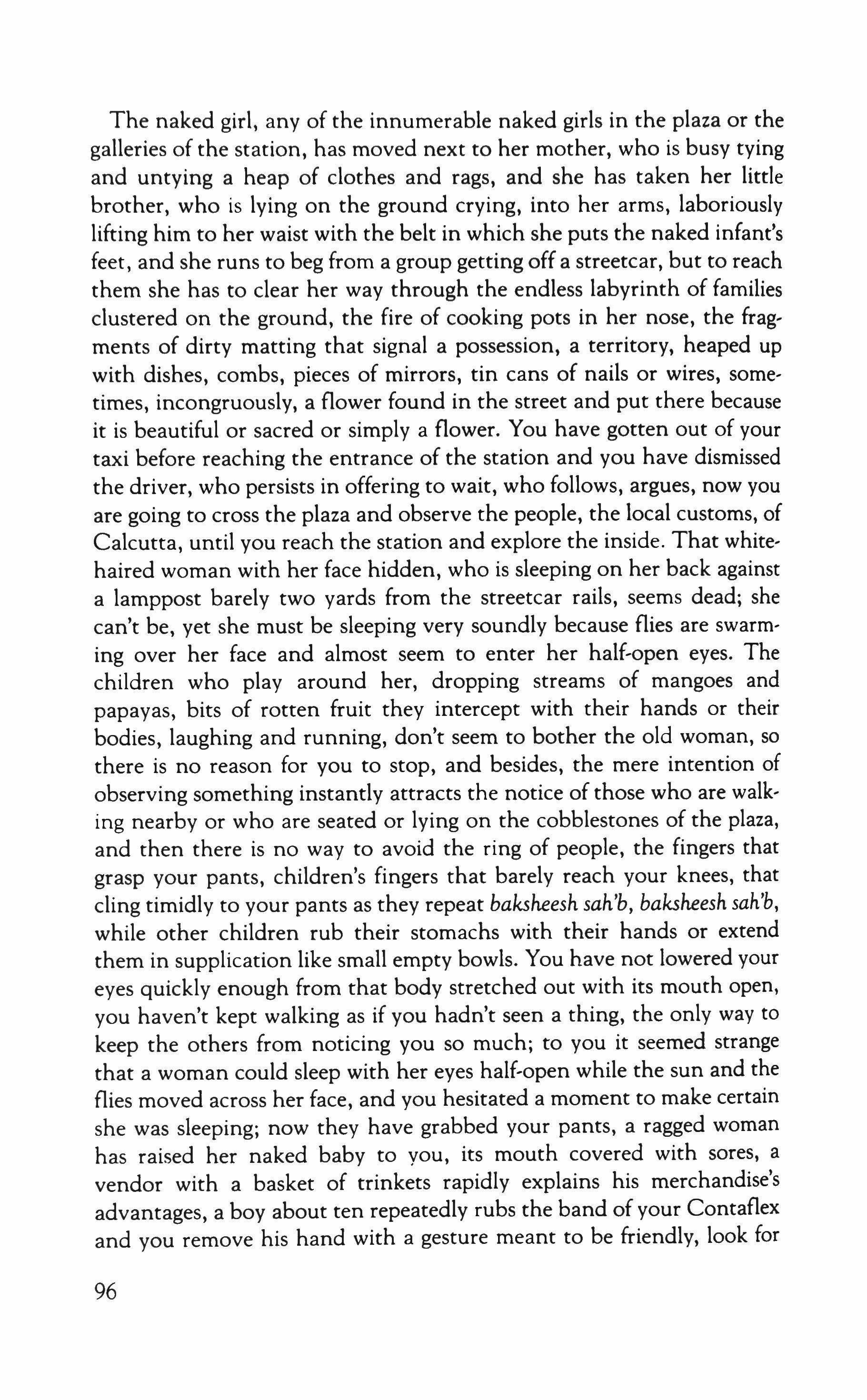
The naked girl, any of the innumerable naked girls in the plaza or the galleries of the station, has moved next to her mother, who is busy tying and untying a heap of clothes and rags, and she has taken her little brother, who is lying on the ground crying, into her arms, laboriously lifting him to her waist with the belt in which she puts the naked infant's feet, and she runs to beg from a group getting off a streetcar, but to reach them she has to clear her way through the endless labyrinth of families clustered on the ground, the fire of cooking pots in her nose, the fragments of dirty matting that signal a possession, a territory, heaped up with dishes, combs, pieces of mirrors, tin cans of nails or wires, sometimes, incongruously, a flower found in the street and put there because it is beautiful or sacred or simply a flower. You have gotten out of your taxi before reaching the entrance of the station and you have dismissed the driver, who persists in offering to wait, who follows, argues, now you are going to cross the plaza and observe the people, the local customs, of Calcutta, until you reach the station and explore the inside. That whitehaired woman with her face hidden, who is sleeping on her back against a lamppost barely two yards from the streetcar rails, seems dead; she can't be, yet she must be sleeping very soundly because flies are swarming over her face and almost seem to enter her half-open eyes. The children who play around her, dropping streams of mangoes and papayas, bits of rotten fruit they intercept with their hands or their bodies, laughing and running, don't seem to bother the old woman, so there is no reason for you to stop, and besides, the mere intention of observing something instantly attracts the notice of those who are walking nearby or who are seated or lying on the cobblestones of the plaza, and then there is no way to avoid the ring of people, the fingers that grasp your pants, children's fingers that barely reach your knees, that cling timidly to your pants as they repeat baksheesh sah'b, baksheesh sah'b, while other children rub their stomachs with their hands or extend them in supplication like small empty bowls. You have not lowered your eyes quickly enough from that body stretched out with its mouth open, you haven't kept walking as if you hadn't seen a thing, the only way to keep the others from noticing you so much; to you it seemed strange that a woman could sleep with her eyes half-open while the sun and the flies moved across her face, and you hesitated a moment to make certain she was sleeping; now they have grabbed your pants, a ragged woman has raised her naked baby to you, its mouth covered with sores, a vendor with a basket of trinkets rapidly explains his merchandise's advantages, a boy about ten repeatedly rubs the band of your Contaflex and you remove his hand with a gesture meant to be friendly, look for
96

money in your pockets, give it to the smallest ones so that they will let go of your pants, you succeed in escaping from the ring and you con' tinue across the plaza; perhaps only at that moment you realize that these thousands of families, this multitude walking or lying on the ground, are not in the plaza the same way that you or someone else might be in a plaza in his country-they live in the plaza, they are the population of the plaza, they live, sleep, eat, get sick and die in this plaza, beneath this indifferent cloudless sky, in this time without future because there is no hope. You have entered hell with only five rupees, now you suspect that the woman was dead and that the playing children, throwing bits of mango, knew that the woman was dead, and that a truck will come from town to take her away when someone bothers to tell the policeman directing traffic at the entrance to the plaza. Murray's Guide was quite right: the scene is picturesque.
The mother nursing the smallest of her five children has begun to cut up the vegetable her husband found between two wagons on the bridge. The naked girl returns with her brother on her arm and sets him on the ground next to his mother; she is tired, she wants to eat and sleep, she has not brought any money, she knows her mother will not say any' thing, because only rarely does she bring any home, and soon she is distracted by her brothers' games, what is going on in other circles, around other pots and other fires. The family circles partially break when someone enters to trade or beg or run a paid errand, but someone always remains, someone always guards the place on the plaza where the family lives, because if they abandon it for a minute they lose it forever, another circle will split in two, a young couple with their children will break away from their parents to claim this new territory and quickly install there their heap of rags, of scraps. Thus these least privileged ones adapt to living beside the rails where death passes every three minutes, or on the perimeter of the plaza, where the traffic that comes and goes from the bridge passes, at the edge of the road full of trucks and cars.
You have tried to calculate the number of people who live seated or stretched out on Howrah Plaza, but it is difficult in this heat that clouds the eyes, and these children who keep arriving from everywhere to beg from you, and then, to think, people living It is best to avoid the largest groups, smiling vaguely at some big-bellied child who raises his enormous black eyes in supplication, and at last you reach one of the entrances of Howrah Station, fleeing the sun to lose yourself in the vast somber hall; it is only when your shoe barely misses a woman's hand that you realize that nothing has changed, that the hall continues the world of the plaza, that the floor is occupied by a silent or vociferous
97
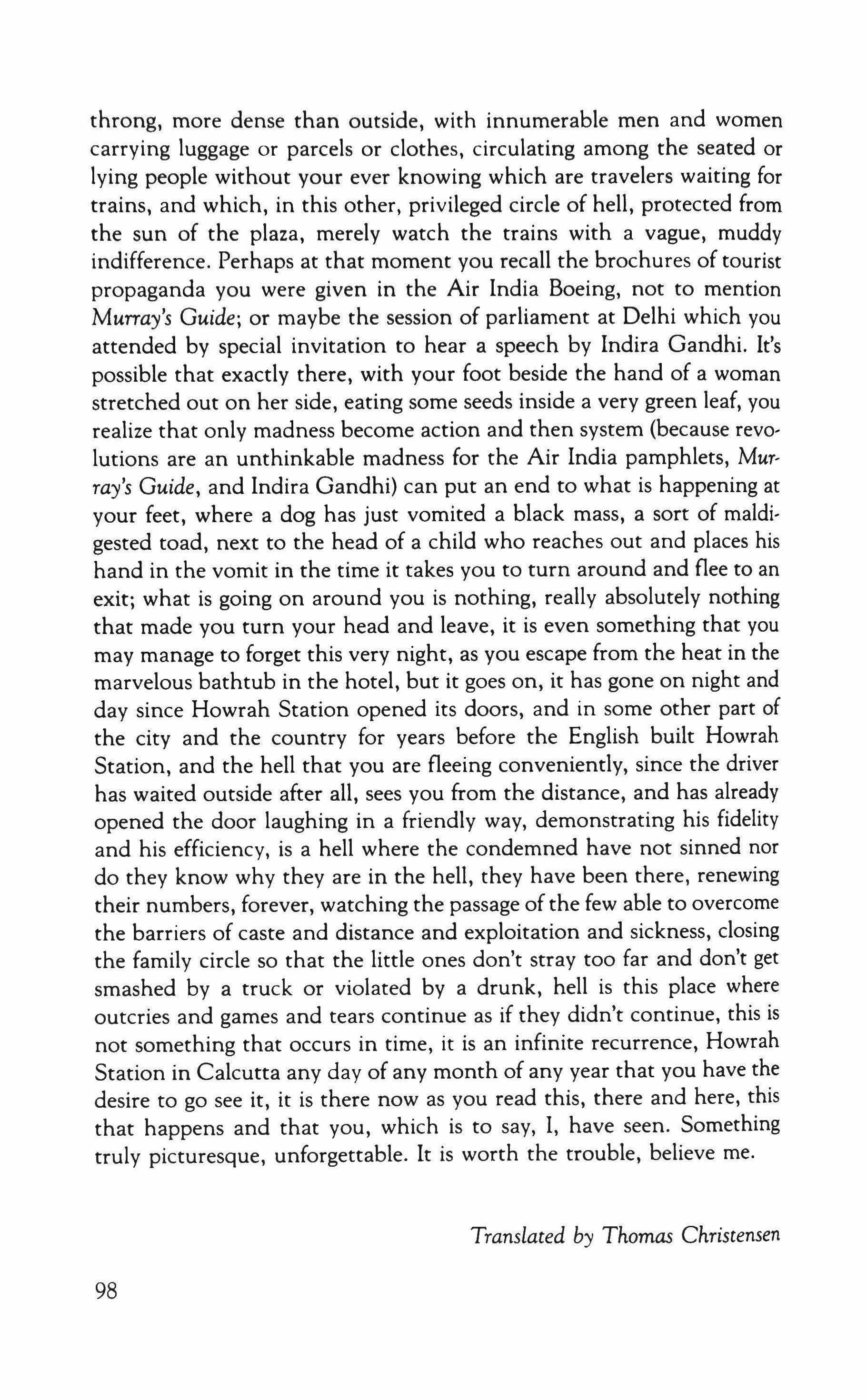
throng, more dense than outside, with innumerable men and women carrying luggage or parcels or clothes, circulating among the seated or lying people without your ever knowing which are travelers waiting for trains, and which, in this other, privileged circle of hell, protected from the sun of the plaza, merely watch the trains with a vague, muddy indifference. Perhaps at that moment you recall the brochures of tourist propaganda you were given in the Air India Boeing, not to mention Murray's Guide; or maybe the session of parliament at Delhi which you attended by special invitation to hear a speech by Indira Gandhi. It's possible that exactly there, with your foot beside the hand of a woman stretched out on her side, eating some seeds inside a very green leaf, you realize that only madness become action and then system (because revolutions are an unthinkable madness for the Air India pamphlets, Murray's Guide, and Indira Gandhi) can put an end to what is happening at your feet, where a dog has just vomited a black mass, a sort of maldigested toad, next to the head of a child who reaches out and places his hand in the vomit in the time it takes you to turn around and flee to an exit; what is going on around you is nothing, really absolutely nothing that made you turn your head and leave, it is even something that you may manage to forget this very night, as you escape from the heat in the marvelous bathtub in the hotel, but it goes on, it has gone on night and day since Howrah Station opened its doors, and in some other part of the city and the country for years before the English built Howrah Station, and the hell that you are fleeing conveniently, since the driver has waited outside after all, sees you from the distance, and has already opened the door laughing in a friendly way, demonstrating his fidelity and his efficiency, is a hell where the condemned have not sinned nor do they know why they are in the hell, they have been there, renewing their numbers, forever, watching the passage of the few able to overcome the barriers of caste and distance and exploitation and sickness, closing the family circle so that the little ones don't stray too far and don't get smashed by a truck or violated by a drunk, hell is this place where outcries and games and tears continue as if they didn't continue, this is not something that occurs in time, it is an infinite recurrence, Howrah Station in Calcutta any day of any month of any year that you have the desire to go see it, it is there now as you read this, there and here, this that happens and that you, which is to say, I, have seen. Something truly picturesque, unforgettable. It is worth the trouble, believe me.
Translated by Thomas Christensen
98
The Birds of Arizona
Robert L. Watson
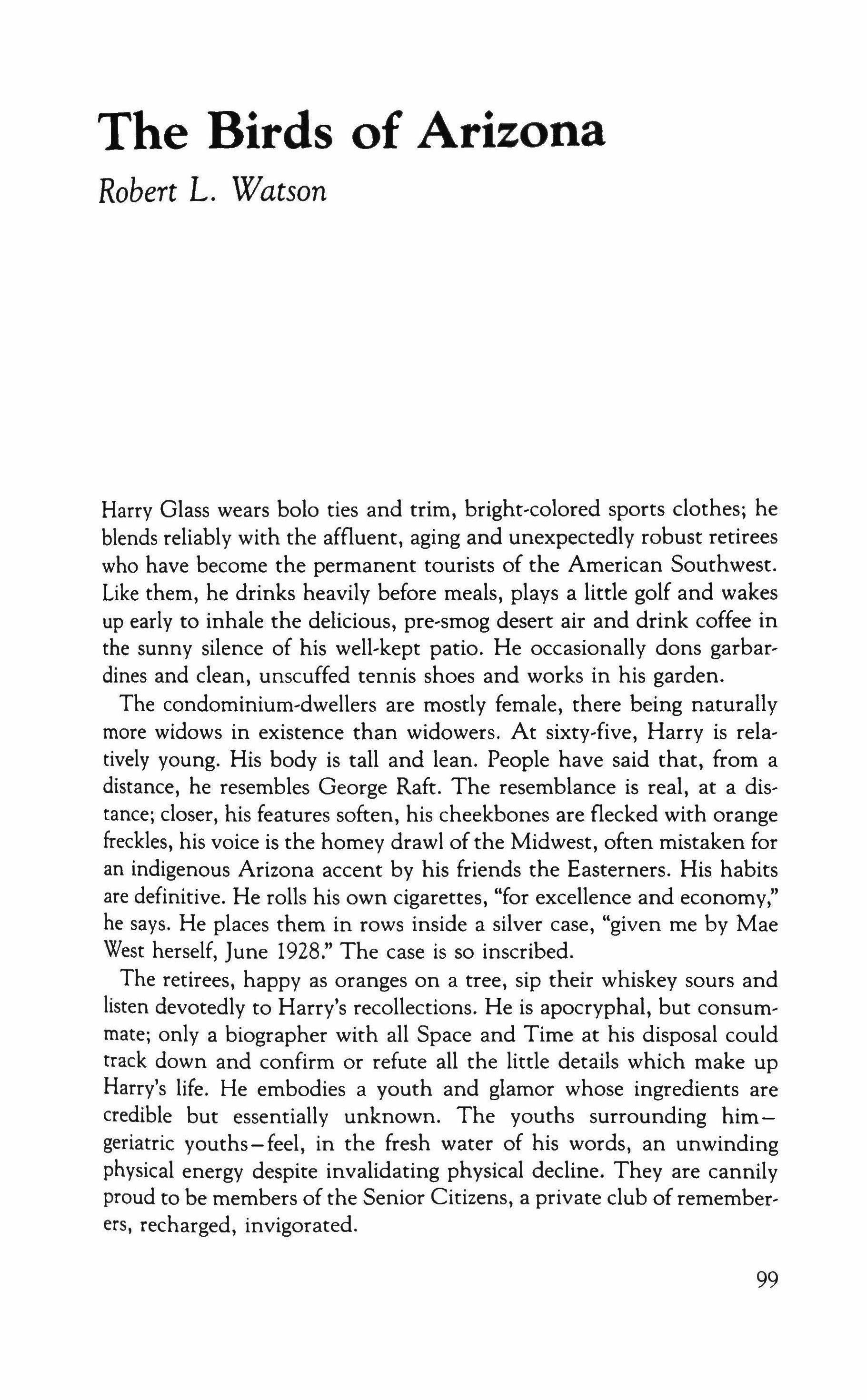
Harry Glass wears bolo ties and trim, bright-colored sports clothes; he blends reliably with the affluent, aging and unexpectedly robust retirees who have become the permanent tourists of the American Southwest. Like them, he drinks heavily before meals, plays a little golf and wakes up early to inhale the delicious, pre-smog desert air and drink coffee in the sunny silence of his well-kept patio. He occasionally dons garbardines and clean, unscuffed tennis shoes and works in his garden.
The condominium-dwellers are mostly female, there being naturally more widows in existence than widowers. At sixty-five, Harry is relatively young. His body is tall and lean. People have said that, from a distance, he resembles George Raft. The resemblance is real, at a distance; closer, his features soften, his cheekbones are flecked with orange freckles, his voice is the homey drawl of the Midwest, often mistaken for an indigenous Arizona accent by his friends the Easterners. His habits are definitive. He rolls his own cigarettes, "for excellence and economy," he says. He places them in rows inside a silver case, "given me by Mae West herself, June 1928." The case is so inscribed.
The retirees, happy as oranges on a tree, sip their whiskey sours and listen devotedly to Harry's recollections. He is apocryphal, but consummate; only a biographer with all Space and Time at his disposal could track down and confirm or refute all the little details which make up Harry's life. He embodies a youth and glamor whose ingredients are credible but essentially unknown. The youths surrounding himgeriatric youths-feel, in the fresh water of his words, an unwinding physical energy despite invalidating physical decline. They are cannily proud to be members of the Senior Citizens, a private club of rememberers, recharged, invigorated.
99
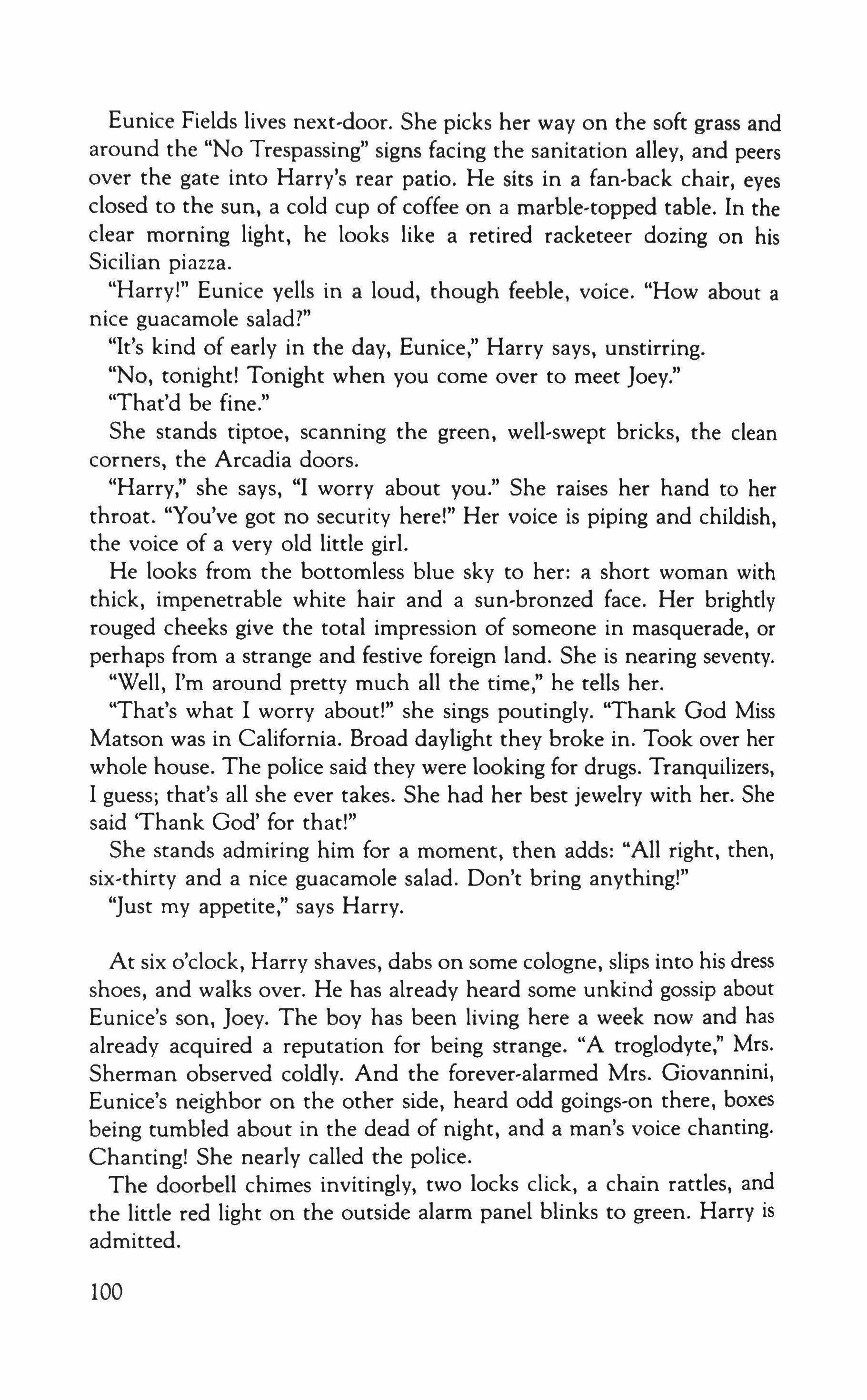
Eunice Fields lives next-door. She picks her way on the soft grass and around the "No Trespassing" signs facing the sanitation alley, and peers over the gate into Harry's rear patio. He sits in a fan-back chair, eyes closed to the sun, a cold cup of coffee on a marble-topped table. In the clear morning light, he looks like a retired racketeer dozing on his Sicilian piazza.
"Harry!" Eunice yells in a loud, though feeble, voice. "How about a nice guacamole salad?"
"It's kind of early in the day, Eunice," Harry says, unstirring.
"No, tonight! Tonight when you come over to meet Joey."
"That'd be fine."
She stands tiptoe, scanning the green, well-swept bricks, the clean corners, the Arcadia doors.
"Harry," she says, "I worry about you." She raises her hand to her throat. "You've got no security here!" Her voice is piping and childish, the voice of a very old little girl.
He looks from the bottomless blue sky to her: a short woman with thick, impenetrable white hair and a sun-bronzed face. Her brightly rouged cheeks give the total impression of someone in masquerade, or perhaps from a strange and festive foreign land. She is nearing seventy.
"Well, I'm around pretty much all the time," he tells her.
"That's what I worry about!" she sings poutingly. "Thank God Miss Matson was in California. Broad daylight they broke in. Took over her whole house. The police said they were looking for drugs. Tranquilizers, I guess; that's all she ever takes. She had her best jewelry with her. She said 'Thank God' for that!"
She stands admiring him for a moment, then adds: "All right, then, six-thirty and a nice guacamole salad. Don't bring anything!"
"Just my appetite," says Harry.
At six o'clock, Harry shaves, dabs on some cologne, slips into his dress shoes, and walks over. He has already heard some unkind gossip about Eunice's son, Joey. The boy has been living here a week now and has already acquired a reputation for being strange. "A troglodyte," Mrs. Sherman observed coldly. And the forever-alarmed Mrs. Giovannini, Eunice's neighbor on the other side, heard odd goings-on there, boxes being tumbled about in the dead of night, and a man's voice chanting. Chanting! She nearly called the police.
The doorbell chimes invitingly, two locks click, a chain rattles, and the little red light on the outside alarm panel blinks to green. Harry is admitted. 100

The living room looks expensive and static as always. It is difficult to imagine the least puff of air disturbing its contents. Four metal tray tables, arrayed with linen napkins and silverware, stand around an enormous dun-white sofa. Above it hangs an oil painting depicting Mexican poverty.
"Harry! Come in and sit down!" Eugene calls out. "For God's sake, Eunice, turn off that damn TV!" Eunice's husband, slumped in his wheelchair, rolls himself smoothly across the carpet, hand extended. Eugene always shakes hands.
"Gene. You're looking well," Harry says, but he thinks: The Incredible Shrinking Man! Eugene seems to get smaller and smaller every day. No doubt he had once been hardy, even handsome; but now he seems to melt into his clothes. Harry could imagine Eunice rummaging through the hamper looking for his remains.
"Damn it, Harry, sit down and make yourself at home!" Eugene doesn't like his guests to stand. "How about a drink? Eunice, get Harry his usual!"
"Bourbon and soda," Harry reminds her.
"You men go ahead and gossip while I make the drinks," she shouts over her shoulder. She feels her way back into the kitchen.
Eugene Fields worked for many years as a collector and seller of rare books and manuscripts, and he likes to spend his dying days rerniniscing. Any topic of conversation-gardening, say, or space travel-will inevitably lead into a discussion of his own life and accomplishments.
"I understand I'm to meet Joey tonight," Harry says, seated.
Eugene frowns. "Six years at the college and now he's living back home. No ambition. Nowadays, everybody wants it soft, Harry."
He wags his finger.
"I was a real wheeler-dealer in my time, Harry. I didn't waste the clock sitting around home. Hell, when I was just starting out, I worked in a little bookshop no bigger than this room. It was run by a man named Cole. Did I ever tell you about Cole, Harry?" Wheelchair brake on, Eugene nestles down to a long and autobiographical conversation.
Harry crosses his legs. From time to time, he is happy to be seated before a long and utterly familiar monologue; it gives him the opportunity to think about other things. He stares just above Eugene's head where a bare-breasted Mexican woman washes clothes in a turquoise stream, her quick-sketch face without discernible expression, her naked children frolicking in the sun.
Eunice, whose power of overhearing conversations conducted in her
101
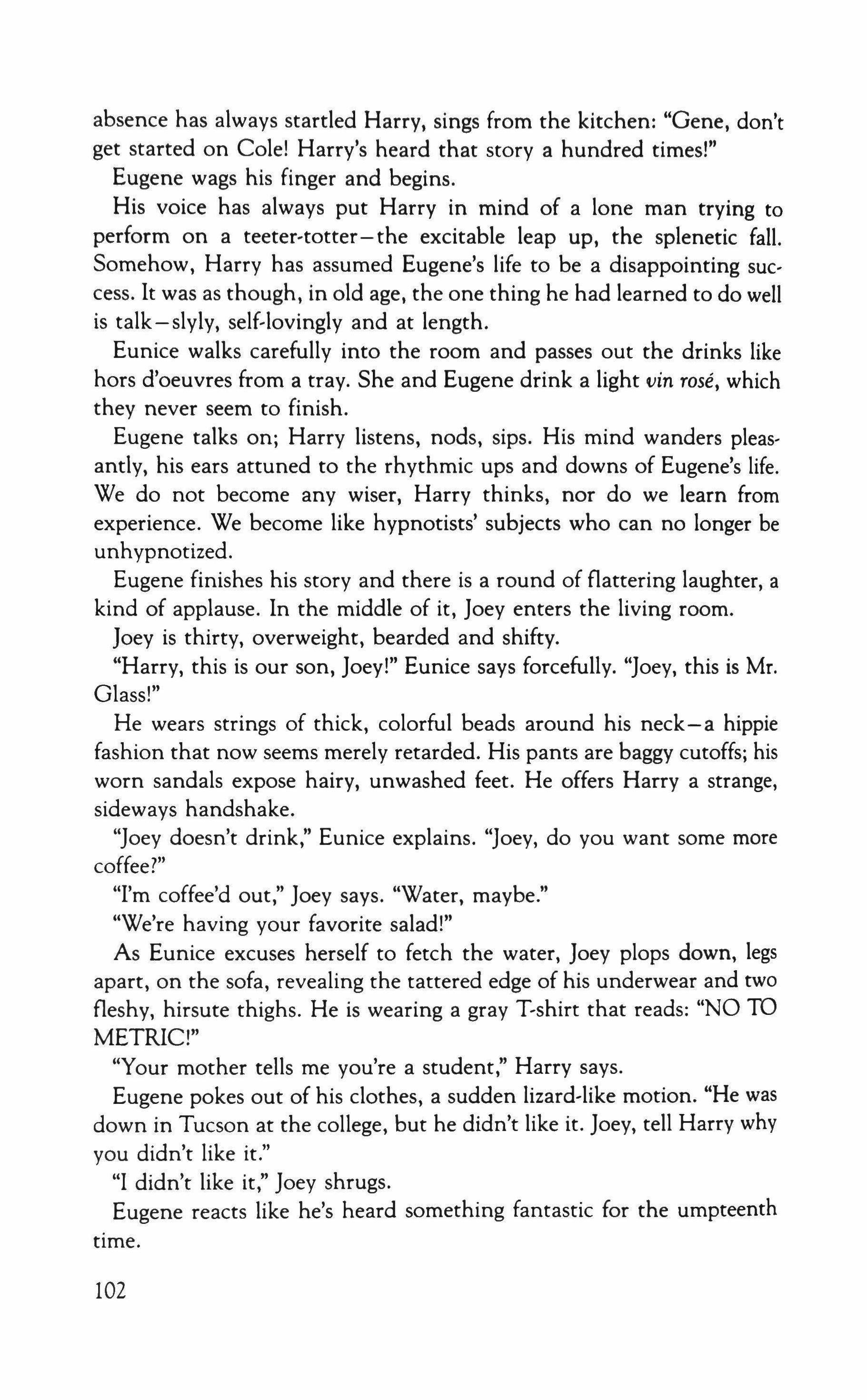
absence has always startled Harry, sings from the kitchen: "Gene, don't get started on Cole! Harry's heard that story a hundred times!"
Eugene wags his finger and begins.
His voice has always put Harry in mind of a lone man trying to perform on a teeter-totter-the excitable leap up, the splenetic fall. Somehow, Harry has assumed Eugene's life to be a disappointing success. It was as though, in old age, the one thing he had learned to do well is talk - slyly, self-lovingly and at length.
Eunice walks carefully into the room and passes out the drinks like hors d'oeuvres from a tray. She and Eugene drink a light vin rose, which they never seem to finish.
Eugene talks on; Harry listens, nods, sips. His mind wanders pleasantly, his ears attuned to the rhythmic ups and downs of Eugene's life. We do not become any wiser, Harry thinks, nor do we learn from experience. We become like hypnotists' subjects who can no longer be unhypnotized.
Eugene finishes his story and there is a round of flattering laughter, a kind of applause. In the middle of it, joey enters the living room.
joey is thirty, overweight, bearded and shifty.
"Harry, this is our son, joey!" Eunice says forcefully. "joey, this is Mr. Glass!"
He wears strings of thick, colorful beads around his neck-a hippie fashion that now seems merely retarded. His pants are baggy cutoffs; his worn sandals expose hairy, unwashed feet. He offers Harry a strange, sideways handshake.
"joey doesn't drink," Eunice explains. "joey, do you want some more coffee?"
"I'm coffee'd out," joey says. "Water, maybe."
"We're having your favorite salad!"
As Eunice excuses herself to fetch the water, joey plops down, legs apart, on the sofa, revealing the tattered edge of his underwear and two fleshy, hirsute thighs. He is wearing a gray T-shirt that reads: "NO 1D METRIC!"
"Your mother tells me you're a student," Harry says.
Eugene pokes out of his clothes, a sudden lizard-like motion. "He was down in Tucson at the college, but he didn't like it. joey, tell Harry why you didn't like it."
"I didn't like it," joey shrugs.
Eugene reacts like he's heard something fantastic for the umpteenth time.
102
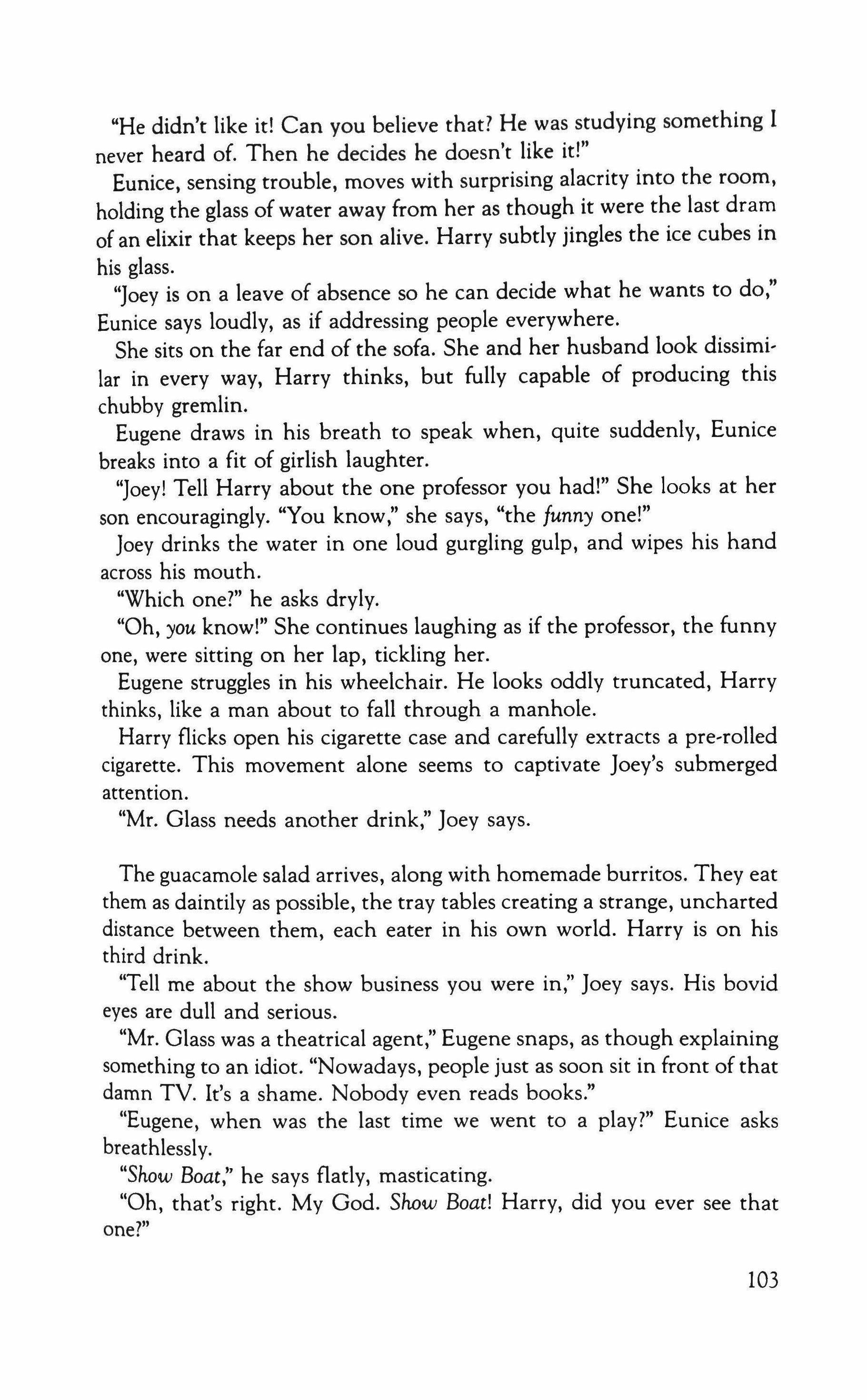
"He didn't like it! Can you believe that? He was studying something I never heard of. Then he decides he doesn't like it!"
Eunice, sensing trouble, moves with surprising alacrity into the room, holding the glass of water away from her as though it were the last dram of an elixir that keeps her son alive. Harry subtly jingles the ice cubes in his glass.
"Joey is on a leave of absence so he can decide what he wants to do," Eunice says loudly, as if addressing people everywhere.
She sits on the far end of the sofa. She and her husband look dissimilar in every way, Harry thinks, but fully capable of producing this chubby gremlin.
Eugene draws in his breath to speak when, quite suddenly, Eunice breaks into a fit of girlish laughter.
"Joey! Tell Harry about the one professor you had!" She looks at her son encouragingly. "You know," she says, "the funny one!"
Joey drinks the water in one loud gurgling gulp, and wipes his hand across his mouth.
"Which one!" he asks dryly.
"Oh, you know!" She continues laughing as if the professor, the funny one, were sitting on her lap, tickling her.
Eugene struggles in his wheelchair. He looks oddly truncated, Harry thinks, like a man about to fall through a manhole.
Harry flicks open his cigarette case and carefully extracts a pre-rolled cigarette. This movement alone seems to captivate Joey's submerged attention.
"Mr. Glass needs another drink," Joey says.
The guacamole salad arrives, along with homemade burritos. They eat them as daintily as possible, the tray tables creating a strange, uncharted distance between them, each eater in his own world. Harry is on his third drink.
"Tell me about the show business you were in," Joey says. His bovid eyes are dull and serious.
"Mr. Glass was a theatrical agent," Eugene snaps, as though explaining something to an idiot. "Nowadays, people just as soon sit in front of that damn TV. It's a shame. Nobody even reads books."
"Eugene, when was the last time we went to a play!" Eunice asks breathlessly.
"Show Boat," he says flatly, masticating.
"Oh, that's right. My God. Show Boat! Harry, did you ever see that one!"
103
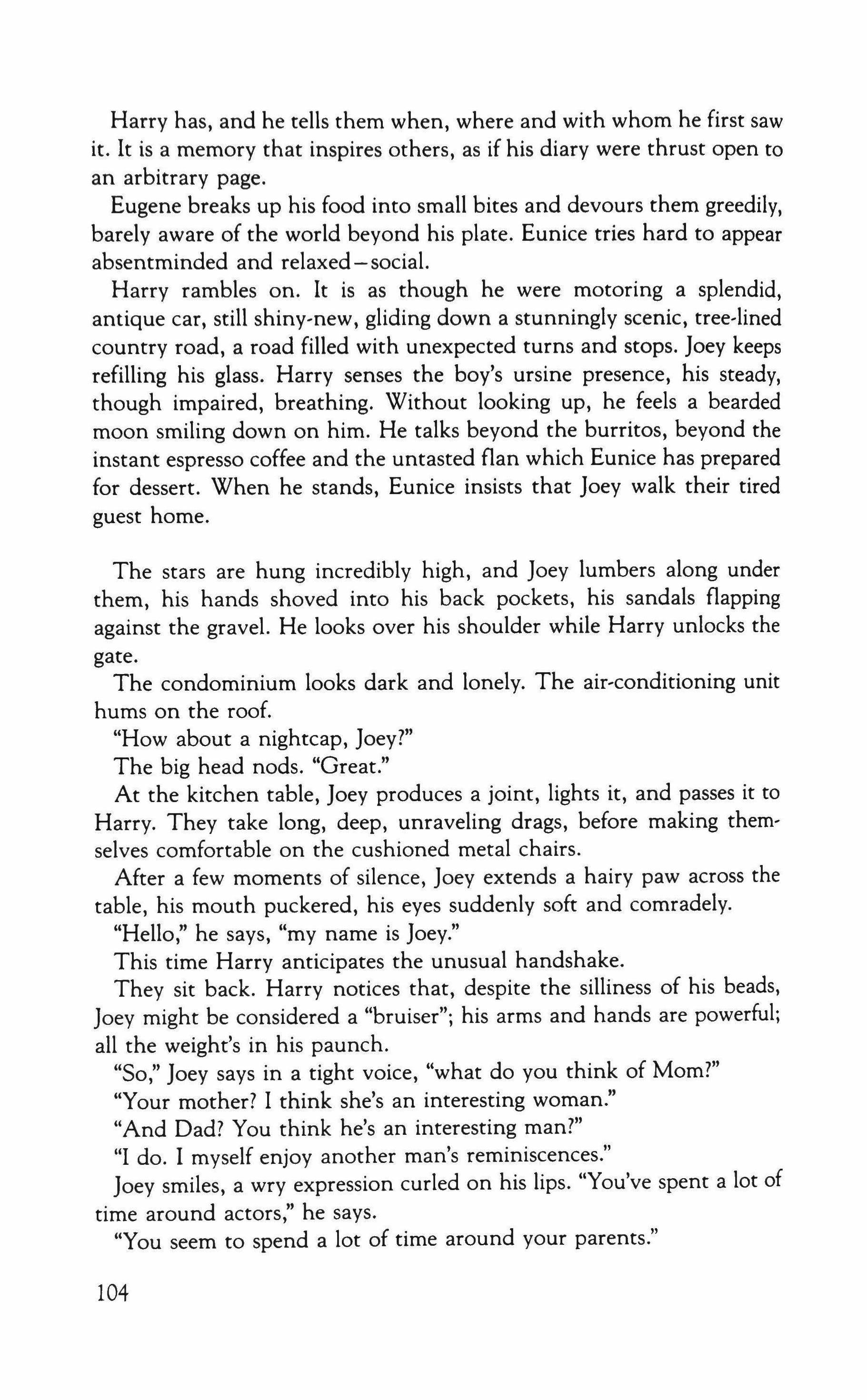
Harry has, and he tells them when, where and with whom he first saw it. It is a memory that inspires others, as if his diary were thrust open to an arbitrary page.
Eugene breaks up his food into small bites and devours them greedily, barely aware of the world beyond his plate. Eunice tries hard to appear absentminded and relaxed - social.
Harry rambles on. It is as though he were motoring a splendid, antique car, still shiny-new, gliding down a stunningly scenic, tree-lined country road, a road filled with unexpected turns and stops. Joey keeps refilling his glass. Harry senses the boy's ursine presence, his steady, though impaired, breathing. Without looking up, he feels a bearded moon smiling down on him. He talks beyond the burritos, beyond the instant espresso coffee and the unrasted flan which Eunice has prepared for dessert. When he stands, Eunice insists that Joey walk their tired guest home.
The stars are hung incredibly high, and Joey lumbers along under them, his hands shoved into his back pockets, his sandals flapping against the gravel. He looks over his shoulder while Harry unlocks the gate.
The condominium looks dark and lonely. The air-conditioning unit hums on the roof.
"How about a nightcap, Joey?"
The big head nods. "Great."
At the kitchen table, Joey produces a joint, lights it, and passes it to Harry. They take long, deep, unraveling drags, before making themselves comfortable on the cushioned metal chairs.
After a few moments of silence, Joey extends a hairy paw across the table, his mouth puckered, his eyes suddenly soft and comradely.
"Hello," he says, "my name is Joey."
This time Harry anticipates the unusual handshake.
They sit back. Harry notices that, despite the silliness of his beads, Joey might be considered a "bruiser"; his arms and hands are powerful; all the weight's in his paunch.
"So," Joey says in a tight voice, "what do you think of Mom?"
"Your mother? I think she's an interesting woman."
"And Dad? You think he's an interesting man?"
"I do. I myself enjoy another man's reminiscences."
Joey smiles, a wry expression curled on his lips. "You've spent a lot of time around actors," he says.
"You seem to spend a lot of time around your parents."
104

Joey takes another long drag and then scratches his hand.
"You know where this stuff comes in?" he says. "I mean, in terms of capitalism? Number Three. Number One is General Motors, Number Two is Exxon, and Number Three is marijuana." He pronounces the word in a strong Spanish accent.
"I can take it or leave it," Harry remarks. "I prefer alcohol."
"Yeah. Man, they'd flip out if they knew you and me was tokin' up next door. Will the real Harry Glass please stand up?"
Harry crosses his legs and picks a tiny piece of flufffrom his trousers. "I am a man of the world," he says, and they both laugh.
"I'm a naturalist," Joey says. "I see things naturally."
Harry lights a cigarette. He looks like a shrewd, misplaced gambler in the kitchen light.
"I see you as marooned here," he says seriously.
A cricket, somewhere behind the refrigerator, calls out to another in the living room, and the two of them begin transmitting loud, musical, probing sounds.
Joey shrugs. "My ship crashed," he says. "I'm a total alien. What you see before you is the last of the flower children."
"I'm surprised they're not pushing you to get a job."
"Yeah. Mom reads me the want ads. 'Administrative Assistant.' She thinks I'd make a great Administrative Assistant."
He shakes his head slowly, saddened by his mother's ambition. "'All the lonely people; where do they all come from?'"
"So what do you do?
"Me? I eat from a little card table in my room. I sit by the pool and watch the Golden Oldies stickin' their toes in the water. I'm scary stuff."
He makes a horror mask and smiles.
"Have friends?"
"Some. See, I'm the Bad Bear that's crashed the picnic, nuzzlin' all the food. I'm waitin' for 'em to start throwin' rocks."
"You seem likeable enough." Harry means "harmless."
Joey produces a small pair of tweezers and relights the joint. It is already the size of a fingernail clipping. He sucks out the last of its smoke. The crickets sing loudly to each other from their separate worlds.
"They are, like, super-interested in you, Harry."
"That so?"
"Oh yeah. You've got the only pad around here without bars. You're a jazzy guy, kind of dropped out. You got this glamorous background. It turns on the TV in their heads, right? And-you're a bachelor. They bait their hooks well around here."
105

"I admire your candor."
Joey's eyes have a twinkling, pixieish quality; Harry imagines him a bear-sized boy lunging disastrously around Eunice's airless living room trying to capture an elusive Tinker Bell. Of course he is a likable fool, Harry thinks. Of course no one here likes him
He walks him outside. Joey carries his sandals in the back pockets of his cutoffs, his large feet ape-like on the still-warm bricks.
"Listen, Harry," he says, "we ought to pal around a little, you know? Compare theories of the universe."
"My pleasure," Harry says, patting his arm.
"See you in church, man!" Joey walks away, his bare feet crunching the gravel in the dark.
Harry locks the gate.
The universe is a palace of stars, hung ice-cold in the night. Harry goes inside, to the living room, and turns on the TV. He stands in front of it for a while, hands in pockets, slightly slouched. The television is a receptacle of strange new images-contemporary images Harry feels he ought to have predicted ten, twenty, thirty years ago. He makes himself another drink and steps back outside to the patio. The surrounding lawns are alive with crickets, their clear harmonic whistling the music of dark flowers and shrubs, silhouetted palms and cacti, empty walks, low lightless buildings. With a sudden whoosh from everywhere, the automatic sprinklers turn on.
On late Saturday mornings, Harry Glass accompanies Miss Dorothy Matson to the pool where, over a pitcher of martinis, they watch the flickerings of turquoise light through sunglasses. They sit alone near the shallow end, Harry dressed in slacks and an open shirt, Dorothy in a bathing suit and white terry-cloth robe. The glass pitcher, some books, and a large bottle of suntan oil rest between them on a glass table. Dorothy Matson is wearing binoculars.
"Not a soul here but us," Dorothy remarks. "Sometimes this pool is the loneliest place in the world. It's a delicious feeling, isn't it?"
Harry removes two olives from a small jar and drops them into the glasses; pours.
"Eunice took a dip this morning," he says. "She's always up at the crack of dawn. Cheers."
"Cheers!"
Dorothy sips her drink and crosses her legs; she dangles her sandal playfully from her foot. At fifty-nine, her body is attractive and youthful. It is her dark sunglasses, her cropped black hair, her large clanging
106
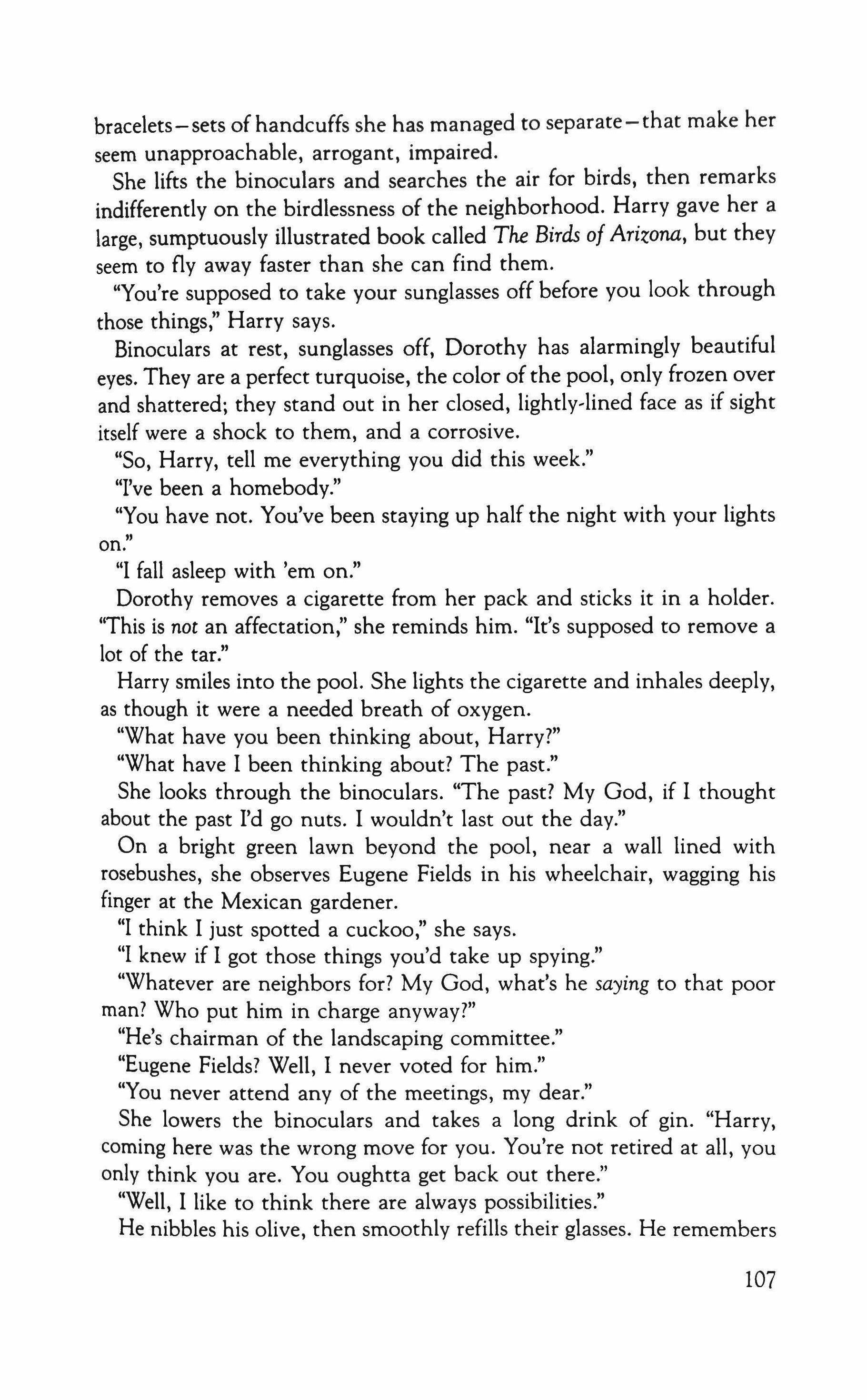
bracelets-sets of handcuffs she has managed to separate-that make her seem unapproachable, arrogant, impaired.
She lifts the binoculars and searches the air for birds, then remarks indifferently on the birdlessness of the neighborhood. Harry gave her a large, sumptuously illustrated book called The Birds of Arizona, but they seem to flyaway faster than she can find them.
"You're supposed to take your sunglasses off before you look through those things," Harry says.
Binoculars at rest, sunglasses off, Dorothy has alarmingly beautiful eyes. They are a perfect turquoise, the color ofthe pool, only frozen over and shattered; they stand out in her closed, lightly-lined face as if sight itself were a shock to them, and a corrosive.
"So, Harry, tell me everything you did this week."
"I've been a homebody."
"You have not. You've been staying up half the night with your lights on."
"I fall asleep with 'em on."
Dorothy removes a cigarette from her pack and sticks it in a holder. "This is not an affectation," she reminds him. "It's supposed to remove a lot of the tar."
Harry smiles into the pool. She lights the cigarette and inhales deeply, as though it were a needed breath of oxygen.
"What have you been thinking about, Harry?"
"What have I been thinking about? The past."
She looks through the binoculars. "The past? My God, if I thought about the past I'd go nuts. I wouldn't last out the day."
On a bright green lawn beyond the pool, near a wall lined with rosebushes, she observes Eugene Fields in his wheelchair, wagging his finger at the Mexican gardener.
"I think I just spotted a cuckoo," she says.
"I knew if I got those things you'd take up spying."
"Whatever are neighbors for? My God, what's he saying to that poor man? Who put him in charge anyway?"
"He's chairman of the landscaping committee."
"Eugene Fields? Well, I never voted for him."
"You never attend any of the meetings, my dear."
She lowers the binoculars and takes a long drink of gin. "Harry, coming here was the wrong move for you. You're not retired at all, you only think you are. You oughtta get back out there."
"Well, I like to think there are always possibilities."
He nibbles his olive, then smoothly refills their glasses. He remembers
107
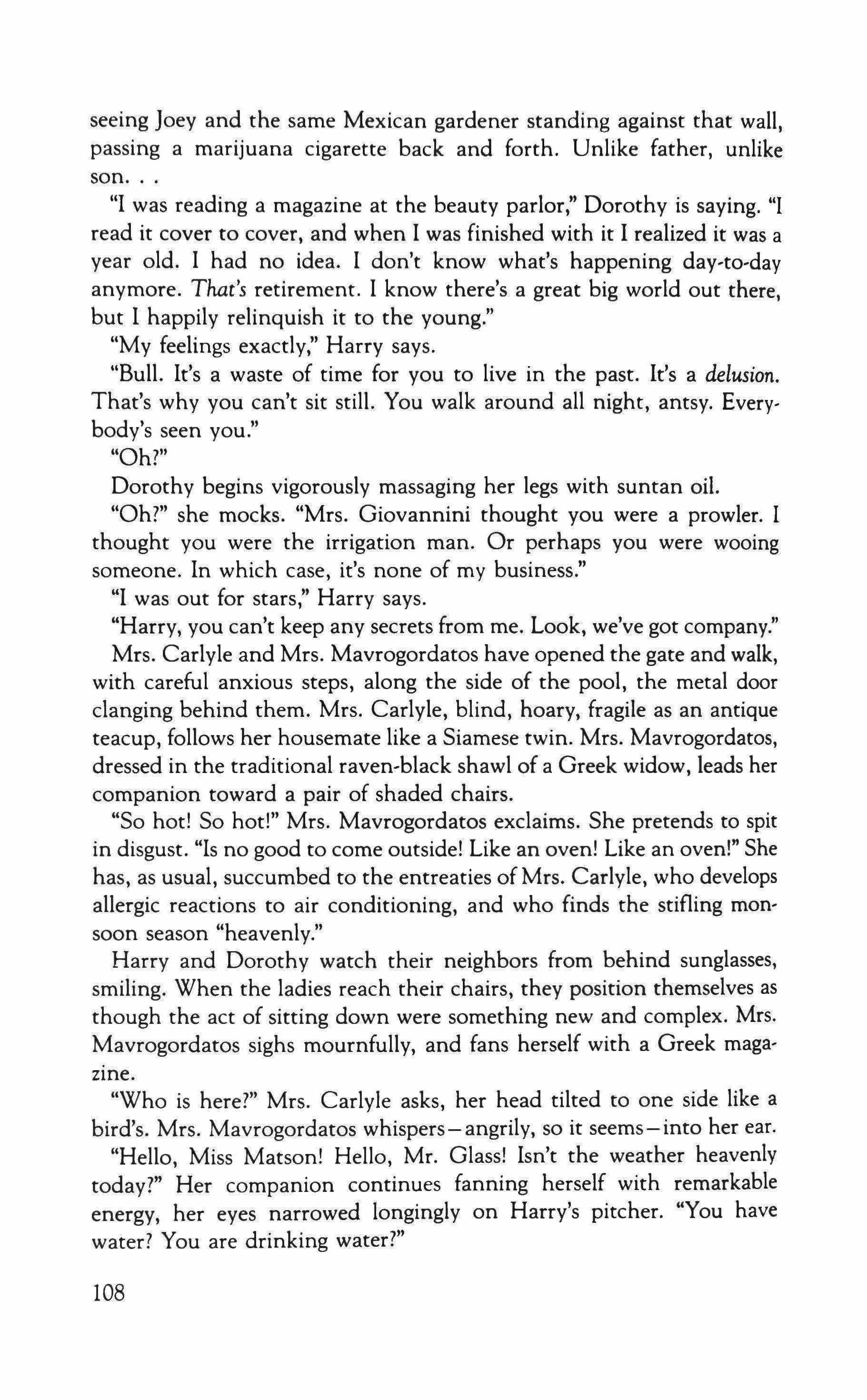
seeing Joey and the same Mexican gardener standing against that wall, passing a marijuana cigarette back and forth. Unlike father, unlike son
"I was reading a magazine at the beauty parlor," Dorothy is saying. "I read it cover to cover, and when I was finished with it I realized it was a year old. I had no idea. I don't know what's happening day-to-day anymore. That's retirement. I know there's a great big world out there, but I happily relinquish it to the young."
"My feelings exactly," Harry says.
"Bull. It's a waste of time for you to live in the past. It's a delusion. That's why you can't sit still. You walk around all night, antsy. Everybody's seen you."
"Oh?"
Dorothy begins vigorously massaging her legs with suntan oil.
"Oh?" she mocks. "Mrs. Giovannini thought you were a prowler. I thought you were the irrigation man. Or perhaps you were wooing someone. In which case, it's none of my business."
"I was out for stars," Harry says.
"Harry, you can't keep any secrets from me. Look, we've got company."
Mrs. Carlyle and Mrs. Mavrogordatos have opened the gate and walk, with careful anxious steps, along the side of the pool, the metal door clanging behind them. Mrs. Carlyle, blind, hoary, fragile as an antique teacup, follows her housemate like a Siamese twin. Mrs. Mavrogordatos, dressed in the traditional raven-black shawl of a Greek widow, leads her companion toward a pair of shaded chairs.
"So hot! So hot!" Mrs. Mavrogordatos exclaims. She pretends to spit in disgust. "Is no good to come outside! Like an oven! Like an oven!" She has, as usual, succumbed to the entreaties of Mrs. Carlyle, who develops allergic reactions to air conditioning, and who finds the stifling monsoon season "heavenly."
Harry and Dorothy watch their neighbors from behind sunglasses, smiling. When the ladies reach their chairs, they position themselves as though the act of sitting down were something new and complex. Mrs. Mavrogordatos sighs mournfully, and fans herself with a Greek magazine.
"Who is here?" Mrs. Carlyle asks, her head tilted to one side like a bird's. Mrs. Mavrogordatos whispers-angrily, so it seems-into her ear.
"Hello, Miss Matson! Hello, Mr. Glass! Isn't the weather heavenly today?" Her companion continues fanning herself with remarkable energy, her eyes narrowed longingly on Harry's pitcher. "You have water? You are drinking water?"
108

"It's gin, Mrs. Mavro," Dorothy says. "Martinis."
Mrs. Mavrogordatos is cruelly disappointed. "Never! No! Not for me! Oh, so hot, so hot!" With surprising muscularity, she accelerates her fanning.
"An odd couple," Dorothy says, delighted. "See, you'll never know who you'll spend your last days with!"
She looks through her binoculars. "Now what?"
The Mexican gardener has thrown his shears to the ground and is stalking back to his truck. Eugene wheels after him, shaking a fist. A large cactus wren pauses with abrupt curiosity on the wall surrounding the pool, then flies away unnoticed.
"So hot, so hot!" Mrs. Mavrogordatos moans. "Is no good to be here!"
"I can tell you everything about everybody," Dorothy says. "I've got the dope on everyone."
"I expect you do. You'd make a wonderful spy."
"I'm a good watcher. And a good listener. Gossip, Harry, is life's last hobby. The mainstay of retirement. Without it, you might as well cash in your chips."
The Mexican slams the cab door and drives off, gesticulating into the rearview mirror. His tires squeal around the curve.
"For example," Dorothy is saying, "I can tell you everything you want to know about your pal, Joey." She glances at Harry coyly. "You two are pals, I believe?"
"A very unorthodox young man."
"Well, right now I'm looking at some very unorthodox flora. See?" She hands Harry the binoculars.
"Along that wall, near the Hospitality Room. You know what that is, Harry? That is marijuana. Check it out. Oh yes, the gardener knows all about them, too. Joey's probably selling the stuff all over Phoenix. He'll probably end up buying this place. My God, I hope he does. And you tell me his father is in charge of landscaping? What a goddamn joke this place is. I love it!"
Harry, genuinely astonished and impressed by Dorothy's surveillance, sips passively on his drink.
She stands up and, throwing off her robe, steps tentatively into the pool. Harry admires her figure, her girlish slimness, the healthy tan. She moves into the water until it reaches her waist; then stands, hands resting gently on her hips, and searches the sky as if expecting a large friendly bird to sail over, wings extended.
"Harry! If I pretend to drown, would you jump in and save me?"
109
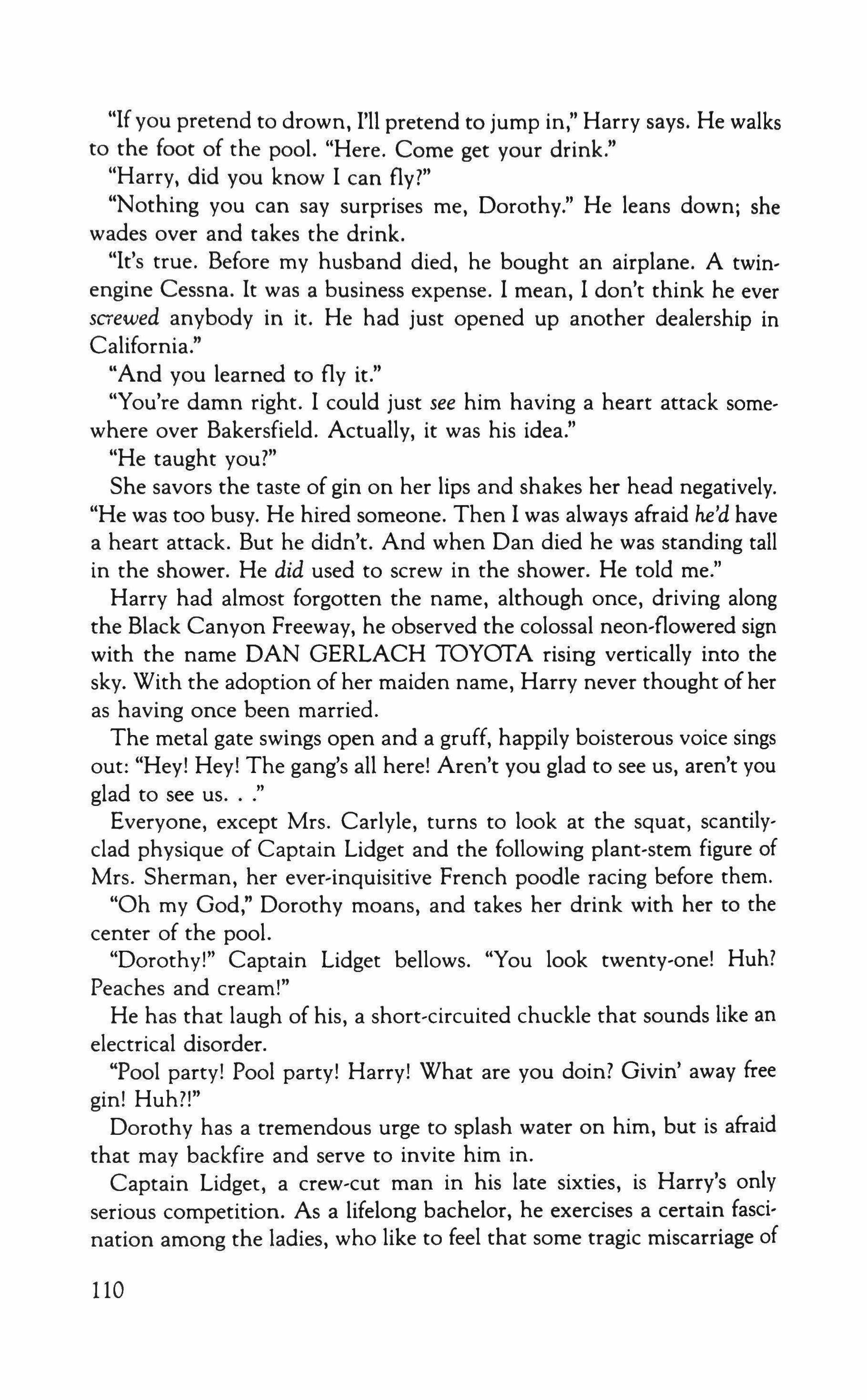
"If you pretend to drown, I'll pretend to jump in," Harry says. He walks to the foot of the pool. "Here. Come get your drink."
"Harry, did you know I can fly?"
"Nothing you can say surprises me, Dorothy." He leans down; she wades over and takes the drink.
"It's true. Before my husband died, he bought an airplane. A twinengine Cessna. It was a business expense. I mean, I don't think he ever screwed anybody in it. He had just opened up another dealership in California."
"And you learned to fly it."
"You're damn right. I could just see him having a heart attack somewhere over Bakersfield. Actually, it was his idea."
"He taught you?"
She savors the taste of gin on her lips and shakes her head negatively. "He was too busy. He hired someone. Then I was always afraid he'd have a heart attack. But he didn't. And when Dan died he was standing tall in the shower. He did used to screw in the shower. He told me."
Harry had almost forgotten the name, although once, driving along the Black Canyon Freeway, he observed the colossal neon-flowered sign with the name DAN GERLACH TOYOfA rising vertically into the sky. With the adoption of her maiden name, Harry never thought of her as having once been married.
The metal gate swings open and a gruff, happily boisterous voice sings out: "Hey! Hey! The gang's all here! Aren't you glad to see us, aren't you glad to see us. ."
Everyone, except Mrs. Carlyle, turns to look at the squat, scantilyclad physique of Captain Lidget and the following plant-stem figure of Mrs. Sherman, her ever-inquisitive French poodle racing before them.
"Oh my God," Dorothy moans, and takes her drink with her to the center of the pool.
"Dorothy!" Captain Lidget bellows. "You look twenty-one! Huh? Peaches and cream!"
He has that laugh of his, a short-circuited chuckle that sounds like an electrical disorder.
"Pool party! Pool party! Harry! What are you doin? Givin' away free gin! Huh?!"
Dorothy has a tremendous urge to splash water on him, but is afraid that may backfire and serve to invite him in.
Captain Lidget, a crew-cut man in his late sixties, is Harry's only serious competition. As a lifelong bachelor, he exercises a certain fascination among the ladies, who like to feel that some tragic miscarriage of
110
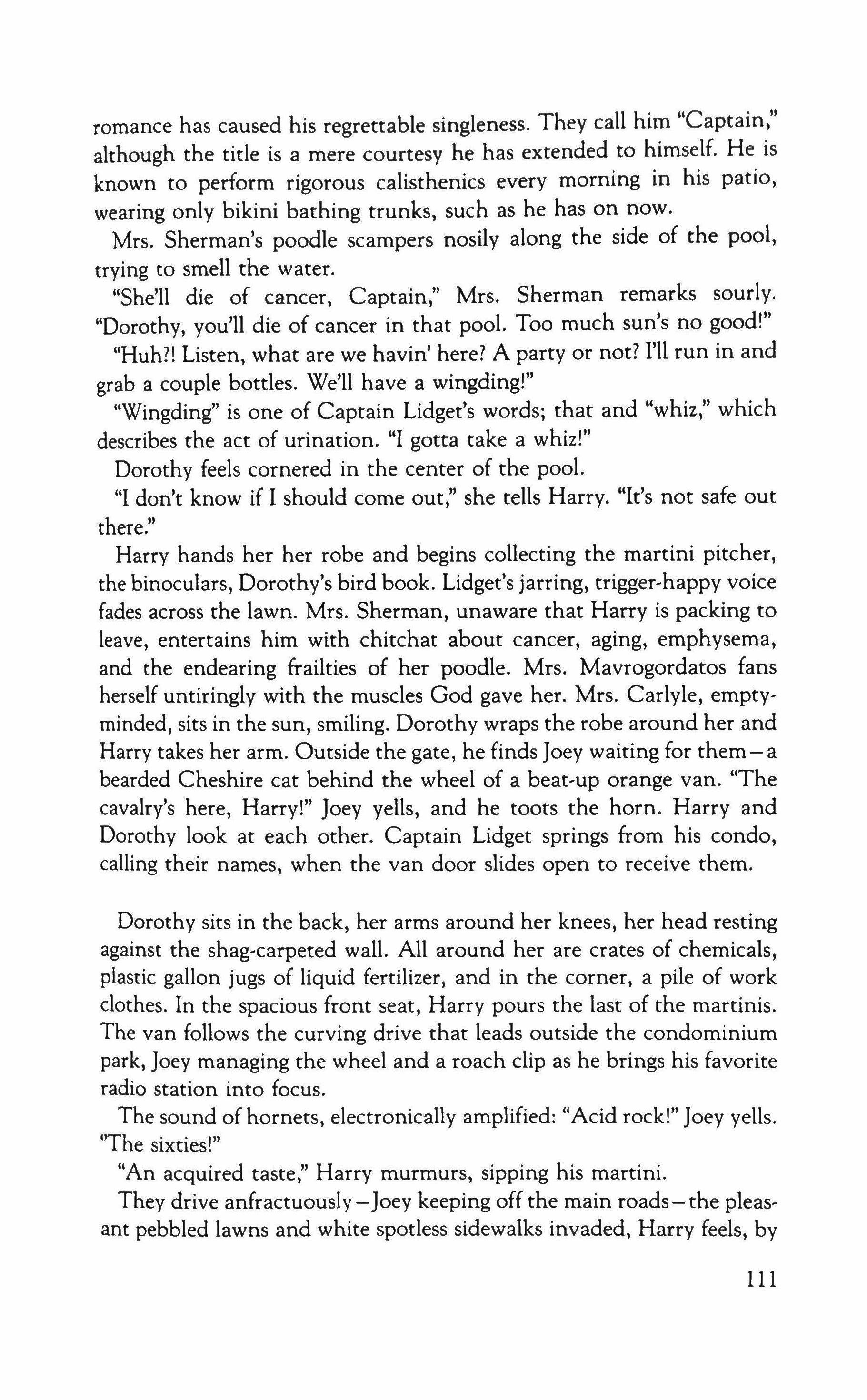
romance has caused his regrettable singleness. They call him "Captain," although the title is a mere courtesy he has extended to himself. He is known to perform rigorous calisthenics every morning in his patio, wearing only bikini bathing trunks, such as he has on now.
Mrs. Sherman's poodle scampers nosily along the side of the pool, trying to smell the water.
"She'll die of cancer, Captain," Mrs. Sherman remarks sourly. "Dorothy, you'll die of cancer in that pool. Too much sun's no good!"
"Huh?! Listen, what are we havin' here? A party or not? I'll run in and grab a couple bottles. We'll have a wingding!"
"Wingding" is one of Captain Lidget's words; that and "whiz," which describes the act of urination. "I gotta take a whiz!"
Dorothy feels cornered in the center of the pool.
"I don't know if I should come out," she tells Harry. "It's not safe out there."
Harry hands her her robe and begins collecting the martini pitcher, the binoculars, Dorothy's bird book. Lidget's jarring, trigger-happy voice fades across the lawn. Mrs. Sherman, unaware that Harry is packing to leave, entertains him with chitchat about cancer, aging, emphysema, and the endearing frailties of her poodle. Mrs. Mavrogordatos fans herself untiringly with the muscles God gave her. Mrs. Carlyle, emptyminded, sits in the sun, smiling. Dorothy wraps the robe around her and Harry takes her arm. Outside the gate, he finds Joey waiting for them-a bearded Cheshire cat behind the wheel of a beat-up orange van. "The cavalry's here, Harry!" Joey yells, and he toots the horn. Harry and Dorothy look at each other. Captain Lidget springs from his condo, calling their names, when the van door slides open to receive them.
Dorothy sits in the back, her arms around her knees, her head resting against the shag-carpeted wall. All around her are crates of chemicals, plastic gallon jugs of liquid fertilizer, and in the corner, a pile of work clothes. In the spacious front seat, Harry pours the last of the martinis. The van follows the curving drive that leads outside the condominium park, Joey managing the wheel and a roach clip as he brings his favorite radio station into focus.
The sound of hornets, electronically amplified: "Acid rock!" Joey yells. ''The sixties!"
"An acquired taste," Harry murmurs, sipping his martini. They drive anfractuously - Joey keeping off the main roads - the pleasant pebbled lawns and white spotless sidewalks invaded, Harry feels, by
111

the loud terrorizing music. A group of small children holding skateboards watch the van roll by; Joey flashes them a peace sign.
"It's ear-splitting!" Dorothy shouts from the back. She pulls her terrycloth robe tightly around her. Joey bangs his hand on the steering wheel and bobs his head to the music.
The van turns on to a crowded boulevard and stops for a light. The blast of air conditioning dissipates the fumes from Joey's roach, creating a cold eye-watering ether. The music is trapped inside the car. When the light changes, the engine stalls and the cars behind them start honking impatiently. Joey pumps the accelerator and the van lunges forward, Harry spilling some of his drink on the floor.
They turn into a small shopping mall and park illegally in front of a video arcade.
"Pit stop!" Joey yells, and removing a plastic bag from the glove compartment, he jumps out and runs inside, leaving the motor idling. Harry, sitting behind his sunglasses, feels comfortably passive.
"What is all this stuff?" Dorothy keeps asking, looking around her. "What is all this stuff?"
In a few moments, Joey returns, slamming the door behind him. The van rocks with his sudden weight.
"Next stop: Shangri-lal" he shouts, and they drive off.
At Dorothy's urging, the van pulls through the take-out lane of a liquor store, and Harry hands Joey some money.
Bombay gin, vermouth, and a bag of ice.
Joey is wearing a Tshirt that reads: "DO NOT BEND, SPINDLE, OR MUTILATE." "Peace!" he tells the clerk, and rolls up the window.
The music blaring inside the van, they drive over a long, straight, mirage-watered road, the empty expanse of desert before them.
The doors to the van are opened, and Harry has found a blanket and spreads it over the hot earth. In the near distance, they can make out the camouflaged homes of the rich, slim and elongated, built in tiers up Camelback Mountain. A tall dilapidated saguaro, riddled with bullet holes, stands near the front of the bus. The sky is terraced with cirrocumulus clouds.
Joey takes a pair of desert boots from out of the back and pulls them on his feet. Then he dons a tattered sombrero and stalks off into the desert, a book of poetry under his arm. Harry and Dorothy remove the large stones from beneath the blanket and recline there. Harry swirls the ice inside the martini pitcher with a spoon he found in the truck.
"How are we on cigarettes?" he asks.
112
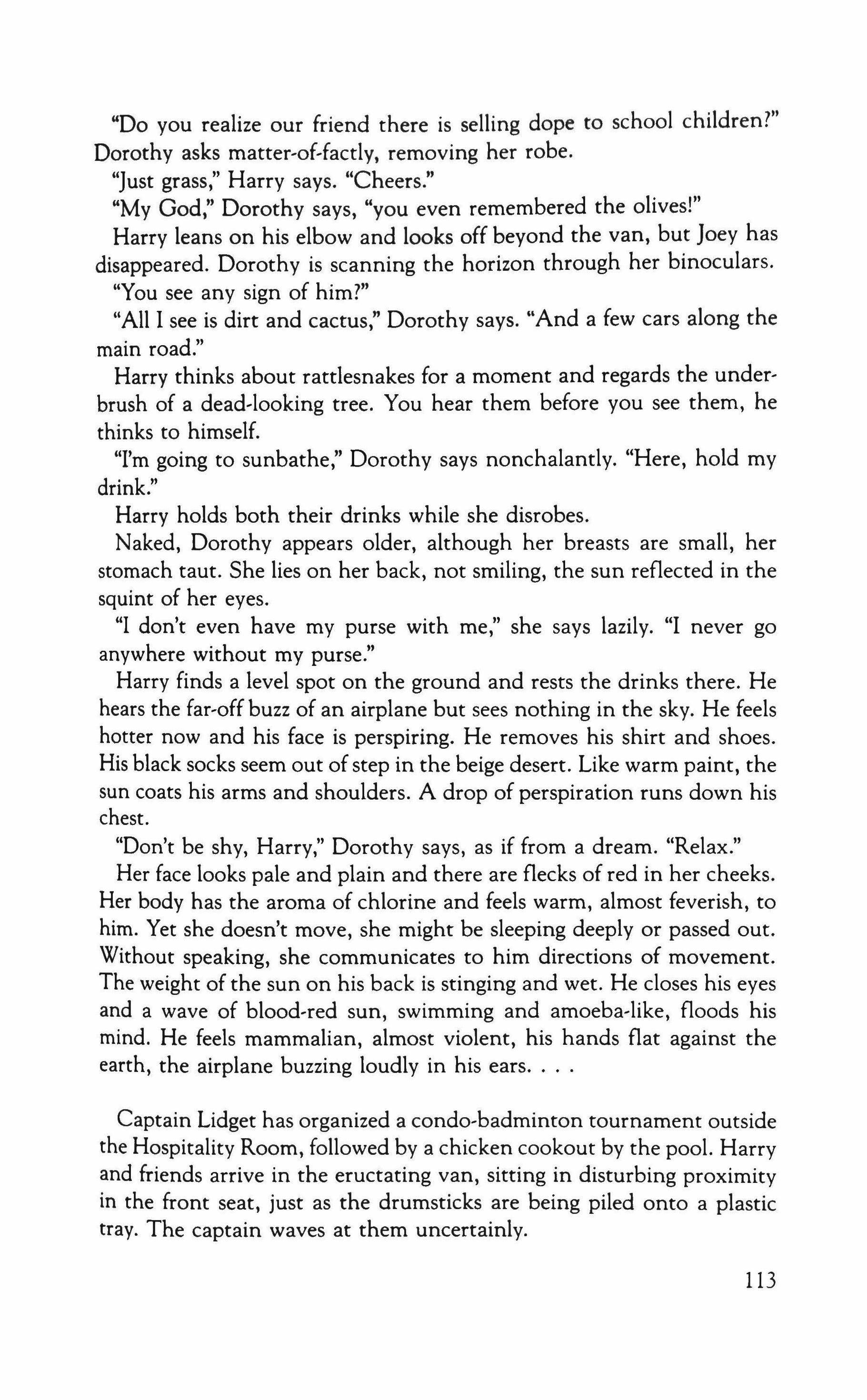
"Do you realize our friend there is selling dope to school children?" Dorothy asks matter-of-factlv, removing her robe.
"Just grass," Harry says. "Cheers."
"My God," Dorothy says, "you even remembered the olives!"
Harry leans on his elbow and looks off beyond the van, but Joey has disappeared. Dorothy is scanning the horizon through her binoculars.
"You see any sign of him?"
"AliI see is dirt and cactus," Dorothy says. "And a few cars along the main road."
Harry thinks about rattlesnakes for a moment and regards the underbrush of a dead-looking tree. You hear them before you see them, he thinks to himself.
"I'm going to sunbathe," Dorothy says nonchalantly. "Here, hold my drink."
Harry holds both their drinks while she disrobes.
Naked, Dorothy appears older, although her breasts are small, her stomach taut. She lies on her back, not smiling, the sun reflected in the squint of her eyes.
"I don't even have my purse with me," she says lazily. "I never go anywhere without my purse."
Harry finds a level spot on the ground and rests the drinks there. He hears the far-off buzz of an airplane but sees nothing in the sky. He feels hotter now and his face is perspiring. He removes his shirt and shoes. His black socks seem out of step in the beige desert. Like warm paint, the sun coats his arms and shoulders. A drop of perspiration runs down his chest.
"Don't be shy, Harry," Dorothy says, as if from a dream. "Relax."
Her face looks pale and plain and there are flecks of red in her cheeks. Her body has the aroma of chlorine and feels warm, almost feverish, to him. Yet she doesn't move, she might be sleeping deeply or passed out. Without speaking, she communicates to him directions of movement. The weight of the sun on his back is stinging and wet. He closes his eyes and a wave of blood-red sun, swimming and amoeba-like, floods his mind. He feels mammalian, almost violent, his hands flat against the earth, the airplane buzzing loudly in his ears
Captain Lidget has organized a condo-badminton tournament outside the Hospitality Room, followed by a chicken cookout by the pool. Harry and friends arrive in the eructating van, sitting in disturbing proximity in the front seat, just as the drumsticks are being piled onto a plastic tray. The captain waves at them uncertainly.
113
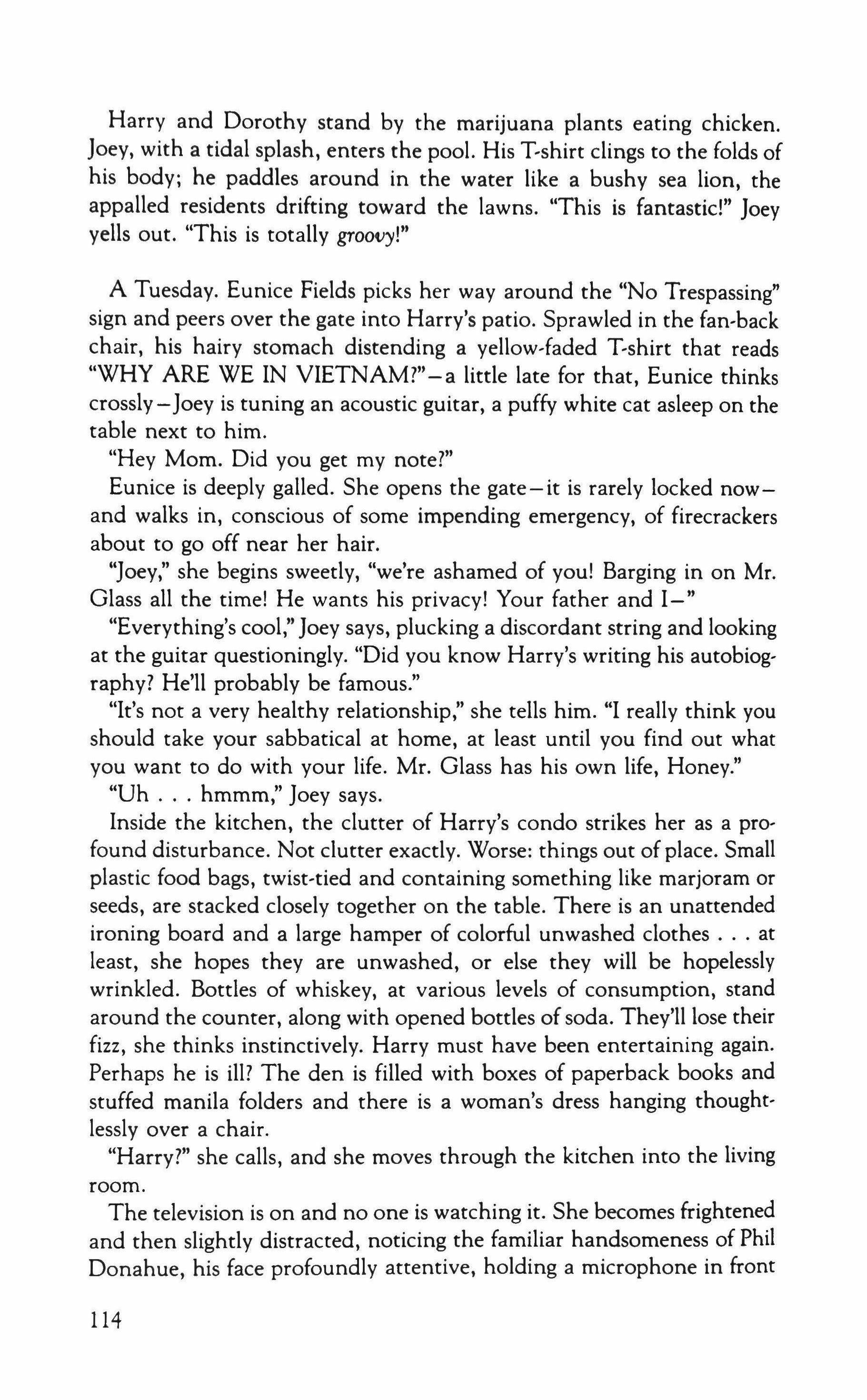
Harry and Dorothy stand by the marijuana plants eating chicken. joey, with a tidal splash, enters the pool. His Tshirt clings to the folds of his body; he paddles around in the water like a bushy sea lion, the appalled residents drifting toward the lawns. "This is fantastic!" joey yells out. "This is totally groovy!"
A Tuesday. Eunice Fields picks her way around the "No Trespassing" sign and peers over the gate into Harry's patio. Sprawled in the fan-back chair, his hairy stomach distending a yellow-faded Tshirr that reads "WHY ARE WE IN VIETNAM?"-a little late for that, Eunice thinks crossly-joey is tuning an acoustic guitar, a puffy white cat asleep on the table next to him.
"Hey Mom. Did you get my note?"
Eunice is deeply galled. She opens the gate-it is rarely locked nowand walks in, conscious of some impending emergency, of firecrackers about to go off near her hair.
"joey," she begins sweetly, "we're ashamed of you! Barging in on Mr. Glass all the time! He wants his privacy! Your father and 1-"
"Everything's cool,"joey says, plucking a discordant string and looking at the guitar questioningly. "Did you know Harry's writing his autobiography? He'll probably be famous."
"It's not a very healthy relationship," she tells him. "I really think you should take your sabbatical at home, at least until you find out what you want to do with your life. Mr. Glass has his own life, Honey."
"Uh hmmm," joey says.
Inside the kitchen, the clutter of Harry's condo strikes her as a profound disturbance. Not clutter exactly. Worse: things out of place. Small plastic food bags, twist-tied and containing something like marjoram or seeds, are stacked closely together on the table. There is an unattended ironing board and a large hamper of colorful unwashed clothes at least, she hopes they are unwashed, or else they will be hopelessly wrinkled. Bottles of whiskey, at various levels of consumption, stand around the counter, along with opened bottles of soda. They'll lose their fizz, she thinks instinctively. Harry must have been entertaining again. Perhaps he is ill? The den is filled with boxes of paperback books and stuffed manila folders and there is a woman's dress hanging thoughtlessly over a chair.
"Harry?" she calls, and she moves through the kitchen into the living room.
The television is on and no one is watching it. She becomes frightened and then slightly distracted, noticing the familiar handsomeness of Phil Donahue, his face profoundly attentive, holding a microphone in front
114

of a woman's mouth. The sound is off and Eunice can't tell what the woman is saying.
"Harry?" she calls nervously.
Something might be wrong. When something might be wrong, a neighbor's entry is no longer an intrusion. She hurries down the hall toward the bedrooms. Ominously, both doors are closed. She knocks against one of them. She opens it.
The shower is running from the bathroom and she stands there listening to the sound. A pair of binoculars is sitting on the table by the bed. There is a small desk with a stack of papers and she peers over it, recognizing Harry's handwriting: "I have finally acquired sufficient leisure to write something of the details of my life." She quickly closes the door. Joey is humming loudly from the kitchen.
She finds him spreading almond butter on a piece of toast, another piece stuck in his mouth. He looks at her with a bleary, adult expression, then begins buttering the second piece.
"I mean, I just asked you to pack a few things," he says finally, a slight whine in his voice. "1 figured, you know, that was the kind of stuff you liked doing."
She looks at him, her eyes crossed in anger.
"Mr. Glass is an old man!"
Joey looks at her wonderingly, and she immediately feels embarrassed, ensnared by her son's nirvanic tranquility. "Well," she says, composing herself, "we certainly have some talking to do. No matter what else, we certainly have that waiting for us!"
She finds her way to the back door, and then to the gate. She is pleased with herself for closing it so gingerly, for walking with such calm self-assurance all the way back across the lawn to her own world.
Harry, in bathrobe and slippers, his hair damp from the shower, freshens his drink, and sits at his bedroom desk. The window there overlooks the well-watered summer lawns; in the distance, he can see the tall plants-Joey's-growing healthily outside the Hospitality Room. He lights a pre-rolled cigarette. He hasn't thought of a title yet; he is writing, as it were, nomadically, grazing here and there in the best moments of his life. He pauses frequently to discover the precise word, the exact description. He can feel his life taking shape, assuming a convincing order, a natural yet exotic progression of people and events. Each day is a new chapter. The neighbors surrounding him wait for the paint to peel, for the roof to ignite, for the weeds to engulf the windows. "He's not even retired," they complain privately. "He's not retired at all."
115
This Horse of a Body of Mine
Norbert Blei
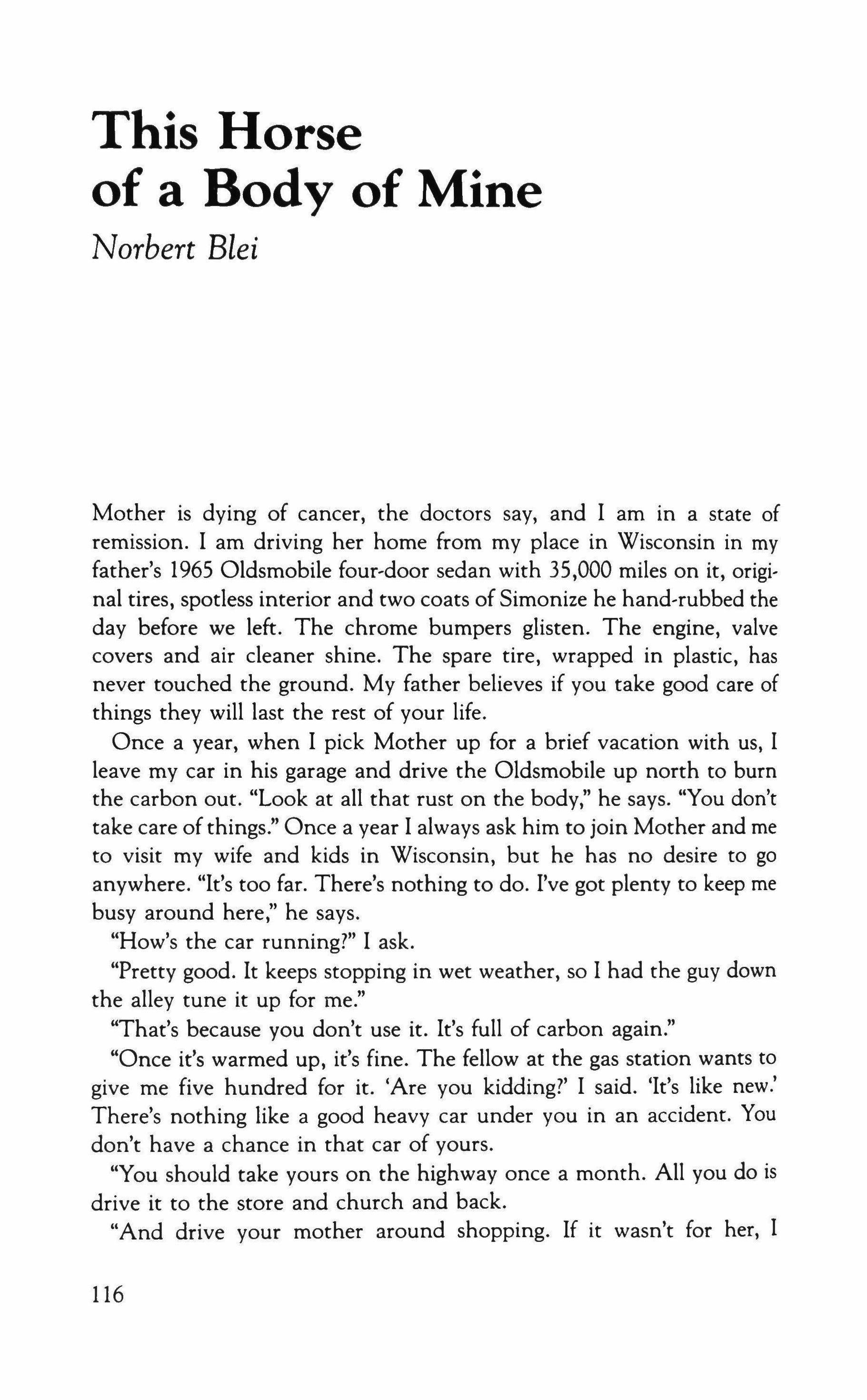
Mother is dying of cancer, the doctors say, and I am in a state of remission. I am driving her home from my place in Wisconsin in my father's 1965 Oldsmobile four-door sedan with 35,000 miles on it, original tires, spotless interior and two coats of Simonize he hand-rubbed the day before we left. The chrome bumpers glisten. The engine, valve covers and air cleaner shine. The spare tire, wrapped in plastic, has never touched the ground. My father believes if you take good care of things they will last the rest of your life.
Once a year, when I pick Mother up for a brief vacation with us, I leave my car in his garage and drive the Oldsmobile up north to burn the carbon out. "Look at all that rust on the body," he says. "You don't take care of things." Once a year I always ask him to join Mother and me to visit my wife and kids in Wisconsin, but he has no desire to go anywhere. "It's too far. There's nothing to do. I've got plenty to keep me busy around here," he says.
"How's the car running?" I ask.
"Pretty good. It keeps stopping in wet weather, so I had the guy down the alley tune it up for me."
"That's because you don't use it. It's full of carbon again."
"Once it's warmed up, it's fine. The fellow at the gas station wants to give me five hundred for it. 'Are you kidding?' I said. 'It's like new.' There's nothing like a good heavy car under you in an accident. You don't have a chance in that car of yours.
"You should take yours on the highway once a month. All you do is drive it to the store and church and back.
"And drive your mother around shopping. If it wasn't for her, I
116
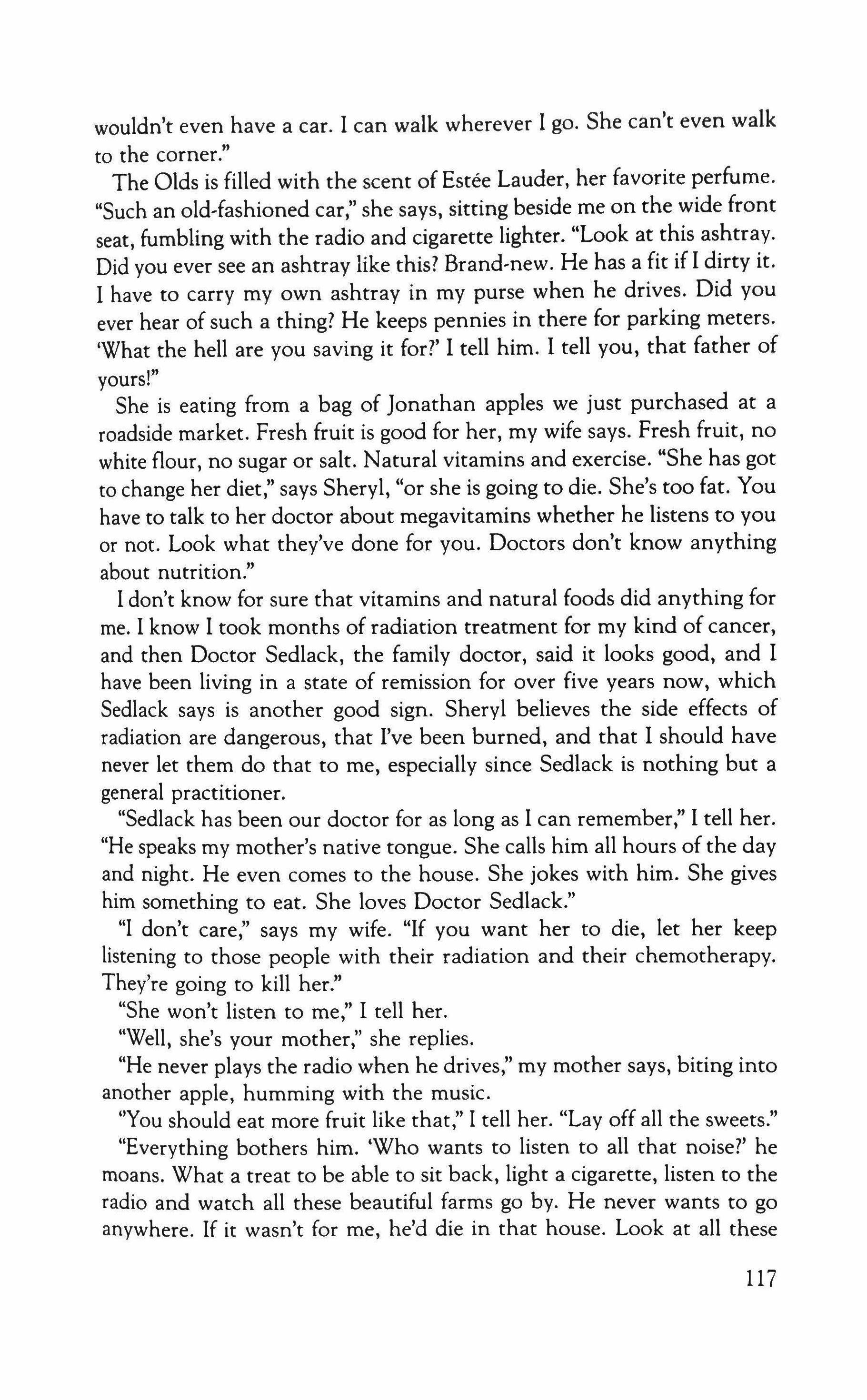
wouldn't even have a car. I can walk wherever I go. She can't even walk to the corner."
The Olds is filled with the scent of Estee Lauder, her favorite perfume. "Such an old-fashioned car," she says, sitting beside me on the wide front seat, fumbling with the radio and cigarette lighter. "Look at this ashtray. Did you ever see an ashtray like this? Brand-new. He has a fit if I dirty it. I have to carry my own ashtray in my purse when he drives. Did you ever hear of such a thing? He keeps pennies in there for parking meters. 'What the hell are you saving it for?' I tell him. I tell you, that father of yours!"
She is eating from a bag of Jonathan apples we just purchased at a roadside market. Fresh fruit is good for her, my wife says. Fresh fruit, no white flour, no sugar or salt. Natural vitamins and exercise. "She has got to change her diet," says Sheryl, "or she is going to die. She's too fat. You have to talk to her doctor about megavitamins whether he listens to you or not. Look what they've done for you. Doctors don't know anything about nutrition."
1 don't know for sure that vitamins and natural foods did anything for me. I know I took months of radiation treatment for my kind of cancer, and then Doctor Sedlack, the family doctor, said it looks good, and I have been living in a state of remission for over five years now, which Sedlack says is another good sign. Sheryl believes the side effects of radiation are dangerous, that I've been burned, and that I should have never let them do that to me, especially since Sedlack is nothing but a general practitioner.
"Sedlack has been our doctor for as long as I can remember," I tell her. "He speaks my mother's native tongue. She calls him all hours of the day and night. He even comes to the house. She jokes with him. She gives him something to eat. She loves Doctor Sedlack."
"I don't care," says my wife. "If you want her to die, let her keep listening to those people with their radiation and their chemotherapy. They're going to kill her."
"She won't listen to me," I tell her.
"Well, she's your mother," she replies.
"He never plays the radio when he drives," my mother says, biting into another apple, humming with the music.
"You should eat more fruit like that," I tell her. "Layoff all the sweets."
"Everything bothers him. 'Who wants to listen to all that noise?' he moans. What a treat to be able to sit back, light a cigarette, listen to the radio and watch all these beautiful farms go by. He never wants to go anywhere. If it wasn't for me, he'd die in that house. Look at all these
117
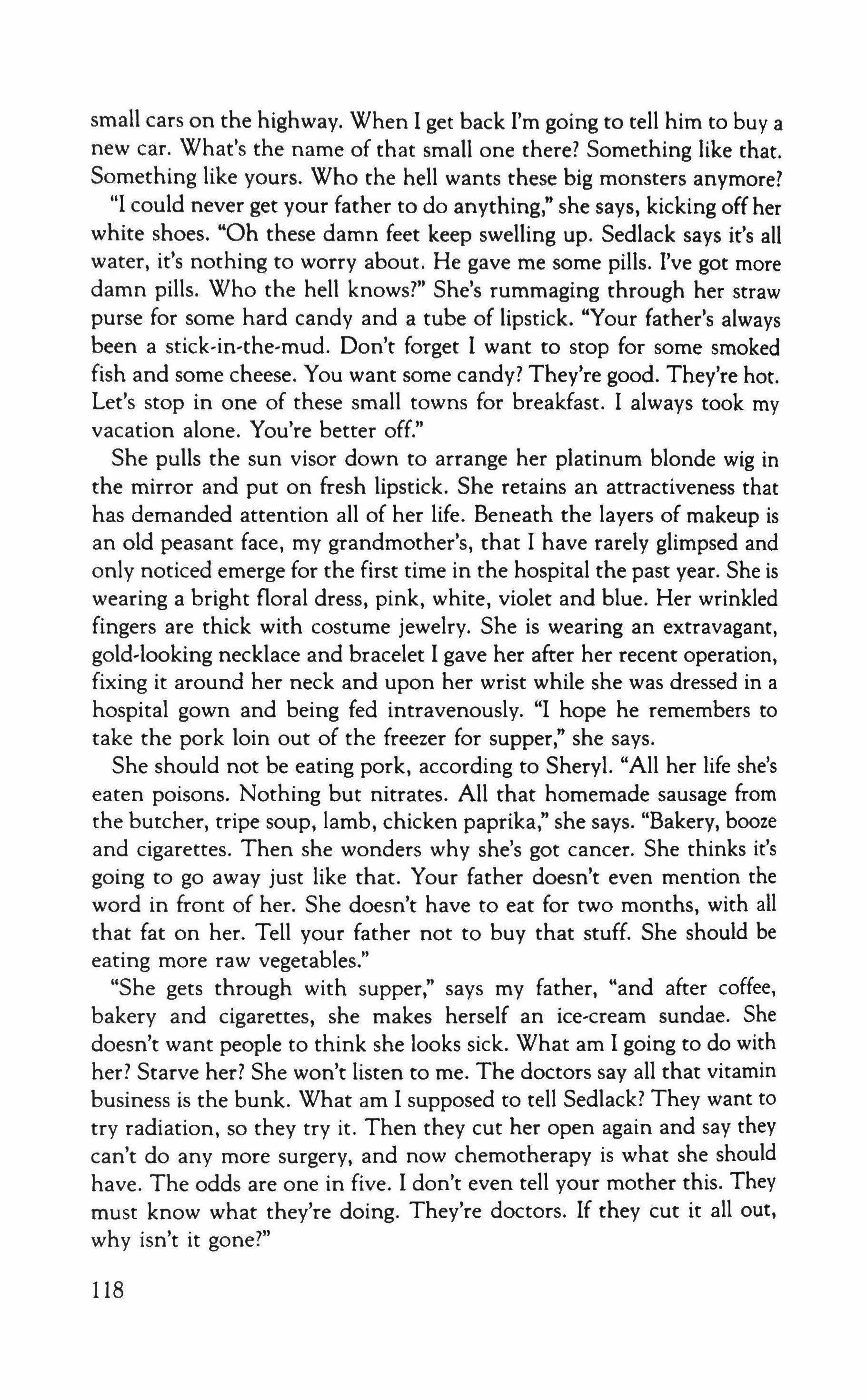
small cars on the highway. When I get back I'm going to tell him to buy a new car. What's the name of that small one there? Something like that. Something like yours. Who the hell wants these big monsters anymore? "I could never get your father to do anything," she says, kicking off her white shoes. "Oh these damn feet keep swelling up. Sedlack says it's all water, it's nothing to worry about. He gave me some pills. I've got more damn pills. Who the hell knows?" She's rummaging through her straw purse for some hard candy and a tube of lipstick. "Your father's always been a stick-in-the-mud. Don't forget I want to stop for some smoked fish and some cheese. You want some candy? They're good. They're hot. Let's stop in one of these small towns for breakfast. I always took my vacation alone. You're better off."
She pulls the sun visor down to arrange her platinum blonde wig in the mirror and put on fresh lipstick. She retains an attractiveness that has demanded attention all of her life. Beneath the layers of makeup is an old peasant face, my grandmother's, that I have rarely glimpsed and only noticed emerge for the first time in the hospital the past year. She is wearing a bright floral dress, pink, white, violet and blue. Her wrinkled fingers are thick with costume jewelry. She is wearing an extravagant, gold-looking necklace and bracelet I gave her after her recent operation, fixing it around her neck and upon her wrist while she was dressed in a hospital gown and being fed intravenously. "I hope he remembers to take the pork loin out of the freezer for supper," she says.
She should not be eating pork, according to Sheryl. "All her life she's eaten poisons. Nothing but nitrates. All that homemade sausage from the butcher, tripe soup, lamb, chicken paprika," she says. "Bakery, booze and cigarettes. Then she wonders why she's got cancer. She thinks it's going to go away just like that. Your father doesn't even mention the word in front of her. She doesn't have to eat for two months, with all that fat on her. Tell your father not to buy that stuff. She should be eating more raw vegetables."
"She gets through with supper," says my father, "and after coffee, bakery and cigarettes, she makes herself an ice-cream sundae. She doesn't want people to think she looks sick. What am I going to do with her? Starve her? She won't listen to me. The doctors say all that vitamin business is the bunk. What am I supposed to tell Sedlack? They want to try radiation, so they try it. Then they cut her open again and say they can't do any more surgery, and now chemotherapy is what she should have. The odds are one in five. I don't even tell your mother this. They must know what they're doing. They're doctors. If they cut it all out, why isn't it gone?"
118
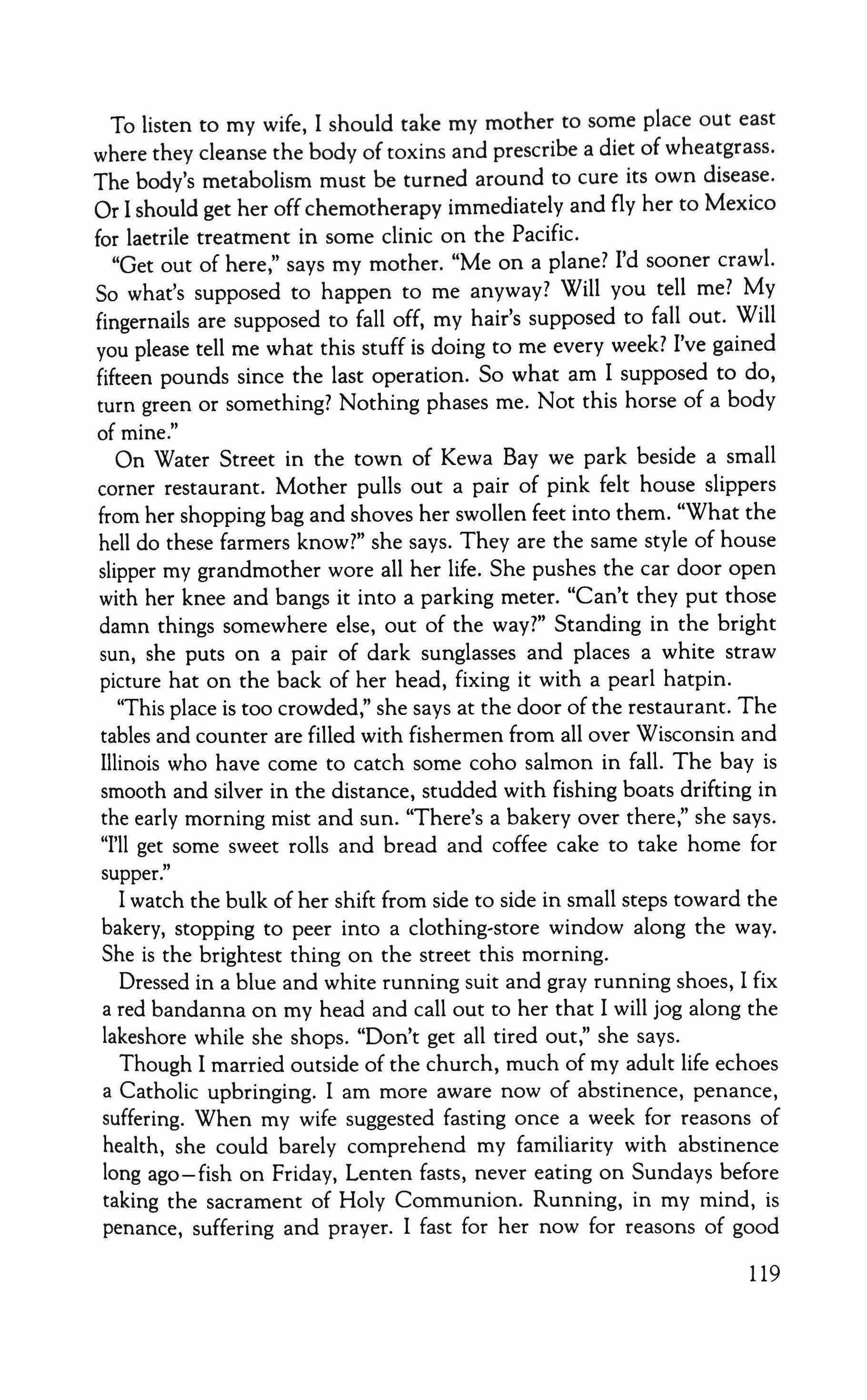
To listen to my wife, I should take my mother to some place out east where they cleanse the body of toxins and prescribe a diet of wheatgrass. The body's metabolism must be turned around to cure its own disease. Or I should get her offchemotherapy immediately and fly her to Mexico for laetrile treatment in some clinic on the Pacific.
"Get out of here," says my mother. "Me on a plane? I'd sooner crawl. So what's supposed to happen to me anyway? Will you tell me? My fingernails are supposed to fall off, my hair's supposed to fall out. Will you please tell me what this stuff is doing to me every week? I've gained fifteen pounds since the last operation. So what am I supposed to do, turn green or something? Nothing phases me. Not this horse of a body of mine."
On Water Street in the town of Kewa Bay we park beside a small corner restaurant. Mother pulls out a pair of pink felt house slippers from her shopping bag and shoves her swollen feet into them. "What the hell do these farmers know?" she says. They are the same style of house slipper my grandmother wore all her life. She pushes the car door open with her knee and bangs it into a parking meter. "Can't they put those damn things somewhere else, out of the way?" Standing in the bright sun, she puts on a pair of dark sunglasses and places a white straw picture hat on the back of her head, fixing it with a pearl hatpin.
"This place is too crowded," she says at the door ofthe restaurant. The tables and counter are filled with fishermen from all over Wisconsin and Illinois who have come to catch some coho salmon in fall. The bay is smooth and silver in the distance, studded with fishing boats drifting in the early morning mist and sun. "There's a bakery over there," she says. "I'll get some sweet rolls and bread and coffee cake to take home for supper."
I watch the bulk of her shift from side to side in small steps toward the bakery, stopping to peer into a clothing-store window along the way. She is the brightest thing on the street this morning.
Dressed in a blue and white running suit and gray running shoes, I fix a red bandanna on my head and call out to her that I will jog along the lakeshore while she shops. "Don't get all tired out," she says.
Though I married outside of the church, much of my adult life echoes a Catholic upbringing. I am more aware now of abstinence, penance, suffering. When my wife suggested fasting once a week for reasons of health, she could barely comprehend my familiarity with abstinence long ago-fish on Friday, Lenten fasts, never eating on Sundays before taking the sacrament of Holy Communion. Running, in my mind, is penance, suffering and prayer. I fast for her now for reasons of good
119
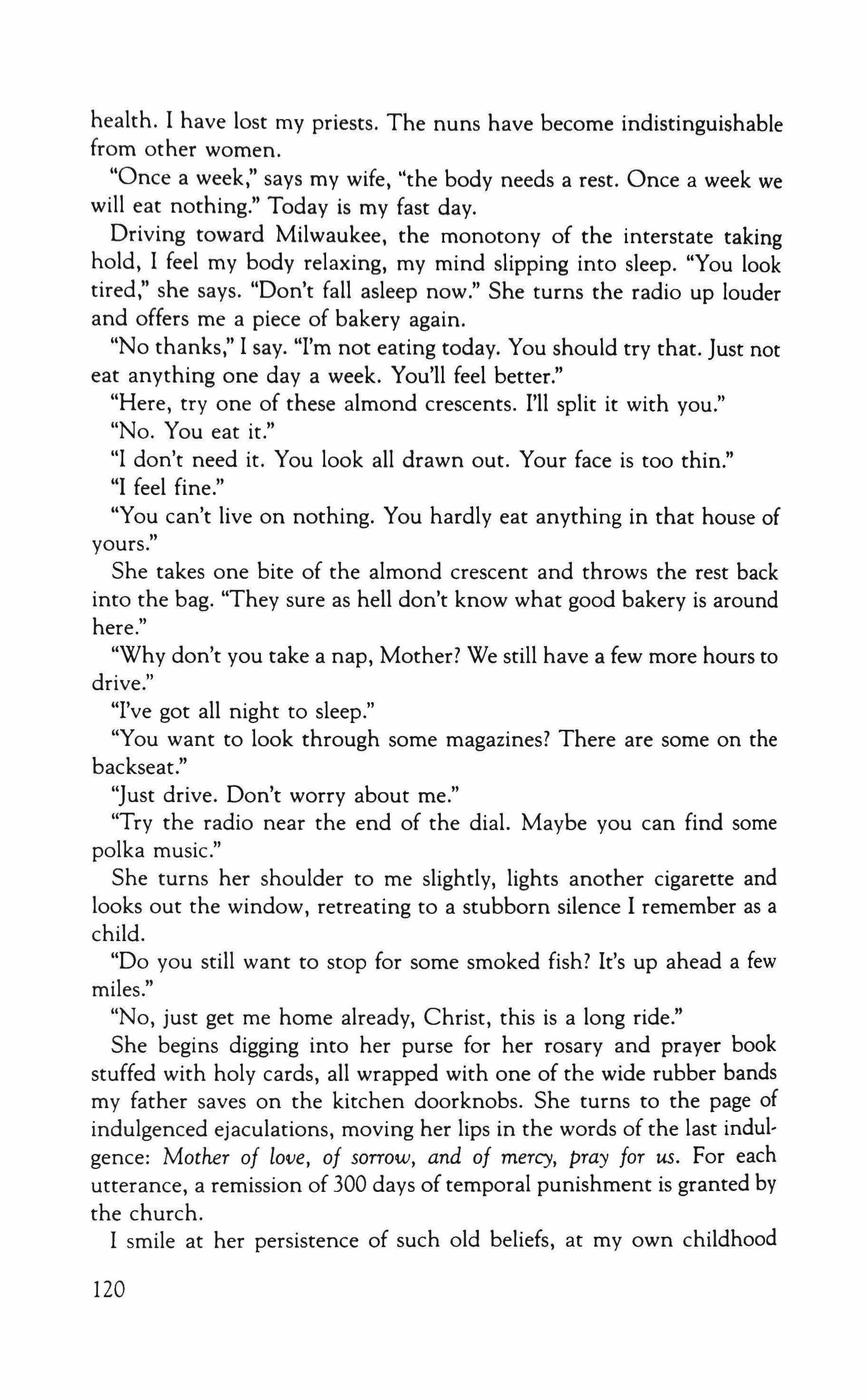
health. I have lost my priests. The nuns have become indistinguishable from other women.
"Once a week," says my wife, "the body needs a rest. Once a week we will eat nothing." Today is my fast day.
Driving toward Milwaukee, the monotony of the interstate taking hold, 1 feel my body relaxing, my mind slipping into sleep. "You look tired," she says. "Don't fall asleep now." She turns the radio up louder and offers me a piece of bakery again.
"No thanks," 1 say. "I'm not eating today. You should try that. Just not eat anything one day a week. You'll feel better."
"Here, try one of these almond crescents. I'll split it with you."
"No. You eat it."
"1 don't need it. You look all drawn out. Your face is too thin."
"I feel fine."
"You can't live on nothing. You hardly eat anything in that house of yours."
She takes one bite of the almond crescent and throws the rest back into the bag. "They sure as hell don't know what good bakery is around here."
"Why don't you take a nap, Mother? We still have a few more hours to drive."
"I've got all night to sleep."
"You want to look through some magazines? There are some on the backseat."
"Just drive. Don't worry about me."
"Try the radio near the end of the dial. Maybe you can find some polka music."
She turns her shoulder to me slightly, lights another cigarette and looks out the window, retreating to a stubborn silence 1 remember as a child.
"Do you still want to stop for some smoked fish? It's up ahead a few miles."
"No, just get me home already, Christ, this is a long ride."
She begins digging into her purse for her rosary and prayer book stuffed with holy cards, all wrapped with one of the wide rubber bands my father saves on the kitchen doorknobs. She turns to the page of indulgenced ejaculations, moving her lips in the words of the last indulgence: Mother of love, of sorrow, and of mercy, pray for us. For each utterance, a remission of 300 days of temporal punishment is granted by the church.
I smile at her persistence of such old beliefs, at my own childhood
120
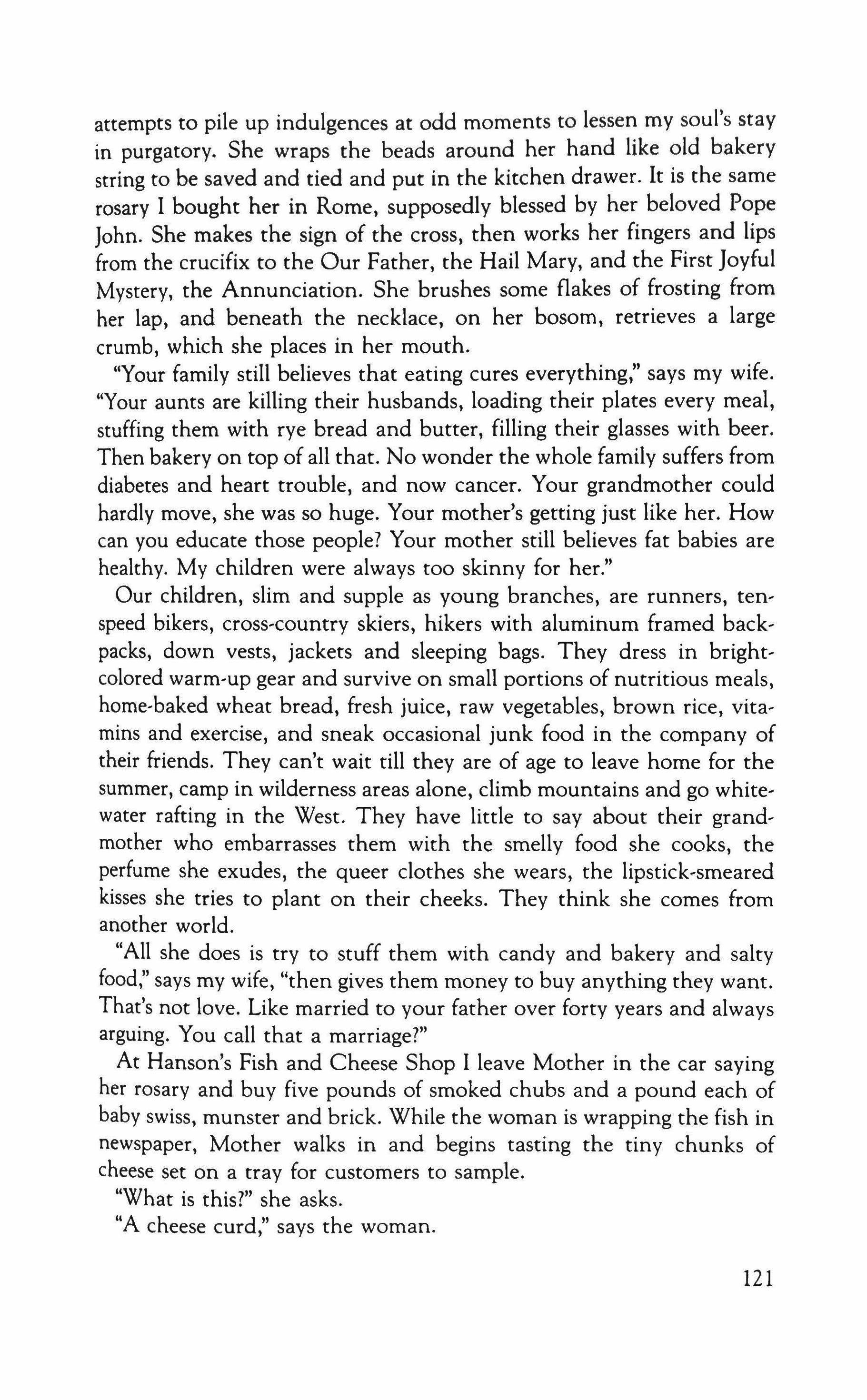
attempts to pile up indulgences at odd moments to lessen my soul's stay in purgatory. She wraps the beads around her hand like old bakery string to be saved and tied and put in the kitchen drawer. It is the same rosary I bought her in Rome, supposedly blessed by her beloved Pope John. She makes the sign of the cross, then works her fingers and lips from the crucifix to the Our Father, the Hail Mary, and the First Joyful Mystery, the Annunciation. She brushes some flakes of frosting from her lap, and beneath the necklace, on her bosom, retrieves a large crumb, which she places in her mouth.
"Your family still believes that eating cures everything," says my wife. "Your aunts are killing their husbands, loading their plates every meal, stuffing them with rye bread and butter, filling their glasses with beer. Then bakery on top of all that. No wonder the whole family suffers from diabetes and heart trouble, and now cancer. Your grandmother could hardly move, she was so huge. Your mother's getting just like her. How can you educate those people? Your mother still believes fat babies are healthy. My children were always too skinny for her."
Our children, slim and supple as young branches, are runners, tenspeed bikers, cross-country skiers, hikers with aluminum framed backpacks, down vests, jackets and sleeping bags. They dress in brightcolored warm-up gear and survive on small portions of nutritious meals, home-baked wheat bread, fresh juice, raw vegetables, brown rice, vitamins and exercise, and sneak occasional junk food in the company of their friends. They can't wait till they are of age to leave home for the summer, camp in wilderness areas alone, climb mountains and go whitewater rafting in the West. They have little to say about their grandmother who embarrasses them with the smelly food she cooks, the perfume she exudes, the queer clothes she wears, the lipstick-smeared kisses she tries to plant on their cheeks. They think she comes from another world.
"All she does is try to stuff them with candy and bakery and salty food," says my wife, "then gives them money to buy anything they want. That's not love. Like married to your father over forty years and always arguing. You call that a marriage?"
At Hanson's Fish and Cheese Shop I leave Mother in the car saying her rosary and buy five pounds of smoked chubs and a pound each of baby swiss, munster and brick. While the woman is wrapping the fish in newspaper, Mother walks in and begins tasting the tiny chunks of cheese set on a tray for customers to sample.
"What is this?" she asks.
"A cheese curd," says the woman.
121
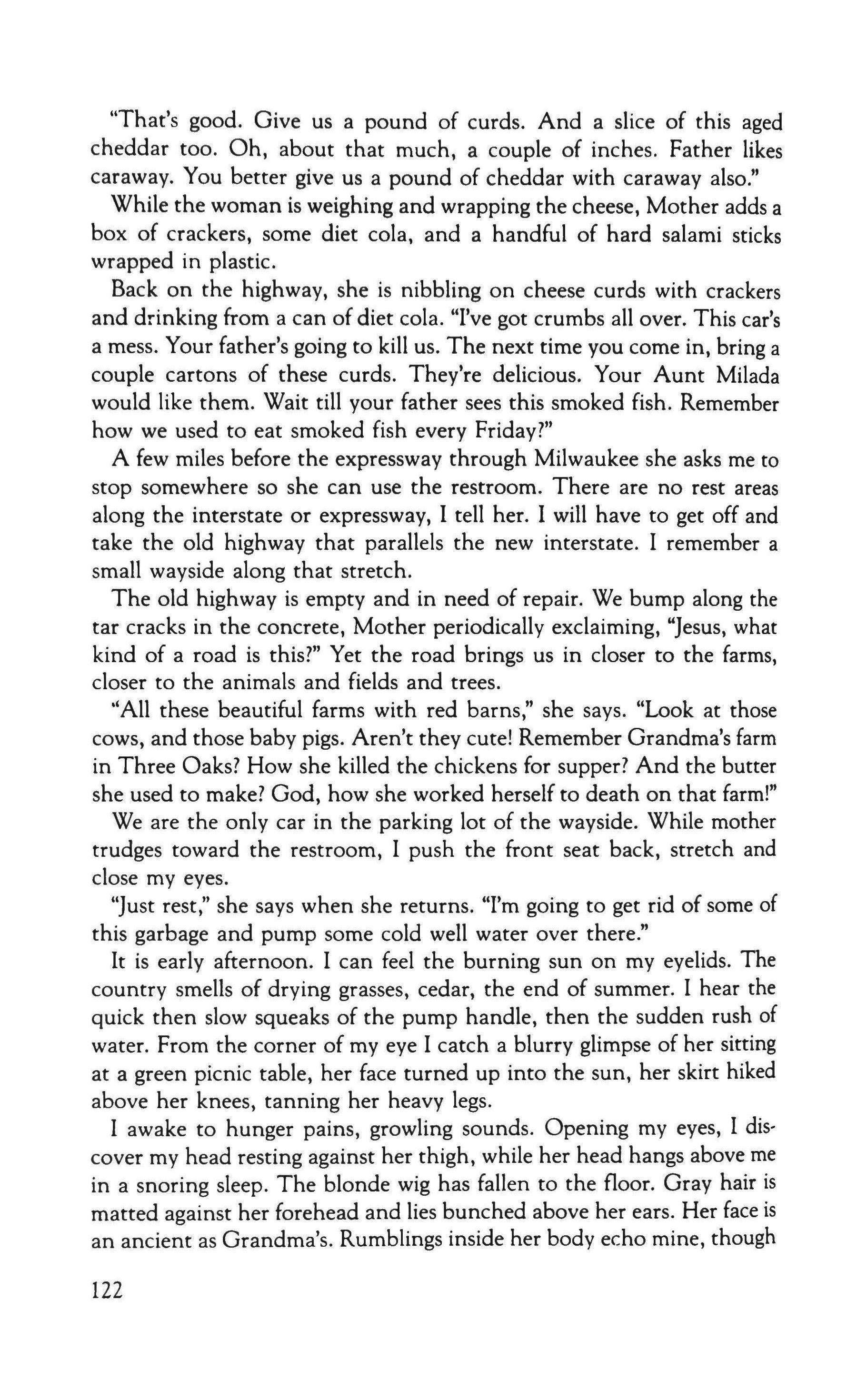
"That's good. Give us a pound of curds. And a slice of this aged cheddar too. Oh, about that much, a couple of inches. Father likes caraway. You better give us a pound of cheddar with caraway also."
While the woman is weighing and wrapping the cheese, Mother adds a box of crackers, some diet cola, and a handful of hard salami sticks wrapped in plastic.
Back on the highway, she is nibbling on cheese curds with crackers and drinking from a can of diet cola. "I've got crumbs all over. This car's a mess. Your father's going to kill us. The next time you come in, bring a couple cartons of these curds. They're delicious. Your Aunt Milada would like them. Wait till your father sees this smoked fish. Remember how we used to eat smoked fish every Friday?"
A few miles before the expressway through Milwaukee she asks me to stop somewhere so she can use the restroom. There are no rest areas along the interstate or expressway, I tell her. I will have to get off and take the old highway that parallels the new interstate. I remember a small wayside along that stretch.
The old highway is empty and in need of repair. We bump along the tar cracks in the concrete, Mother periodically exclaiming, "Jesus, what kind of a road is this?" Yet the road brings us in closer to the farms, closer to the animals and fields and trees.
"All these beautiful farms with red barns," she says. "Look at those cows, and those baby pigs. Aren't they cute! Remember Grandma's farm in Three Oaks? How she killed the chickens for supper? And the butter she used to make? God, how she worked herself to death on that farm!"
We are the only car in the parking lot of the wayside. While mother trudges toward the restroom, I push the front seat back, stretch and close my eyes.
"Just rest," she says when she returns. "I'm going to get rid of some of this garbage and pump some cold well water over there."
It is early afternoon. I can feel the burning sun on my eyelids. The country smells of drying grasses, cedar, the end of summer. I hear the quick then slow squeaks of the pump handle, then the sudden rush of water. From the corner of my eye I catch a blurry glimpse of her sitting at a green picnic table, her face turned up into the sun, her skirt hiked above her knees, tanning her heavy legs.
I awake to hunger pains, growling sounds. Opening my eyes, I discover my head resting against her thigh, while her head hangs above me in a snoring sleep. The blonde wig has fallen to the floor. Gray hair is matted against her forehead and lies bunched above her ears. Her face is an ancient as Grandma's. Rumblings inside her body echo mine, though
122

hers emanate from the pelvic region, where her hands lie clasped, where her cancer lies.
Grasping the steering wheel, I pull myself up slowly.
"What's wrong?" Her eyes flash open.
"Nothing. I want to splash some cold water on my face, then we better get going."
"Here, put some water in this empty soda can for me. I like that iron taste of well water. It reminds me of Grandma's farm and the picnics we used to go on a long time ago in the forest preserves."
I return to find her staring at her face in the mirror behind the visor, her hands vaguely stirring inside her purse. "I look like hell," she says. "Just look at me." She opens a tube of lipstick, then a compact of facial coloring, which she rubs deep into her skin. "Hand me that damn wig," she says. She brushes it with her hand, fluffing the piles of blonde curls with her fingers. "There. That's good enough." I hand her the can ofcold well water. "Oh, that tastes good," she says. "We should fill up a gallon jug to take home."
All the way back through Milwaukee and over the Illinois state line she talks about her childhood, the picnics they used to go to in the forest preserves. "Grandpa belonged to this club, Ilova, named after some place in Yugoslavia, and they would hold these picnics every year. A truck would come for us early in the morning, and we would all pile on, the kids, the old people, everyone. The trucks were open in the back with those wooden sides, and we would sit there on top of one another and drive all the way to the picnic grounds outside the city.
Sometime we would carry blocks of ice with us too in burlap sacks. Grandpa and some of the men would leave even earlier to begin building the fires so they could start roasting lambs and pigs on the spit. They would rub the lambs and pigs both inside and out with handfuls of salt. Sometimes they would stuff the cavities with sausage, and sometimes they would slit the outside skin of the lamb and stick cloves of garlic inside. Grandma would be with the women making coffee, cutting bread, setting out the bakery. Grandpa would later end up with his friends drinking beer and playing cards. The kids would take turns turning the lambs and the pigs on the spit by hand. Then the band would begin playing in the afternoon, and everyone would sing and dance till night. Most of the men would be drunk by then, and the women would be battling with them. Then they would all pile on the trucks and go home, their bellies full.
"You never tasted lamb like that. So juicy. They'd cut and saw and chop it apart. They were no butchers, believe me. You didn't bother
123
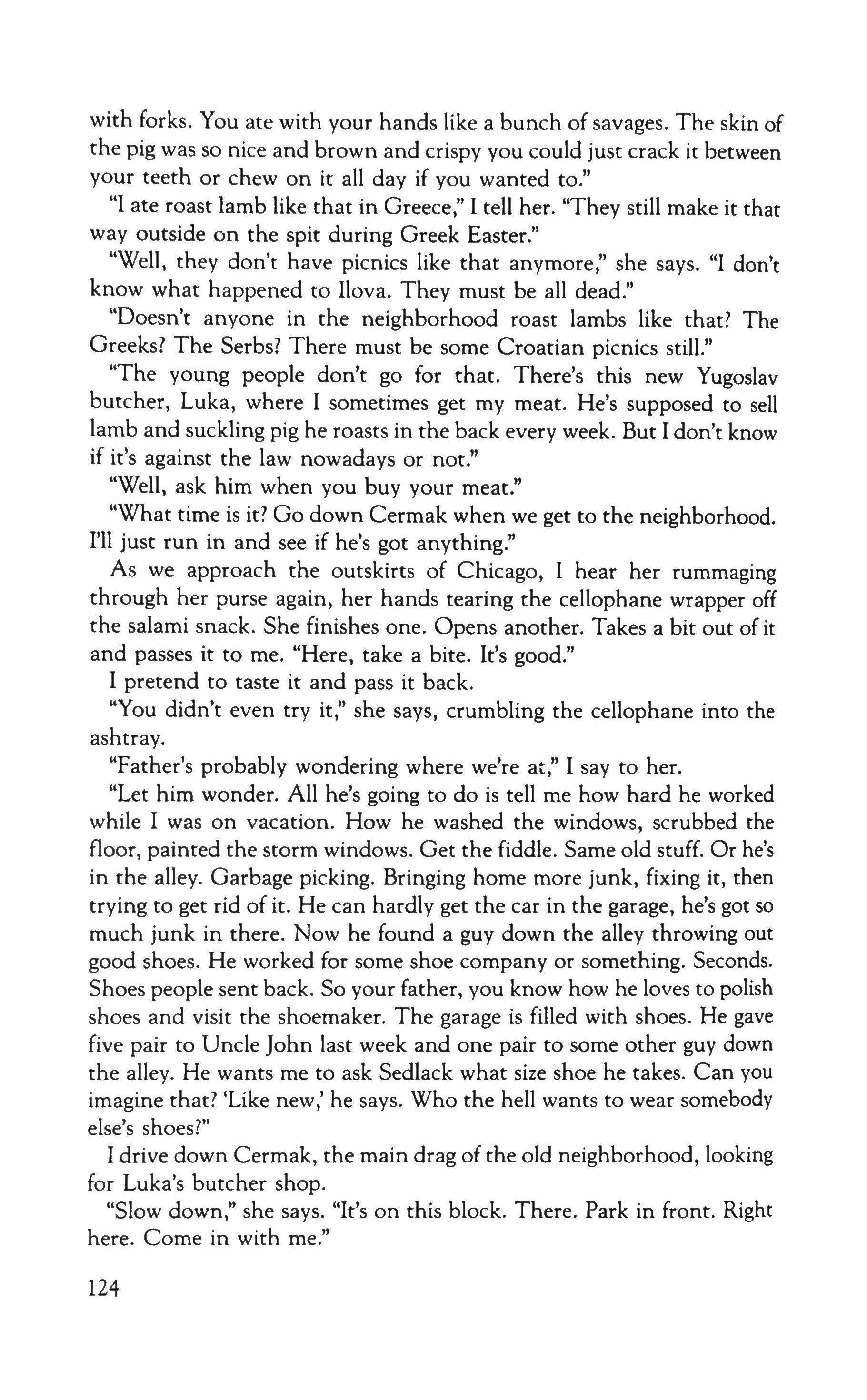
with forks. You ate with your hands like a bunch of savages. The skin of the pig was so nice and brown and crispy you could just crack it between your teeth or chew on it all day if you wanted to."
"I ate roast lamb like that in Greece," I tell her. "They still make it that way outside on the spit during Greek Easter."
"Well, they don't have picnics like that anymore," she says. "I don't know what happened to Ilova. They must be all dead."
"Doesn't anyone in the neighborhood roast lambs like that? The Greeks? The Serbs? There must be some Croatian picnics still."
"The young people don't go for that. There's this new Yugoslav butcher, Luka, where I sometimes get my meat. He's supposed to sell lamb and suckling pig he roasts in the back every week. But I don't know if it's against the law nowadays or not."
"Well, ask him when you buy your meat."
"What time is it? Go down Cermak when we get to the neighborhood. I'll just run in and see if he's got anything."
As we approach the outskirts of Chicago, I hear her rummaging through her purse again, her hands tearing the cellophane wrapper off the salami snack. She finishes one. Opens another. Takes a bit out of it and passes it to me. "Here, take a bite. It's good."
I pretend to taste it and pass it back.
"You didn't even try it," she says, crumbling the cellophane into the ashtray.
"Father's probably wondering where we're at," I say to her.
"Let him wonder. All he's going to do is tell me how hard he worked while I was on vacation. How he washed the windows, scrubbed the floor, painted the storm windows. Get the fiddle. Same old stuff. Or he's in the alley. Garbage picking. Bringing home more junk, fixing it, then trying to get rid of it. He can hardly get the car in the garage, he's got so much junk in there. Now he found a guy down the alley throwing out good shoes. He worked for some shoe company or something. Seconds. Shoes people sent back. So your father, you know how he loves to polish shoes and visit the shoemaker. The garage is filled with shoes. He gave five pair to Uncle John last week and one pair to some other guy down the alley. He wants me to ask Sedlack what size shoe he takes. Can you imagine that? 'Like new,' he says. Who the hell wants to wear somebody else's shoes?"
I drive down Cermak, the main drag of the old neighborhood, looking for Luka's butcher shop.
"Slow down," she says. "It's on this block. There. Park in front. Right here. Come in with me."
124
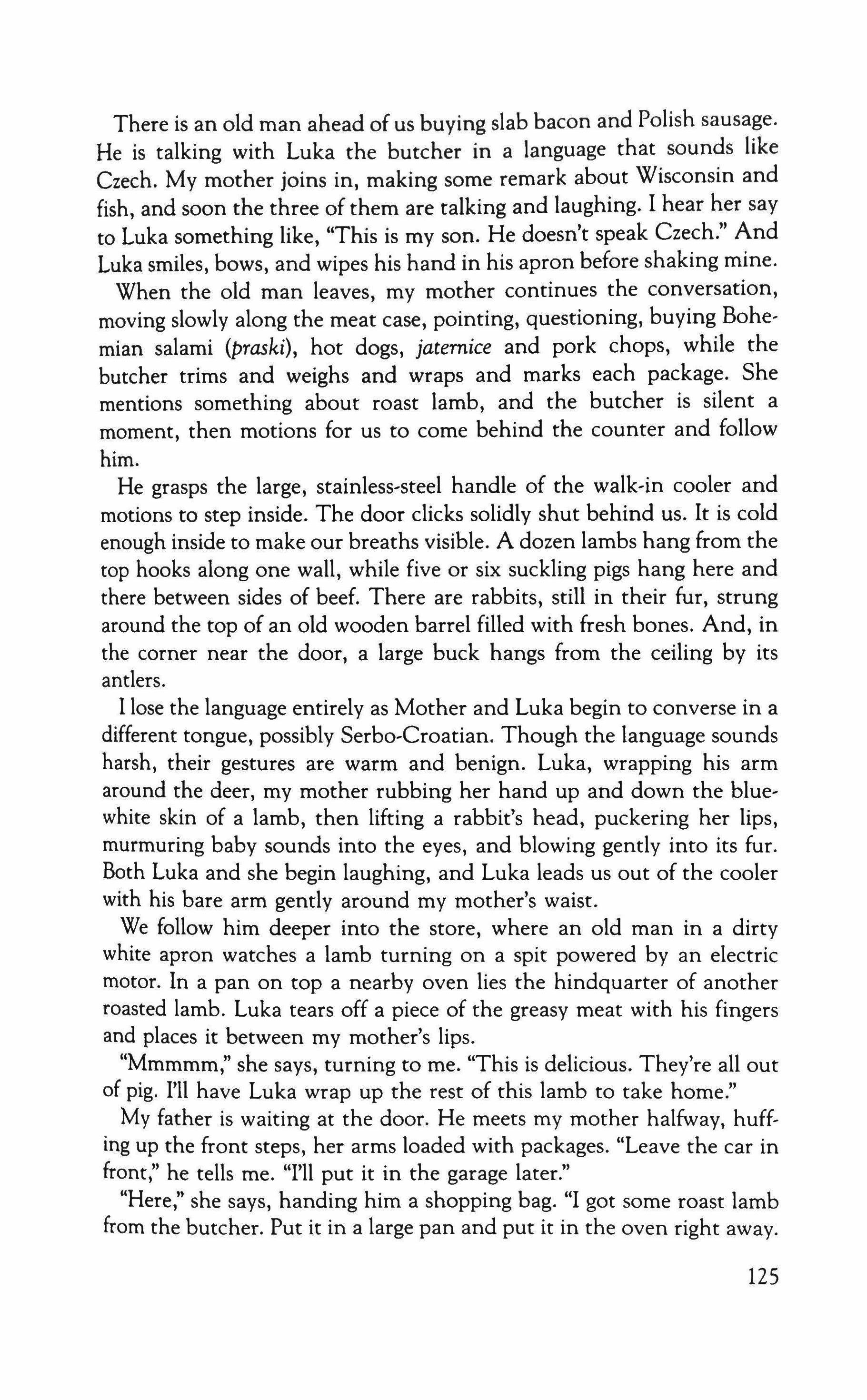
There is an old man ahead of us buying slab bacon and Polish sausage. He is talking with Luka the butcher in a language that sounds like Czech. My mother joins in, making some remark about Wisconsin and fish, and soon the three of them are talking and laughing. I hear her say to Luka something like, "This is my son. He doesn't speak Czech." And Luka smiles, bows, and wipes his hand in his apron before shaking mine.
When the old man leaves, my mother continues the conversation, moving slowly along the meat case, pointing, questioning, buying Bohemian salami (praski), hot dogs, jaternice and pork chops, while the butcher trims and weighs and wraps and marks each package. She mentions something about roast lamb, and the butcher is silent a moment, then motions for us to come behind the counter and follow him.
He grasps the large, stainless-steel handle of the walk-in cooler and motions to step inside. The door clicks solidly shut behind us. It is cold enough inside to make our breaths visible. A dozen lambs hang from the top hooks along one wall, while five or six suckling pigs hang here and there between sides of beef. There are rabbits, still in their fur, strung around the top of an old wooden barrel filled with fresh bones. And, in the corner near the door, a large buck hangs from the ceiling by its antlers.
I lose the language entirely as Mother and Luka begin to converse in a different tongue, possibly Serbo-Croatian. Though the language sounds harsh, their gestures are warm and benign. Luka, wrapping his arm around the deer, my mother rubbing her hand up and down the bluewhite skin of a lamb, then lifting a rabbit's head, puckering her lips, murmuring baby sounds into the eyes, and blowing gently into its fur. Both Luka and she begin laughing, and Luka leads us out of the cooler with his bare arm gently around my mother's waist.
We follow him deeper into the store, where an old man in a dirty white apron watches a lamb turning on a spit powered by an electric motor. In a pan on top a nearby oven lies the hindquarter of another roasted lamb. Luka tears off a piece of the greasy meat with his fingers and places it between my mother's lips.
"Mmmmm," she says, turning to me. "This is delicious. They're all out of pig. I'll have Luka wrap up the rest of this lamb to take home."
My father is waiting at the door. He meets my mother halfway, huffing up the front steps, her arms loaded with packages. "Leave the car in front," he tells me. "I'll put it in the garage later."
"Here," she says, handing him a shopping bag. "I got some roast lamb from the butcher. Put it in a large pan and put it in the oven right away.
125
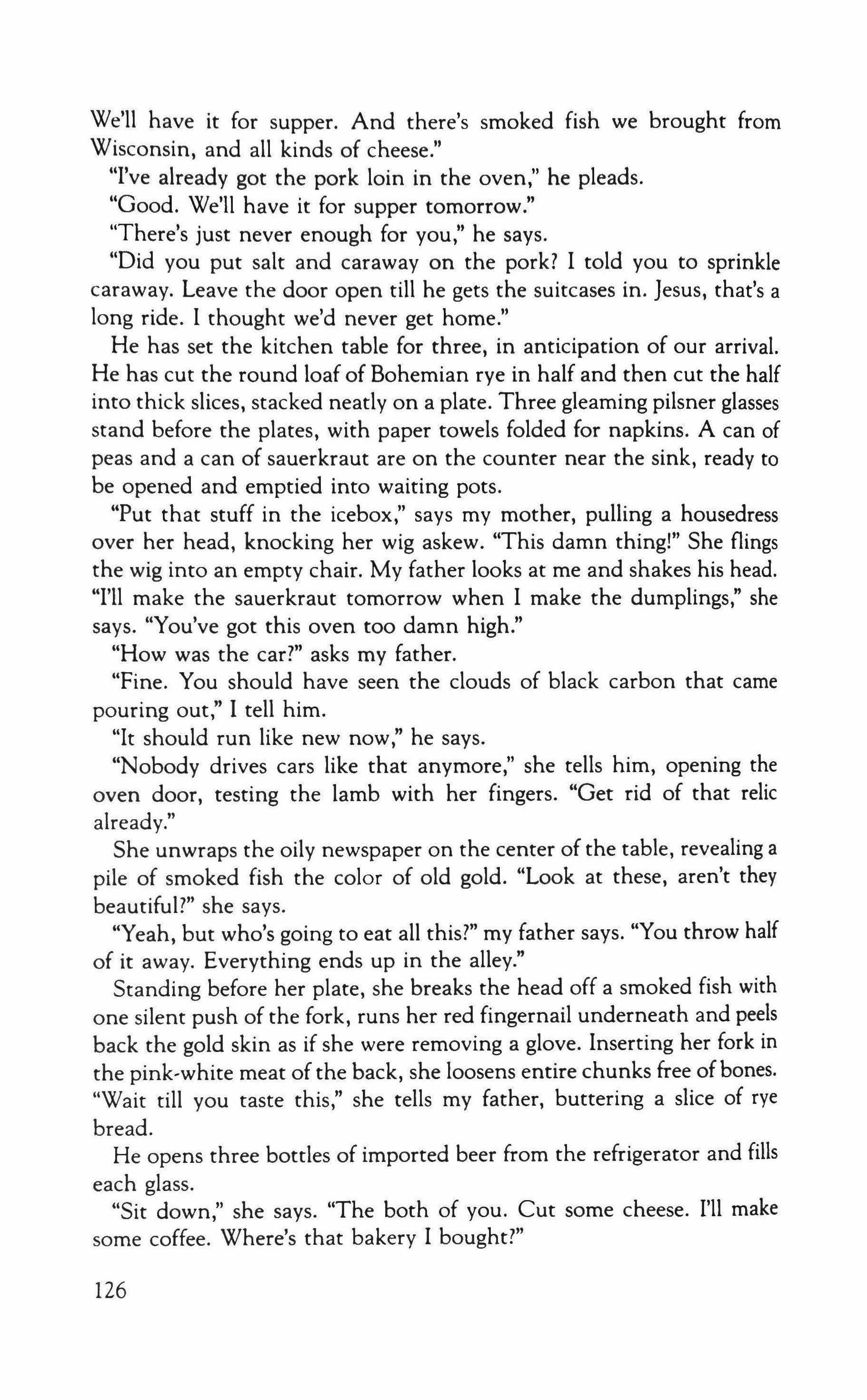
We'll have it for supper. And there's smoked fish we brought from Wisconsin, and all kinds of cheese."
"I've already got the pork loin in the oven," he pleads.
"Good. We'll have it for supper tomorrow."
"There's just never enough for you," he says.
"Did you put salt and caraway on the pork? I told you to sprinkle caraway. Leave the door open till he gets the suitcases in. Jesus, that's a long ride. I thought we'd never get home."
He has set the kitchen table for three, in anticipation of our arrival. He has cut the round loaf of Bohemian rye in half and then cut the half into thick slices, stacked neatly on a plate. Three gleaming pilsner glasses stand before the plates, with paper towels folded for napkins. A can of peas and a can of sauerkraut are on the counter near the sink, ready to be opened and emptied into waiting pots.
"Put that stuff in the icebox," says my mother, pulling a housedress over her head, knocking her wig askew. "This damn thing!" She flings the wig into an empty chair. My father looks at me and shakes his head. "I'll make the sauerkraut tomorrow when I make the dumplings," she says. "You've got this oven too damn high."
"How was the car?" asks my father.
"Fine. You should have seen the clouds of black carbon that came pouring out," I tell him.
"It should run like new now," he says.
"Nobody drives cars like that anymore," she tells him, opening the oven door, testing the lamb with her fingers. "Get rid of that relic already."
She unwraps the oily newspaper on the center of the table, revealing a pile of smoked fish the color of old gold. "Look at these, aren't they beautiful?" she says.
"Yeah, but who's going to eat all this?" my father says. "You throw half of it away. Everything ends up in the aIley."
Standing before her plate, she breaks the head off a smoked fish with one silent push of the fork, runs her red fingernail underneath and peels back the gold skin as if she were removing a glove. Inserting her fork in the pink-white meat of the back, she loosens entire chunks free ofbones. "Wait till you taste this," she tells my father, buttering a slice of rye bread.
He opens three botdes of imported beer from the refrigerator and fills each glass.
"Sit down," she says. "The both of you. Cut some cheese. I'll make some coffee. Where's that bakery I bought?"
126
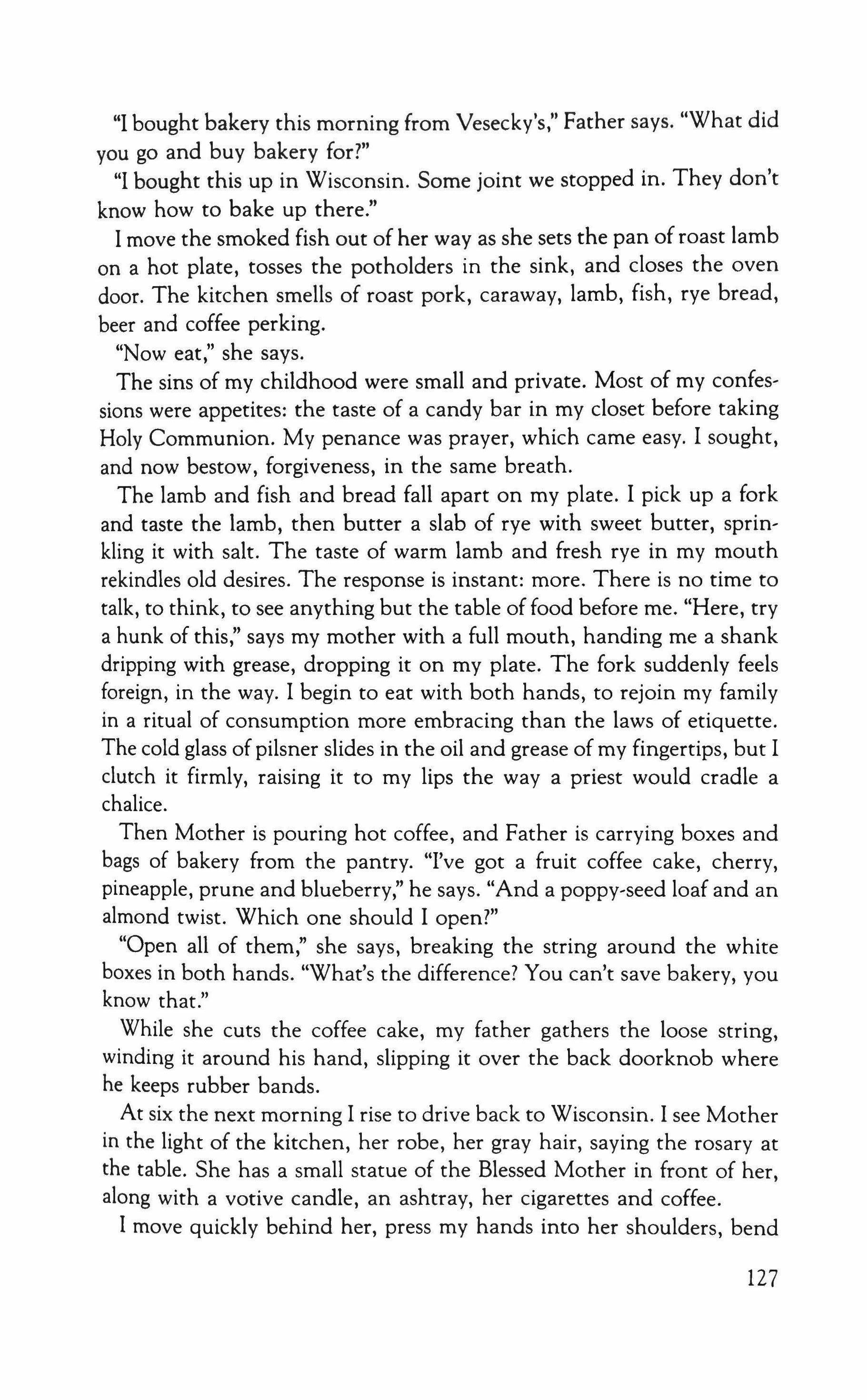
"I bought bakery this morning from Vesecky's," Father says. "What did you go and buy bakery for?"
"I bought this up in Wisconsin. Some joint we stopped in. They don't know how to bake up there."
I move the smoked fish out of her way as she sets the pan of roast lamb on a hot plate, tosses the potholders in the sink, and closes the oven door. The kitchen smells of roast pork, caraway, lamb, fish, rye bread, beer and coffee perking.
"Now eat," she says.
The sins of my childhood were small and private. Most of my confessions were appetites: the taste of a candy bar in my closet before taking Holy Communion. My penance was prayer, which came easy. I sought, and now bestow, forgiveness, in the same breath.
The lamb and fish and bread fall apart on my plate. I pick up a fork and taste the lamb, then butter a slab of rye with sweet butter, sprinkling it with salt. The taste of warm lamb and fresh rye in my mouth rekindles old desires. The response is instant: more. There is no time to talk, to think, to see anything but the table of food before me. "Here, try a hunk of this," says my mother with a full mouth, handing me a shank dripping with grease, dropping it on my plate. The fork suddenly feels foreign, in the way. I begin to eat with both hands, to rejoin my family in a ritual of consumption more embracing than the laws of etiquette. The cold glass of pilsner slides in the oil and grease of my fingertips, but I clutch it firmly, raising it to my lips the way a priest would cradle a chalice.
Then Mother is pouring hot coffee, and Father is carrying boxes and bags of bakery from the pantry. "I've got a fruit coffee cake, cherry, pineapple, prune and blueberry," he says. "And a poppy-seed loaf and an almond twist. Which one should I open?"
"Open all of them," she says, breaking the string around the white boxes in both hands. "What's the difference? You can't save bakery, you know that."
While she cuts the coffee cake, my father gathers the loose string, winding it around his hand, slipping it over the back doorknob where he keeps rubber bands.
At six the next morning I rise to drive back to Wisconsin. I see Mother in the light of the kitchen, her robe, her gray hair, saying the rosary at the table. She has a small statue of the Blessed Mother in front of her, along with a votive candle, an ashtray, her cigarettes and coffee.
I move quickly behind her, press my hands into her shoulders, bend
127
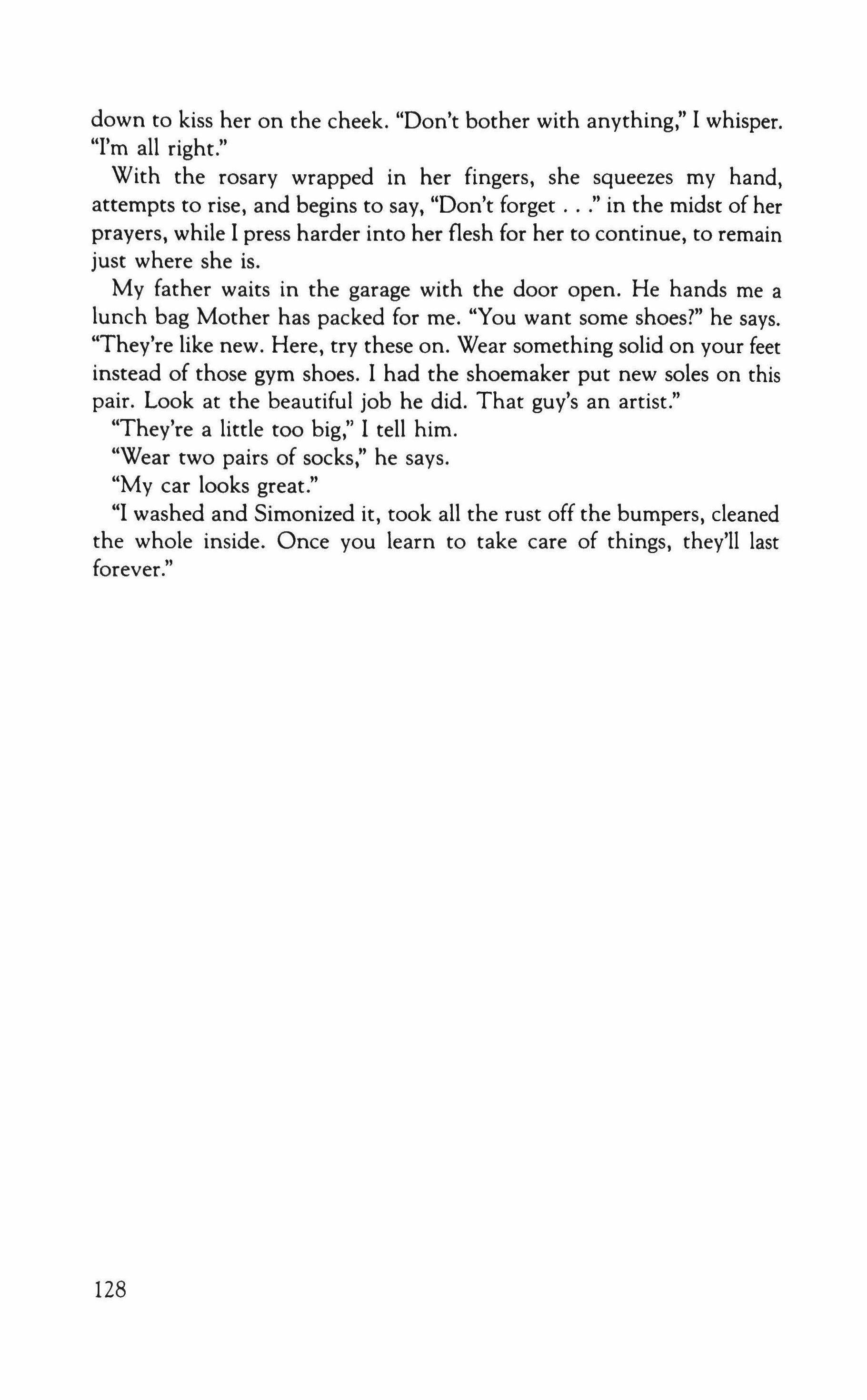
down to kiss her on the cheek. "Don't bother with anything," I whisper. "I'm all right."
With the rosary wrapped in her fingers, she squeezes my hand, attempts to rise, and begins to say, "Don't forget in the midst of her prayers, while I press harder into her flesh for her to continue, to remain just where she is.
My father waits in the garage with the door open. He hands me a lunch bag Mother has packed for me. "You want some shoes?" he says. "They're like new. Here, try these on. Wear something solid on your feet instead of those gym shoes. I had the shoemaker put new sales on this pair. Look at the beautiful job he did. That guy's an artist."
"They're a little too big," I tell him.
"Wear two pairs of socks," he says.
"My car looks great."
"I washed and Simonized it, took all the rust off the bumpers, cleaned the whole inside. Once you learn to take care of things, they'll last forever."
128
Two Poems
Roland Flint
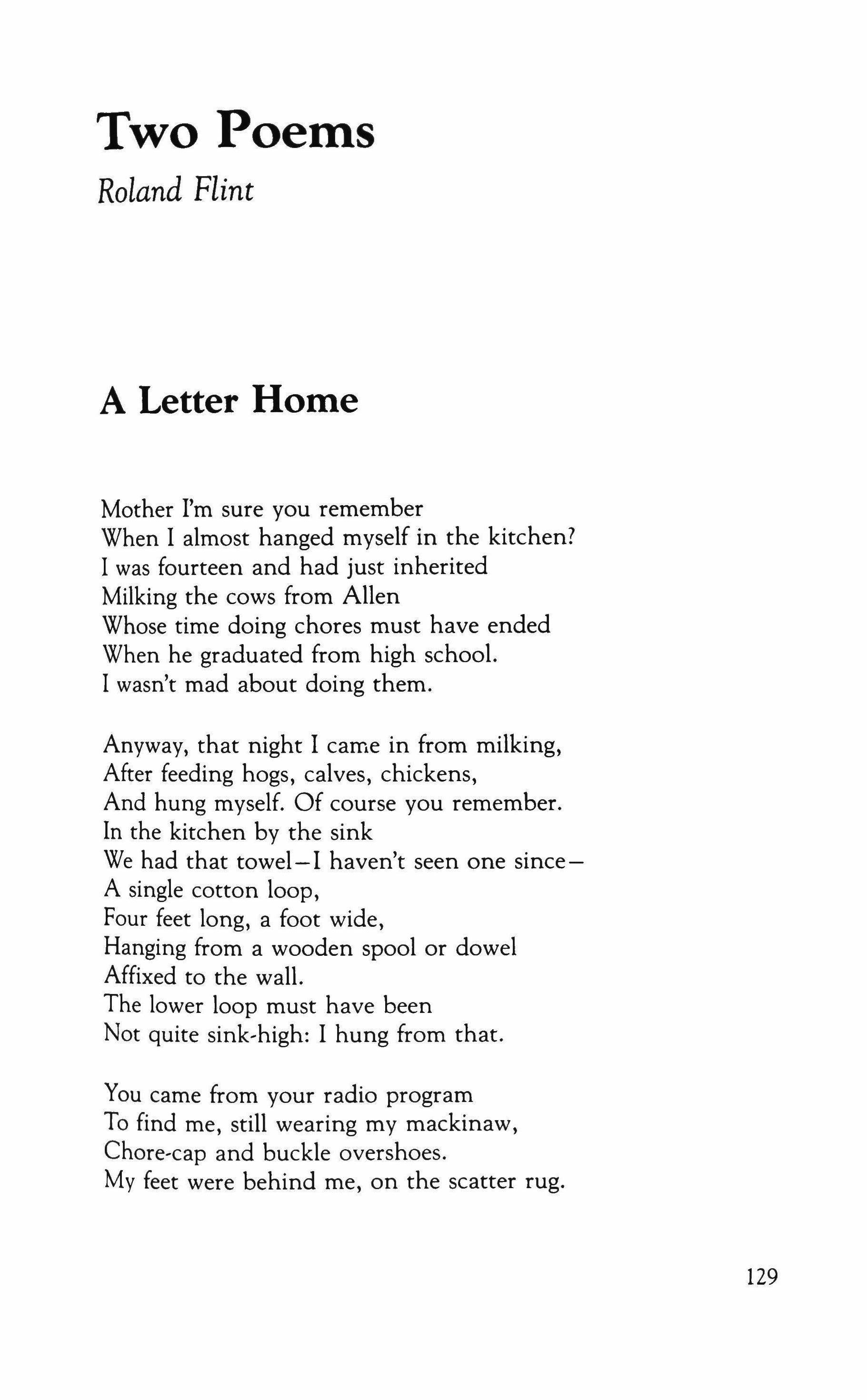
A Letter Home
Mother I'm sure you remember
When 1 almost hanged myself in the kitchen? 1 was fourteen and had just inherited Milking the cows from Allen Whose time doing chores must have ended When he graduated from high school. 1 wasn't mad about doing them.
Anyway, that night 1 came in from milking, After feeding hogs, calves, chickens, And hung myself. Of course you remember. In the kitchen by the sink We had that towel-I haven't seen one since
A single cotton loop, Four feet long, a foot wide, Hanging from a wooden spool or dowel Affixed to the wall. The lower loop must have been Not quite sink-high: 1 hung from that.
You came from your radio program To find me, still wearing my mackinaw, Chore-cap and buckle overshoes. My feet were behind me, on the scatter rug.
129
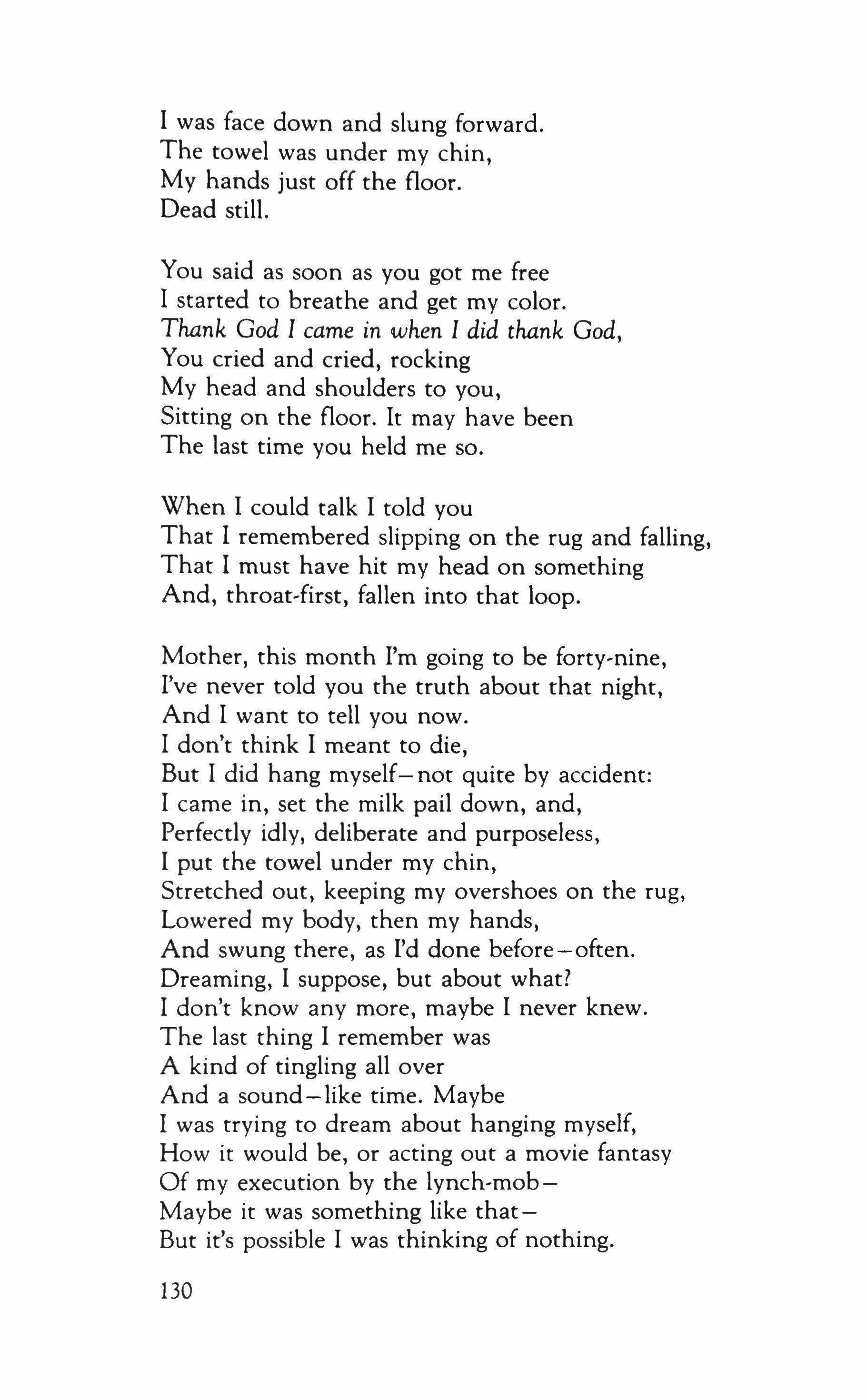
I was face down and slung forward. The towel was under my chin, My hands just off the floor. Dead still.
You said as soon as you got me free I started to breathe and get my color. Thank God I came in when I did thank God, You cried and cried, rocking My head and shoulders to you, Sitting on the floor. It may have been The last time you held me so.
When I could talk I told you
That I remembered slipping on the rug and falling, That I must have hit my head on something And, throat-first, fallen into that loop.
Mother, this month I'm going to be forty-nine, I've never told you the truth about that night, And I want to tell you now.
I don't think I meant to die, But I did hang myself-not quite by accident: I came in, set the milk pail down, and, Perfectly idly, deliberate and purposeless, I put the towel under my chin, Stretched out, keeping my overshoes on the rug, Lowered my body, then my hands, And swung there, as I'd done before-often. Dreaming, I suppose, but about what?
I don't know any more, maybe I never knew. The last thing I remember was A kind of tingling all over And a sound-like time. Maybe I was trying to dream about hanging myself, How it would be, or acting out a movie fantasy Of my execution by the lynch,mobMaybe it was something like thatBut it's possible I was thinking of nothing.
130

What a nightmare I was to youI might have died many times, From carelessness or experimenting: I almost drowned when I was seven. It was just luck I didn't fall twenty-five feet To the cement floor of the potato warehouse. I was side-swiped twice by cars, hit by a truck. All from recklessness, all my fault. When I was fifteen, I dove From a tree and knocked myself out On a rock in the river's bottom. I played on the tops of moving freight cars. Dove into snow-banks from the roof of a store. Three times, once driving, I was in cars or trucks that rolled over.
And once, with a bellyful of beer 1 tried to chugalug a (stolen) fifth of Seagram's whiskey. All this before I was nineteen. And before I became as I have now become Very careful and willing to live, As you are doing, for a long time.
1 have been brooding on all those we know Who have been killed in a few seconds' surprise. And about altering this one incident for youIf not quite removing it From that list you must have made by now Of the merciless tricks freak accidents can pull. We don't have to name our dead, do we?
I'm sorry I lied. I must have thought I'd catch hell. I know it gave you nightmares. And I've had mine: when Elizabeth was two She was standing on the car seat beside me, 1 was driving, we were taking a big curve, And the passenger door swung open. She did not quite fall, But I've dreamed it over, waking and sleeping, Ever since-and she's almost nineteen now.
131
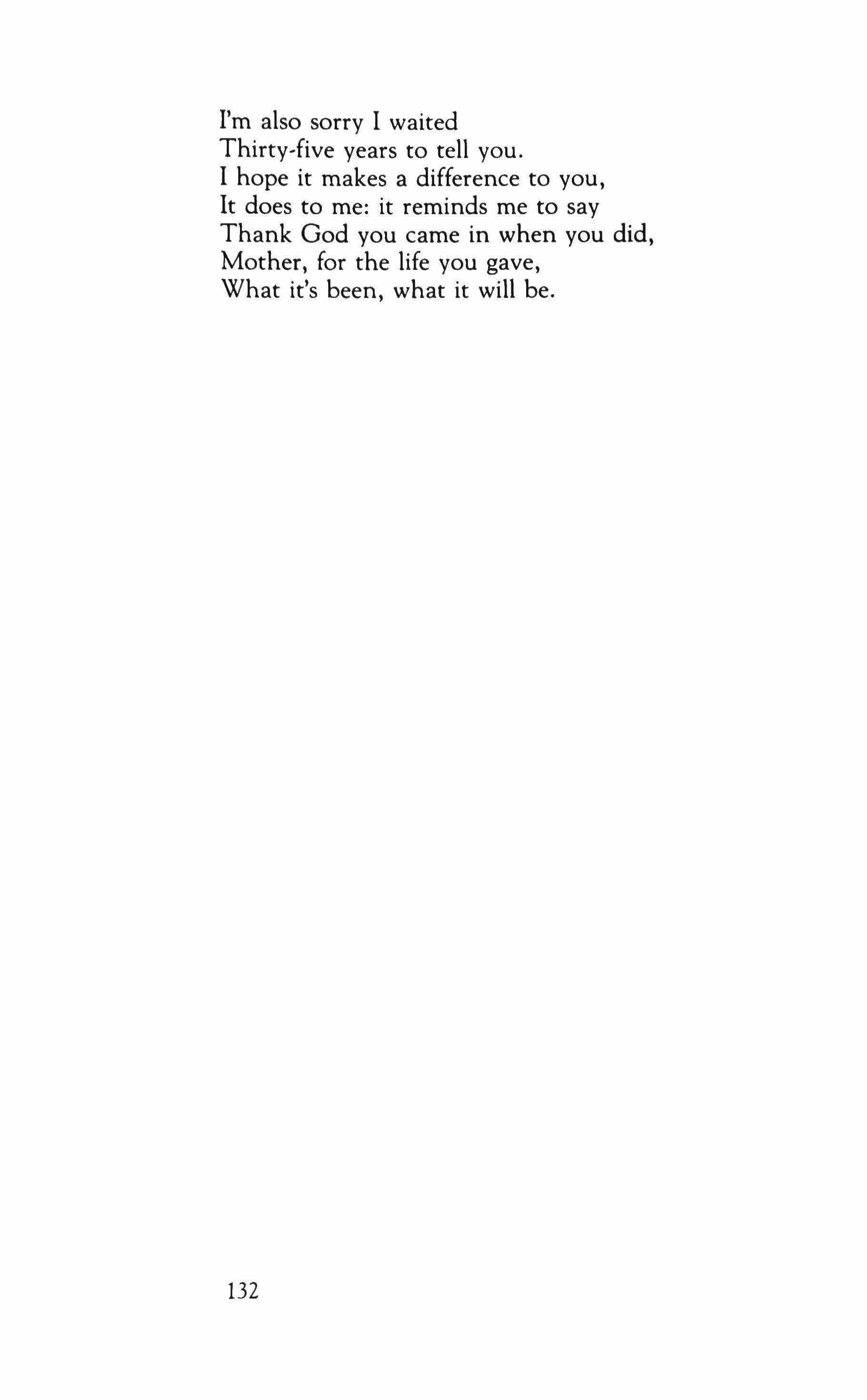
I'm also sorry I waited Thirty-five years to tell you. I hope it makes a difference to you, It does to me: it reminds me to say Thank God you came in when you did, Mother, for the life you gave, What it's been, what it will be.
132
Jim
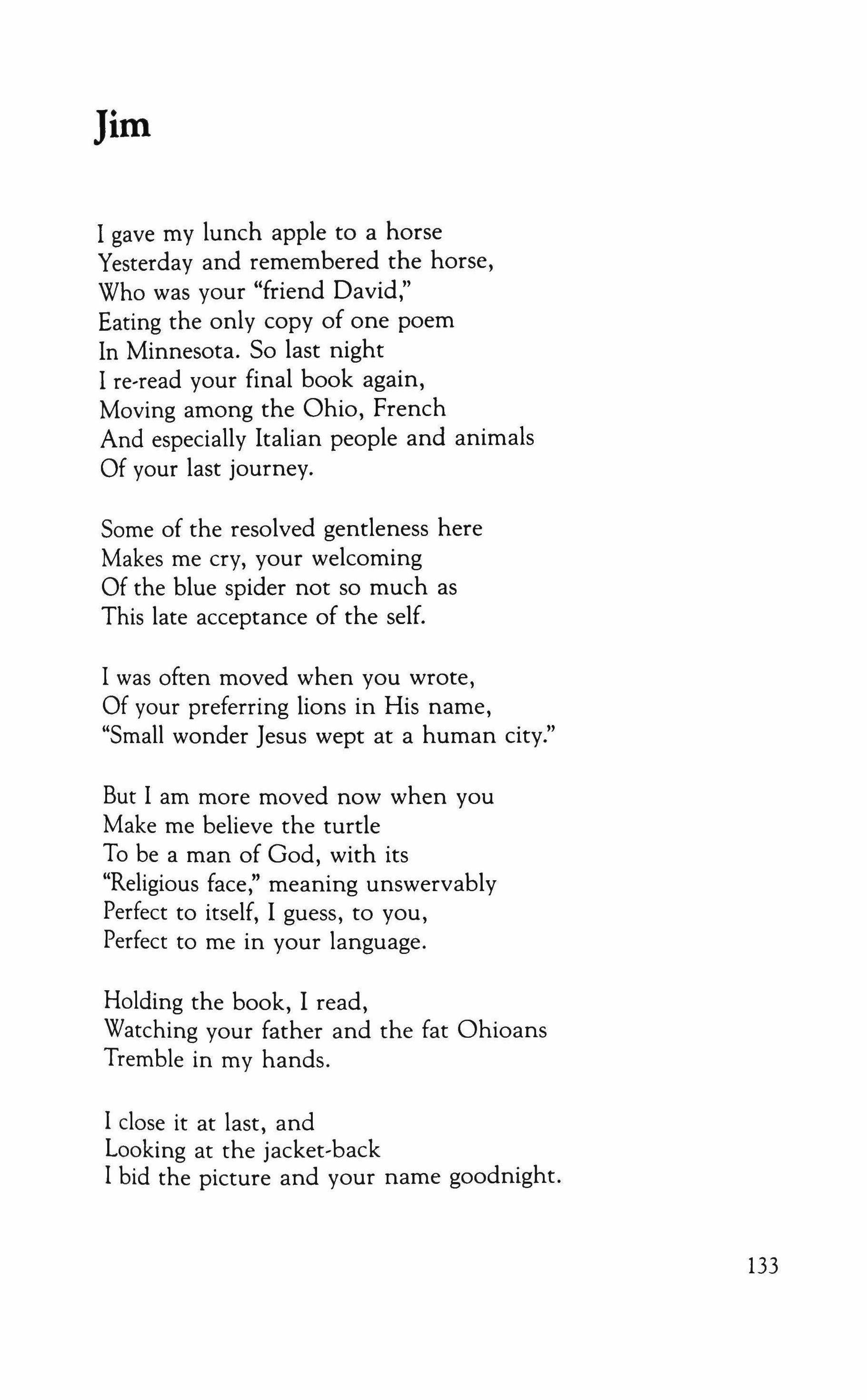
I gave my lunch apple to a horse Yesterday and remembered the horse, Who was your "friend David," Eating the only copy of one poem In Minnesota. So last night I re-read your final book again, Moving among the Ohio, French And especially Italian people and animals Of your last journey.
Some of the resolved gentleness here Makes me cry, your welcoming Of the blue spider not so much as This late acceptance of the self.
I was often moved when you wrote, Of your preferring lions in His name, "Small wonder Jesus wept at a human city."
But I am more moved now when you Make me believe the turtle To be a man of God, with its "Religious face," meaning unswervably Perfect to itself, I guess, to you, Perfect to me in your language.
Holding the book, I read, Watching your father and the fat Ohioans Tremble in my hands.
I close it at last, and Looking at the jacket-back I bid the picture and your name goodnight.
133
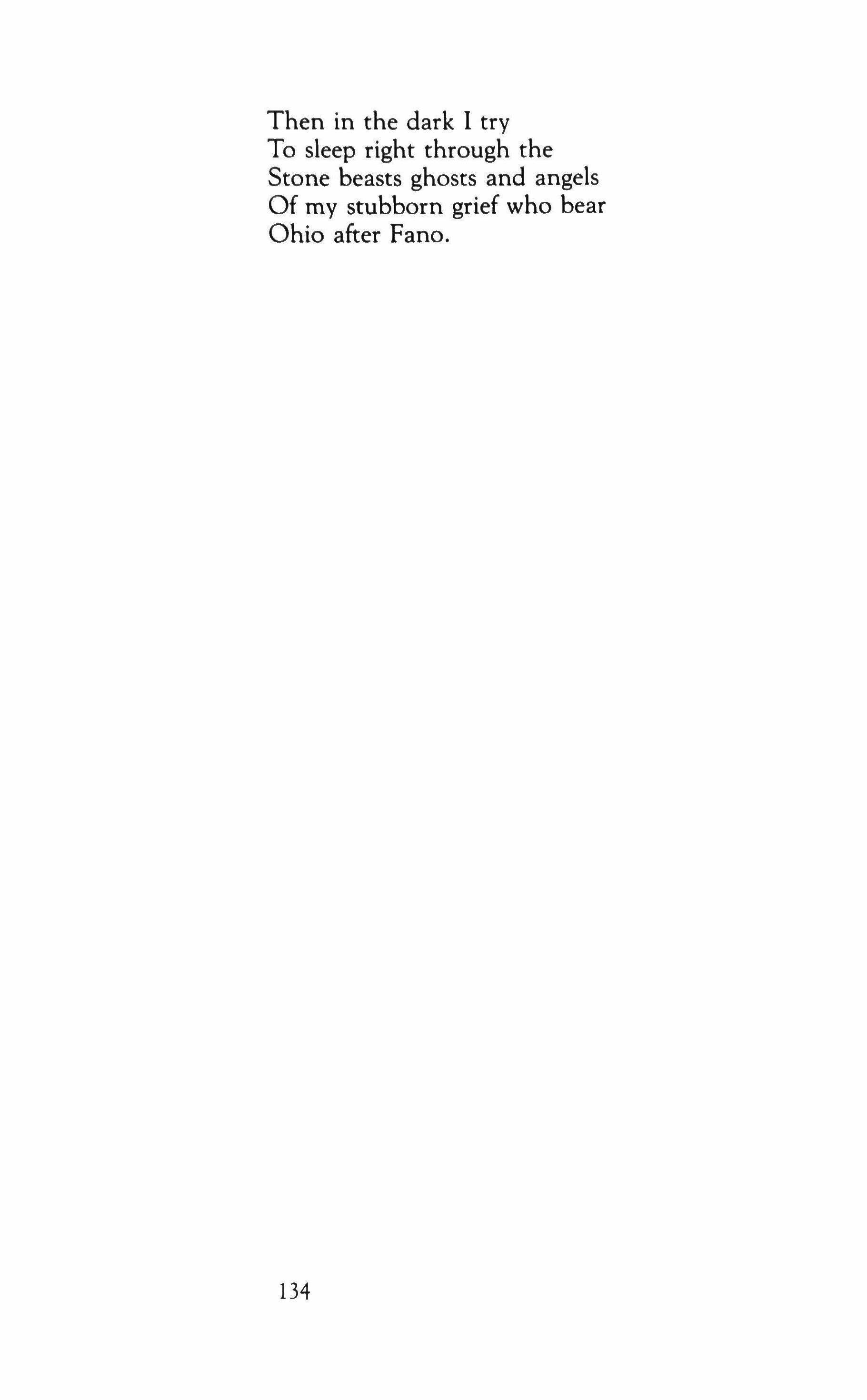
Then in the dark I try To sleep right through the Stone beasts ghosts and angels Of my stubborn grief who bear Ohio after Fano.
134
Three Poems
Sandra McPherson
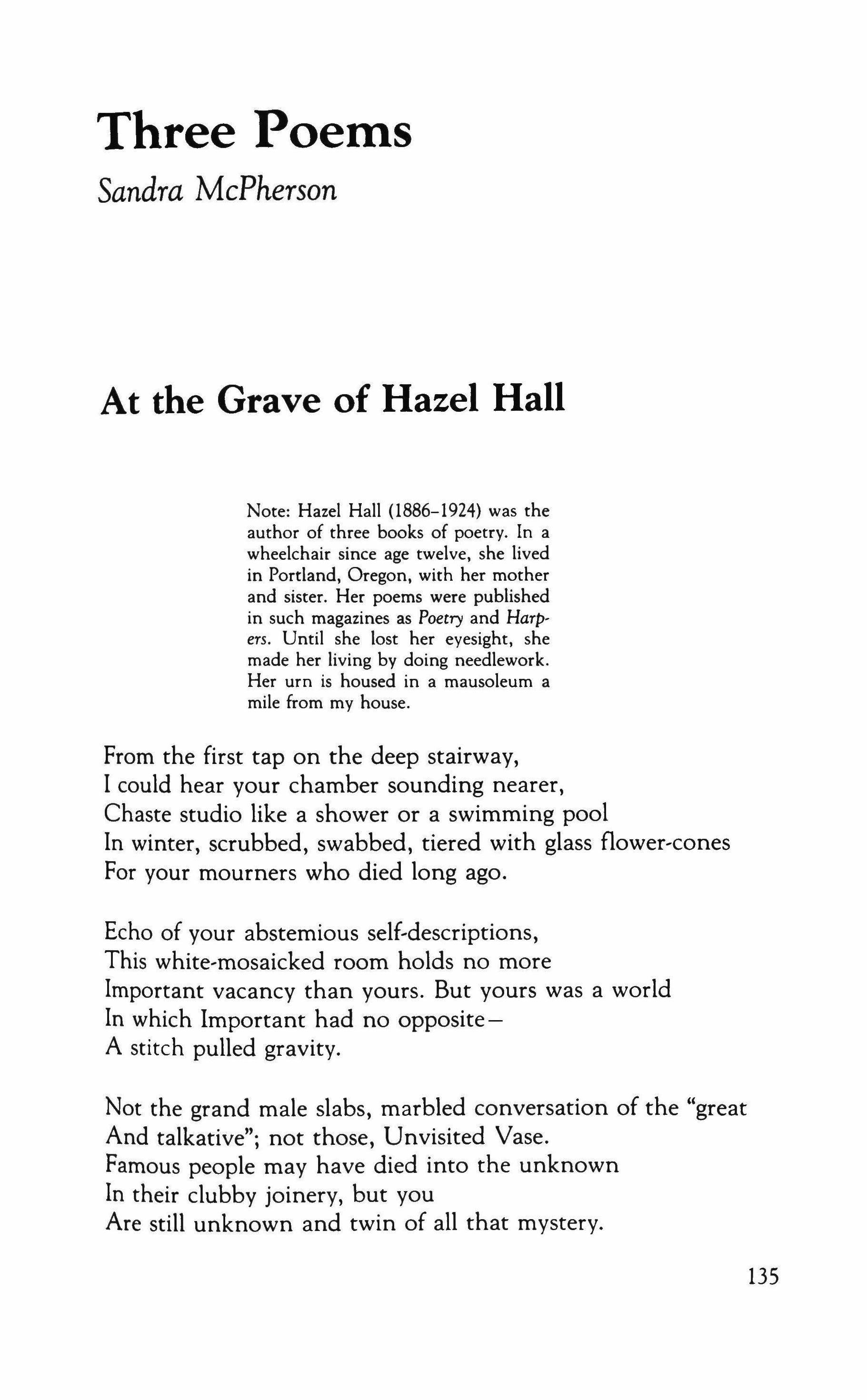
At the Grave of Hazel Hall
Note: Hazel Hall (1886-1924) was the author of three books of poetry. In a wheelchair since age twelve. she lived in Portland, Oregon. with her mother and sister. Her poems were published in such magazines as Poetry and Harpers. Until she lost her eyesight. she made her living by doing needlework. Her urn is housed in a mausoleum a mile from my house.
From the first tap on the deep stairway, I could hear your chamber sounding nearer, Chaste studio like a shower or a swimming pool In winter, scrubbed, swabbed, tiered with glass flower-cones For your mourners who died long ago.
Echo of your abstemious self-descriptions, This white-mosaicked room holds no more Important vacancy than yours. But yours was a world In which Important had no oppositeA stitch pulled gravity.
Not the grand male slabs, marbled conversation of the "great And talkative"; not those, Unvisited Vase. Famous people may have died into the unknown In their clubby joinery, but you Are still unknown and twin of all that mystery.
135
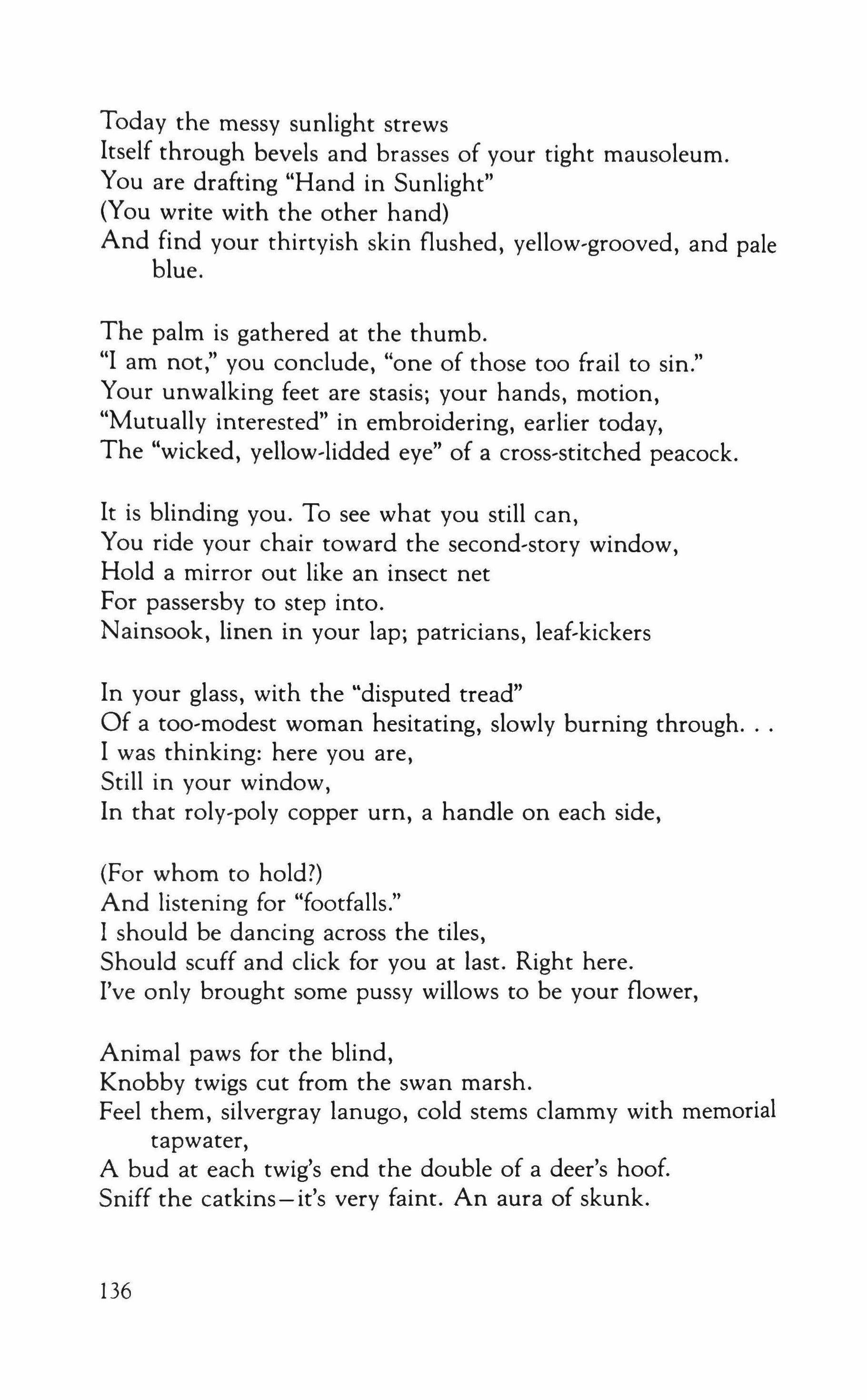
Today the messy sunlight strews Itself through bevels and brasses of your tight mausoleum.
You are drafting "Hand in Sunlight" (You write with the other hand) And find your thirtvish skin flushed, yellow-grooved, and pale blue.
The palm is gathered at the thumb. "I am not," you conclude, "one of those too frail to sin." Your unwalking feet are stasis; your hands, motion, "Mutually interested" in embroidering, earlier today, The "wicked, yellow-lidded eye" of a cross-stitched peacock.
It is blinding you. To see what you still can, You ride your chair toward the second-story window, Hold a mirror out like an insect net For passersby to step into. Nainsook, linen in your lap; patricians, leaf-kickers
In your glass, with the "disputed tread" Of a too-modest woman hesitating, slowly burning through I was thinking: here you are, Still in your window, In that roly-poly copper urn, a handle on each side,
(For whom to hold?) And listening for "footfalls."
I should be dancing across the tiles, Should scuff and click for you at last. Right here. I've only brought some pussy willows to be your flower,
Animal paws for the blind, Knobby twigs cut from the swan marsh. Feel them, silvergray lanugo, cold stems clammy with memorial tapwater, A bud at each twig's end the double of a deer's hoof. Sniff the catkins-it's very faint. An aura of skunk.
136
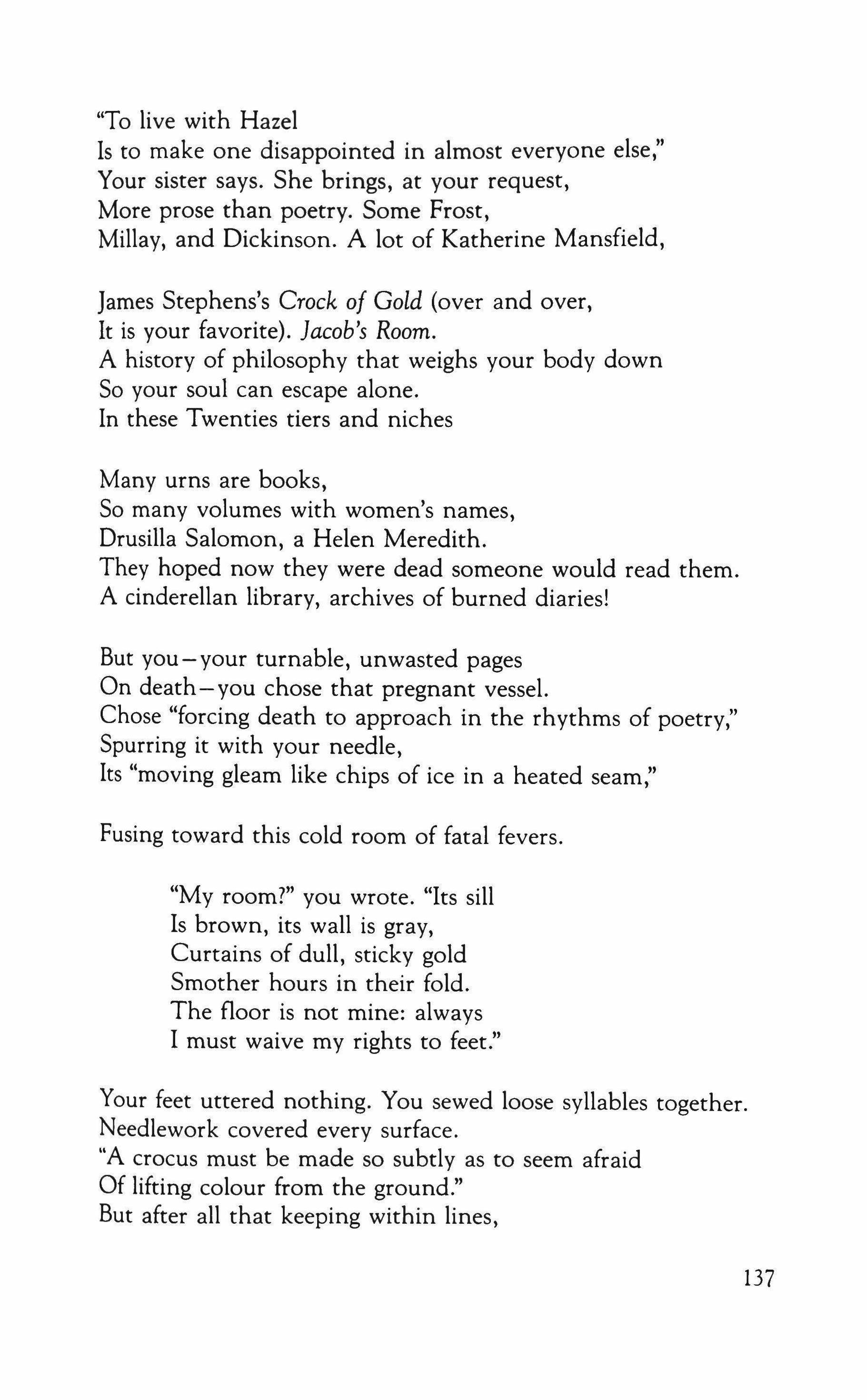
"To live with Hazel Is to make one disappointed in almost everyone else," Your sister says. She brings, at your request, More prose than poetry. Some Frost, Millay, and Dickinson. A lot of Katherine Mansfield,
James Stephens's Crock of Gold (over and over, It is your favorite). Jacob's Room. A history of philosophy that weighs your body down So your soul can escape alone. In these Twenties tiers and niches
Many urns are books, So many volumes with women's names, Drusilla Salomon, a Helen Meredith. They hoped now they were dead someone would read them. A cinderellan library, archives of burned diaries!
But youyour turnable, unwasted pages On deathyou chose that pregnant vessel. Chose "forcing death to approach in the rhythms of poetry," Spurring it with your needle, Its "moving gleam like chips of ice in a heated seam,"
Fusing toward this cold room of fatal fevers.
"My room?" you wrote. "Its sill Is brown, its wall is gray, Curtains of dull, sticky gold Smother hours in their fold. The floor is not mine: always I must waive my rights to feet."
Your feet uttered nothing. You sewed loose syllables together. Needlework covered every surface. "A crocus must be made so subtly as to seem afraid Of lifting colour from the ground."
But after all that keeping within lines,
137

You craved in language incongruity: "A raging thread," "the glitter of sterility," The rip and stab among the dainty, fine Commissions from the growing families up the hill. Liked "despair brilliantly unrepressed"
And "hours of light about to thrust themselves into me Like omnivorous needles into listless cloth." Boldly you entered the crematorium, smoky tavern Of eternal nightlife. "I am seeing so far tonight That I am blinded by the space between me
And the inevitable. Logical smug death Takes me. The body lies unhumorous at length. The moon Bleeds gray light on the meadow And I am weary as a sheep. I have broken with myself, But I lie down with all the tired women,
Every woman's sorrow is my own. I have given, I have given all my hands." And on my second visit I bring a rose. "A fibre of rain" spins down. A bloodless electric organ eternally in sickness and in tune Plays music to another funeral. Whoever came
To yours, you never met another writer. Your mother came to study the two urns, your father's, yours. If she left willows, she saw within a week their ripening pushed Peroxide yellow between the gray, a moppy blossom Which, so slightly jarred, now pollinates the columbarium.
Like us she died. Like us she burned and chose to mix herself with you.
138
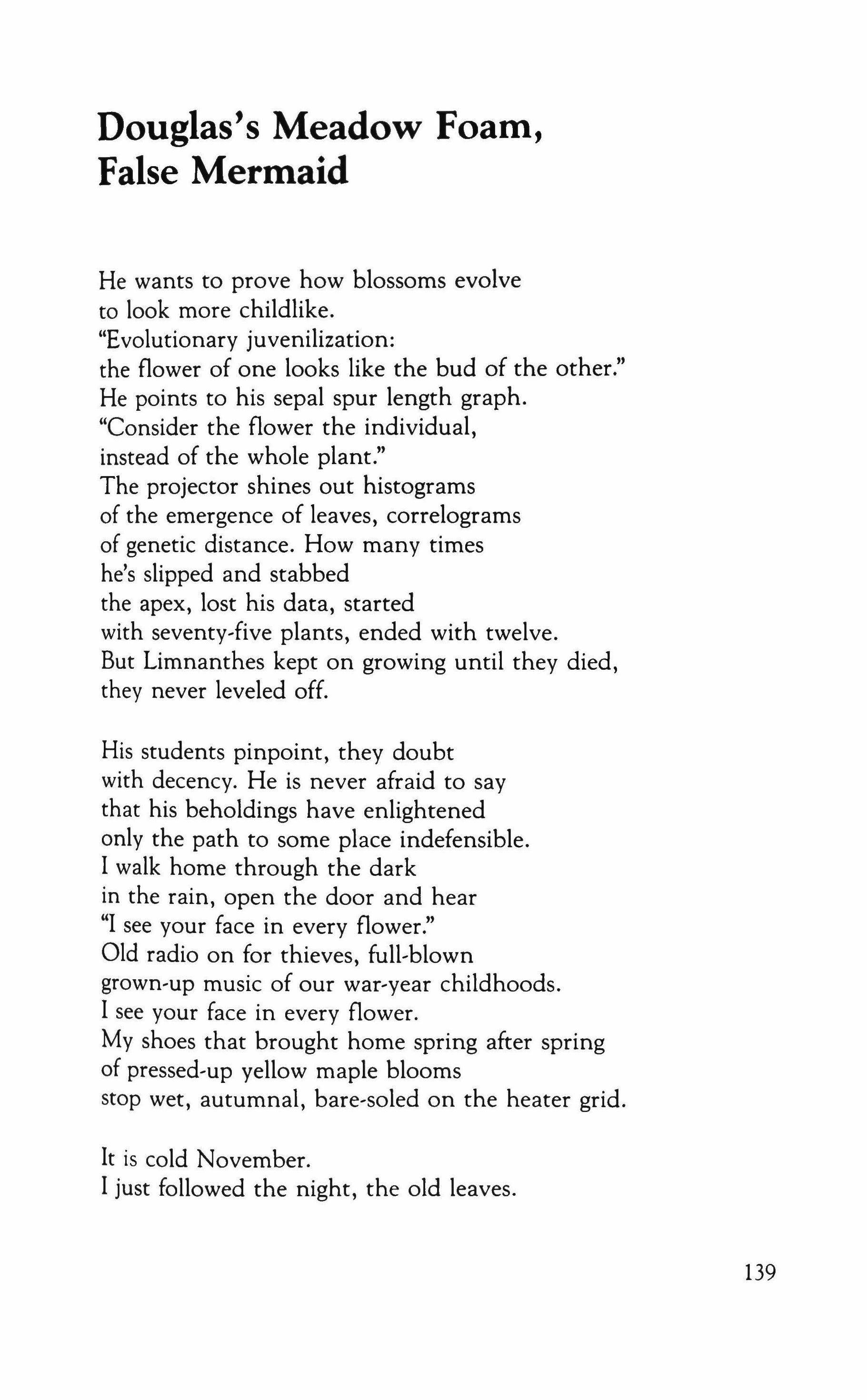
Douglas's Meadow Foam, False
Mermaid
He wants to prove how blossoms evolve to look more childlike.
"Evolutionary juvenilization: the flower of one looks like the bud of the other." He points to his sepal spur length graph. "Consider the flower the individual, instead of the whole plant." The projector shines out histograms of the emergence of leaves, correlograms of genetic distance. How many times he's slipped and stabbed the apex, lost his data, started with seventy-five plants, ended with twelve. But Limnanthes kept on growing until they died, they never leveled off.
His students pinpoint, they doubt with decency. He is never afraid to say that his beholdings have enlightened only the path to some place indefensible. I walk home through the dark in the rain, open the door and hear "I see your face in every flower." Old radio on for thieves, full-blown grown-up music of our war-year childhoods. I see your face in every flower. My shoes that brought home spring after spring of pressed-up yellow maple blooms stop wet, autumnal, bare-soled on the heater grid.
It is cold November. I just followed the night, the old leaves.
139
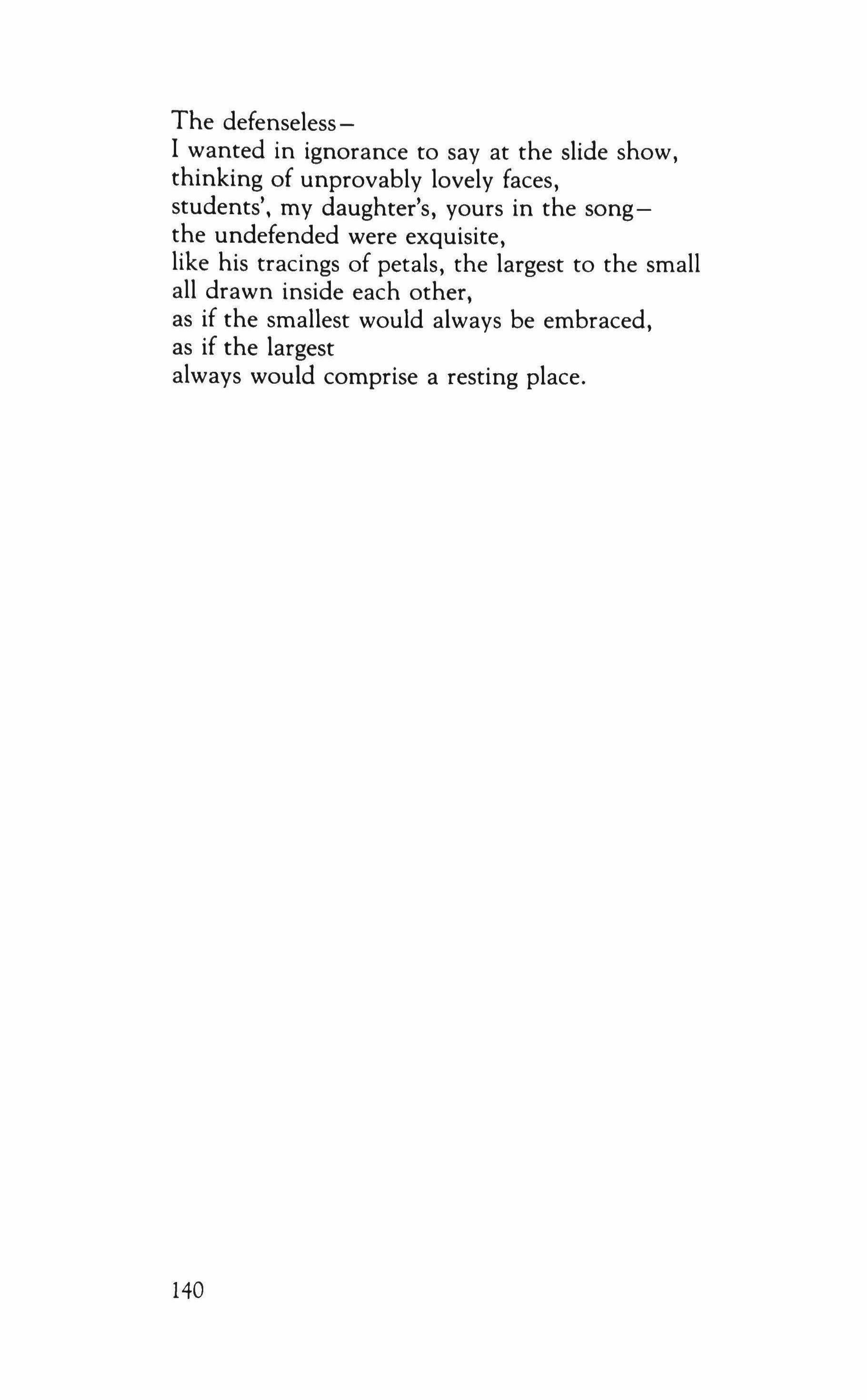
The defenselessI wanted in ignorance to say at the slide show, thinking of unprovably lovely faces, students', my daughter's, yours in the songthe undefended were exquisite, like his tracings of petals, the largest to the small all drawn inside each other, as if the smallest would always be embraced, as if the largest always would comprise a resting place.
140
The Senses

Sorted apart from the wise by childhood, we played with an invention that showed us two views of any hollow
will make it deeper. Aunts and uncles, gone like winter warmth when the door opens, lent us their stereoscope Sundays and slid a box of scenes across the floor. Our mouths still rang with the lemony sap of sourgrass skirting the border between neighbors, between January, February.
Two flowers apiece and the emptying bed began to show us its dimensions, a quadrangle of earth, a trapdoor root-room.
Only when Ursula opened Poe to the Pendulum did we put aside the stereoscope and box of views, and spit out the stems.
We were always eager to listen flat on our backs: "I was sick-sick unto death with that long agony;
I felt that my senses were leaving me." And on we read, letting a candle burn until its pedestal began to bubble and fume, our fingernails fidgeting across new bodies of gooseflesh. Then we could hear it, that "rich musical note,
1
141
the thought of what sweet rest there must be in the grave." We hugged the boards above the crawl-space;
we thought we'd never have the nerve to go down there
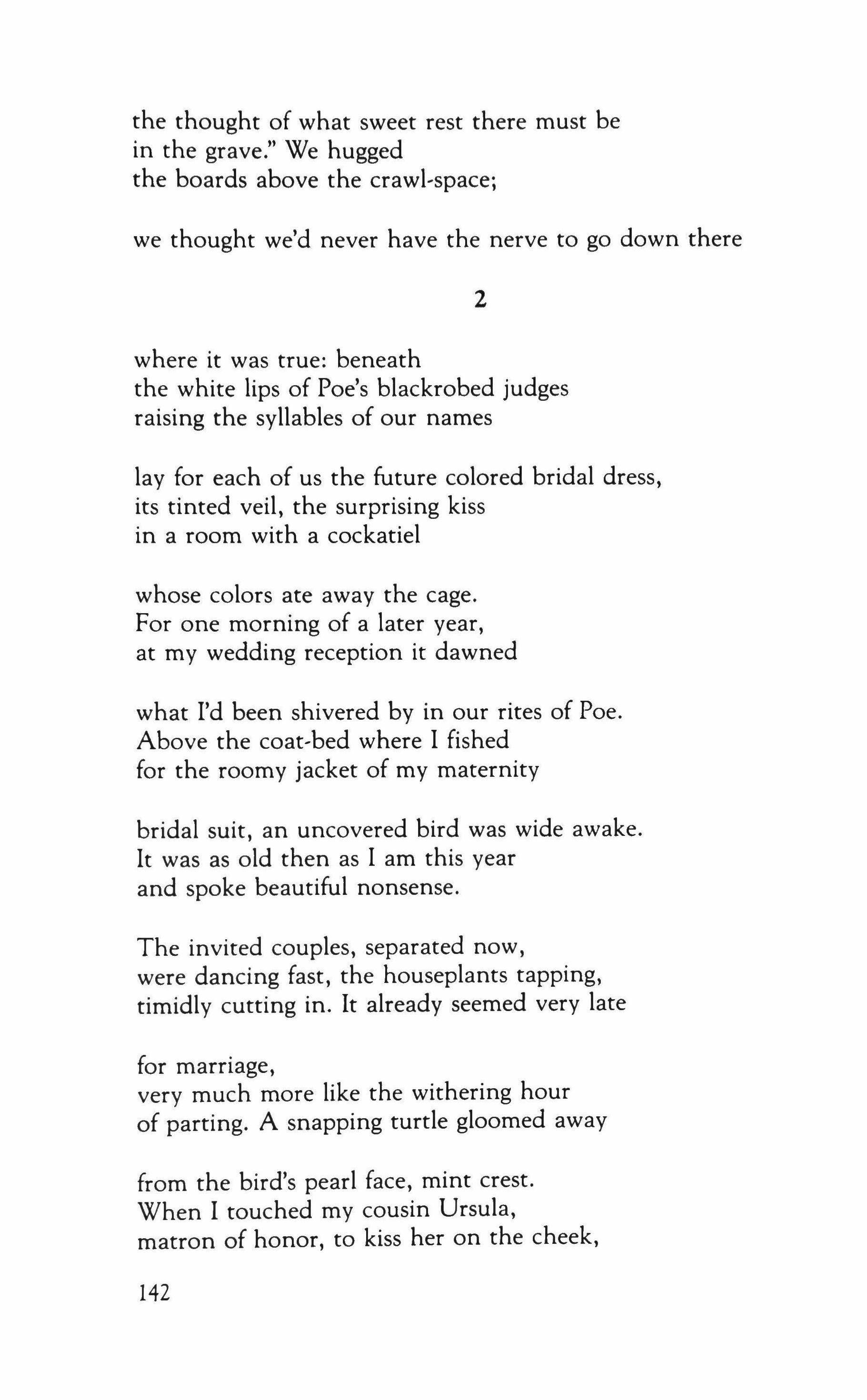
where it was true: beneath the white lips of Poe's blackrobed judges raising the syllables of our names
lay for each of us the future colored bridal dress, its tinted veil, the surprising kiss in a room with a cockatiel
whose colors ate away the cage. For one morning of a later year, at my wedding reception it dawned
what I'd been shivered by in our rites of Poe. Above the coat-bed where I fished for the roomy jacket of my maternity bridal suit, an uncovered bird was wide awake. It was as old then as I am this year and spoke beautiful nonsense.
The invited couples, separated now, were dancing fast, the houseplants tapping, timidly cutting in. It already seemed very late for marriage, very much more like the withering hour of parting. A snapping turtle gloomed away from the bird's pearl face, mint crest. When I touched my cousin Ursula, matron of honor, to kiss her on the cheek,
2
142
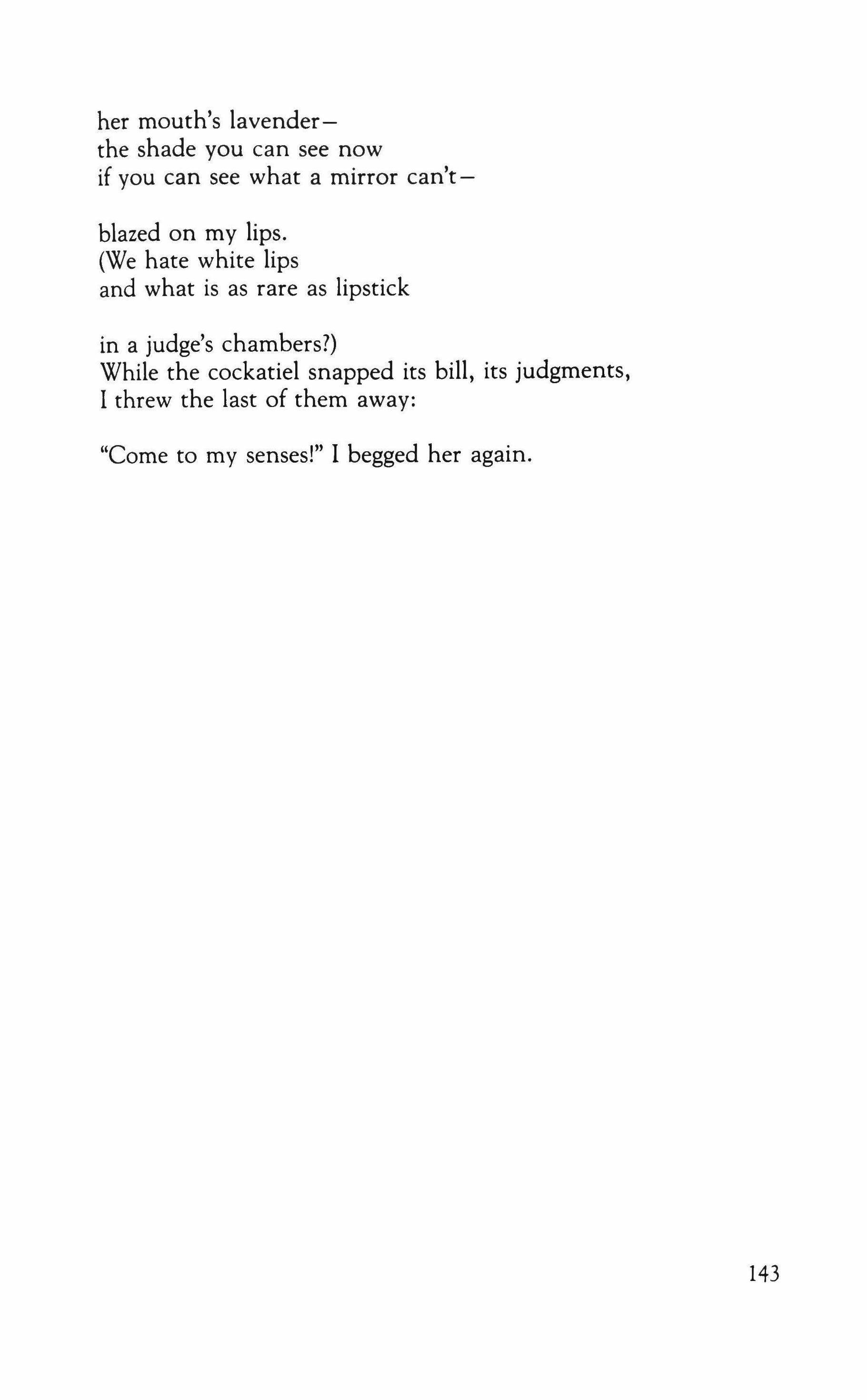
her mouth's lavenderthe shade you can see now if you can see what a mirror can'tblazed on my lips. (We hate white lips and what is as rare as lipstick
in a judge's chambers?)
While the cockatiel snapped its bill, its judgments, I threw the last of them away:
"Come to my senses!" I begged her again.
143
Two Poems
Raymond Carver

Sweet Light
After the winter, grieving and dull, I flourished here all spring. Sweet light
began to fill my chest. I pulled up a chair. Sat for hours in front of the sea.
Listened to the buoy and learned to tell the difference between a bell, and the sound of a bell. I wanted everything behind me. I even wanted to become inhuman. And I did that. I know I did. (She'll back me up on this.)
I remember the morning I closed the lid on memory and turned the handle.
Locking it away forever. Nobody knows what happened to me
out here, sea. Only you and I know. At night, clouds form in front of the moon.
By morning they're gone. And that sweet light I spoke of? That's gone too.
144
The Mail
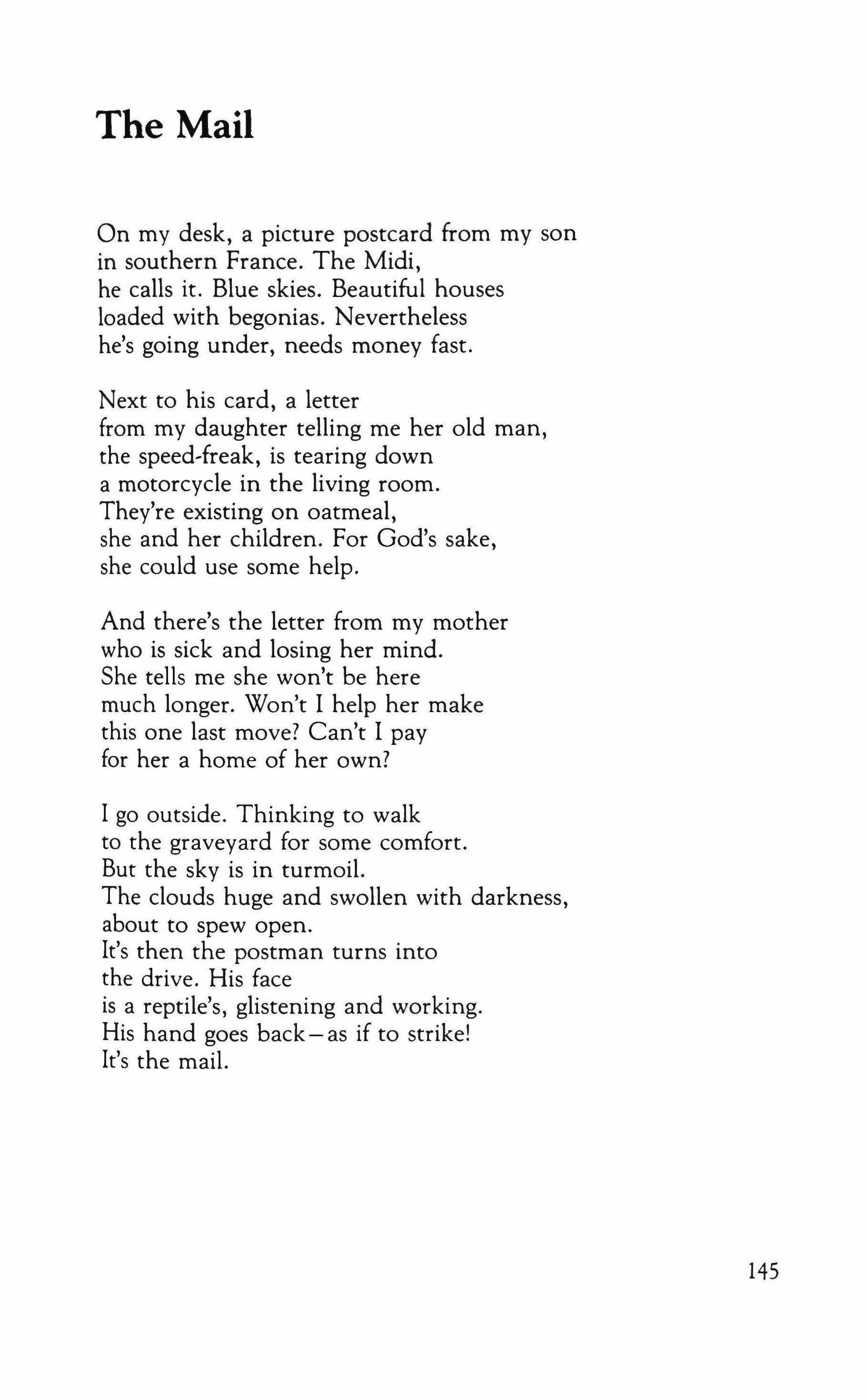
On my desk, a picture postcard from my son in southern France. The Midi, he calls it. Blue skies. Beautiful houses loaded with begonias. Nevertheless he's going under, needs money fast.
Next to his card, a letter from my daughter telling me her old man, the speed-freak, is tearing down a motorcycle in the living room. They're existing on oatmeal, she and her children. For God's sake, she could use some help.
And there's the letter from my mother who is sick and losing her mind. She tells me she won't be here much longer. Won't I help her make this one last move? Can't I pay for her a home of her own?
I go outside. Thinking to walk to the graveyard for some comfort. But the sky is in turmoil. The clouds huge and swollen with darkness, about to spew open. It's then the postman turns into the drive. His face is a reptile's, glistening and working. His hand goes back - as if to strike! It's the mail.
145
Five Poems
Susan Hahn
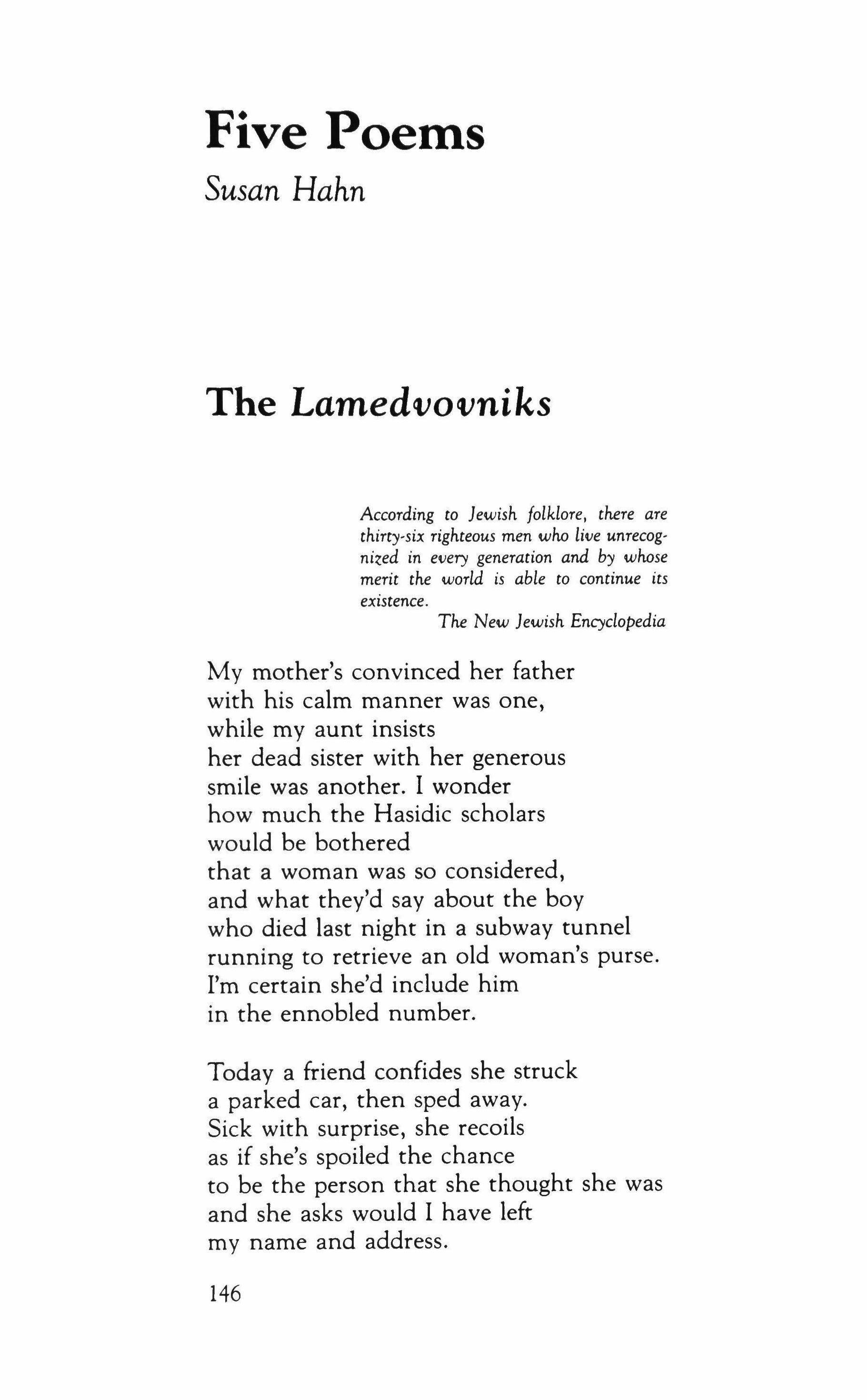
The Lamedvovniks
According to Jewish folklore, there are thirty-six righteous men who live unrecognized in every generation and by whose merit the world is able to continue its existence. The New Jewish Encyclopedia
My mother's convinced her father with his calm manner was one, while my aunt insists her dead sister with her generous smile was another. I wonder how much the Hasidic scholars would be bothered that a woman was so considered, and what they'd say about the boy who died last night in a subway tunnel running to retrieve an old woman's purse. I'm certain she'd include him in the ennobled number.
Today a friend confides she struck a parked car, then sped away. Sick with surprise, she recoils as if she's spoiled the chance to be the person that she thought she was and she asks would I have left my name and address.
146
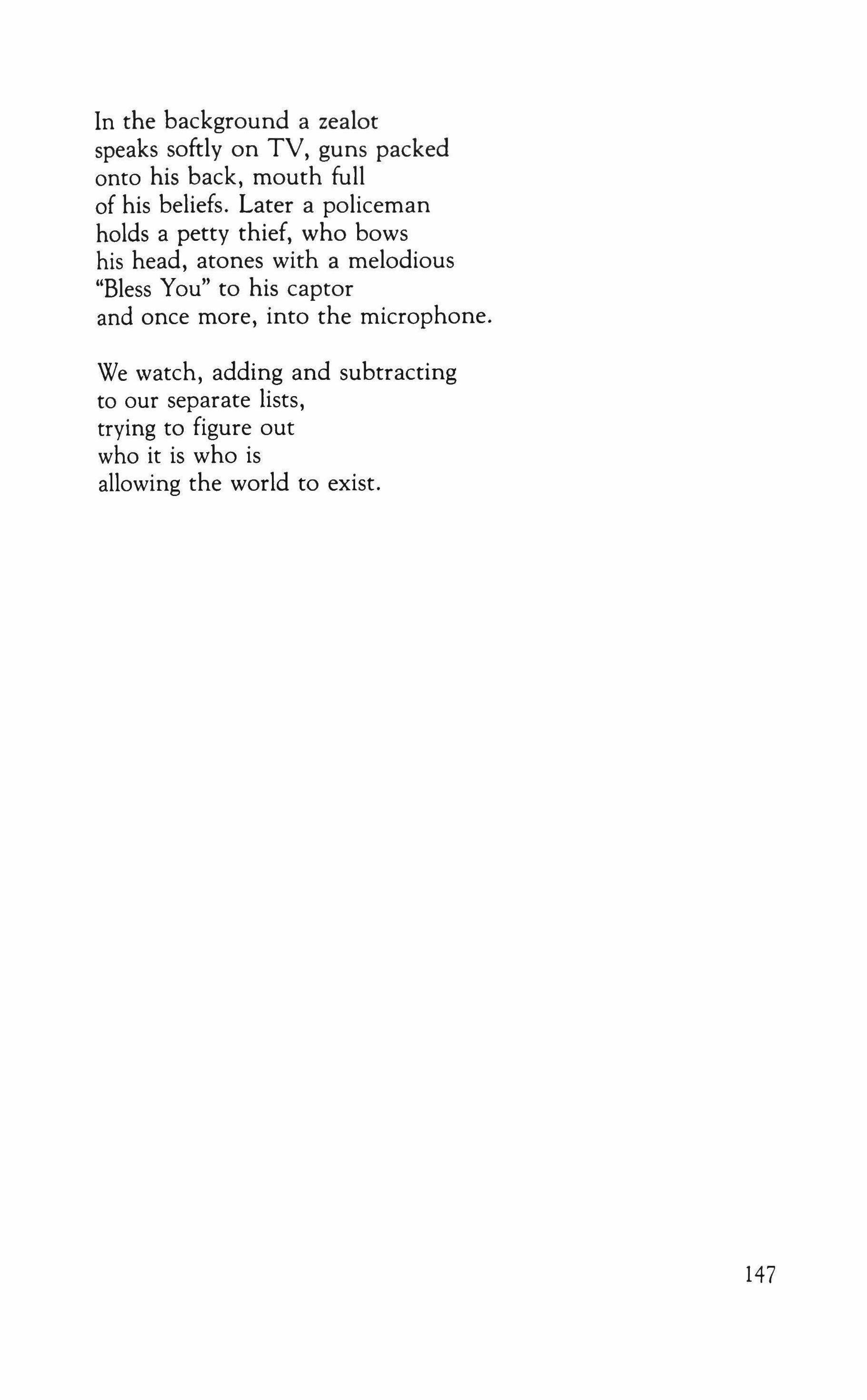
In the background a zealot speaks softly on TV, guns packed onto his back, mouth full of his beliefs. Later a policeman holds a petty thief, who bows his head, atones with a melodious "Bless You" to his captor and once more, into the microphone.
We watch, adding and subtracting to our separate lists, trying to figure out who it is who is allowing the world to exist.
147
Given Name
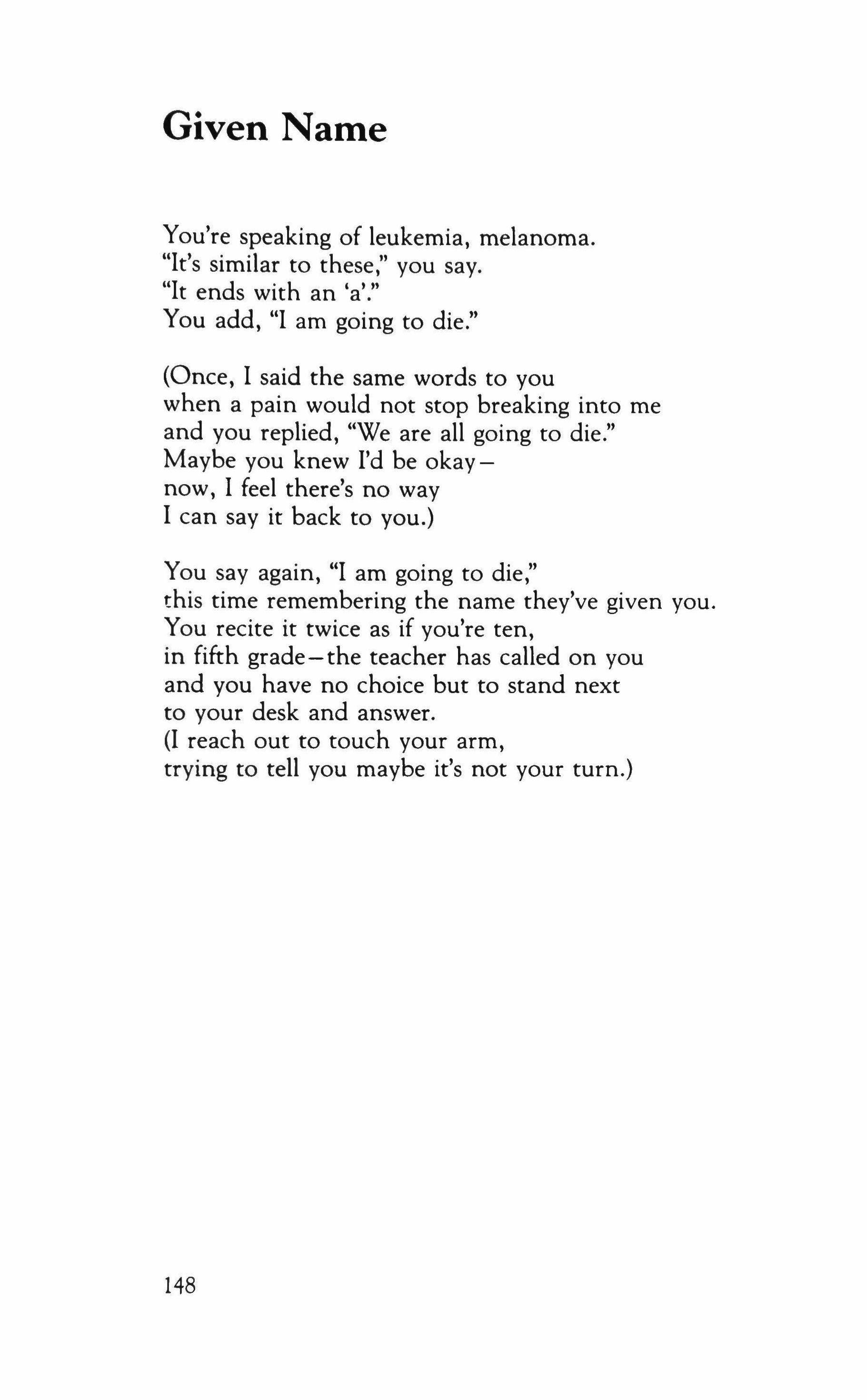
You're speaking of leukemia, melanoma. lilt'S similar to these," you say. "It ends with an 'a'."
You add, "I am going to die."
(Once, I said the same words to you when a pain would not stop breaking into me and you replied, "We are all going to die." Maybe you knew I'd be okaynow, I feel there's no way I can say it back to you.)
You say again, "I am going to die," this time remembering the name they've given you. You recite it twice as if you're ten, in fifth grade - the teacher has called on you and you have no choice but to stand next to your desk and answer.
(I reach out to touch your arm, trying to tell you maybe it's not your turn.)
148
Movie Star
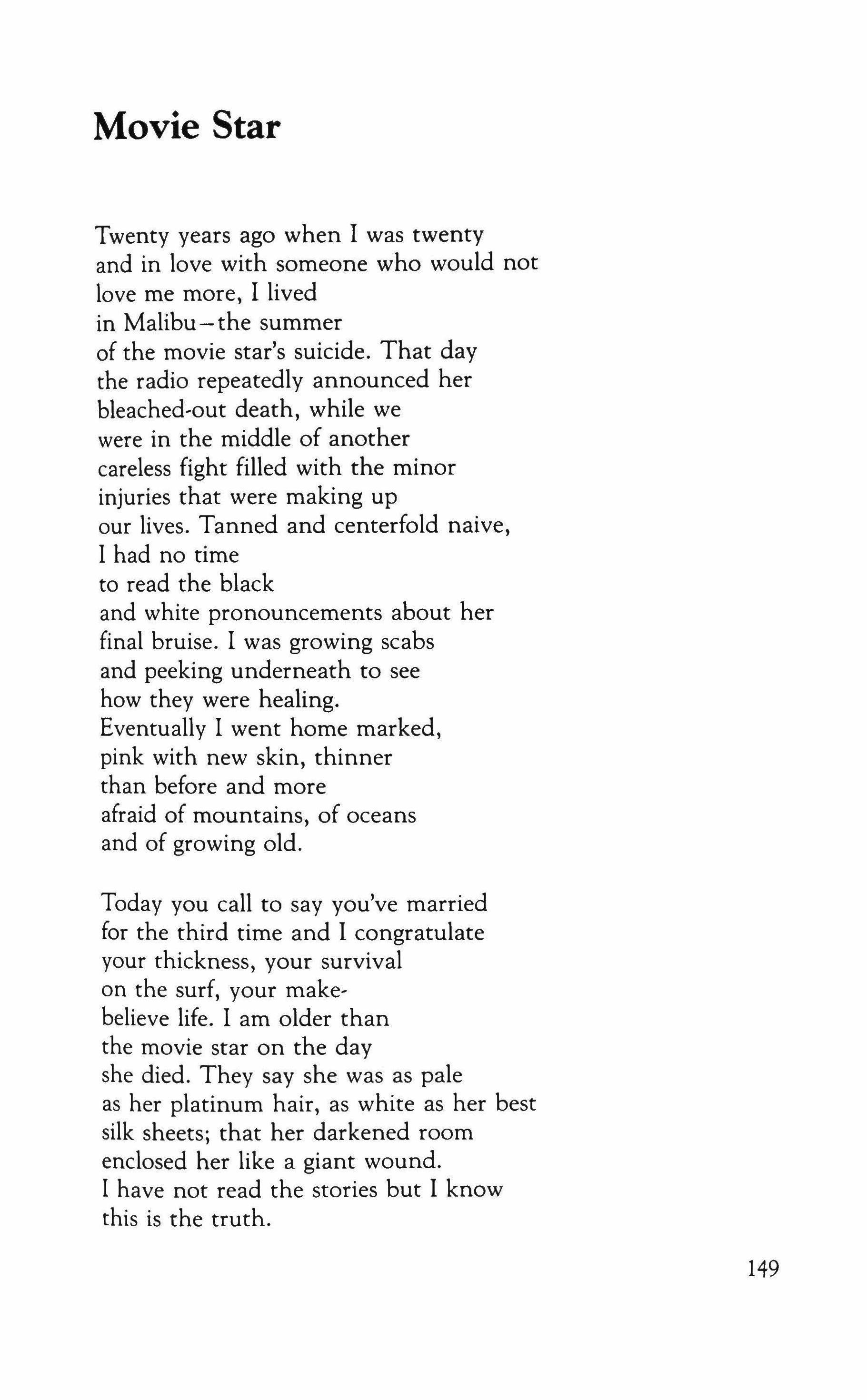
Twenty years ago when I was twenty and in love with someone who would not love me more, I lived in Malibu - the summer of the movie star's suicide. That day the radio repeatedly announced her bleached-out death, while we were in the middle of another careless fight filled with the minor injuries that were making up our lives. Tanned and centerfold naive, I had no time to read the black and white pronouncements about her final bruise. I was growing scabs and peeking underneath to see how they were healing.
Eventually I went home marked, pink with new skin, thinner than before and more afraid of mountains, of oceans and of growing old.
Today you call to say you've married for the third time and I congratulate your thickness, your survival on the surf, your make, believe life. I am older than the movie star on the day she died. They say she was as pale as her platinum hair, as white as her best silk sheets; that her darkened room enclosed her like a giant wound. I have not read the stories but I know this is the truth.
149
If I Set Up the Chairs
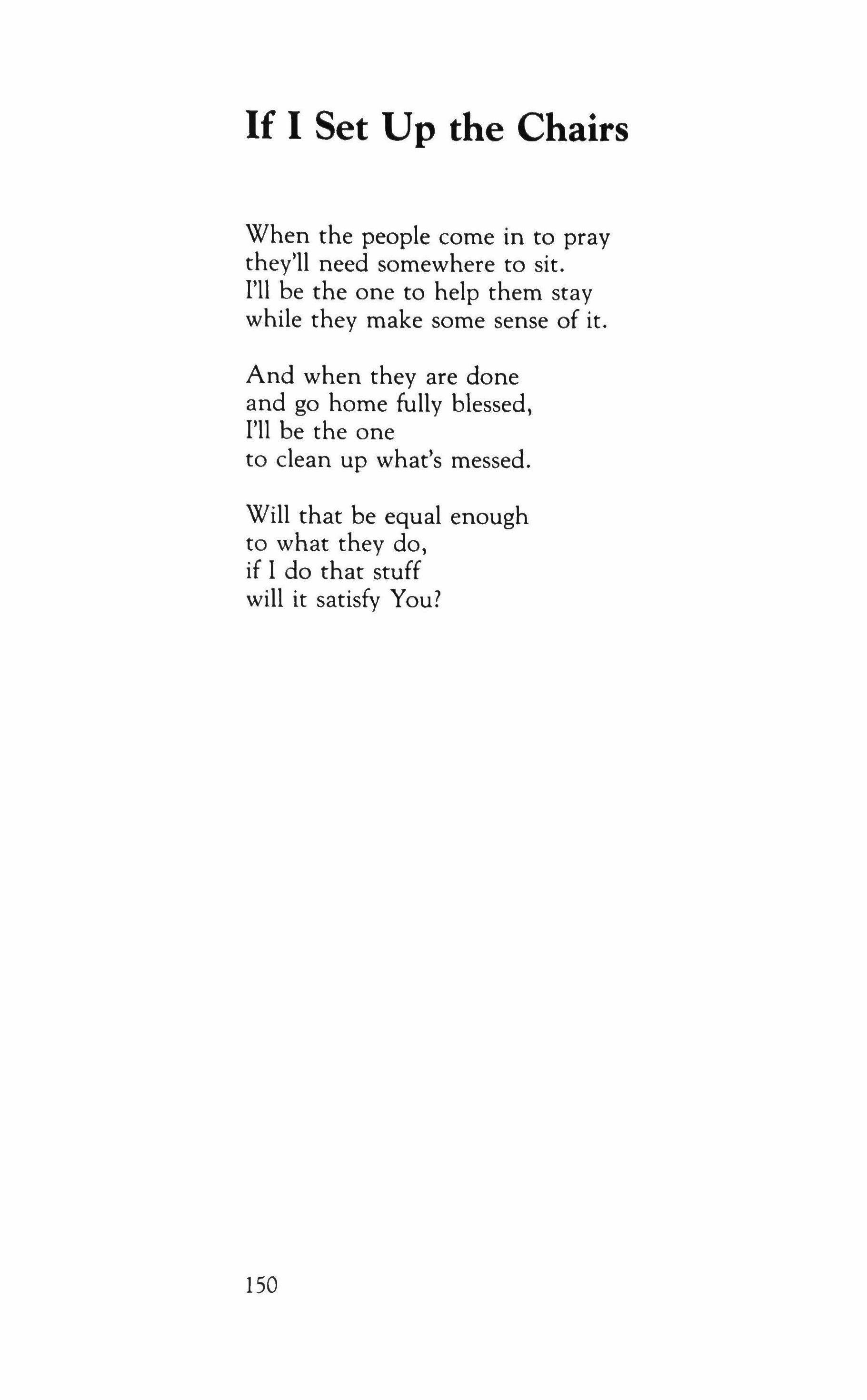
When the people come in to pray they'll need somewhere to sit. I'll be the one to help them stay while they make some sense of it.
And when they are done and go home fully blessed, I'll be the one to clean up what's messed. Will that be equal enough to what they do, if I do that stuff will it satisfy You?
150
Psalm
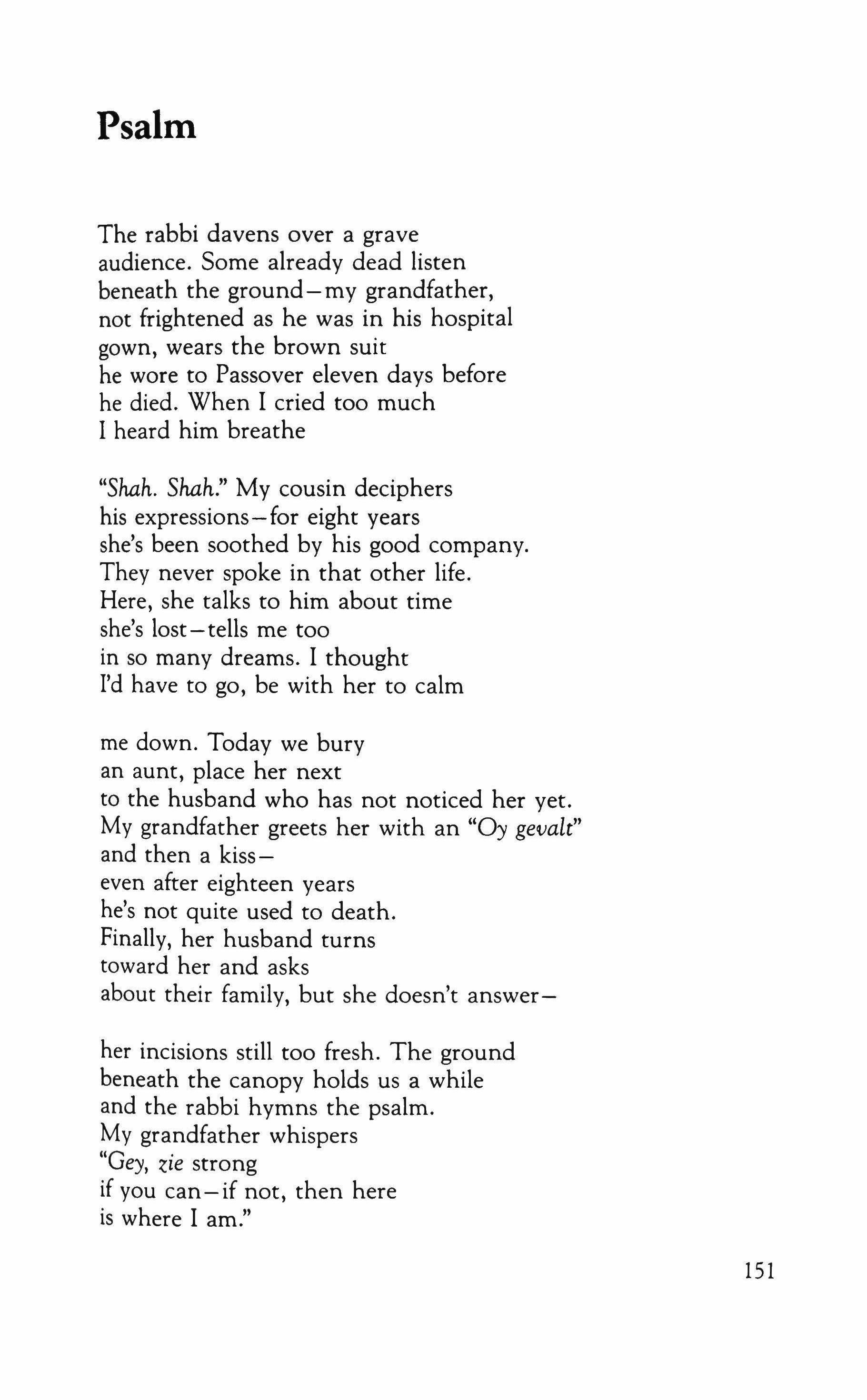
The rabbi davens over a grave audience. Some already dead listen beneath the ground-my grandfather, not frightened as he was in his hospital gown, wears the brown suit he wore to Passover eleven days before he died. When I cried too much 1 heard him breathe
"Shah. Shah." My cousin deciphers his expressions-for eight years she's been soothed by his good company. They never spoke in that other life. Here, she talks to him about time she's lost-tells me too in so many dreams. 1 thought I'd have to go, be with her to calm
me down. Today we bury an aunt, place her next to the husband who has not noticed her yet. My grandfather greets her with an "Oy gevalt" and then a kisseven after eighteen years he's not quite used to death. Finally, her husband turns toward her and asks about their family, but she doesn't answerher incisions still too fresh. The ground beneath the canopy holds us a while and the rabbi hymns the psalm. My grandfather whispers "Gey, zie strong if you can - if not, then here is where I am."
151
Prison Poems and Drawings
Irina Ratushinskaya
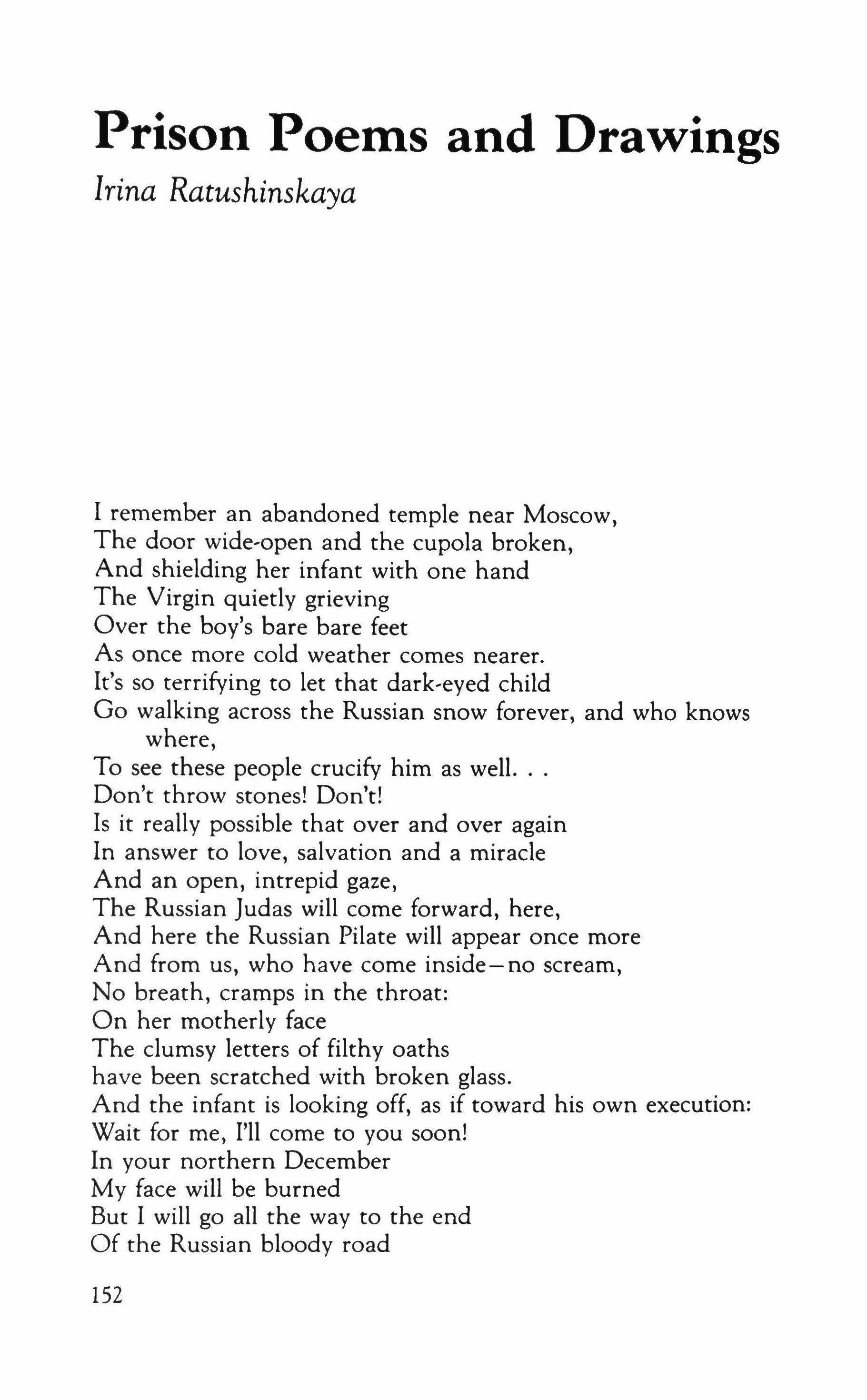
I remember an abandoned temple near Moscow, The door wide-open and the cupola broken, And shielding her infant with one hand
The Virgin quietly grieving
Over the boy's bare bare feet
As once more cold weather comes nearer. It's so terrifying to let that dark-eyed child Go walking across the Russian snow forever, and who knows where,
To see these people crucify him as well Don't throw stones! Don't!
Is it really possible that over and over again In answer to love, salvation and a miracle
And an open, intrepid gaze,
The Russian Judas will come forward, here, And here the Russian Pilate will appear once more And from us, who have come inside-no scream, No breath, cramps in the throat: On her motherly face
The clumsy letters of filthy oaths have been scratched with broken glass. And the infant is looking off, as if toward his own execution: Wait for me, I'll come to you soon!
In your northern December
My face will be burned
But I will go all the way to the end
Of the Russian bloody road
152
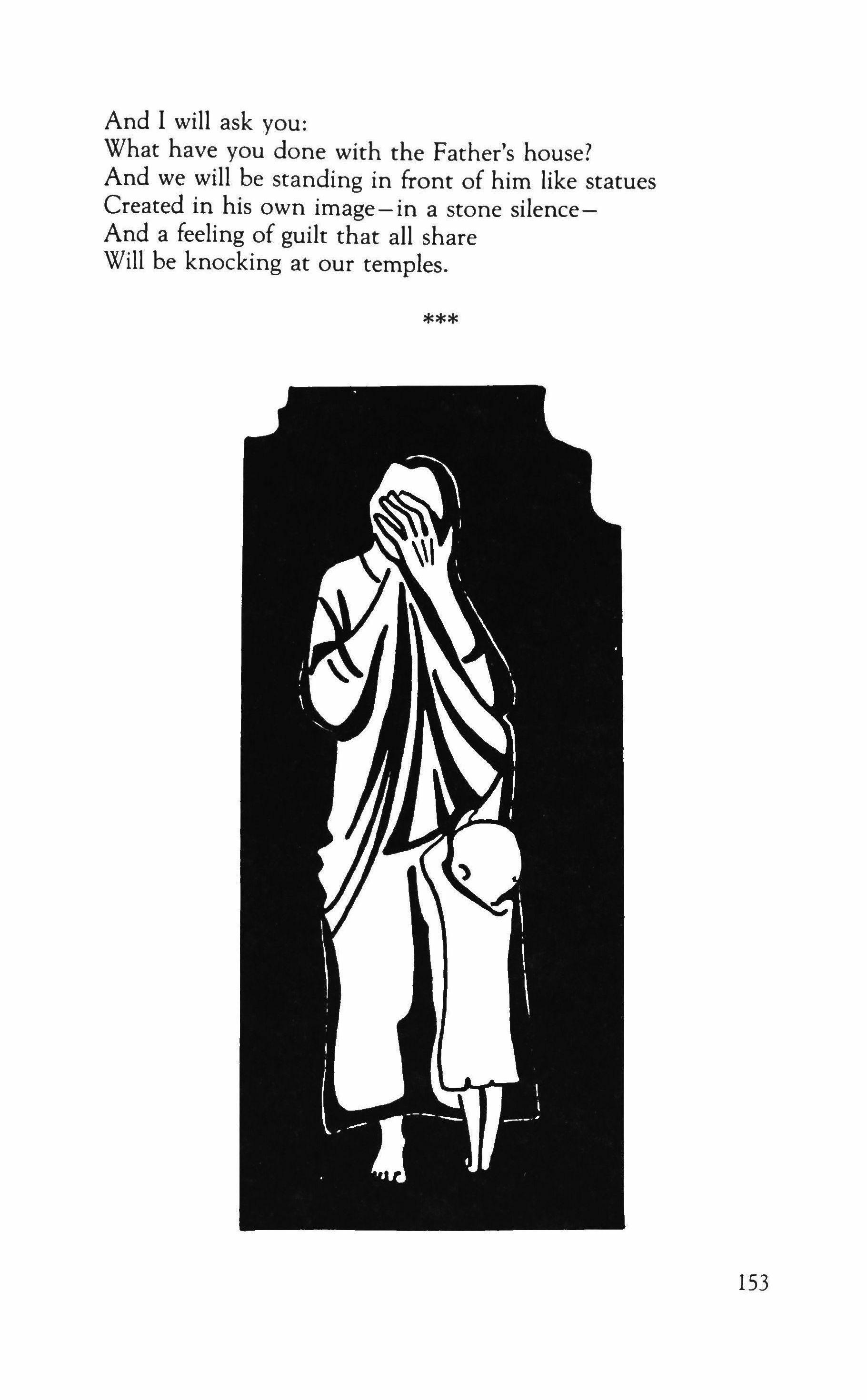
And I will ask you: What have you done with the Father's house? And we will be standing in front of him like statues Created in his own image-in a stone silenceAnd a feeling of guilt that all share Will be knocking at our temples.
*** 153
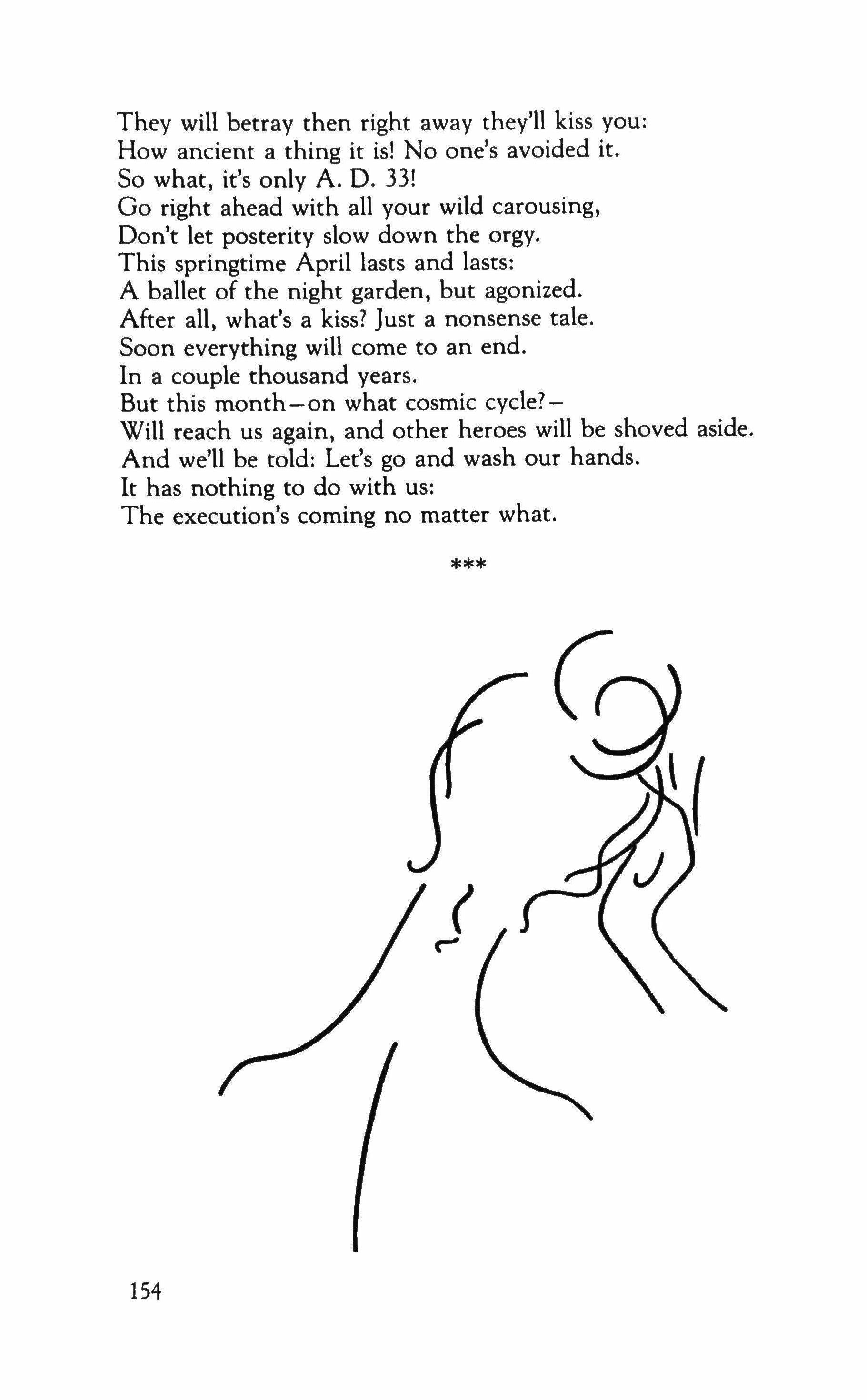
They will betray then right away they'll kiss you: How ancient a thing it is! No one's avoided it.
So what, it's only A. D. 33!
Go right ahead with all your wild carousing, Don't let posterity slow down the orgy. This springtime April lasts and lasts: A ballet of the night garden, but agonized. After all, what's a kiss? Just a nonsense tale. Soon everything will come to an end. In a couple thousand years.
But this month-on what cosmic cycle?Will reach us again, and other heroes will be shoved aside.
And we'll be told: Let's go and wash our hands. It has nothing to do with us: The execution's coming no matter what.
*** 154
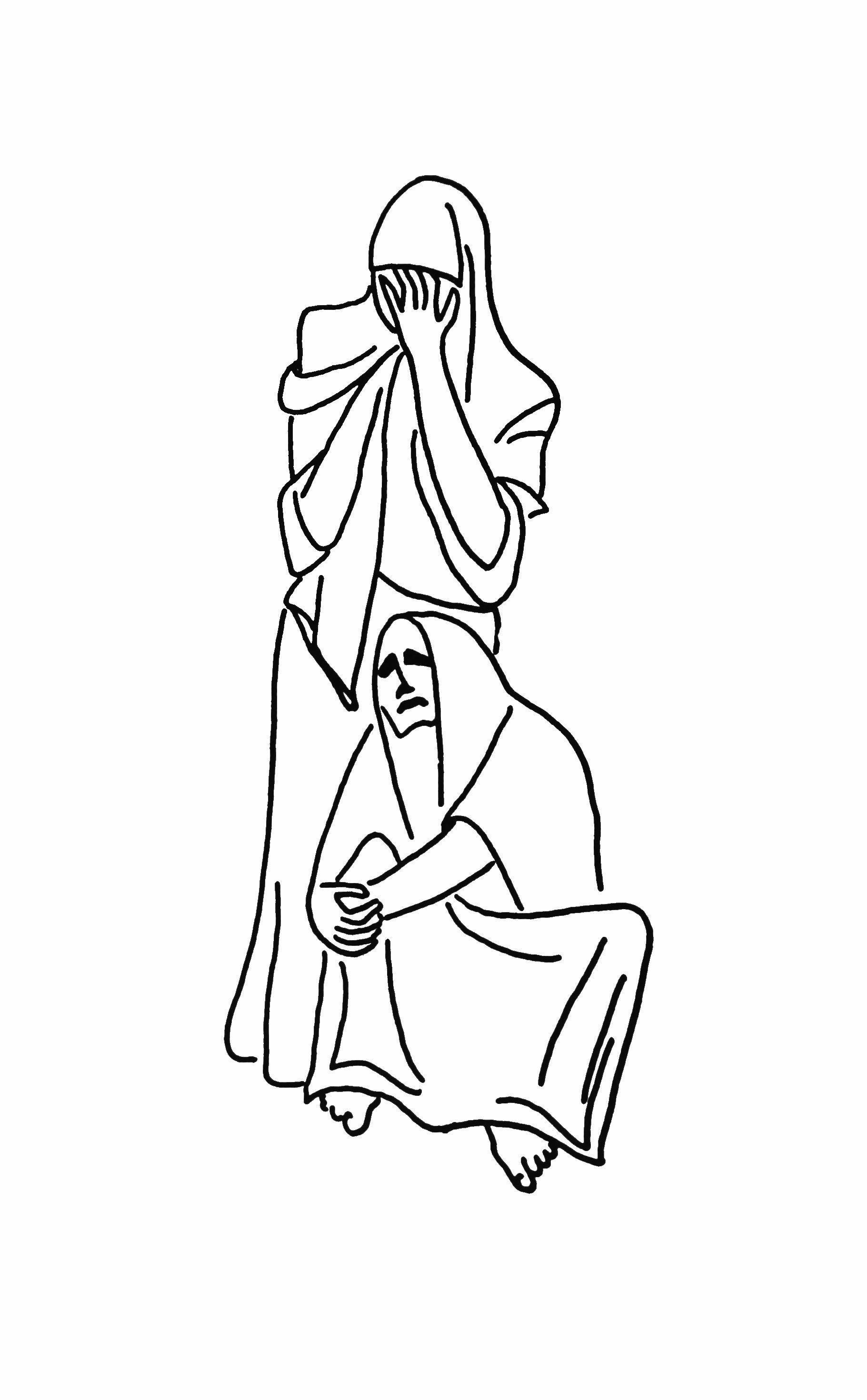

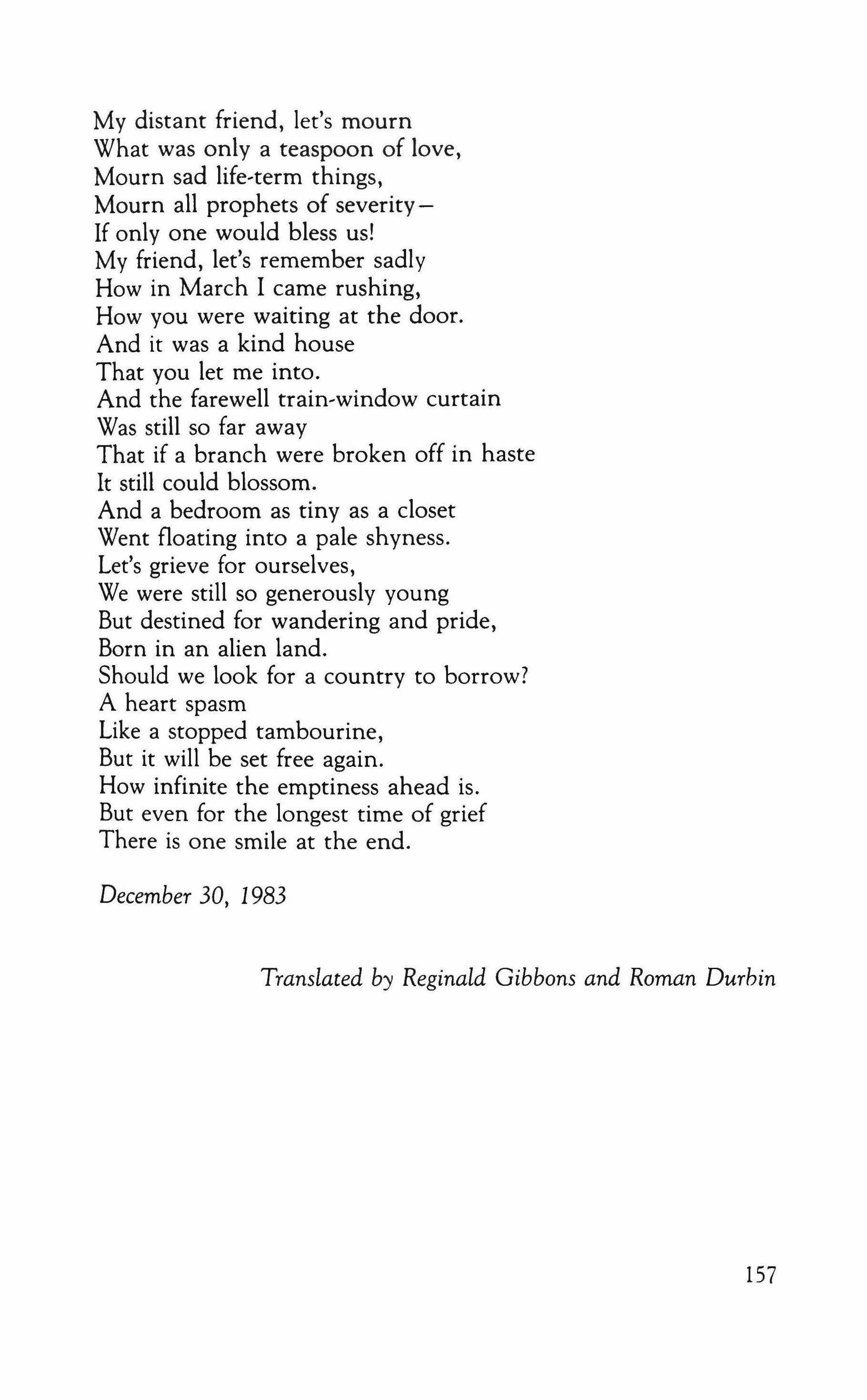
My distant friend, let's mourn
What was only a teaspoon of love, Mourn sad life-term things, Mourn all prophets of severityIf only one would bless us!
My friend, let's remember sadly How in March I came rushing, How you were waiting at the door. And it was a kind house That you let me into. And the farewell train-window curtain Was still so far away
That if a branch were broken off in haste It still could blossom.
And a bedroom as tiny as a closet Went floating into a pale shyness. Let's grieve for ourselves, We were still so generously young But destined for wandering and pride, Born in an alien land.
Should we look for a country to borrow? A heart spasm
Like a stopped tambourine, But it will be set free again. How infinite the emptiness ahead is. But even for the longest time of grief There is one smile at the end.
December 30, 1983
Translated
by
Reginald Gibbons and Roman Durbin
157
Three Poems
Hugo Achugar
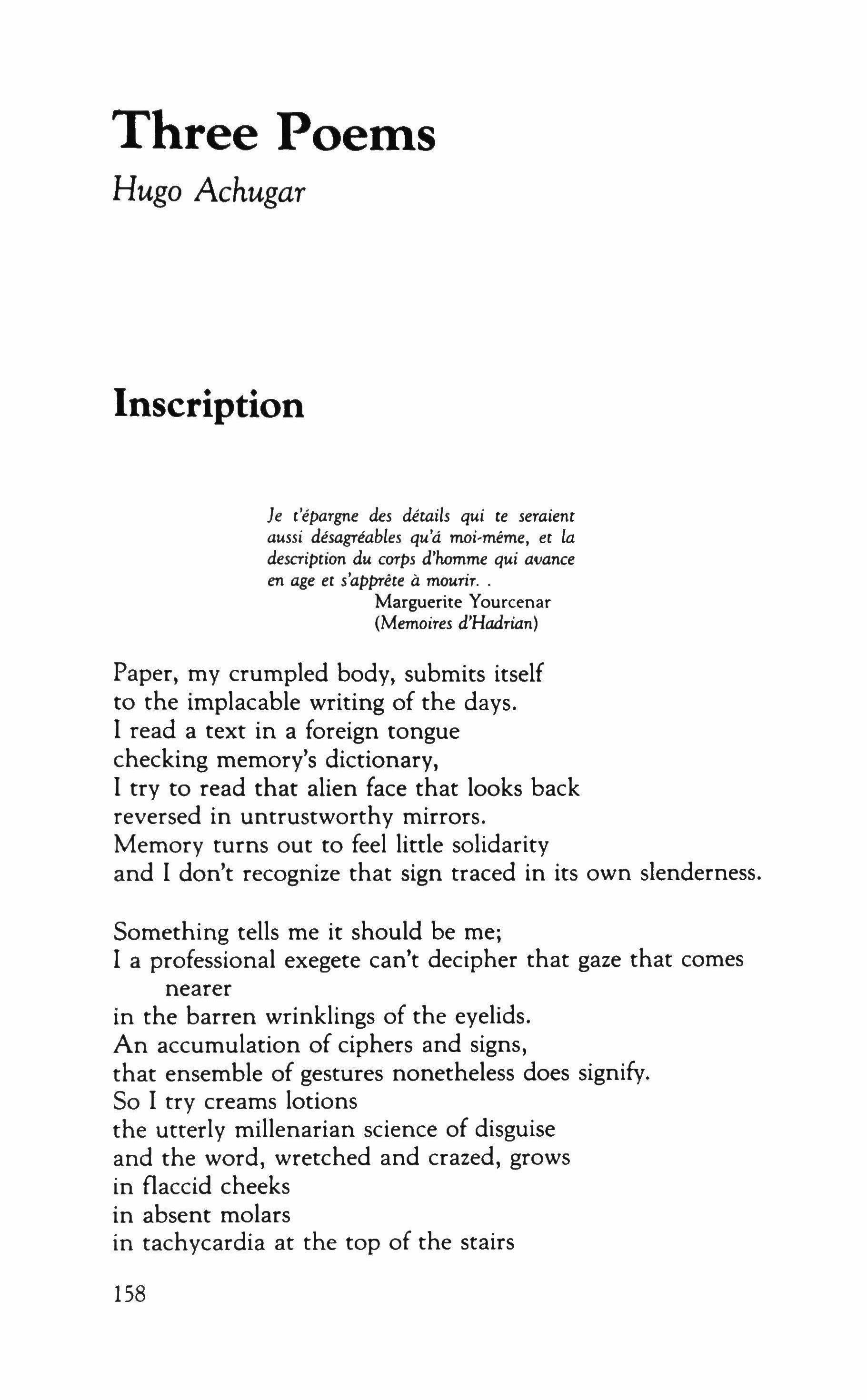
Inscription
le t'epargne des details qui te seraient aussi desagreables qu'd moi-merne, et la description du corps d'homme qui atJance en age et s'apprete iJ. mourir
Marguerite Yourcenar (Memoires d'Hadrian)
Paper, my crumpled body, submits itself to the implacable writing of the days. I read a text in a foreign tongue checking memory's dictionary, I try to read that alien face that looks back reversed in untrustworthy mirrors. Memory turns out to feel little solidarity and I don't recognize that sign traced in its own slenderness.
Something tells me it should be me; I a professional exegete can't decipher that gaze that comes nearer in the barren wrinklings of the eyelids. An accumulation of ciphers and signs, that ensemble of gestures nonetheless does signify. So I try creams lotions the utterly millenarian science of disguise and the word, wretched and crazed, grows in flaccid cheeks in absent molars in tachycardia at the top of the stairs
158
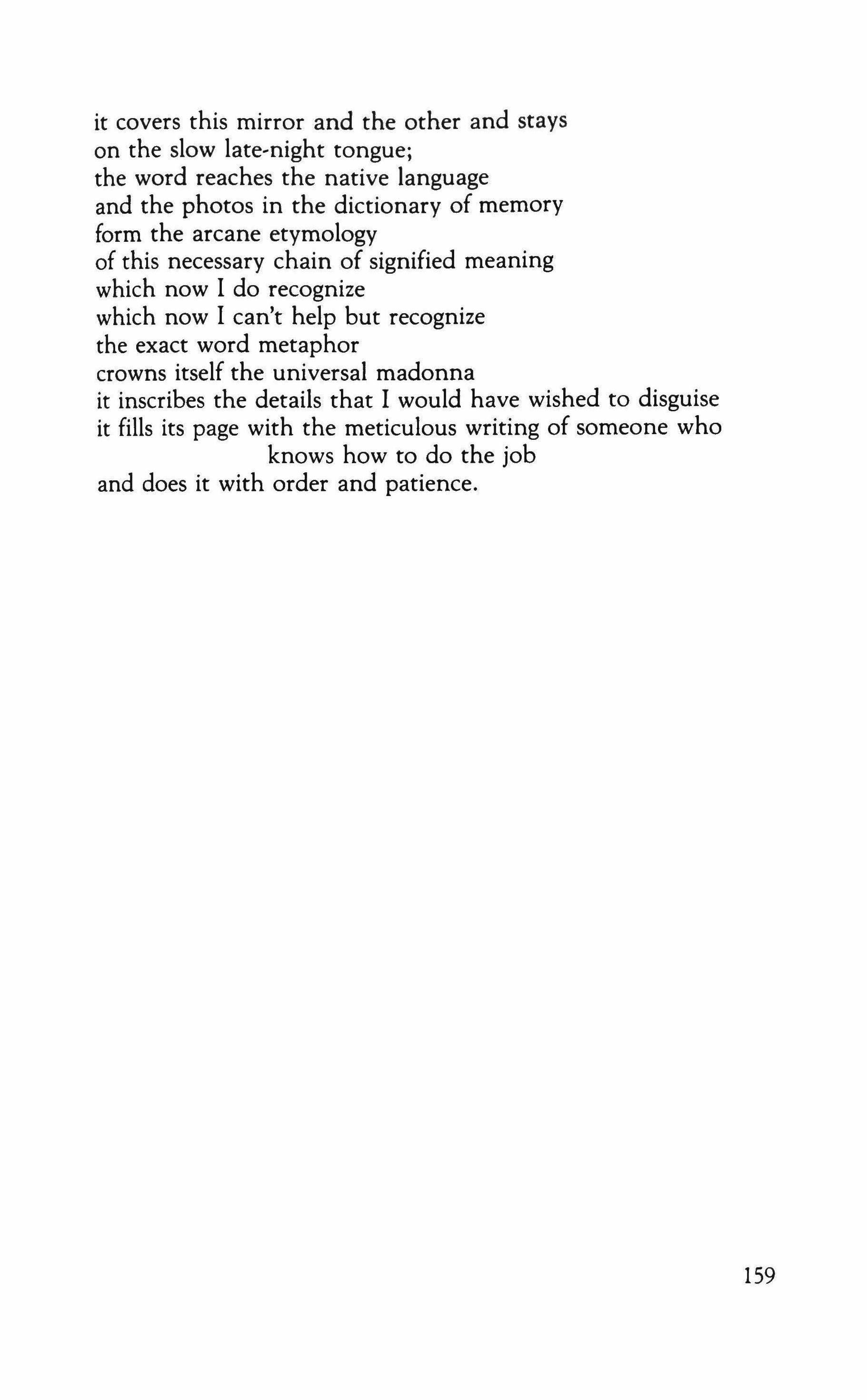
it covers this mirror and the other and stays on the slow late-night tongue; the word reaches the native language and the photos in the dictionary of memory form the arcane etymology of this necessary chain of signified meaning which now I do recognize which now I can't help but recognize the exact word metaphor crowns itself the universal madonna it inscribes the details that I would have wished to disguise it fills its page with the meticulous writing of someone who knows how to do the job and does it with order and patience.
159
Family Portrait
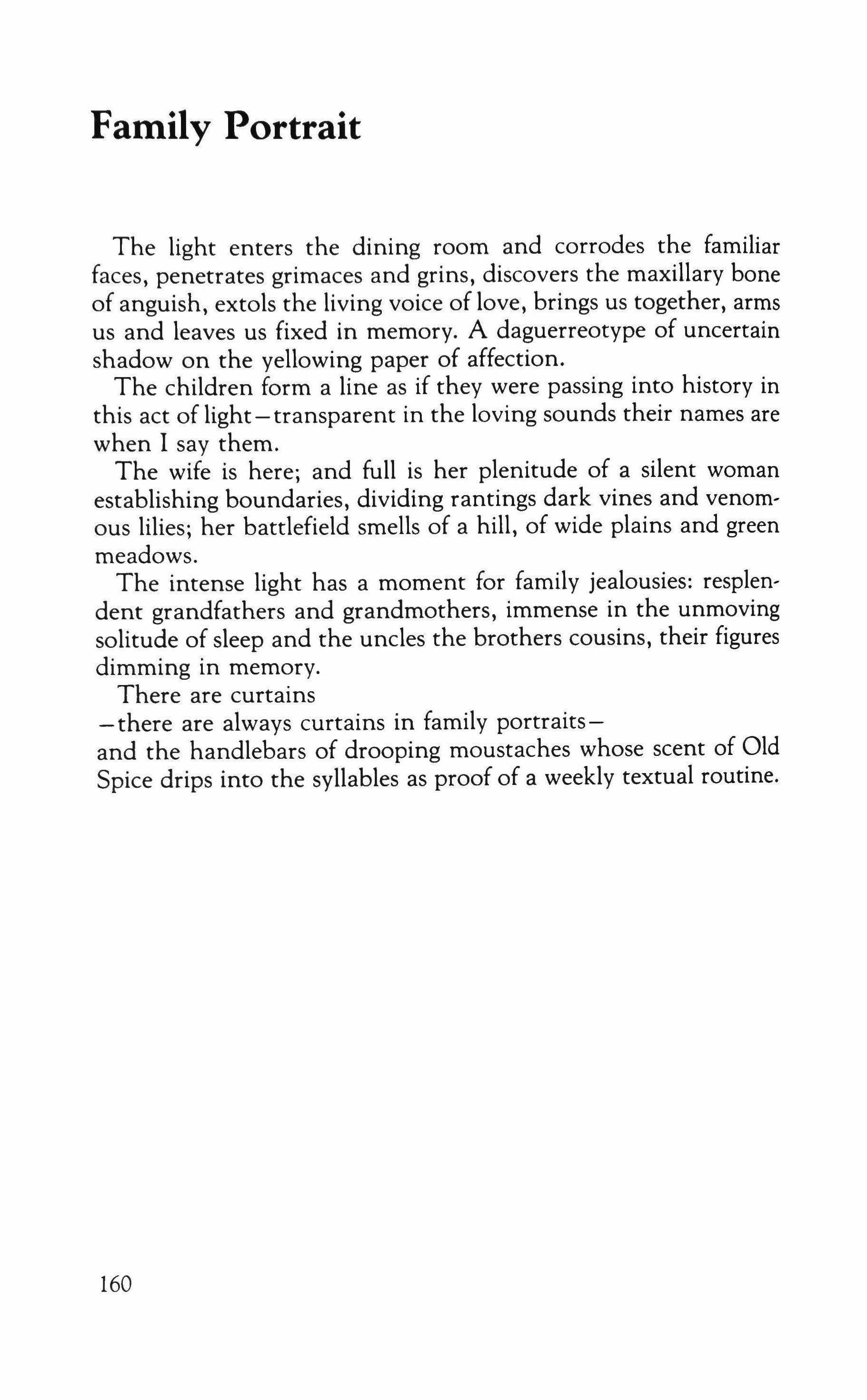
The light enters the dining room and corrodes the familiar faces, penetrates grimaces and grins, discovers the maxillary bone of anguish, extols the living voice of love, brings us together, arms us and leaves us fixed in memory. A daguerreotype of uncertain shadow on the yellowing paper of affection.
The children form a line as if they were passing into history in this act of light - transparent in the loving sounds their names are when I say them.
The wife is here; and full is her plenitude of a silent woman establishing boundaries, dividing rantings dark vines and venom, ous lilies; her battlefield smells of a hill, of wide plains and green meadows.
The intense light has a moment for family jealousies: resplendent grandfathers and grandmothers, immense in the unmoving solitude of sleep and the uncles the brothers cousins, their figures dimming in memory.
There are curtains -there are always curtains in family portraitsand the handlebars of drooping moustaches whose scent of Old Spice drips into the syllables as proof of a weekly textual routine.
160
Angel Triptych

I
For years the mask of death has been haunting me.
Today it has the indigo wings of an angel riding a device of white cylinders. Anguish has disappeared. We've gotten used to it: 1 know it's not me who's going to meet him / I know it's not me he's waiting for.
Neighbors by routine, we crisscross the city without a greeting nor a sign of secret understanding.
Today I've come back to go by an undertaker's and I've remembered the Rodriguez Bros.'s business of solemn funerals
My neighbors are halfway to crazy: there's one, bloodless angel, who wears the hospitable mask of my death and does not know it.
On Zufriategui Street is the church in which I was married, the clinic in which I learned the odor of calcium, the shadow of my father, the magic of the old man Nicola, a train that comes in from the port, the convent of nuns, the car that almost hits me in front of the fraternal gaze of the
Rodriguezes
and this angel of today-March 21, northern hemispheredark wings, electronic gaze, white cylinders (Art has frozen the figure in a fine ink tracing), awaiting the sorcerer's spell so as to vanish with me.
II
The mask of death has shown its insolent attire once more. The round perfect eve-beads watch tirelessly and diffidently. He has recognized me; I'm the one worn out by the night before. I hear deformed cells advancing through the woof of the ancient mythic fabric.
161
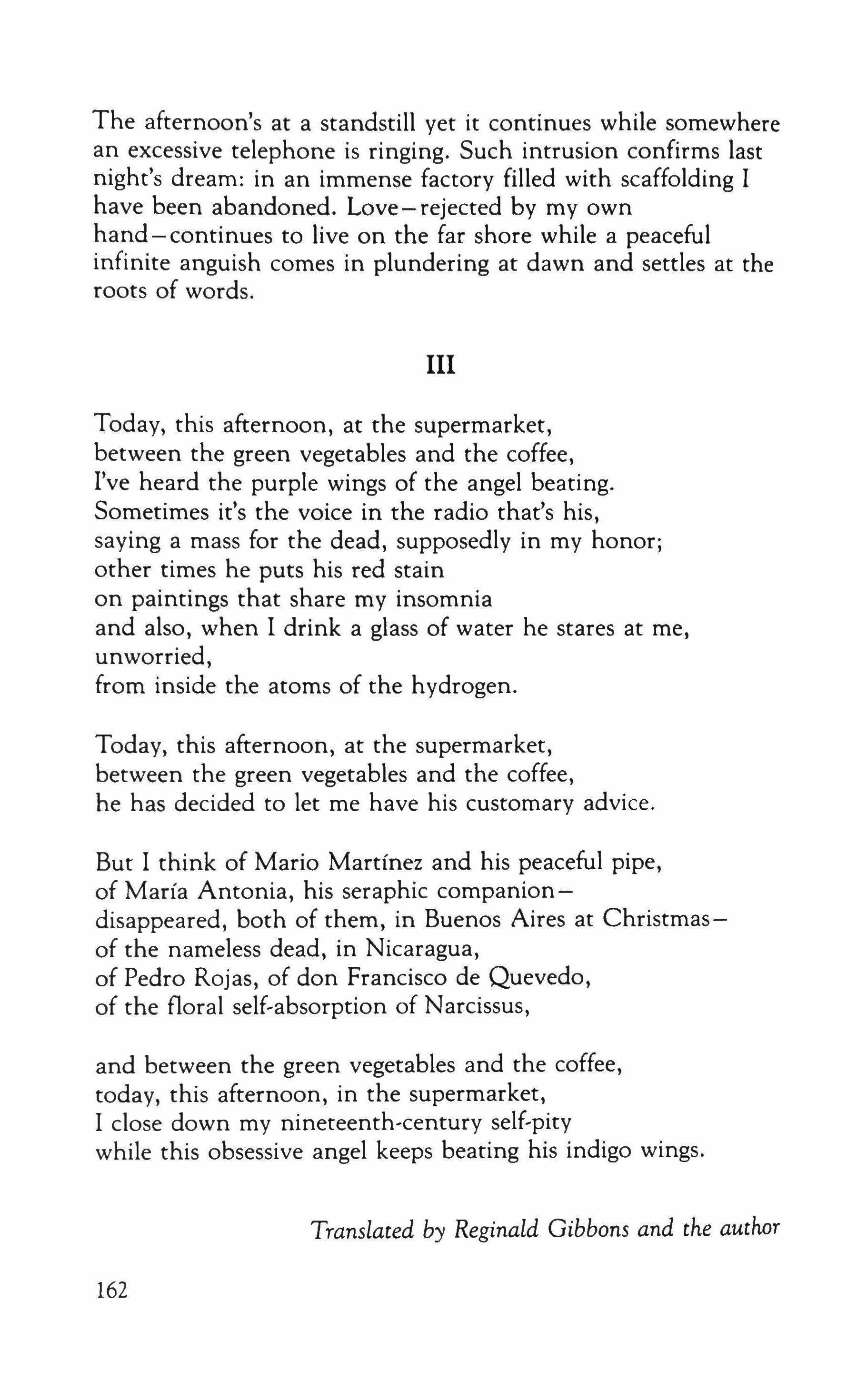
The afternoon's at a standstill yet it continues while somewhere an excessive telephone is ringing. Such intrusion confirms last night's dream: in an immense factory filled with scaffolding I have been abandoned. Love-rejected by my own hand-continues to live on the far shore while a peaceful infinite anguish comes in plundering at dawn and settles at the roots of words.
III
Today, this afternoon, at the supermarket, between the green vegetables and the coffee, I've heard the purple wings of the angel beating. Sometimes it's the voice in the radio that's his, saying a mass for the dead, supposedly in my honor; other times he puts his red stain on paintings that share my insomnia and also, when I drink a glass of water he stares at me, unworried, from inside the atoms of the hydrogen.
Today, this afternoon, at the supermarket, between the green vegetables and the coffee, he has decided to let me have his customary advice.
But I think of Mario Martinez and his peaceful pipe, of Maria Antonia, his seraphic companiondisappeared, both of them, in Buenos Aires at Christmasof the nameless dead, in Nicaragua, of Pedro Rojas, of don Francisco de Quevedo, of the floral self-absorption of Narcissus, and between the green vegetables and the coffee, today, this afternoon, in the supermarket, I close down my nineteenth-centurv self-pity while this obsessive angel keeps beating his indigo wings.
Translated by Reginald Gibbons and the author
162
Two Poems
Hilda Morley
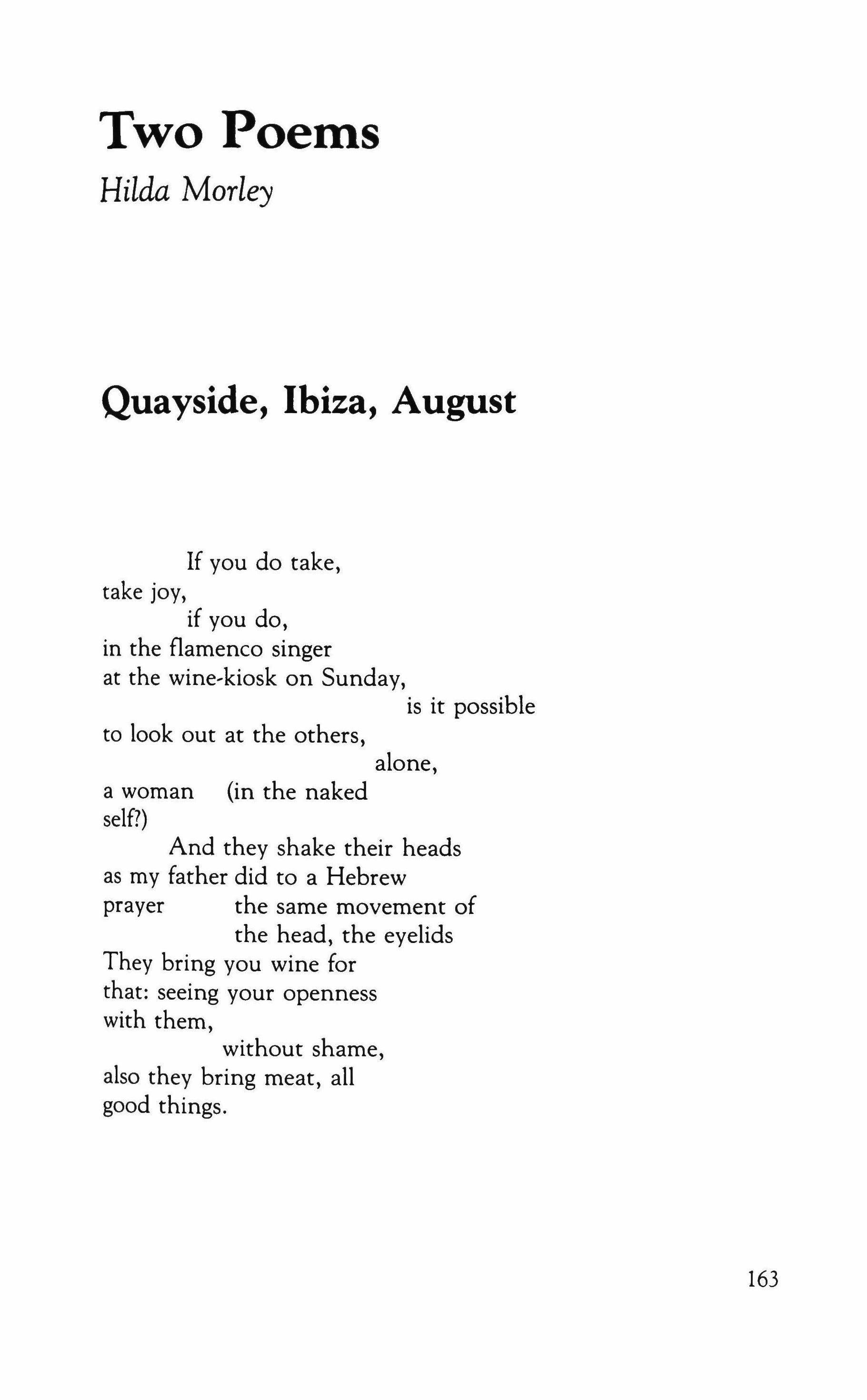
Quayside, Ibiza, August
If you do take, take joy, if you do, in the flamenco singer at the wine-kiosk on Sunday, is it possible to look out at the others, alone, a woman (in the naked self?) And they shake their heads as my father did to a Hebrew prayer the same movement of the head, the eyelids They bring you wine for that: seeing your openness with them, without shame, also they bring meat, all good things.
163
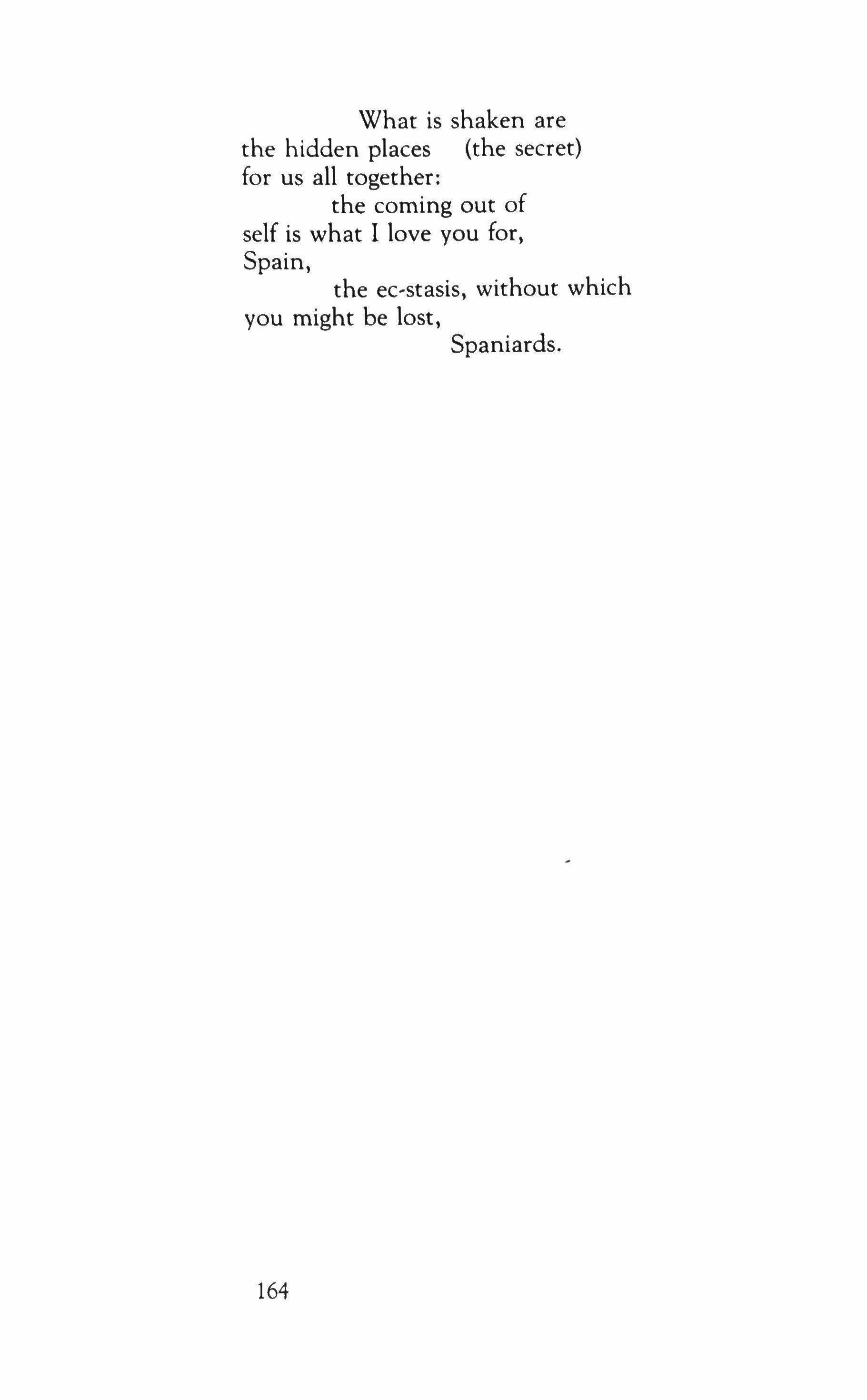
What is shaken are the hidden places (the secret) for us all together: the coming out of self is what I love you for, Spain, the ec-stasis, without which you might be lost, Spaniards.
164
The Shadow

So little done, at my age, so little, compared to the great ones & out of timidity, out of the inability to say, for so long-now: 1 must, when 1 think of Lawrence, dying at 44, leaving behind him novels, stories, poems &1
so much older, with so little, so little to show for all my living, all my years & so much brewing always that should have been written down, worked over, carved, refurbished, redone, as I see it now.
Behind the roofs of this little town near Brussels-there are hills, the beginnings of mountains, many trees with leaves of differing shapes & varieties of green, turrets, spires. The sky clouds over, little clouds appearing over the blue, the moon yellow last night, with a mist around it & this morning the shadow of a bird darkening
165

the sunshine, flying most swiftly where the sun is brightest, barely visible but for its shadow alive & gone, & disappearing, a reminder.
166
The Mask
Enrique Zaragoza

The morticians, we should have known, are the final arbiters. I was too young to know how or where to make a plea to stop their art, father; and the women weeping here, digging at their toylike rosaries, are the same old women who, a thousand years ago, wept and said nothing. The face you had for juggling impatience and forbearance as you propped me on my first horse is missing. The anger face you had, throwing across the room my magazine with the blonde,wigged Mexican movie actresses, is missing, too. They gave you your supermarket face, your motor,license'bureau face, your immigration-office face. Now they know wherever they may find you, they can deal with you.
167
Two Poems
Coppie Green
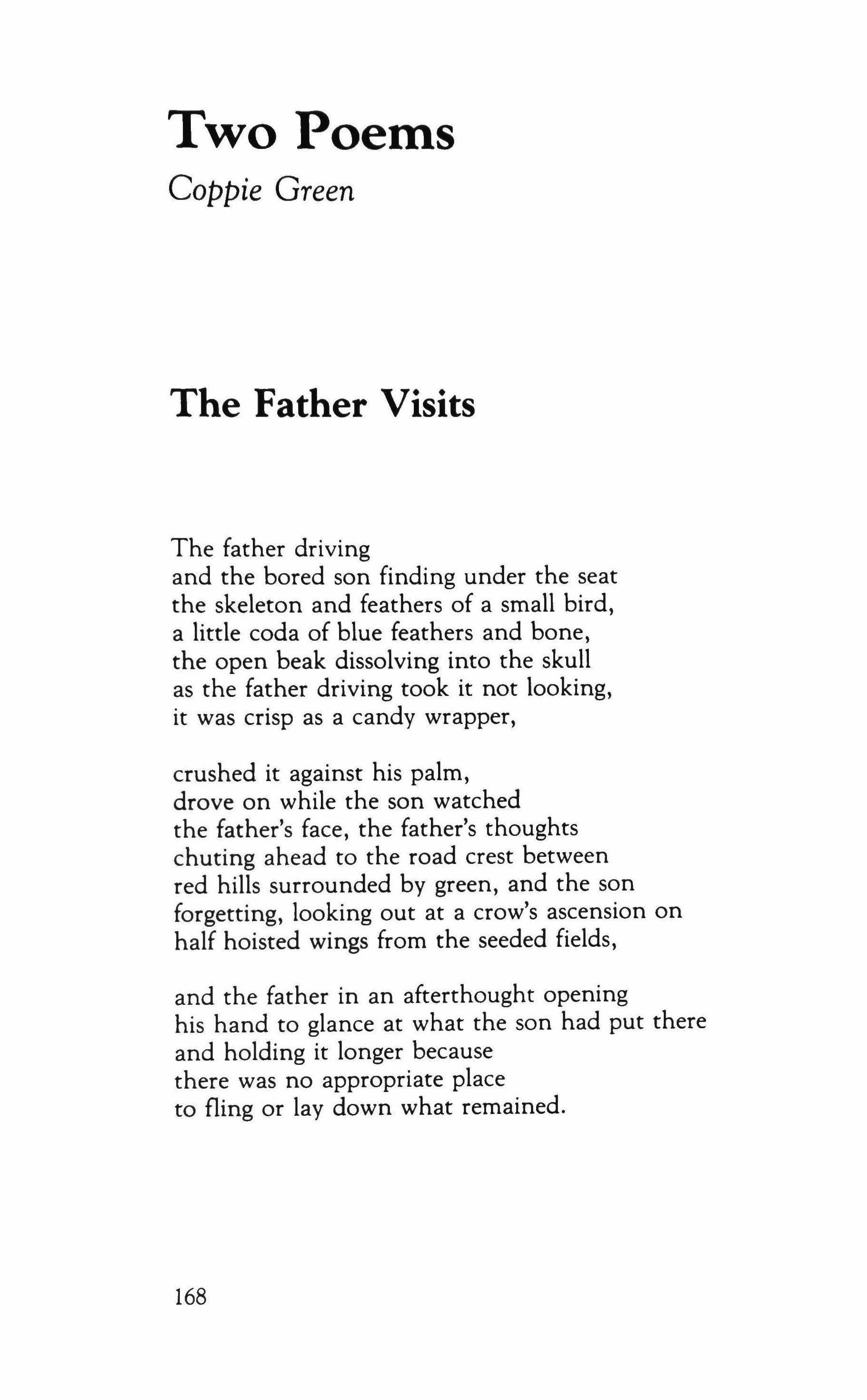
The Father Visits
The father driving and the bored son finding under the seat the skeleton and feathers of a small bird, a little coda of blue feathers and bone, the open beak dissolving into the skull as the father driving took it not looking, it was crisp as a candy wrapper,
crushed it against his palm, drove on while the son watched the father's face, the father's thoughts chuting ahead to the road crest between red hills surrounded by green, and the son forgetting, looking out at a crow's ascension on half hoisted wings from the seeded fields,
and the father in an afterthought opening his hand to glance at what the son had put there and holding it longer because there was no appropriate place to fling or lay down what remained.
168
Approaching
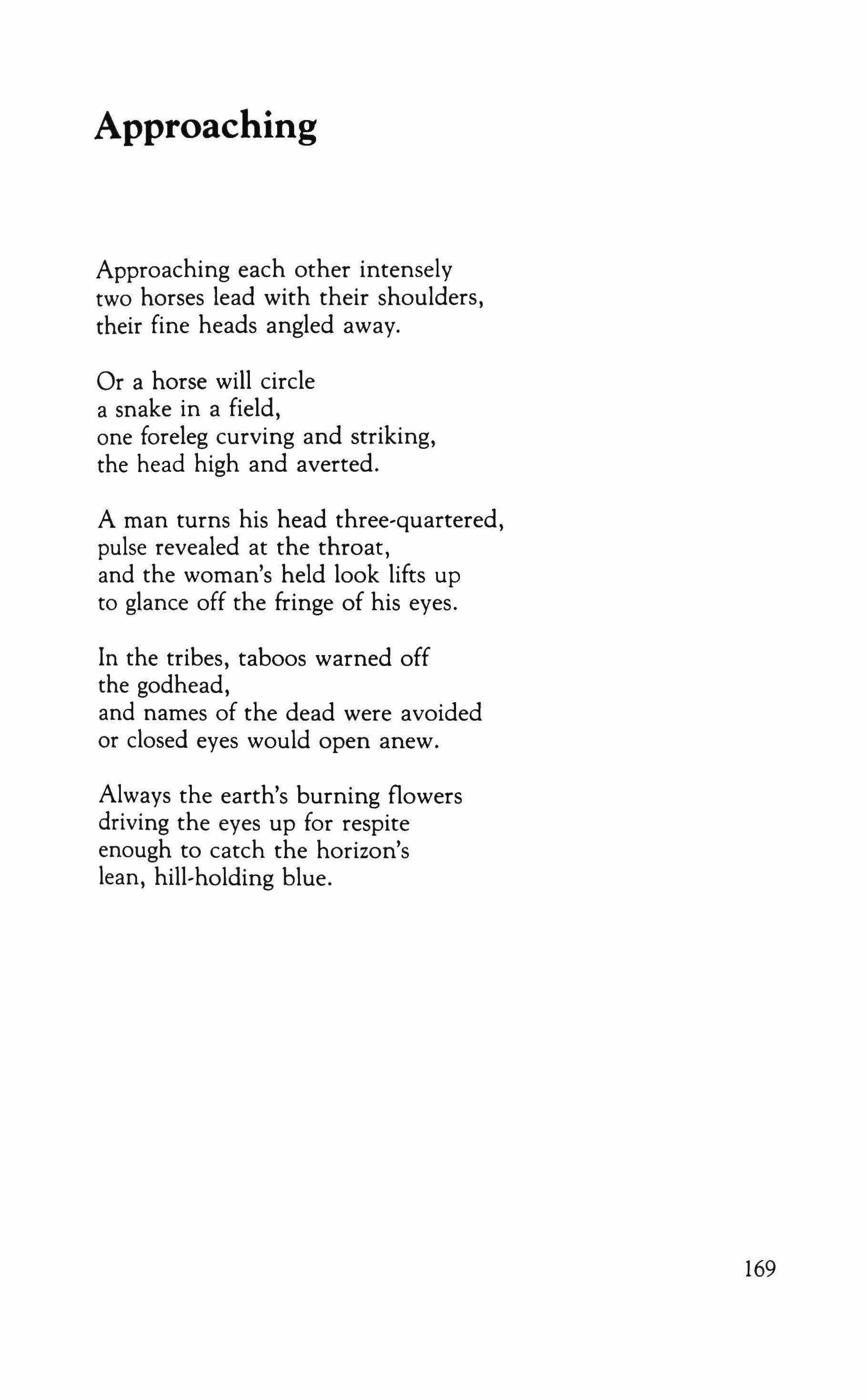
Approaching each other intensely two horses lead with their shoulders, their fine heads angled away.
Or a horse will circle a snake in a field, one foreleg curving and striking, the head high and averted.
A man turns his head three-quartered, pulse revealed at the throat, and the woman's held look lifts up to glance off the fringe of his eyes.
In the tribes, taboos warned off the godhead, and names of the dead were avoided or closed eyes would open anew.
Always the earth's burning flowers driving the eyes up for respite enough to catch the horizon's lean, hill,holding blue.
169
The Big One
William Zaranka

I remember you read it onstage to crowds after Laurie finished her tribute to Billy Jack on the autoharp. How we adored you, our hero Assistant Professor, the chance that reading it might cost you tenure! But it seemed the time was right, moral purpose as heavy in the air as pot smoke as you pulled your handkerchief out and smeared it across your brow and began reading the nineteen stanzas of "The Big One."
Each stanza, I remember, gained in effect as you worked your outrage through the words like a shuttle, and all the while the crowd was with you, because they knew it was coming, the big one, because they'd heard it before and they liked it, the way the words seemed to accumulate into a facsimile of their outrage, and the red brick walls of the Student Union
170
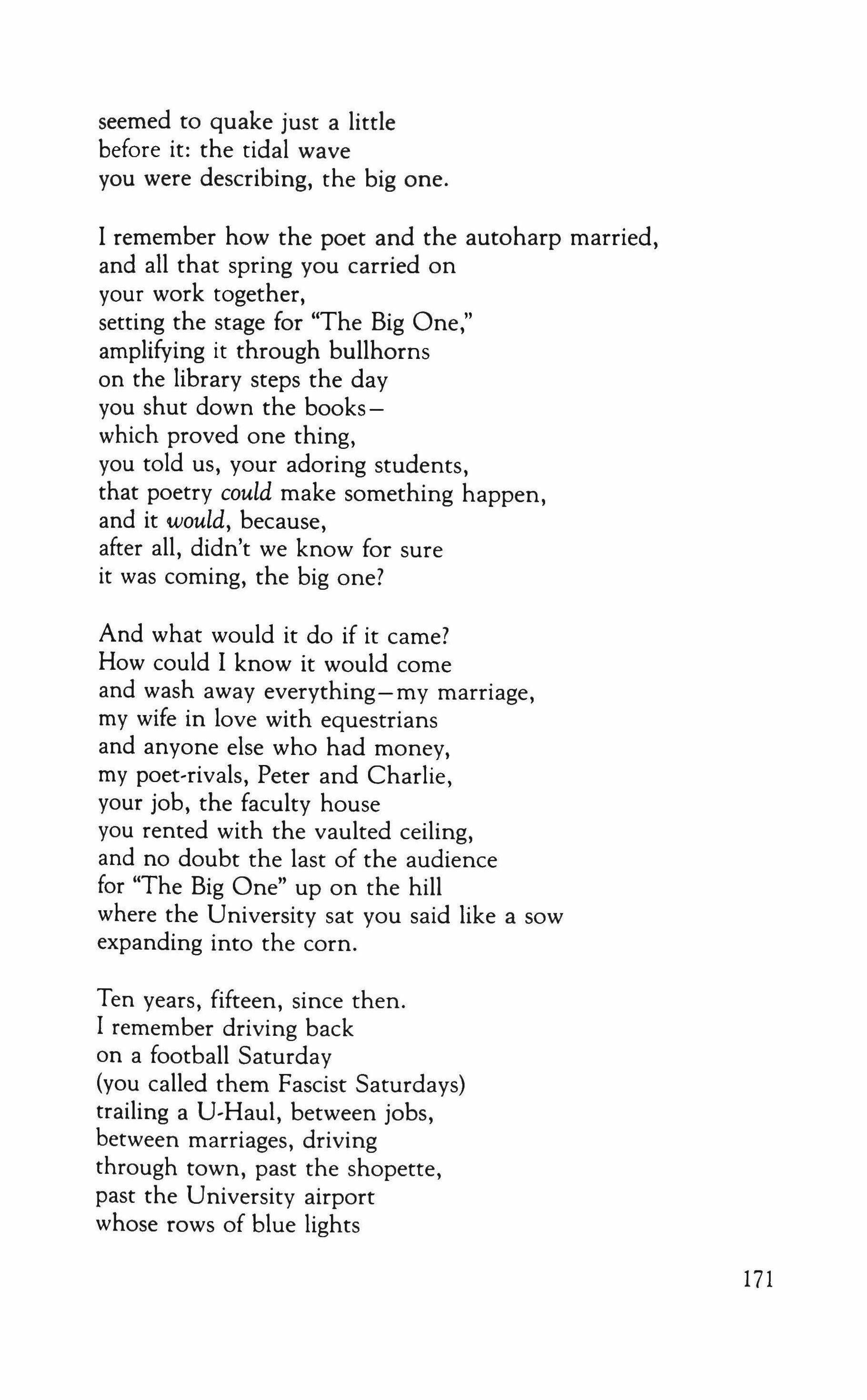
seemed to quake just a little before it: the tidal wave you were describing, the big one.
I remember how the poet and the autoharp married, and all that spring you carried on your work together, setting the stage for "The Big One," amplifying it through bullhorns on the library steps the day you shut down the bookswhich proved one thing, you told us, your adoring students, that poetry could make something happen, and it would, because, after all, didn't we know for sure it was corning, the big one?
And what would it do if it came? How could I know it would corne and wash away everything-my marriage, my wife in love with equestrians and anyone else who had money, my poet-rivals, Peter and Charlie, your job, the faculty house you rented with the vaulted ceiling, and no doubt the last of the audience for "The Big One" up on the hill where the University sat you said like a sow expanding into the corn.
Ten years, fifteen, since then. I remember driving back on a football Saturday (you called them Fascist Saturdays) trailing a U-Haul, between jobs, between marriages, driving through town, past the shopette, past the University airport whose rows of blue lights
171
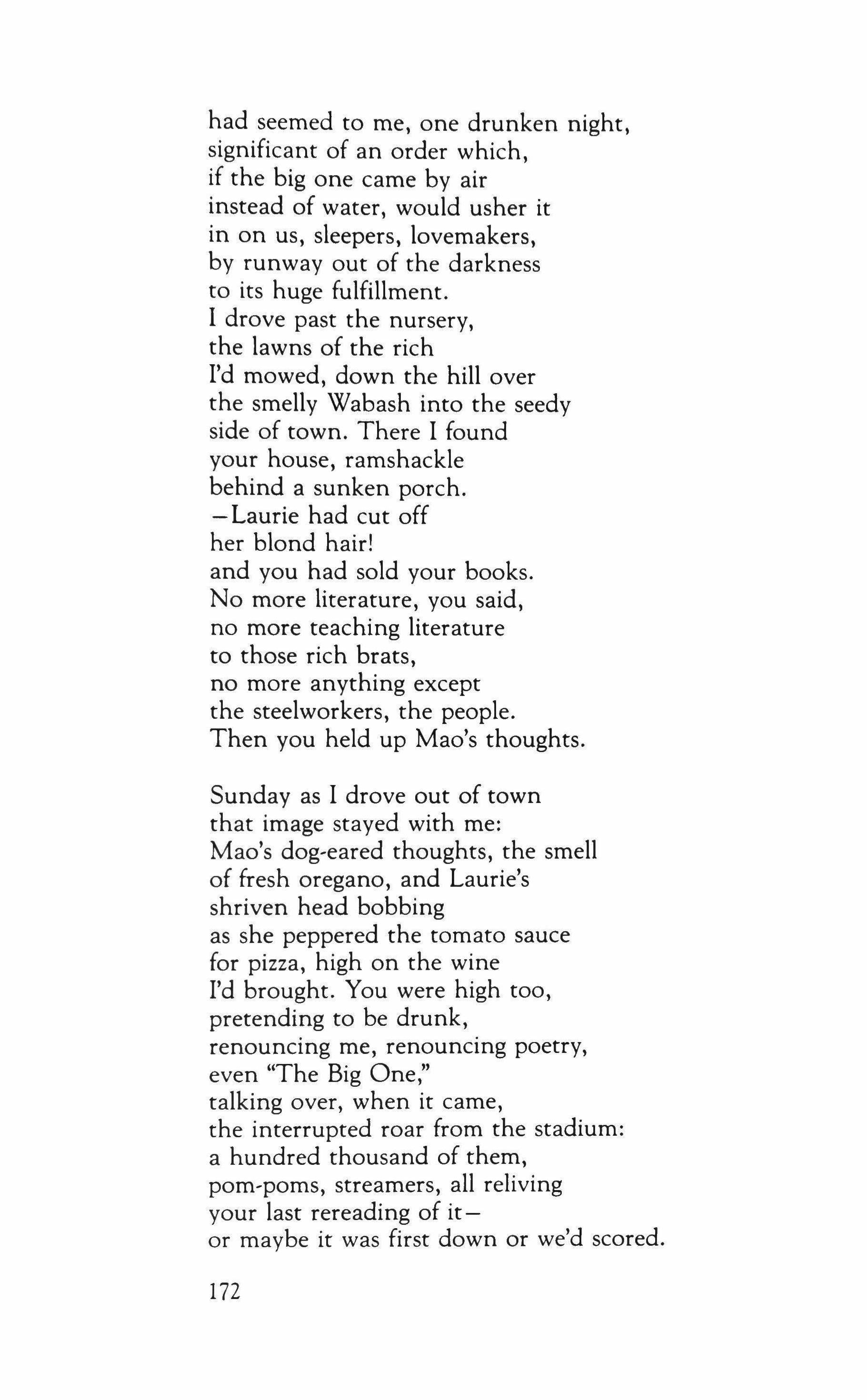
had seemed to me, one drunken night, significant of an order which, if the big one came by air instead of water, would usher it in on us, sleepers, lovemakers, by runway out of the darkness to its huge fulfillment. I drove past the nursery, the lawns of the rich I'd mowed, down the hill over the smelly Wabash into the seedy side of town. There I found your house, ramshackle behind a sunken porch. - Laurie had cut off her blond hair! and you had sold your books. No more literature, you said, no more teaching literature to those rich brats, no more anything except the steelworkers, the people. Then you held up Mao's thoughts.
Sunday as I drove out of town that image stayed with me: Mao's dog-eared thoughts, the smell of fresh oregano, and Laurie's shriven head bobbing as she peppered the tomato sauce for pizza, high on the wine I'd brought. You were high too, pretending to be drunk, renouncing me, renouncing poetry, even "The Big One," talking over, when it came, the interrupted roar from the stadium: a hundred thousand of them, pom-poms, streamers, all reliving your last rereading of itor maybe it was first down or we'd scored.
172
The History and Significance of the Bowler Hat: Chaplin, Laurel and Hardy, Beckett, Magritte and Kundera
Fred Miller Robinson
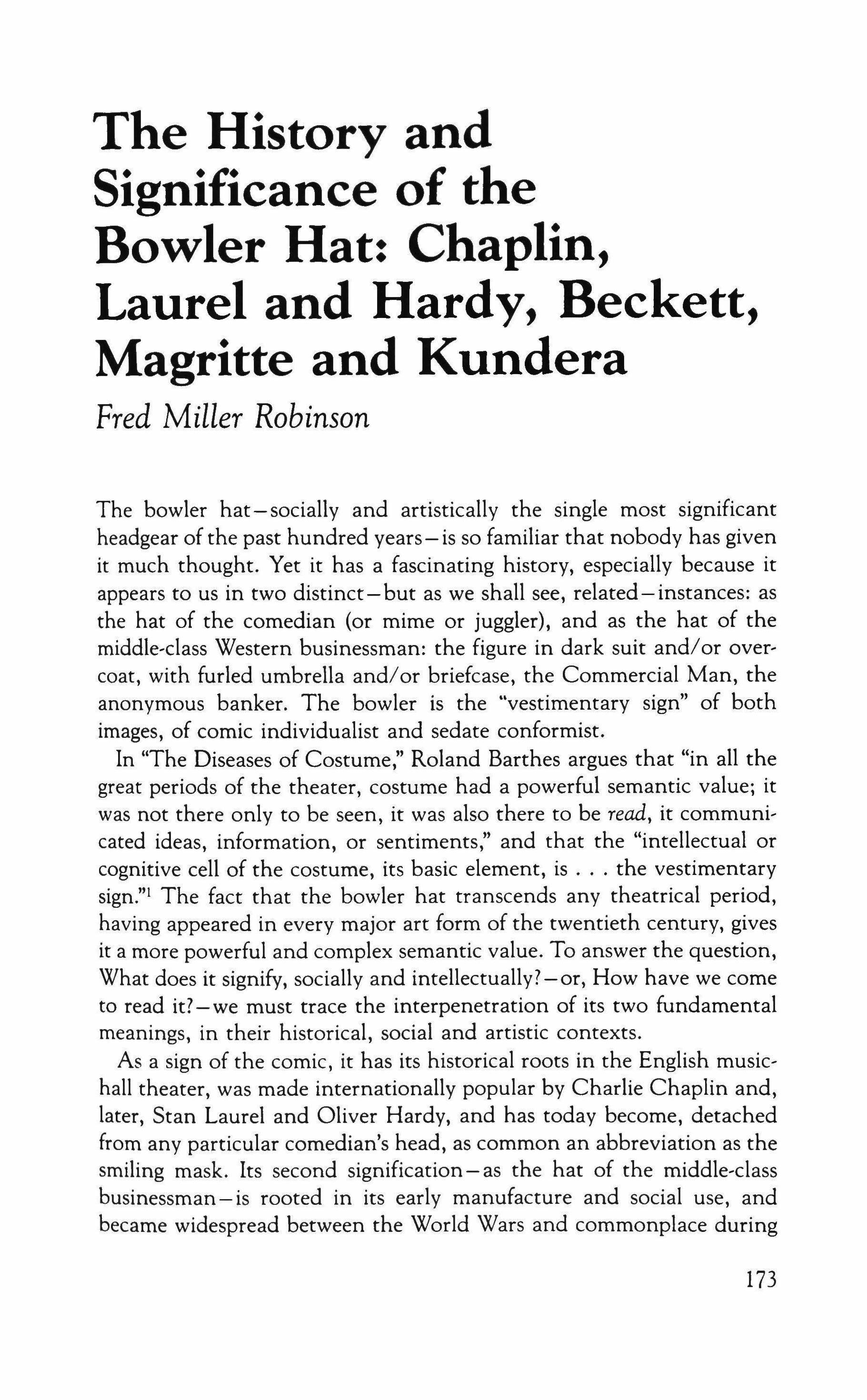
The bowler hat - socially and artistically the single most significant headgear of the past hundred years-is so familiar that nobody has given it much thought. Yet it has a fascinating history, especially because it appears to us in two distinct - but as we shall see, related - instances: as the hat of the comedian (or mime or juggler), and as the hat of the middle-class Western businessman: the figure in dark suit and/or overcoat, with furled umbrella and/or briefcase, the Commercial Man, the anonymous banker. The bowler is the "vestimentary sign" of both images, of comic individualist and sedate conformist.
In "The Diseases of Costume," Roland Barthes argues that "in all the great periods of the theater, costume had a powerful semantic value; it was not there only to be seen, it was also there to be read, it communicated ideas, information, or sentiments," and that the "intellectual or cognitive cell of the costume, its basic element, is the vestimentary sign,"! The fact that the bowler hat transcends any theatrical period, having appeared in every major art form of the twentieth century, gives it a more powerful and complex semantic value. To answer the question, What does it signify, socially and intellectually?-or, How have we come to read it? -we must trace the interpenetration of its two fundamental meanings, in their historical, social and artistic contexts.
As a sign of the comic, it has its historical roots in the English musichall theater, was made internationally popular by Charlie Chaplin and, later, Stan Laurel and Oliver Hardy, and has today become, detached from any particular comedian's head, as common an abbreviation as the smiling mask. Its second signification - as the hat of the middle-class businessman-is rooted in its early manufacture and social use, and became widespread between the World Wars and commonplace during
173
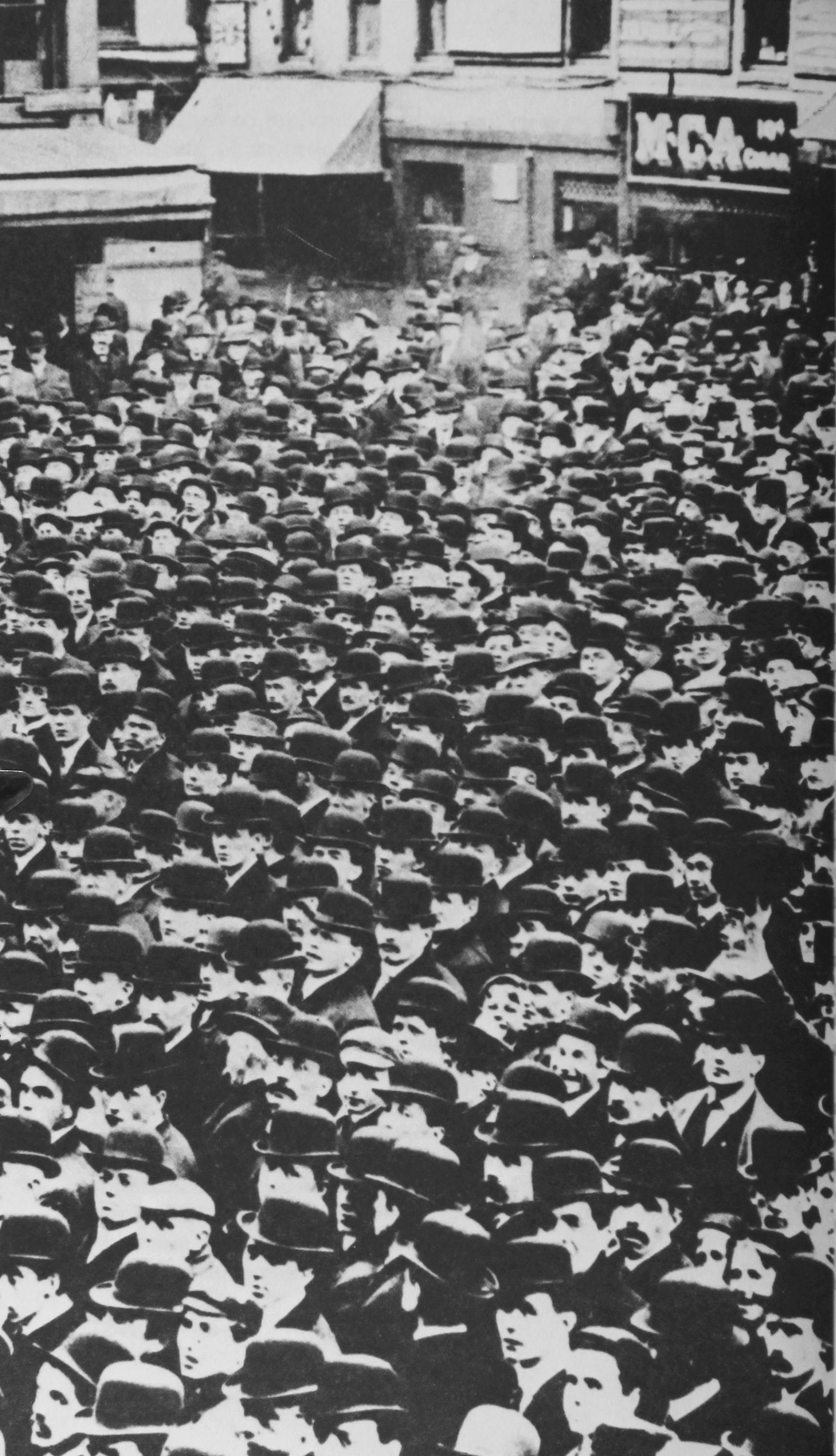
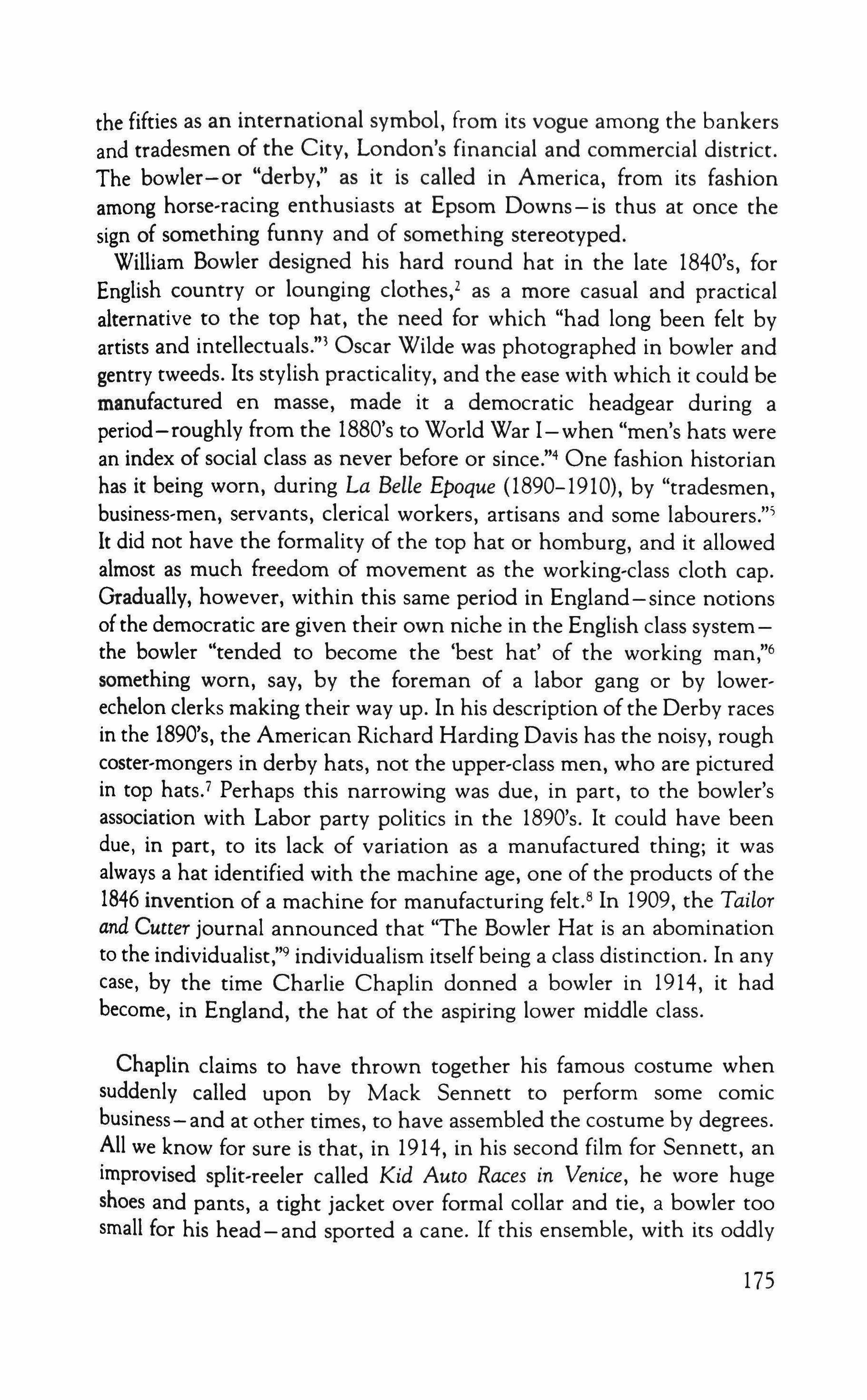
the fifties as an international symbol, from its vogue among the bankers and tradesmen of the City, London's financial and commercial district. The bowler-or "derby," as it is called in America, from its fashion among horse-racing enthusiasts at Epsom Downs-is thus at once the sign of something funny and of something stereotyped. William Bowler designed his hard round hat in the late 1840's, for English country or lounging clothes,' as a more casual and practical alternative to the top hat, the need for which "had long been felt by artists and intellectuals." Oscar Wilde was photographed in bowler and gentry tweeds. Its stylish practicality, and the ease with which it could be manufactured en masse, made it a democratic headgear during a period-roughly from the 1880's to World War I-when "men's hats were an index of social class as never before or since." One fashion historian has it being worn, during La Belle Epoque (1890-1910), by "tradesmen, business-men, servants, clerical workers, artisans and some labourers."> It did not have the formality of the top hat or homburg, and it allowed almost as much freedom of movement as the working-class cloth cap. Gradually, however, within this same period in England-since notions ofthe democratic are given their own niche in the English class systemthe bowler "tended to become the 'best hat' of the working man," something worn, say, by the foreman of a labor gang or by lowerechelon clerks making their way up. In his description of the Derby races in the 1890's, the American Richard Harding Davis has the noisy, rough coster-mongers in derby hats, not the upper-class men, who are pictured in top hats.? Perhaps this narrowing was due, in part, to the bowler's association with Labor party politics in the 1890's. It could have been due, in part, to its lack of variation as a manufactured thing; it was always a hat identified with the machine age, one of the products of the 1846 invention of a machine for manufacturing felt.s In 1909, the Tailor and Cutter journal announced that "The Bowler Hat is an abomination to the individualist,"? individualism itselfbeing a class distinction. In any case, by the time Charlie Chaplin donned a bowler in 1914, it had become, in England, the hat of the aspiring lower middle class.
Chaplin claims to have thrown together his famous costume when suddenly called upon by Mack Sennett to perform some comic business-and at other times, to have assembled the costume by degrees. All we know for sure is that, in 1914, in his second film for Sennett, an improvised split-reeler called Kid Auto Races in Venice, he wore huge shoes and pants, a tight jacket over formal collar and tie, a bowler too small for his head-and sported a cane. If this ensemble, with its oddly
175
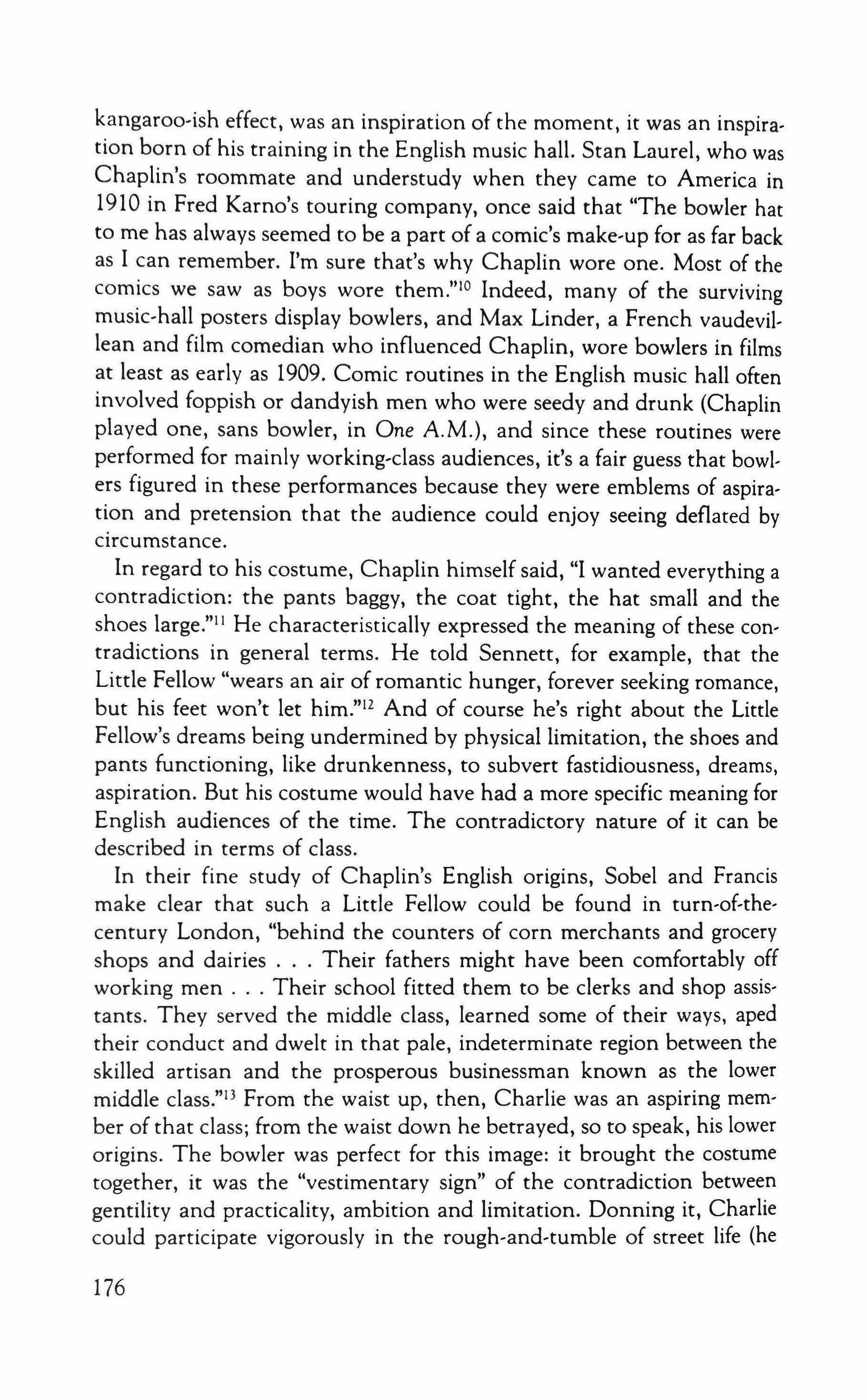
kangaroo-ish effect, was an inspiration of the moment, it was an inspiration born of his training in the English music hall. Stan Laurel, who was Chaplin's roommate and understudy when they came to America in 1910 in Fred Karno's touring company, once said that "The bowler hat to me has always seemed to be a part of a comic's make-up for as far back as I can remember. I'm sure that's why Chaplin wore one. Most of the comics we saw as boys wore them,"? Indeed, many of the surviving music-hall posters display bowlers, and Max Linder, a French vaudevillean and film comedian who influenced Chaplin, wore bowlers in films at least as early as 1909. Comic routines in the English music hall often involved foppish or dandyish men who were seedy and drunk (Chaplin played one, sans bowler, in One A.M.), and since these routines were performed for mainly working-class audiences, it's a fair guess that bowlers figured in these performances because they were emblems of aspiration and pretension that the audience could enjoy seeing deflated by circumstance.
In regard to his costume, Chaplin himself said, "I wanted everything a contradiction: the pants baggy, the coat tight, the hat small and the shoes large,"!' He characteristically expressed the meaning of these contradictions in general terms. He told Sennett, for example, that the Little Fellow "wears an air of romantic hunger, forever seeking romance, but his feet won't let him."! And of course he's right about the Little Fellow's dreams being undermined by physical limitation, the shoes and pants functioning, like drunkenness, to subvert fastidiousness, dreams, aspiration. But his costume would have had a more specific meaning for English audiences of the time. The contradictory nature of it can be described in terms of class.
In their fine study of Chaplin's English origins, Sobel and Francis make clear that such a Little Fellow could be found in turn-of-thecentury London, "behind the counters of corn merchants and grocery shops and dairies Their fathers might have been comfortably off working men Their school fitted them to be clerks and shop assistants. They served the middle class, learned some of their ways, aped their conduct and dwelt in that pale, indeterminate region between the skilled artisan and the prosperous businessman known as the lower middle class."" From the waist up, then, Charlie was an aspiring member of that class; from the waist down he betrayed, so to speak, his lower origins. The bowler was perfect for this image: it brought the costume together, it was the "vestimentarv sign" of the contradiction between gentility and practicality, ambition and limitation. Donning it, Charlie could participate vigorously in the rough-and-tumble of street life (he
176
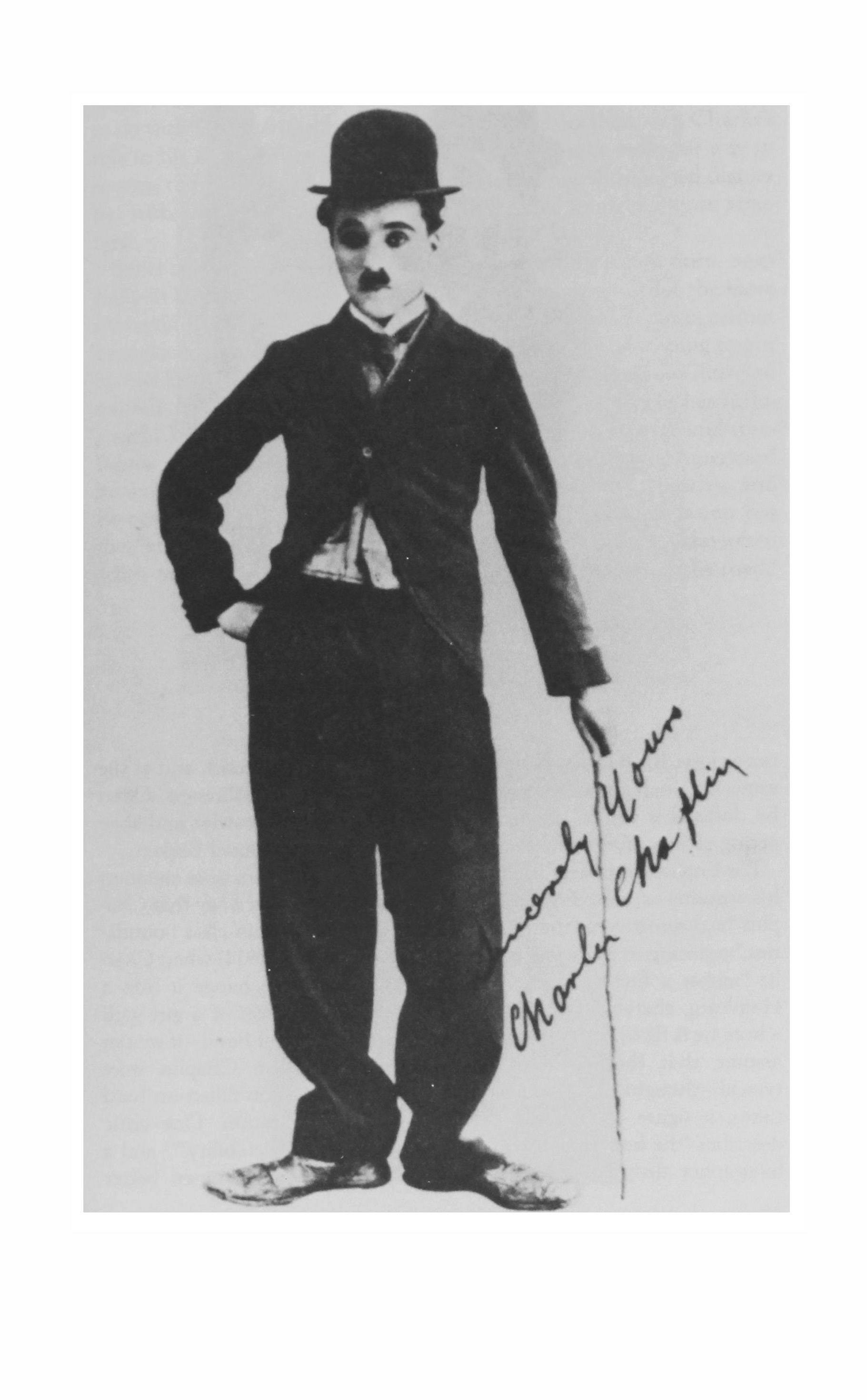
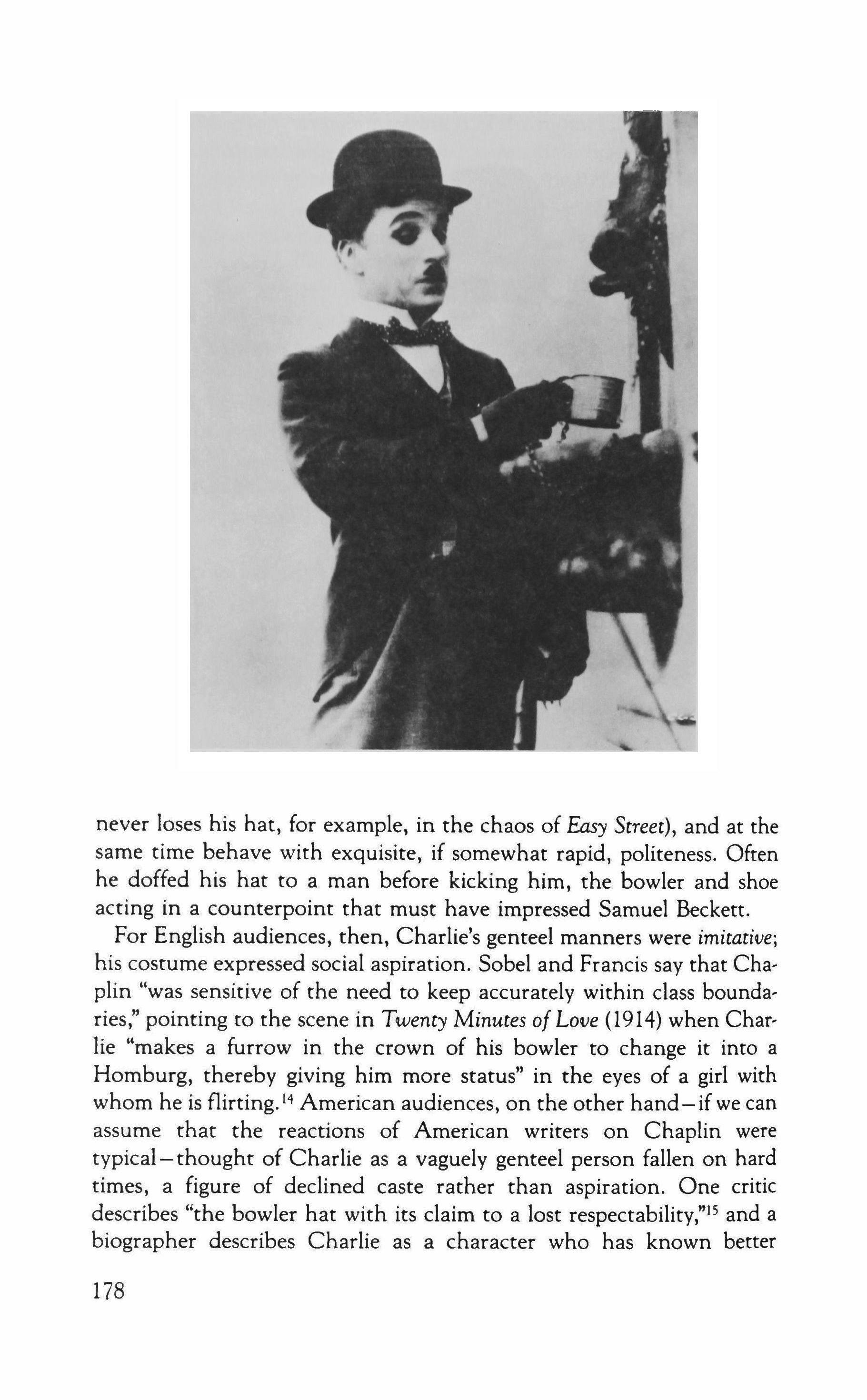
never loses his hat, for example, in the chaos of Easy Street), and at the same time behave with exquisite, if somewhat rapid, politeness. Often he doffed his hat to a man before kicking him, the bowler and shoe acting in a counterpoint that must have impressed Samuel Beckett.
For English audiences, then, Charlie's genteel manners were imitative; his costume expressed social aspiration. Sobel and Francis say that Chaplin "was sensitive of the need to keep accurately within class boundaries," pointing to the scene in Twenty Minutes of Love (1914) when Charlie "makes a furrow in the crown of his bowler to change it into a Homburg, thereby giving him more status" in the eyes of a girl with whom he is flirting. 14 American audiences, on the other hand - if we can assume that the reactions of American writers on Chaplin were typical-thought of Charlie as a vaguely genteel person fallen on hard times, a figure of declined caste rather than aspiration. One critic describes "the bowler hat with its claim to a lost respecrabilitv.I" and a biographer describes Charlie as a character who has known better
178

days." American writers on Laurel and Hardy say their derbies express a "bone-bred politeness" and "phony digniry."? These reactions have more to do with an American reading of English manners than with Charlie's role in his films. Given Charlie's repeated attempts to make his way in society, to be employed or to seek employment, not with pained dignity but with lively ambition, the English perspective seems the more accurate.
Sobel and Francis object to Charlie's being called a tramp since, especially in his early films, he is neither grubby nor vagrant. But the more romantic American reading, which insists on Charlie as a tramp, cannot be overlooked, especially since Chaplin himself, perhaps wishing to put his low English origins behind him, insisted on it. As Winston Churchill astutely remarked in 1935, "the American scene as a whole has influenced Chaplin-its variety, its color, its animation, its strange and spectacular contrasts," and Chaplin's tramp is "characteristically American" because he "refuses to acknowledge defeat." Unlike the "spiritless and homeless" English tramps, outcasts from society, Chaplin's tramp has the "indomitable spirit" of the American hobo, someone who often rebels against routine and loves "the changes and chances of the road,"
179
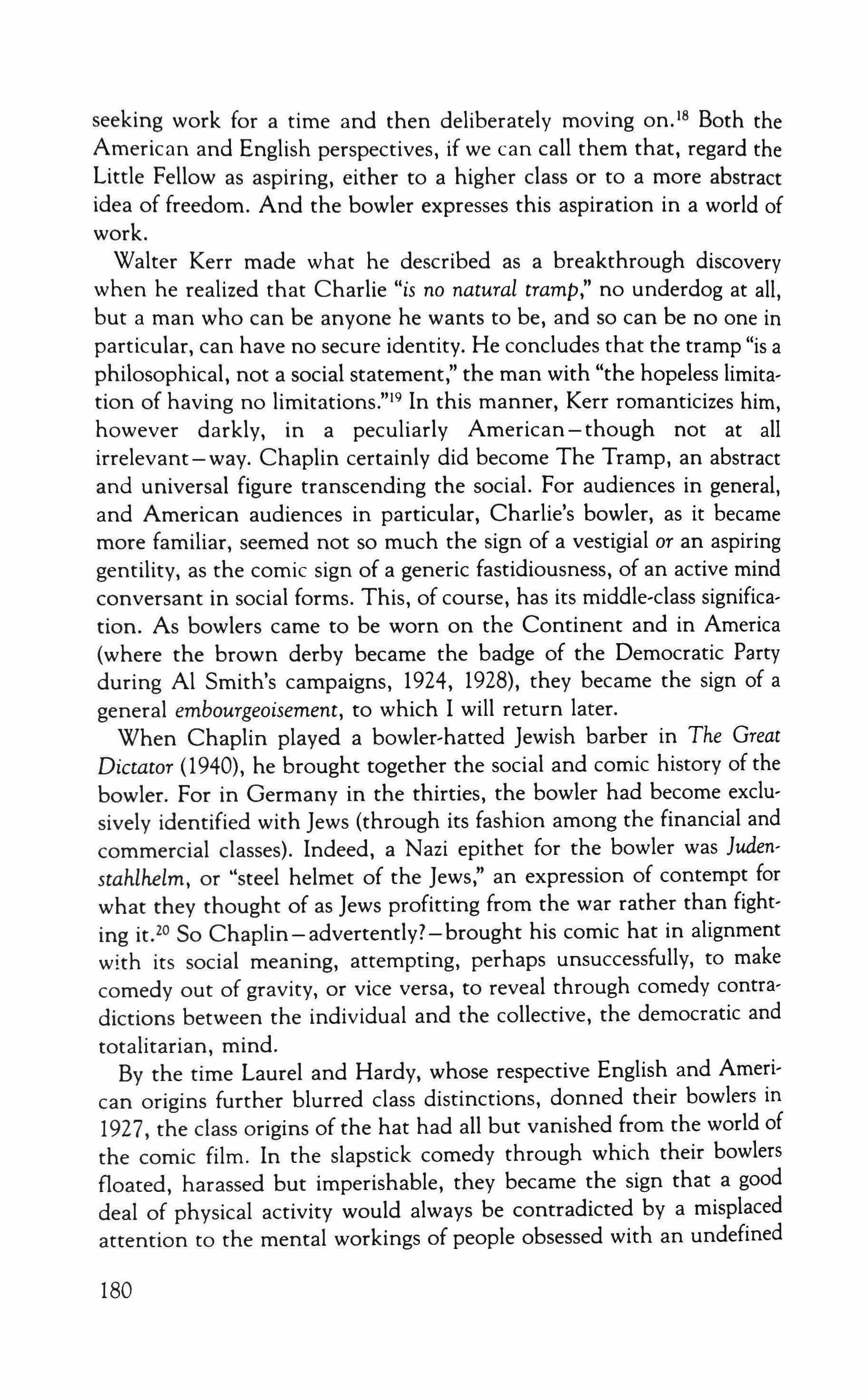
seeking work for a time and then deliberately moving on." Both the American and English perspectives, if we can call them that, regard the Little Fellow as aspiring, either to a higher class or to a more abstract idea of freedom. And the bowler expresses this aspiration in a world of work.
Walter Kerr made what he described as a breakthrough discovery when he realized that Charlie "is no natural tramp," no underdog at all, but a man who can be anyone he wants to be, and so can be no one in particular, can have no secure identity. He concludes that the tramp "is a philosophical, not a social statement," the man with "the hopeless limitation of having no limitations."? In this manner, Kerr romanticizes him, however darkly, in a peculiarly American - though not at all irrelevant-way. Chaplin certainly did become The Tramp, an abstract and universal figure transcending the social. For audiences in general, and American audiences in particular, Charlie's bowler, as it became more familiar, seemed not so much the sign of a vestigial or an aspiring gentility, as the comic sign of a generic fastidiousness, of an active mind conversant in social forms. This, of course, has its middle-class signification. As bowlers came to be worn on the Continent and in America (where the brown derby became the badge of the Democratic Party during Al Smith's campaigns, 1924, 1928), they became the sign of a general embourgeoisement, to which I will return later.
When Chaplin played a bowler-hatted Jewish barber in The Great Dictator (1940), he brought together the social and comic history of the bowler. For in Germany in the thirties, the bowler had become exclusively identified with Jews (through its fashion among the financial and commercial classes). Indeed, a Nazi epithet for the bowler was Iudenstahlhelm, or "steel helmet of the Jews," an expression of contempt for what they thought of as Jews profitting from the war rather than fighting it.20 So Chaplin-advertently?-brought his comic hat in alignment with its social meaning, attempting, perhaps unsuccessfully, to make comedy out of gravity, or vice versa, to reveal through comedy contradictions between the individual and the collective, the democratic and totalitarian, mind.
By the time Laurel and Hardy, whose respective English and American origins further blurred class distinctions, donned their bowlers in 1927, the class origins of the hat had all but vanished from the world of the comic film. In the slapstick comedy through which their bowlers floated, harassed but imperishable, they became the sign that a good deal of physical activity would always be contradicted by a misplaced attention to the mental workings of people obsessed with an undefined
180
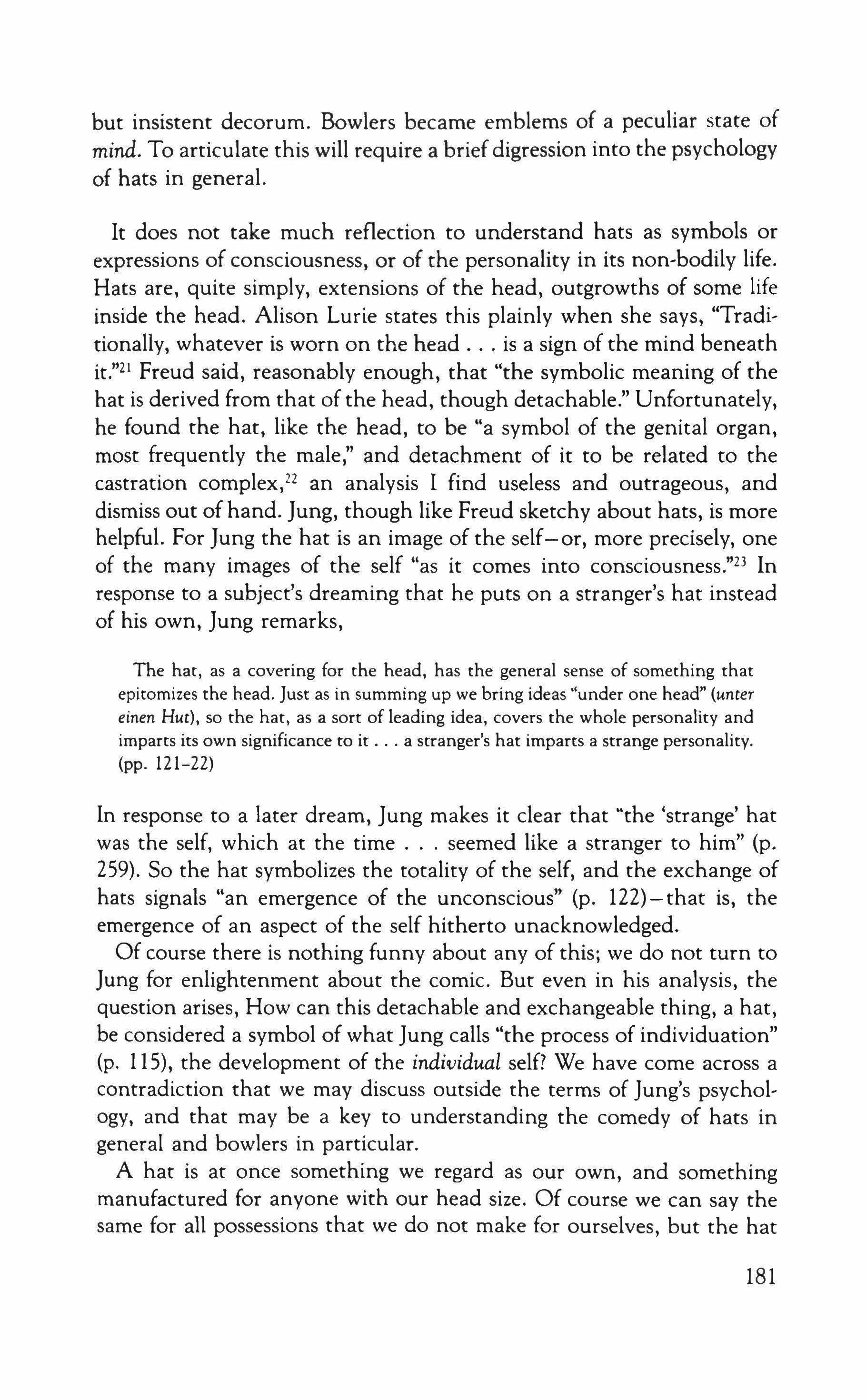
but insistent decorum. Bowlers became emblems of a peculiar state of mind. To articulate this will require a briefdigression into the psychology of hats in general.
It does not take much reflection to understand hats as symbols or expressions of consciousness, or of the personality in its non-bodily life. Hats are, quite simply, extensions of the head, outgrowths of some life inside the head. Alison Lurie states this plainly when she says, "Traditionally, whatever is worn on the head is a sign of the mind beneath it."21 Freud said, reasonably enough, that "the symbolic meaning of the hat is derived from that of the head, though detachable." Unfortunately, he found the hat, like the head, to be "a symbol of the genital organ, most frequently the male," and detachment of it to be related to the castration complex," an analysis I find useless and outrageous, and dismiss out of hand. jung, though like Freud sketchy about hats, is more helpful. For [ung the hat is an image of the self-or, more precisely, one of the many images of the self "as it comes into consciousness."23 In response to a subject's dreaming that he puts on a stranger's hat instead of his own, jung remarks,
The hat, as a covering for the head, has the general sense of something that epitomizes the head. Just as in summing up we bring ideas "under one head" (unter einen Hut), so the hat, as a sort of leading idea, covers the whole personality and imparts its own significance to it a stranger's hat imparts a strange personality. (pp. 121-22)
In response to a later dream, [ung makes it clear that "the 'strange' hat was the self, which at the time seemed like a stranger to him" (p. 259). So the hat symbolizes the totality of the self, and the exchange of hats signals "an emergence of the unconscious" (p. 122)-that is, the emergence of an aspect of the self hitherto unacknowledged.
Of course there is nothing funny about any of this; we do not turn to [ung for enlightenment about the comic. But even in his analysis, the question arises, How can this detachable and exchangeable thing, a hat, be considered a symbol of what Jung calls "the process of individuation" (p. 115), the development of the individual self? We have come across a contradiction that we may discuss outside the terms of jung's psychology, and that may be a key to understanding the comedy of hats in general and bowlers in particular.
A hat is at once something we regard as our own, and something manufactured for anyone with our head size. Of course we can say the same for all possessions that we do not make for ourselves, but the hat
181
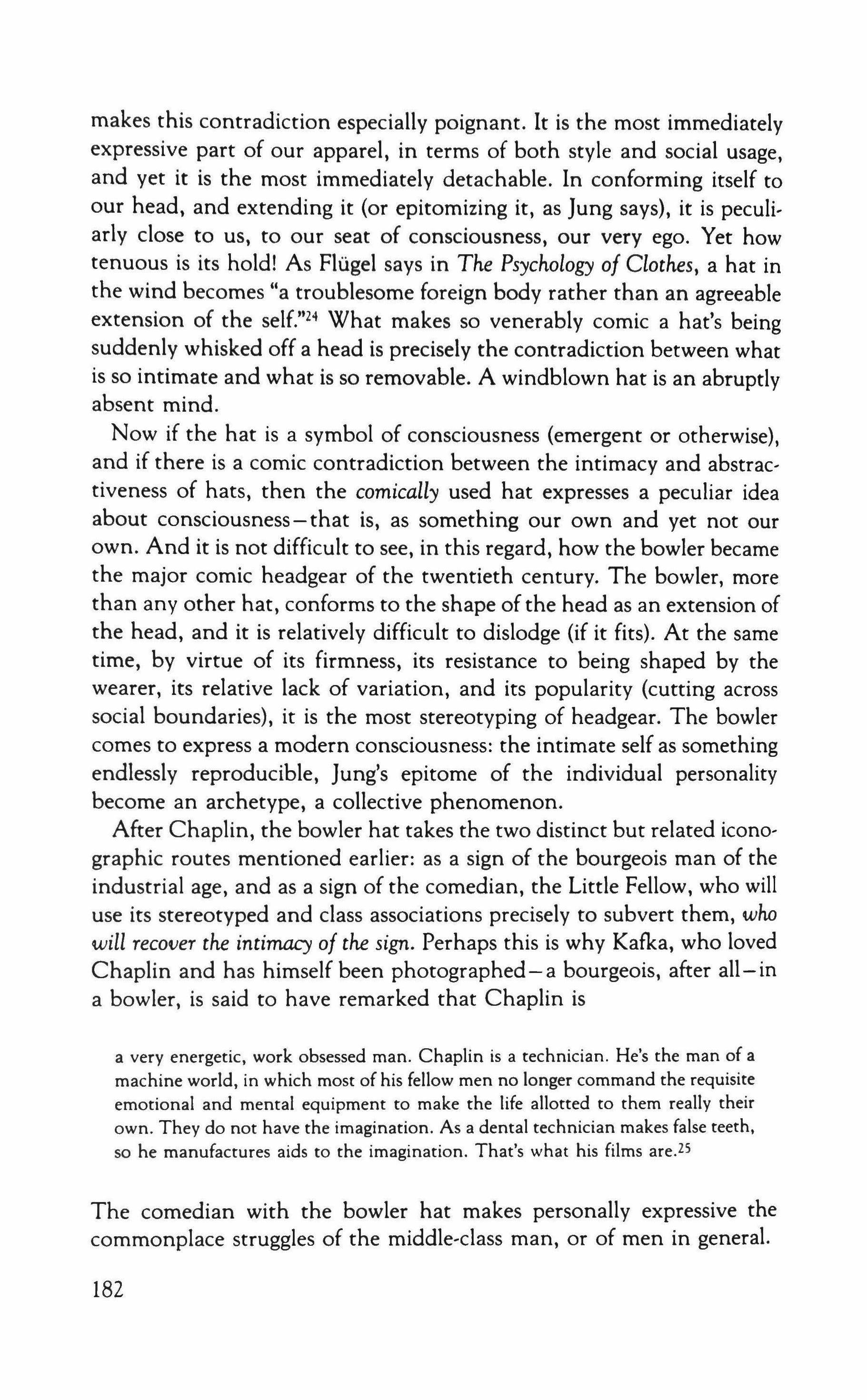
makes this contradiction especially poignant. It is the most immediately expressive part of our apparel, in terms of both style and social usage, and yet it is the most immediately detachable. In conforming itself to our head, and extending it (or epitomizing it, as lung says), it is peculiarly close to us, to our seat of consciousness, our very ego. Yet how tenuous is its hold! As Flugel says in The Psychology of Clothes, a hat in the wind becomes "a troublesome foreign body rather than an agreeable extension of the self."24 What makes so venerably comic a hat's being suddenly whisked off a head is precisely the contradiction between what is so intimate and what is so removable. A windblown hat is an abruptly absent mind.
Now if the hat is a symbol of consciousness (emergent or otherwise), and if there is a comic contradiction between the intimacy and abstractiveness of hats, then the comically used hat expresses a peculiar idea about consciousness - that is, as something our own and yet not our own. And it is not difficult to see, in this regard, how the bowler became the major comic headgear of the twentieth century. The bowler, more than any other hat, conforms to the shape of the head as an extension of the head, and it is relatively difficult to dislodge (if it fits). At the same time, by virtue of its firmness, its resistance to being shaped by the wearer, its relative lack of variation, and its popularity (cutting across social boundaries), it is the most stereotyping of headgear. The bowler comes to express a modern consciousness: the intimate self as something endlessly reproducible, lung's epitome of the individual personality become an archetype, a collective phenomenon.
After Chaplin, the bowler hat takes the two distinct but related iconographic routes mentioned earlier: as a sign of the bourgeois man of the industrial age, and as a sign of the comedian, the Little Fellow, who will use its stereotyped and class associations precisely to subvert them, who will recover the intimacy of the sign. Perhaps this is why Kafka, who loved Chaplin and has himself been photographed - a bourgeois, after all- in a bowler, is said to have remarked that Chaplin is a very energetic, work obsessed man. Chaplin is a technician. He's the man of a machine world, in which most of his fellow men no longer command the requisite emotional and mental equipment to make the life allotted to them really their own. They do not have the imagination. As a dental technician makes false teeth, so he manufactures aids to the imagination. That's what his films are.2S
The comedian with the bowler hat makes personally expressive the commonplace struggles of the middle-class man, or of men in general.
182
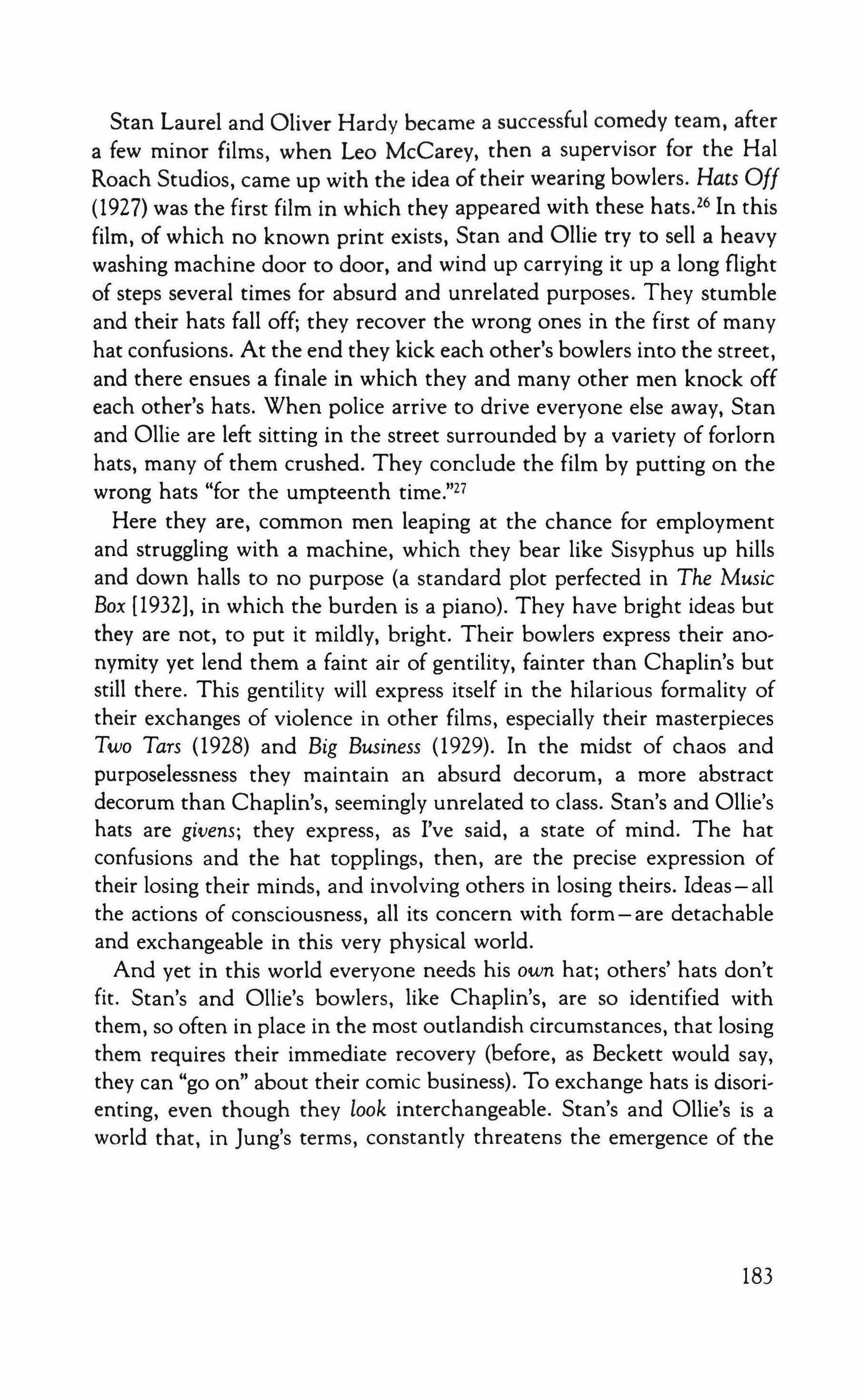
Stan Laurel and Oliver Hardy became a successful comedy team, after a few minor films, when Leo McCarey, then a supervisor for the Hal Roach Studios, came up with the idea of their wearing bowlers. Hats Off (1927) was the first film in which they appeared with these hats.26 In this film, of which no known print exists, Stan and Ollie try to sell a heavy washing machine door to door, and wind up carrying it up a long flight of steps several times for absurd and unrelated purposes. They stumble and their hats fall off; they recover the wrong ones in the first of many hat confusions. At the end they kick each other's bowlers into the street, and there ensues a finale in which they and many other men knock off each other's hats. When police arrive to drive everyone else away, Stan and Ollie are left sitting in the street surrounded by a variety of forlorn hats, many of them crushed. They conclude the film by putting on the wrong hats "for the umpteenth time."27
Here they are, common men leaping at the chance for employment and struggling with a machine, which they bear like Sisyphus up hills and down halls to no purpose (a standard plot perfected in The Music Box [1932], in which the burden is a piano). They have bright ideas but they are not, to put it mildly, bright. Their bowlers express their anonymity yet lend them a faint air of gentility, fainter than Chaplin's but still there. This gentility will express itself in the hilarious formality of their exchanges of violence in other films, especially their masterpieces Two Tars (1928) and Big Business (1929). In the midst of chaos and purposelessness they maintain an absurd decorum, a more abstract decorum than Chaplin's, seemingly unrelated to class. Stan's and Ollie's hats are givens; they express, as I've said, a state of mind. The hat confusions and the hat topplings, then, are the precise expression of their losing their minds, and involving others in losing theirs. Ideas - all the actions of consciousness, all its concern with form - are detachable and exchangeable in this very physical world.
And yet in this world everyone needs his own hat; others' hats don't fit. Stan's and Ollie's bowlers, like Chaplin's, are so identified with them, so often in place in the most outlandish circumstances, that losing them requires their immediate recovery (before, as Beckett would say, they can "go on" about their comic business). To exchange hats is disorienting, even though they look interchangeable. Stan's and Ollie's is a world that, in lung's terms, constantly threatens the emergence of the
183
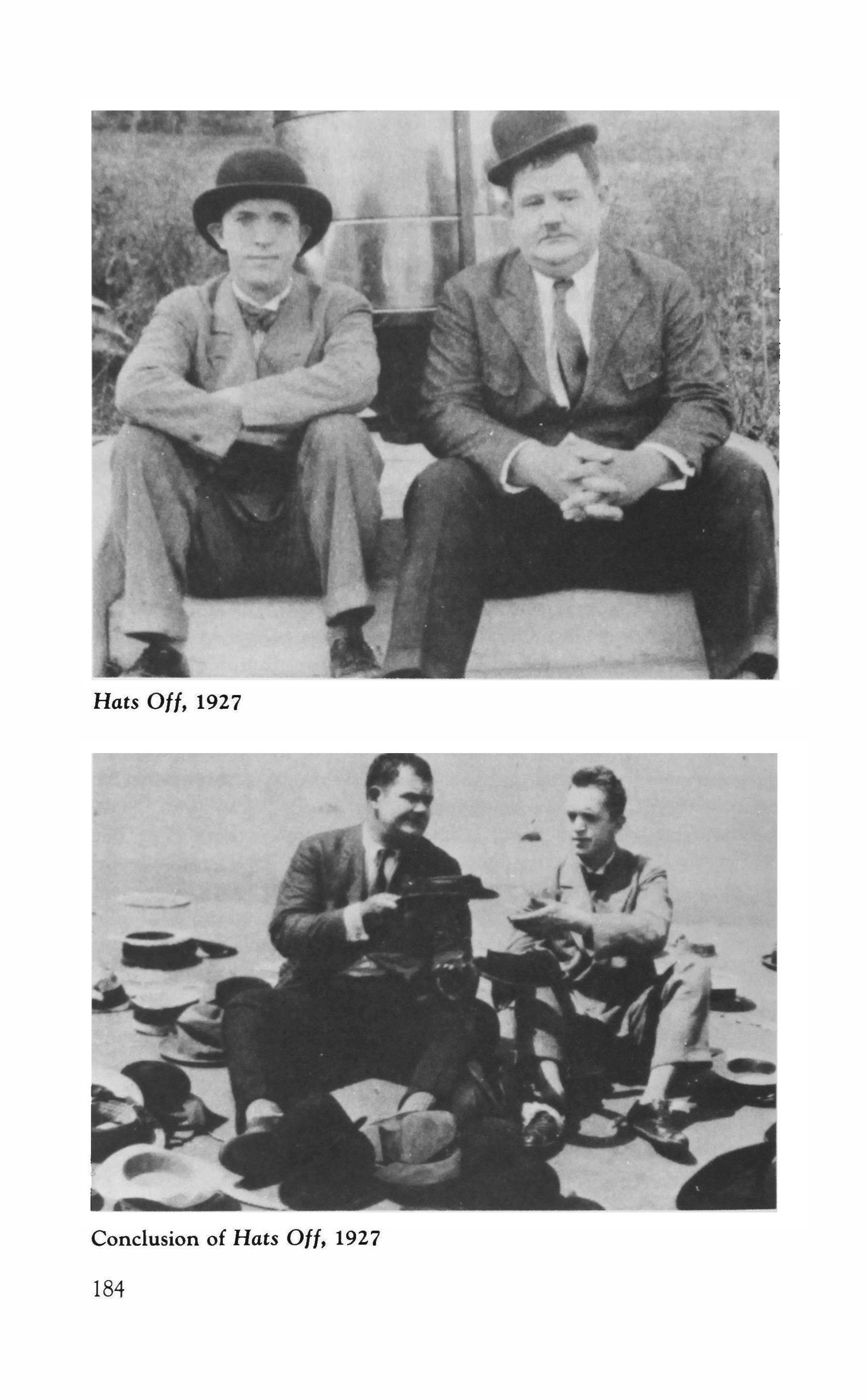 Hats Off, 1927
Hats Off, 1927
184
Conclusion of Hats Off, 1927
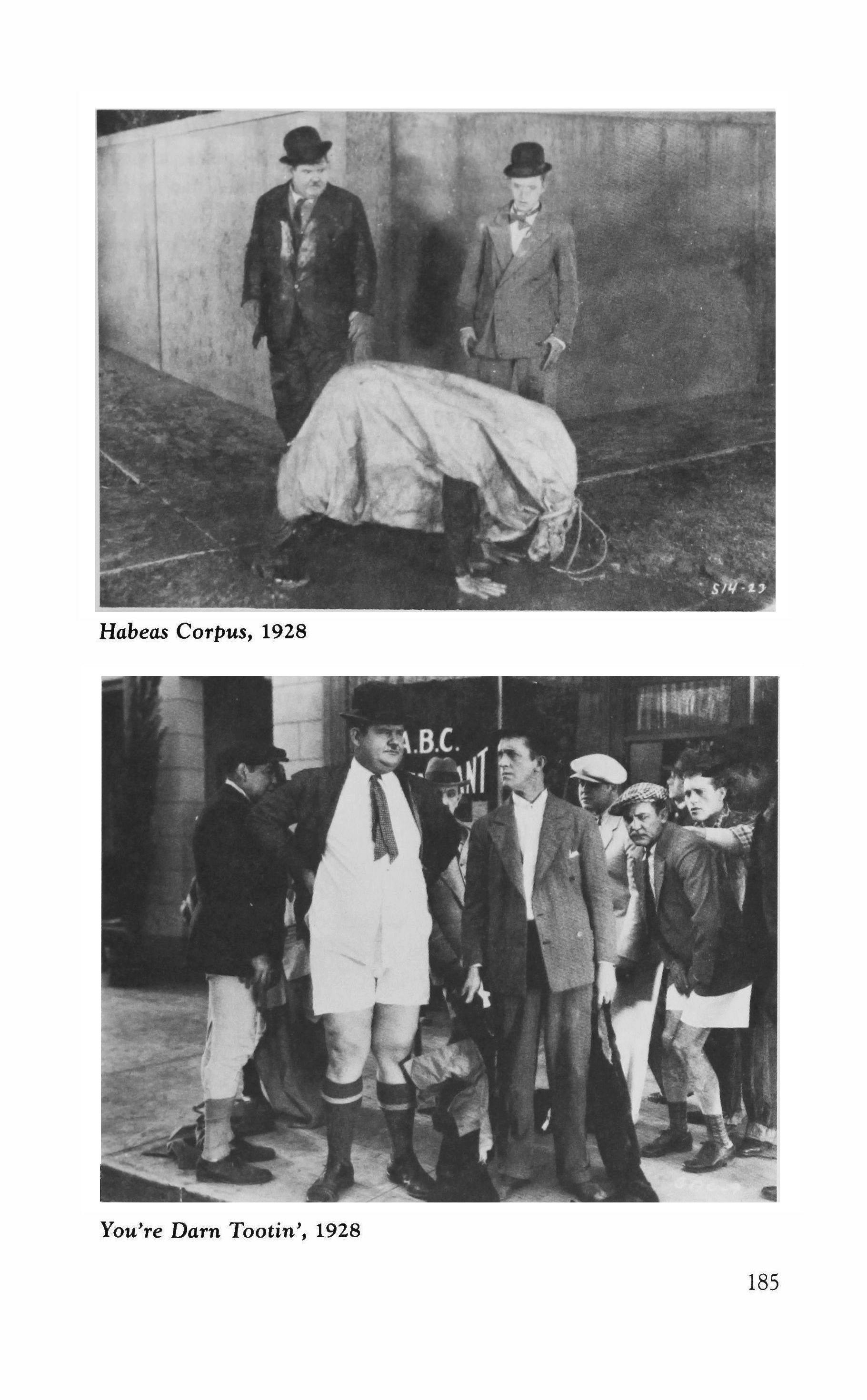 Habeas Corpus, 1928
Habeas Corpus, 1928
185
You're Darn Tootin', 1928
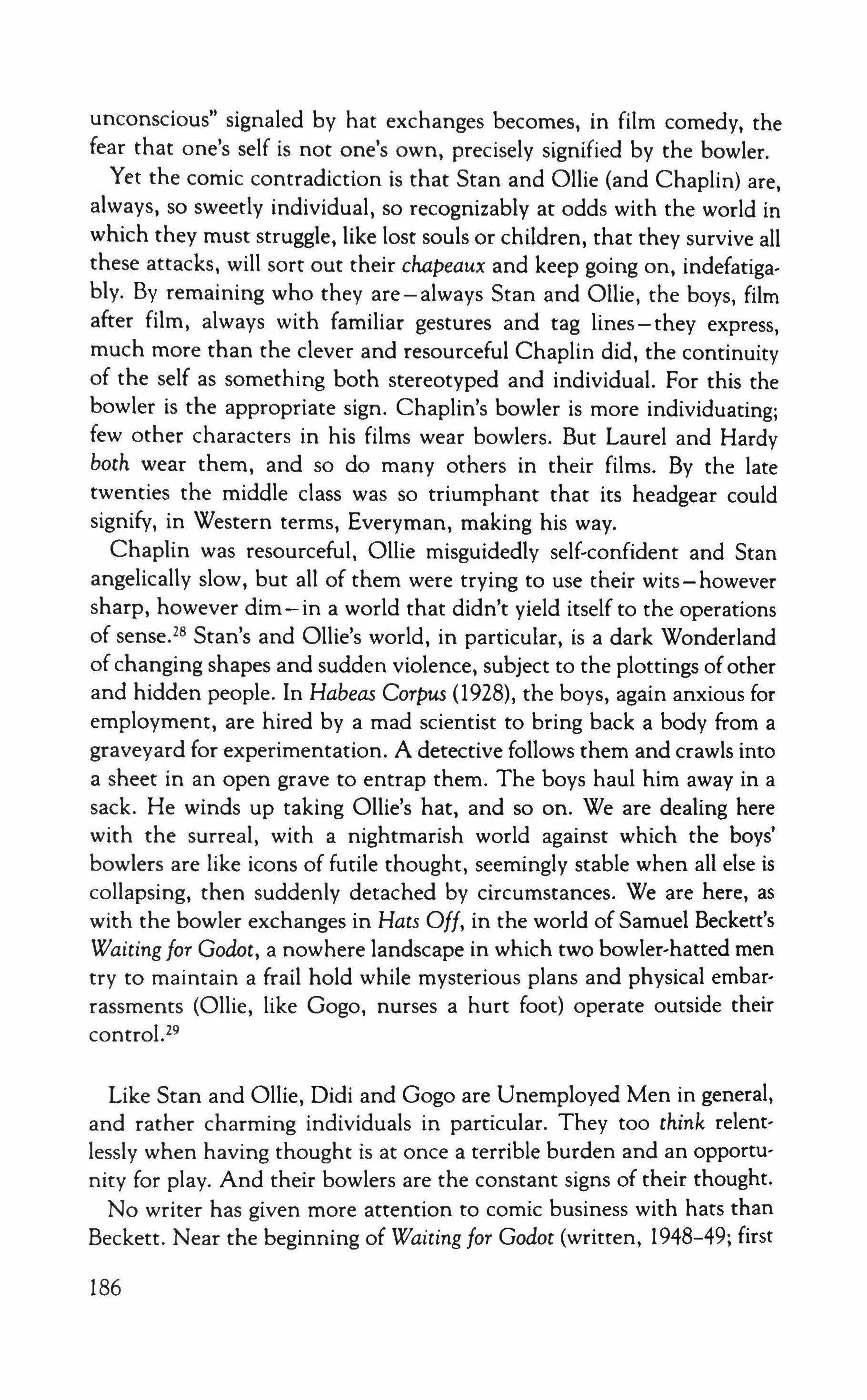
unconscious" signaled by hat exchanges becomes, in film comedy, the fear that one's self is not one's own, precisely signified by the bowler.
Yet the comic contradiction is that Stan and Ollie (and Chaplin) are, always, so sweetly individual, so recognizably at odds with the world in which they must struggle, like lost souls or children, that they survive all these attacks, will sort out their chapeaux and keep going on, indefatigably. By remaining who they are-always Stan and Ollie, the boys, film after film, always with familiar gestures and tag lines-they express, much more than the clever and resourceful Chaplin did, the continuity of the self as something both stereotyped and individual. For this the bowler is the appropriate sign. Chaplin's bowler is more individuating; few other characters in his films wear bowlers. But Laurel and Hardy both wear them, and so do many others in their films. By the late twenties the middle class was so triumphant that its headgear could signify, in Western terms, Everyman, making his way.
Chaplin was resourceful, Ollie misguidedly self-confident and Stan angelically slow, but all of them were trying to use their wits-however sharp, however dim - in a world that didn't yield itself to the operations of sense." Stan's and Ollie's world, in particular, is a dark Wonderland of changing shapes and sudden violence, subject to the plottings ofother and hidden people. In Habeas Corpus (1928), the boys, again anxious for employment, are hired by a mad scientist to bring back a body from a graveyard for experimentation. A detective follows them and crawls into a sheet in an open grave to entrap them. The boys haul him away in a sack. He winds up taking Ollie's hat, and so on. We are dealing here with the surreal, with a nightmarish world against which the boys' bowlers are like icons of futile thought, seemingly stable when all else is collapsing, then suddenly detached by circumstances. We are here, as with the bowler exchanges in Hats Off, in the world of Samuel Beckett's Waiting for Godat, a nowhere landscape in which two bowler-hatted men try to maintain a frail hold while mysterious plans and physical embarrassments (Ollie, like Gogo, nurses a hurt foot) operate outside their control.i?
Like Stan and Ollie, Didi and Gogo are Unemployed Men in general, and rather charming individuals in particular. They too think relentlessly when having thought is at once a terrible burden and an opportunity for play. And their bowlers are the constant signs of their thought. No writer has given more attention to comic business with hats than Beckett. Near the beginning of Waiting for Godot (written, 1948-49; first
186
performed, 1953), Didi muses about not losing heart, about feeling hope even if it is deferred.
VLADIMIR: Sometimes I feel it coming all the same. Then I go all queer. (He takes off his hat, peers inside it, feels about inside it, shakes it, puts it on again.) How shall I say? Relieved and at the same time (he searches for the word) appalled. (With emphasis.) AP-PALLED. (He takes off his hat again, peers inside it.) Funny. (He knocks on the crown as though to dislodge a foreign body, peers into it again, puts it on again.) Nothing to be done.w
The "it" that he feels may refer to "The last moment," on which he has been meditating, as well as to "Hope." Didi and Gogo hope for something-a last moment, salvation, Godot, an end to their waitingand this hope is always deferred. Didi's hat (a bowler, of course; Beckett specified bowlers for all four main characters), clearly an emblem of his consciousness, seems at once to contain thought (hence hope) and to be empty (hope being always deferred; hence nothing is to be done). Thought is there, inside the hat, but it is futile. Didi's attempt "to dislodge a foreign body" from his bowler suggests that thinking, like a hat, is not native to us, is something worn. Later Didi says, ambiguously, "Thinking
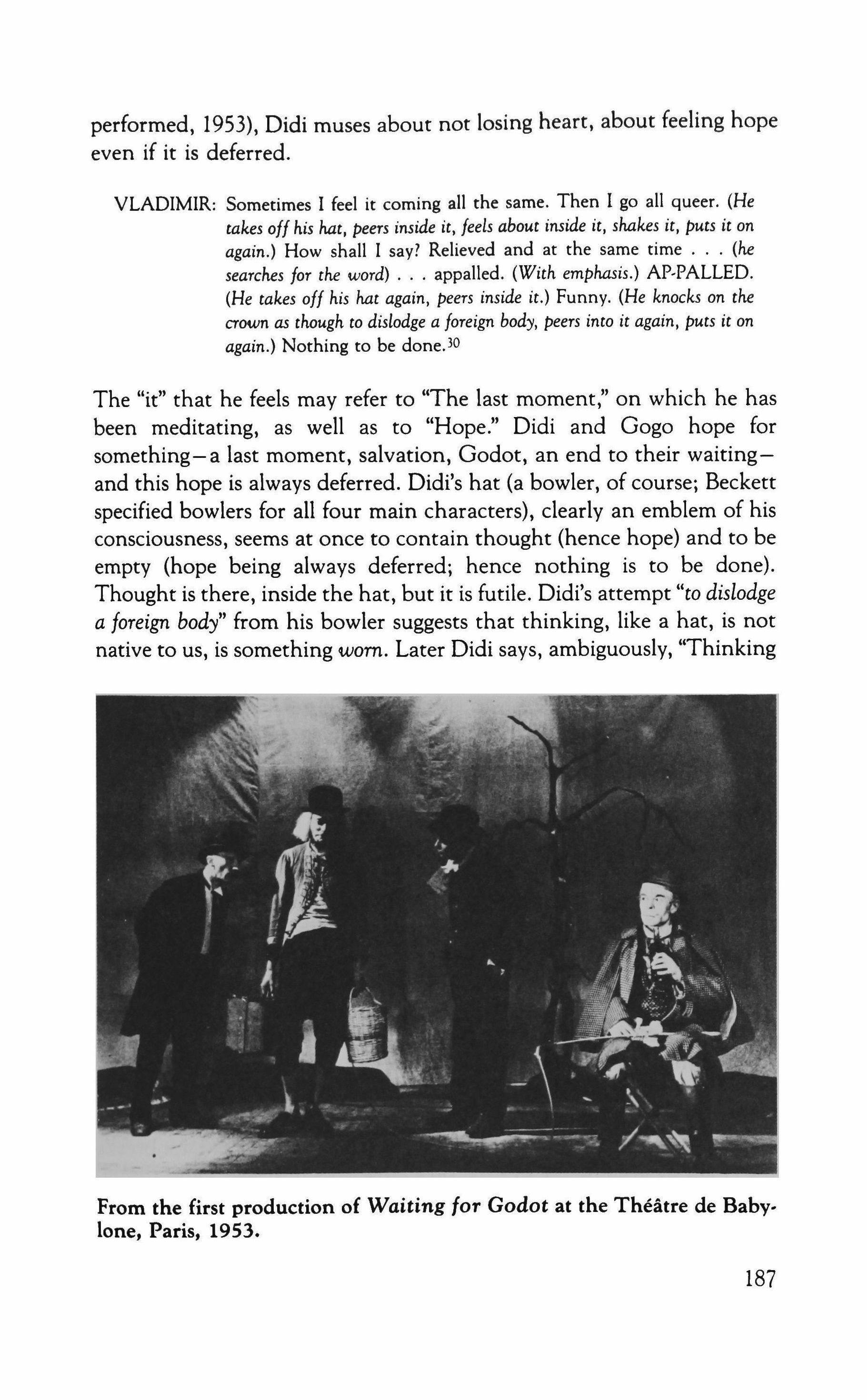
From the first production of Waiting for Godot at the Theatre de Baby. lone, Paris, 1953.
187
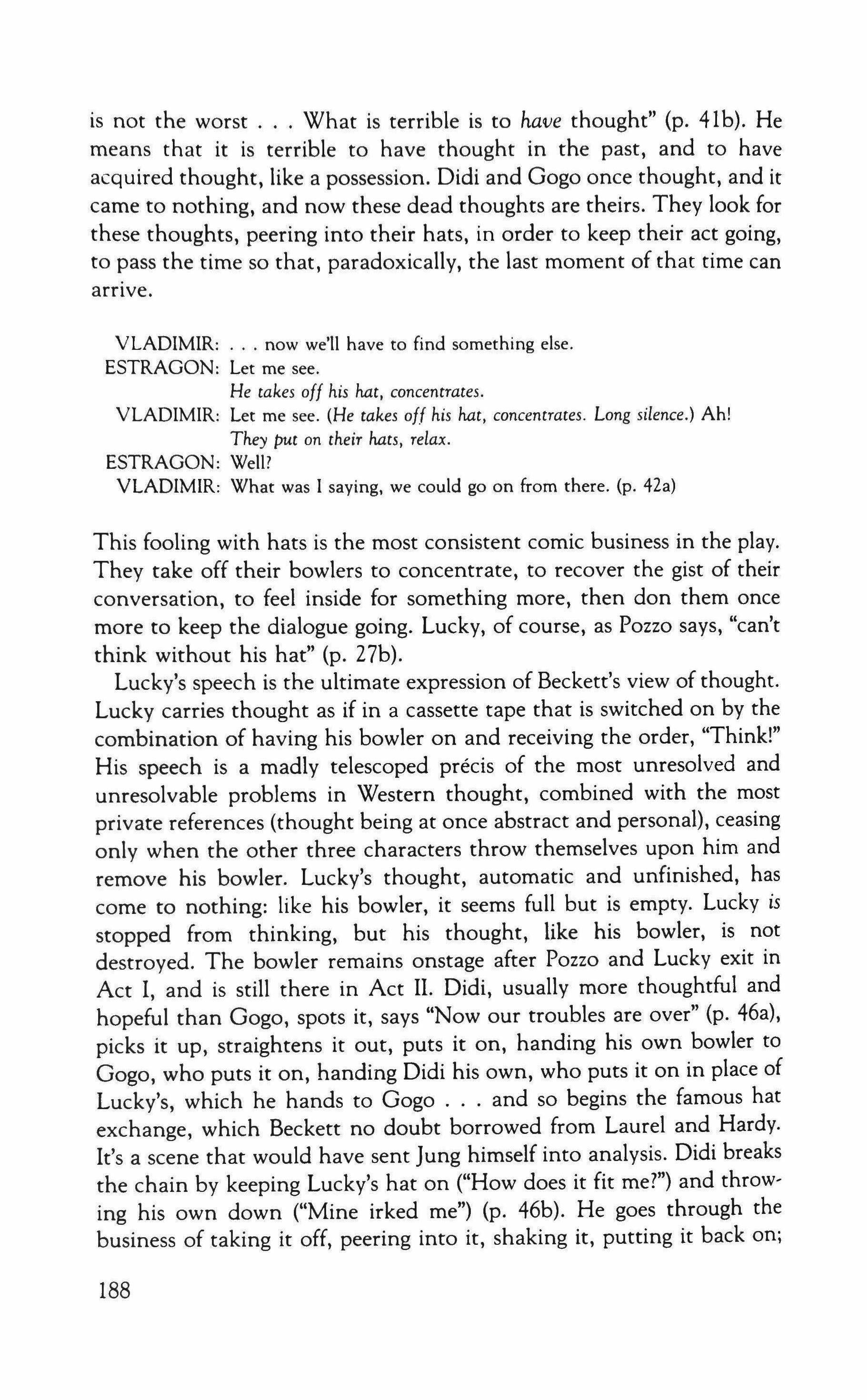
is not the worst What is terrible is to have thought" (p. 41b). He means that it is terrible to have thought in the past, and to have acquired thought, like a possession. Didi and Gogo once thought, and it came to nothing, and now these dead thoughts are theirs. They look for these thoughts, peering into their hats, in order to keep their act going, to pass the time so that, paradoxically, the last moment of that time can arrive.
VLADIMIR: now we'll have to find something else.
ESTRAGON: Let me see. He takes off his hat, concentrates.
VLADIMIR: Let me see. (He takes ofl his hat, concentrates. Long silence.) Ah! They puc on their hats, relax.
ESTRAGON: Well?
VLADIMIR: What was I saying, we could go on from there. (p. 42a)
This fooling with hats is the most consistent comic business in the play. They take off their bowlers to concentrate, to recover the gist of their conversation, to feel inside for something more, then don them once more to keep the dialogue going. Lucky, of course, as Pozzo says, "can't think without his hat" (p. 27b).
Lucky's speech is the ultimate expression of Beckett's view of thought. Lucky carries thought as if in a cassette tape that is switched on by the combination of having his bowler on and receiving the order, "Think!" His speech is a madly telescoped precis of the most unresolved and unresolvable problems in Western thought, combined with the most private references (thought being at once abstract and personal), ceasing only when the other three characters throw themselves upon him and remove his bowler. Lucky's thought, automatic and unfinished, has come to nothing: like his bowler, it seems full but is empty. Lucky is stopped from thinking, but his thought, like his bowler, is not destroyed. The bowler remains onstage after Pozzo and Lucky exit in Act 1, and is still there in Act II. Didi, usually more thoughtful and hopeful than Gogo, spots it, says "Now our troubles are over" (p. 46a), picks it up, straightens it out, puts it on, handing his own bowler to Gogo, who puts it on, handing Didi his own, who puts it on in place of Lucky's, which he hands to Gogo and so begins the famous hat exchange, which Beckett no doubt borrowed from Laurel and Hardy. It's a scene that would have sent jung himself into analysis. Didi breaks the chain by keeping Lucky's hat on ("How does it fit me?") and throwing his own down ("Mine irked me") (p. 46b). He goes through the business of taking it off, peering into it, shaking it, putting it back on;
188
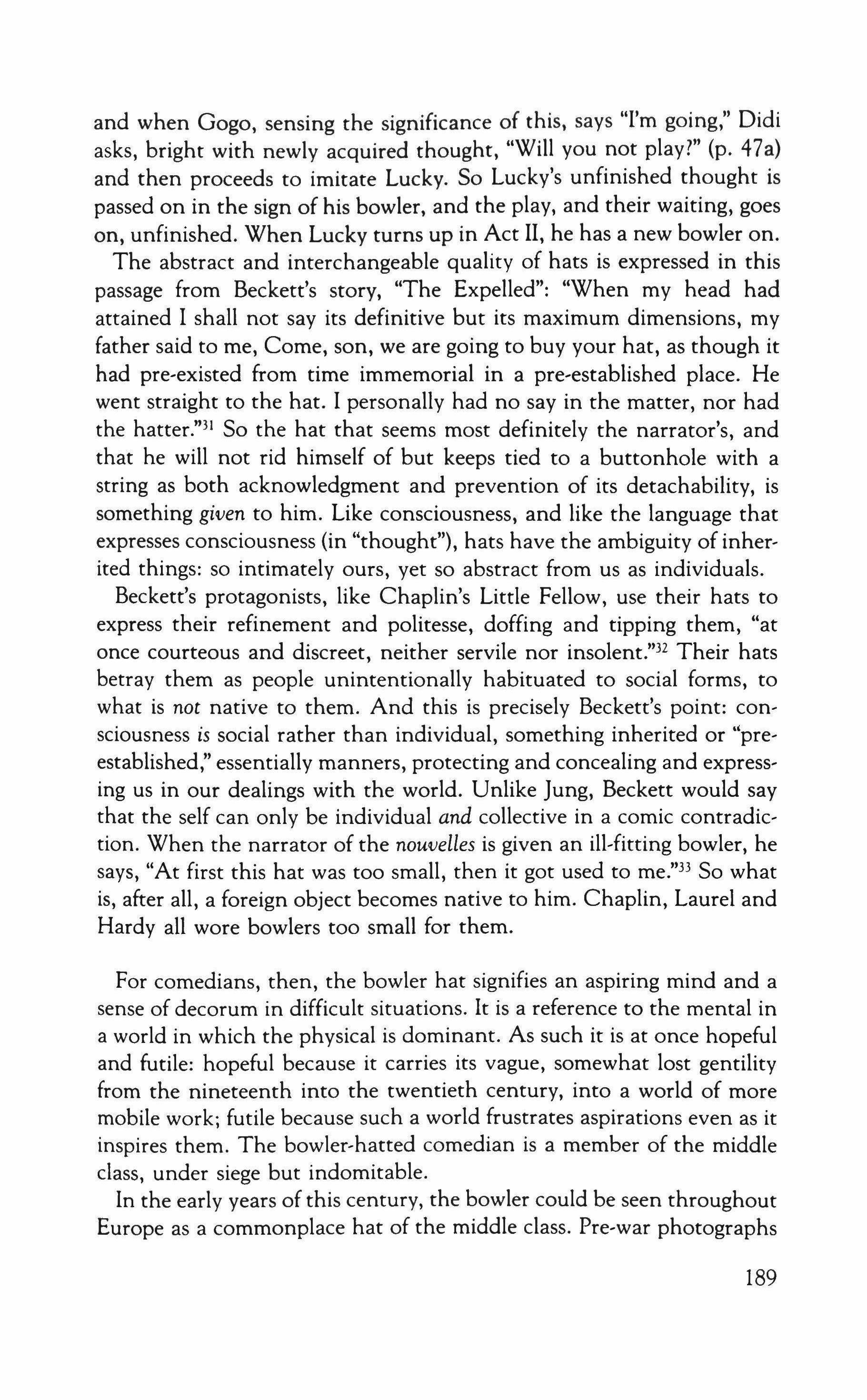
and when Gogo, sensing the significance of this, says "I'm going," Didi asks, bright with newly acquired thought, "Will you not play?" (p. 47a) and then proceeds to imitate Lucky. So Lucky's unfinished thought is passed on in the sign of his bowler, and the play, and their waiting, goes on, unfinished. When Lucky turns up in Act II, he has a new bowler on.
The abstract and interchangeable quality of hats is expressed in this passage from Beckett's story, "The Expelled": "When my head had attained I shall not say its definitive but its maximum dimensions, my father said to me, Come, son, we are going to buy your hat, as though it had pre-existed from time immemorial in a pre-established place. He went straight to the hat. I personally had no say in the matter, nor had the hatter,"!' So the hat that seems most definitely the narrator's, and that he will not rid himself of but keeps tied to a buttonhole with a string as both acknowledgment and prevention of its detachability, is something given to him. Like consciousness, and like the language that expresses consciousness (in "thought"), hats have the ambiguity of inherited things: so intimately ours, yet so abstract from us as individuals.
Beckett's protagonists, like Chaplin's Little Fellow, use their hats to express their refinement and politesse, doffing and tipping them, "at once courteous and discreet, neither servile nor insolent."32 Their hats betray them as people unintentionally habituated to social forms, to what is not native to them. And this is precisely Beckett's point: consciousness is social rather than individual, something inherited or "preestablished," essentially manners, protecting and concealing and expressing us in our dealings with the world. Unlike jung, Beckett would say that the self can only be individual and collective in a comic contradiction. When the narrator of the nouvelles is given an ill-fitting bowler, he says, "At first this hat was too small, then it got used to me."33 So what is, after all, a foreign object becomes native to him. Chaplin, Laurel and Hardy all wore bowlers too small for them.
For comedians, then, the bowler hat signifies an aspiring mind and a sense of decorum in difficult situations. It is a reference to the mental in a world in which the physical is dominant. As such it is at once hopeful and futile: hopeful because it carries its vague, somewhat lost gentility from the nineteenth into the twentieth century, into a world of more mobile work; futile because such a world frustrates aspirations even as it inspires them. The bowler-hatted comedian is a member of the middle class, under siege but indomitable.
In the early years of this century, the bowler could be seen throughout Europe as a commonplace hat of the middle class. Pre-war photographs
189

of Europe show laborers as well as well-dressed commercial types sporting bowlers. It is difficult to discover why, but after World War I the bowler came to be worn mainly as a businessman's hat-in particular, as I have said, the hat of a man in commerce and finance, modeled on the London City man. The stereotype of the bowler-hatted man in the business suit with umbrella and!or briefcase, probably began in the twenties. The Belgian artist Rene Magritte, in a few paintings of this period, placed the stereotype in surrealist contexts, for comic effects, the contradiction being between the staid, anonymous quality of the man and the mysterious world he is made to inhabit. If Chaplin and Laurel and Hardy and Beckett's characters continue to think and dream and aspire in a world that has made their aspiration unspecific, so Magritte's bowler-hatted men continue to think and dream and aspire in a world that has made them anonymous. Social aspiration is no longer an issue; Magritte's men aspire to express their mental life. In this way Magritte, too, comically recovers the intimacy of the sign.
All of Magritte's paintings present us with a mystery to be solved. The clues are clearly drawn, often banal objects-pipes, apples, bottles, shaving brushes, rocks, windows, curtains - made to seem charged with mysterious life through strange displacements, juxtapositions and transformations. In a 1940 lecture, "Lifeline" (La Ligne de vie), he said,
I made paintings where the objects were represented with the appearance they have in reality, in a style sufficiently objective so that the subversive effect, which they would reveal themselves capable of evoking through certain powers, might exist again in the real world from which these objects have been borrowed-by a perfectly natural exchange.H
Magritte's bowler-hatted men are just such objects, borrowed from a business world with which we are familiar, and returned to that world bearing secret powers. They are charged with the mentality that we imagine fills the conventional shape of their hats.
Magritte painted bowler-hatted men at least twenty-five times, four between 1926-29, twenty-one between 1948-66, most of these in the fitties." So he followed the fashion of the bowler, and its increasing identification with the bourgeois man. One of the early ones, The Menaced Assassin (L'Assassin menace, 1926), offers a mysterious scene for which we must supply the story by picking up clues. However we "read" this painting, we are struck by the combination of the anonymously respectable and the personally criminal. The men all have roughly the same, standard, apathetic faces, which leads us to imagine this as a drama of the self. The assassin has presumably removed his hat (a
190
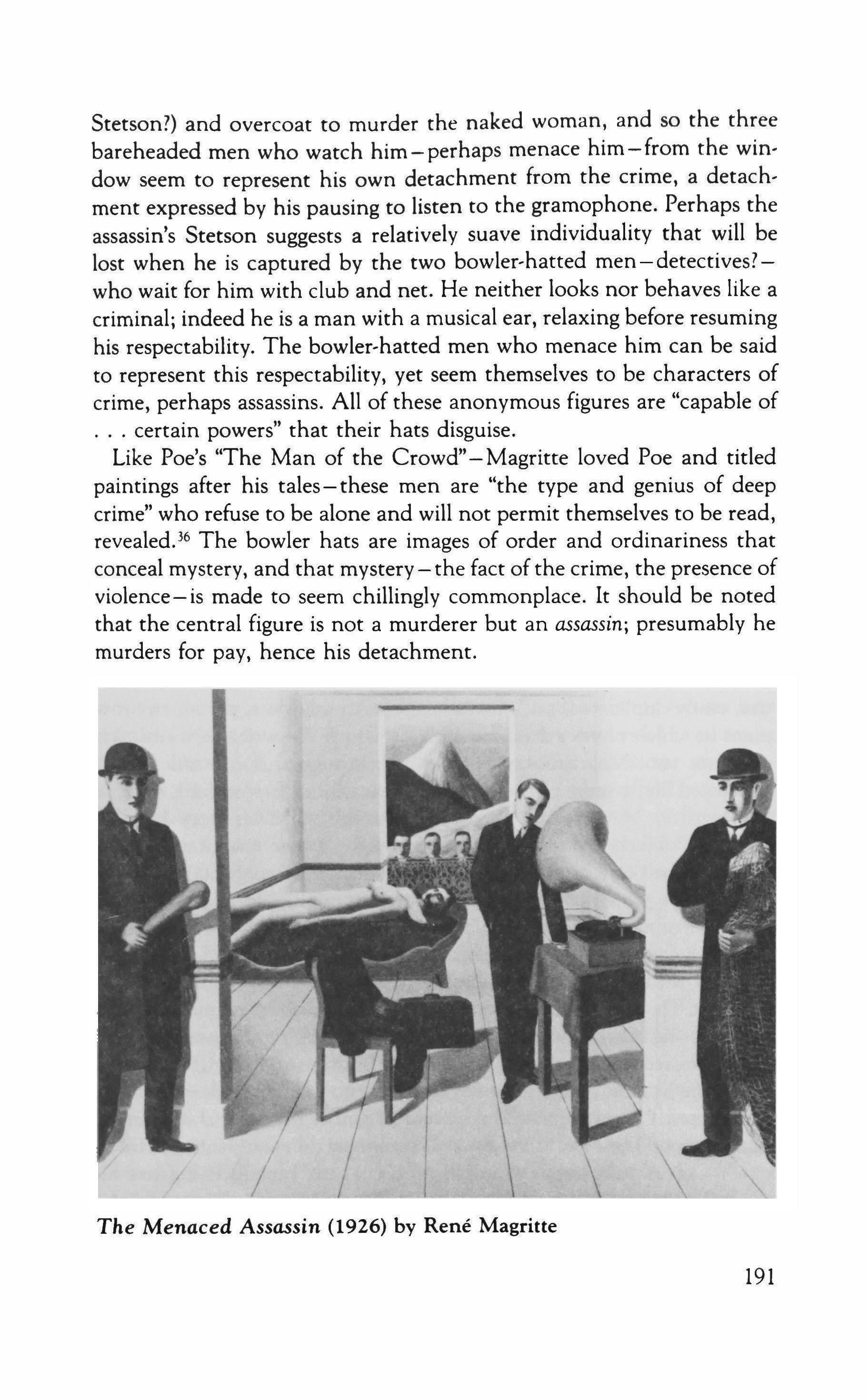
Stetsoni) and overcoat to murder the naked woman, and so the three bareheaded men who watch him-perhaps menace him-from the window seem to represent his own detachment from the crime, a detachment expressed by his pausing to listen to the gramophone. Perhaps the assassin's Stetson suggests a relatively suave individuality that will be lost when he is captured by the two bowler-hatted men - detectives?who wait for him with club and net. He neither looks nor behaves like a criminal; indeed he is a man with a musical ear, relaxing before resuming his respectability. The bowler-hatted men who menace him can be said to represent this respectability, yet seem themselves to be characters of crime, perhaps assassins. All of these anonymous figures are "capable of certain powers" that their hats disguise.
Like Poe's "The Man of the Crowd" - Magritte loved Poe and tided paintings after his tales-these men are "the type and genius of deep crime" who refuse to be alone and will not permit themselves to be read, revealed." The bowler hats are images of order and ordinariness that conceal mystery, and that mystery-the fact of the crime, the presence of violence- is made to seem chillingly commonplace. It should be noted that the central figure is not a murderer but an assassin; presumably he murders for pay, hence his detachment.
191
The Menaced Assassin (1926) by Rene Magritte
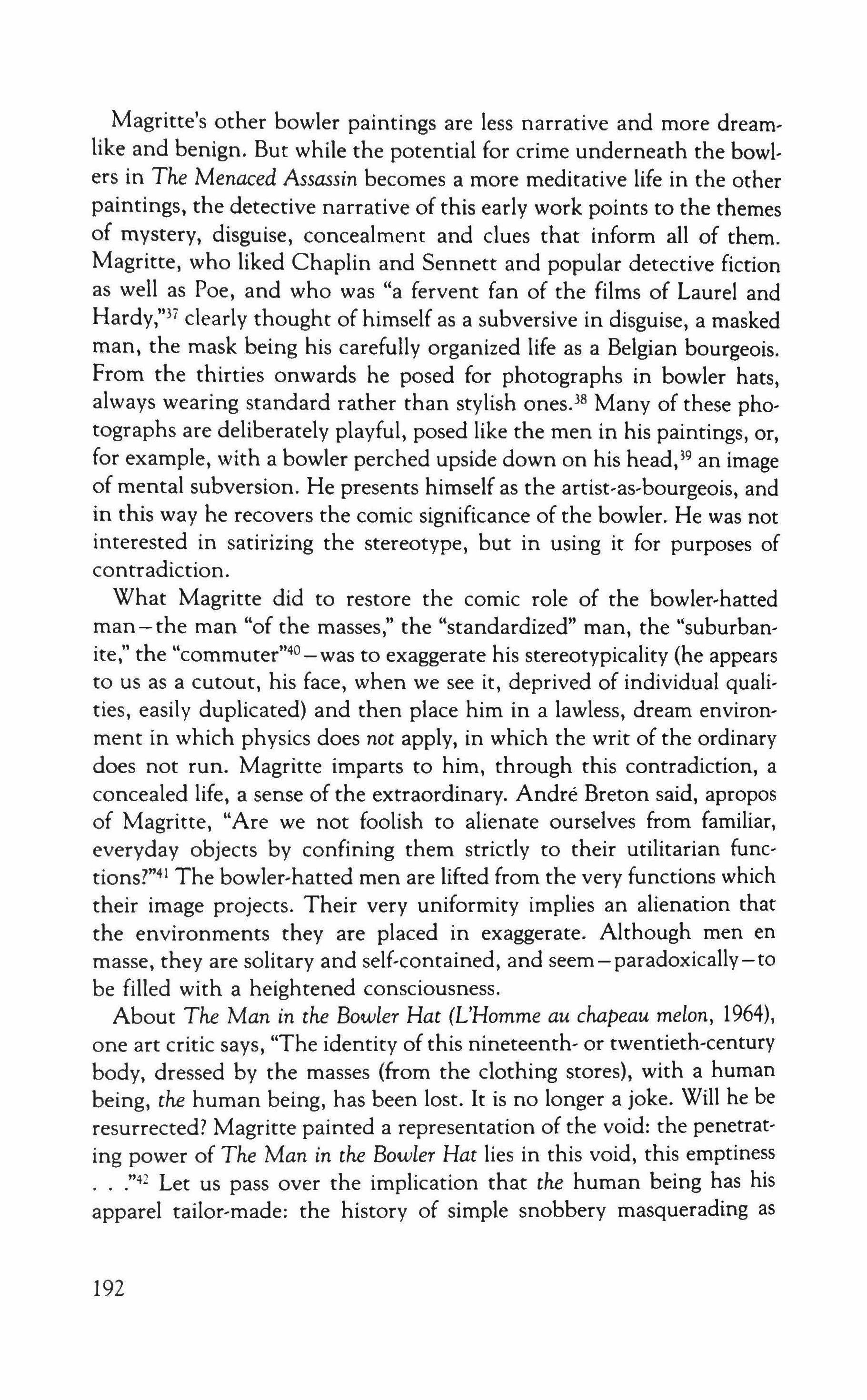
Magritte's other bowler paintings are less narrative and more dreamlike and benign. But while the potential for crime underneath the bowlers in The Menaced Assassin becomes a more meditative life in the other paintings, the detective narrative of this early work points to the themes of mystery, disguise, concealment and clues that inform all of them. Magritte, who liked Chaplin and Sennett and popular detective fiction as well as Poe, and who was "a fervent fan of the films of Laurel and Hardy."? clearly thought of himself as a subversive in disguise, a masked man, the mask being his carefully organized life as a Belgian bourgeois. From the thirties onwards he posed for photographs in bowler hats, always wearing standard rather than stylish ones.f Many of these photographs are deliberately playful, posed like the men in his paintings, or, for example, with a bowler perched upside down on his head," an image of mental subversion. He presents himself as the artist-as-bourgeois, and in this way he recovers the comic significance of the bowler. He was not interested in satirizing the stereotype, but in using it for purposes of contradiction.
What Magritte did to restore the comic role of the bowler-hatted man - the man "of the masses," the "standardized" man, the "suburbanite," the "cornmuter'w=was to exaggerate his stereotypicality (he appears to us as a cutout, his face, when we see it, deprived of individual qualities, easily duplicated) and then place him in a lawless, dream environment in which physics does not apply, in which the writ of the ordinary does not run. Magritte imparts to him, through this contradiction, a concealed life, a sense of the extraordinary. Andre Breton said, apropos of Magritte, "Are we not foolish to alienate ourselves from familiar, everyday objects by confining them strictly to their utilitarian functionsl''" The bowler-hatted men are lifted from the very functions which their image projects. Their very uniformity implies an alienation that the environments they are placed in exaggerate. Although men en masse, they are solitary and self-contained, and seem-paradoxically-to be filled with a heightened consciousness.
About The Man in the Bowler Hat (L'Homme au chapeau melon, 1964), one art critic says, "The identity of this nineteenth- or twentieth-century body, dressed by the masses (from the clothing stores), with a human being, the human being, has been lost. It is no longer a joke. Will he be resurrected? Magritte painted a representation of the void: the penetrating power of The Man in the Bowler Hat lies in this void, this emptiness ."42 Let us pass over the implication that the human being has his apparel tailor-made: the history of simple snobbery masquerading as
192
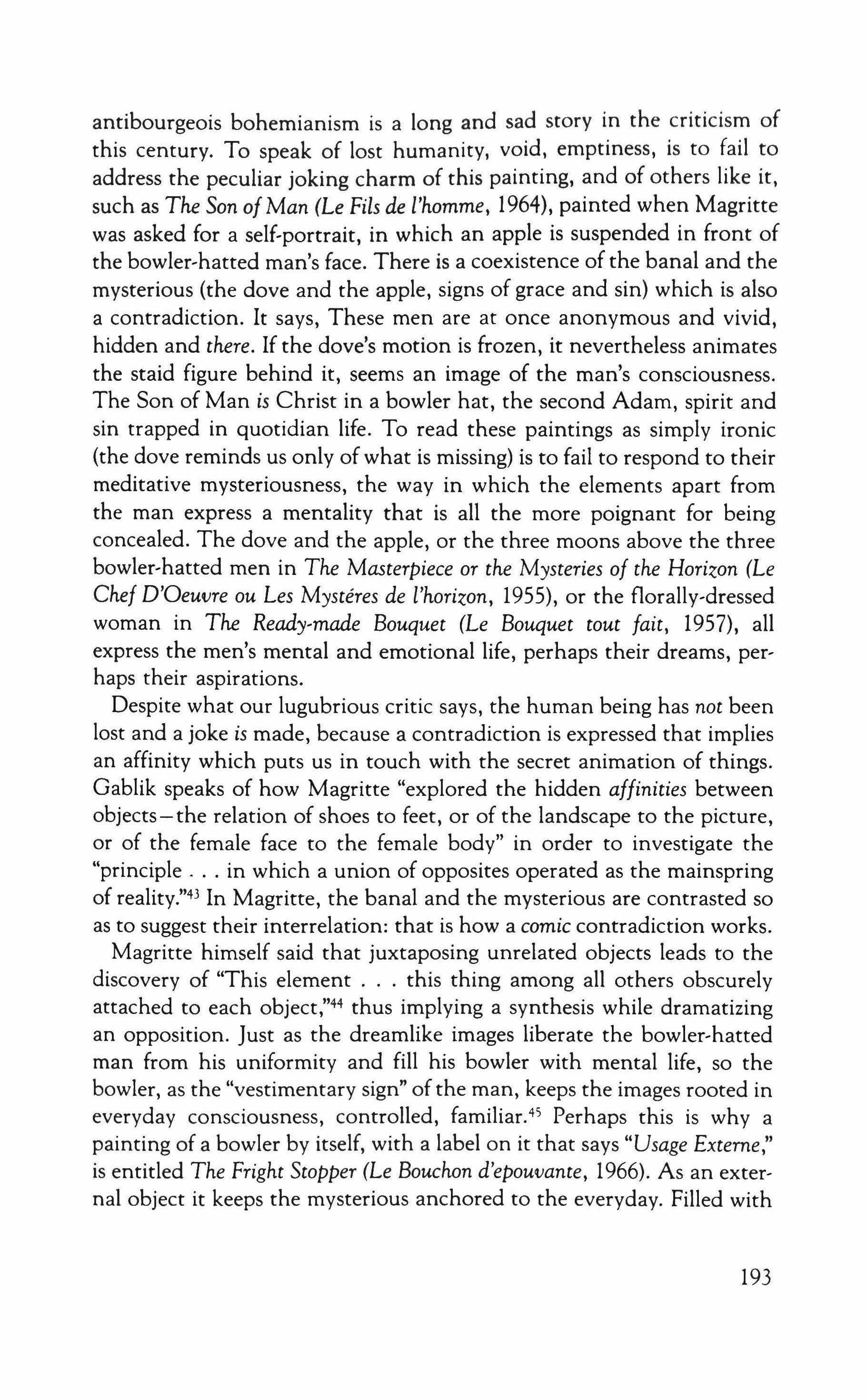
antibourgeois bohemianism is a long and sad story in the criticism of this century. To speak of lost humanity, void, emptiness, is to fail to address the peculiar joking charm of this painting, and of others like it, such as The Son ofMan (Le Fils de ['homme, 1964), painted when Magritte was asked for a self-portrait, in which an apple is suspended in front of the bowler-hatted man's face. There is a coexistence of the banal and the mysterious (the dove and the apple, signs of grace and sin) which is also a contradiction. It says, These men are at once anonymous and vivid, hidden and there. If the dove's motion is frozen, it nevertheless animates the staid figure behind it, seems an image of the man's consciousness. The Son of Man is Christ in a bowler hat, the second Adam, spirit and sin trapped in quotidian life. To read these paintings as simply ironic (the dove reminds us only of what is missing) is to fail to respond to their meditative mysteriousness, the way in which the elements apart from the man express a mentality that is all the more poignant for being concealed. The dove and the apple, or the three moons above the three bowler-hatted men in The Masterpiece or the Mysteries of the Horizon (Le Chef D'Oeuvre ou Les Mysteres de ['horizon, 1955), or the florally-dressed woman in The Ready-made Bouquet (Le Bouquet tout fait, 1957), all express the men's mental and emotional life, perhaps their dreams, perhaps their aspirations.
Despite what our lugubrious critic says, the human being has not been lost and a joke is made, because a contradiction is expressed that implies an affinity which puts us in touch with the secret animation of things. Gablik speaks of how Magritte "explored the hidden affinities between objects-the relation of shoes to feet, or of the landscape to the picture, or of the female face to the female body" in order to investigate the "principle in which a union of opposites operated as the mainspring of reality."43 In Magritte, the banal and the mysterious are contrasted so as to suggest their interrelation: that is how a comic contradiction works. Magritte himself said that juxtaposing unrelated objects leads to the discovery of "This element this thing among all others obscurely attached to each object,"H thus implying a synthesis while dramatizing an opposition. Just as the dreamlike images liberate the bowler-hatted man from his uniformity and fill his bowler with mental life, so the bowler, as the "vestimentary sign" ofthe man, keeps the images rooted in everyday consciousness, controlled, familiar." Perhaps this is why a painting of a bowler by itself, with a label on it that says "Usage Exteme," is entitled The Fright Stopper (Le Bouchon d'epouvante, 1966). As an external object it keeps the mysterious anchored to the everyday. Filled with
193
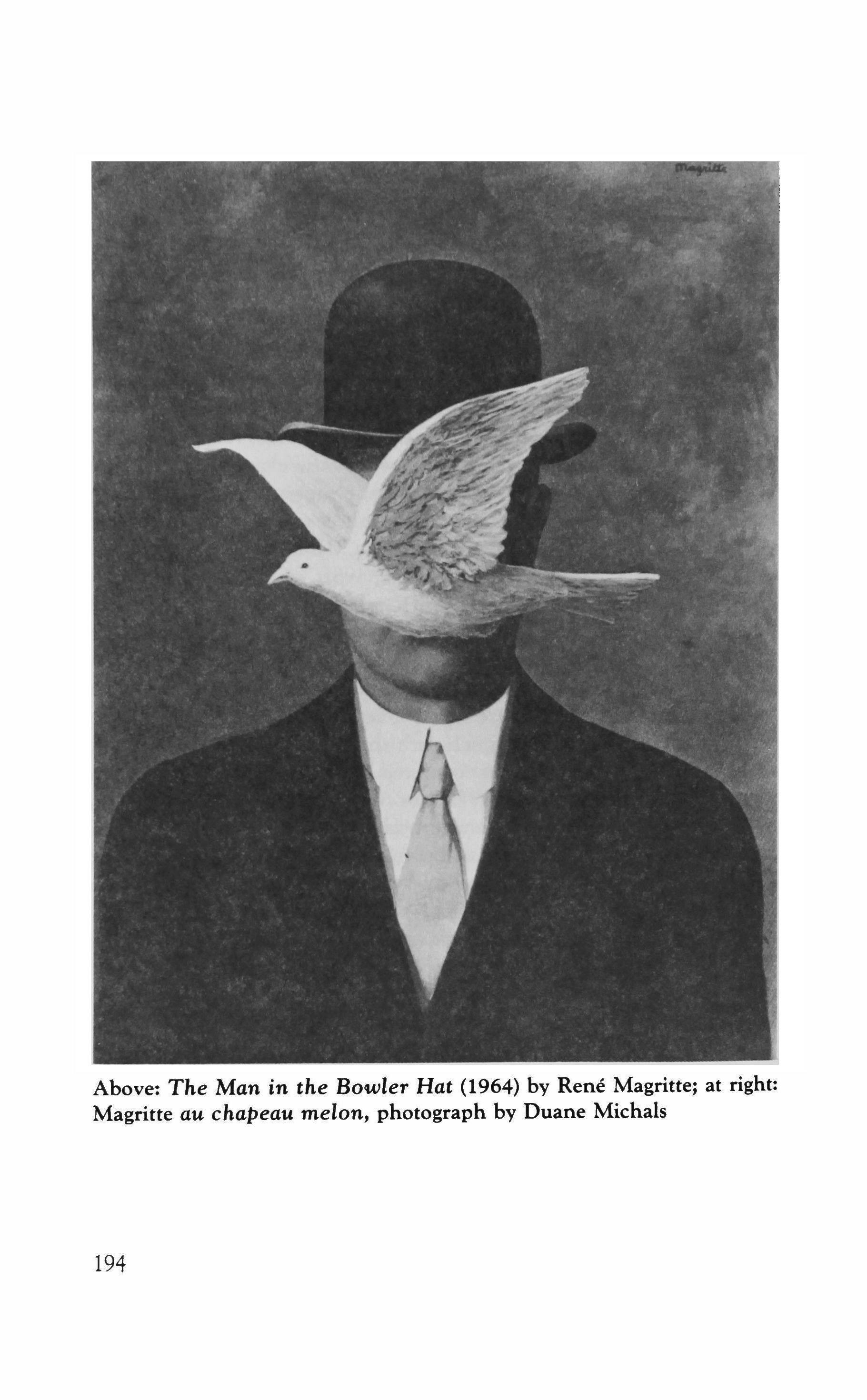
194
Above: The Man in the Bowler Hat (1964) by Rene Magritte; at right: Magritte au chapeau melon, photograph by Duane Michals
thought at once intimate and impersonal (Everyman's), it is at once alien to and part of the world against which it stands in contrast, on which it meditates.
In Golconda (Golconde, 1953), a multitude of bowler-hatted men rise like souls from, or descend like rain to, their bourgeois row houses. Just as Golconda is a mine of great wealth, so the stereotyped man has
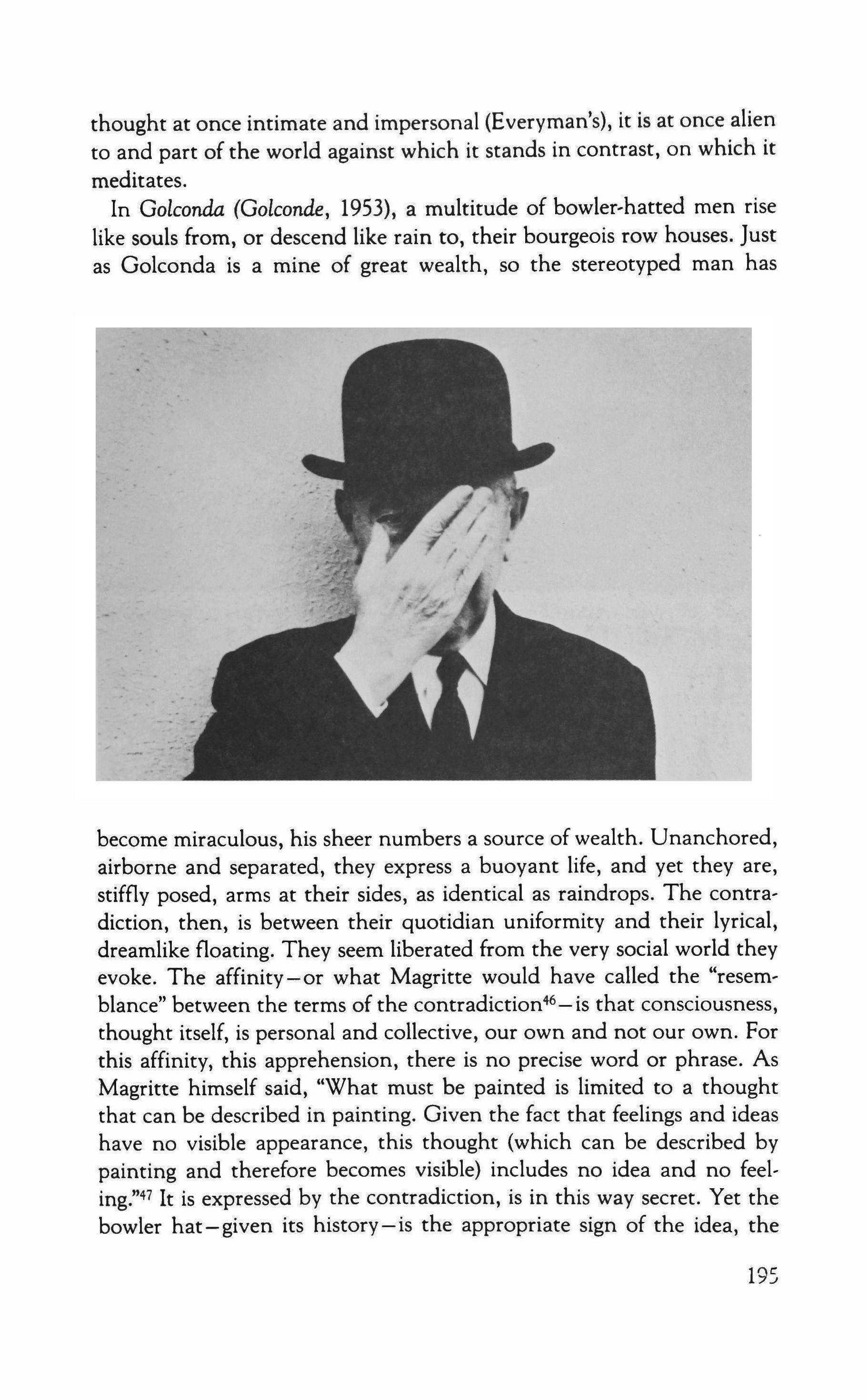
become miraculous, his sheer numbers a source of wealth. Unanchored, airborne and separated, they express a buoyant life, and yet they are, stiffly posed, arms at their sides, as identical as raindrops. The contradiction, then, is between their quotidian uniformity and their lyrical, dreamlike floating. They seem liberated from the very social world they evoke. The affinity-or what Magritte would have called the "resemblance" between the terms of the contradiction+c-Is that consciousness, thought itself, is personal and collective, our own and not our own. For this affinity, this apprehension, there is no precise word or phrase. As Magritte himself said, "What must be painted is limited to a thought that can be described in painting. Given the fact that feelings and ideas have no visible appearance, this thought (which can be described by painting and therefore becomes visible) includes no idea and no feeling."? It is expressed by the contradiction, is in this way secret. Yet the bowler hat - given its history - is the appropriate sign of the idea, the
195
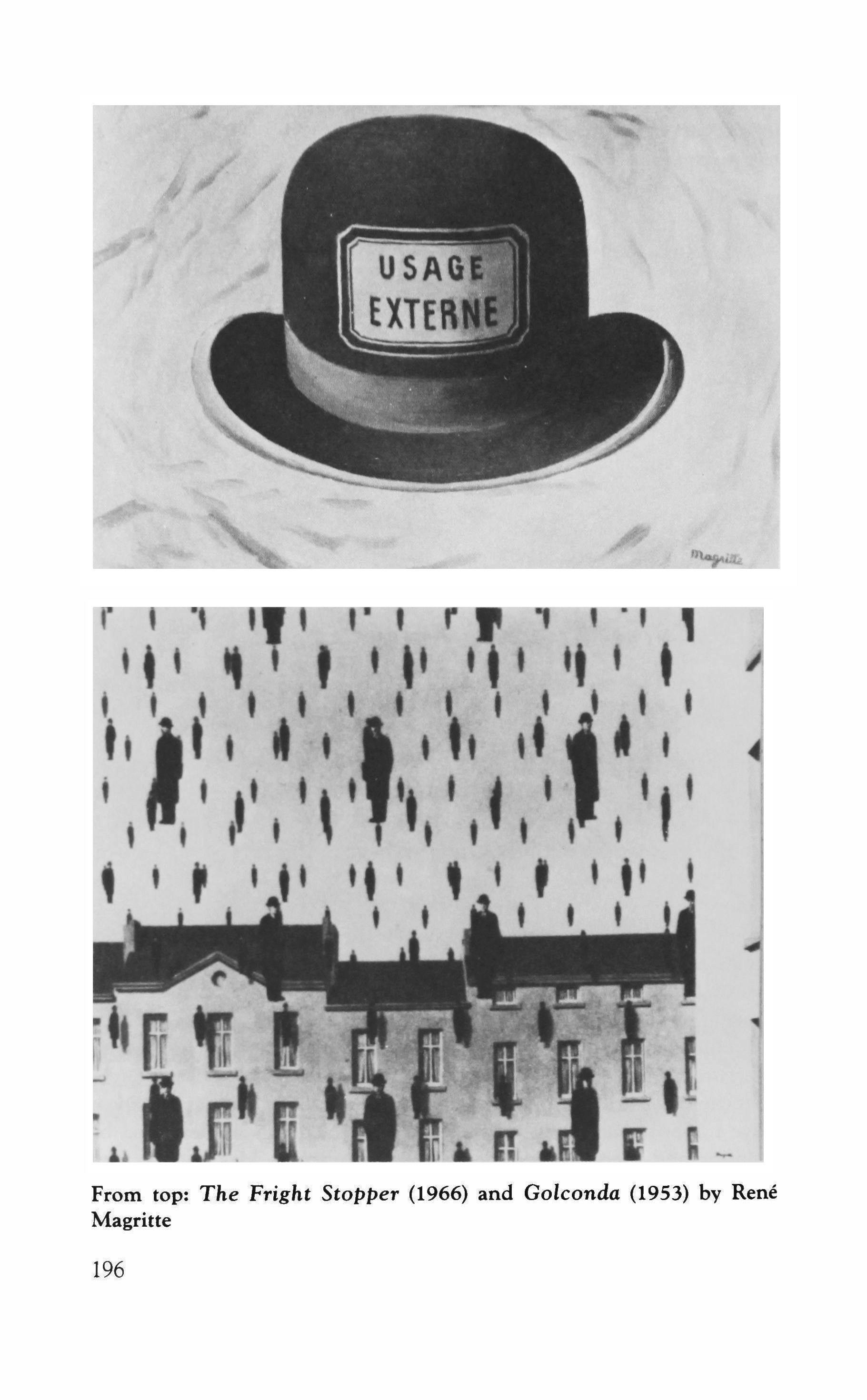
196
From top: The Fright Stopper (1966) and Golconda (1953) by Rene Magritte

feeling; at once conventional and subversive, somber and comic, it embodies the contradiction.
A bowler hat figures significantly in Milan Kundera's recent novel, The Unbearable Lightness of Being (1984). The novel poses a question about the ambiguity of oppositions. The central opposition is weight/ lightness. Weight occurs when things "recur erernallv?" and so bring with them the "unbearable responsibility" of judgment; yet the "heavier the burden, the closer our lives come to the earth, the more real and truthful they become." Lightness occurs when things are transitory, disappear once and for all; man becomes "lighter than air takers] leave of the earth and his earthly being becomejs] only half real, his movements as free as they are insignificant" (pp. 3-5). Kundera asks, Which is positive, which negative? "The only certainty is: the lightness/ weight opposition is the most mysterious, most ambiguous of all" (p. 6). The main characters of the novel seek lightness, try to begin new lives with a sense of freedom, but events in totalitarian Eastern Europe threaten and entrap them, weigh them down. Kundera says, " we no longer know how to think as Parmenides thought" (p. 196)-that is, to regard lightness as positive, weight as negative. In Eastern Europe the matter is more ambiguous: what may seem a "light joke can become weighty with metaphysical truth"; the "transformation" from light to heavy holds no surprise (pp. 195-96).
Sabina's bowler hat is a central ambiguous image in the novel. It is weighty because it is "a monument to time past" (p. 87): it was owned by her grandfather, the nineteenth-century mayor of a Bohemian town, it is "a memento" of men "who lived in a century without airplanes and cars" (p. 88). When, at intervals, Sabina puts it on, wearing nothing but underwear, and arouses and touches her lover Tomas with the contrast between her nakedness and the public, official quality of the hat (pp. 28, 64-65), the bowler becomes both light and heavy: light because it was "the kind of hat Chaplin wore" (p. 64) and reminded them of their "love games" (p, 88), heavy with the weight of its history. It is the sign of gaiety and gravity, both a "joke" (p. 86) and a memento. This is also how it functions in Magritte's Golconda.
When the bowler is light, the contrast it makes with Sabina's nakedness and lingerie is comic and erotic, "a sign of her originality." Yet the opposition can suddenly signify violence "against her dignity as a woman humiliation," and the "hard masculine hat" become heavy (pp. 86-87). In this way,
197
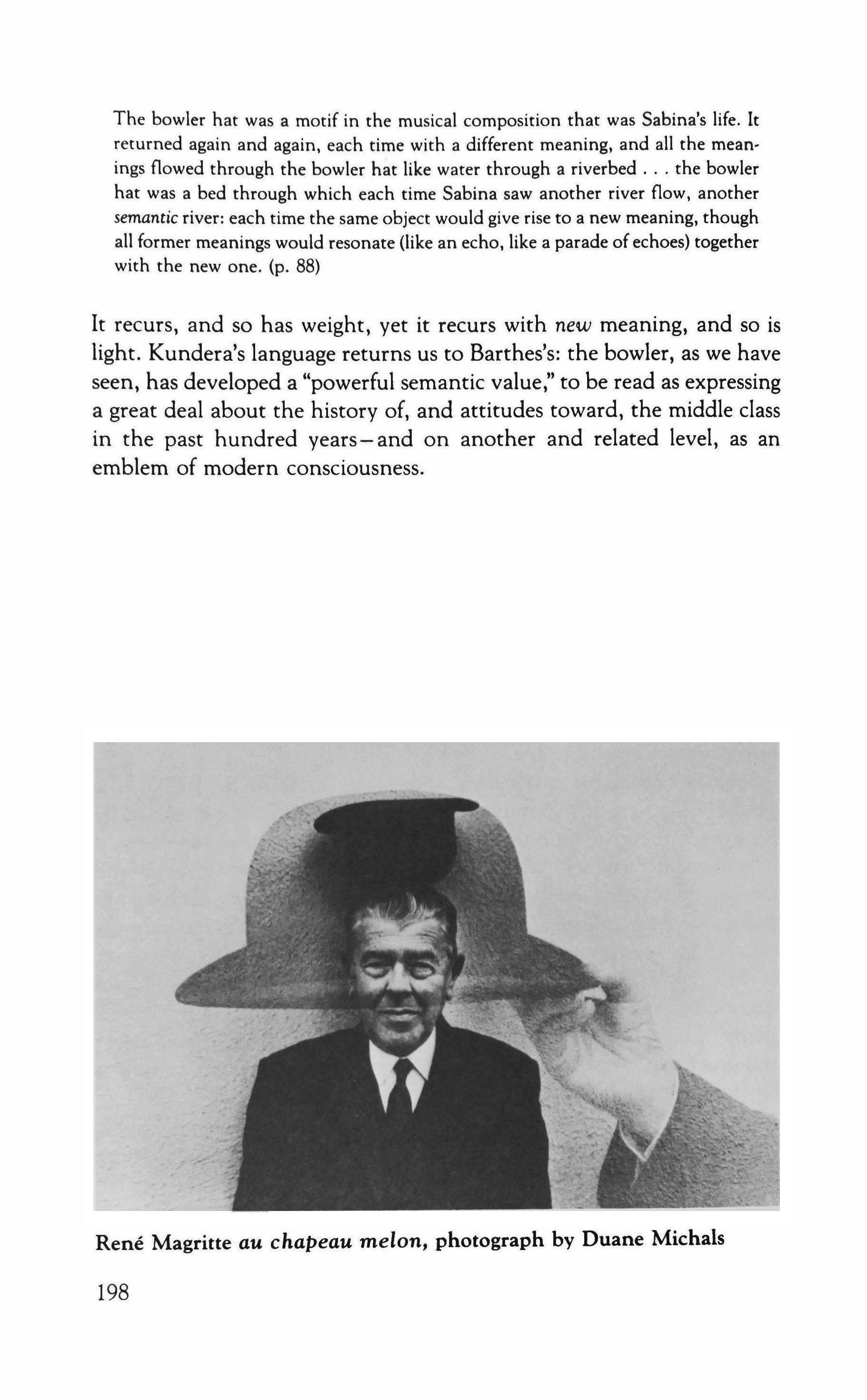
The bowler hat was a motif in the musical composition that was Sabina's life. It returned again and again, each time with a different meaning, and all the meanings flowed through the bowler hat like water through a riverbed the bowler hat was a bed through which each time Sabina saw another river flow, another semantic river: each time the same object would give rise to a new meaning, though all former meanings would resonate (like an echo, like a parade of echoes) together with the new one. (p. 88)
It recurs, and so has weight, yet it recurs with new meaning, and so is light. Kundera's language returns us to Barthes's: the bowler, as we have seen, has developed a "powerful semantic value," to be read as expressing a great deal about the history of, and attitudes toward, the middle class in the past hundred years - and on another and related level, as an emblem of modern consciousness.
198
Rene Magritte au chapeau melon, photograph by Duane Michals
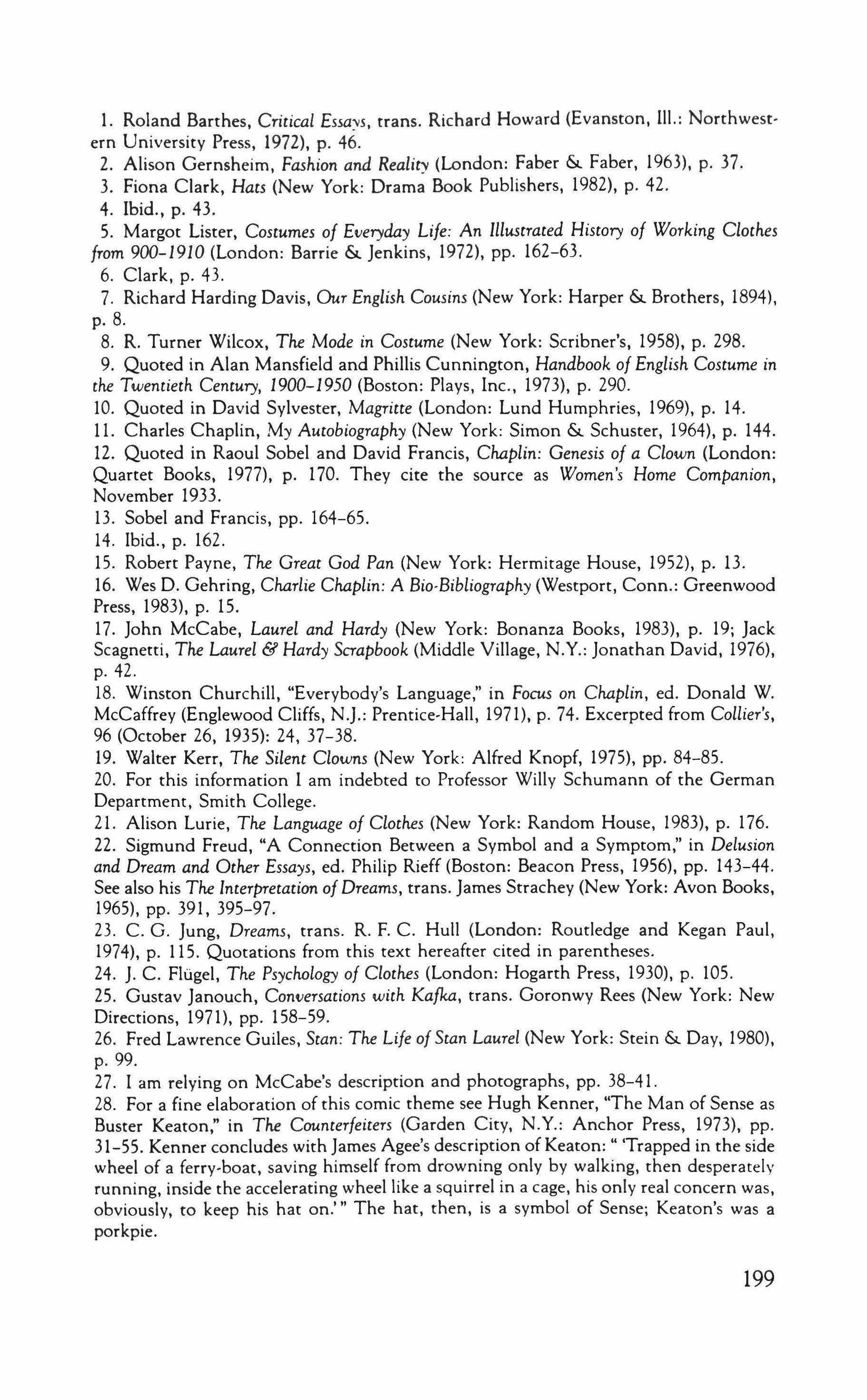
1. Roland Barthes, Critical Esscvs, trans. Richard Howard (Evanston, lll.: Northwestern University Press, 1972), p. 46.
2. Alison Gernsheim, Fashion and Reality (London: Faber & Faber, 1963), p. 37.
3. Fiona Clark, Hats (New York: Drama Book Publishers, 1982), p. 42.
4. Ibid., p. 43.
5. Margot Lister, Costumes of Everyday Life: An Illustrated History of Working Clothes from 900-1910 (London: Barrie & Jenkins, 1972), pp. 162-63.
6. Clark, p. 43.
7. Richard Harding Davis, Our English Cousins (New York: Harper & Brothers, 1894), p.8.
8. R. Turner Wilcox, The Mode in Costume (New York: Scribner's. 1958), p. 298.
9. Quoted in Alan Mansfield and Phillis Cunnington, Handbook of English Costume in the Twentieth Century, 1900-1950 (Boston: Plays, Inc., 1973), p. 290.
10. Quoted in David Sylvester, Magritte (London: Lund Humphries, 1969), p. 14.
11. Charles Chaplin, My Autobiography (New York: Simon & Schuster, 1964), p. 144.
12. Quoted in Raoul Sobel and David Francis, Chaplin: Genesis of a Clown (London: Quartet Books, 1977), p. 170. They cite the source as Women's Home Companion, November 1933.
13. Sobel and Francis, pp. 164-65.
14. Ibid., p. 162.
15. Robert Payne, The Great God Pan (New York: Hermitage House, 1952), p. 13.
16. Wes D. Gehring, Charlie Chaplin: A Bio-Bibliography (Westport, Conn.: Greenwood Press, 1983), p. 15.
17. John McCabe. Laurel and Hardy (New York: Bonanza Books, 1983), p. 19; Jack Scagnetti, The Laurel & Hardy Scrapbook (Middle Village, N.Y.: Jonathan David, 1976), p.42.
18. Winston Churchill, "Everybody's Language," in Focus on Chaplin, ed. Donald W. McCaffrey (Englewood Cliffs, N.J.: Prentice-Hall, 1971), p. 74. Excerpted from Collier's, 96 (October 26, 1935): 24, 37-38.
19. Walter Kerr, The Silent Clowns (New York: Alfred Knopf, 1975), pp. 84-85.
20. For this information 1 am indebted to Professor Willy Schumann of the German Department, Smith College.
21. Alison Lurie, The Language of Clothes (New York: Random House, 1983), p. 176.
22. Sigmund Freud, "A Connection Between a Symbol and a Symptom," in Delusion and Dream and Other Essays, ed. Philip Rieff (Boston: Beacon Press, 1956), pp. 143-44. See also his The Interpretation of Dreams, trans. James Strachey (New York: Avon Books, 1965), pp. 391, 395-97.
23. C. G. [ung, Dreams, trans. R. F. C. Hull (London: Routledge and Kegan Paul, 1974), p. 115. Quotations from this text hereafter cited in parentheses.
24. ]. C. Fhlgel, The Psychology of Clothes (London: Hogarth Press, 1930), p. 105.
25. Gustav Janouch, Conversations with Kafka, trans. Goronwy Rees (New York: New Directions, 1971), pp. 158-59.
26. Fred Lawrence Guiles, Stan: The Life of Stan Laurel (New York: Stein & Day, 1980), p.99.
27. I am relying on McCabe's description and photographs, pp. 38-41.
28. For a fine elaboration of this comic theme see Hugh Kenner, "The Man of Sense as Buster Keaton," in The Counterfeiters (Garden City, N.Y.: Anchor Press, 1973), pp. 31-55. Kenner concludes with James Agee's description of Keaton: "'Trapped in the side wheel of a ferry-boat, saving himself from drowning only by walking, then desperately running, inside the accelerating wheel like a squirrel in a cage, his only real concern was, obviously, to keep his hat on.''' The hat, then, is a symbol of Sense; Keaton's was a porkpie.
199
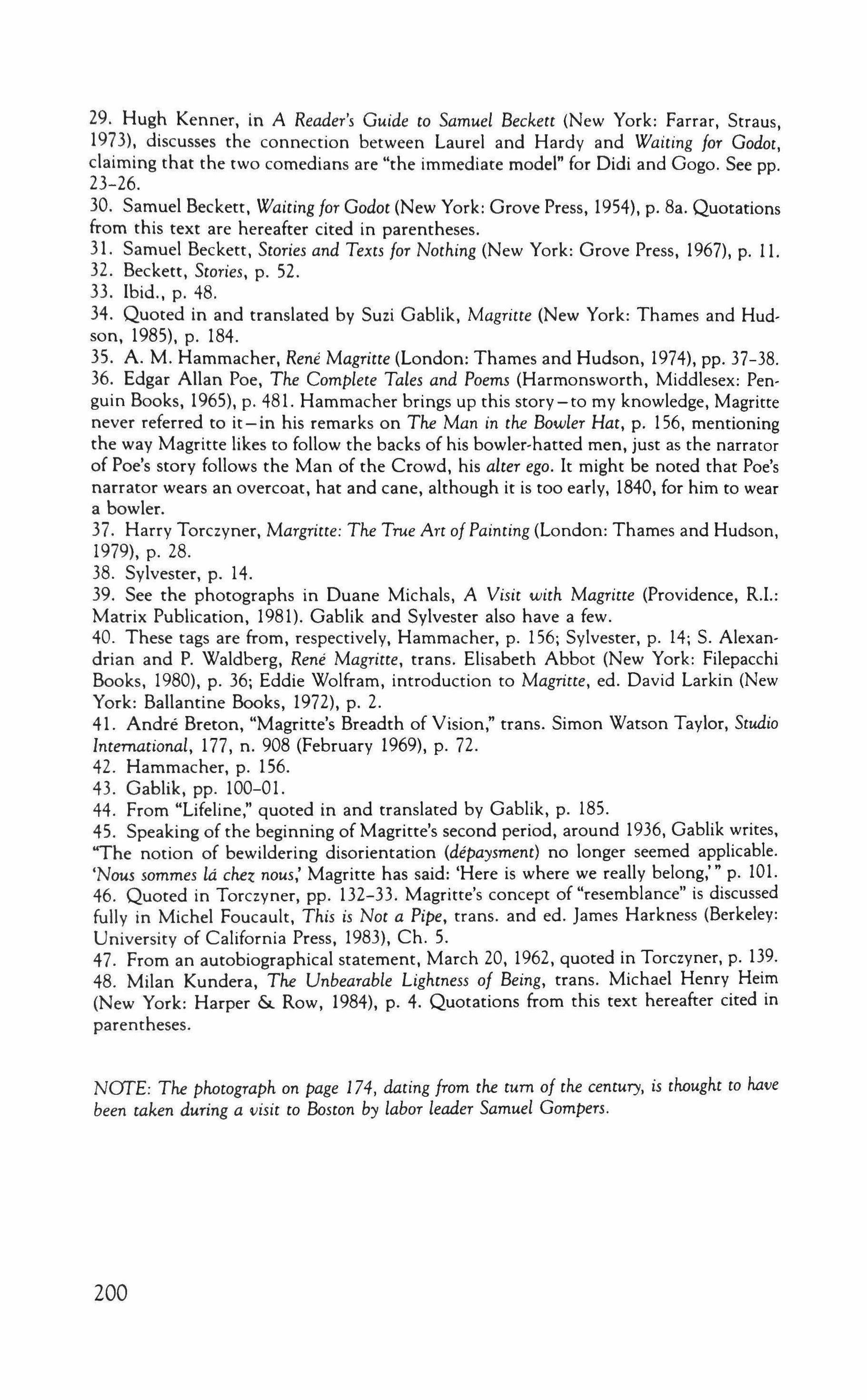
29. Hugh Kenner, in A Reader's Guide to Samuel Beckett (New York: Farrar, Straus, 1973), discusses the connection between Laurel and Hardy and Waiting for Godoi, claiming that the two comedians are "the immediate model" for Didi and Gogo. See pp. 23-26.
30. Samuel Beckett, Waiting for Godot (New York: Grove Press, 1954), p. 8a. Quotations from this text are hereafter cited in parentheses.
31. Samuel Beckett, Stories and Texts for Nothing (New York: Grove Press, 1967), p. II.
32. Beckett, Stories, p. 52.
33. Ibid., p. 48.
34. Quoted in and translated by Suzi Gablik, Magritte (New York: Thames and Hudson, 1985), p. 184.
35. A. M. Hammacher, Rene Magritte (London: Thames and Hudson, 1974), pp. 37-38.
36. Edgar Allan Poe, The Complete Tales and Poems (Harrnonsworrh, Middlesex: Penguin Books, 1965), p. 481. Hammacher brings up this story-to my knowledge, Magritte never referred to it - in his remarks on The Man in the Bowler Hat, p. 156, mentioning the way Magritte likes to follow the backs of his bowler-hatted men, just as the narrator of Poe's story follows the Man of the Crowd, his alter ego. It might be noted that Poe's narrator wears an overcoat, hat and cane, although it is too early, 1840, for him to wear a bowler.
37. Harry Torczyner, Margritte: The True Art ofPainting (London: Thames and Hudson, 1979), p. 28.
38. Sylvester, p. 14.
39. See the photographs in Duane Michals, A Visit with Magritte (Providence, R.l.: Matrix Publication, 1981). Gablik and Sylvester also have a few.
40. These tags are from, respectively, Hammacher, p. 156; Sylvester, p. 14; S. Alexandrian and P. Waldberg, Rene Magritte, trans. Elisabeth Abbot (New York: Filepacchi Books, 1980), p. 36; Eddie Wolfram, introduction to Magritte, ed. David Larkin (New York: Ballantine Books, 1972), p. 2.
41. Andre Breton, "Magrirte's Breadth of Vision," trans. Simon Watson Taylor, Studio International, 177, n. 908 (February 1969), p. n.
42. Hammacher, p. 156.
43. Gablik, pp. 100-01.
44. From "Lifeline," quoted in and translated by Gablik, p. 185.
45. Speaking of the beginning of Magritte's second period, around 1936, Gablik writes, "The notion of bewildering disorientation (depaysment) no longer seemed applicable. 'Nous sommes La chez nous; Magritte has said: 'Here is where we really belong:" p. 10I.
46. Quoted in Torczyner, pp. 132-33. Magritte's concept of "resemblance" is discussed fully in Michel Foucault, This is Not a Pipe, trans. and ed. James Harkness (Berkeley: University of California Press, 1983), Ch. 5.
47. From an autobiographical statement, March 20, 1962, quoted in Torczyner, p. 139.
48. Milan Kundera, The Unbearable Lightness of Being, trans. Michael Henry Heim (New York: Harper & Row, 1984), p. 4. Quotations from this text hereafter cited in parentheses.
NafE: The photograph on page 174, dating from the tum of the century, is thought to have been taken during a visit to Boston by labor leader Samuel Gompers.
200
Reviews

James Fenton, Children in Exile: Poems 1968-1984, Random House, 1984, 112 pp. Hh, $11.95; ph, $5.95
Bruce Weigl, The Monkey Wars, University of Georgia Press, 1985,47 pp. Hh, $10.95; ph, $6.95
Seamus Heaney, Station Island, Farrar, Straus & Giroux, 1985, 123 pp, Hh, $11.95; ph, $6.95
Reviewed
by Reginald
Gibbons
In the military historian John Keegan's deservedly famous book, The Face ofBattle, he notes that it was literature which kept the indescribable horrors of the battlefield in World War I before the public, when-for reasons of political culture, patriotism, and so on - journalism could or would not do it. Keegan says that much of this literature
was poetic in form, and it was the poetry which was published soonest, a great deal of it while the war was in progress. Precisely because this earliest outpouring of protest was poetry, a literary form which hid from its audience its documentary value, its effect was transitory; or rather, it was to require for a prolongation of its effect some form of verification in prose, some confirmation in ordinary language that what Sassoon, Graves, Blunden had had to say was not private and subjective but an expression of the feelings of a whole generarion.l
Thus, despite the fact that the language of poetry after World War I was not "ordinary language" (in the sense Keegan means of expository prose), poems of the war presented a voice not only aimed toward others but speaking for them as well. While Keegan admits there were certainly
201
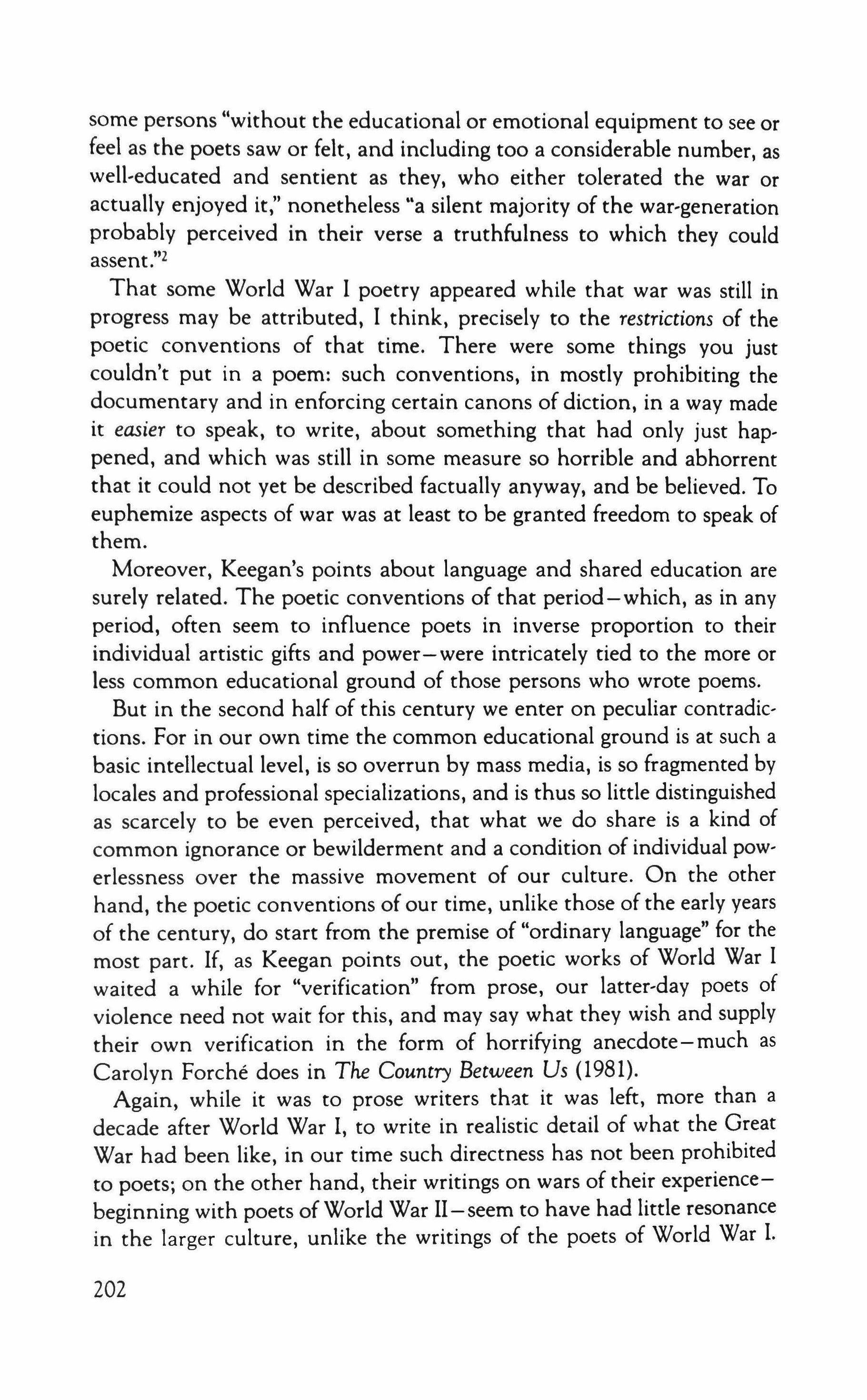
some persons "without the educational or emotional equipment to see or feel as the poets saw or felt, and including too a considerable number, as well-educated and sentient as they, who either tolerated the war or actually enjoyed it," nonetheless "a silent majority of the war-generation probably perceived in their verse a truthfulness to which they could assent,'?
That some World War I poetry appeared while that war was still in progress may be attributed, I think, precisely to the restrictions of the poetic conventions of that time. There were some things you just couldn't put in a poem: such conventions, in mostly prohibiting the documentary and in enforcing certain canons of diction, in a way made it easier to speak, to write, about something that had only just happened, and which was still in some measure so horrible and abhorrent that it could not yet be described factually anyway, and be believed. To euphemize aspects of war was at least to be granted freedom to speak of them.
Moreover, Keegan's points about language and shared education are surely related. The poetic conventions of that period-which, as in any period, often seem to influence poets in inverse proportion to their individual artistic gifts and power-were intricately tied to the more or less common educational ground of those persons who wrote poems.
But in the second half of this century we enter on peculiar contradictions. For in our own time the common educational ground is at such a basic intellectual level, is so overrun by mass media, is so fragmented by locales and professional specializations, and is thus so little distinguished as scarcely to be even perceived, that what we do share is a kind of common ignorance or bewilderment and a condition of individual powerlessness over the massive movement of our culture. On the other hand, the poetic conventions of our time, unlike those of the early years of the century, do start from the premise of "ordinary language" for the most part. If, as Keegan points out, the poetic works of World War I waited a while for "verification" from prose, our latter-day poets of violence need not wait for this, and may say what they wish and supply their own verification in the form of horrifying anecdote-much as Carolyn Forche does in The Country Between Us (1981).
Again, while it was to prose writers that it was left, more than a decade after World War I, to write in realistic detail of what the Great War had been like, in our time such directness has not been prohibited to poets; on the other hand, their writings on wars of their experiencebeginning with poets of World War II-seem to have had little resonance in the larger culture, unlike the writings of the poets of World War l.
202
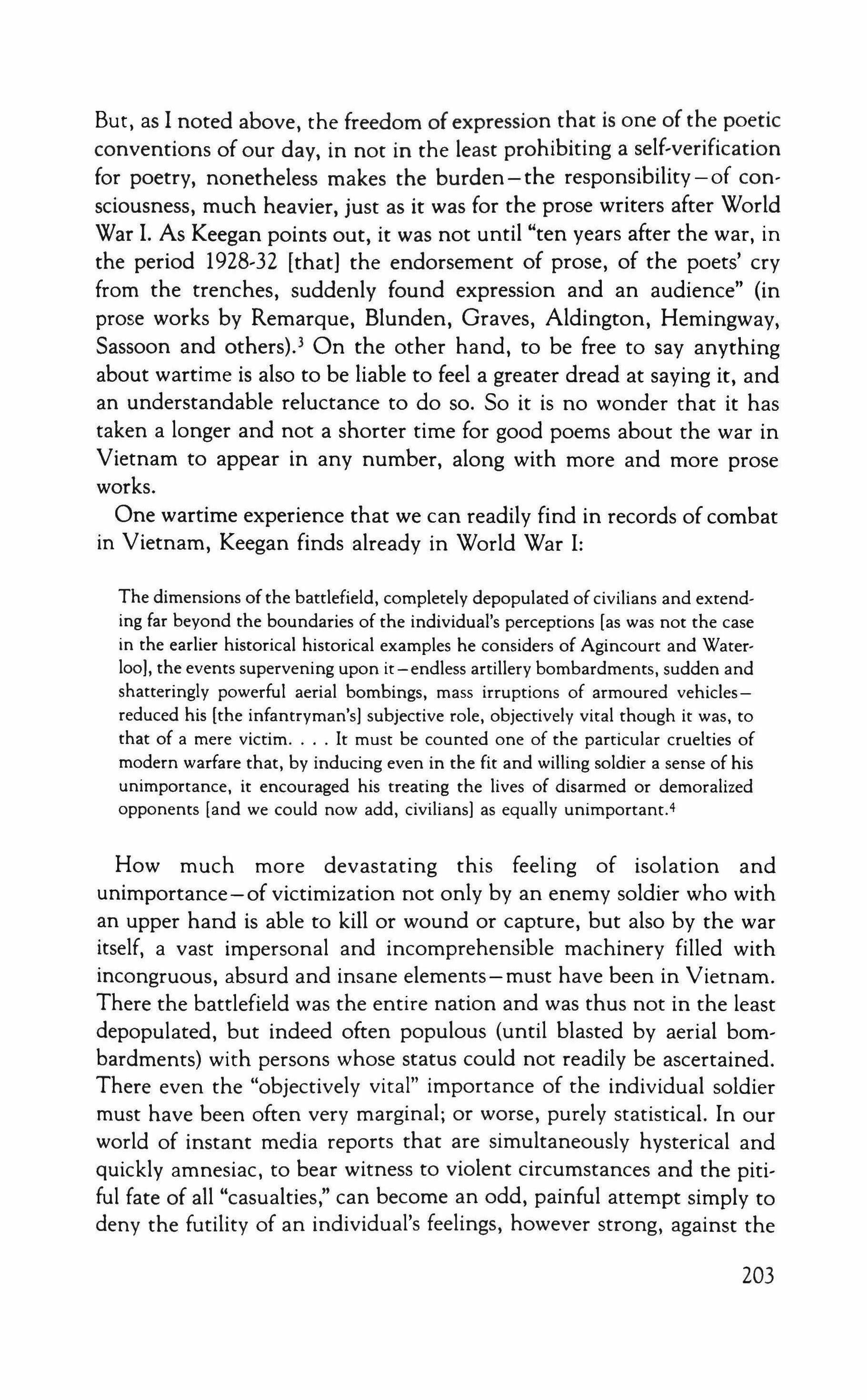
But, as I noted above, the freedom of expression that is one of the poetic conventions of our day, in not in the least prohibiting a self-verification for poetry, nonetheless makes the burden-the responsibility-of consciousness, much heavier, just as it was for the prose writers after World War 1. As Keegan points out, it was not until "ten years after the war, in the period 1928,32 [that] the endorsement of prose, of the poets' cry from the trenches, suddenly found expression and an audience" (in prose works by Remarque, Blunden, Graves, Aldington, Hemingway, Sassoon and others).J On the other hand, to be free to say anything about wartime is also to be liable to feel a greater dread at saying it, and an understandable reluctance to do so. So it is no wonder that it has taken a longer and not a shorter time for good poems about the war in Vietnam to appear in any number, along with more and more prose works.
One wartime experience that we can readily find in records of combat in Vietnam, Keegan finds already in World War I:
The dimensions of the battlefield, completely depopulated of civilians and extending far beyond the boundaries of the individual's perceptions [as was not the case in the earlier historical historical examples he considers of Agincourt and Waterloo), the events supervening upon it-endless artillery bombardments, sudden and shatteringly powerful aerial bombings, mass irruptions of armoured vehiclesreduced his [the infantryman's) subjective role, objectively vital though it was, to that of a mere victim It must be counted one of the particular cruelties of modern warfare that, by inducing even in the fit and willing soldier a sense of his unimportance, it encouraged his treating the lives of disarmed or demoralized opponents [and we could now add, civilians) as equally unimportanr.t
How much more devastating this feeling of isolation and unimportance-of victimization not only by an enemy soldier who with an upper hand is able to kill or wound or capture, but also by the war itself, a vast impersonal and incomprehensible machinery filled with incongruous, absurd and insane elements-must have been in Vietnam. There the battlefield was the entire nation and was thus not in the least depopulated, but indeed often populous (until blasted by aerial born, bardments) with persons whose status could not readily be ascertained. There even the "objectively vital" importance of the individual soldier must have been often very marginal; or worse, purely statistical. In our world of instant media reports that are simultaneously hysterical and quickly amnesiac, to bear witness to violent circumstances and the pitiful fate of all "casualties," can become an odd, painful attempt simply to deny the futility of an individual's feelings, however strong, against the
203
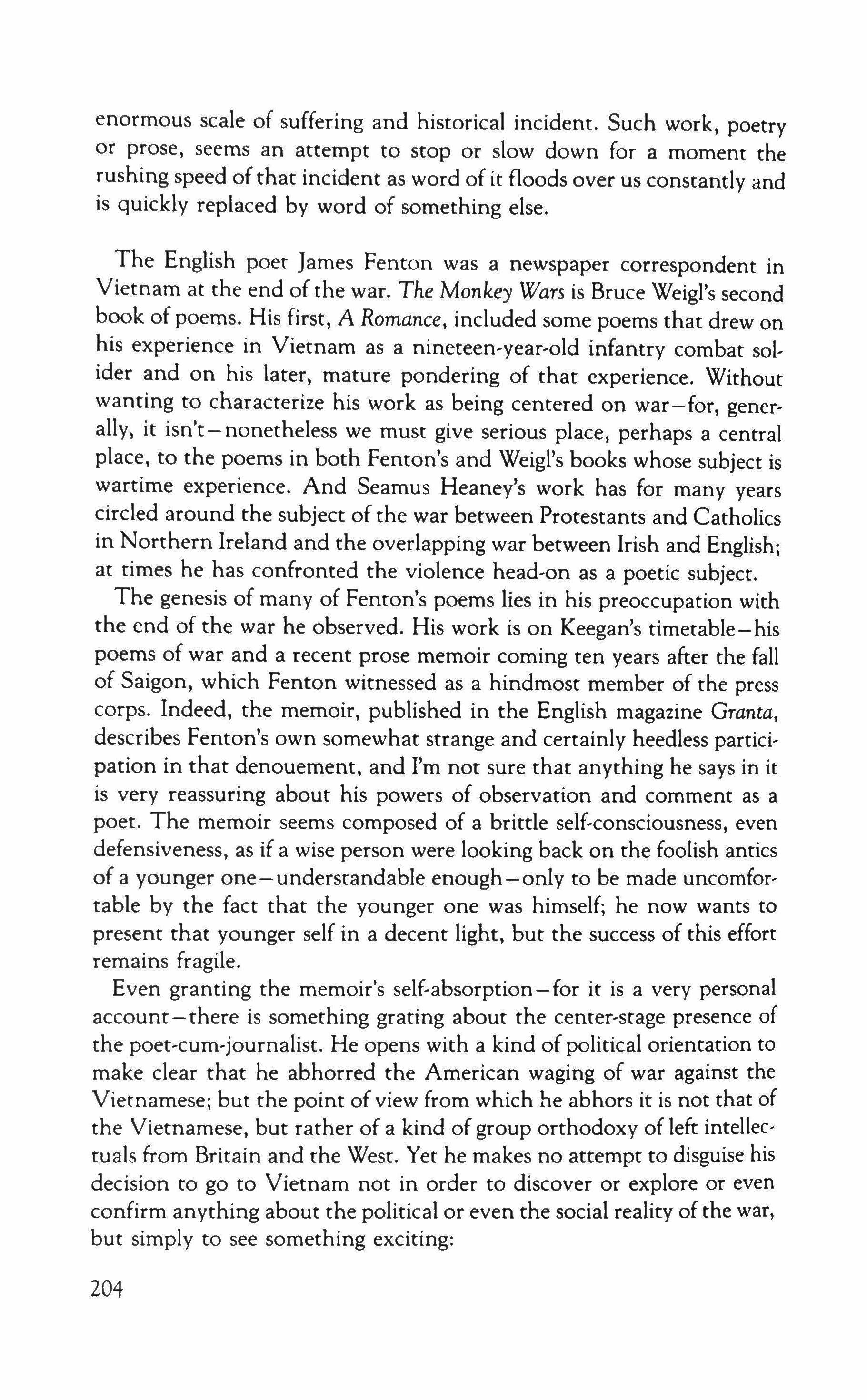
enormous scale of suffering and historical incident. Such work, poetry or prose, seems an attempt to stop or slow down for a moment the rushing speed of that incident as word of it floods over us constantly and is quickly replaced by word of something else.
The English poet James Fenton was a newspaper correspondent in Vietnam at the end of the war. The Monkey Wars is Bruce Weigl's second book of poems. His first, A Romance, included some poems that drew on his experience in Vietnam as a nineteen-year-old infantry combat solider and on his later, mature pondering of that experience. Without wanting to characterize his work as being centered on war-for, generally, it isn't-nonetheless we must give serious place, perhaps a central place, to the poems in both Fenton's and Weigl's books whose subject is wartime experience. And Seamus Heaney's work has for many years circled around the subject of the war between Protestants and Catholics in Northern Ireland and the overlapping war between Irish and English; at times he has confronted the violence head-on as a poetic subject.
The genesis of many of Fenton's poems lies in his preoccupation with the end of the war he observed. His work is on Keegan's timetable- his poems of war and a recent prose memoir coming ten years after the fall of Saigon, which Fenton witnessed as a hindmost member of the press corps. Indeed, the memoir, published in the English magazine Granta, describes Fenton's own somewhat strange and certainly heedless participation in that denouement, and I'm not sure that anything he says in it is very reassuring about his powers of observation and comment as a poet. The memoir seems composed of a brittle self-consciousness, even defensiveness, as if a wise person were looking back on the foolish antics of a younger one-understandable enough-only to be made uncomfortable by the fact that the younger one was himself; he now wants to present that younger self in a decent light, but the success of this effort remains fragile.
Even granting the memoir's self-absorption-for it is a very personal account-there is something grating about the center-stage presence of the poet-cum-journalist. He opens with a kind of political orientation to make clear that he abhorred the American waging of war against the Vietnamese; but the point of view from which he abhors it is not that of the Vietnamese, but rather of a kind of group orthodoxy of left intellectuals from Britain and the West. Yet he makes no attempt to disguise his decision to go to Vietnam not in order to discover or explore or even confirm anything about the political or even the social reality ofthe war, but simply to see something exciting:
204
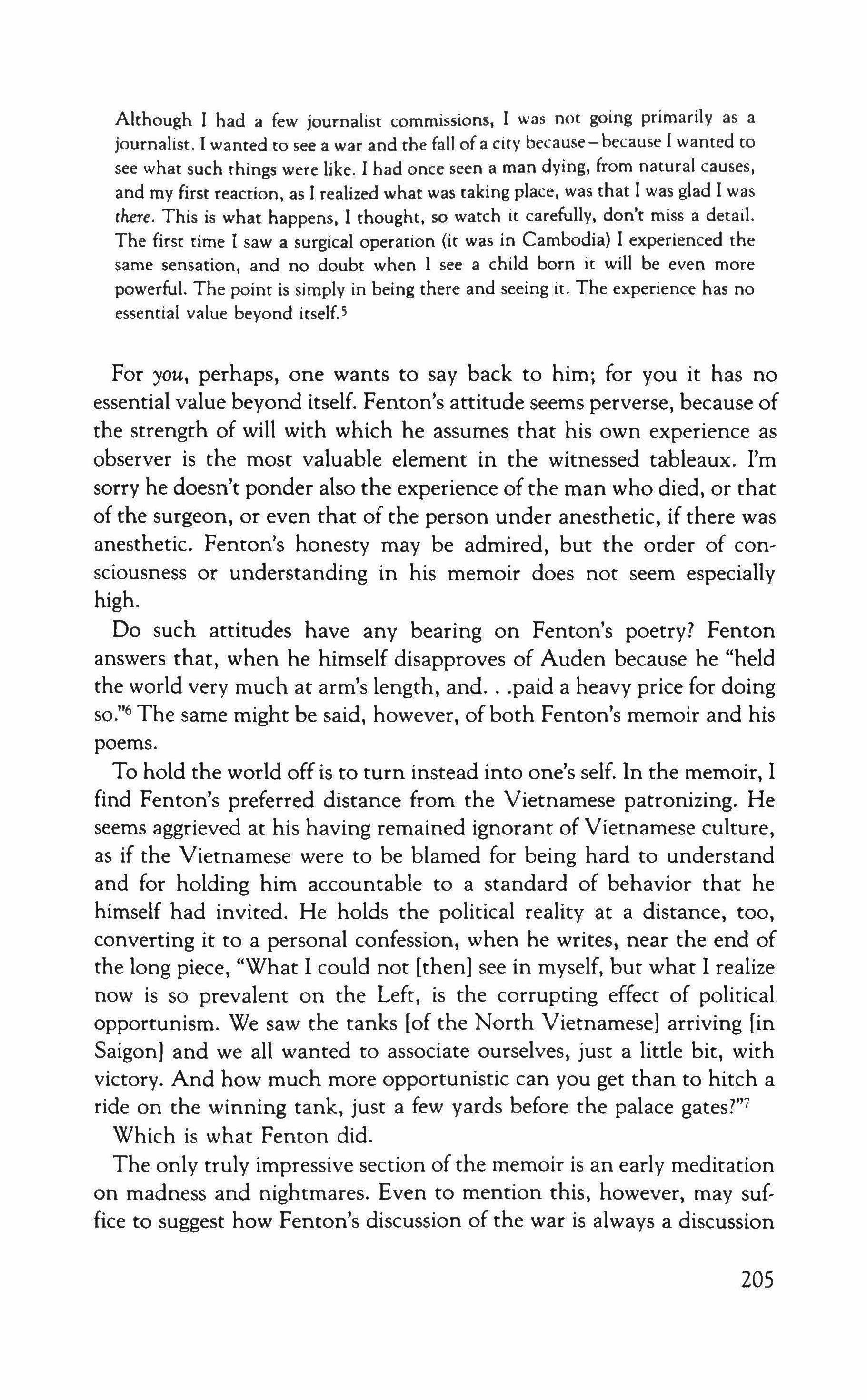
Although I had a few journalist commissions, I was not going primarily as a journalist. I wanted to see a war and the fall of a city because - because I wanted to see what such things were like. I had once seen a man dying, from natural causes, and my first reaction, as I realized what was taking place, was that I was glad I was there. This is what happens, I thought. so watch it carefully, don't miss a detail. The first time I saw a surgical operation (it was in Cambodia) I experienced the same sensation, and no doubt when I see a child born it will be even more powerful. The point is simply in being there and seeing it. The experience has no essential value beyond itself.S
For you, perhaps, one wants to say back to him; for you it has no essential value beyond itself. Fenton's attitude seems perverse, because of the strength of will with which he assumes that his own experience as observer is the most valuable element in the witnessed tableaux. I'm sorry he doesn't ponder also the experience of the man who died, or that of the surgeon, or even that of the person under anesthetic, if there was anesthetic. Fenton's honesty may be admired, but the order of con, sciousness or understanding in his memoir does not seem especially high.
Do such attitudes have any bearing on Fenton's poetry? Fenton answers that, when he himself disapproves of Auden because he "held the world very much at arm's length, and paid a heavy price for doing SO."6 The same might be said, however, of both Fenton's memoir and his poems.
To hold the world off is to turn instead into one's self. In the memoir, I find Fenton's preferred distance from the Vietnamese patronizing. He seems aggrieved at his having remained ignorant of Vietnamese culture, as if the Vietnamese were to be blamed for being hard to understand and for holding him accountable to a standard of behavior that he himself had invited. He holds the political reality at a distance, too, converting it to a personal confession, when he writes, near the end of the long piece, "What I could not [then] see in myself, but what I realize now is so prevalent on the Left, is the corrupting effect of political opportunism. We saw the tanks [of the North Vietnamese] arriving [in Saigon] and we all wanted to associate ourselves, just a little bit, with victory. And how much more opportunistic can you get than to hitch a ride on the winning tank, just a few yards before the palace gates!"?
Which is what Fenton did.
The only truly impressive section of the memoir is an early meditation on madness and nightmares. Even to mention this, however, may suffice to suggest how Fenton's discussion of the war is always a discussion
205
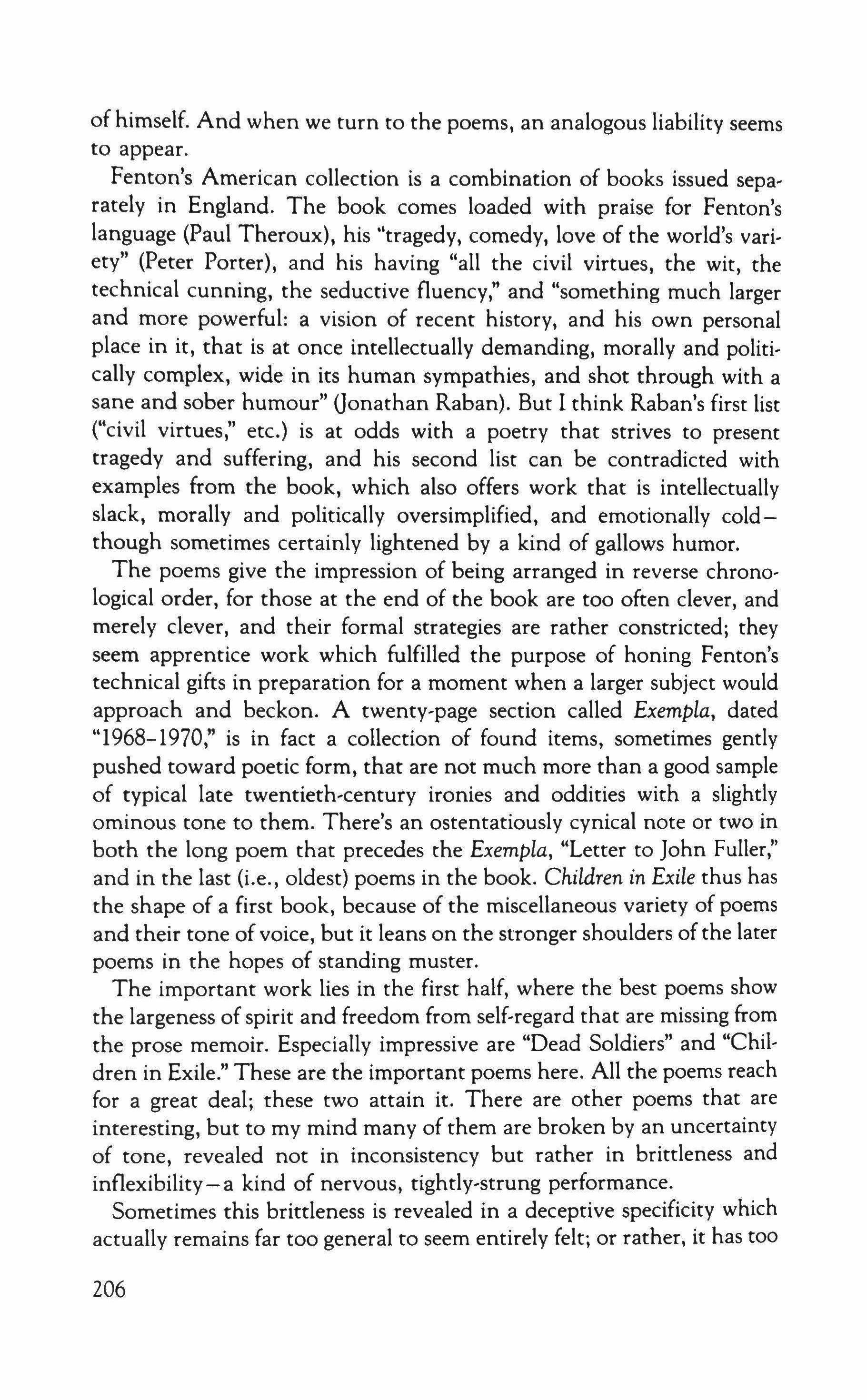
of himself. And when we turn to the poems, an analogous liability seems to appear.
Fenton's American collection is a combination of books issued separately in England. The book comes loaded with praise for Fenton's language (Paul Theroux), his "tragedy, comedy, love of the world's variety" (Peter Porter), and his having "all the civil virtues, the wit, the technical cunning, the seductive fluency," and "something much larger and more powerful: a vision of recent history, and his own personal place in it, that is at once intellectually demanding, morally and politically complex, wide in its human sympathies, and shot through with a sane and sober humour" (jonathan Raban). But I think Raban's first list ("civil virtues," etc.) is at odds with a poetry that strives to present tragedy and suffering, and his second list can be contradicted with examples from the book, which also offers work that is intellectually slack, morally and politically oversimplified, and emotionally coldthough sometimes certainly lightened by a kind of gallows humor.
The poems give the impression of being arranged in reverse chronological order, for those at the end of the book are too often clever, and merely clever, and their formal strategies are rather constricted; they seem apprentice work which fulfilled the purpose of honing Fenton's technical gifts in preparation for a moment when a larger subject would approach and beckon. A twenty-page section called Exempla, dated "1968-1970," is in fact a collection of found items, sometimes gently pushed toward poetic form, that are not much more than a good sample of typical late twentieth-century ironies and oddities with a slightly ominous tone to them. There's an ostentatiously cynical note or two in both the long poem that precedes the Exempla, "Letter to John Fuller," and in the last (i.e., oldest) poems in the book. Children in Exile thus has the shape of a first book, because of the miscellaneous variety of poems and their tone of voice, but it leans on the stronger shoulders of the later poems in the hopes of standing muster.
The important work lies in the first half, where the best poems show the largeness of spirit and freedom from self-regard that are missing from the prose memoir. Especially impressive are "Dead Soldiers" and "Children in Exile." These are the important poems here. All the poems reach for a great deal; these two attain it. There are other poems that are interesting, but to my mind many of them are broken by an uncertainty of tone, revealed not in inconsistency but rather in brittleness and inflexibility - a kind of nervous, tightly-strung performance. Sometimes this brittleness is revealed in a deceptive specificity which actually remains far too general to seem entirely felt; or rather, it has too
206
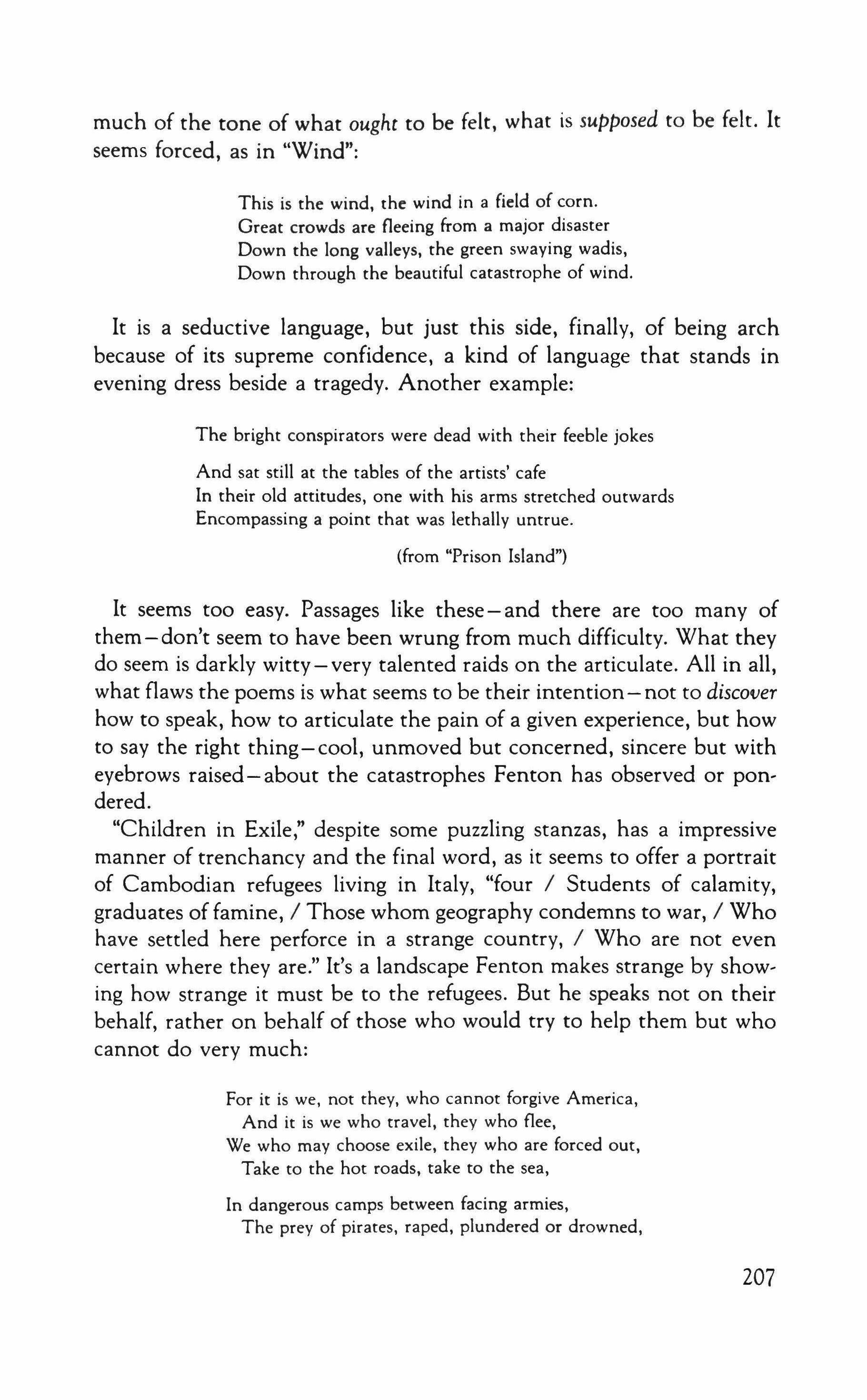
much of the tone of what ought to be felt, what is supposed to be felt. It seems forced, as in "Wind":
This is the wind, the wind in a field of corn. Great crowds are fleeing from a major disaster Down the long valleys, the green swaying wadis, Down through the beautiful catastrophe of wind.
It is a seductive language, but just this side, finally, of being arch because of its supreme confidence, a kind of language that stands in evening dress beside a tragedy. Another example:
The bright conspirators were dead with their feeble jokes
And sat still at the tables of the artists' cafe
In their old attitudes, one with his arms stretched outwards Encompassing a point that was lethally untrue.
(from "Prison Island")
It seems too easy. Passages like these - and there are too many of them - don't seem to have been wrung from much difficulty. What they do seem is darkly witty-very talented raids on the articulate. All in all, what flaws the poems is what seems to be their intention-not to discover how to speak, how to articulate the pain of a given experience, but how to say the right thing-cool, unmoved but concerned, sincere but with eyebrows raised - about the catastrophes Fenton has observed or pondered.
"Children in Exile," despite some puzzling stanzas, has a impressive manner of trenchancy and the final word, as it seems to offer a portrait of Cambodian refugees living in Italy, "four / Students of calamity, graduates of famine, / Those whom geography condemns to war, / Who have settled here perforce in a strange country, / Who are not even certain where they are." It's a landscape Fenton makes strange by showing how strange it must be to the refugees. But he speaks not on their behalf, rather on behalf of those who would try to help them but who cannot do very much:
For it is we, not they, who cannot forgive America, And it is we who travel, they who flee, We who may choose exile, they who are forced out, Take to the hot roads, take to the sea,
In dangerous camps between facing armies, The prey of pirates, raped, plundered or drowned,
207
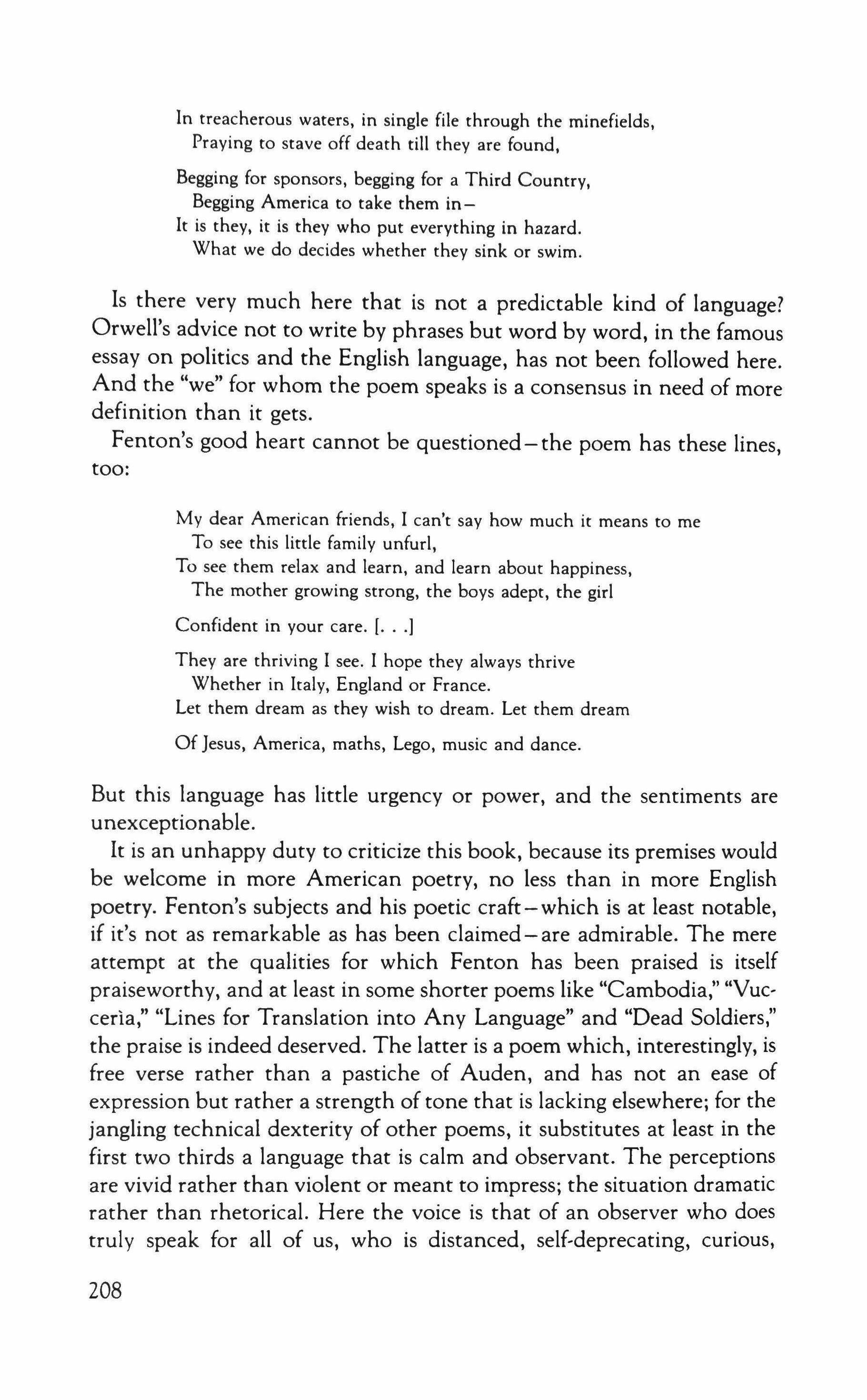
In treacherous waters, in single file through the minefields, Praying to stave off death till they are found,
Begging for sponsors, begging for a Third Country, Begging America to take them in-
It is they, it is they who put everything in hazard. What we do decides whether they sink or swim.
Is there very much here that is not a predictable kind of language? Orwell's advice not to write by phrases but word by word, in the famous essay on politics and the English language, has not been followed here. And the "we" for whom the poem speaks is a consensus in need of more definition than it gets.
Fenton's good heart cannot be questioned - the poem has these lines, too:
My dear American friends, I can't say how much it means to me
To see this little family unfurl,
To see them relax and learn, and learn about happiness, The mother growing strong, the boys adept, the girl
Confident in your care. [ ]
They are thriving I see. I hope they always thrive
Whether in Italy, England or France.
Let them dream as they wish to dream. Let them dream
Of Jesus, America, rnaths, Lego, music and dance.
But this language has little urgency or power, and the sentiments are unexceptionable.
It is an unhappy duty to criticize this book, because its premises would be welcome in more American poetry, no less than in more English poetry. Fenton's subjects and his poetic craft - which is at least notable, if it's not as remarkable as has been claimed-are admirable. The mere attempt at the qualities for which Fenton has been praised is itself praiseworthy, and at least in some shorter poems like "Cambodia," "Vueceria," "Lines for Translation into Any Language" and "Dead Soldiers," the praise is indeed deserved. The latter is a poem which, interestingly, is free verse rather than a pastiche of Auden, and has not an ease of expression but rather a strength of tone that is lacking elsewhere; for the jangling technical dexterity of other poems, it substitutes at least in the first two thirds a language that is calm and observant. The perceptions are vivid rather than violent or meant to impress; the situation dramatic rather than rhetorical. Here the voice is that of an observer who does truly speak for all of us, who is distanced, self-deprecating, curious,
208

sometimes witty in a bitter, even macabre, way, engagingly off-balance as he tries to understand his own feelings, and aware rather vaguely of hidden horror. It begins:
When His Excellency Prince Norodom Chantaraingsey
Invited me to lunch on the battlefield
I was glad of my white suit for the first time that day. They lived well, the mad Norodoms, they had style. The brandy and soda arrived in crates. Bricks of ice, tied around with raffia, Dripped from the orderlies' handlebars.
And I remember the dazzling tablecloth
As the APCs fanned out along the road, The dishes piled high with frogs' legs, Pregnant turtles, their eggs boiled in the carapace, Marsh irises in fish sauce
And inflorescence of a banana salad.
As the poem proceeds, the voice becomes progressively flatter and more casual, the portentousness fades, the scene goes only a little beyond an allegory of waste, lack of feeling, corruption, bizarre ironies. But it carries with it a sense of the war as a backdrop, an occasion of and for murderous human folly, and we feel what many must have felt in the face of such monstrous absurdity.
And what this poem shares with the others is Fenton's implicit proposal to address a large subject on behalf of his readership-that is what the somewhat impersonal accoutrements of his style suggest in every line: the slightly bitter tone of voice, the fencing with shadows of Auden and the Eliot of The Waste Land so as to suggest the summing up of a cultural dilemma in every image, and so as to adopt their cleverness and brilliance as the proper defense against feeling too much in the face of the terrible subjects Fenton wants to treat. But it's the general adoption of this strategy or group of strategies that makes the book disappointing. More directness is wanted; more honest vulnerability to the revulsion, shame and outrage that an ordinary decent person would share; and less guardedness and half-measures in the attempt to speak of and for the dispossessed, the defeated, the victims. It's as if, given license by our age to write whatever he wanted about experiences too horrible for words, Fenton returned to the method of an earlier generation, utilizing wit and euphemism in order to deal with his material.
There is of course no need to make a book of poems into a catalog of horrors. Mary Kinzie has written "I would question the use and perhaps
209
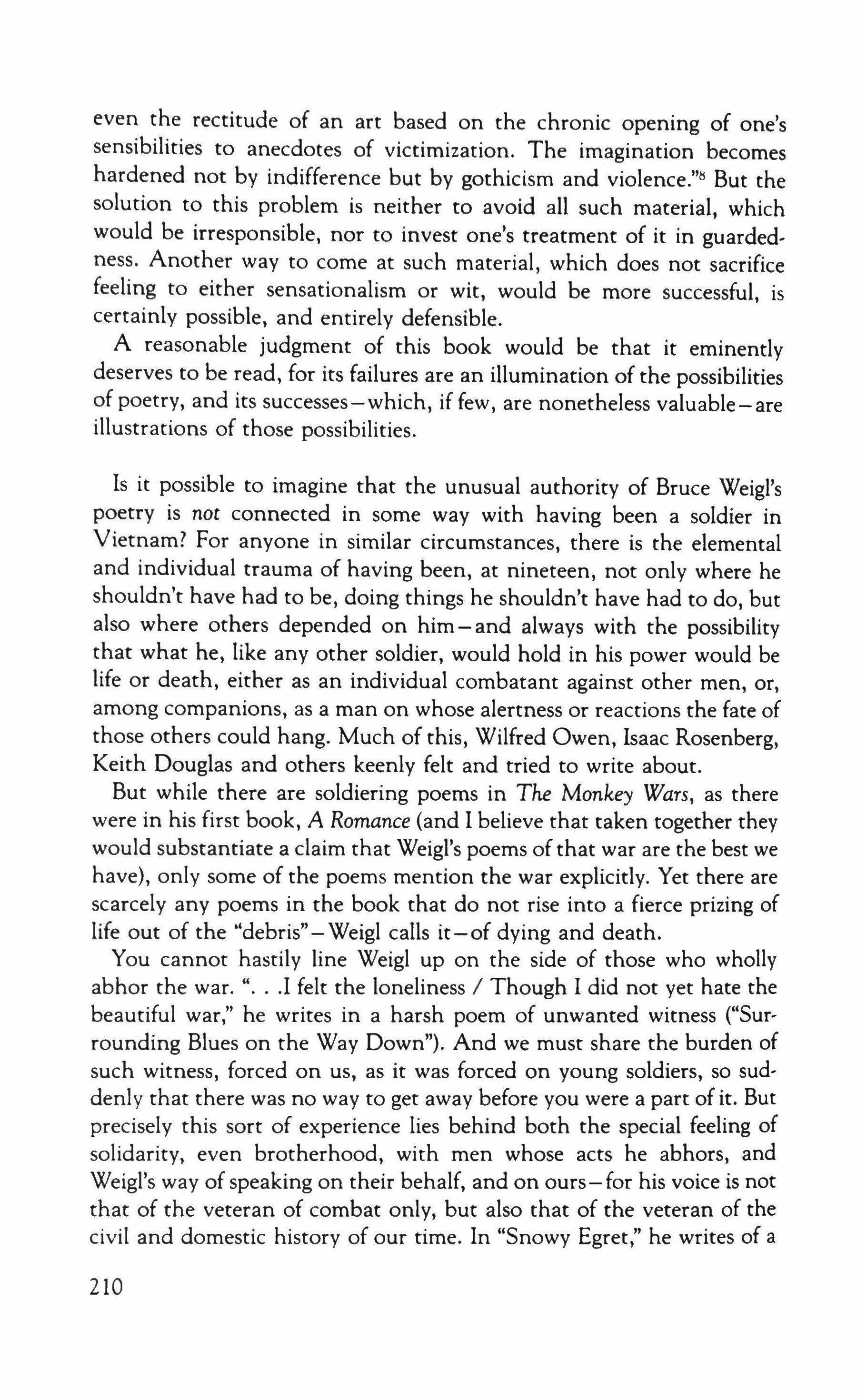
even the rectitude of an art based on the chronic opening of one's sensibilities to anecdotes of victimization. The imagination becomes hardened not by indifference but by gothicism and violence." But the solution to this problem is neither to avoid all such material, which would be irresponsible, nor to invest one's treatment of it in guardedness. Another way to come at such material, which does not sacrifice feeling to either sensationalism or wit, would be more successful, is certainly possible, and entirely defensible.
A reasonable judgment of this book would be that it eminently deserves to be read, for its failures are an illumination of the possibilities of poetry, and its successes-which, if few, are nonetheless valuable-are illustrations of those possibilities.
Is it possible to imagine that the unusual authority of Bruce Weigl's poetry is not connected in some way with having been a soldier in Vietnam? For anyone in similar circumstances, there is the elemental and individual trauma of having been, at nineteen, not only where he shouldn't have had to be, doing things he shouldn't have had to do, but also where others depended on him-and always with the possibility that what he, like any other soldier, would hold in his power would be life or death, either as an individual combatant against other men, or, among companions, as a man on whose alertness or reactions the fate of those others could hang. Much of this, Wilfred Owen, Isaac Rosenberg, Keith Douglas and others keenly felt and tried to write about.
But while there are soldiering poems in The Monkey Wars, as there were in his first book, A Romance (and I believe that taken together they would substantiate a claim that Weigl's poems of that war are the best we have), only some of the poems mention the war explicitly. Yet there are scarcely any poems in the book that do not rise into a fierce prizing of life out of the "debris" - Weigl calls it-of dying and death.
You cannot hastily line Weigl up on the side of those who wholly abhor the war. .I felt the loneliness / Though I did not yet hate the beautiful war," he writes in a harsh poem of unwanted witness ("Surrounding Blues on the Way Down"). And we must share the burden of such witness, forced on us, as it was forced on young soldiers, so suddenly that there was no way to get away before you were a part of it. But precisely this sort of experience lies behind both the special feeling of solidarity, even brotherhood, with men whose acts he abhors, and Weigl's way of speaking on their behalf, and on ours-for his voice is not that of the veteran of combat only, but also that of the veteran of the civil and domestic history of our time. In "Snowy Egret," he writes of a
210
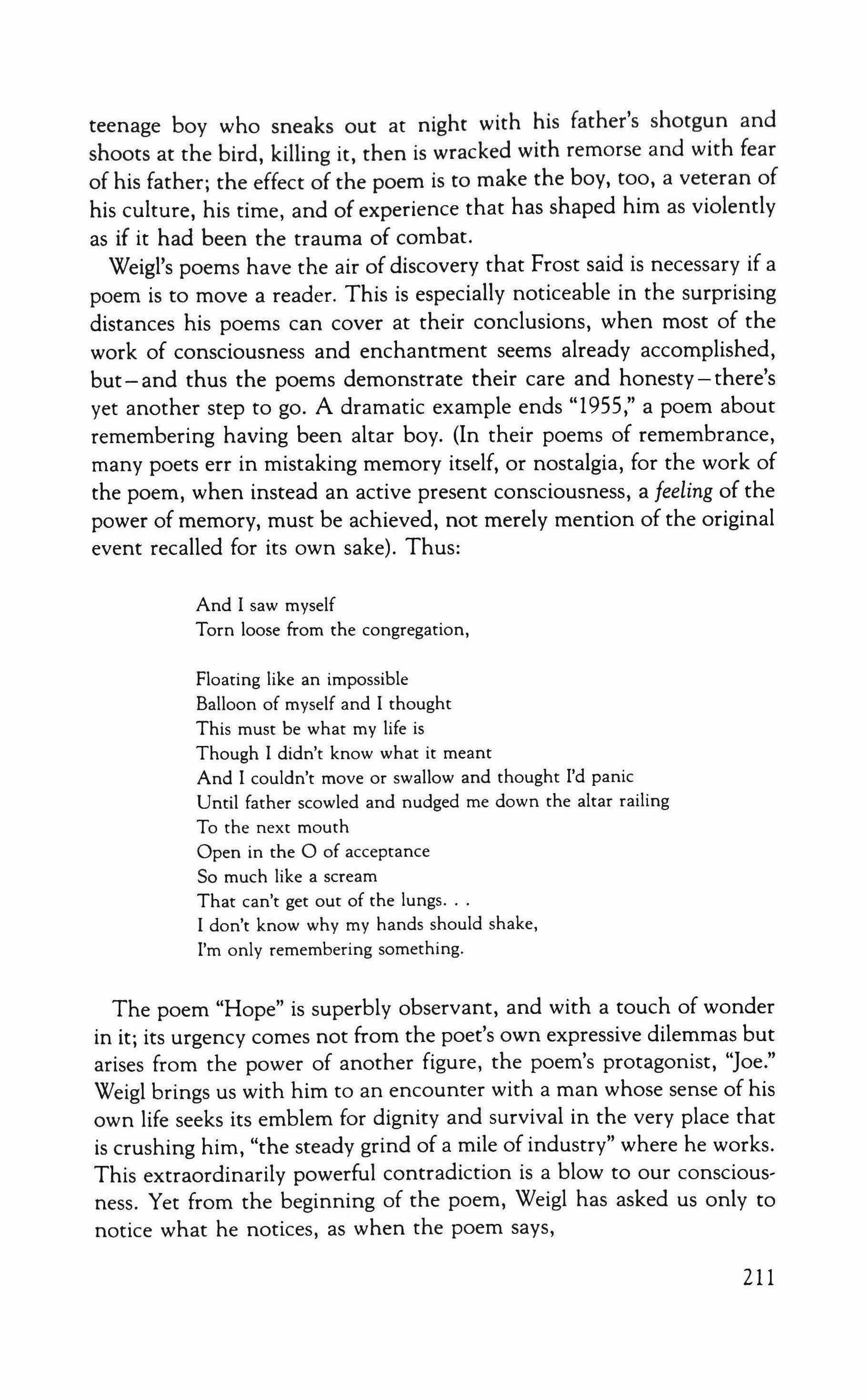
teenage boy who sneaks out at night with his father's shotgun and shoots at the bird, killing it, then is wracked with remorse and with fear of his father; the effect of the poem is to make the boy, too, a veteran of his culture, his time, and of experience that has shaped him as violently as if it had been the trauma of combat.
Weigl's poems have the air of discovery that Frost said is necessary if a poem is to move a reader. This is especially noticeable in the surprising distances his poems can cover at their conclusions, when most of the work of consciousness and enchantment seems already accomplished, but - and thus the poems demonstrate their care and honesty - there's yet another step to go. A dramatic example ends "1955," a poem about remembering having been altar boy. (In their poems of remembrance, many poets err in mistaking memory itself, or nostalgia, for the work of the poem, when instead an active present consciousness, a feeling of the power of memory, must be achieved, not merely mention of the original event recalled for its own sake). Thus:
And I saw myself
Tom loose from the congregation,
Floating like an impossible
Balloon of myself and I thought
This must be what my life is
Though I didn't know what it meant
And I couldn't move or swallow and thought I'd panic
Until father scowled and nudged me down the altar railing
To the next mouth
Open in the 0 of acceptance
So much like a scream
That can't get out of the lungs
I don't know why my hands should shake, I'm only remembering something.
The poem "Hope" is superbly observant, and with a touch of wonder in it; its urgency comes not from the poet's own expressive dilemmas but arises from the power of another figure, the poem's protagonist, "Joe." Weigl brings us with him to an encounter with a man whose sense of his own life seeks its emblem for dignity and survival in the very place that is crushing him, "the steady grind of a mile of industry" where he works. This extraordinarily powerful contradiction is a blow to our consciousness. Yet from the beginning of the poem, Weigl has asked us only to notice what he notices, as when the poem says,
211

They have two small boys and Joe loves them
So fiercely it's frightening.
"Frightening to us," we feel as we read - "to anyone who sees Joe with them."
Then in the next lines the poem reinforces our complicity as observers (such a different kind of observation from Fenton's, for Fenton is always speaking to us instead of for us) first with the word "you," which gently urges us to share the poet's puzzlement. And, with impeccable tact, the poem finally makes the oneness of poet and reader explicit:
Joe says he'd kill for them and he smiles
So you wonder why he thinks this,
What kind of terror he must imagine
To think he'd ever have to kill for his children.
His days are so often our nights
And his nights our days he seems
A zombie between shifts,
Out of sync with the rest of us.
Of course, isolating these lines deprives them of their function in the poem as a whole, where they are part of a thorough and carefully controlled preparation for a later moment of dramatic intensity that, as it should, fulfills this preparation, completes the poetic shape, rather than merely scarifying us with its own revelations. What is especially weakened by quotation is the rhythmic shape of the whole poem, which is built out of a movement between vignette and the kind of passage whose descriptive details, so apt in themselves, are also ready at any moment to open onto symbolic depths which we are never forced to look into, but which contain the serious thinking of the poem. This overall rhythmic shape is built with a language that is simple and clear and subtly expressive of-and even reassuring against-the emotional and physical violence it presents. One of the most interesting things about the poem, as it moves toward its twin revelations-dramatic and political? psychological? - is that at the midpoint a new stanza opens with the first appearance of the pronoun "I," and this small gesturepraise for such artistic scrupulousness! -does two things: after the opening passages, it grounds the poem in the consciousness of a single observer (with whom we identify, now), as if thereby steadying itself for a blow, and-to change critical metaphors-it suddenly tightens the poem like a knot around the closely detailed description of an act that both shocks and seems perfectly in keeping with the characterization of
212
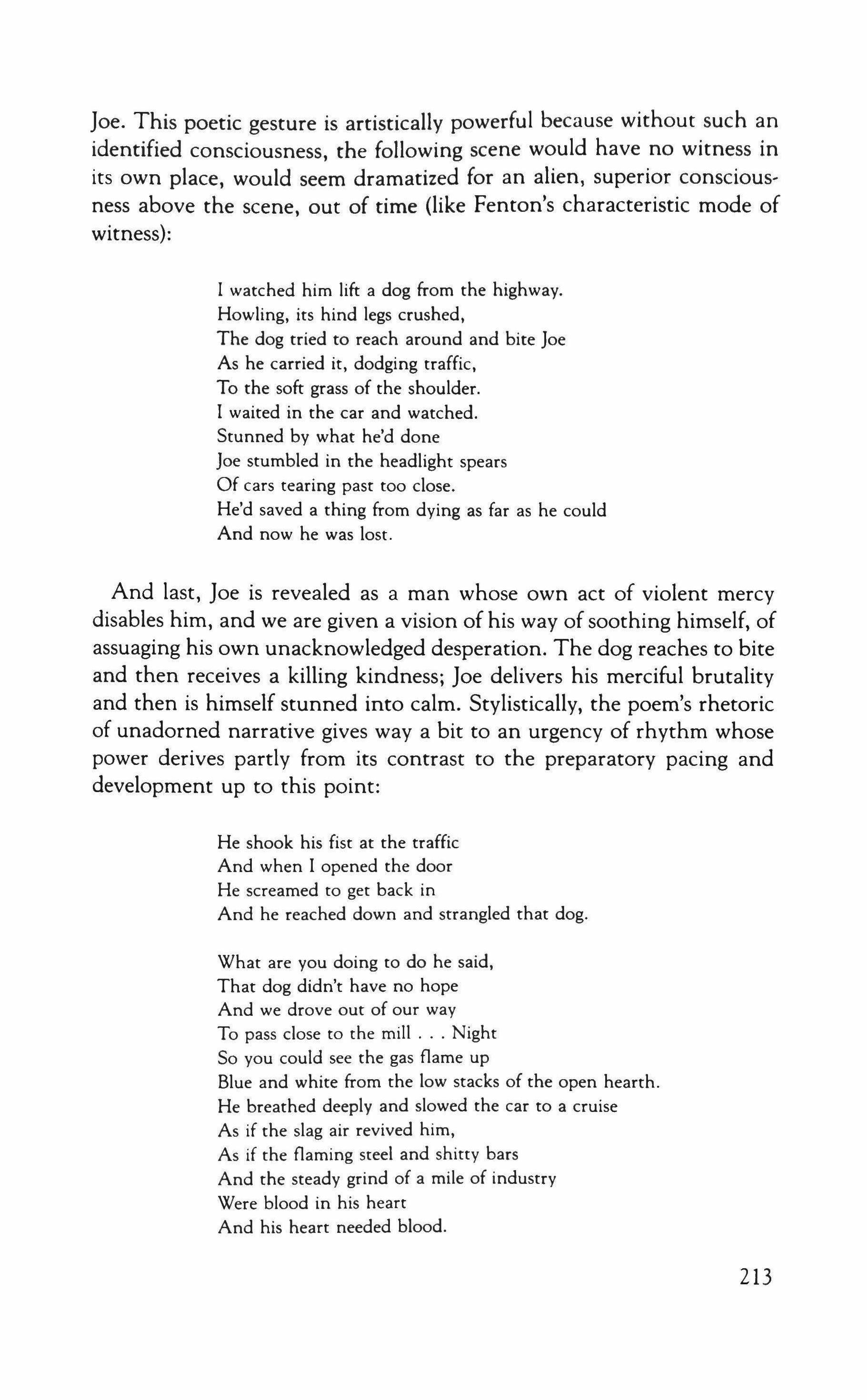
Joe. This poetic gesture is artistically powerful because without such an identified consciousness, the following scene would have no witness in its own place, would seem dramatized for an alien, superior consciousness above the scene, out of time (like Fenton's characteristic mode of witness):
I watched him lift a dog from the highway. Howling, its hind legs crushed, The dog tried to reach around and bite Joe As he carried it, dodging traffic, To the soft grass of the shoulder. I waited in the car and watched. Stunned by what he'd done Joe stumbled in the headlight spears Of cars tearing past too close.
He'd saved a thing from dying as far as he could And now he was lost.
And last, Joe is revealed as a man whose own act of violent mercy disables him, and we are given a vision of his way of soothing himself, of assuaging his own unacknowledged desperation. The dog reaches to bite and then receives a killing kindness; Joe delivers his merciful brutality and then is himself stunned into calm. Stylistically, the poem's rhetoric of unadorned narrative gives way a bit to an urgency of rhythm whose power derives partly from its contrast to the preparatory pacing and development up to this point:
He shook his fist at the traffic And when I opened the door He screamed to get back in And he reached down and strangled that dog.
What are you doing to do he said, That dog didn't have no hope
And we drove out of our way
To pass close to the mill Night
So you could see the gas flame up Blue and white from the low stacks of the open hearth. He breathed deeply and slowed the car to a cruise As if the slag air revived him, As if the flaming steel and shiny bars And the steady grind of a mile of industry Were blood in his heart
And his heart needed blood.
213
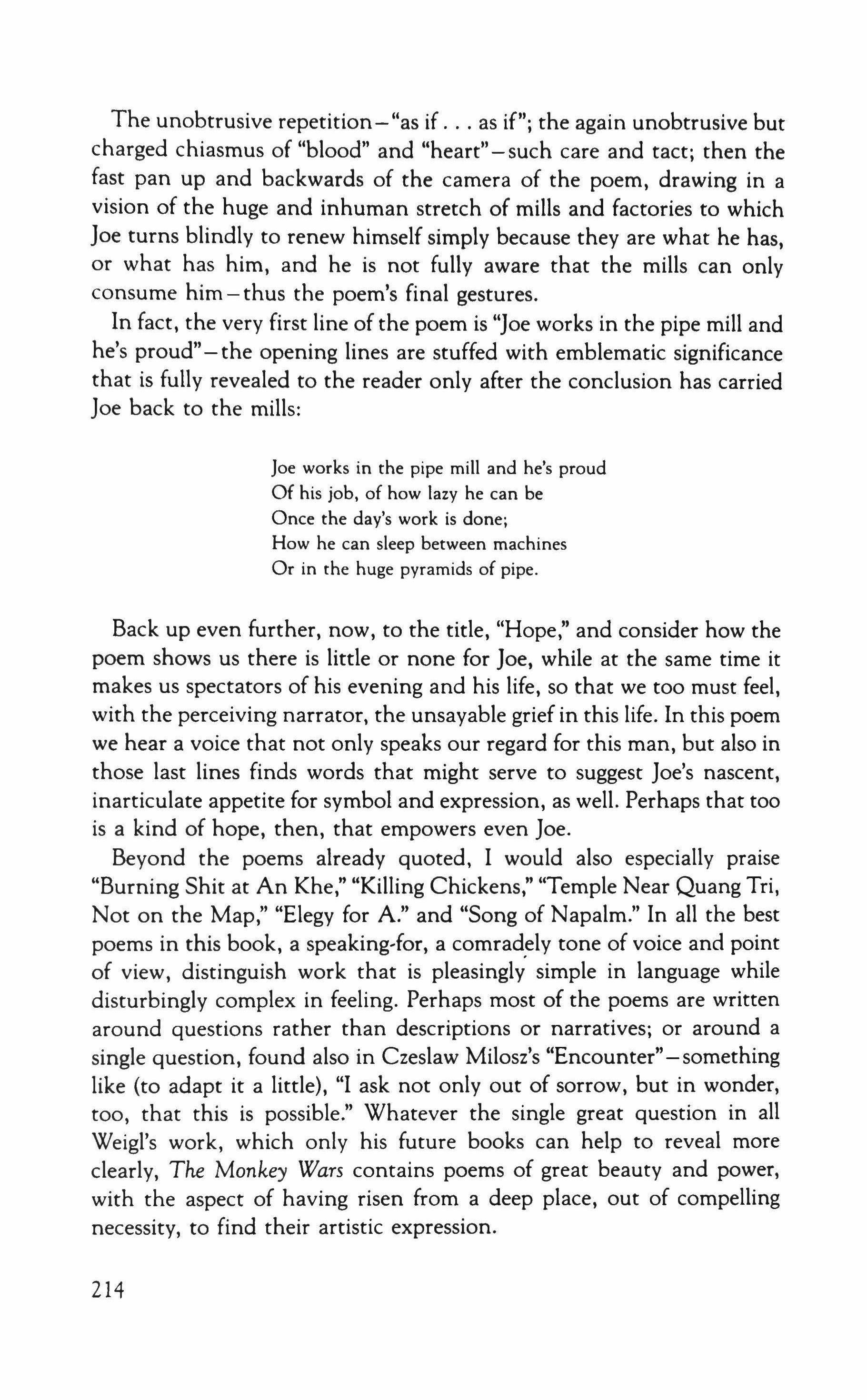
The unobtrusive repetition-lias if as if"; the again unobtrusive but charged chiasmus of "blood" and "heart" - such care and tact; then the fast pan up and backwards of the camera of the poem, drawing in a vision of the huge and inhuman stretch of mills and factories to which Joe turns blindly to renew himself simply because they are what he has, or what has him, and he is not fully aware that the mills can only consume him - thus the poem's final gestures.
In fact, the very first line of the poem is "Joe works in the pipe mill and he's proud" - the opening lines are stuffed with emblematic significance that is fully revealed to the reader only after the conclusion has carried Joe back to the mills:
Joe works in the pipe mill and he's proud Of his job, of how lazy he can be Once the day's work is done; How he can sleep between machines Or in the huge pyramids of pipe.
Back up even further, now, to the title, "Hope," and consider how the poem shows us there is little or none for Joe, while at the same time it makes us spectators of his evening and his life, so that we too must feel, with the perceiving narrator, the unsayable grief in this life. In this poem we hear a voice that not only speaks our regard for this man, but also in those last lines finds words that might serve to suggest Joe's nascent, inarticulate appetite for symbol and expression, as well. Perhaps that too is a kind of hope, then, that empowers even Joe.
Beyond the poems already quoted, I would also especially praise "Burning Shit at An Khe," "Killing Chickens," "Temple Near Quang Tri, Not on the Map," "Elegy for A." and "Song of Napalm." In all the best poems in this book, a speaking-for, a comradely tone of voice and point of view, distinguish work that is pleasingly simple in language while disturbingly complex in feeling. Perhaps most of the poems are written around questions rather than descriptions or narratives; or around a single question, found also in Czeslaw Milosz's "Encounter" - something like (to adapt it a little), "I ask not only out of sorrow, but in wonder, too, that this is possible." Whatever the single great question in all Weigl's work, which only his future books can help to reveal more clearly, The Monkey Wars contains poems of great beauty and power, with the aspect of having risen from a deep place, out of compelling necessity, to find their artistic expression.
214

Beginning as a poet of the domestic scene and of the richness of sense perceptions, whose eerily precise vision was all the more powerful for its idiosyncrasies, Seamus Heaney has come to be a poet caught in the Northern Irish civil wars, trying to use his talents to address the history and violence in his nation. It's as if he had been forced to look up from the plough or the henhouse because nearby a man had been shot. The warring keeps outdistancing his poems, as if to flaunt its occasions beyond a poet's ability to respond to them. Yet Heaney has pursued the poetic difficulty of such a subject all the more resourcefully, and has not only managed to write of what happens around him, but has also preserved, with his poetic strength, the value of poetry and inwardness against the brutal pressures of political allegiances, religious antipathies and calls to violence-as also against apathy, complacency, ignorance and cowardice. Like veterans or observers of a war ten years in the past, Heaney has needed time to gather himself to write of what he knows, and John Keegan's timetable has as much to do with this as Heaney's own aging. Toward the end of North (1975) the war is an irruption into a poetic realm more characteristically distanced, historical, emblematic. Then in Field Work (1979) there are premonitions: the fine poem "Casualty," the Dantean pieces and "In Memoriam Francis Ledwidge," to a soldier "Killed in France 31 July 1917." But the fullest treatment of the trials of a chaotic, pervasive, terrorist war comes in this latest collection. Station Island seems to me his best book of poems. It is more than one book, however, for it is divided into three unequal parts. If the third part, Heaney's "voicings" of poems for the legend-figure Sweeney, is dauntingly allusive and even cryptic, that may be because there, after fulfilling what he feels to be public responsibilities, Heaney has retreated to refresh himself poetically in a place where he may be as unresponsive as he wishes to everything but the meanderings of his own consciousness through the resonant emblems of its choosing. (In the title sequence, he had reminded himself to "write for the joy of it.") Ever crafty, though, he touches the figure of Sweeney, as if to validate with myth what he has felt as personal.
In the first poem of this section, Heaney sounds a note of bewilderment that could apply to how his work has been received generally, almost since he began to publish:
And there I was, incredible [0 myself, among people far too eager [0 believe me and my story, even if it happened to be true.
("Sweeney Redivivus")
215
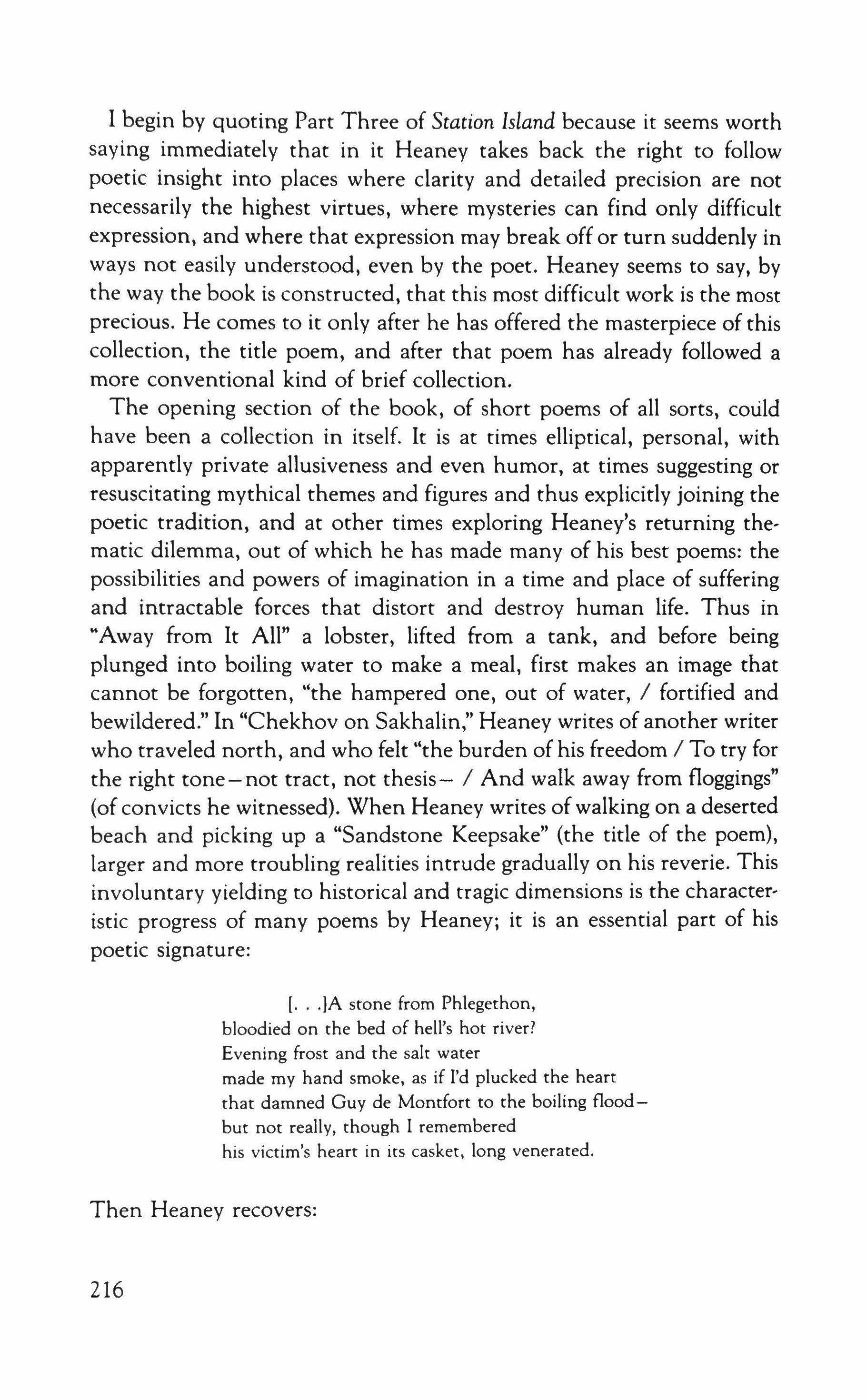
I begin by quoting Part Three of Station Island because it seems worth saying immediately that in it Heaney takes back the right to follow poetic insight into places where clarity and detailed precision are not necessarily the highest virtues, where mysteries can find only difficult expression, and where that expression may break off or turn suddenly in ways not easily understood, even by the poet. Heaney seems to say, by the way the book is constructed, that this most difficult work is the most precious. He comes to it only after he has offered the masterpiece of this collection, the title poem, and after that poem has already followed a more conventional kind of brief collection.
The opening section of the book, of short poems of all sorts, could have been a collection in itself. It is at times elliptical, personal, with apparently private allusiveness and even humor, at times suggesting or resuscitating mythical themes and figures and thus explicitly joining the poetic tradition, and at other times exploring Heaney's returning thematic dilemma, out of which he has made many of his best poems: the possibilities and powers of imagination in a time and place of suffering and intractable forces that distort and destroy human life. Thus in "Away from It All" a lobster, lifted from a tank, and before being plunged into boiling water to make a meal, first makes an image that cannot be forgotten, "the hampered one, out of water, / fortified and bewildered." In "Chekhov on Sakhalin," Heaney writes of another writer who traveled north, and who felt "the burden of his freedom / To try for the right tone-not tract, not thesis- / And walk away from floggings" (of convicts he witnessed). When Heaney writes of walking on a deserted beach and picking up a "Sandstone Keepsake" (the title of the poem), larger and more troubling realities intrude gradually on his reverie. This involuntary yielding to historical and tragic dimensions is the characteristic progress of many poems by Heaney; it is an essential part of his poetic signature:
( JA stone from Phlegethon, bloodied on the bed of hell's hot river? Evening frost and the salt water made my hand smoke, as if I'd plucked the heart that damned Guy de Montfort to the boiling floodbut not really, though I remembered his victim's heart in its casket, long venerated.
Then Heaney recovers:
216
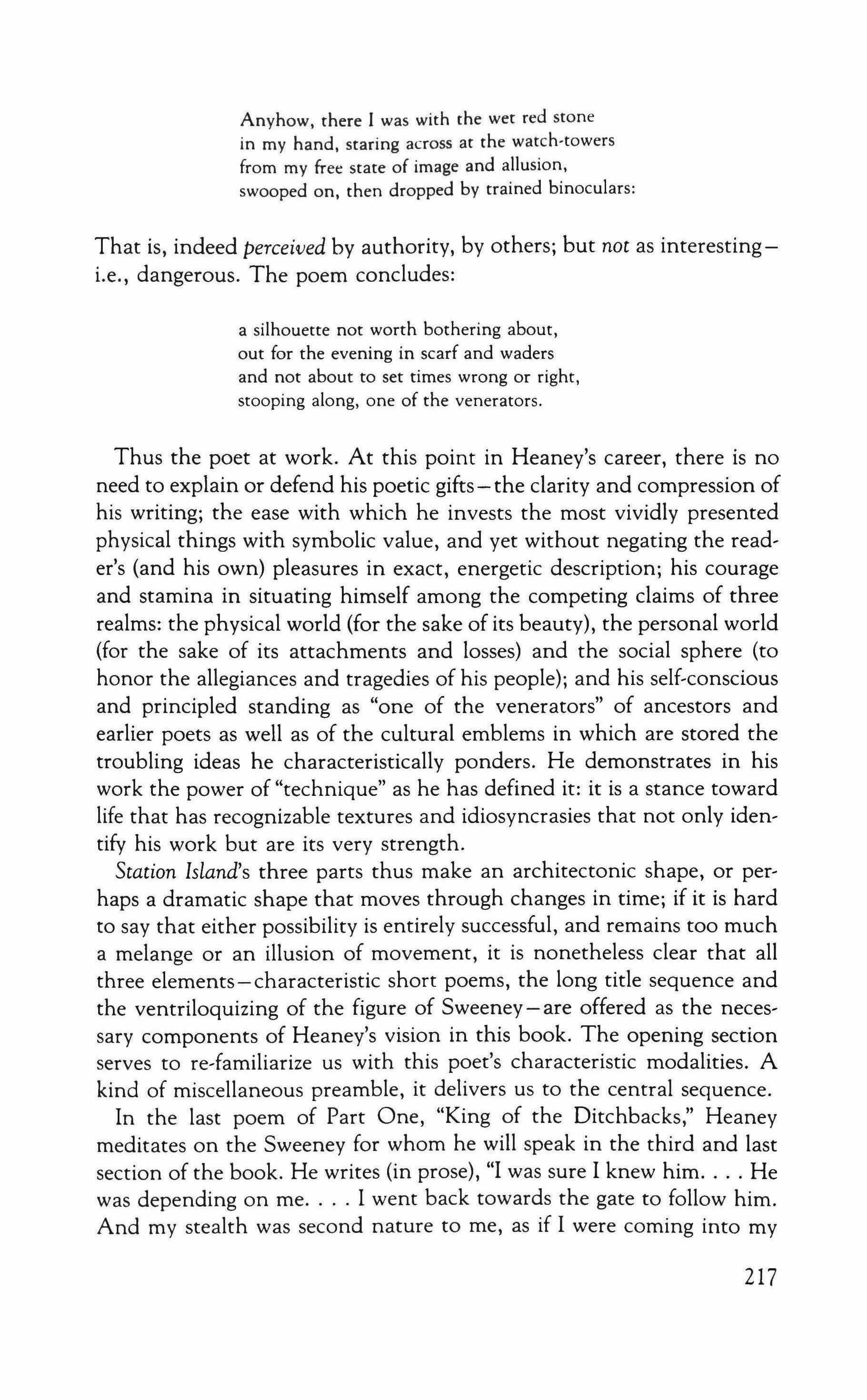
Anyhow, there I was with the wet red stone in my hand, staring across at the watch-towers from my free state of image and allusion, swooped on, then dropped by trained binoculars:
That is, indeed perceived by authority, by others; but nor as interestingi.e., dangerous. The poem concludes:
a silhouette not worth bothering about, out for the evening in scarf and waders and not about to set times wrong or right, stooping along, one of the venerators.
Thus the poet at work. At this point in Heaney's career, there is no need to explain or defend his poetic gifts - the clarity and compression of his writing; the ease with which he invests the most vividly presented physical things with symbolic value, and yet without negating the reader's (and his own) pleasures in exact, energetic description; his courage and stamina in situating himself among the competing claims of three realms: the physical world (for the sake of its beauty), the personal world (for the sake of its attachments and losses) and the social sphere (to honor the allegiances and tragedies of his people); and his self-conscious and principled standing as "one of the venerators" of ancestors and earlier poets as well as of the cultural emblems in which are stored the troubling ideas he characteristically ponders. He demonstrates in his work the power of "technique" as he has defined it: it is a stance toward life that has recognizable textures and idiosyncrasies that not only identify his work but are its very strength.
Srarion Island's three parts thus make an architectonic shape, or perhaps a dramatic shape that moves through changes in time; if it is hard to say that either possibility is entirely successful, and remains too much a melange or an illusion of movement, it is nonetheless clear that all three elements-characteristic short poems, the long title sequence and the ventriloquizing of the figure of Sweeney-are offered as the necessary components of Heaney's vision in this book. The opening section serves to re-farniliarize us with this poet's characteristic modalities. A kind of miscellaneous preamble, it delivers us to the central sequence. In the last poem of Part One, "King of the Ditchbacks," Heaney meditates on the Sweeney for whom he will speak in the third and last section of the book. He writes (in prose), "I was sure I knew him He was depending on me I went back towards the gate to follow him. And my stealth was second nature to me, as if I were coming into my
217
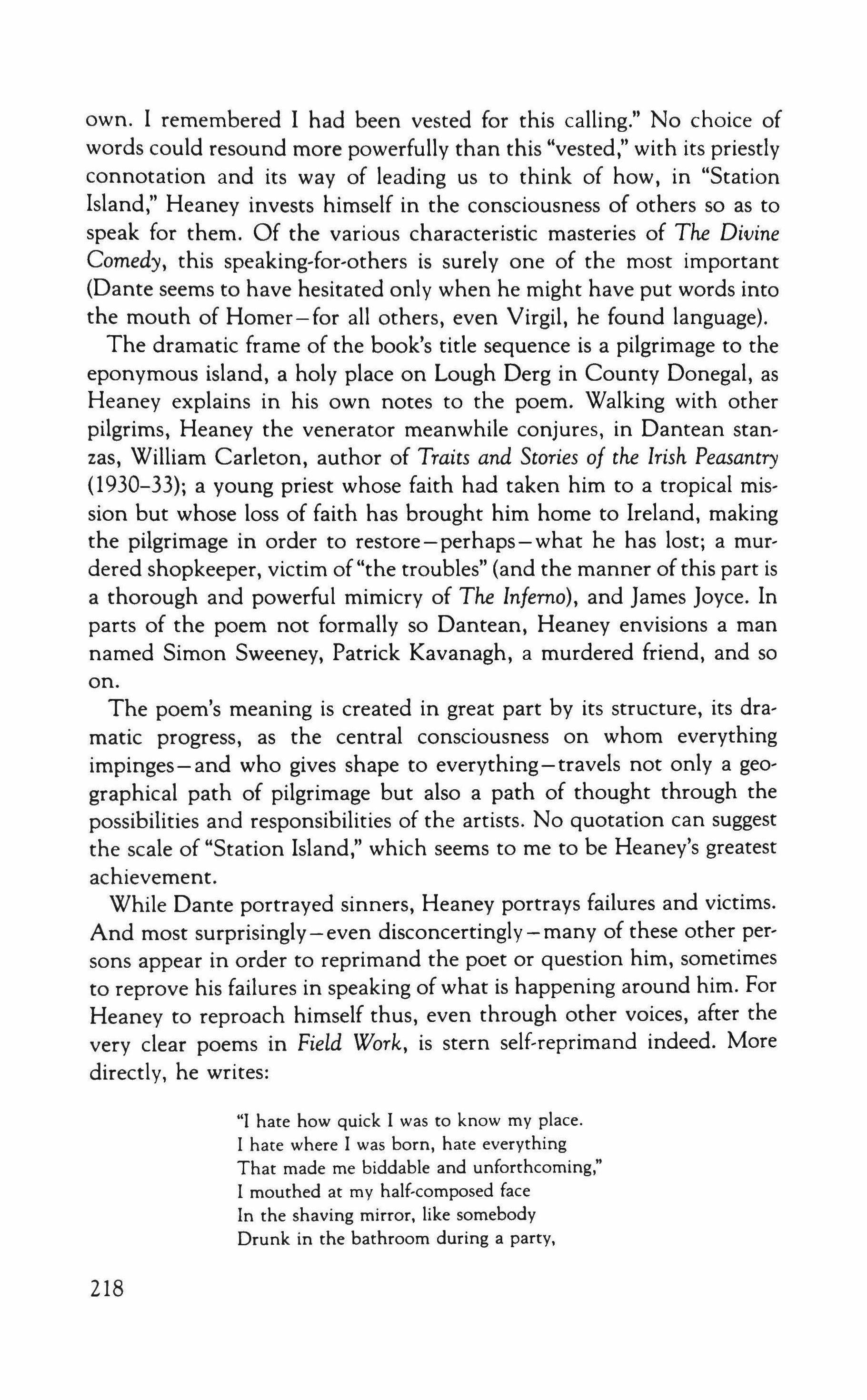
own. I remembered I had been vested for this calling." No choice of words could resound more powerfully than this "vested," with its priestly connotation and its way of leading us to think of how, in "Station Island," Heaney invests himself in the consciousness of others so as to speak for them. Of the various characteristic masteries of The Divine Comedy, this speaking-for-others is surely one of the most important (Dante seems to have hesitated only when he might have put words into the mouth of Homer-for all others, even Virgil, he found language).
The dramatic frame of the book's title sequence is a pilgrimage to the eponymous island, a holy place on Lough Derg in County Donegal, as Heaney explains in his own notes to the poem. Walking with other pilgrims, Heaney the venerator meanwhile conjures, in Dantean stanzas, William Carleton, author of Traits and Stories of the Irish Peasantry (1930-33); a young priest whose faith had taken him to a tropical mission but whose loss of faith has brought him home to Ireland, making the pilgrimage in order to restore-perhaps-what he has lost; a murdered shopkeeper, victim of"the troubles" (and the manner of this part is a thorough and powerful mimicry of The Inferno), and James Joyce. In parts of the poem not formally so Dantean, Heaney envisions a man named Simon Sweeney, Patrick Kavanagh, a murdered friend, and so on.
The poem's meaning is created in great part by its structure, its dramatic progress, as the central consciousness on whom everything impinges-and who gives shape to everything-travels not only a geographical path of pilgrimage but also a path of thought through the possibilities and responsibilities of the artists. No quotation can suggest the scale of "Station Island," which seems to me to be Heaney's greatest achievement.
While Dante portrayed sinners, Heaney portrays failures and victims. And most surprisingly - even disconcertinglymany of these other persons appear in order to reprimand the poet or question him, sometimes to reprove his failures in speaking of what is happening around him. For Heaney to reproach himself thus, even through other voices, after the very clear poems in Field Work, is stern self-reprimand indeed. More directly, he writes:
"I hate how quick I was to know my place. I hate where I was born, hate everything That made me biddable and unforthcoming," I mouthed at my half-composed face In the shaving mirror, like somebody Drunk in the bathroom during a party,
218
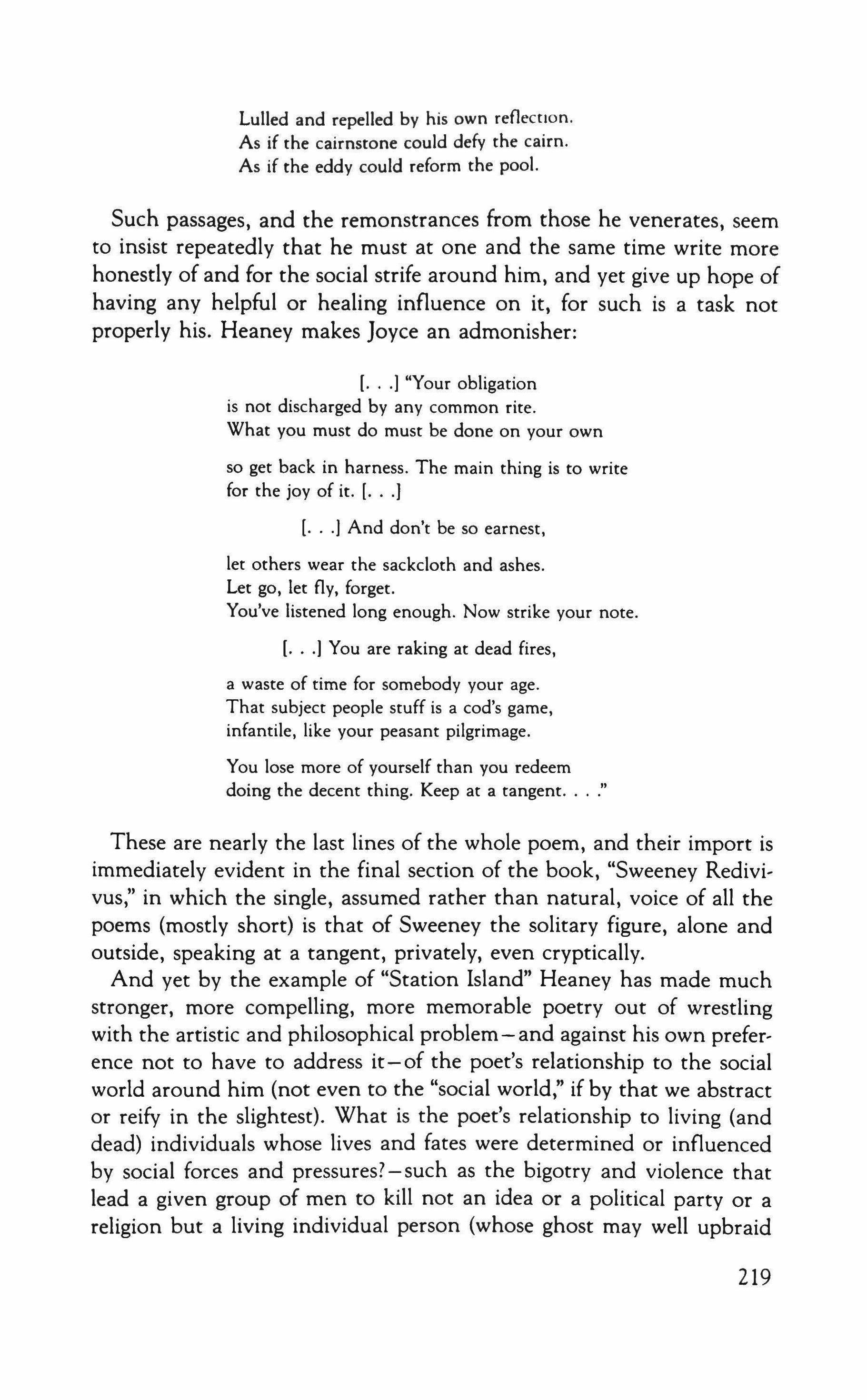
Lulled and repelled by his own reflection. As if the cairnstone could defy the cairn. As if the eddy could reform the pool.
Such passages, and the remonstrances from those he venerates, seem to insist repeatedly that he must at one and the same time write more honestly of and for the social strife around him, and yet give up hope of having any helpful or healing influence on it, for such is a task not properly his. Heaney makes Joyce an admonisher:
[ J "Your obligation is not discharged by any common rite. What you must do must be done on your own
so get back in harness. The main thing is to write for the joy of it. [ J
[ J And don't be so earnest, let others wear the sackcloth and ashes. Let go, let fly, forget. You've listened long enough. Now strike your note.
[ J You are raking at dead fires, a waste of time for somebody your age. That subject people stuff is a cod's game, infantile, like your peasant pilgrimage. You lose more of yourself than you redeem doing the decent thing. Keep at a tangent
These are nearly the last lines of the whole poem, and their import is immediately evident in the final section of the book, "Sweeney Redivivus," in which the single, assumed rather than natural, voice of all the poems (mostly short) is that of Sweeney the solitary figure, alone and outside, speaking at a tangent, privately, even cryptically.
And yet by the example of "Station Island" Heaney has made much stronger, more compelling, more memorable poetry out of wrestling with the artistic and philosophical problem - and against his own preference not to have to address it-of the poet's relationship to the social world around him (not even to the "social world," if by that we abstract or reify in the slightest). What is the poet's relationship to living (and dead) individuals whose lives and fates were determined or influenced by social forces and pressures? - such as the bigotry and violence that lead a given group of men to kill not an idea or a political party or a religion but a living individual person (whose ghost may well upbraid
219
Heaney in this poem). What should this relationship be? This thoroughgoing engagement with a difficult and deeply felt artistic problem is everywhere evident in "Station Island," and is the poem's principal subject.
It's this large responsibility that gives even the smallest details of Heaney's descriptions their haunting precision and symbolic compression. As one might expect, the book composes a wonderfully rich world of sensation and perception, of reflection and insight. It seems especially in Part One also to have a certain freedom of expression not always found in Heaney's earlier books, in which his own talent sometimes seemed to pinch him to make the most of every single detail until it seemed sometimes that he scarcely had leisure to think, because he must always be describing. A tenor always being asked-asking himself-to hit high C. Not all the poems in Part One of Station Island seem fully achieved; but taken together, they are a further revelation of a poetic intelligence that has already produced its share of finely-tuned and finished poems. The miscellaneous quality of Part One even serves to set off the darker, more controlled, situations and structures of Part Two, "Station Island."
In fact, the structure of the book-moving at last to the oddest voice of all, Sweeney's-makes this Heaney's most disturbing book. For the last section can't be merely a group of poems tacked onto the others. It seems to be offered as a summation or resolution, but as such, it works against the powers and accomplishments of "Station Island" and the poems in the opening section. The Dantean mode, which is demonstrably full of vigor and powerful feeling in Heaney's hands, is entirely forgotten in Part Three, "Sweeney Redivivus." Those for whom Heaney has spoken are left behind, replaced by the laconic figure who is not only alone but by his own wishes apart from others.
Technically, the clue to this may lie in something as simple as the movement from things in threes in "Station Island" to things in twos in "Sweeney Redivivus." Two is opposition; it forces a choice between alternatives. Three, even in conflict, is complexity; it requires more patience, it evolves into the unforeseen. On this evidence, it is "Station Island," a great poem, that points the direction Heaney is most likely to keep traveling, not "Sweeney Redivivus."
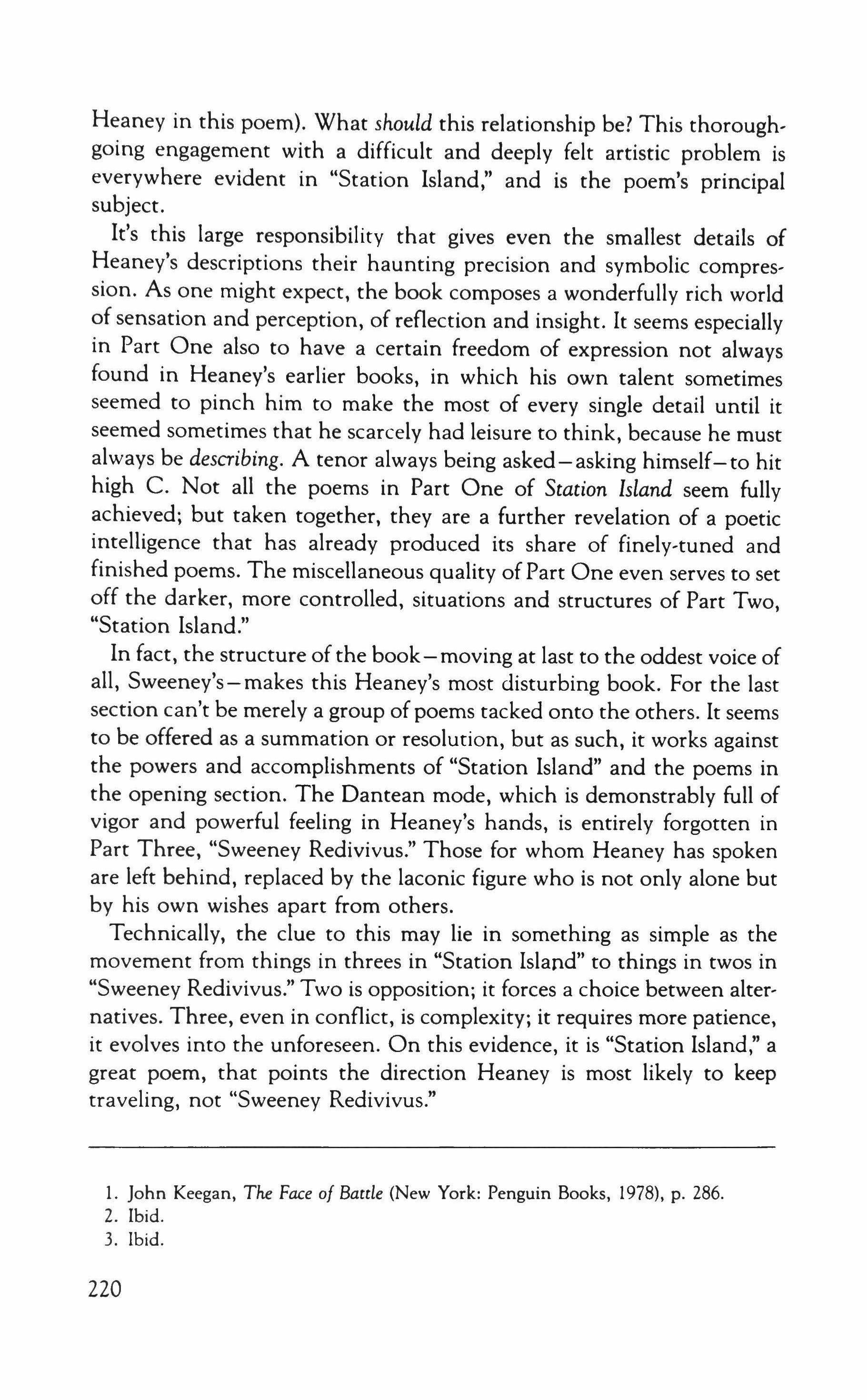
1. John Keegan, The Face of Bartle (New York: Penguin Books, 1978), p. 286.
2. Ibid.
3. Ibid.
220
4. Ibid., pp. 328-29.
5. James Fenton, "The Fall of Saigon," Granta, No. IS, p. 31.
6. Ibid.
7. Ibid., p. 113.
8. Mary Kinzie, "Weeds in Tar" [on Adrienne Rich], American Poetry Review (lulv/ August 1985), p. 45.
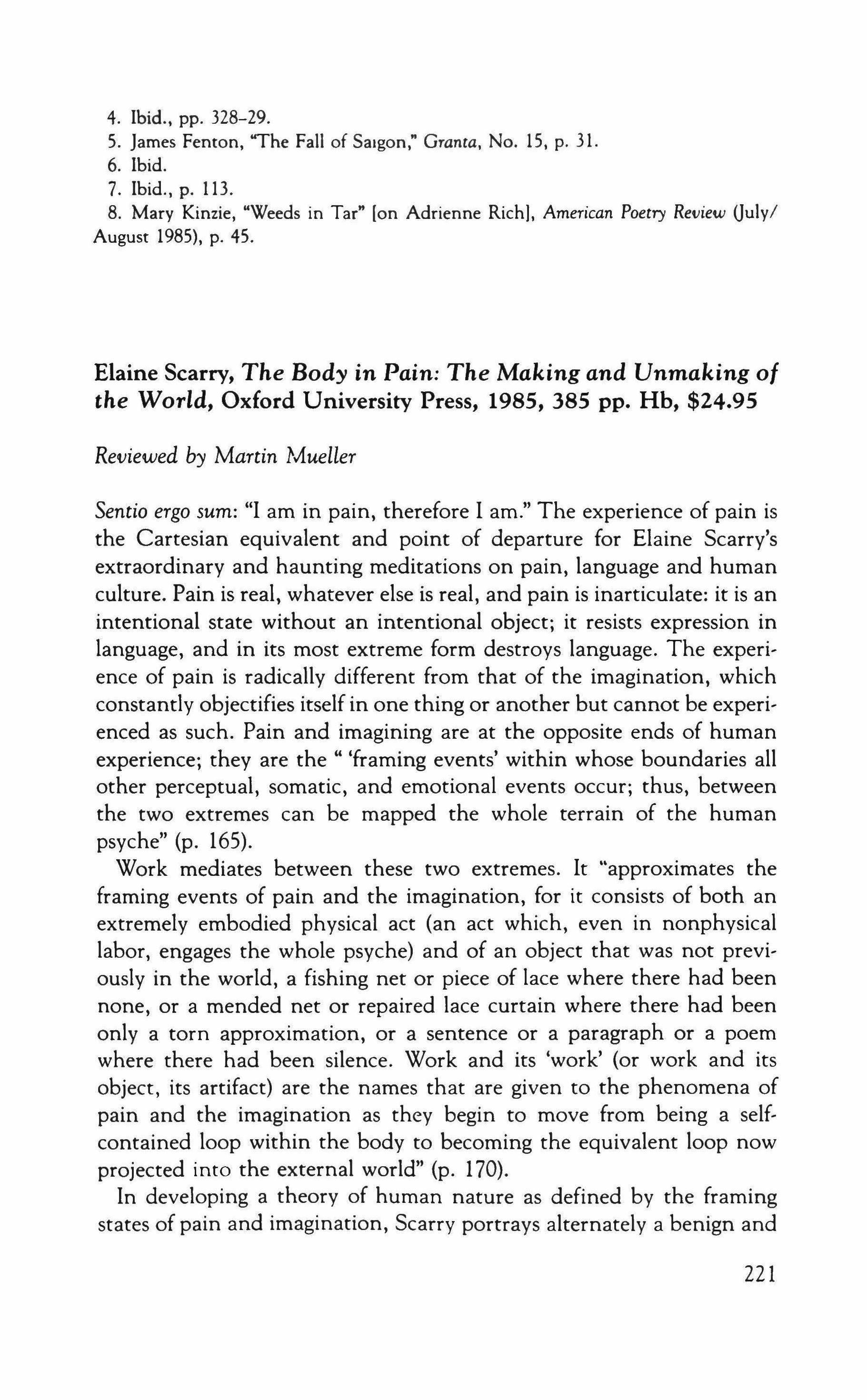
Elaine Scarry, The Body in Pain: The Making and Unmaking of the WOTld, Oxford University Press, 1985, 385 pp. Hb, $24.95
Reviewed by Martin Mueller
Sentio ergo sum: "I am in pain, therefore I am." The experience of pain is the Cartesian equivalent and point of departure for Elaine Scarry's extraordinary and haunting meditations on pain, language and human culture. Pain is real, whatever else is real, and pain is inarticulate: it is an intentional state without an intentional object; it resists expression in language, and in its most extreme form destroys language. The experience of pain is radically different from that of the imagination, which constantly objectifies itself in one thing or another but cannot be experienced as such. Pain and imagining are at the opposite ends of human experience; they are the" 'framing events' within whose boundaries all other perceptual, somatic, and emotional events occur; thus, between the two extremes can be mapped the whole terrain of the human psyche" (p. 165).
Work mediates between these two extremes. It "approximates the framing events of pain and the imagination, for it consists of both an extremely embodied physical act (an act which, even in nonphysical labor, engages the whole psyche) and of an object that was not previously in the world, a fishing net or piece of lace where there had been none, or a mended net or repaired lace curtain where there had been only a torn approximation, or a sentence or a paragraph or a poem where there had been silence. Work and its 'work' (or work and its object, its artifact) are the names that are given to the phenomena of pain and the imagination as they begin to move from being a selfcontained loop within the body to becoming the equivalent loop now projected into the external world" (p. 170).
In developing a theory of human nature as defined by the framing states of pain and imagination, Scarry portrays alternately a benign and
221

a demonic vision of the world. In the benign vision, human culture is a universal project of pain relief. "I am in pain: how can I get rid of it?" The whole world of material culture is an answer to that question, and a refreshingly sympathetic and celebratory one at that. Not only such useful and essential articles as coats and chairs, but also such symbol, laden things as blue jeans and Sony tape recorders appear in this benign vision as elements of a rich and strange human creation in which the parts and functions of the human body are projected into the world while their deficiencies are compensated and overcome in the very act of projection.
Scarry's discussion of the "making of the world" is a deeply humane account of the interaction of man and objects in material culture. Her vision of things is remarkably generous, equally free of disdain and avarice. It is also wonderfully perceptive: she knows where to look and how to share her surprise with her reader. A typical moment for me occurs in the very fine discussion of the difference between weapons and tools and the ambiguities that can arise from tools as weapons or weapons as tools: "there are certain instruments (such as those in medicine and dentistry) that we call 'tools' even though they enter human tissue; but it should be noticed that this identification is 'learned' and that even after it is learned, it requires a conscious mental act to hold steady the perception (which violates all intuition) of the object as a tool. Every child recognizes it as a weapon and responds accordingly" (p. 174, italics mine).
The child's perspective is also the author's, who has a way of drawing our attention to the things we take for granted, as in this gently ironic description of a writer formulating a critique of materialism: "The weight of the person thinking this thought is dispersed out onto three horizontal boards: one intercepts his body from below; another, two feet higher than the first intercepts and lifts his body from behind; and another, a foot higher than the second, intercepts his body from the front, bearing the weight of his arms and the book he holds. These in turn occur within a larger lattice of surfaces, an elaborate series of vertical planes that surround him in all directions, in some directions recurring in such dense intervals that five or six or perhaps twelve layers separate him from the outside world. They stabilize his surroundings, mediating the approach or departure of everything human and inhuman He has woven himself into a tapestry of artifice that regulates the appearance and disappearance of all 'natural presence' including his own" (pp. 250-51). Not for Scarry the pastoral delusions of the exiled Duke, in
222

Twelfth Night, who praises the rough winds as "counsellors / That feelingly persuade me what I am."
In the benign vision of the world, the human and humane imagination transforms pain into a sympathetic sentience on the part of the artifact. The artifact circulates in a generative cycle of charity and performs the work of the good Samaritan. I may hug you to keep you warm, or, more effectively, I may make a coat that you or someone else may wear on many occasions (p. 307). This excess of "reciprocation" over "projection," i.e. the energy invested in the creation of the artifact, is cardinal to the structure of making in Scarry's sympathetic materialist vision.
The benign world is not spiritual, but it is in an almost literal sense sympathetic. The artifact offers comfort and acquires sentience: a chair offers relief to your tired legs and aching back as if it felt and anticipated your pain. Where the made world succeeds it is "made sentient" and therefore comes alive. In a fascinating discussion of the language of product liability trials Scarry shows how contemporary attitudes toward objects that break down and fail us, such as an exploding gas stove, bear deep resemblance to very ancient ways of thinking about the world. An artifact that fails to respond is responsible for its failure; the language and procedures of a contemporary courtroom in a liability trial are deeply suffused with forms of animism.
Accidents (the exploding gas stove) remind us of the precarious state of this world. A much more radical challenge comes from the demonic and self-centered vision of the relationship between pain and imagination. What if instead of using my imagination to relieve your pain, I use your pain to lend reality to my dreams of power? This question governs Scarry's discussion of the structure of torture.
Torture enters Scarry's argument through the paradoxical relationship of pain and language. Pain is notoriously difficult to describe, and in its extreme form it expresses itself in utterances that destroy language. But in torture pain and language enter a new relationship. Torture characteristically involves interrogation and aims at the victim's confession. Scarry challenges this instrumental view of torture by paying attention to the scream of unbearable pain and offers an interpretation that rests on the concept of "analogous verification." Pain is real, but power and visions of grandeur are illusory. Torture uses the real pain of another as evidence of the torturer's power: "You are in pain, therefore I am." The need for such assertion is itself evidence of deep instability, and Scarry claims that torture is particularly frequent in unstable regimes.
The arguments about torture have been sharply attacked by Peter
223
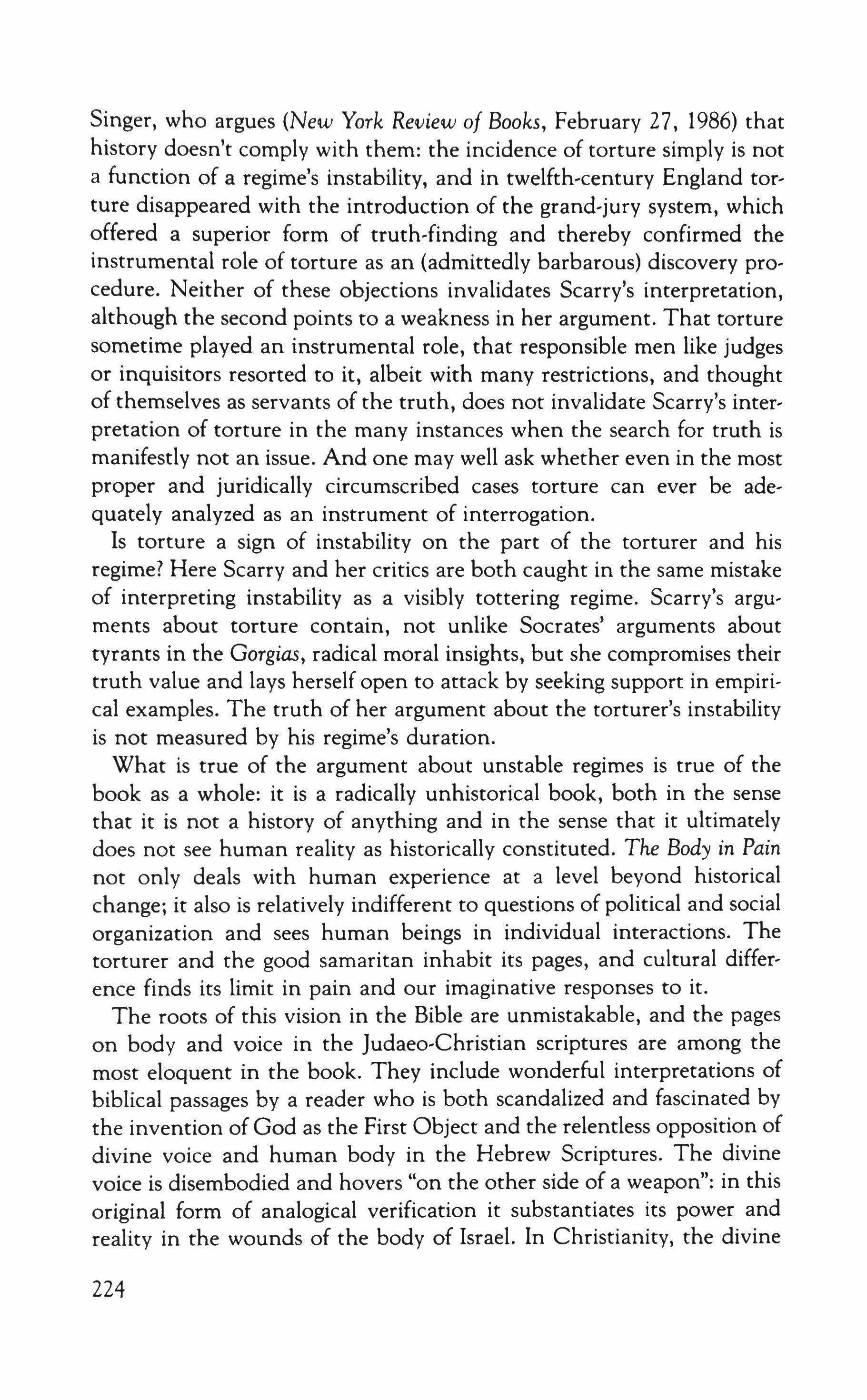
Singer, who argues (New York Review of Books, February 27, 1986) that history doesn't comply with them: the incidence of torture simply is not a function of a regime's instability, and in twelfth-centurv England tor, ture disappeared with the introduction of the grand-jury system, which offered a superior form of truth-finding and thereby confirmed the instrumental role of torture as an (admittedly barbarous) discovery procedure. Neither of these objections invalidates Scarry's interpretation, although the second points to a weakness in her argument. That torture sometime played an instrumental role, that responsible men like judges or inquisitors resorted to it, albeit with many restrictions, and thought of themselves as servants of the truth, does not invalidate Scarry's interpretation of torture in the many instances when the search for truth is manifestly not an issue. And one may well ask whether even in the most proper and juridically circumscribed cases torture can ever be adequately analyzed as an instrument of interrogation.
Is torture a sign of instability on the part of the torturer and his regime? Here Scarry and her critics are both caught in the same mistake of interpreting instability as a visibly tottering regime. Scarry's arguments about torture contain, not unlike Socrates' arguments about tyrants in the Gorgias, radical moral insights, but she compromises their truth value and lays herself open to attack by seeking support in empirical examples. The truth of her argument about the torturer's instability is not measured by his regime's duration.
What is true of the argument about unstable regimes is true of the book as a whole: it is a radically unhistorical book, both in the sense that it is not a history of anything and in the sense that it ultimately does not see human reality as historically constituted. The Body in Pain not only deals with human experience at a level beyond historical change; it also is relatively indifferent to questions of political and social organization and sees human beings in individual interactions. The torturer and the good samaritan inhabit its pages, and cultural difference finds its limit in pain and our imaginative responses to it.
The roots of this vision in the Bible are unmistakable, and the pages on body and voice in the [udaeo-Christian scriptures are among the most eloquent in the book. They include wonderful interpretations of biblical passages by a reader who is both scandalized and fascinated by the invention of God as the First Object and the relentless opposition of divine voice and human body in the Hebrew Scriptures. The divine voice is disembodied and hovers "on the other side of a weapon": in this original form of analogical verification it substantiates its power and reality in the wounds of the body of Israel. In Christianity, the divine
224
voice is "self-substantiating," as the power of God manifests itself in the body of Christ, but the origins of this view can be traced in many passages in the Hebrew Scriptures that endow the divine voice with sentience. Scarry's opposition of body and voice (a version of the word and flesh of the gospel) is a very illuminating device for tracing both continuity and radical difference in the [udaeo-Christian Scriptures; just as importantly, her attention to detail, as in her marvelous interpreta, tion of Rebekah (p. 191), constantly illuminates and expands the power and compression of the biblical narrative.
The Body in Pain will be admired by many readers and criticized by many. It could not be otherwise with a book that moves so boldly and speculatively across many disciplines and fields of inquiry. Some will criticize its history, others its reduction of social structures to elemental human relations. These criticisms may be just, but I do not think they strike the core of this work, which is ultimately theological. The Body in Pain is resolutely materialist in never questioning the fictive status of God as the original artifact, but equally resolutely and indeed obsessively it stays with the great [udaeo-Christian images of pain: Isaac on the altar, Christ on the cross, Adam and Eve in a world of labor. It is a powerful and moving work, haunted by visions of annihilation and destruction, but also buoyed by a belief in human charity and the sense of solidarity born from common suffering.
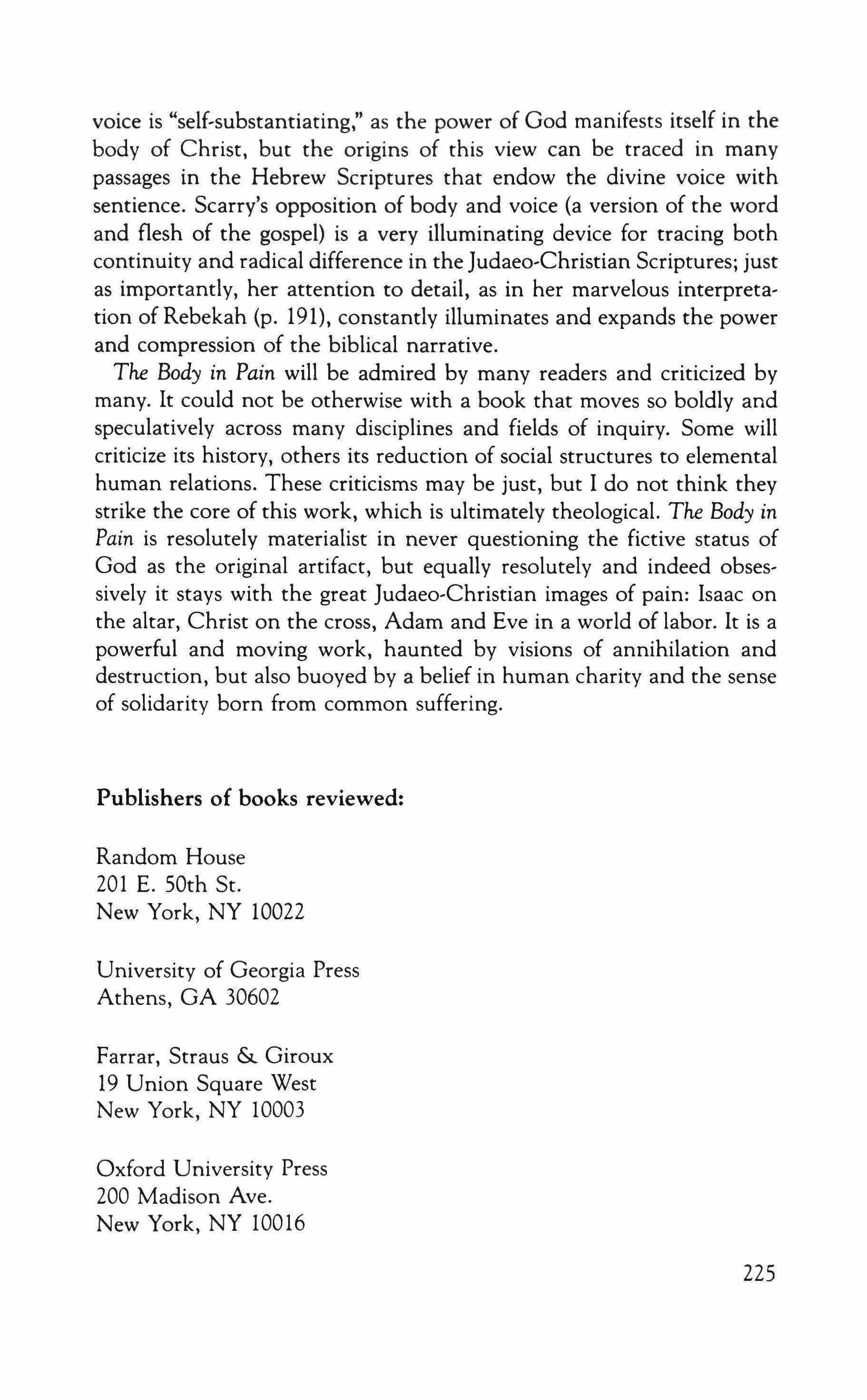
Publishers of books reviewed:
Random House
201 E. 50th St. New York, NY 10022
University of Georgia Press Athens, GA 30602
Farrar, Straus & Giroux
19 Union Square West
New York, NY 10003
Oxford University Press 200 Madison Ave.
New York, NY 10016
225
Contributors

Reynolds Price's novel, Kate Vaiden, from which "Starting a Life" is taken, is being published in June 1986 by Atheneum. His second volume of poems, The Laws ofIce, will be released by Atheneum in fall 1986. Mr. Price teaches at Duke University. His poem, "House Snake," appeared in TQ #61. * * * Daniel Wallace lives in Chapel Hill, North Carolina. "Elephant Bait" is his first published story. * * * Trevor Edmands is a painter and sculptor who lives in Sheffield, England. He has exhibited in London and Edinburgh, as well as in West Germany and Italy, and in 1985 he received the British Institute Sculpture Prize. His first story was published in 1985. * * * David Plante's most recent novel is The Catholics, published by Atheneum in spring 1986. A Canadian who has lived in London for twenty years, Mr. Plante was writer-in-residence at King's College, Cambridge, in 1984-85. His story, "The Student," appeared in TQ #55.
Robley Wilson, Jr., is the editor of the North American Review and a member of the English Department faculty at the University of Northern Iowa. His most recent book is a collection of stories, Dancing for Men (University of Pittsburgh Press, 1983; reprinted by Ecco Press, 1985).
* * * Gordon Lish, who teaches at Columbia and New York Universities, is the author of the novel Peru (Dutton, 1986), among other works. * * * Julio Cortazar, who died in 1984 at the age of 69, was the author of several novels and books of stories, including Hopscotch (Avon, 1974), We Love Glenda So Much and Other Tales (Knopf, 1983), Blow-up and Other Stories (reprinted by Pantheon, 1985) and A Manual for Manuel (reprinted by Carroll & Graf, 1986). Born in Argentina and active in Latin American politics, he lived for over thirty years in Paris, where he worked as a translator with UNESCO. Around the Day in
226
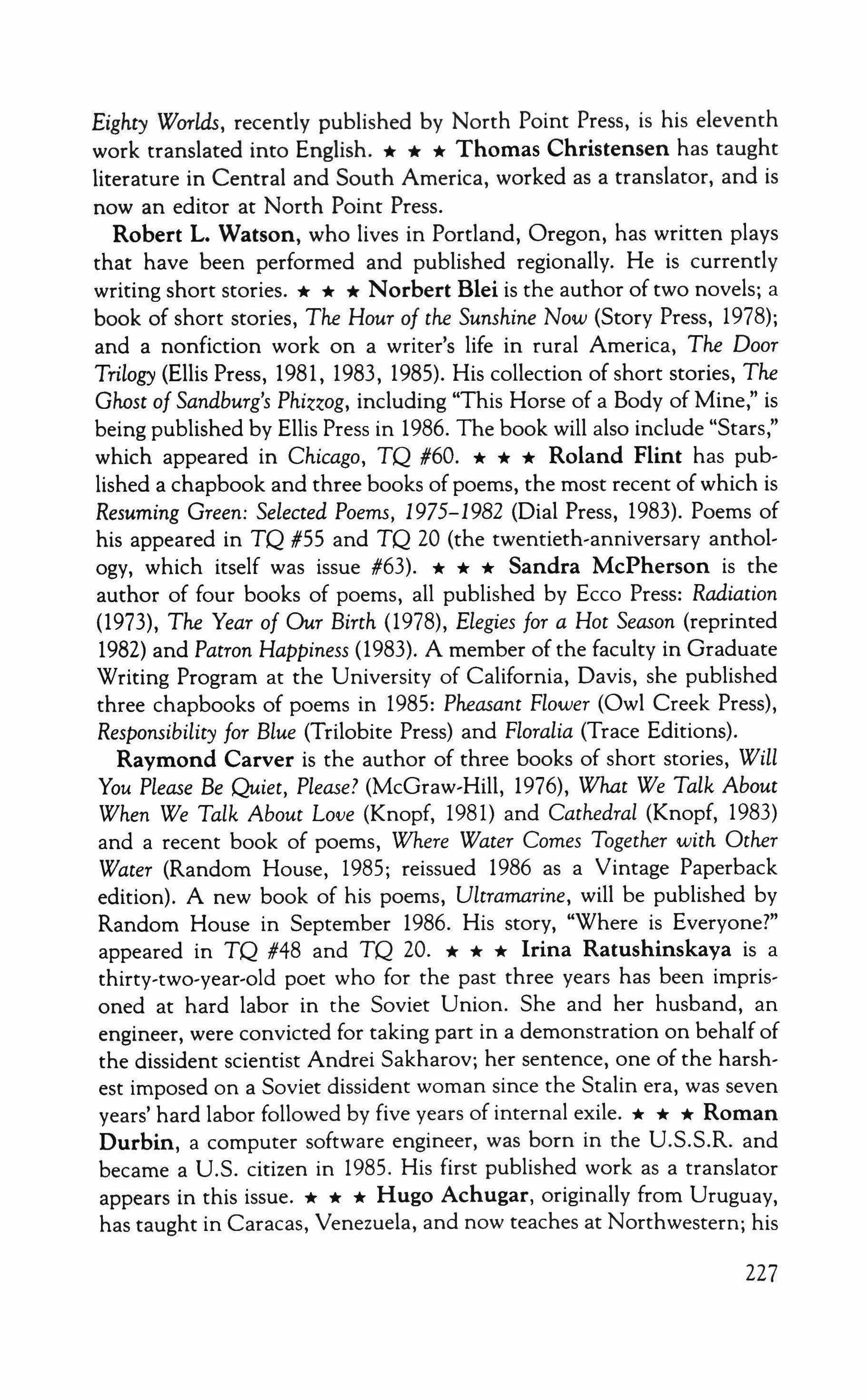
Eighty Worlds, recently published by North Point Press, is his eleventh work translated into English. * * * Thomas Christensen has taught literature in Central and South America, worked as a translator, and is now an editor at North Point Press.
Robert L. Watson, who lives in Portland, Oregon, has written plays that have been performed and published regionally. He is currently writing short stories. * * * Norbert Blei is the author of two novels; a book of short stories, The Hour of the Sunshine Now (Story Press, 1978); and a nonfiction work on a writer's life in rural America, The Door Trilogy (Ellis Press, 1981, 1983, 1985). His collection of short stories, The Ghost of Sandburg's Phizzog, including "This Horse of a Body of Mine," is being published by Ellis Press in 1986. The book will also include "Stars," which appeared in Chicago, TQ #60. * * * Roland Flint has pub, lished a chapbook and three books of poems, the most recent of which is Resuming Green: Selected Poems, 1975-1982 (Dial Press, 1983). Poems of his appeared in TQ #55 and TQ 20 (the twentieth-anniversary anthoi, ogy, which itself was issue #63). * * * Sandra McPherson is the author of four books of poems, all published by Ecco Press: Radiation (1973), The Year of Our Birth (1978), Elegies for a Hot Season (reprinted 1982) and Patron Happiness (1983). A member of the faculty in Graduate Writing Program at the University of California, Davis, she published three chapbooks of poems in 1985: Pheasant Flower (Owl Creek Press), Responsibility for Blue (Trilobite Press) and Floralia (Trace Editions).
Raymond Carver is the author of three books of short stories, Will You Please Be Quiet, Please? (McGraw,Hill, 1976), What We Talk About When We Talk About Love (Knopf, 1981) and Cathedral (Knopf, 1983) and a recent book of poems, Where Water Comes Together with Other Water (Random House, 1985; reissued 1986 as a Vintage Paperback edition). A new book of his poems, Ultramarine, will be published by Random House in September 1986. His story, "Where is Everyone?" appeared in TQ #48 and TQ 20. * * * Irina Ratushinskaya is a thirty-two-year-old poet who for the past three years has been imprisoned at hard labor in the Soviet Union. She and her husband, an engineer, were convicted for taking part in a demonstration on behalf of the dissident scientist Andrei Sakharov; her sentence, one of the harsh, est imposed on a Soviet dissident woman since the Stalin era, was seven years' hard labor followed by five years of internal exile. * * * Roman Durbin, a computer software engineer, was born in the U.S.S.R. and became a U.S. citizen in 1985. His first published work as a translator appears in this issue. * * * Hugo Achugar, originally from Uruguay, has taught in Caracas, Venezuela, and now teaches at Northwestern; his
227
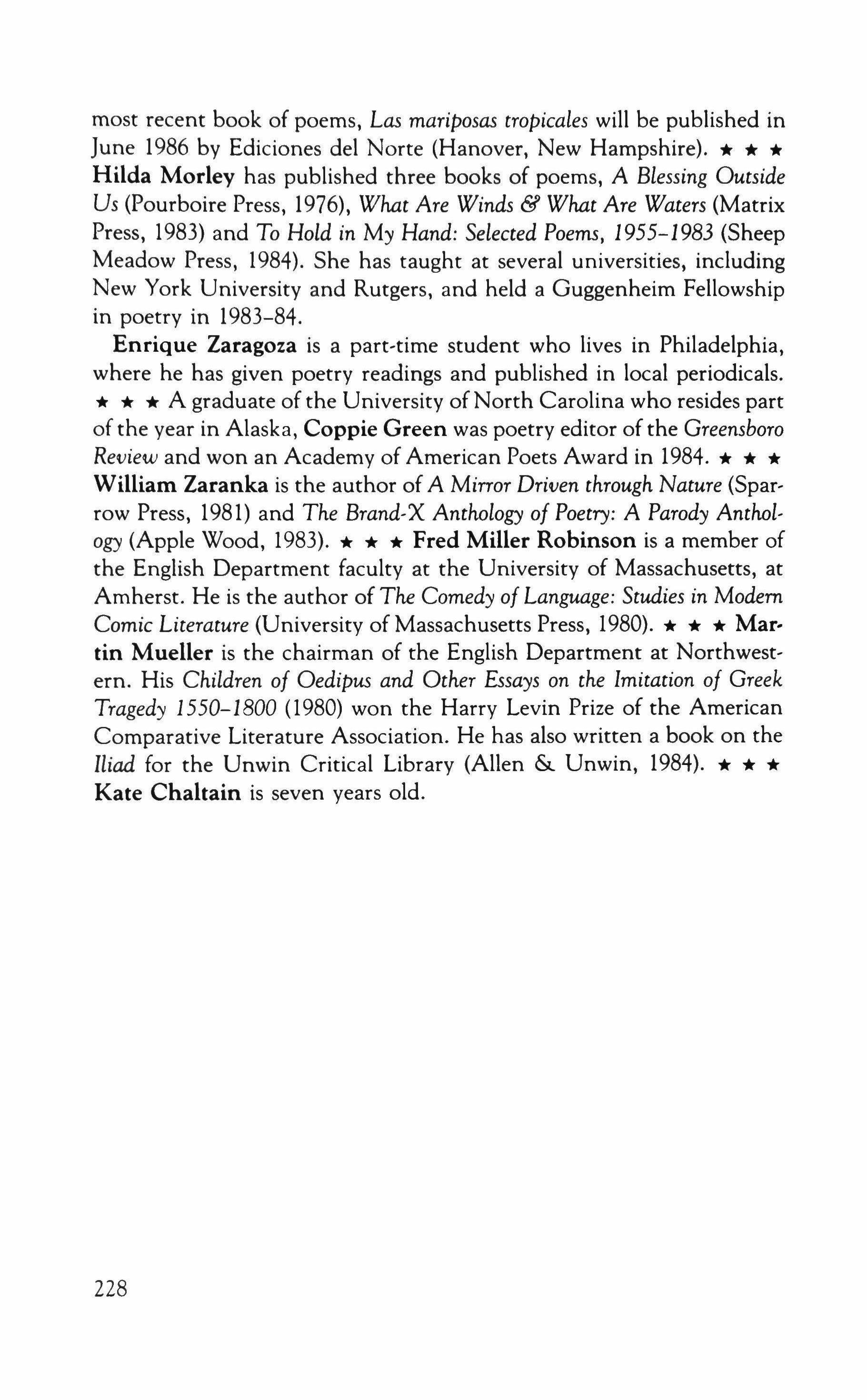
most recent book of poems, Las mariposas tropicales will be published in June 1986 by Ediciones del Norte (Hanover, New Hampshire). * * * Hilda Morley has published three books of poems, A Blessing Outside Us (Pourboire Press, 1976), What Are Winds & What Are Waters (Matrix Press, 1983) and To Hold in My Hand: Selected Poems, 1955-1983 (Sheep Meadow Press, 1984). She has taught at several universities, including New York University and Rutgers, and held a Guggenheim Fellowship in poetry in 1983-84.
Enrique Zaragoza is a part-time student who lives in Philadelphia, where he has given poetry readings and published in local periodicals. * * * A graduate of the University of North Carolina who resides part of the year in Alaska, Coppie Green was poetry editor of the Greensboro Review and won an Academy of American Poets Award in 1984. * * * William Zaranka is the author of A Mirror Driven through Nature (Sparrow Press, 1981) and The Brand-X Anthology of Poetry: A Parody Anthology (Apple Wood, 1983). * * * Fred Miller Robinson is a member of the English Department faculty at the University of Massachusetts, at Amherst. He is the author of The Comedy ofLanguage: Studies in Modem Comic Literature (University of Massachusetts Press, 1980). * * * Martin Mueller is the chairman of the English Department at Northwestern. His Children of Oedipus and Other Essays on the Imitation of Greek Tragedy 1550-1800 (1980) won the Harry Levin Prize of the American Comparative Literature Association. He has also written a book on the Iliad for the Unwin Critical Library (Allen & Unwin, 1984). * * * Kate Chaltain is seven years old.
228
TriQuarterly wishes to acknowledge the recent and continuing support of the following donors, whose generosity has made possible the publication of the magazine, its special projects and its future planning.
The Atlantic Richfield Foundation
Mr. and Mrs. Solway F. Firestone
Mrs. Larry Shindelman and life subscribers to TriQuarterly:
Anonymous (9)
David Abercrombie
Sandy Anderson
Richard H. Anderson
University of Arizona Poetry Center
Gayle Arnzen
Tom G. Bell
Robert Boruch
Timothy Browne
Eric O. Cahn
Stephen Chapman
Andrew Cyr
Mark W. DeBree
Alan Distler
Christopher English
Carol Erickson
Steven Finch
David R. Fine
Paul Fjelstad
Torrence Fossland
Dr. Scott C. Fraser
Kathy M. Garness
Lawrence J. Gorman
Maxine Groffsky
Rev. Dr. Elliott Hagle
Ross B. Heath
Charles Hedde
Donald A. Hillel
Irwin L. Hoffman
Irwin T. Holtzman
P. Hosier
Dr. Alfred D. Klinger
Loy E. Knapp
Sydney Knowlton
Judy Kunz
Conrad A. Langenberg
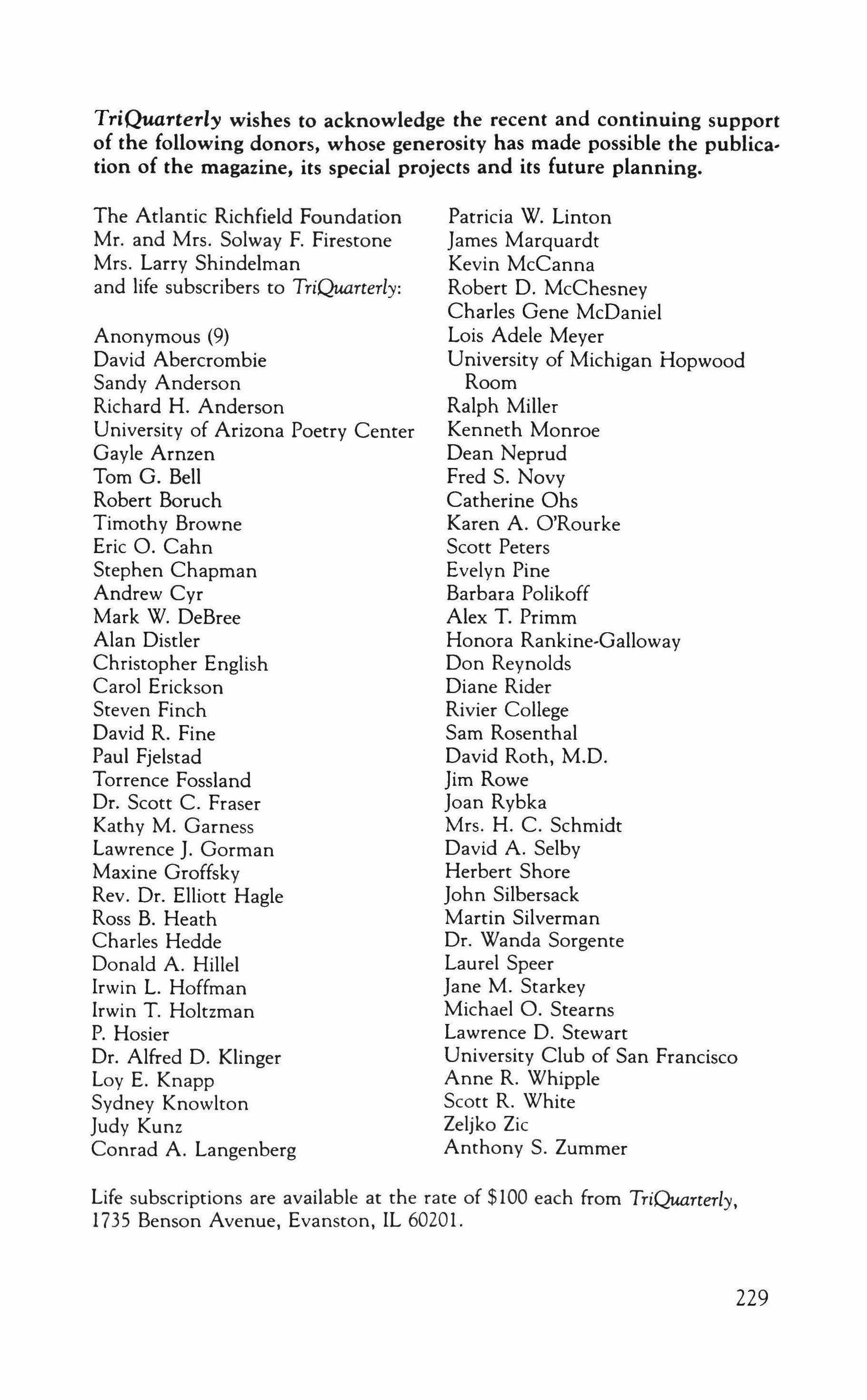
Patricia W. Linton
James Marquardt
Kevin McCanna
Robert D. McChesney
Charles Gene McDaniel
Lois Adele Meyer
University of Michigan Hopwood Room
Ralph Miller
Kenneth Monroe
Dean Neprud
Fred S. Novy
Catherine Ohs
Karen A. O'Rourke
Scott Peters
Evelyn Pine
Barbara Polikoff
Alex T. Primm
Honora Rankine-Galloway
Don Reynolds
Diane Rider
Rivier College
Sam Rosenthal
David Roth, M.D.
Jim Rowe
Joan Rybka
Mrs. H. C. Schmidt
David A. Selby
Herbert Shore
John Silbersack
Martin Silverman
Dr. Wanda Sorgente
Laurel Speer
Jane M. Starkey
Michael O. Stearns
Lawrence D. Stewart
University Club of San Francisco
Anne R. Whipple
Scott R. White
Zeljko Zic
Anthony S. Zummer
Life subscriptions are available at the rate of $100 each from TriQuarterly, 1735 Benson Avenue, Evanston, IL 60201.
229
+ The Wooster'Rgview
The Donaldson Prize for Fiction $300
for the best short story published each calendar year in The Wooster Review.
The Wooster Review publishes short fiction and poetry accessible to a wide audience. Back issues are $2 each and include fiction by Michael Casey, Stuart Kaminsky, David Michael Kaplan, Karen Loeb, Jennifer Lodde, and William F. Van Wert. Poets include Christopher Bursk. Mary Crow, Ron Koertge, and Jon Silkin. Send subscriptions and submissions to The Wooster Review, The College of Wooster, Wooster, OH 44691.

essays by Roque Dalton, Cesar Vallejo, Vladimir Mayakoysky & others for a complete catalog:
Curbstone Dept M1 321 Jackson St Willimantic, CT 06226
ART ON THE LINE
A series of essays, interviews, manifestoes, &c. by 20th century artists: socially conscious &lor politically engaged artists speaking to, or from, the point where their commitment and art interact.
announces
William Goyen's Remarkable Last Novel Arcadia Is Yours
With a Subscription to TQ
Now is the time to begin or renew your subscription to the magazine the New York Times has called "perhaps the preeminent journal for literary fiction" - and receive as a bonus William Goyen's much-acclaimed last novel Arcadio in its original $12.95 cloth edition. Supplies are limited, so don't delay-send $16 for one year, $28 for two years or $100 for a life subscription to TriQuarterly, Northwestern University, 1735 Benson Ave., Evanston, IL 60201 - or send Visa or Master Card number along with expiration date and signature, and we'll do the rest.

"Arcadio ranks among his most powerful and visionary works."
- Joyce Carol Oates
"This book will often be read through eagerly at a single sitting."
- Christopher Isherwood
WINGBOW PRESS: Distinctive Poetry and Fiction
THAT BACK ROAD IN: Selected Poems 1972-83
(John Brandi) 160 pages, illustrated, $7.95
Poems from the Four Corners desert coun try, following unexplored roads whose only destination is the experience of the journey.
"He's a seer who retains an abiding curiosity and sympathy with special people and places."
- David Meltzer
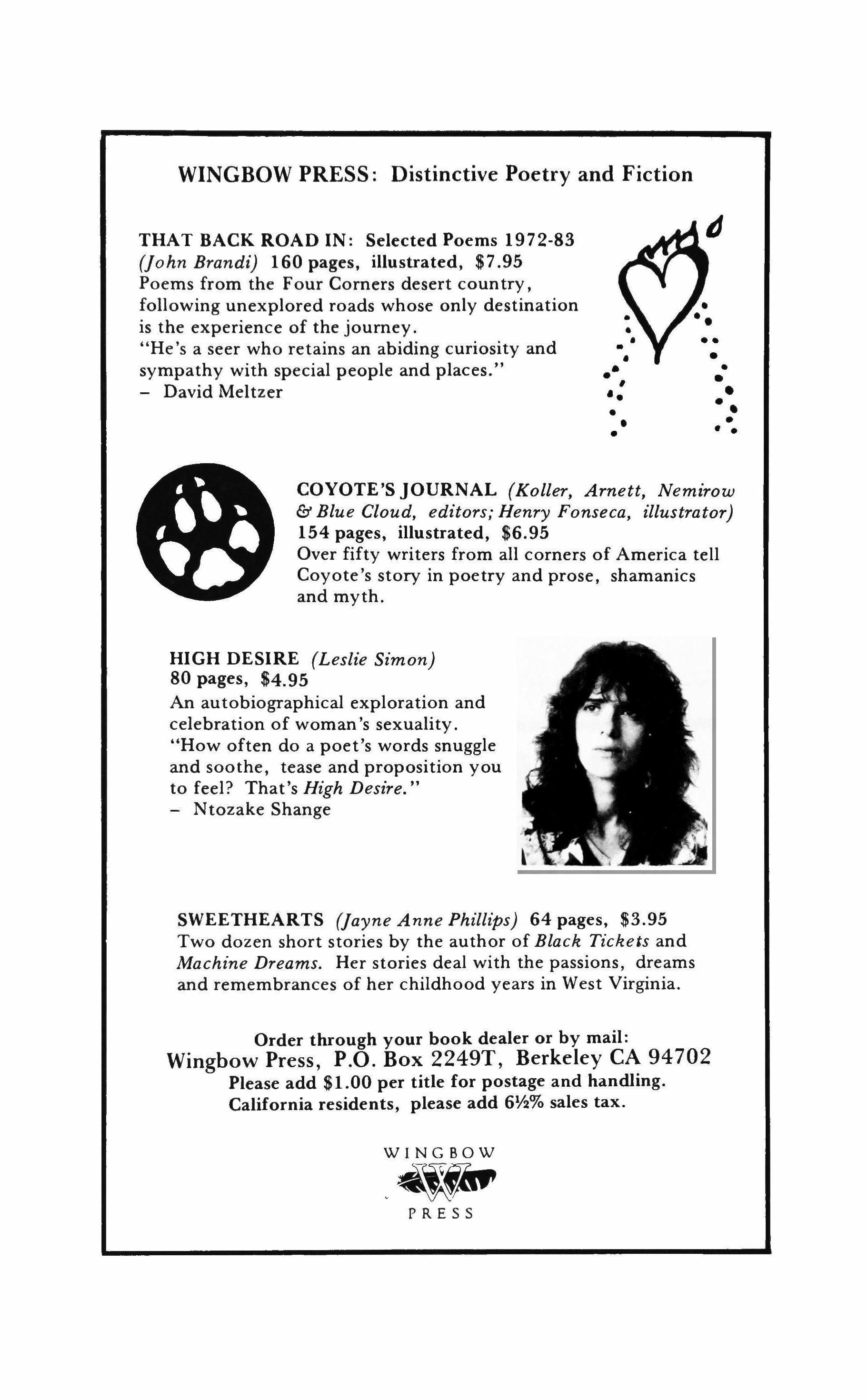
COYOTE'S
JOURNAL (Koller, Arnett, Nemirow & Blue Cloud, editors; Henry Fonseca, illustrator)
154 pages, illustrated, $6.95
Over fifty writers from all corners of America tell Coyote's story in poetry and prose, shamanics and myth.
HIGH DESIRE (Leslie Simon)
80 pages, $4.95
An autobiographical exploration and celebration of woman's sexuality.
"How often do a poet's words snuggle and soothe, tease and proposition you to feel? That's High Desire."
- Ntozake Shange
SWEETHEARTS (Jayne Anne Phillips) 64 pages, $3.95
Two dozen short stories by the author of Black Tickets and Machine Dreams. Her stories deal with the passions, dreams and remembrances of her childhood years in West Virginia.
Order through your book dealer or by mail: Wingbow Press, P.O. Box 2249T, Berkeley CA 94702
Please add $1.00 per title for postage and handling. California residents, please add 6Y2% sales tax.
••
,C� PRESS • •
WINGBOW
MISSISSIPPI REVIEW
FICTION, POEMS, TRANSLATIONS, INTERVIEWS, & ESSAYS:
A. R. AMMONS, MAX ApPLE, MARGARET AlWOOD, MIKHAIL BAKHTIN, RUSSELL BANKS, JOHN BARTH, JONATHAN BAUMBACH, ANN BEATTIE, JOE DAVID BELLAMY, DORIS BETTS, FREDERICK BUSCH, FRANCOIS CAMOIN, RAYMOND CARVER, GUY DAVENPORT, EUGENIO DE ANDRADE, GILLES DELEUZE, STEPHEN DIXON, SERGEI DOVLATOV, NORMAN DUBIE, KENWARD ELMSLlE, KATE FARRELL, RAYMOND FEDERMAN, H. E. FRANCIS, LAURA FURMAN, ALVIN GREENBERG, FELIX GUATTARI, JOHN HAWKES, PAUL HOOVER, TAMA JANOWITZ, GALWAY KINNELL, GORDON LISH, PHILLIP LOPATE, BEVERLY LOWRY, JEAN-FRANCOIS LYOTARD, LARRY MCCAFFERY, JOSEPH MCELROY, MARK MIRSKY, HOWARD NEMEROV, JOYCE CAROL OATES, DAZAI OSAMU, OCTAVIO PAZ, JAMES ROBISON, MARY ROBISON, NOBERTO ROMERO, VERN RUTSALA, ALBERT SAMAIN, YOSHIKO SHIGEKANE, CHARLES SIMIC, GILBERT SORRENTINO, GEORGE STEINER, LEON STOKESBURY, JAMES TATE, MARIAN THURM, EDMUND WHITE
AND OTHERS.
SUBSCRIBE TODAY. 1 YEAR $1012 YEARS $18/3 YEARS $26. SOUTHERN STATION, BOX 5144, HATTIESBURG, MS 39406-5144
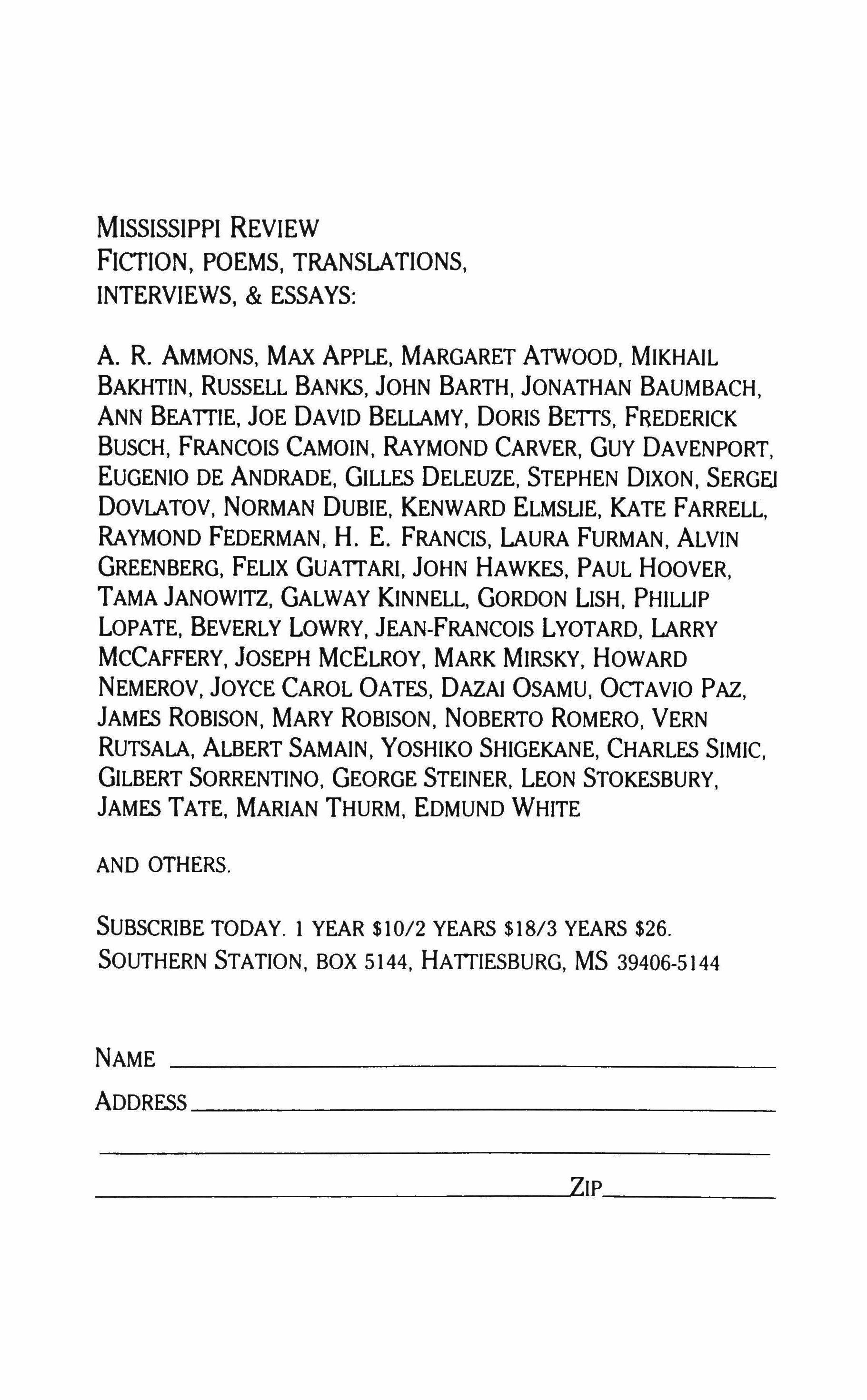
NAME ADDRESS IP
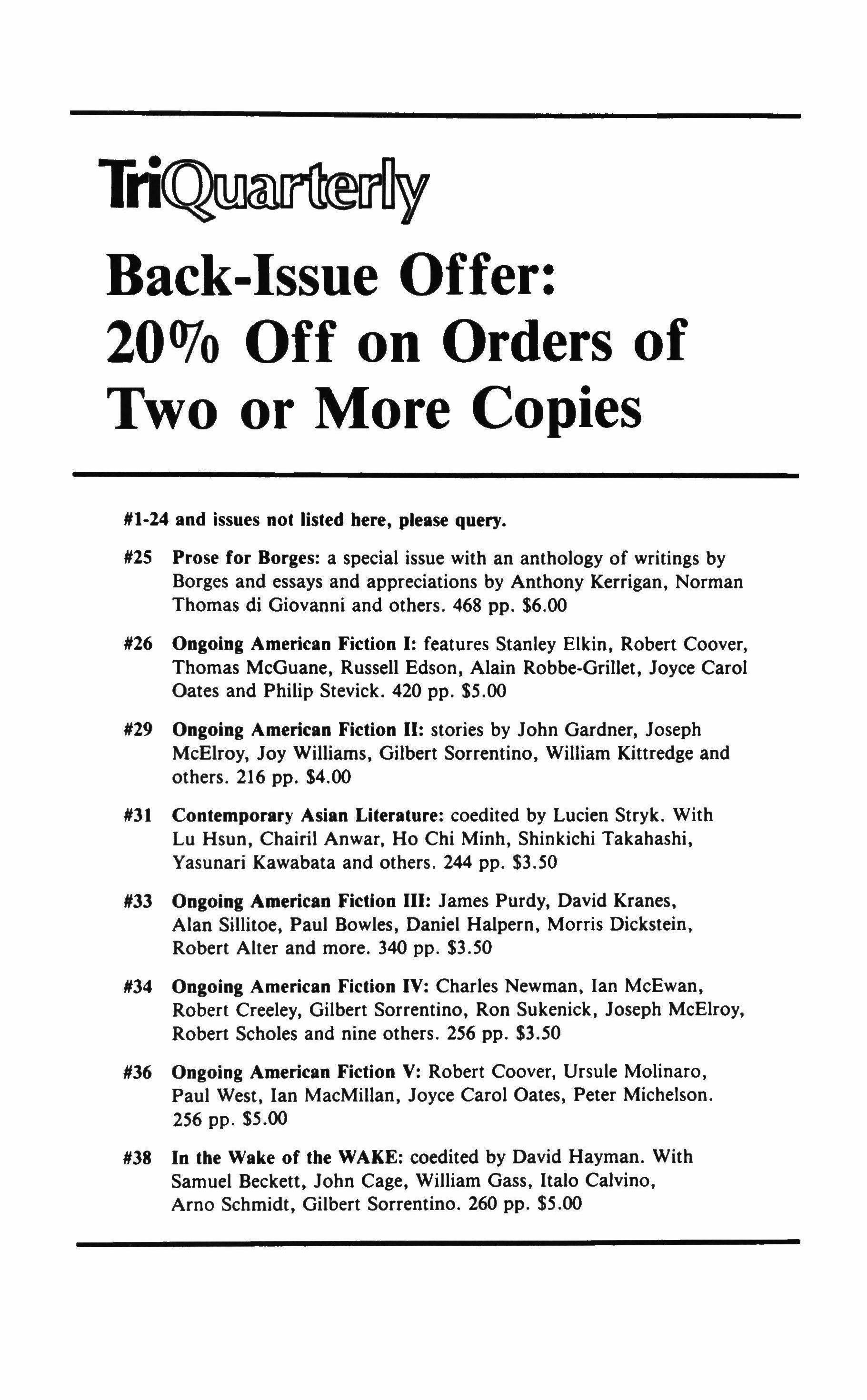
Back-Issue Offer: 20070 Off on Orders of
Two or More Copies
#1-24 and issues not listed here, please query.
#25 Prose for Borges: a special issue with an anthology of writings by Borges and essays and appreciations by Anthony Kerrigan, Norman Thomas di Giovanni and others. 468 pp. $6.00
#26 Ongoing American Fiction I: features Stanley Elkin, Robert Coover, Thomas McGuane, Russell Edson, Alain Robbe-Grillet, Joyce Carol Oates and Philip Stevick. 420 pp. $5.00
#29 Ongoing American Fiction II: stories by John Gardner, Joseph McElroy, Joy Williams, Gilbert Sorrentino, William Kittredge and others. 216 pp. $4.00
#31 Contemporary Asian Literature: coedited by Lucien Stryk, With Lu Hsun, Chairil Anwar, Ho Chi Minh, Shinkichi Takahashi, Yasunari Kawabata and others. 244 pp. $3.50
#33 Ongoing American Fiction III: James Purdy, David Kranes, Alan Sillitoe, Paul Bowles, Daniel Halpern, Morris Dickstein, Robert Alter and more. 340 pp. $3.50
#34 Ongoing American Fiction IV: Charles Newman, Ian McEwan, Robert Creeley, Gilbert Sorrentino, Ron Sukenick, Joseph McElroy, Robert Scholes and nine others. 256 pp. $3.50
#36 Ongoing American Fiction V: Robert Coover, Ursule Molinaro, Paul West, Ian MacMillan, Joyce Carol Oates, Peter Michelson. 256 pp. $5.00
#38 In the Wake of the WAKE: coedited by David Hayman. With Samuel Beckett, John Cage, William Gass, Italo Calvino, Arno Schmidt, Gilbert Sorrentino. 260 pp. $5.00
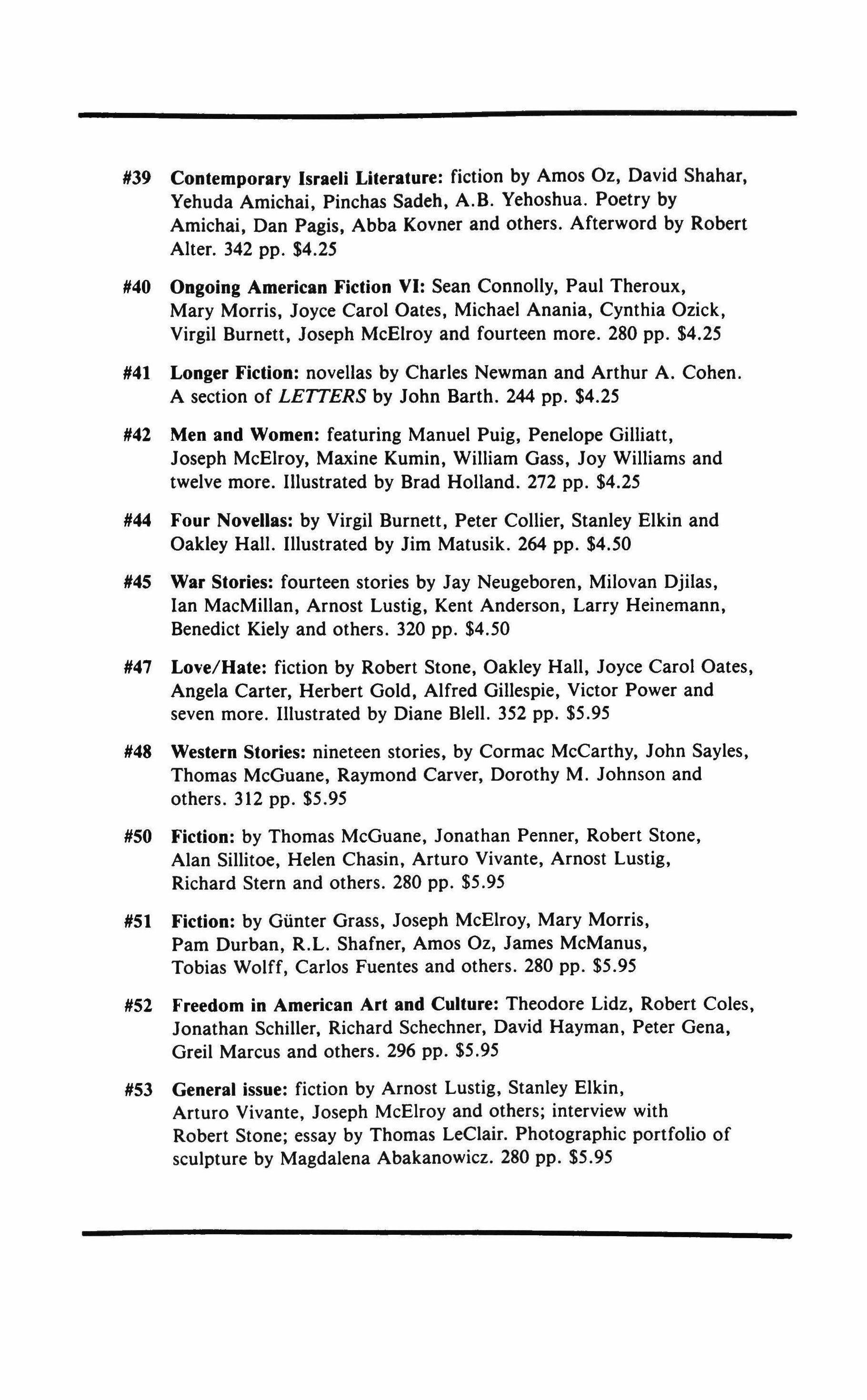
#39 Contemporary Israeli Literature: fiction by Amos Oz, David Shahar, Yehuda Amichai, Pinchas Sadeh, A.B. Yehoshua. Poetry by Amichai, Dan Pagis, Abba Kovner and others. Afterword by Robert Alter. 342 pp. $4.25
#40 Ongoing American Fiction VI: Sean Connolly, Paul Theroux. Mary Morris, Joyce Carol Oates, Michael Anania, Cynthia Ozick, Virgil Burnett, Joseph McElroy and fourteen more. 280 pp. $4.25
#41 Longer Fiction: novellas by Charles Newman and Arthur A. Cohen. A section of LETTERS by John Barth. 244 pp. $4.25
#42 Men and Women: featuring Manuel Puig, Penelope Gilliatt, Joseph McElroy, Maxine Kumin, William Gass, Joy Williams and twelve more. Illustrated by Brad Holland. 272 pp. $4.25
#44 Four Novellas: by Virgil Burnett, Peter Collier, Stanley Elkin and Oakley Hall. Illustrated by Jim Matusik. 264 pp. $4.50
#45 War Stories: fourteen stories by Jay Neugeboren, Milovan Djilas, Ian MacMillan, Arnost Lustig, Kent Anderson, Larry Heinemann, Benedict Kiely and others. 320 pp. $4.50
#47 Love/Hate: fiction by Robert Stone, Oakley Hall, Joyce Carol Oates, Angela Carter. Herbert Gold, Alfred Gillespie, Victor Power and seven more. Illustrated by Diane Bleil. 352 pp. $5.95
#48 Western Stories: nineteen stories, by Cormac McCarthy, John Sayles, Thomas McGuane, Raymond Carver, Dorothy M. Johnson and others. 312 pp. $5.95
#50 Fiction: by Thomas McGuane, Jonathan Penner, Robert Stone, Alan Sillitoe, Helen Chasin, Arturo Vivante, Arnost Lustig, Richard Stern and others. 280 pp. $5.95
#51 Fiction: by Gunter Grass, Joseph McElroy, Mary Morris, Pam Durban, R.L. Shafner, Amos Oz, James McManus, Tobias Wolff. Carlos Fuentes and others. 280 pp. $5.95
#52 Freedom in American Art and Culture: Theodore Lidz, Robert Coles, Jonathan Schiller, Richard Schechner, David Hayman, Peter Gena, Greil Marcus and others. 296 pp. $5.95
#53 General issue: fiction by Arnost Lustig, Stanley Elkin, Arturo Vivante, Joseph McElroy and others; interview with Robert Stone; essay by Thomas LeClair. Photographic portfolio of sculpture by Magdalena Abakanowicz. 280 pp. $5.95
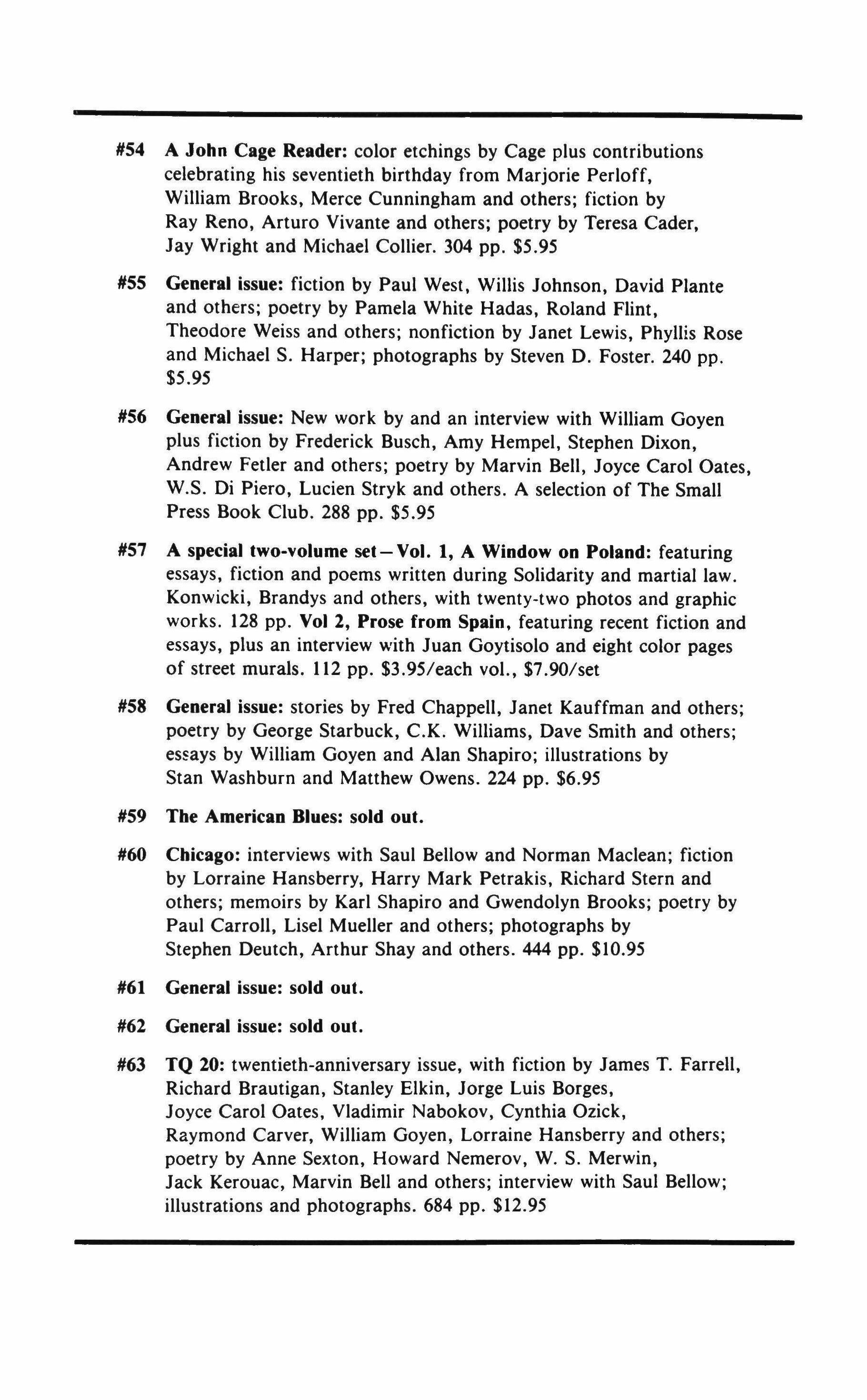
#54 A John Cage Reader: color etchings by Cage plus contributions celebrating his seventieth birthday from Marjorie Perloff, William Brooks, Merce Cunningham and others; fiction by Ray Reno, Arturo Vivante and others; poetry by Teresa Cader, Jay Wright and Michael Collier. 304 pp. $5.95
#55 General issue: fiction by Paul West, Willis Johnson, David Plante and others; poetry by Pamela White Hadas, Roland Flint, Theodore Weiss and others; nonfiction by Janet Lewis, Phyllis Rose and Michael S. Harper; photographs by Steven D. Foster. 240 pp. $5.95
#56 General issue: New work by and an interview with William Goyen plus fiction by Frederick Busch, Amy Hempel, Stephen Dixon, Andrew Fetler and others; poetry by Marvin Bell, Joyce Carol Oates, W.S. Di Piero, Lucien Stryk and others. A selection of The Small Press Book Club. 288 pp. $5.95
#57 A special two-volume set- Vol. 1, A Window on Poland: featuring essays, fiction and poems written during Solidarity and martial law. Konwicki, Brandys and others, with twenty-two photos and graphic works. 128 pp. Vol 2, Prose from Spain, featuring recent fiction and essays, plus an interview with Juan Goytisolo and eight color pages of street murals. 112 pp. $3.95/each vol., $7.90/set
#58 General issue: stories by Fred Chappell, Janet Kauffman and others; poetry by George Starbuck, C.K. Williams, Dave Smith and others; essays by William Goyen and Alan Shapiro; illustrations by Stan Washburn and Matthew Owens. 224 pp. $6.95
#59 The American Blues: sold out.
#60 Chicago: interviews with Saul Bellow and Norman Maclean; fiction by Lorraine Hansberry, Harry Mark Petrakis, Richard Stern and others; memoirs by Karl Shapiro and Gwendolyn Brooks; poetry by Paul Carroll, Lisel Mueller and others; photographs by Stephen Deutch, Arthur Shay and others. 444 pp. $10.95
#61 General issue: sold out.
#62 General issue: sold out.
#63 TQ 20: twentieth-anniversary issue, with fiction by James T. Farrell, Richard Brautigan, Stanley Elkin, Jorge Luis Borges, Joyce Carol Oates, Vladimir Nabokov, Cynthia Ozick, Raymond Carver, William Goyen, Lorraine Hansberry and others; poetry by Anne Sexton, Howard Nemerov, W. S. Merwin, Jack Kerouac, Marvin Bell and others; interview with Saul Bellow; illustrations and photographs. 684 pp. $12.95
#64 General issue: sold out.
#65 The Writer in Our World: symposium featuring Stanislaw Baranczak, Terrence Des Pres, Gloria Emerson, Leslie Epstein, Carolyn Forche, Michael S. Harper, Ward Just, Grace Paley, Mary Lee Settle, Robert Stone, Derek Walcott and C. K. Williams, with original work by most participants and by symposium moderators Angela Jackson and Bruce Weigl; photographs. 332 pp. $8.95
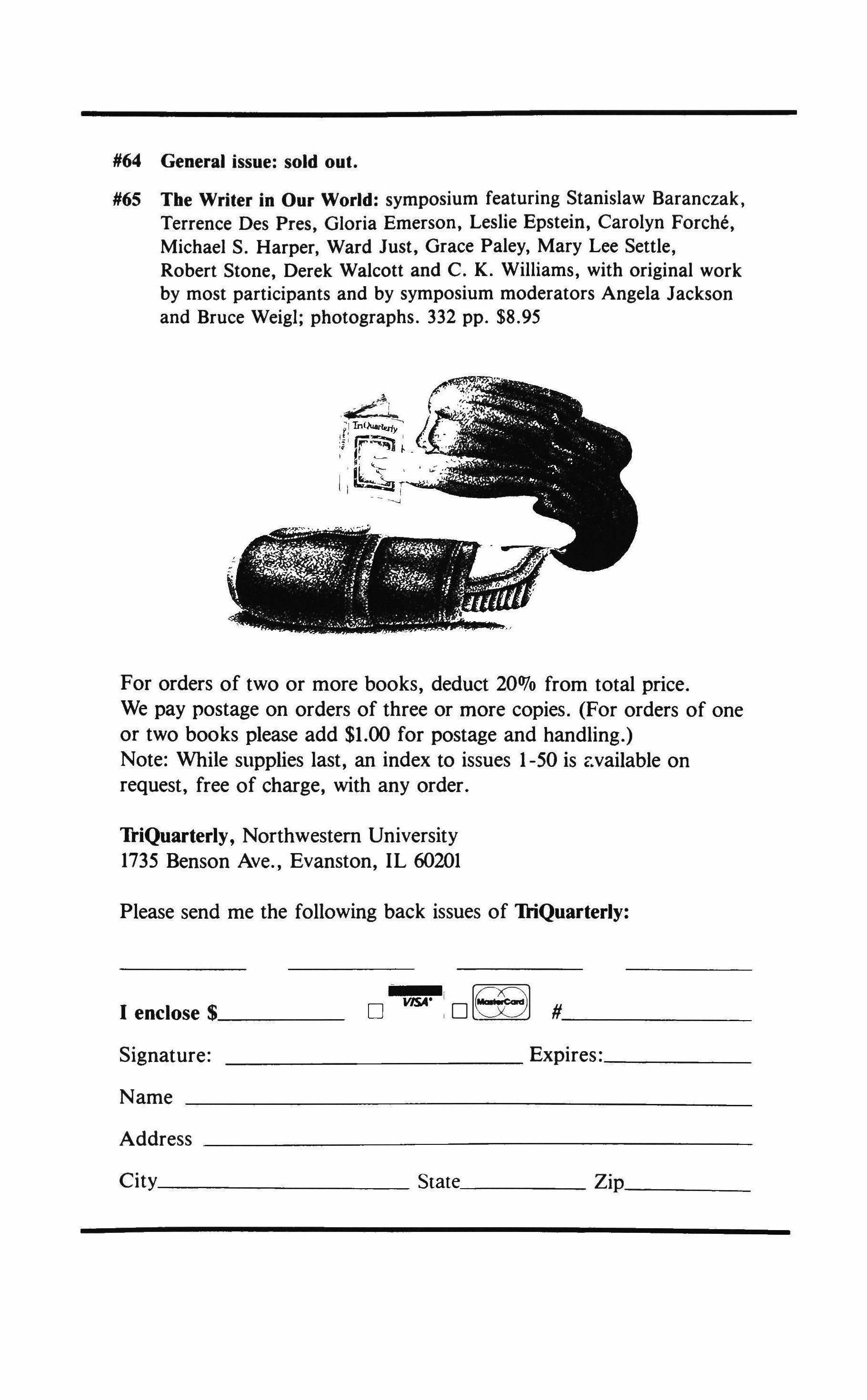
For orders of two or more books, deduct 20070 from total price. We pay postage on orders of three or more copies. (For orders of one or two books please add $1.00 for postage and handling.)
Note: While supplies last, an index to issues 1-50 is available on request, free of charge, with any order,
lfiQuarterly, Northwestern University 1735 Benson Ave" Evanston, IL 60201
Please send me the following back issues of 'lliQuarterly:
I
$ o VISA': 0 1831 # Signature: Name Expires: Address City State Zip
enclose
A BOOK OF Translations

A Special Issue of
A special book of fiction and poetry translated into English from twenty-two languages, including works by several Nobel Prize winners and with photographs from around the world.
By subscription
Individuals: $15 per year; $25 two years; Libraries $18 one year New Leiters, University of Missouri-Kansas City. Kansas City. MO 64110
LISTEN to NEW LETTERS ON THE AIR
A weekly half-hour public radio series ofreadings and music featuring performances by many of the most exciting contemporary writers in the world.
Mondays at 8:30 p.m. and Thursdays at 4:30 a.m. KCUR-FM. 89.3 on your dial
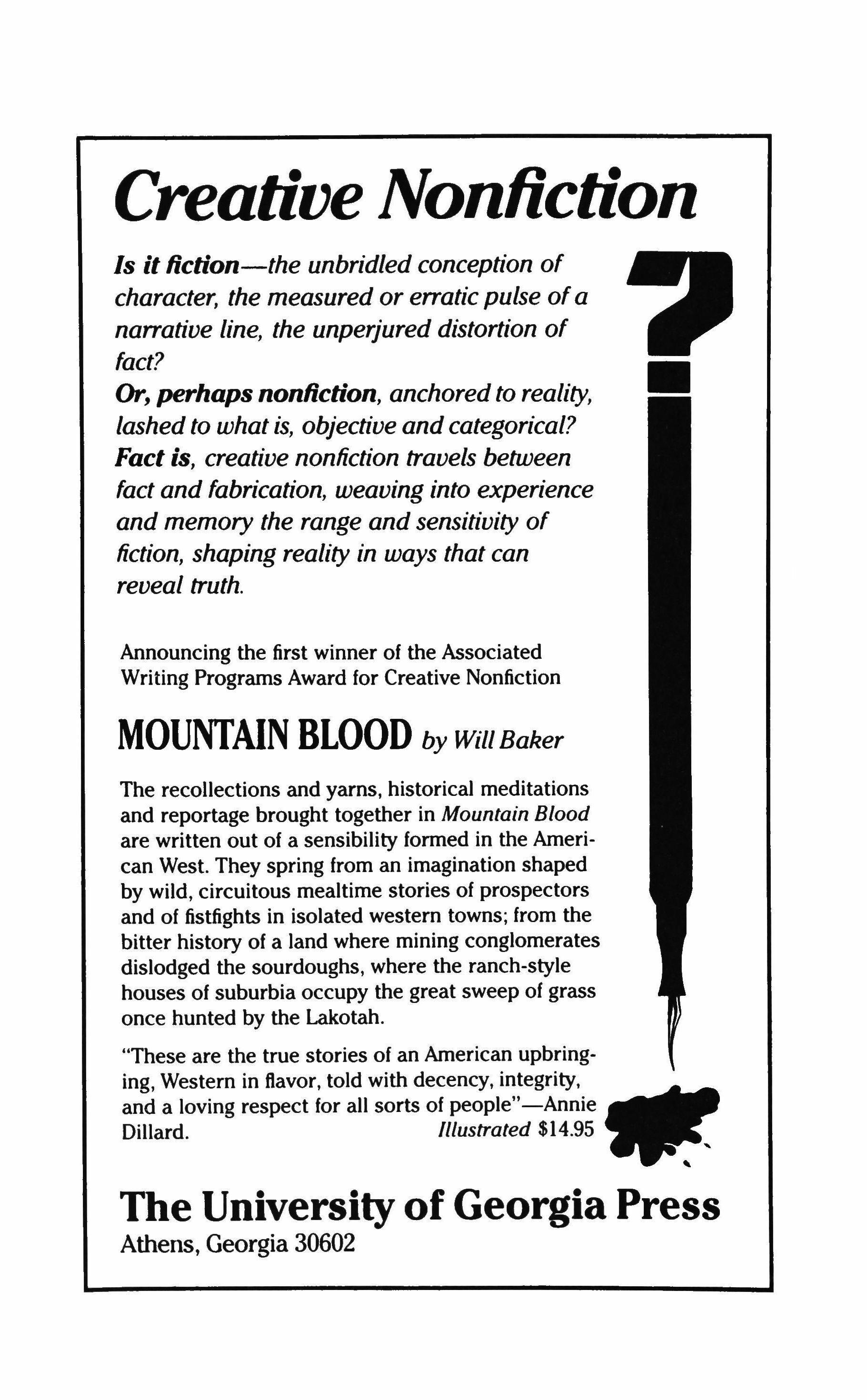
Creative Nonfiction
Is it fiction-the unbridled conception of character, the measured or erratic pulse of a narratioe line, the unperjured distortion of fact?
Or, perhaps nonfiction, anchored to reality, lashed to what is, objective and categorical? Fact is, creative nonfiction travels between fact and fabrication, weaving into experience and memory the range and sensitivity of fiction, shaping reality in ways that can reveal truth.
Announcing the first winner of the Associated Writing Programs Award for Creative Nonfiction
MOUNTAIN BLOOD
by Will Baker
The recollections and yarns, historical meditations and reportage brought together in Mountain Blood are written out of a sensibility formed in the American West. They spring from an imagination shaped by wild, circuitous mealtime stories of prospectors and of fistfights in isolated western towns; from the bitter history of a land where mining conglomerates dislodged the sourdoughs, where the ranch-style houses of suburbia occupy the great sweep of grass once hunted by the Lakotah.
"These are the true stories of an American upbringing, Western in ftavor, told with decency, integrity, and a loving respect for all sorts of people"-Annie Dillard. Illustrated $14.95
71' II The University of Georgia Press Athens, Georgia 30602
Th� mOlt: wide-I, used: peon in «be world. The Ideal bu.IUlHlpaa.
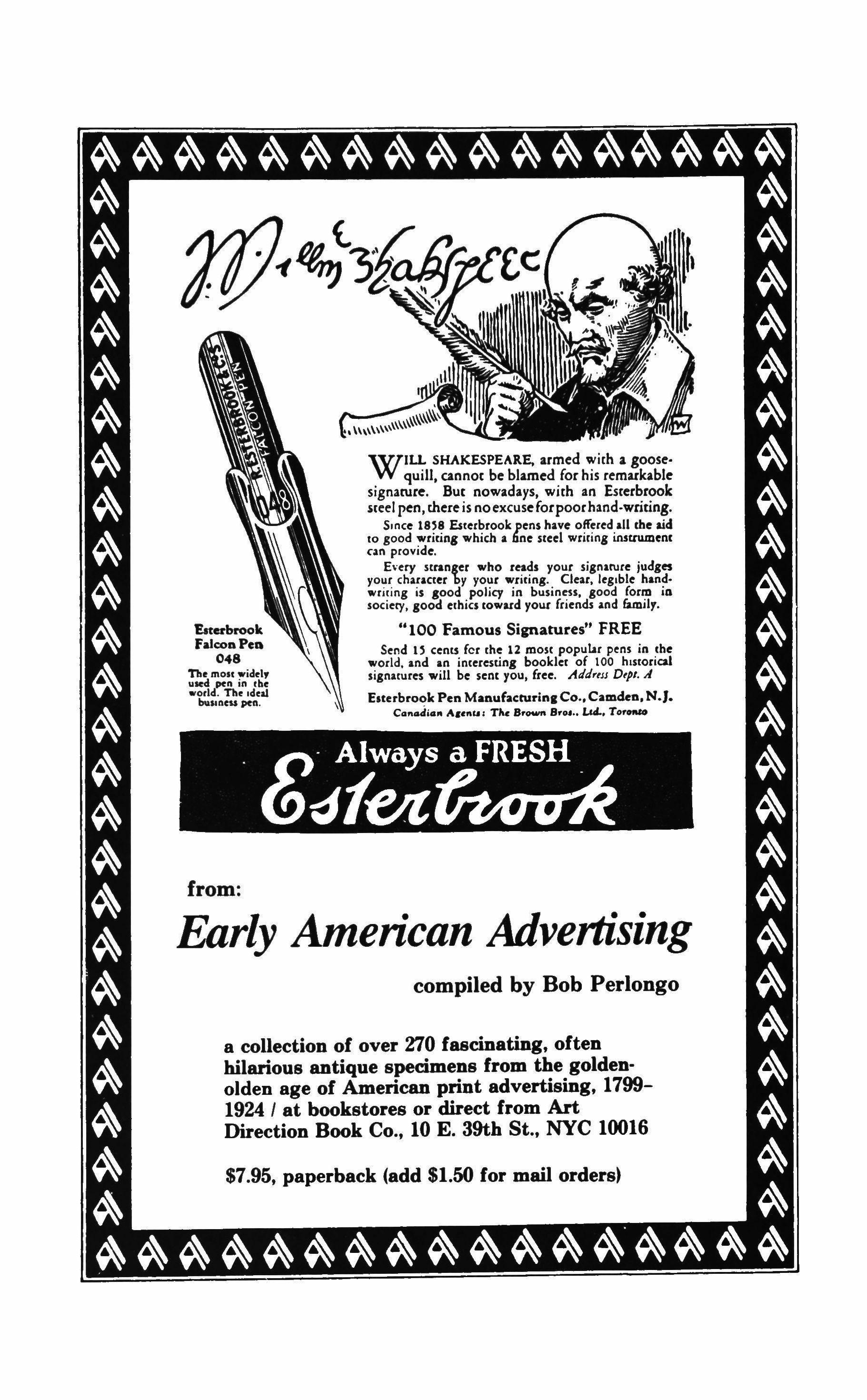
WILL SHAKESPEARE, armed with a goosequill, cannot be blamed for his remarkable signarure. But nowadays, with an Eseerbrook steel pen, there is no excuse forpoorhand-writing.
Smce 18'8 ESterbrook pens have offered all the aiel to good wriring which a line Steel wriling insuumenr can provide.
Every slranger who reads your signacure judges your ch"accer by your wriling. Clear, legIble hind· ming is good policy in business, good (orm in society, good ethics lo",,,d your (riends And limil,. "100 Famous Si&t\atures" FREE
Send l' cents fer rhe 12 mose popular pens in the world. and an inleresting booklet o( 100 hIStorical signalures will be sene you, free. Add"" O,pt. A Eoterbroolc Pen ManuElcturin,Co.,Camden,N.J. Can.4i A.en", nc Brown 8r� Ltd.. ToroNO
� � � � � � � � � � � � � � � � � � ����������������� from: Early American Advenising compiled by Bob Perlongo a collection of over 270 fascinating, often hilarious antique specimens from the goldenolden age of American print advertising, 17991924 I at bookstores or direct from Art Direction Book Co., 10 E. 39th St., NYC 10016 57.95, paperback (add 51.50 for mail orders]


Reynolds Price
Daniel Wallace
Trevor Edmands
David Plante
Robley Wilson, Jr.
Gordon Lish
Julio Cortazar
Robert L. Watson
Norbert Blei
Roland Flint
Sandra McPherson
Raymond Carver
Susan Hahn
Irina Ratushinskaya
Hugo Achugar
Hilda Morley
Enrique Zaragoza
Coppie Green
William Zaranka
Fred Miller Robinson
• • • • • • • • • • • • • • • • • • • • • • • • • • • • • • • • • • • • • • • • • • • • • • • • • • • • • • • • • • • • • • • • • • • • • • • • • • • • • • • • • • • • • • • • • • • • • • • • • • • • • • • • • • • • • • • • • • • • • • • • • • • • • • • • • • • • • • • • • • • • • • • • • • • • • • • • • • • • • • • • • • • • • • • • • • • • • • • • • • • • • • • • • • • • • • • • • • • • • • • • • • • • • • • • • • • • • • • • • • • • • • • • • • • • • • • • • • • • • • • • • • • • • • • • • • • • • • • • • • � � • • • • • • • • • • • • • • • • • • • • • • • • • • • • • • • • • • • • • • • • • • • • • • • • • • • • • • • • • • • • • • • • • • • • • • • • • • • • • • • • • • • • • • • • • • • • • • • • • • • • • • • • • • • • • • • • • • • • • • • • • • • • • • • • • • • • • • • • • • • • • • • • • • • • • • • • • • • • • • • • • • • • • • • • • • • • • • • • • • • • • • • • • • • • • • • • • • • • • • • • • • • • • • • • • • • • • • • • • • • • • • • • • • • • • • • • • • • • • • • • • • • • • • • • • • • • • • • • • • • • • • • • • • • • • • • • • • • • • • • • • • • • • • • • • • • • • • • • • • • • • • • • • • • • • • • • • • • • • • • • • • • • • • • • • • • • • • • • • • • • • • • • • • • • • • • • • • • • • • • • • • • • • • • • • • • • • • • • • • • • • • • • • • • • • • • • • • • • • • • • • • • • • • • • • • • • • • • • • • • • • • • • • • • • • • • • • • • • • • • • • • • • • • • • • • • • • • • • • • • • • • • • • • and reviews
$6.95
Cover illustration by Kate Chaltain


























































































































































































 Hats Off, 1927
Hats Off, 1927
 Habeas Corpus, 1928
Habeas Corpus, 1928























































